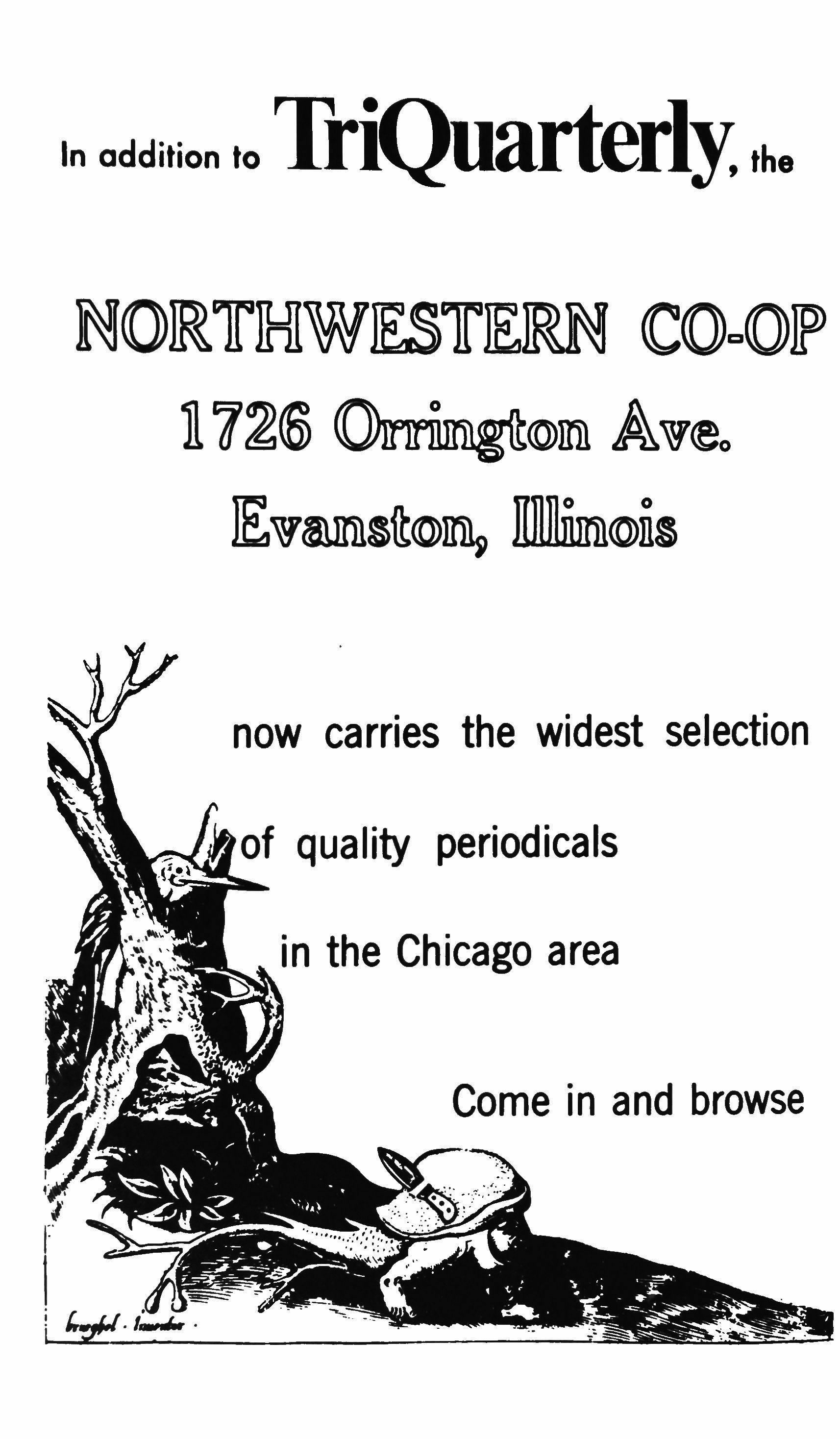




EDITOR
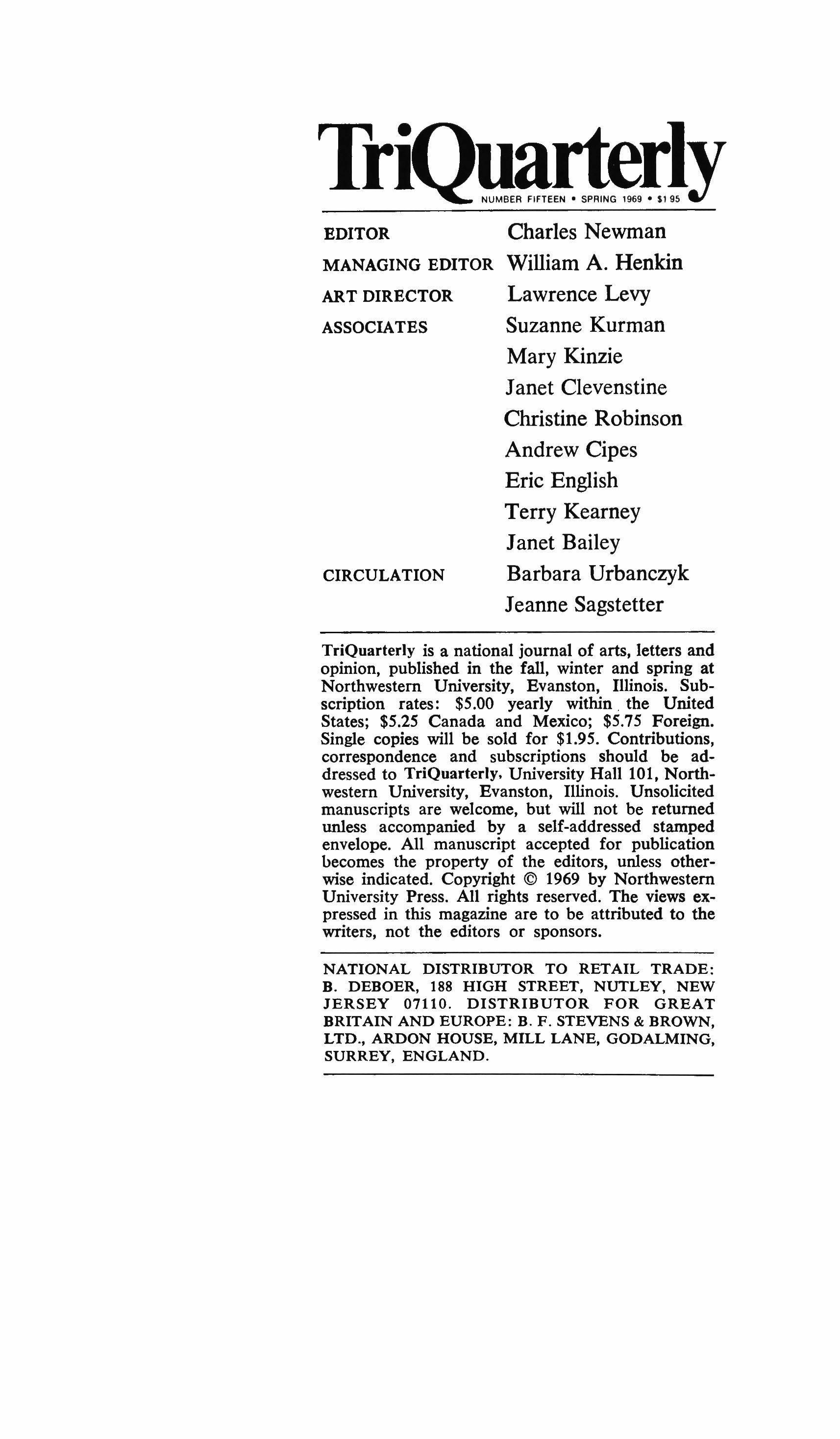
Charles Newman
MANAGING EDITOR William A. Henkin
ART DIRECTOR
ASSOCIATES
CIRCULATION
Lawrence Levy
Suzanne Kurman
Mary Kinzie
Janet Clevenstine
Christine Robinson
Andrew Cipes
Eric English
Terry Kearney
Janet Bailey
Barbara Urbanczyk
Jeanne Sagstetter
TriQuarterly is a national journal of arts, letters and opinion, published in the fall, winter and spring at Northwestern University, Evanston, Illinois. Subscription rates: $5.00 yearly within. the United States; $5.25 Canada and Mexico; $5.75 Foreign. Single copies will be sold for $1.95. Contributions, correspondence and SUbscriptions should be addressed to TriQuarterly, University Hall 101, Northwestern University, Evanston, Illinois. Unsolicited manuscripts are welcome, but will not be returned unless accompanied by a self-addressed stamped envelope. All manuscript accepted for publication becomes the property of the editors, unless otherwise indicated. Copyright © 1969 by Northwestern University Press. All rights reserved. The views expressed in this magazine are to be attributed to the writers, not the editors or sponsors.
NATIONAL DISTRIBUTOR TO RETAIL TRADE: B. DEBOER, 188 HIGH STREET, NUTLEY, NEW JERSEY 07110. DISTRIBUTOR FOR GREAT BRITAIN AND EUROPE: B. F. STEVENS & BROWN, LTD., ARDON HOUSE, MILL LANE, GODALMING, SURREY, ENGLAND.
JOYCE CAROL OATES
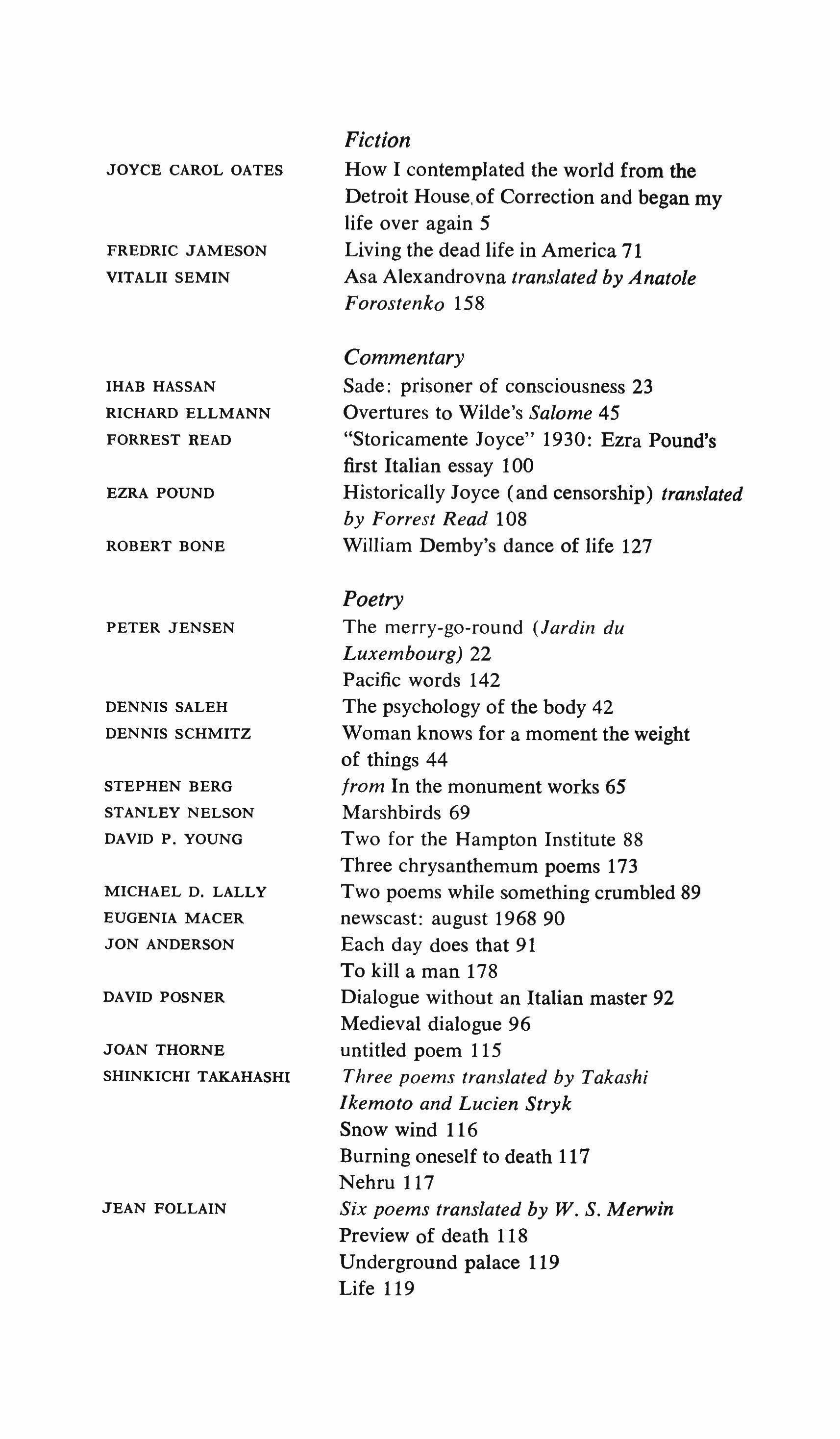
FREDRIC JAMESON
VITALII SEMIN
IHAB HASSAN
RICHARD ELLMANN
FORREST READ
EZRA POUND
ROBERT BONE
PETER JENSEN
DENNIS SALEH
DENNIS SCHMITZ
STEPHEN BERG
STANLEY NELSON
DAVID P. YOUNG
MICHAEL D. LALLY
EUGENIA MACER
JON ANDERSON
DAVID POSNER
JOAN THORNE
SHINKICHI TAKAHASHI
Fiction
How I contemplated the world from the Detroit House, of Correction and began my life over again 5
Living the dead life in America 71
Asa Alexandrovna translated by Anatole Forostenko 158
Commentary
Sade: prisoner of consciousness 23
Overtures to Wilde's Salome 45 "Storicamente Joyce" 1930: Ezra Pound's first Italian essay 1 00
Historically Joyce (and censorship) translated by Forrest Read 108
William Demby's dance of life 127
The merry-go-round (Jardin du Luxembourg) 22
Pacific words 142
The psychology of the body 42 Woman knows for a moment the weight of things 44 from In the monument works 65
Marshbirds 69
Two for the Hampton Institute 88
Three chrysanthemum poems 173
Two poems while something crumbled 89 newscast: august 1968 90
Each day does that 91 To kill a man 178
Dialogue without an Italian master 92
Medieval dialogue 96 untitled poem 115
Three poems translated by Takashi Ikemoto and Lucien Stryk
Snow wind 116
Burning oneself to death 117 Nehru 117
JEAN FOLLAIN
Six poems translated by W. S. Merwin Preview of death 118
Underground palace 119 Life 119
MARTIN HALPERN
KEITH ABBOTT
A. R. AMMONS
PAUL NELSON
MARY COLEMAN
ALEXANDER PUSHKIN
FREDERIC WILL
ROBERT KUSCH
KEN MC CULLOUGH
DAVID RAY
ROBERT MEYER
RICHARD HUGO
RICHARD FROST
ROSEMARY DANIELL
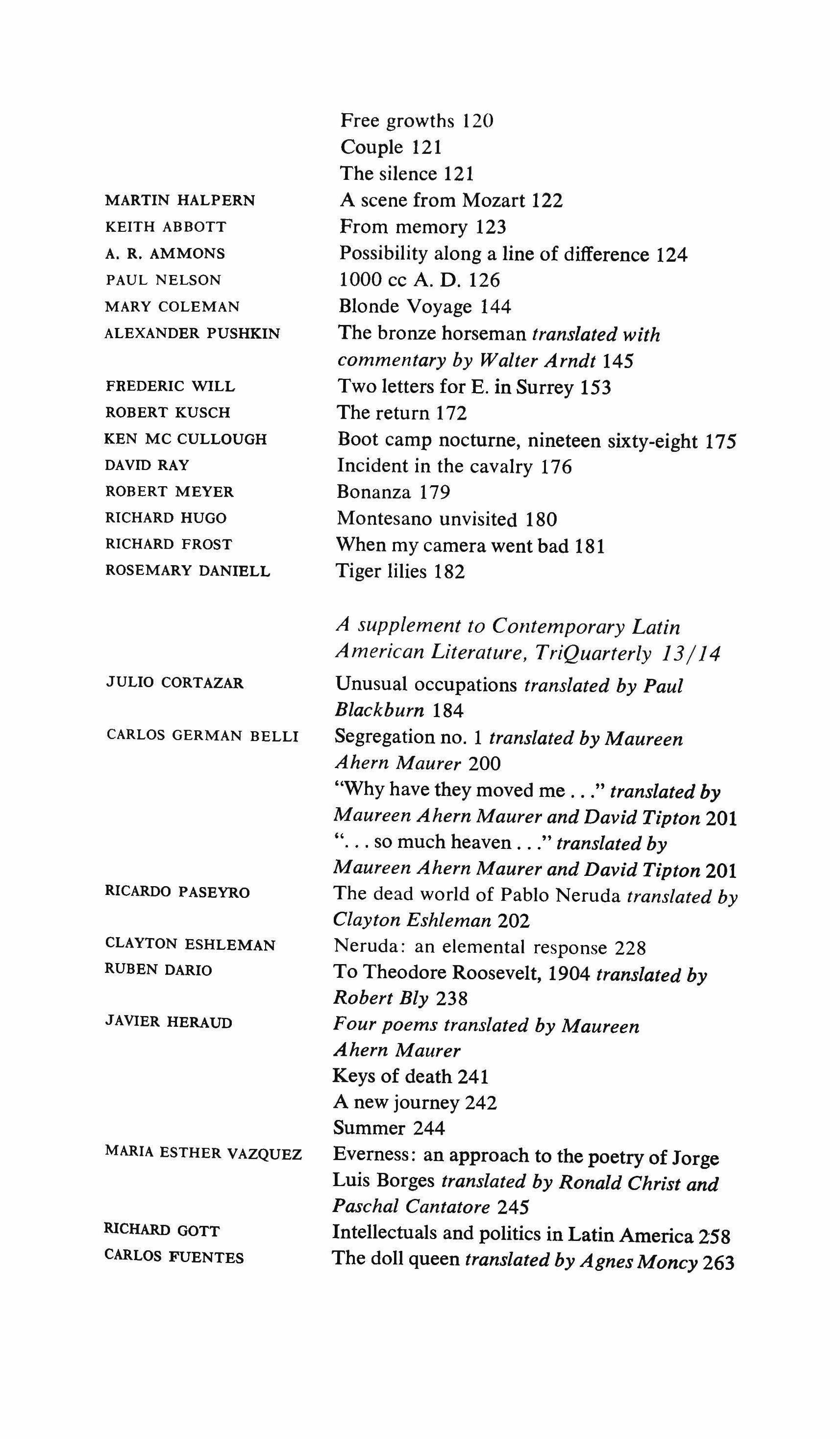
JULIO CORTAZAR
CARLOS GERMAN BELLI
Free growths 120
Couple 121
The silence 121
A scene from Mozart 122
From memory 123
Possibility along a line of difference 124
1000 cc A. D. 126
Blonde Voyage 144
The bronze horseman translated with commentary by Walter Arndt 145
Two letters for E. in Surrey 153
The return 172
Boot camp nocturne, nineteen sixty-eight 175
Incident in the cavalry 176
Bonanza 179
Montesano unvisited 180
When my camera went bad 181 Tiger lilies 182
A supplement to Contemporary Latin American Literature, TriQuarterly 13/14
Unusual occupations translated by Paul Blackburn 184
Segregation no. 1 translated by Maureen Ahern Maurer 200
"Why have they moved me " translated by Maureen Ahern Maurer and David Tipton 201 so much heaven translated by Maureen Ahern Maurer and David Tipton 201
RICARDO PASEYRO
CLAYTON ESHLEMAN
RUBEN DARIO
JAVIER HERAUD
MARIA ESTHER VAZQUEZ
RICHARD GOTT
CARLOS FUENTES
The dead world of Pablo Neruda translated by Clayton Eshleman 202
Neruda: an elemental response 228
To Theodore Roosevelt, 1904 translated by Robert Bly 238
Four poems translated by Maureen Ahern Maurer
Keys of death 241
A new journey 242 Summer 244
Everness: an approach to the poetry of Jorge Luis Borges translated by Ronald Christ and Paschal Cantatore 245
Intellectuals and politics in Latin America 258
The doll queen translated by AgnesMoney 263
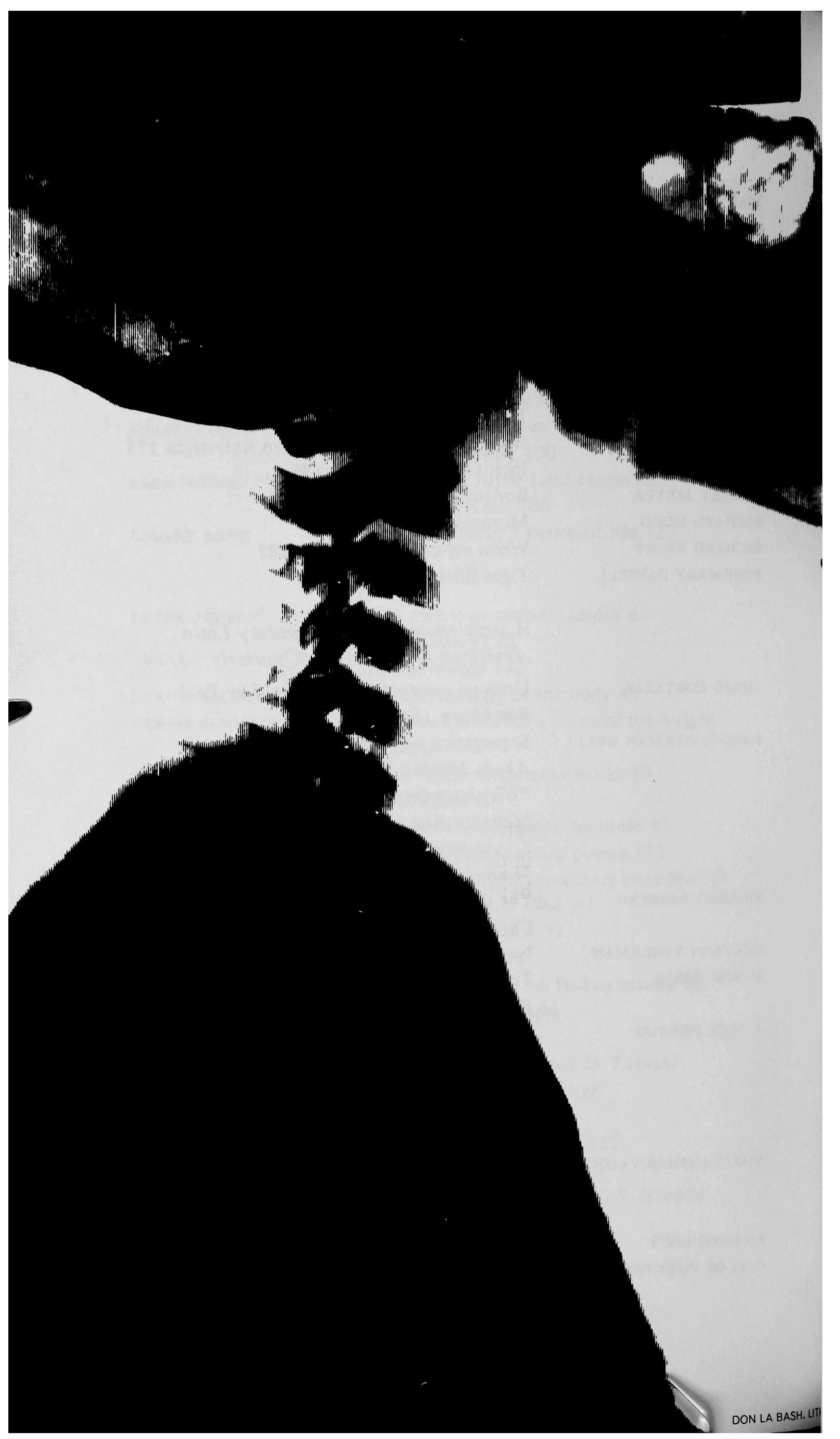
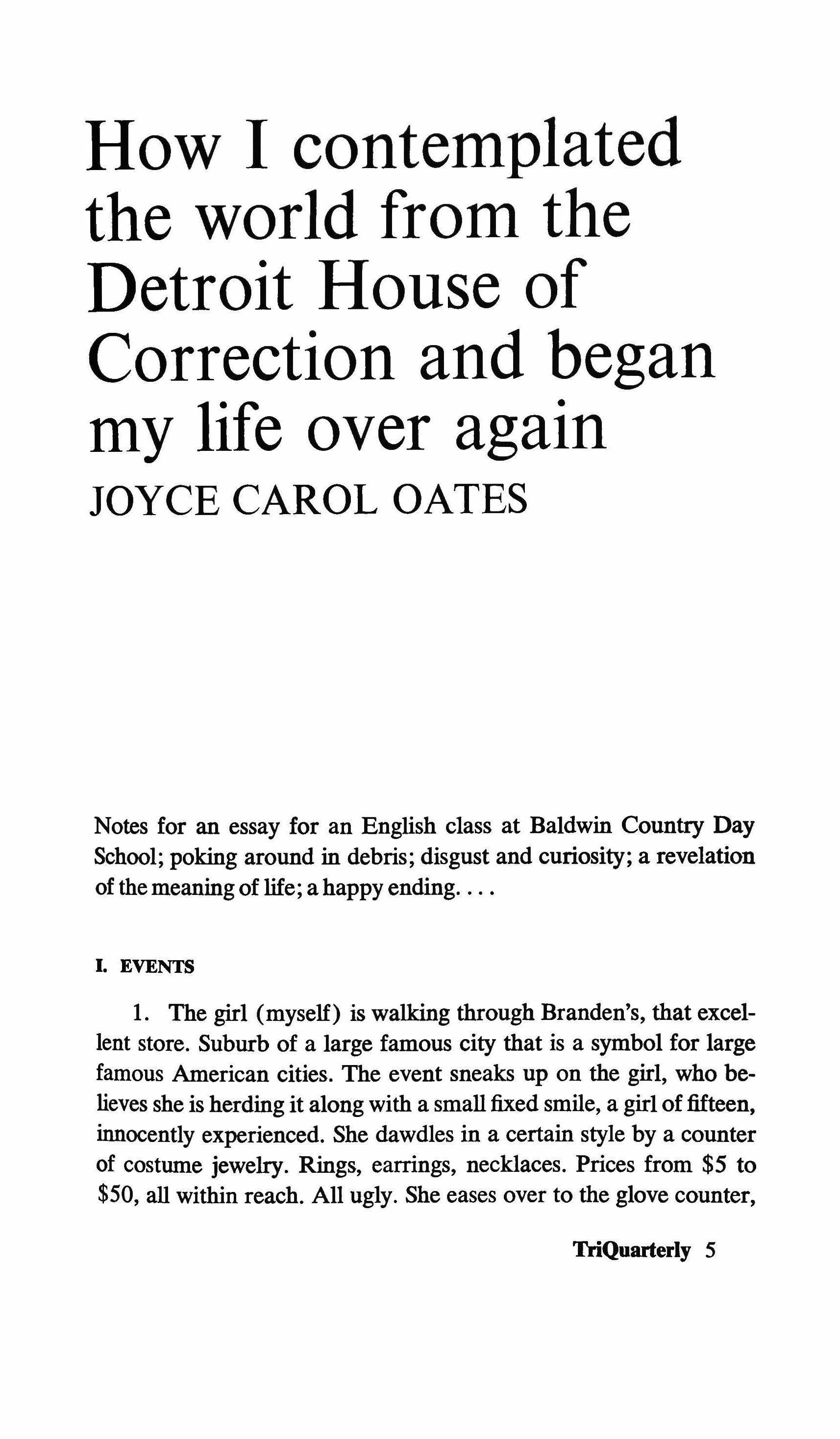
Notes for an essay for an English class at Baldwin Country Day School; poking around in debris; disgust and curiosity; a revelation of the meaning of life; a happy ending
1. The girl (myself) is walking through Branden's, that excellent store. Suburb of a large famous city that is a symbol for large famous American cities. The event sneaks up on the girl, who believes she is herding it along with a small fixed smile, a girl of fifteen, innocently experienced. She dawdles in a certain style by a counter of costume jewelry. Rings, earrings, necklaces. Prices from $5 to $50, all within reach. All ugly. She eases over to the glove counter,
TrlQuarterly 5
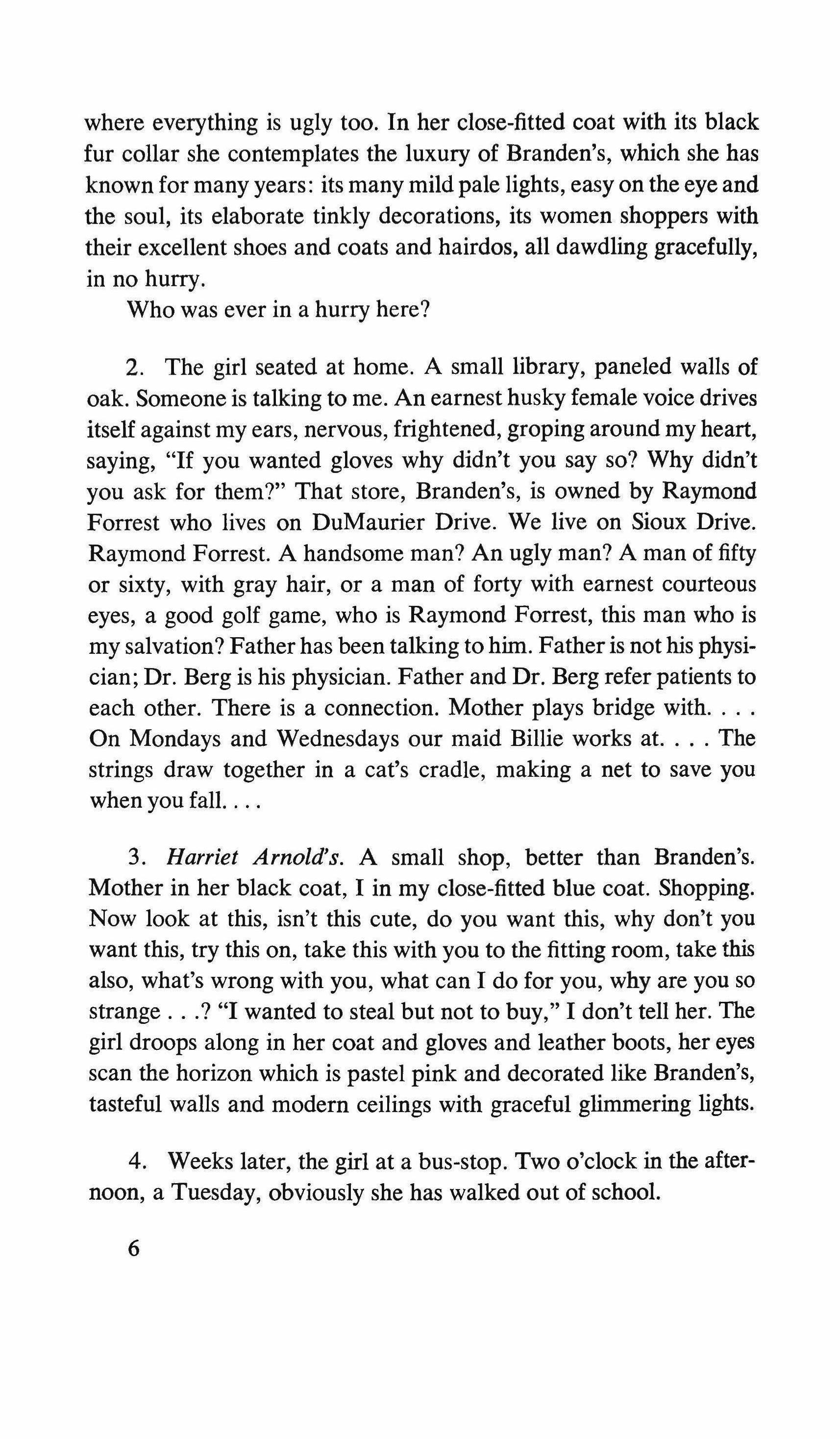
where everything is ugly too. In her close-fitted coat with its black fur collar she contemplates the luxury of Branden's, which she has known for many years: its many mild pale lights, easy on the eye and the soul, its elaborate tinkly decorations, its women shoppers with their excellent shoes and coats and hairdos, all dawdling gracefully, in no hurry.
Who was ever in a hurry here?
2. The girl seated at home. A small library, paneled walls of oak. Someone is talking to me. An earnest husky female voice drives itself against my ears, nervous, frightened, groping around my heart, saying, "If you wanted gloves why didn't you say so? Why didn't you ask for them?" That store, Branden's, is owned by Raymond Forrest who lives on DuMaurier Drive. We live on Sioux Drive. Raymond Forrest. A handsome man? An ugly man? A man of fifty or sixty, with gray hair, or a man of forty with earnest courteous eyes, a good golf game, who is Raymond Forrest, this man who is my salvation? Father has been talking to him. Father is not his physician; Dr. Berg is his physician. Father and Dr. Berg refer patients to each other. There is a connection. Mother plays bridge with On Mondays and Wednesdays our maid Billie works at The strings draw together in a eat's cradle, making a net to save you when you fall
3. Harriet Arnold's. A small shop, better than Branden's. Mother in her black coat, I in my close-fitted blue coat. Shopping. Now look at this, isn't this cute, do you want this, why don't you want this, try this on, take this with you to the fitting room, take this also, what's wrong with you, what can I do for you, why are you so strange ? "I wanted to steal but not to buy," I don't tell her. The girl droops along in her coat and gloves and leather boots, her eyes scan the horizon which is pastel pink and decorated like Branden's, tasteful walls and modern ceilings with graceful glimmering lights.
4. Weeks later, the girl at a bus-stop. Two o'clock in the afternoon, a Tuesday, obviously she has walked out of school.
6
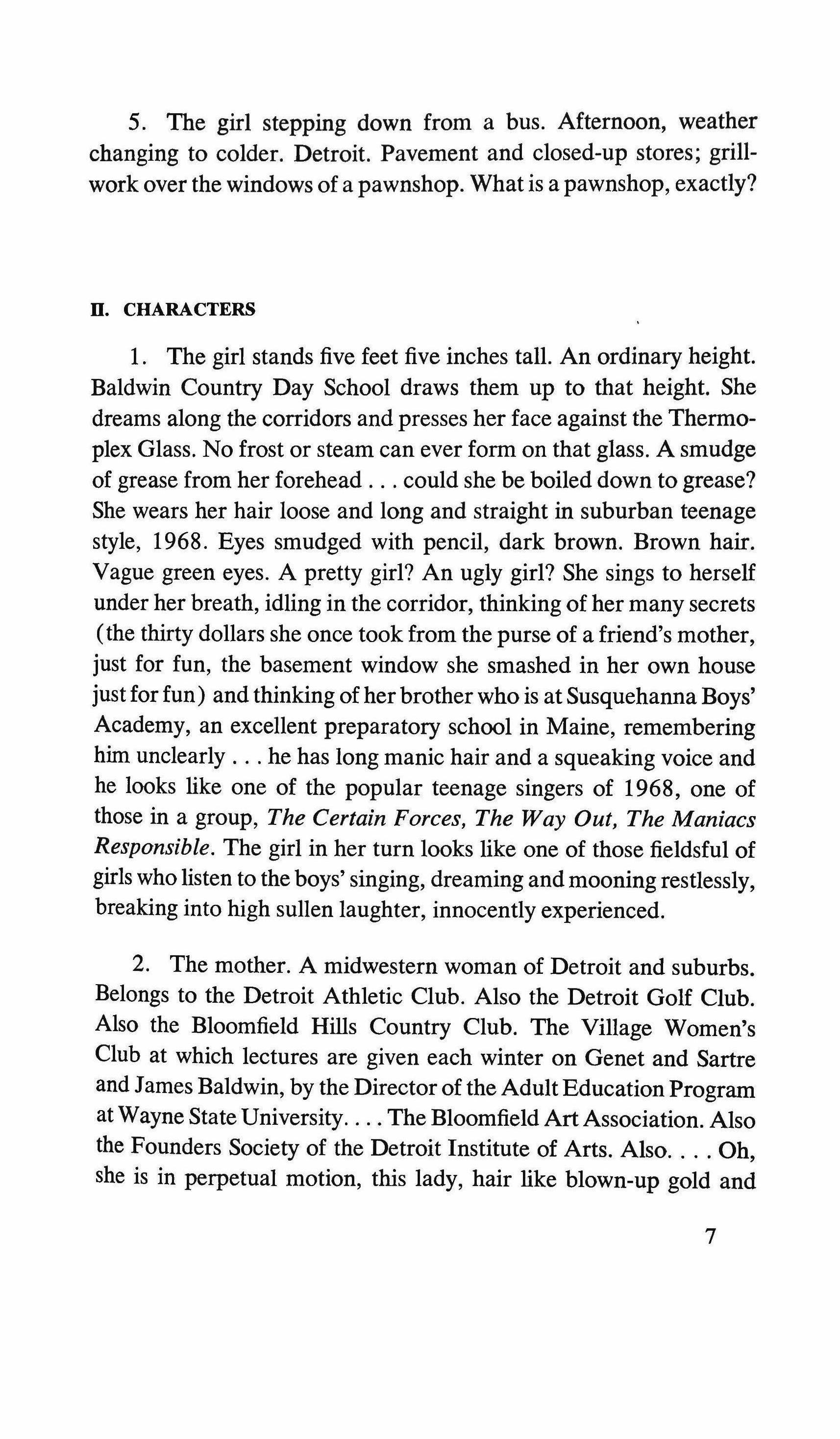
5. The girl stepping down from a bus. Afternoon, weather changing to colder. Detroit. Pavement and closed-up stores; grillwork over the windows of a pawnshop. What is a pawnshop, exactly?
1. The girl stands five feet five inches tall. An ordinary height. Baldwin Country Day School draws them up to that height. She dreams along the corridors and presses her face against the Thermoplex Glass. No frost or steam can ever form on that glass. A smudge of grease from her forehead could she be boiled down to grease? She wears her hair loose and long and straight in suburban teenage style, 1968. Eyes smudged with pencil, dark brown. Brown hair. Vague green eyes. A pretty girl? An ugly girl? She sings to herself under her breath, idling in the corridor, thinking of her many secrets (the thirty dollars she once took from the purse of a friend's mother, just for fun, the basement window she smashed in her own house just for fun) and thinking of her brother who is at Susquehanna Boys' Academy, an excellent preparatory school in Maine, remembering him unclearly he has long manic hair and a squeaking voice and he looks like one of the popular teenage singers of 1968, one of those in a group, The Certain Forces, The Way Out, The Maniacs Responsible. The girl in her turn looks like one of those fieldsful of girls who listen to the boys' singing, dreaming and mooningrestlessly, breaking into high sullen laughter, innocently experienced.
2. The mother. A midwestern woman of Detroit and suburbs. Belongs to the Detroit Athletic Club. Also the Detroit Golf Club. Also the Bloomfield Hills Country Club. The Village Women's Club at which lectures are given each winter on Genet and Sartre and James Baldwin, by the Director of the Adult Education Program at Wayne State University The Bloomfield Art Association. Also the Founders Society of the Detroit Institute of Arts. Also Oh, she is in perpetual motion, this lady, hair like blown-up gold and 7
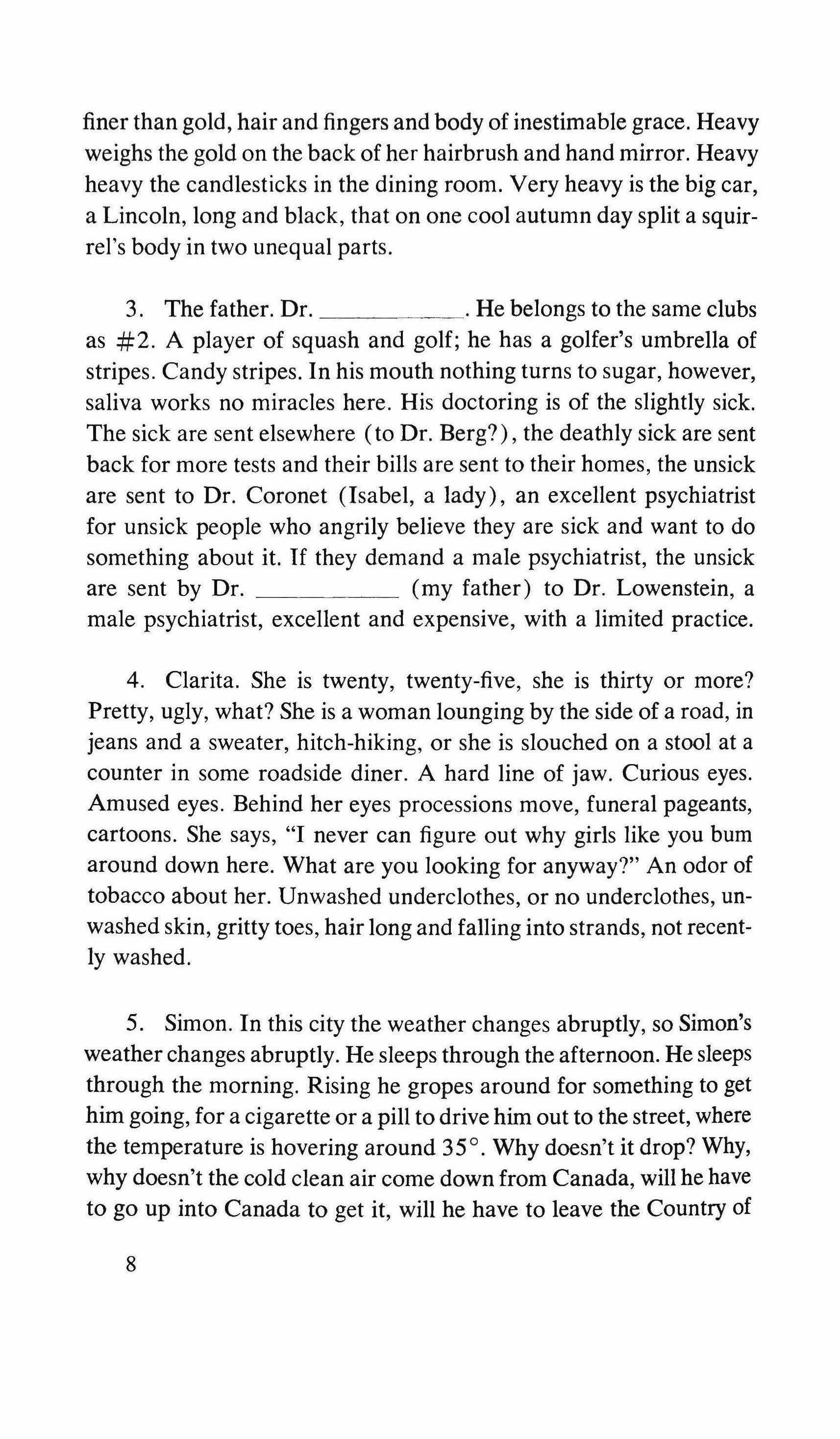
finer than gold, hair and fingers and body of inestimable grace. Heavy weighs the gold on the back of her hairbrush and hand mirror. Heavy heavy the candlesticks in the dining room. Very heavy is the big car, a Lincoln, long and black, that on one cool autumn day split a squirrel's body in two unequal parts.
3. The father. Dr. He belongs to the same clubs as #2. A player of squash and golf; he has a golfer's umbrella of stripes. Candy stripes. In his mouth nothing turns to sugar, however, saliva works no miracles here. His doctoring is of the slightly sick. The sick are sent elsewhere (to Dr. Berg?), the deathly sick are sent back for more tests and their bills are sent to their homes, the unsick are sent to Dr. Coronet (Isabel, a lady), an excellent psychiatrist for unsick people who angrily believe they are sick and want to do something about it. If they demand a male psychiatrist, the unsick are sent by Dr. (my father) to Dr. Lowenstein, a male psychiatrist, excellent and expensive, with a limited practice.
4. Clarita. She is twenty, twenty-five, she is thirty or more? Pretty, ugly, what? She is a woman lounging by the side of a road, in jeans and a sweater, hitch-hiking, or she is slouched on a stool at a counter in some roadside diner. A hard line of jaw. Curious eyes. Amused eyes. Behind her eyes processions move, funeral pageants, cartoons. She says, "I never can figure out why girls like you bum around down here. What are you looking for anyway?" An odor of tobacco about her. Unwashed underclothes, or no underclothes, unwashed skin, gritty toes, hair long and falling into strands, not recently washed.
5. Simon. In this city the weather changes abruptly, so Simon's weather changes abruptly. He sleeps through the afternoon. He sleeps through the morning. Rising he gropes around for something to get him going, for a cigarette or a pill to drive him out to the street, where the temperature is hovering around 35°. Why doesn't it drop? Why, why doesn't the cold clean air come down from Canada, will he have to go up into Canada to get it, will he have to leave the Country of
8
his Birth and sink into Canada's frosty fields ? Will the F.B.I. (which he dreams about constantly) chase him over the Canadian border on foot, hounded out in a blizzard of broken glass and horns ?
"Once I was Huckleberry Finn," Simon says, "but now I am Roderick Usher." Beset by frenzies and fears, this man who makes my spine go cold, he takes green pills, yellow pills, pills of white and capsules of dark blue and green he takes other things I may not mention, for what if Simon seeks me out and climbs into my girl's bedroom here in Bloomfield Hills and strangles me, what then ? (As I write this I begin to shiver. Why do I shiver? I am now sixteen and sixteen is not an age for shivering.) It comes from Simon, who is always cold.
rn. WORLD EVENTS
Nothing.
IV. PEOPLE & CIRCUMSTANCES CONTRIBUTING TO THIS DELINQUENCY
Nothing.
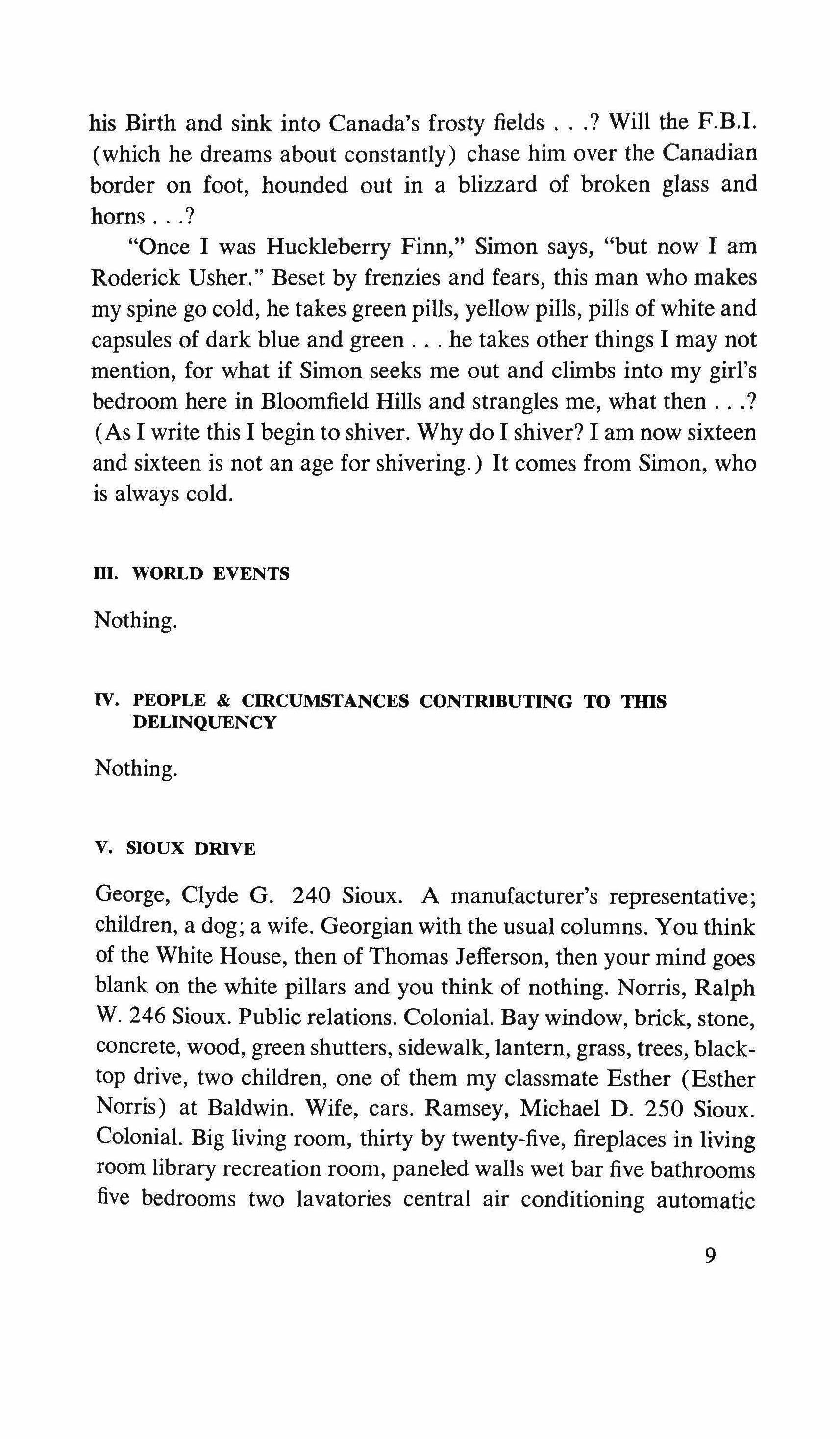
V. SIOUX DRIVE
George, Clyde G. 240 Sioux. A manufacturer's representative; children, a dog; a wife. Georgian with the usual columns. You think of the White House, then of Thomas Jefferson, then your mind goes blank on the white pillars and you think of nothing. Norris, Ralph W. 246 Sioux. Public relations. Colonial. Bay window, brick, stone, concrete, wood, green shutters, sidewalk, lantern, grass, trees, blacktop drive, two children, one of them my classmate Esther (Esther Norris) at Baldwin. Wife, cars. Ramsey, Michael D. 250 Sioux. Colonial. Big living room, thirty by twenty-five, fireplaces in living room library recreation room, paneled walls wet bar five bathrooms five bedrooms two lavatories central air conditioning automatic
9
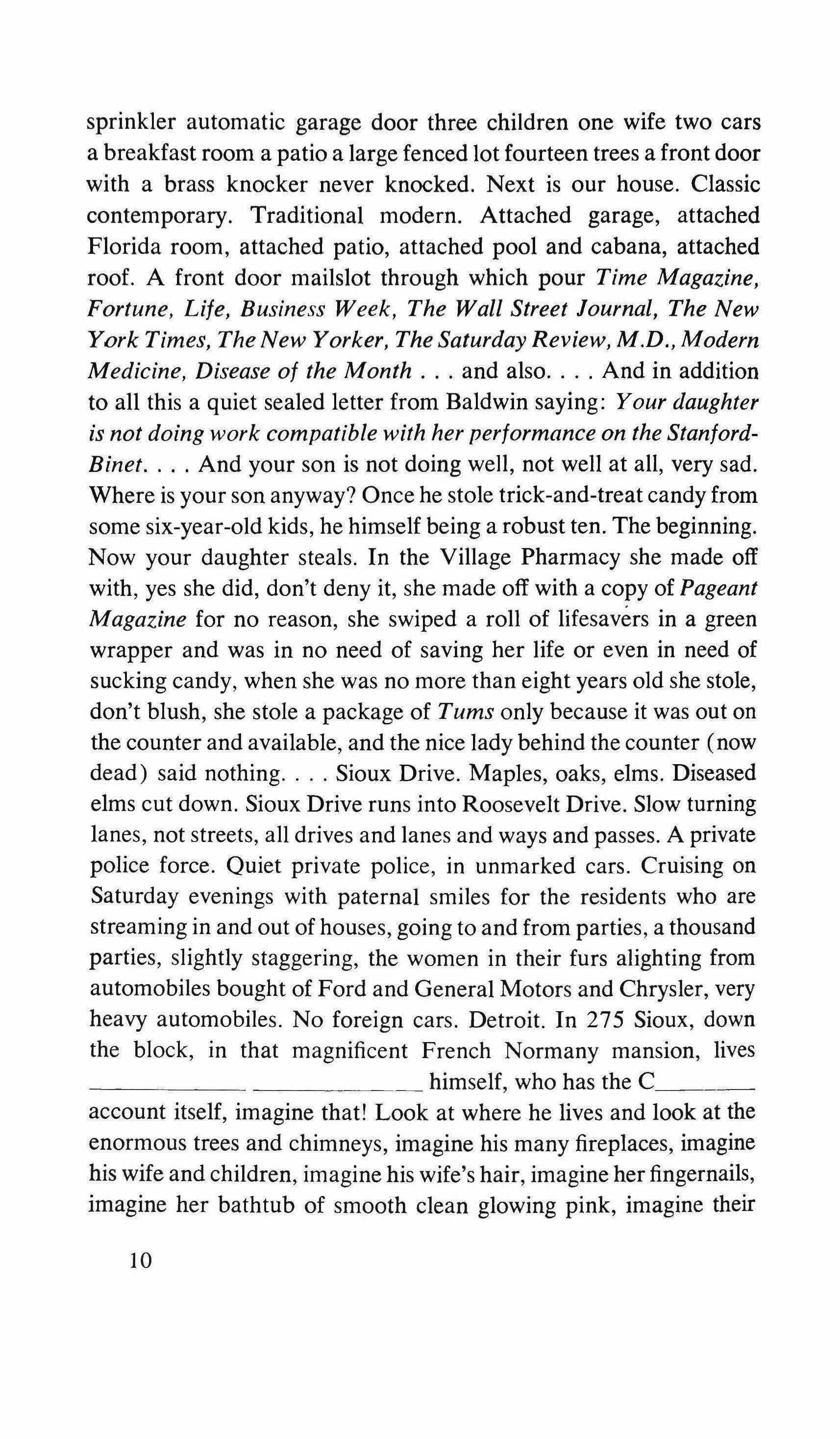
sprinkler automatic garage door three children one wife two cars a breakfast room a patio a large fenced lot fourteen trees a front door with a brass knocker never knocked. Next is our house. Classic contemporary. Traditional modern. Attached garage, attached Florida room, attached patio, attached pool and cabana, attached roof. A front door mailslot through which pour Time Magazine, Fortune, Life, Business Week, The Wall Street Journal, The New York Times, The New Yorker, The Saturday Review, M.D., Modern Medicine, Disease of the Month and also And in addition to all this a quiet sealed letter from Baldwin saying: Your daughter is not doing work compatible with her performance on the StanfordBinet And your son is not doing well, not well at all, very sad. Where is your son anyway? Once he stole trick-and-treat candy from some six-year-old kids, he himself being a robust ten. The beginning. Now your daughter steals. In the Village Pharmacy she made off with, yes she did, don't deny it, she made off with a copy of Pageant Magazine for no reason, she swiped a roll of lifesavers in a green wrapper and was in no need of saving her life or even in need of sucking candy, when she was no more than eight years old she stole, don't blush, she stole a package of Tums only because it was out on the counter and available, and the nice lady behind the counter (now dead) said nothing Sioux Drive. Maples, oaks, elms. Diseased elms cut down. Sioux Drive runs into Roosevelt Drive. Slow turning lanes, not streets, all drives and lanes and ways and passes. A private police force. Quiet private police, in unmarked cars. Cruising on Saturday evenings with paternal smiles for the residents who are streaming in and out of houses, going to and from parties, a thousand parties, slightly staggering, the women in their furs alighting from automobiles bought of Ford and General Motors and Chrysler, very heavy automobiles. No foreign cars. Detroit. In 275 Sioux, down the block, in that magnificent French Normany mansion, lives himself, who has the C account itself, imagine that! Look at where he lives and look at the enormous trees and chimneys, imagine his many fireplaces, imagine his wife and children, imagine his wife's hair, imagine her fingernails, imagine her bathtub of smooth clean glowing pink, imagine their
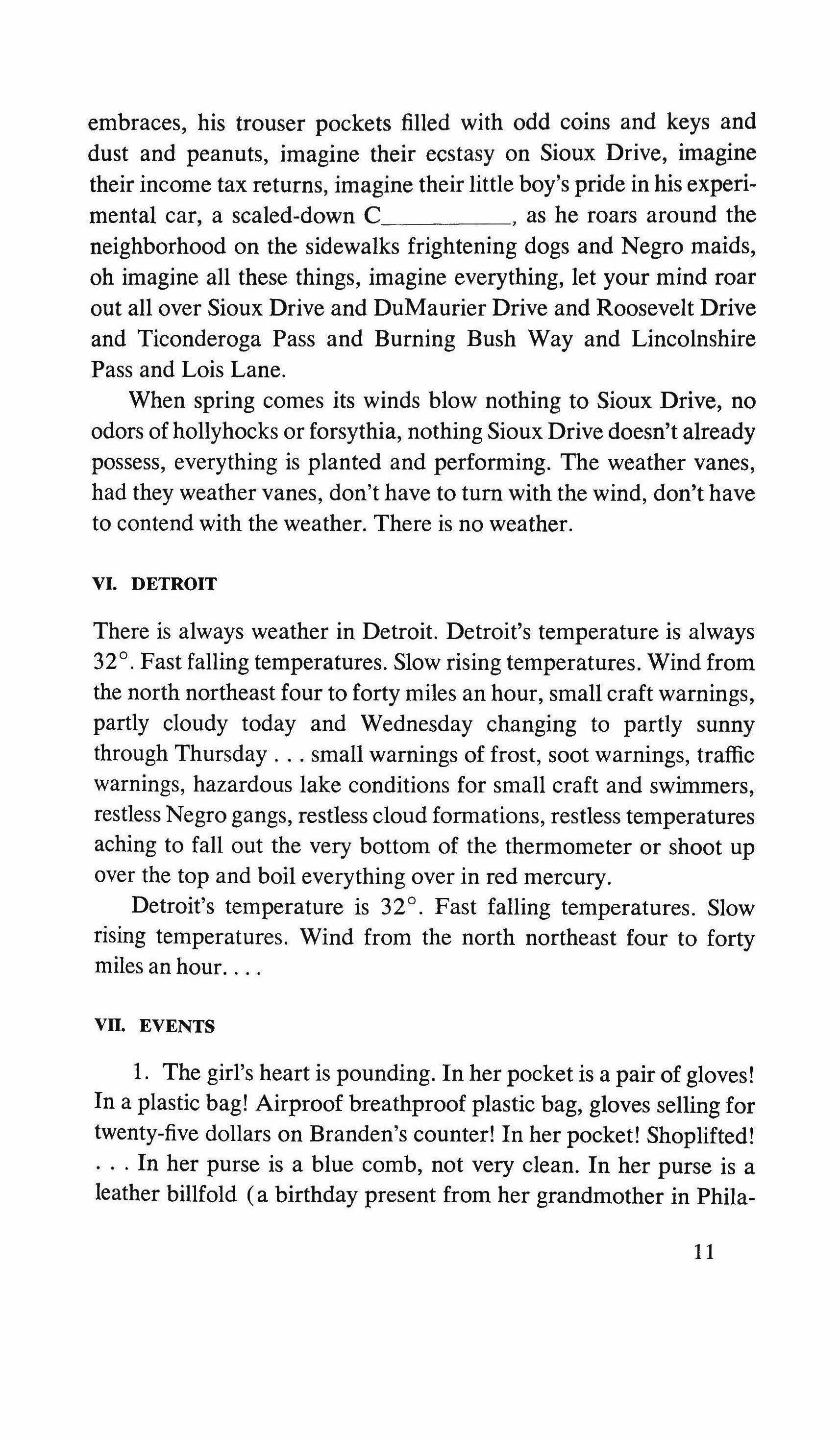
embraces, his trouser pockets filled with odd coins and keys and dust and peanuts, imagine their ecstasy on Sioux Drive, imagine their income tax returns, imagine their little boy's pride in his experimental car, a scaled-down C as he roars around the neighborhood on the sidewalks frightening dogs and Negro maids, oh imagine all these things, imagine everything, let your mind roar out all over Sioux Drive and DuMaurier Drive and Roosevelt Drive and Ticonderoga Pass and Burning Bush Way and Lincolnshire Pass and Lois Lane.
When spring comes its winds blow nothing to Sioux Drive, no odors of hollyhocks or forsythia, nothing Sioux Drive doesn't already possess, everything is planted and performing. The weather vanes, had they weather vanes, don't have to tum with the wind, don't have to contend with the weather. There is no weather.
There is always weather in Detroit. Detroit's temperature is always 32°. Fast falling temperatures. Slow rising temperatures. Wind from the north northeast four to forty miles an hour, small craft warnings, partly cloudy today and Wednesday changing to partly sunny through Thursday small warnings of frost, soot warnings, traffic warnings, hazardous lake conditions for small craft and swimmers, restless Negro gangs, restless cloud formations, restless temperatures aching to fall out the very bottom of the thermometer or shoot up over the top and boil everything over in red mercury.
Detroit's temperature is 32°. Fast falling temperatures. Slow rising temperatures. Wind from the north northeast four to forty miles an hour
1. The girl's heart is pounding. In her pocket is a pair of gloves! In a plastic bag! Airproof breathproof plastic bag, gloves selling for twenty-five dollars on Branden's counter! In her pocket! Shoplifted! In her purse is a blue comb, not very clean. In her purse is a leather billfold (a birthday present from her grandmother in Phila-
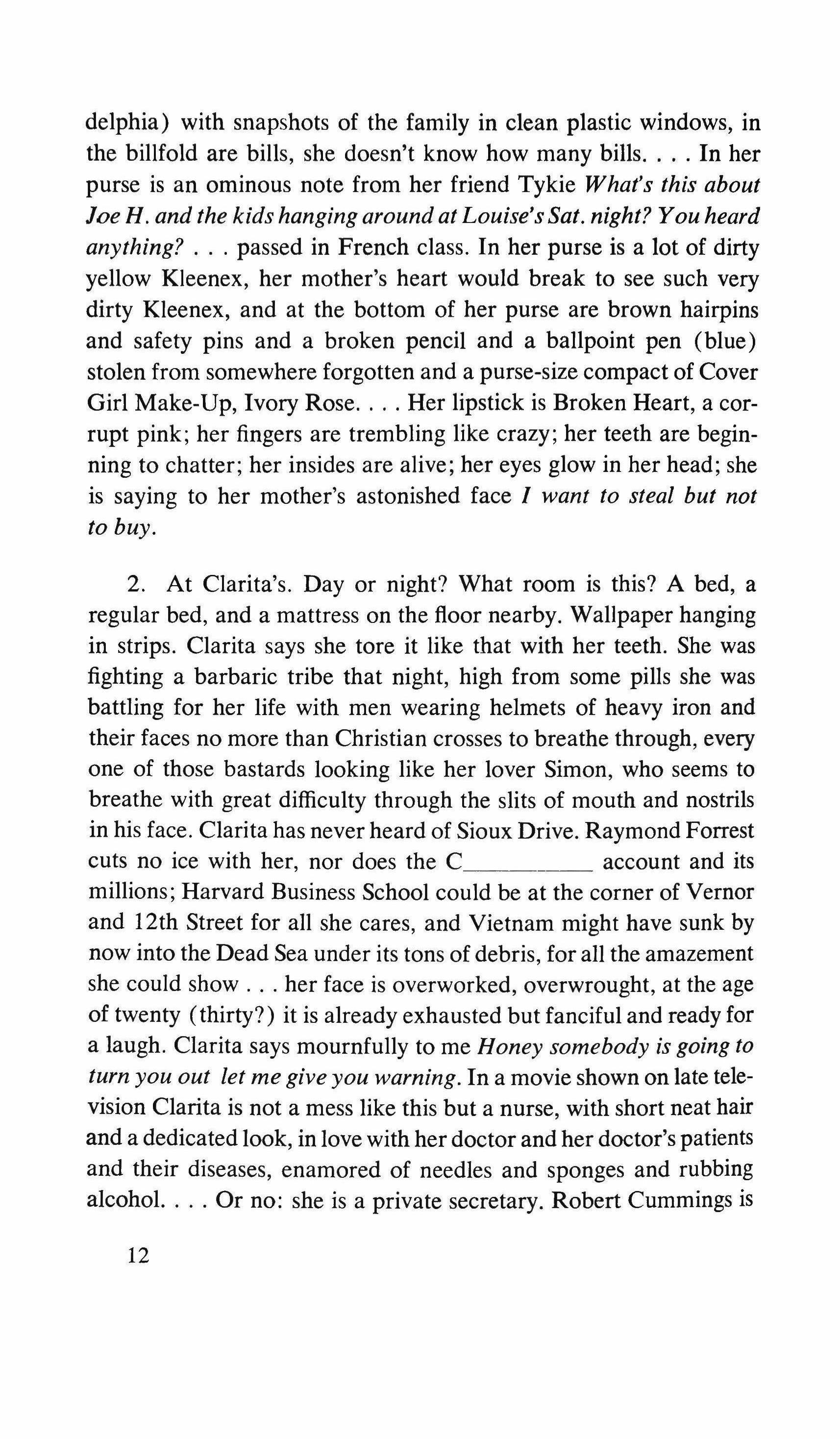
delphia) with snapshots of the family in clean plastic windows, in the billfold are bills, she doesn't know how many bills In her purse is an ominous note from her friend Tykie What's this about Joe H. and the kids hanging around at Louise's Sat. night? You heard anything? passed in French class. In her purse is a lot of dirty yellow Kleenex, her mother's heart would break to see such very dirty Kleenex, and at the bottom of her purse are brown hairpins and safety pins and a broken pencil and a ballpoint pen (blue) stolen from somewhere forgotten and a purse-size compact of Cover Girl Make-Up, Ivory Rose Her lipstick is Broken Heart, a corrupt pink; her fingers are trembling like crazy; her teeth are beginning to chatter; her insides are alive; her eyes glow in her head; she is saying to her mother's astonished face I want to steal but not to buy.
2. At Clarita's. Day or night? What room is this? A bed, a regular bed, and a mattress on the floor nearby. Wallpaper hanging in strips. Clarita says she tore it like that with her teeth. She was fighting a barbaric tribe that night, high from some pills she was battling for her life with men wearing helmets of heavy iron and their faces no more than Christian crosses to breathe through, every one of those bastards looking like her lover Simon, who seems to breathe with great difficulty through the slits of mouth and nostrils in his face. Clarita has never heard of Sioux Drive. Raymond Forrest cuts no ice with her, nor does the C account and its millions; Harvard Business School could be at the corner of Vernor and 12th Street for all she cares, and Vietnam might have sunk by now into the Dead Sea under its tons of debris, for all the amazement she could show her face is overworked, overwrought, at the age of twenty (thirty?) it is already exhausted but fanciful and ready for a laugh. Clarita says mournfully to me Honey somebody is going to turn you out let me give you warning. In a movie shown on late television Clarita is not a mess like this but a nurse, with short neat hair and a dedicated look, in love with her doctor and her doctor's patients and their diseases, enamored of needles and sponges and rubbing alcohol. Or no: she is a private secretary. Robert Cummings is 12
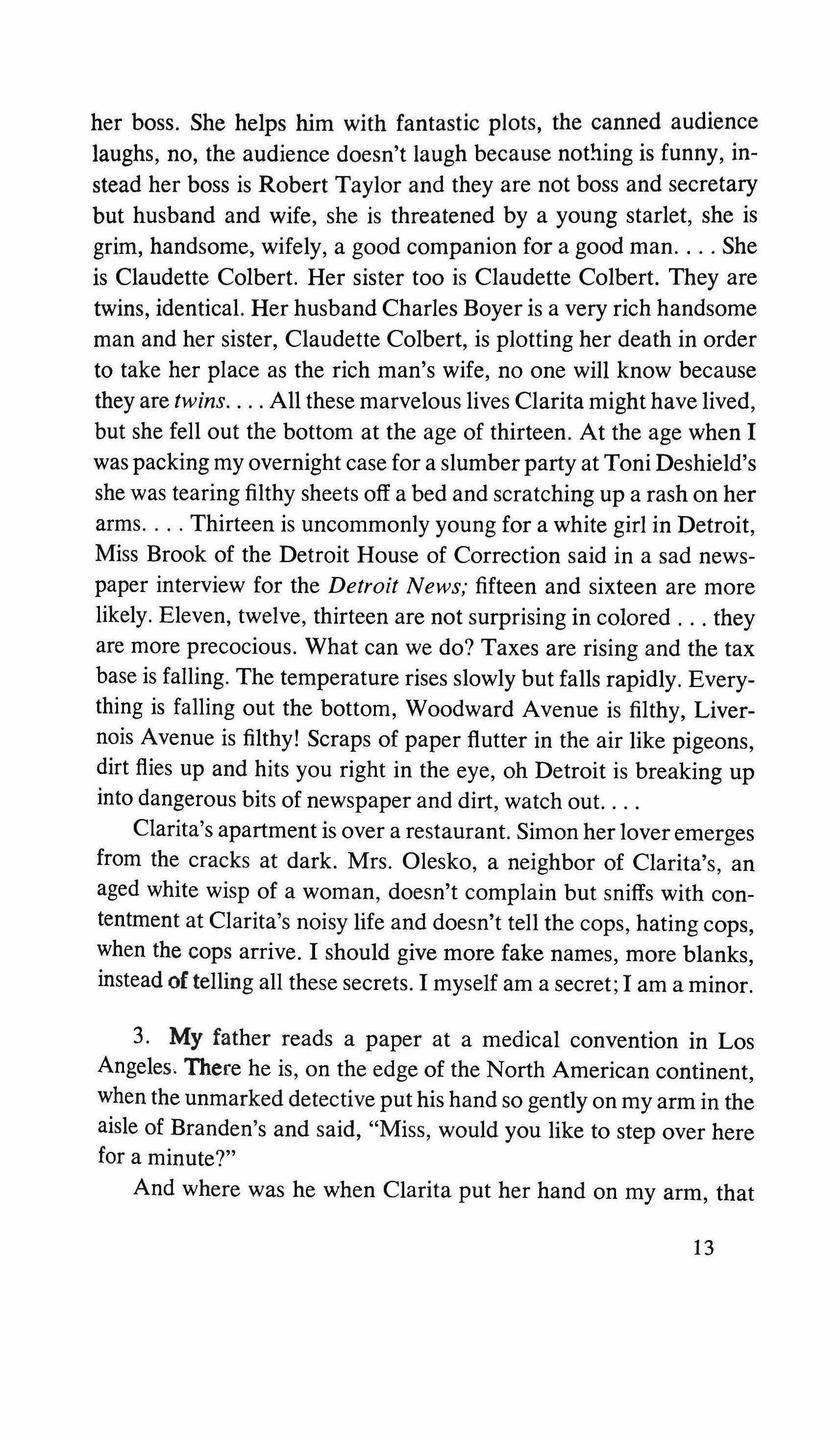
her boss. She helps him with fantastic plots, the canned audience laughs, no, the audience doesn't laugh because nothing is funny, instead her boss is Robert Taylor and they are not boss and secretary but husband and wife, she is threatened by a young starlet, she is grim, handsome, wifely, a good companion for a good man She is Claudette Colbert. Her sister too is Claudette Colbert. They are twins, identical. Her husband Charles Boyer is a very rich handsome man and her sister, Claudette Colbert, is plotting her death in order to take her place as the rich man's wife, no one will know because they are twins
All these marvelous lives Clarita might have lived, but she fell out the bottom at the age of thirteen. At the age when I was packing my overnight case for a slumber party at Toni Deshield's she was tearing filthy sheets off a bed and scratching up a rash on her arms Thirteen is uncommonly young for a white girl in Detroit, Miss Brook of the Detroit House of Correction said in a sad newspaper interview for the Detroit News; fifteen and sixteen are more likely. Eleven, twelve, thirteen are not surprising in colored they are more precocious. What can we do? Taxes are rising and the tax base is falling. The temperature rises slowly but falls rapidly. Everything is falling out the bottom, Woodward Avenue is filthy, Livernois Avenue is filthy! Scraps of paper flutter in the air like pigeons, dirt flies up and hits you right in the eye, oh Detroit is breaking up into dangerous bits of newspaper and dirt, watch out.
Clarita's apartment is over a restaurant. Simon her lover emerges from the cracks at dark. Mrs. Olesko, a neighbor of Clarita's, an aged white wisp of a woman, doesn't complain but sniffs with contentment at Clarita's noisy life and doesn't tell the cops, hating cops, when the cops arrive. I should give more fake names, more blanks, instead of telling all these secrets. I myself am a secret; I am a minor.
3. My father reads a paper at a medical convention in Los Angeles. There he is, on the edge of the North American continent, when the unmarked detective put his hand so gently on my arm in the aisle of Branden's and said, "Miss, would you like to step over here for a minute?"
And where was he when Clarita put her hand on my arm, that 13
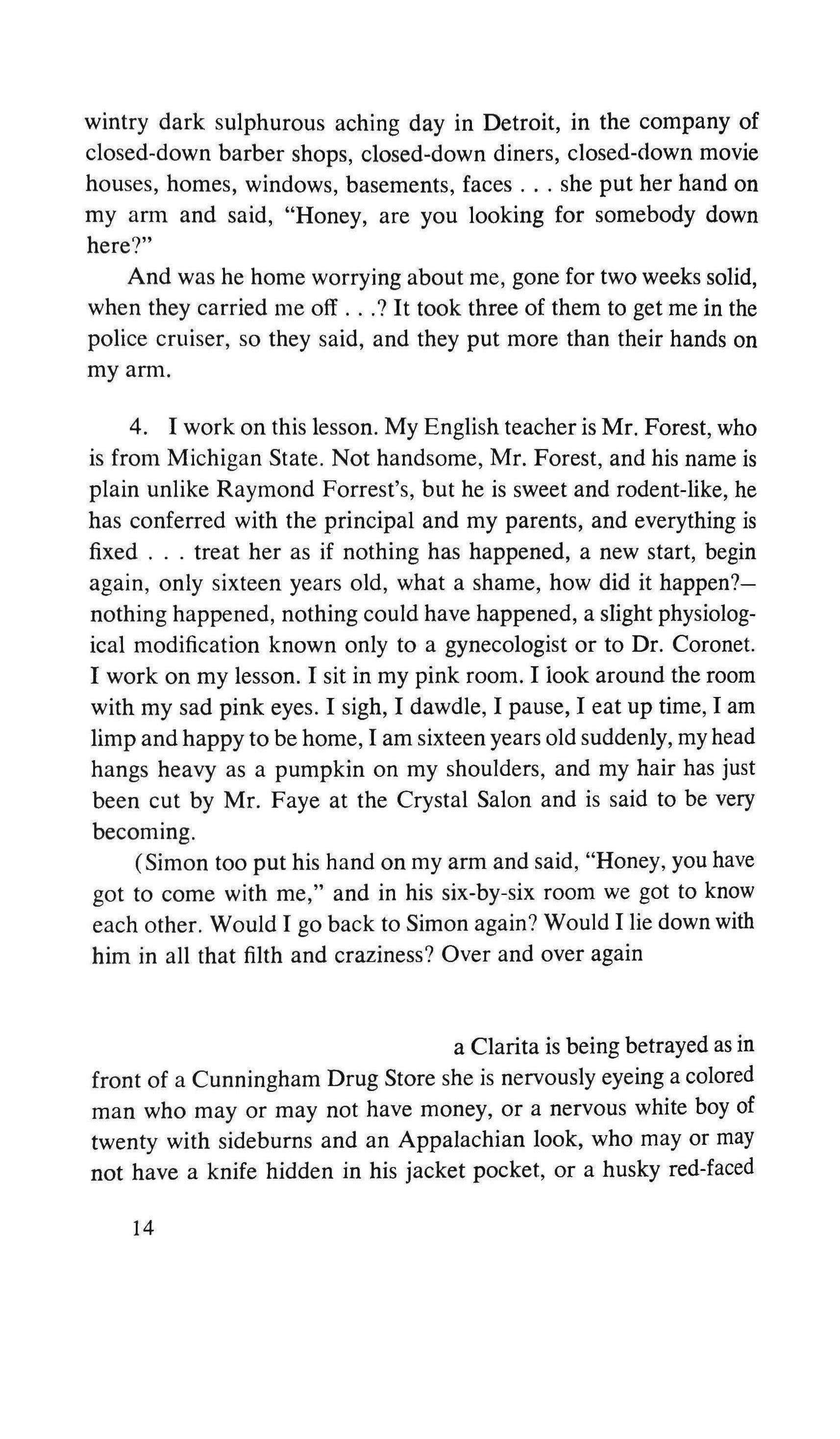
wintry dark sulphurous aching day in Detroit, in the company of closed-down barber shops, closed-down diners, closed-down movie houses, homes, windows, basements, faces she put her hand on my arm and said, "Honey, are you looking for somebody down here?"
And was he home worrying about me, gone for two weeks solid, when they carried me off ? It took three of them to get me in the police cruiser, so they said, and they put more than their hands on my arm.
4. I work on this lesson. My English teacher is Mr. Forest, who is from Michigan State. Not handsome, Mr. Forest, and his name is plain unlike Raymond Forrest's, but he is sweet and rodent-like, he has conferred with the principal and my parents, and everything is fixed treat her as if nothing has happened, a new start, begin again, only sixteen years old, what a shame, how did it happen?nothing happened, nothing could have happened, a slight physiological modification known only to a gynecologist or to Dr. Coronet. I work on my lesson. I sit in my pink room. I look around the room with my sad pink eyes. I sigh, I dawdle, I pause, I eat up time, I am limp and happy to be home, I am sixteen years old suddenly, my head hangs heavy as a pumpkin on my shoulders, and my hair has just been cut by Mr. Faye at the Crystal Salon and is said to be very becoming.
(Simon too put his hand on my arm and said, "Honey, you have got to come with me," and in his six-by-six room we got to know each other. Would I go back to Simon again? Would I lie down with him in all that filth and craziness? Over and over again
a Clarita is being betrayed as in front of a Cunningham Drug Store she is nervously eyeing a colored man who mayor may not have money, or a nervous white boy of twenty with sideburns and an Appalachian look, who mayor may not have a knife hidden in his jacket pocket, or a husky red-faced
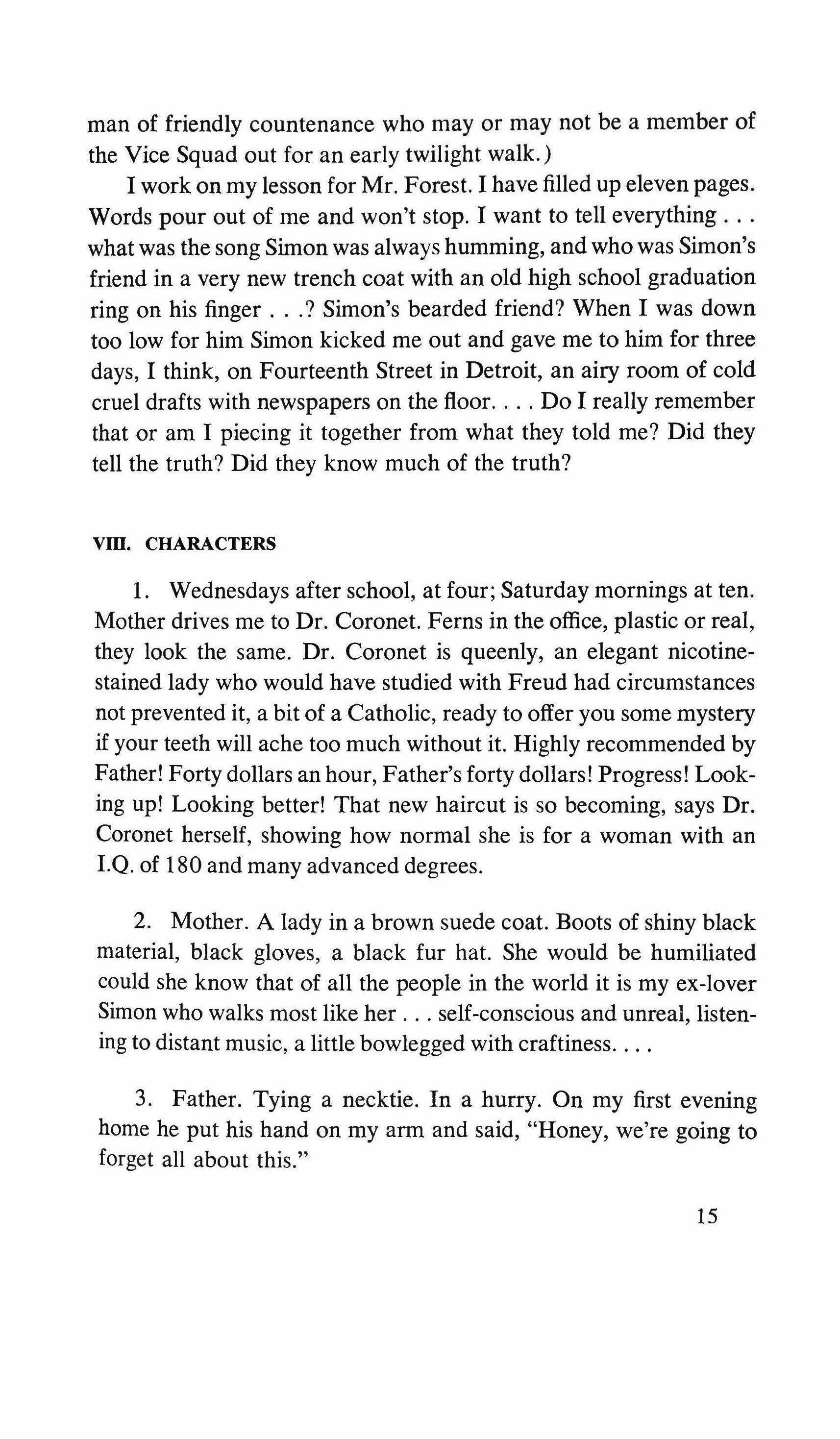
man of friendly countenance who mayor may not be a member of the Vice Squad out for an early twilight walk.)
I work on my lesson for Mr. Forest. I have filled up eleven pages. Words pour out of me and won't stop. I want to tell everything what was the song Simon was always humming, and who was Simon's friend in a very new trench coat with an old high school graduation ring on his finger ? Simon's bearded friend? When I was down too low for him Simon kicked me out and gave me to him for three days, I think, on Fourteenth Street in Detroit, an airy room of cold cruel drafts with newspapers on the floor Do I really remember that or am I piecing it together from what they told me? Did they tell the truth? Did they know much of the truth?
1. Wednesdays after school, at four; Saturday mornings at ten. Mother drives me to Dr. Coronet. Ferns in the office, plastic or real, they look the same. Dr. Coronet is queenly, an elegant nicotinestained lady who would have studied with Freud had circumstances not prevented it, a bit of a Catholic, ready to offer you some mystery if your teeth will ache too much without it. Highly recommended by Father! Forty dollars an hour, Father's forty dollars! Progress! Looking up! Looking better! That new haircut is so becoming, says Dr. Coronet herself, showing how normal she is for a woman with an 1.Q. of 180 and many advanced degrees.
2. Mother. A lady in a brown suede coat. Boots of shiny black material, black gloves, a black fur hat. She would be humiliated could she know that of all the people in the world it is my ex-lover Simon who walks most like her self-conscious and unreal, listening to distant music, a little bowlegged with craftiness
3. Father. Tying a necktie. In a hurry. On my first evening home he put his hand on my arm and said, "Honey, we're going to forget all about this."
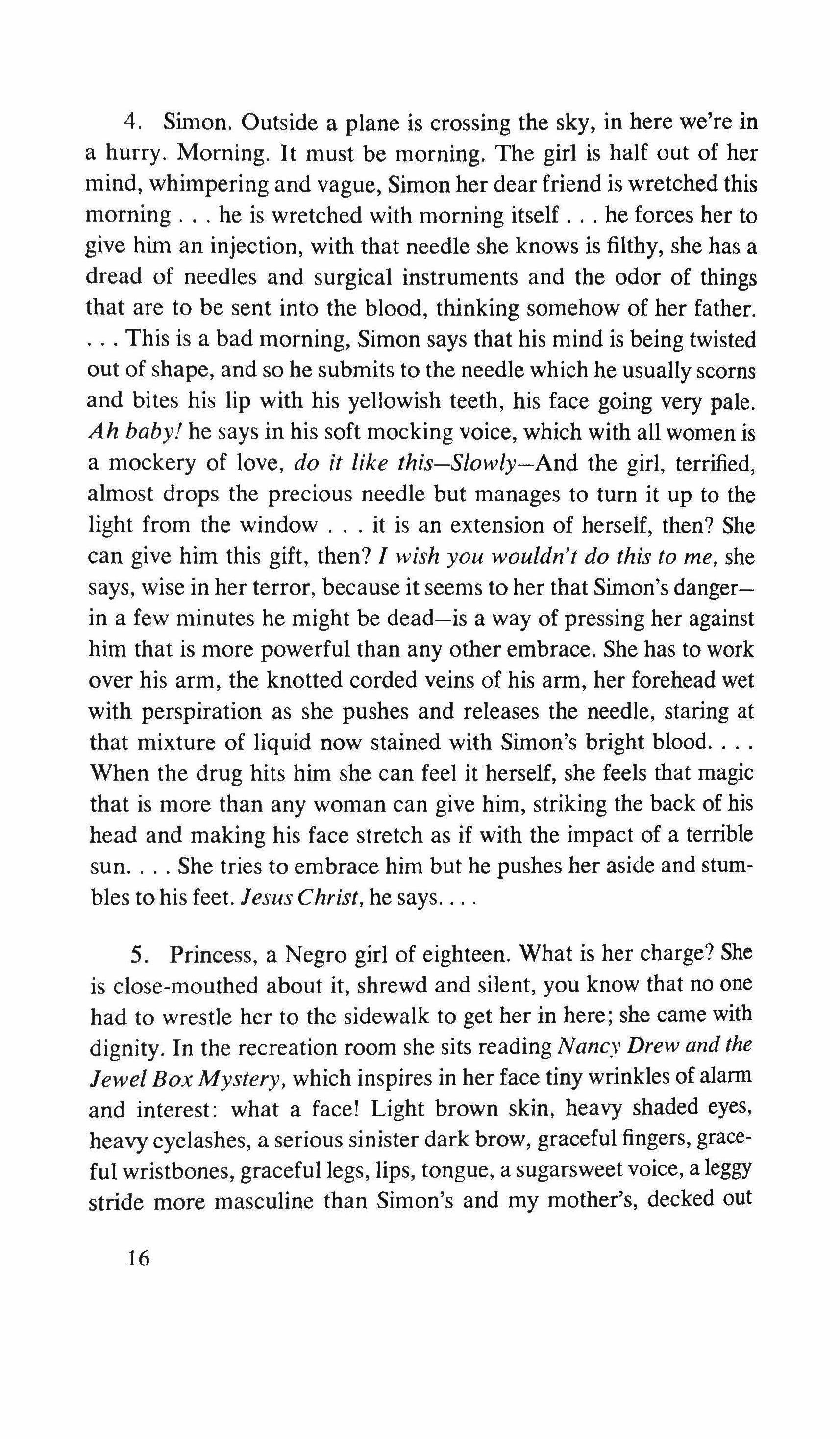
4. Simon. Outside a plane is crossing the sky, in here we're in a hurry. Morning. It must be morning. The girl is half out of her mind, whimpering and vague, Simon her dear friend is wretched this morning he is wretched with morning itself he forces her to give him an injection, with that needle she knows is filthy, she has a dread of needles and surgical instruments and the odor of things that are to be sent into the blood, thinking somehow of her father This is a bad morning, Simon says that his mind is being twisted out of shape, and so he submits to the needle which he usually scorns and bites his lip with his yellowish teeth, his face going very pale. Ah baby! he says in his soft mocking voice, which with all women is a mockery of love, do it like this-Slowly-And the girl, terrified, almost drops the precious needle but manages to turn it up to the light from the window it is an extension of herself, then? She can give him this gift, then? I wish you wouldn't do this to me, she says, wise in her terror, because it seems to her that Simon's dangerin a few minutes he might be dead-is a way of pressing her against him that is more powerful than any other embrace. She has to work over his arm, the knotted corded veins of his arm, her forehead wet with perspiration as she pushes and releases the needle, staring at that mixture of liquid now stained with Simon's bright blood When the drug hits him she can feel it herself, she feels that magic that is more than any woman can give him, striking the back of his head and making his face stretch as if with the impact of a terrible sun She tries to embrace him but he pushes her aside and stumbles to his feet. Jesus Christ, he says
5. Princess, a Negro girl of eighteen. What is her charge? She is close-mouthed about it, shrewd and silent, you know that no one had to wrestle her to the sidewalk to get her in here; she came with dignity. In the recreation room she sits reading Nancy Drew and the Jewel Box Mystery, which inspires in her face tiny wrinkles of alarm and interest: what a face! Light brown skin, heavy shaded eyes, heavy eyelashes, a serious sinister dark brow, graceful fingers, graceful wristbones, graceful legs, lips, tongue, a sugarsweetvoice, a leggy stride more masculine than Simon's and my mother's, decked out
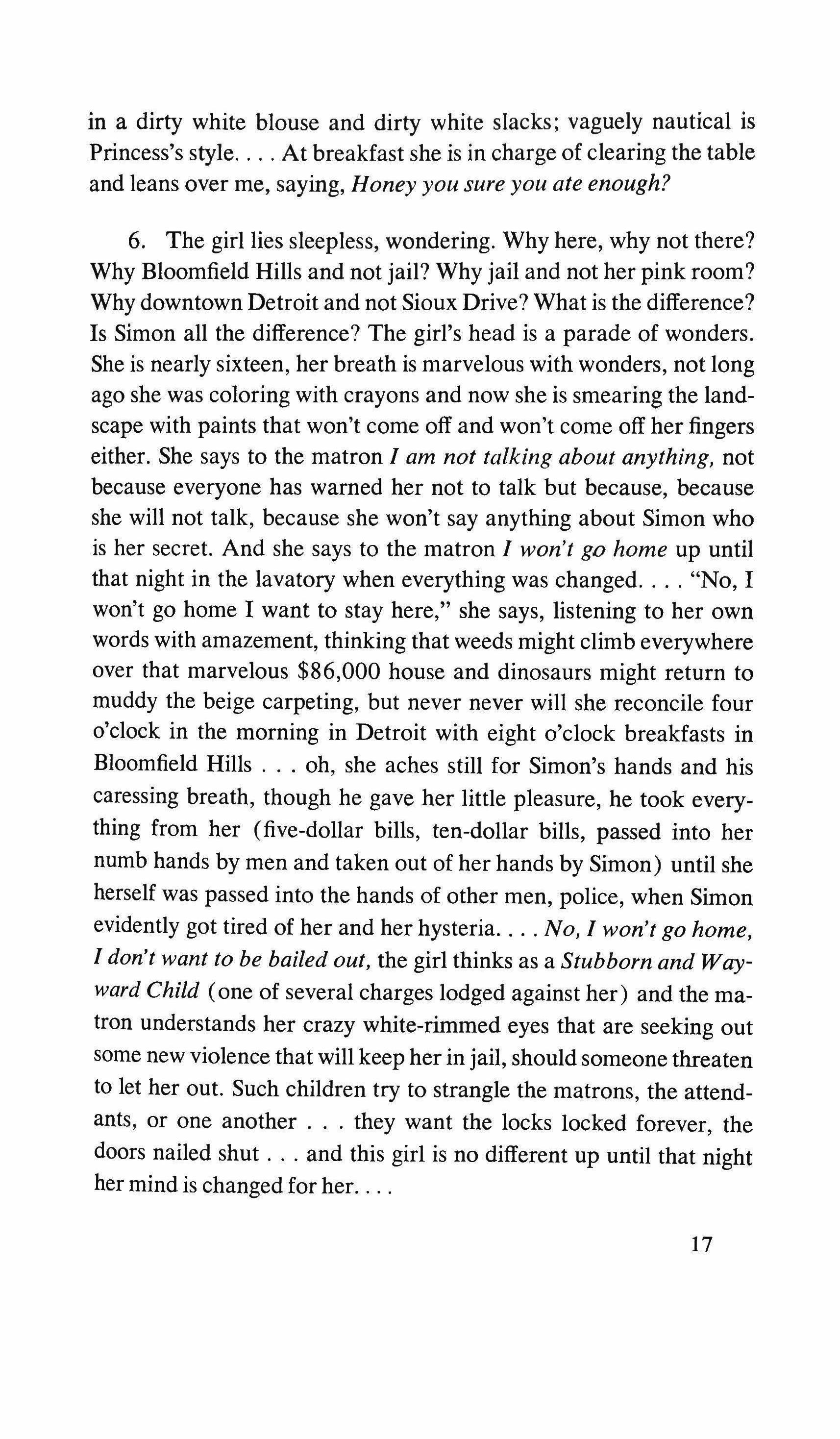
in a dirty white blouse and dirty white slacks; vaguely nautical is Princess's style At breakfast she is in charge of clearing the table and leans over me, saying, Honey you sure you ate enough?
6. The girl lies sleepless, wondering. Why here, why not there? Why Bloomfield Hills and not jail? Why jail and not her pink room? Why downtown Detroit and not Sioux Drive? What is the difference? Is Simon all the difference? The girl's head is a parade of wonders. She is nearly sixteen, her breath is marvelous with wonders, not long ago she was coloring with crayons and now she is smearing the landscape with paints that won't come off and won't come off her fingers either. She says to the matron I am not talking about anything, not because everyone has warned her not to talk but because, because she will not talk, because she won't say anything about Simon who is her secret. And she says to the matron I won't go home up until that night in the lavatory when everything was changed "No, I won't go home I want to stay here," she says, listening to her own words with amazement, thinking that weeds might climb everywhere over that marvelous $86,000 house and dinosaurs might return to muddy the beige carpeting, but never never will she reconcile four o'clock in the morning in Detroit with eight o'clock breakfasts in Bloomfield Hills oh, she aches still for Simon's hands and his caressing breath, though he gave her little pleasure, he took everything from her (five-dollar bills, ten-dollar bills, passed into her numb hands by men and taken out of her hands by Simon) until she herself was passed into the hands of other men, police, when Simon evidently got tired of her and her hysteria No, I won't go home, I don't want to be bailed out, the girl thinks as a Stubborn and Wayward Child (one of several charges lodged against her) and the matron understands her crazy white-rimmed eyes that are seeking out some new violence that will keep her in jail, should someone threaten to let her out. Such children try to strangle the matrons, the attendants, or one another they want the locks locked forever, the doors nailed shut and this girl is no different up until that night her mind is changed for her. 17
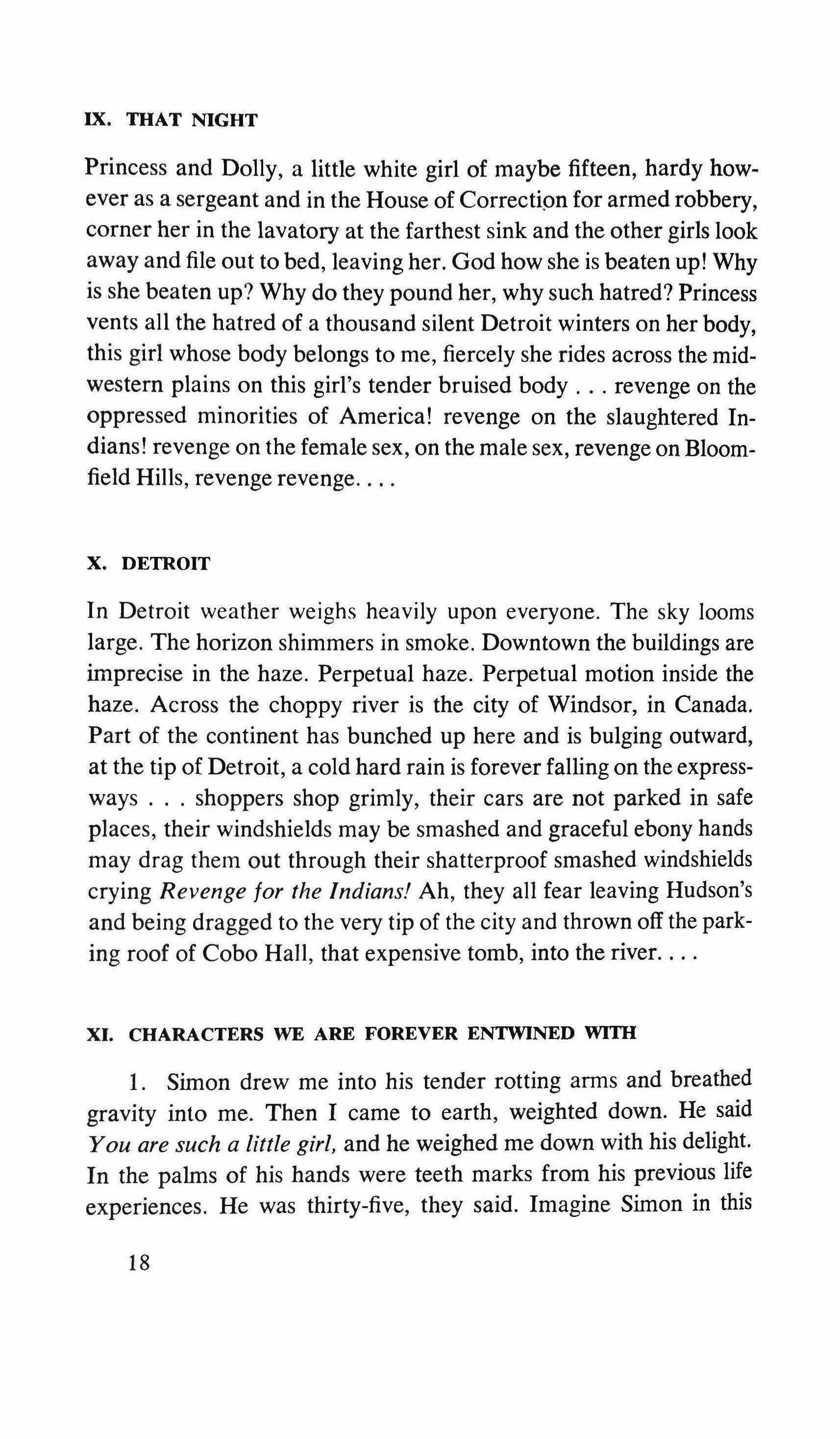
Princess and Dolly, a little white girl of maybe fifteen, hardy however as a sergeant and in the House of Correction for armed robbery, corner her in the lavatory at the farthest sink and the other girls look away and file out to bed, leaving her. God how she is beaten up! Why is she beaten up? Why do they pound her, why such hatred? Princess vents all the hatred of a thousand silent Detroit winters on her body, this girl whose body belongs to me, fiercely she rides across the midwestern plains on this girl's tender bruised body revenge on the oppressed minorities of America! revenge on the slaughtered Indians! revenge on the female sex, on the male sex, revenge on Bloomfield Hills, revenge revenge
In Detroit weather weighs heavily upon everyone. The sky looms large. The horizon shimmers in smoke. Downtown the buildings are imprecise in the haze. Perpetual haze. Perpetual motion inside the haze. Across the choppy river is the city of Windsor, in Canada. Part of the continent has bunched up here and is bulging outward, at the tip of Detroit, a cold hard rain is forever falling on the expressways shoppers shop grimly, their cars are not parked in safe places, their windshields may be smashed and graceful ebony hands may drag them out through their shatterproof smashed windshields crying Revenge for the Indians! Ah, they all fear leaving Hudson's and being dragged to the very tip of the city and thrown off the parking roof of Cobo Hall, that expensive tomb, into the river
1. Simon drew me into his tender rotting arms and breathed gravity into me. Then I came to earth, weighted down. He said You are such a little girl, and he weighed me down with his delight. In the palms of his hands were teeth marks from his previous life experiences. He was thirty-five, they said. Imagine Simon in this
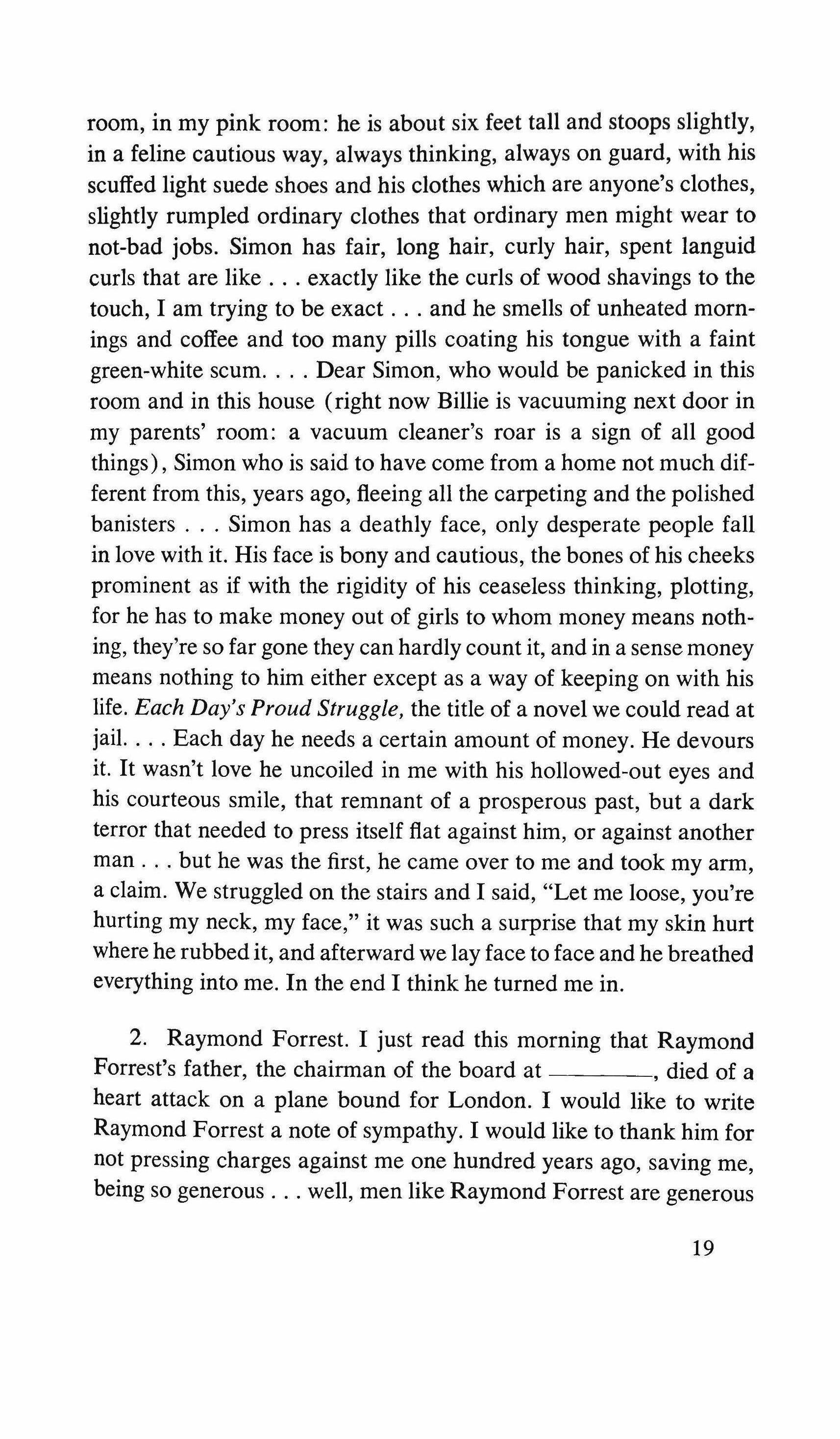
room, in my pink room: he is about six feet tall and stoops slightly, in a feline cautious way, always thinking, always on guard, with his scuffed light suede shoes and his clothes which are anyone's clothes, slightly rumpled ordinary clothes that ordinary men might wear to not-bad jobs. Simon has fair, long hair, curly hair, spent languid curls that are like exactly like the curls of wood shavings to the touch, I am trying to be exact and he smells of unheated mornings and coffee and too many pills coating his tongue with a faint green-white scum Dear Simon, who would be panicked in this room and in this house (right now Billie is vacuuming next door in my parents' room: a vacuum cleaner's roar is a sign of all good things), Simon who is said to have come from a home not much different from this, years ago, fleeing all the carpeting and the polished banisters Simon has a deathly face, only desperate people fall in love with it. His face is bony and cautious, the bones of his cheeks prominent as if with the rigidity of his ceaseless thinking, plotting, for he has to make money out of girls to whom money means nothing, they're so far gone they can hardly count it, and in a sense money means nothing to him either except as a way of keeping on with his life. Each Day's Proud Struggle, the title of a novel we could read at jail. Each day he needs a certain amount of money. He devours it. It wasn't love he uncoiled in me with his hollowed-out eyes and his courteous smile, that remnant of a prosperous past, but a dark terror that needed to press itself flat against him, or against another man but he was the first, he came over to me and took my arm, a claim. We struggled on the stairs and I said, "Let me loose, you're hurting my neck, my face," it was such a surprise that my skin hurt where he rubbed it, and afterward we lay face to face and he breathed everything into me. In the end I think he turned me in.
2. Raymond Forrest. I just read this morning that Raymond Forrest's father, the chairman of the board at died of a heart attack on a plane bound for London. I would like to write Raymond Forrest a note of sympathy. I would like to thank him for not pressing charges against me one hundred years ago, saving me, being so generous well, men like Raymond Forrest are generous
men, not like Simon. I would like to write him a letter telling of my love, or of some other emotion that is positive and healthy. Not like Simon and his poetry, which he scrawled down when he was high and never changed a word but when I try to think of something to say it is Simon's language that comes back to me, caught in my head like a bad song, it is always Simon's language:
There is no reality only dreams
Your neck may get snapped when you wake
My love is drawn to some violent end
She keeps wanting to get away
My love is heading downward
And I am heading upward
She is going to crash on the sidewalk
And I am going to dissolve into the clouds
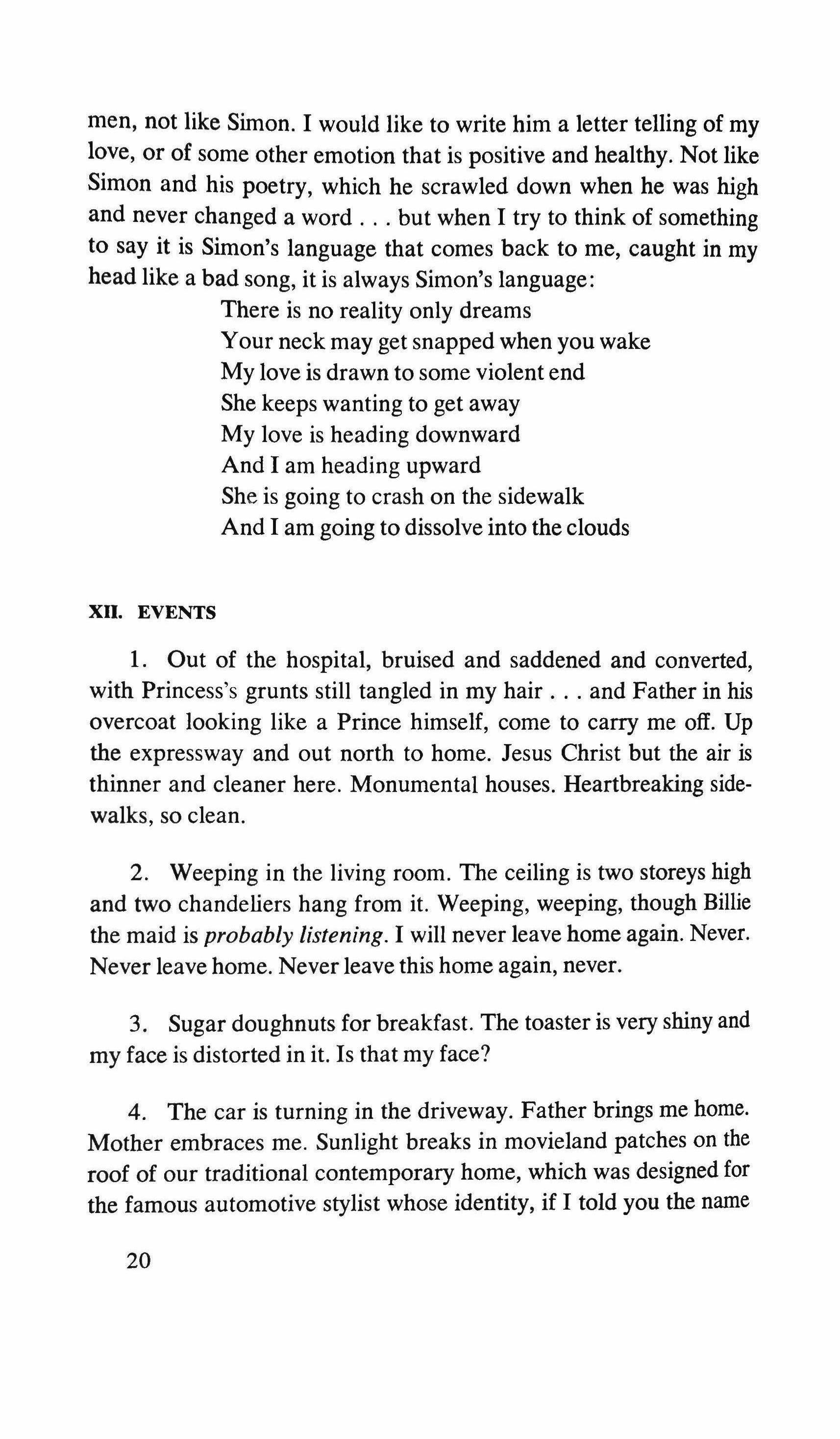
xn. EVENTS
1. Out of the hospital, bruised and saddened and converted, with Princess's grunts still tangled in my hair and Father in his overcoat looking like a Prince himself, come to carry me off. Up the expressway and out north to home. Jesus Christ but the air is thinner and cleaner here. Monumental houses. Heartbreaking sidewalks, so clean.
2. Weeping in the living room. The ceiling is two storeys high and two chandeliers hang from it. Weeping, weeping, though Billie the maid is probably listening. I will never leave home again. Never. Never leave home. Never leave this home again, never.
3. Sugar doughnuts for breakfast. The toaster is very shiny and my face is distorted in it. Is that my face?
4. The car is turning in the driveway. Father brings me home. Mother embraces me. Sunlight breaks in movieland patches on the roof of our traditional contemporary home, which was designed for the famous automotive stylist whose identity, if I told you the name
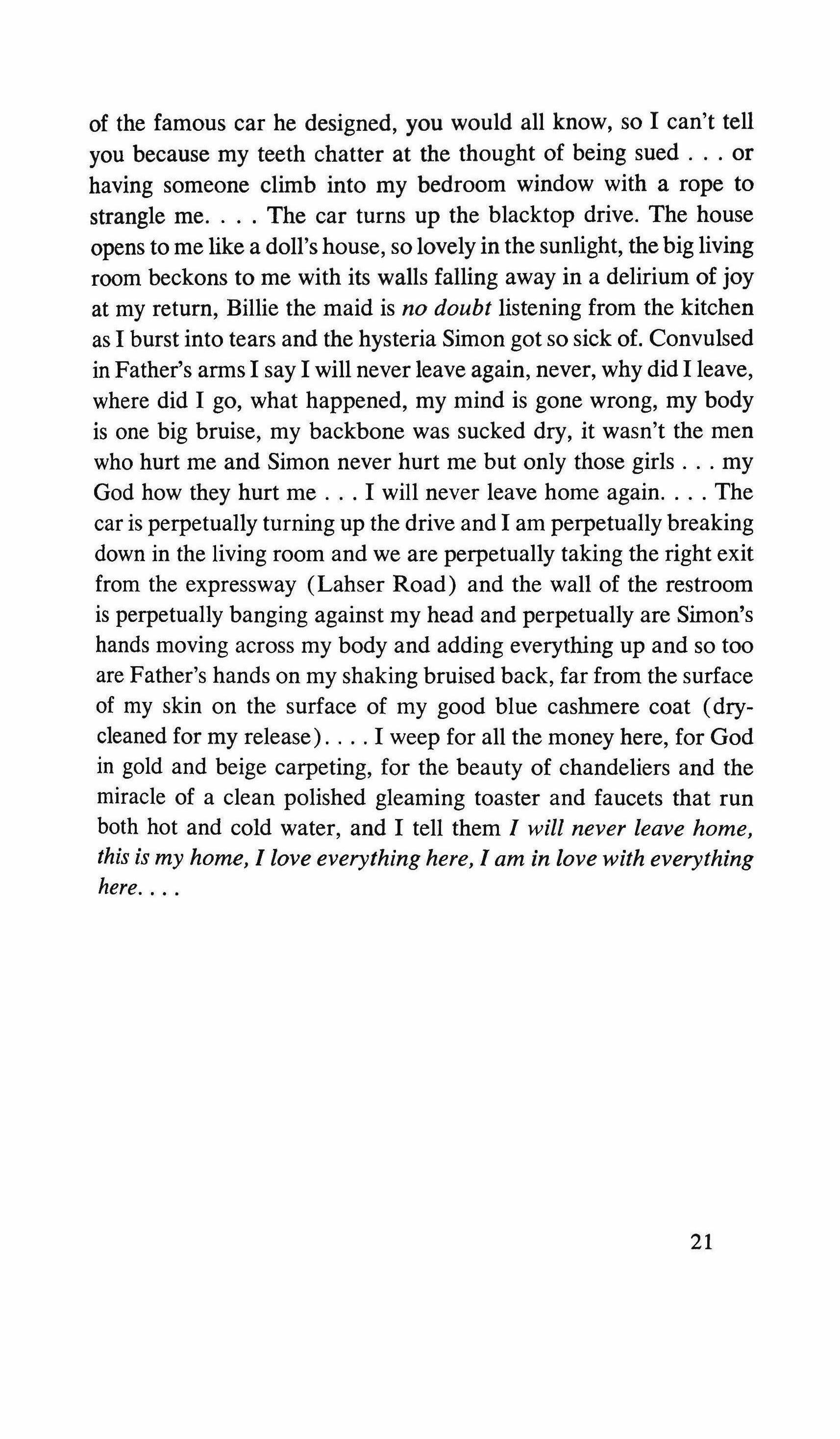
of the famous car he designed, you would all know, so I can't tell you because my teeth chatter at the thought of being sued or having someone climb into my bedroom window with a rope to strangle me The car turns up the blacktop drive. The house opens to me like a doll's house, so lovely in the sunlight, the big living room beckons to me with its walls falling away in a delirium of joy at my return, Billie the maid is no doubt listening from the kitchen as I burst into tears and the hysteria Simon got so sick of. Convulsed in Father's arms I say I will never leave again, never, why did I leave, where did I go, what happened, my mind is gone wrong, my body is one big bruise, my backbone was sucked dry, it wasn't the men who hurt me and Simon never hurt me but only those girls my God how they hurt me I will never leave home again The car is perpetually turning up the drive and I am perpetually breaking down in the living room and we are perpetually taking the right exit from the expressway (Lahser Road) and the wall of the restroom is perpetually banging against my head and perpetually are Simon's hands moving across my body and adding everything up and so too are Father's hands on my shaking bruised back, far from the surface of my skin on the surface of my good blue cashmere coat (drycleaned for my release). I weep for all the money here, for God in gold and beige carpeting, for the beauty of chandeliers and the miracle of a clean polished gleaming toaster and faucets that run both hot and cold water, and I tell them I will never leave home, this is my home, [love everything here, I am in love with everything here
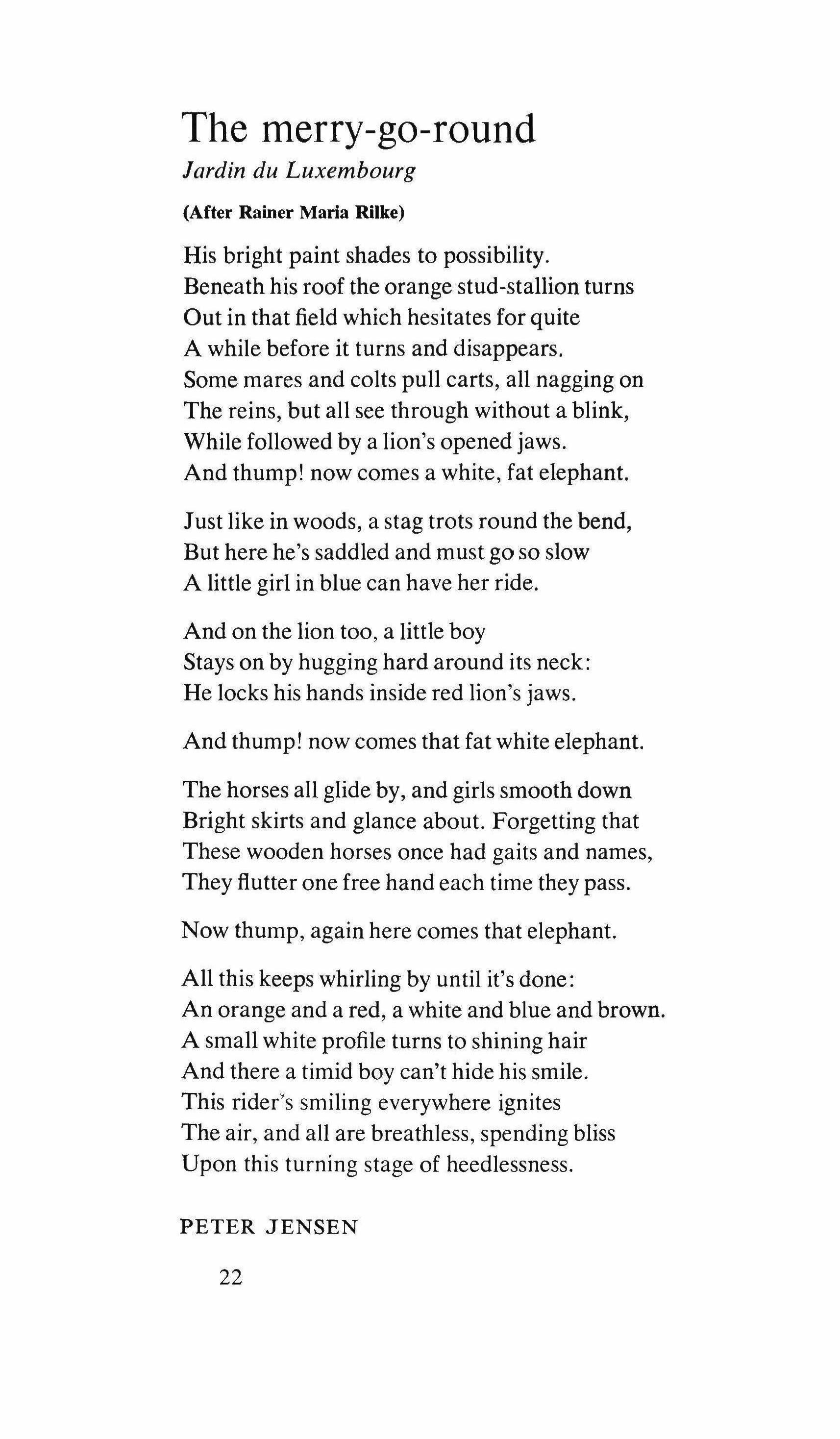
Jardin du Luxembourg
(After Rainer Maria Rilke)
His bright paint shades to possibility. Beneath his roof the orange stud-stallion turns Out in that field which hesitates for quite A while before it turns and disappears. Some mares and colts pull carts, all nagging on The reins, but all see through without a blink, While followed by a lion's opened jaws. And thump! now comes a white, fat elephant.
Just like in woods, a stag trots round the bend, But here he's saddled and must go so slow
A little girl in blue can have her ride.
And on the lion too, a little boy Stays on by hugging hard around its neck: He locks his hands inside red lion's jaws.
And thump! now comes that fat white elephant.
The horses all glide by, and girls smooth down Bright skirts and glance about. Forgetting that These wooden horses once had gaits and names, They flutter one free hand each time they pass.
Now thump, again here comes that elephant.
All this keeps whirling by until it's done:
An orange and a red, a white and blue and brown. A small white profile turns to shining hair
And there a timid boy can't hide his smile.
This rider's smiling everywhere ignites
The air, and all are breathless, spending bliss
Upon this turning stage of heedlessness.
PETER JENSEN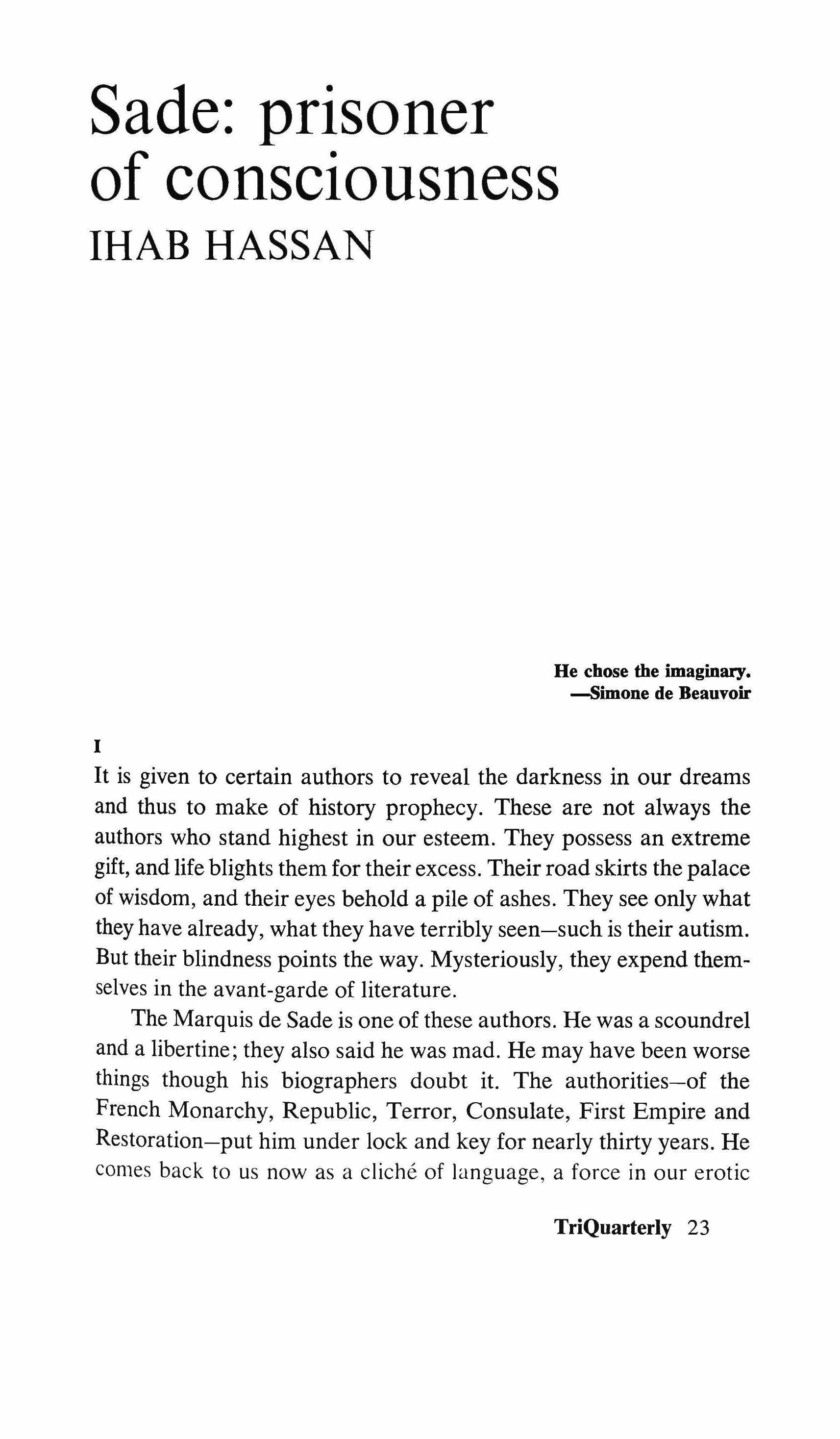
He chose the imaginary. -Simone de Beauvoir
I
It is given to certain authors to reveal the darkness in our dreams and thus to make of history prophecy. These are not always the authors who stand highest in our esteem. They possess an extreme gift, and life blights them for their excess. Their road skirts the palace of wisdom, and their eyes behold a pile of ashes. They see only what they have already, what they have terribly seen-such is their autism. But their blindness points the way. Mysteriously, they expend themselves in the avant-garde of literature.
The Marquis de Sade is one of these authors. He was a scoundrel and a libertine; they also said he was mad. He may have been worse things though his biographers doubt it. The authorities-of the French Monarchy, Republic, Terror, Consulate, First Empire and Restoration-put him under lock and key for nearly thirty years. He comes back to us now as a cliche of language, a force in our erotic
TriQuarterly 23
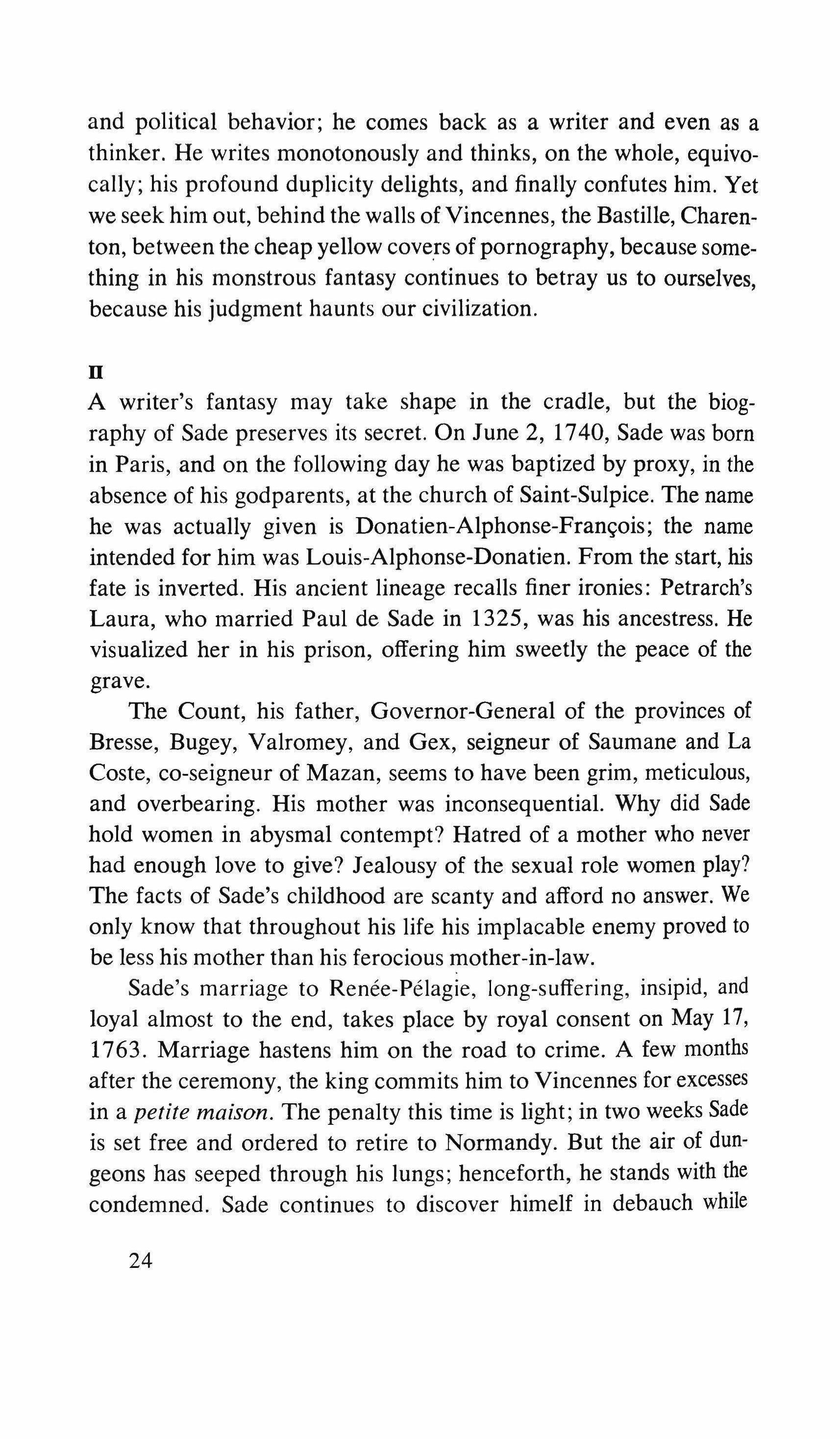
and political behavior; he comes back as a writer and even as a thinker. He writes monotonously and thinks, on the whole, equivocally; his profound duplicity delights, and finally confutes him. Yet we seek him out, behind the walls of Vincennes, the Bastille, Charenton, between the cheap yellow covers of pornography, because something in his monstrous fantasy continues to betray us to ourselves, because his judgment haunts our civilization.
A writer's fantasy may take shape in the cradle, but the biography of Sade preserves its secret. On June 2, 1740, Sade was born in Paris, and on the following day he was baptized by proxy, in the absence of his godparents, at the church of Saint-Sulpice. The name he was actually given is Donatien-Alphonse-Francois; the name intended for him was Louis-Alphonse-Donatien. From the start, his fate is inverted. His ancient lineage recalls finer ironies: Petrarch's Laura, who married Paul de Sade in 1325, was his ancestress. He visualized her in his prison, offering him sweetly the peace of the grave.
The Count, his father, Governor-General of the provinces of Bresse, Bugey, Valromey, and Gex, seigneur of Saumane and La Coste, co-seigneur of Mazan, seems to have been grim, meticulous, and overbearing. His mother was inconsequential. Why did Sade hold women in abysmal contempt? Hatred of a mother who never had enough love to give? Jealousy of the sexual role women play? The facts of Sade's childhood are scanty and afford no answer. We only know that throughout his life his implacable enemy proved to be less his mother than his ferocious mother-in-law.
Sade's marriage to Renee-Pelagic, long-suffering, insipid, and loyal almost to the end, takes place by royal consent on May 17, 1763. Marriage hastens him on the road to crime. A few months after the ceremony, the king commits him to Vincennes for excesses in a petite maison. The penalty this time is light; in two weeks Sade is set free and ordered to retire to Normandy. But the air of dungeons has seeped through his lungs; henceforth, he stands with the condemned. Sade continues to discover himelf in debauch while
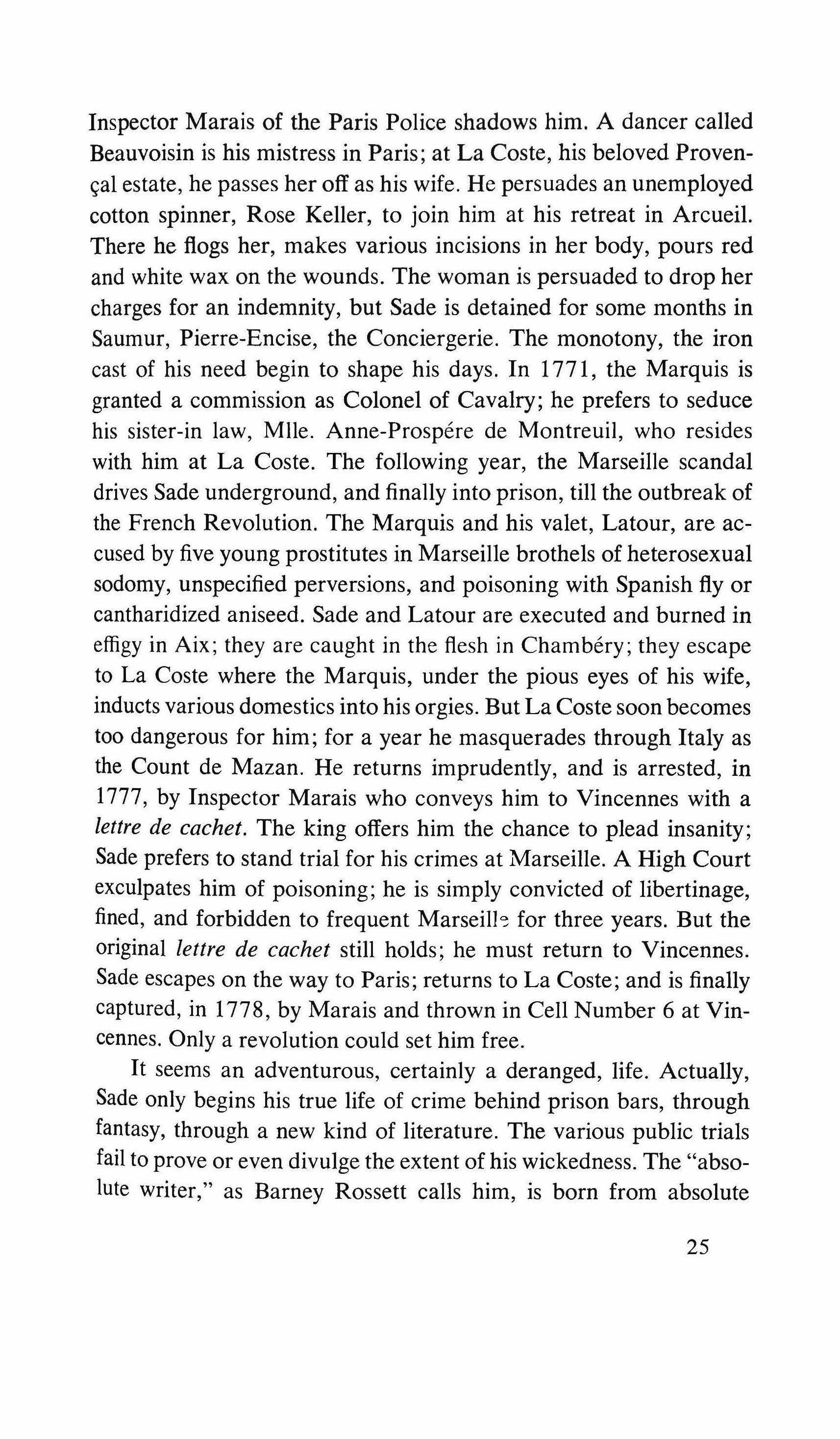
Inspector Marais of the Paris Police shadows him. A dancer called Beauvoisin is his mistress in Paris; at La Coste, his beloved Provencal estate, he passes her off as his wife. He persuades an unemployed cotton spinner, Rose Keller, to join him at his retreat in Arcueil. There he flogs her, makes various incisions in her body, pours red and white wax on the wounds. The woman is persuaded to drop her charges for an indemnity, but Sade is detained for some months in Saumur, Pierre-Encise, the Conciergerie. The monotony, the iron cast of his need begin to shape his days. In 1771, the Marquis is granted a commission as Colonel of Cavalry; he prefers to seduce his sister-in law, Mlle. Anne-Prospere de Montreuil, who resides with him at La Coste. The following year, the Marseille scandal drives Sade underground, and finally into prison, till the outbreak of the French Revolution. The Marquis and his valet, Latour, are accused by five young prostitutes in Marseille brothels of heterosexual sodomy, unspecified perversions, and poisoning with Spanish fly or cantharidized aniseed. Sade and Latour are executed and burned in effigy in Aix; they are caught in the flesh in Charnbery; they escape to La Coste where the Marquis, under the pious eyes of his wife, inducts various domestics into his orgies. But La Coste soon becomes too dangerous for him; for a year he masquerades through Italy as the Count de Mazan. He returns imprudently, and is arrested, in 1777, by Inspector Marais who conveys him to Vincennes with a lettre de cachet. The king offers him the chance to plead insanity; Sade prefers to stand trial for his crimes at Marseille. A High Court exculpates him of poisoning; he is simply convicted of libertinage, fined, and forbidden to frequent Marseille for three years. But the original lettre de cachet still holds; he must return to Vincennes. Sade escapes on the way to Paris; returns to La Coste; and is finally captured, in 1778, by Marais and thrown in Cell Number 6 at Vincennes. Only a revolution could set him free.
It seems an adventurous, certainly a deranged, life. Actually, Sade only begins his true life of crime behind prison bars, through fantasy, through a new kind of literature. The various public trials fail to prove or even divulge the extent of his wickedness. The "absolute writer," as Barney Rossett calls him, is born from absolute
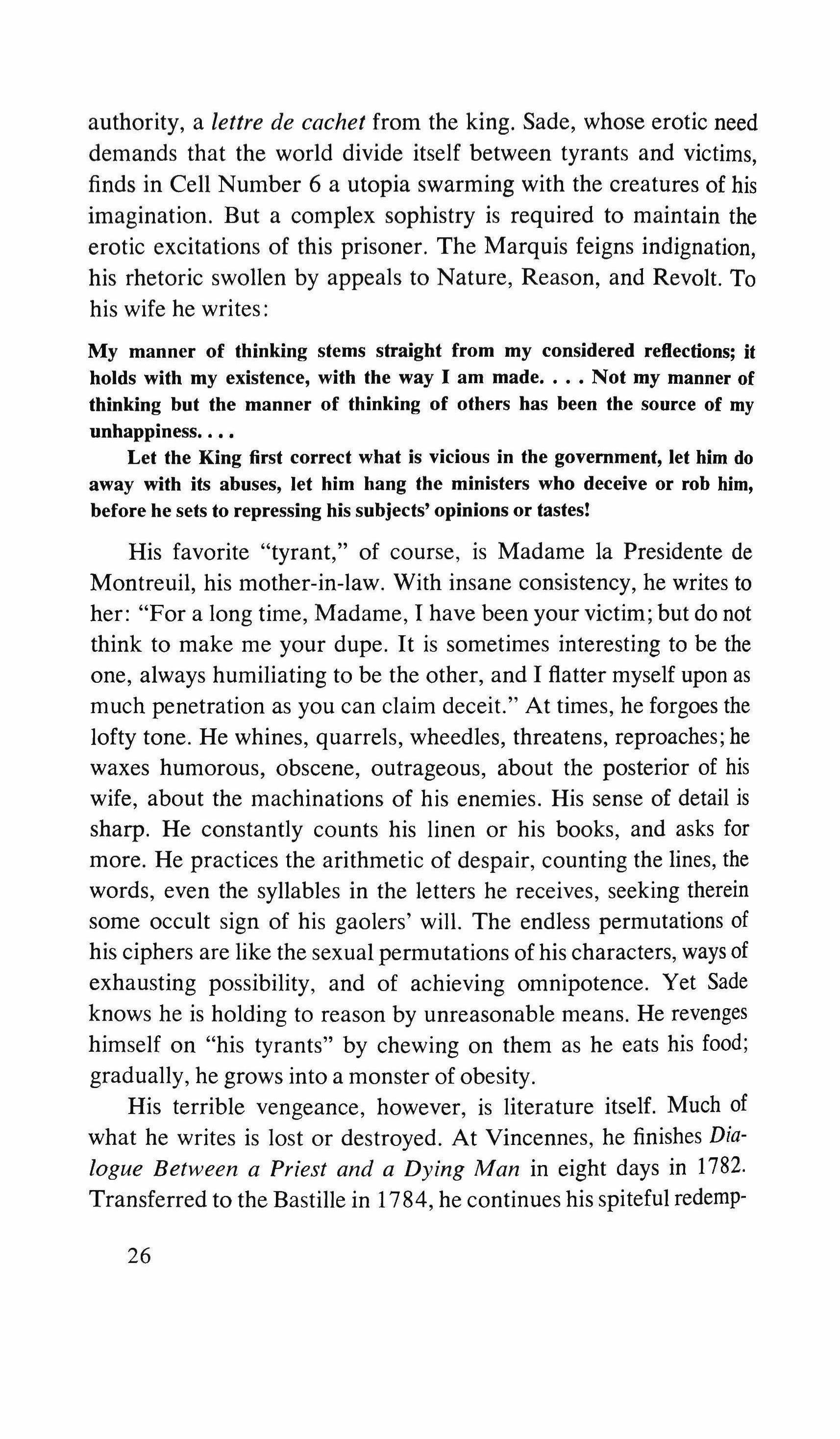
authority, a lettre de cachet from the king. Sade, whose erotic need demands that the world divide itself between tyrants and victims, finds in Cell Number 6 a utopia swarming with the creatures of his imagination. But a complex sophistry is required to maintain the erotic excitations of this prisoner. The Marquis feigns indignation, his rhetoric swollen by appeals to Nature, Reason, and Revolt. To his wife he writes:
My manner of thinking stems straight from my considered reflections; it holds with my existence, with the way I am made ..•• Not my manner of thinking but the manner of thinking of others has been the source of my unhappiness •.••
Let the King first correct what is vicious in the government, let him do away with its abuses, let him hang the ministers who deceive or rob him, before he sets to repressing his subjects' opinions or tastes!
His favorite "tyrant," of course, is Madame la Presidente de Montreuil, his mother-in-law. With insane consistency, he writes to her: "For a long time, Madame, I have been your victim; but do not think to make me your dupe. It is sometimes interesting to be the one, always humiliating to be the other, and I flatter myself upon as much penetration as you can claim deceit." At times, he forgoes the lofty tone. He whines, quarrels, wheedles, threatens, reproaches; he waxes humorous, obscene, outrageous, about the posterior of his wife, about the machinations of his enemies. His sense of detail is sharp. He constantly counts his linen or his books, and asks for more. He practices the arithmetic of despair, counting the lines, the words, even the syllables in the letters he receives, seeking therein some occult sign of his gaolers' will. The endless permutations of his ciphers are like the sexual permutations of his characters, ways of exhausting possibility, and of achieving omnipotence. Yet Sade knows he is holding to reason by unreasonable means. He revenges himself on "his tyrants" by chewing on them as he eats his food; gradually, he grows into a monster of obesity.
His terrible vengeance, however, is literature itself. Much of what he writes is lost or destroyed. At Vincennes, he finishes Dialogue Between a Priest and a Dying Man in eight days in 1782. Transferred to the Bastille in 1784, he continues his spiteful redemp-
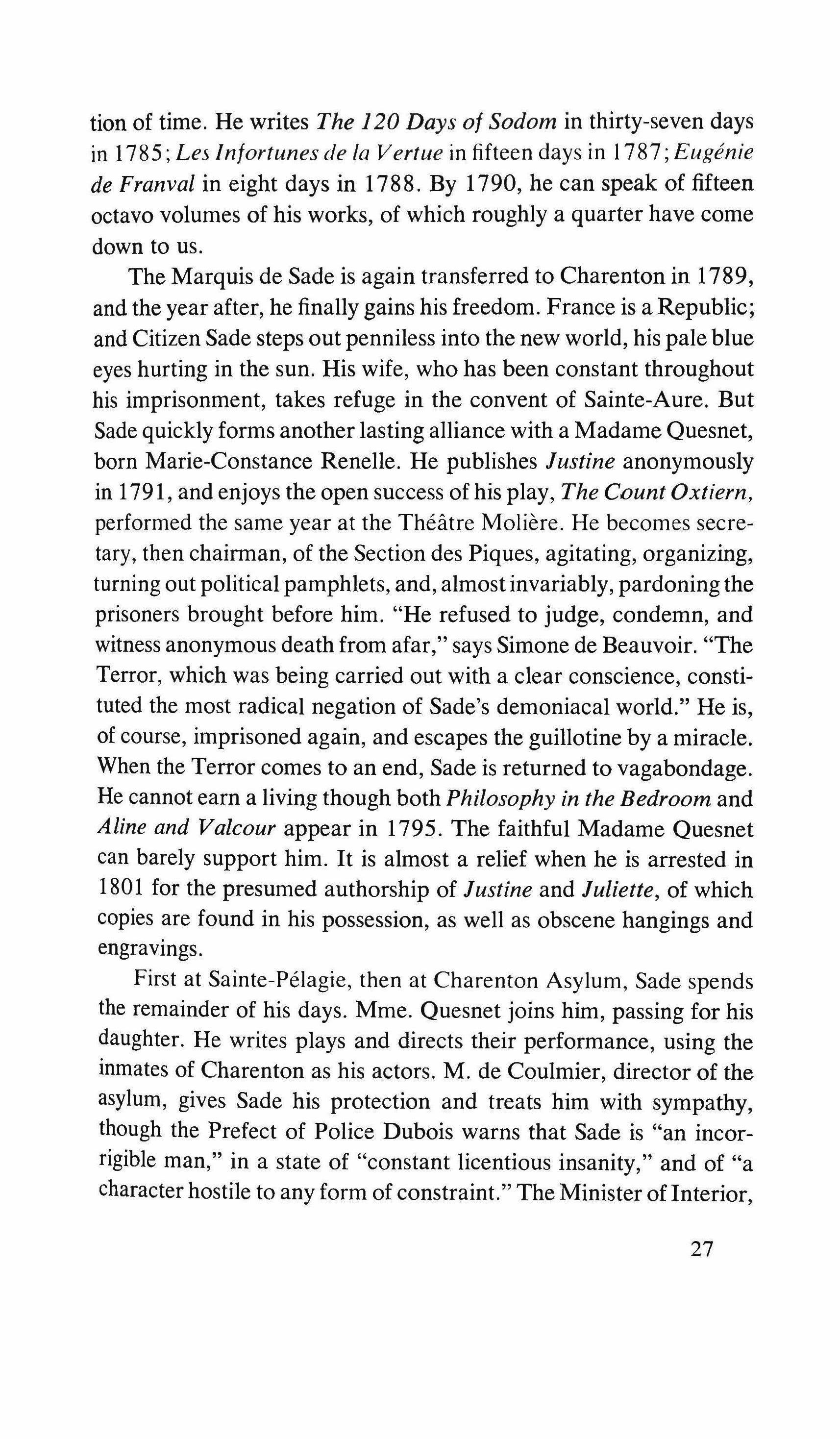
tion of time. He writes The 120 Days of Sodom in thirty-seven days in 1785; Les Injortunes de la Vertue in fifteen days in 1787; Eugenic de Franval in eight days in 1788. By 1790, he can speak of fifteen octavo volumes of his works, of which roughly a quarter have come down to us.
The Marquis de Sade is again transferred to Charenton in 1789, and the year after, he finally gains his freedom. France is a Republic; and Citizen Sade steps out penniless into the new world, his pale blue eyes hurting in the sun. His wife, who has been constant throughout his imprisonment, takes refuge in the convent of Sainte-Aure, But Sade quickly forms another lasting alliance with a Madame Quesnet, born Marie-Constance Renelle. He publishes Justine anonymously in 1791, and enjoys the open success of his play, The Count Oxtiern, performed the same year at the Theatre Moliere. He becomes secretary, then chairman, of the Section des Piques, agitating, organizing, turning out politicalpamphlets, and, almost invariably, pardoning the prisoners brought before him. "He refused to judge, condemn, and witness anonymous death from afar," says Simone de Beauvoir. "The Terror, which was being carried out with a clear conscience, constituted the most radical negation of Sade's demoniacal world." He is, of course, imprisoned again, and escapes the guillotine by a miracle. When the Terror comes to an end, Sade is returned to vagabondage. He cannot earn a living though both Philosophy in the Bedroom and Aline and Valcour appear in 1795. The faithful Madame Quesnet can barely support him. It is almost a relief when he is arrested in 1801 for the presumed authorship of Justine and Juliette, of which copies are found in his possession, as well as obscene hangings and engravings.
First at Sainte-Pelagic, then at Charenton Asylum, Sade spends the remainder of his days. Mme. Quesnet joins him, passing for his daughter. He writes plays and directs their performance, using the inmates of Charenton as his actors. M. de Coulmier, director of the asylum, gives Sade his protection and treats him with sympathy, though the Prefect of Police Dubois warns that Sade is "an incorrigible man," in a state of "constant licentious insanity," and of "a character hostile to any form of constraint." The Minister of Interior,
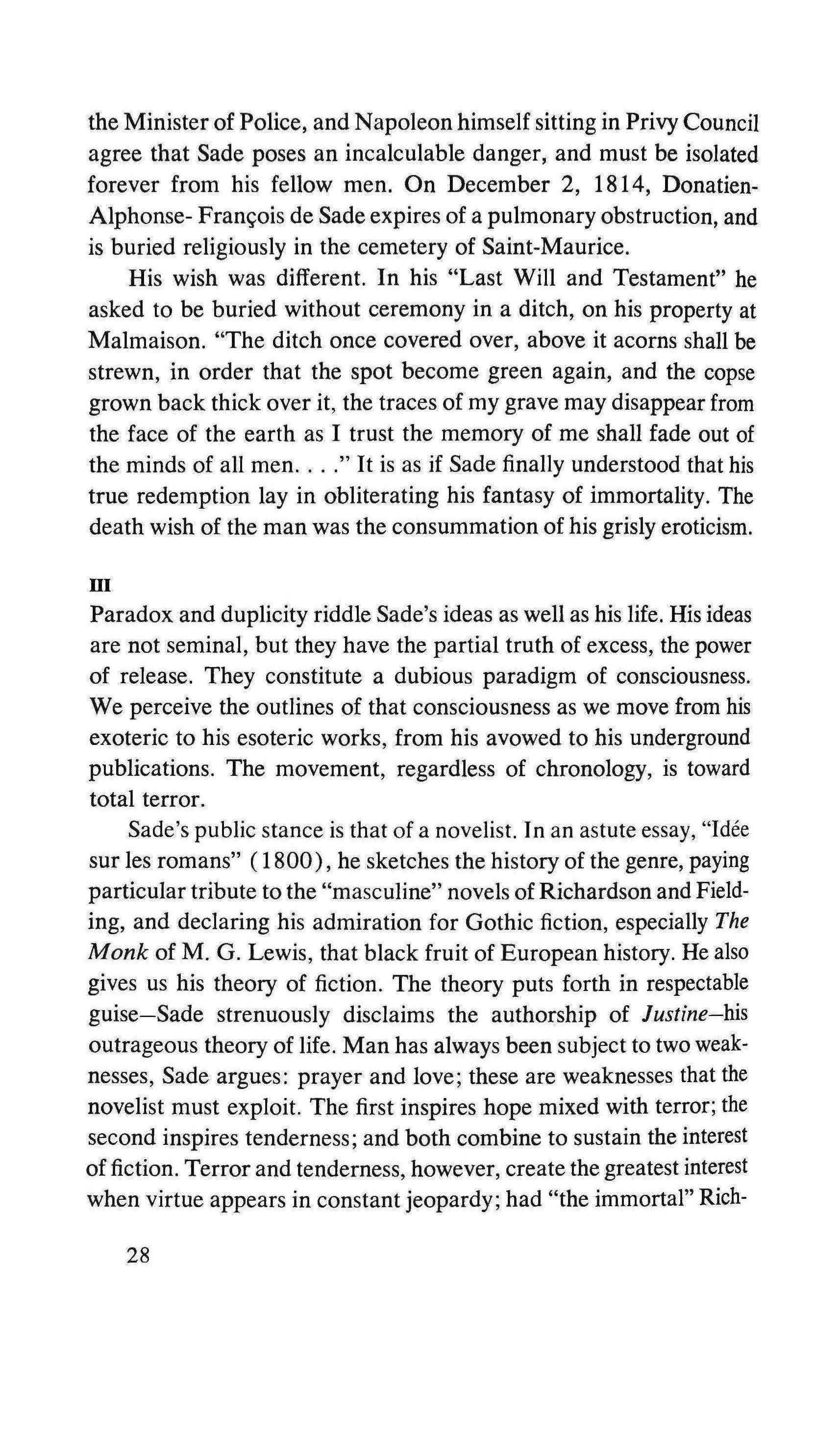
the Minister of Police, and Napoleon himself sitting in Privy Council agree that Sade poses an incalculable danger, and must be isolated forever from his fellow men. On December 2, 1814, DonatienAlphonse- Francois de Sade expires of a pulmonary obstruction, and is buried religiously in the cemetery of Saint-Maurice.
His wish was different. In his "Last Will and Testament" he asked to be buried without ceremony in a ditch, on his property at Malmaison. "The ditch once covered over, above it acorns shall be strewn, in order that the spot become green again, and the copse grown back thick over it, the traces of my grave may disappear from the face of the earth as I trust the memory of me shall fade out of the minds of all men It is as if Sade finally understood that his true redemption lay in obliterating his fantasy of immortality. The death wish of the man was the consummation of his grisly eroticism.
Paradox and duplicity riddle Sade's ideas as well as his life. His ideas are not seminal, but they have the partial truth of excess, the power of release. They constitute a dubious paradigm of consciousness. We perceive the outlines of that consciousness as we move from his exoteric to his esoteric works, from his avowed to his underground publications. The movement, regardless of chronology, is toward total terror.
Sade's public stance is that of a novelist. In an astute essay, "Idee sur les romans" (1800), he sketches the history of the genre, paying particular tribute to the "masculine" novels of Richardson and Fielding, and declaring his admiration for Gothic fiction, especially The Monk of M. G. Lewis, that black fruit of European history. He also gives us his theory of fiction. The theory puts forth in respectable guise-Sade strenuously disclaims the authorship of Justine-his outrageous theory of life. Man has always been subject to two weaknesses, Sade argues: prayer and love; these are weaknesses that the novelist must exploit. The first inspires hope mixed with terror; the second inspires tenderness; and both combine to sustain the interest of fiction. Terror and tenderness, however, create the greatest interest when virtue appears in constant jeopardy; had "the immortal" Rich-
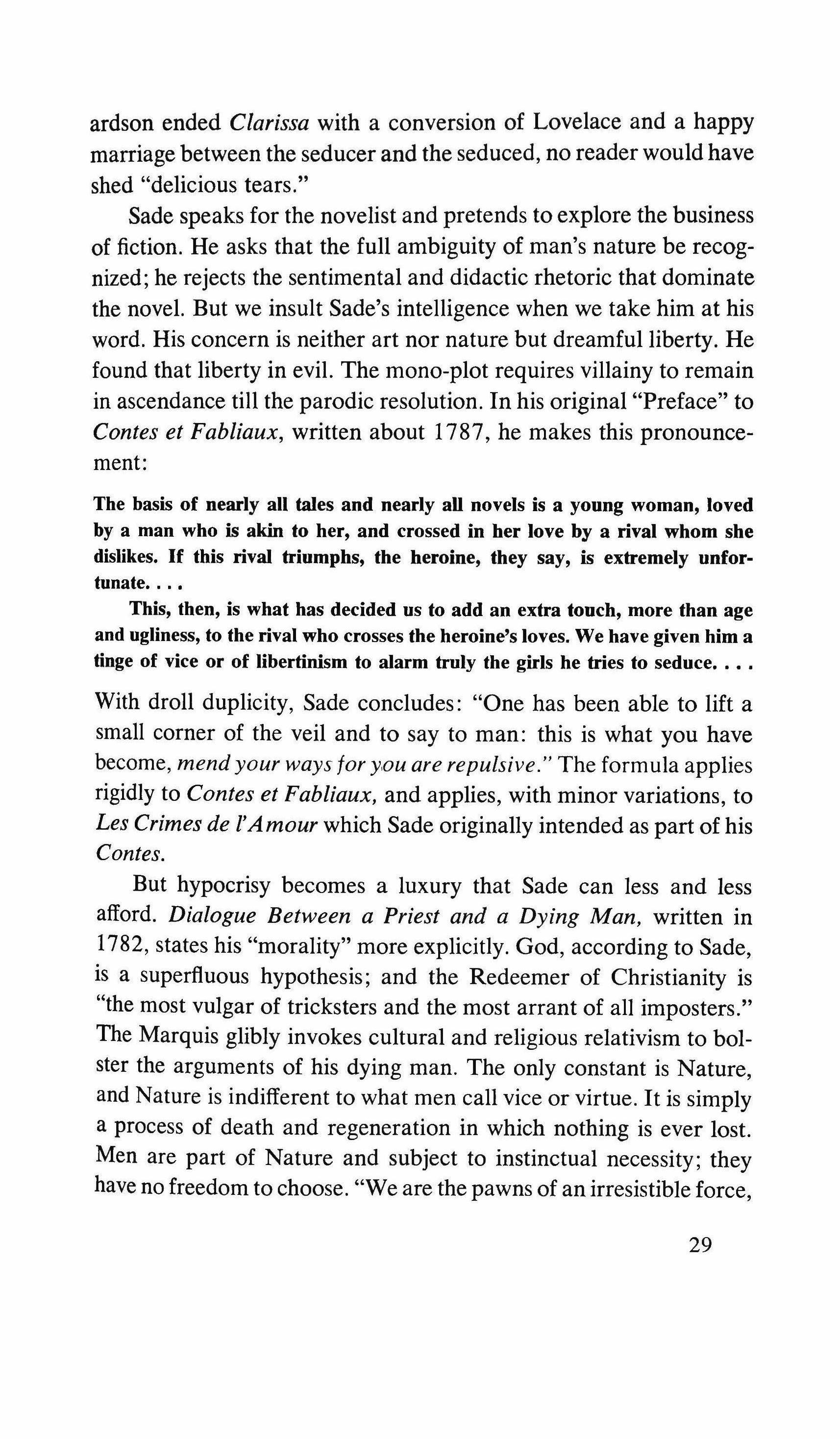
ardson ended Clarissa with a conversion of Lovelace and a happy marriage between the seducer and the seduced, no reader would have shed "delicious tears."
Sade speaks for the novelist and pretends to explore the business of fiction. He asks that the full ambiguity of man's nature be recognized; he rejects the sentimental and didactic rhetoric that dominate the novel. But we insult Sade's intelligence when we take him at his word. His concern is neither art nor nature but dreamfulliberty. He found that liberty in evil. The mono-plot requires villainy to remain in ascendance till the parodic resolution. In his original "Preface" to Contes et Fabliaux, written about 1787, he makes this pronouncement:
The basis of nearly all tales and nearly all novels is a young woman, loved by a man who is akin to her, and crossed in her love by a rival whom she dislikes. If this rival triumphs, the heroine, they say, is extremely unfortunate
This, then, is what has decided us to add an extra touch, more than age and ugliness, to the rival who crosses the heroine's loves. We have given him a tinge of vice or of libertinism to alarm truly the girls he tries to seduce
With droll duplicity, Sade concludes: "One has been able to lift a small corner of the veil and to say to man: this is what you have become, mend your ways tor you are repulsive." The formula applies rigidly to Contes et Fabliaux, and applies, with minor variations, to Les Crimes de l'Amour which Sade originally intended as part of his Contes.
But hypocrisy becomes a luxury that Sade can less and less afford. Dialogue Between a Priest and a Dying Man, written in 1782, states his "morality" more explicitly. God, according to Sade, is a superfluous hypothesis; and the Redeemer of Christianity is "the most vulgar of tricksters and the most arrant of all imposters." The Marquis glibly invokes cultural and religious relativism to bolster the arguments of his dying man. The only constant is Nature, and Nature is indifferent to what men call vice or virtue. It is simply a process of death and regeneration in which nothing is ever lost. Men are part of Nature and subject to instinctual necessity; they have no freedom to choose. "We are the pawns of an irresistible force, 29
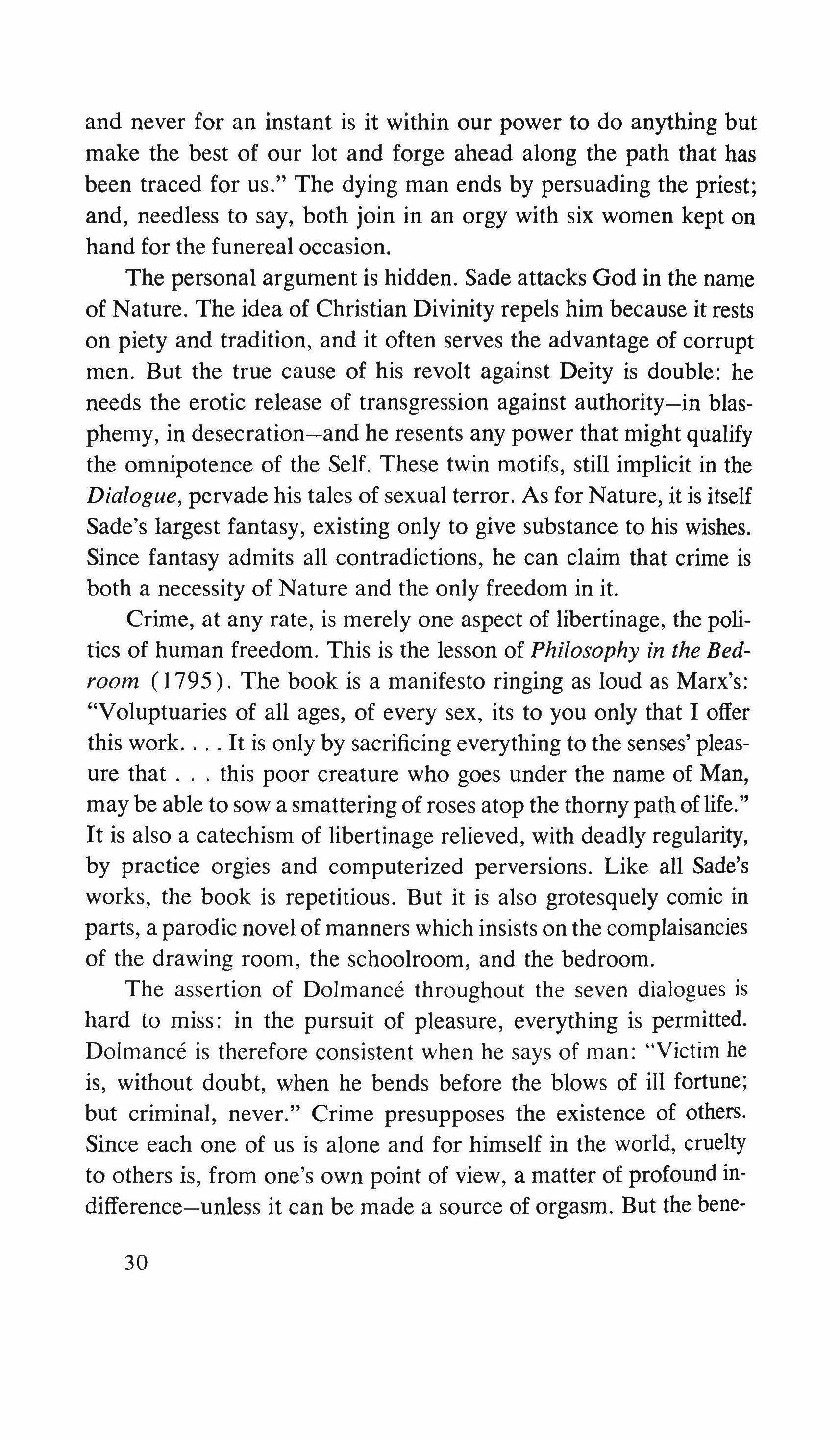
and never for an instant is it within our power to do anything but make the best of our lot and forge ahead along the path that has been traced for us." The dying man ends by persuading the priest; and, needless to say, both join in an orgy with six women kept on hand for the funereal occasion.
The personal argument is hidden. Sade attacks God in the name of Nature. The idea of Christian Divinity repels him because it rests on piety and tradition, and it often serves the advantage of corrupt men. But the true cause of his revolt against Deity is double: he needs the erotic release of transgression against authority-in blasphemy, in desecration-and he resents any power that might qualify the omnipotence of the Self. These twin motifs, still implicit in the Dialogue, pervade his tales of sexual terror. As for Nature, it is itself Sade's largest fantasy, existing only to give substance to his wishes. Since fantasy admits all contradictions, he can claim that crime is both a necessity of Nature and the only freedom in it.
Crime, at any rate, is merely one aspect of libertinage, the politics of human freedom. This is the lesson of Philosophy in the Bedroom (1795). The book is a manifesto ringing as loud as Marx's: "Voluptuaries of all ages, of every sex, its to you only that I offer this work It is only by sacrificing everything to the senses' pleasure that this poor creature who goes under the name of Man, may be able to sow a smattering of roses atop the thornypath of life." It is also a catechism of libertinage relieved, with deadly regularity, by practice orgies and computerized perversions. Like all Sade's works, the book is repetitious. But it is also grotesquely comic in parts, a parodic novel of manners which insists on the complaisancies of the drawing room, the schoolroom, and the bedroom.
The assertion of Dolrnance throughout the seven dialogues is hard to miss: in the pursuit of pleasure, everything is permitted. Dolmance is therefore consistent when he says of man: "Victim he is, without doubt, when he bends before the blows of ill fortune; but criminal, never." Crime presupposes the existence of others. Since each one of us is alone and for himself in the world, cruelty to others is, from one's own point of view, a matter of profound indifference-unless it can be made a source of orgasm. But the bene-
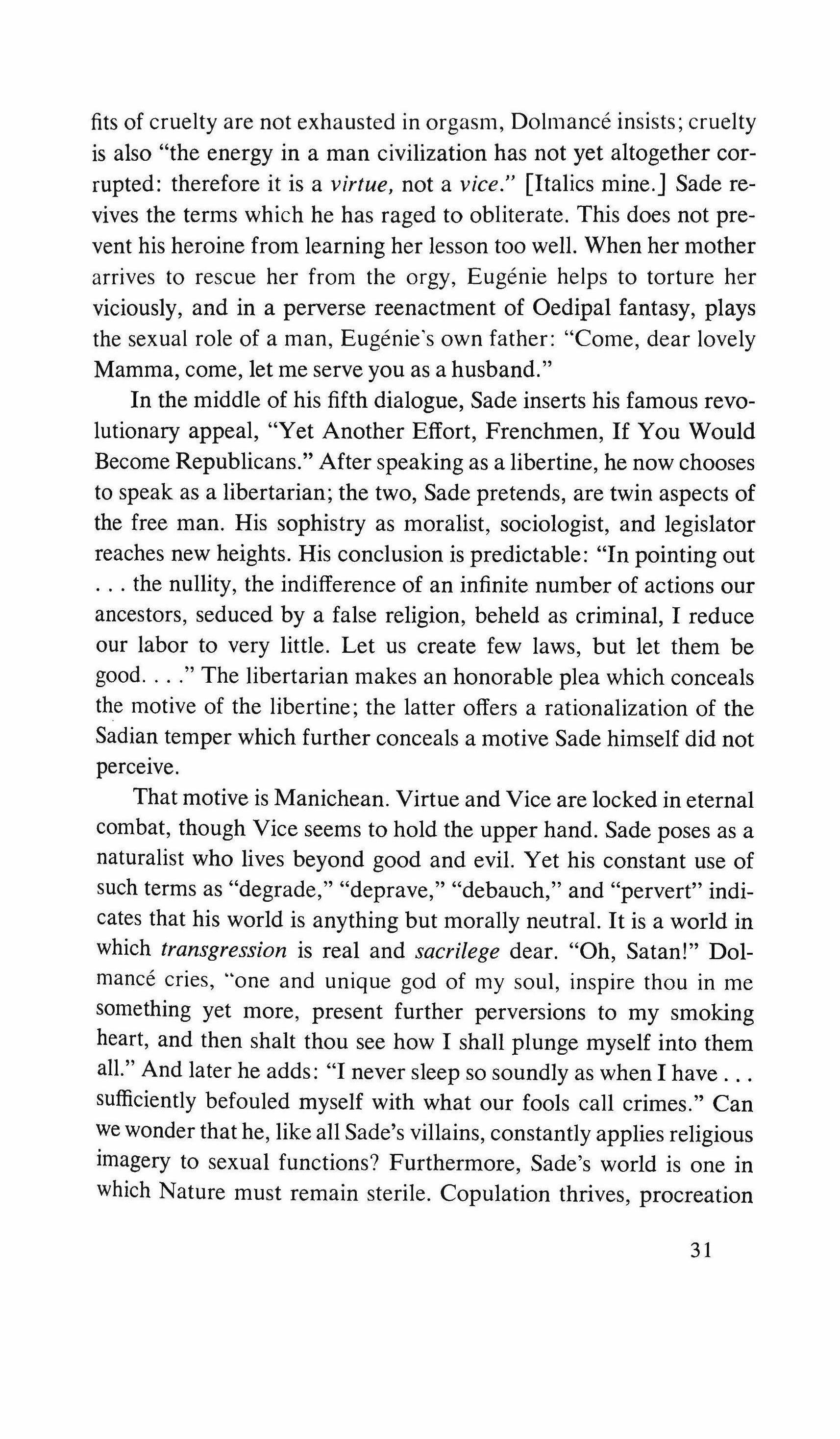
fits of cruelty are not exhausted in orgasm, Dolmance insists; cruelty is also "the energy in a man civilization has not yet altogether corrupted: therefore it is a virtue, not a vice." [Italics mine.] Sade revives the terms which he has raged to obliterate. This does not prevent his heroine from learning her lesson too well. When her mother arrives to rescue her from the orgy, Eugenic helps to torture her viciously, and in a perverse reenactment of Oedipal fantasy, plays the sexual role of a man, Eugenic's own father: "Come, dear lovely Mamma, come, let me serve you as a husband."
In the middle of his fifth dialogue, Sade inserts his famous revolutionary appeal, "Yet Another Effort, Frenchmen, If You Would Become Republicans." After speaking as a libertine, he now chooses to speak as a libertarian; the two, Sade pretends, are twin aspects of the free man. His sophistry as moralist, sociologist, and legislator reaches new heights. His conclusion is predictable: "In pointing out the nullity, the indifference of an infinite number of actions our ancestors, seduced by a false religion, beheld as criminal, I reduce our labor to very little. Let us create few laws, but let them be good The libertarian makes an honorable plea which conceals the motive of the libertine; the latter offers a rationalization of the Sadian temper which further conceals a motive Sade himself did not perceive.
That motive is Manichean. Virtue and Vice are locked in eternal combat, though Vice seems to hold the upper hand. Sade poses as a naturalist who lives beyond good and evil. Yet his constant use of such terms as "degrade," "deprave," "debauch," and "pervert" indicates that his world is anything but morally neutral. It is a world in which transgression is real and sacrilege dear. "Oh, Satan!" Dolmance cries, "one and unique god of my soul, inspire thou in me something yet more, present further perversions to my smoking heart, and then shalt thou see how I shall plunge myself into them all." And later he adds: "I never sleep so soundly as when I have sufficiently befouled myself with what our fools call crimes." Can we wonder that he, like all Sade's villains, constantly applies religious imagery to sexual functions? Furthermore, Sade's world is one in which Nature must remain sterile. Copulation thrives, procreation
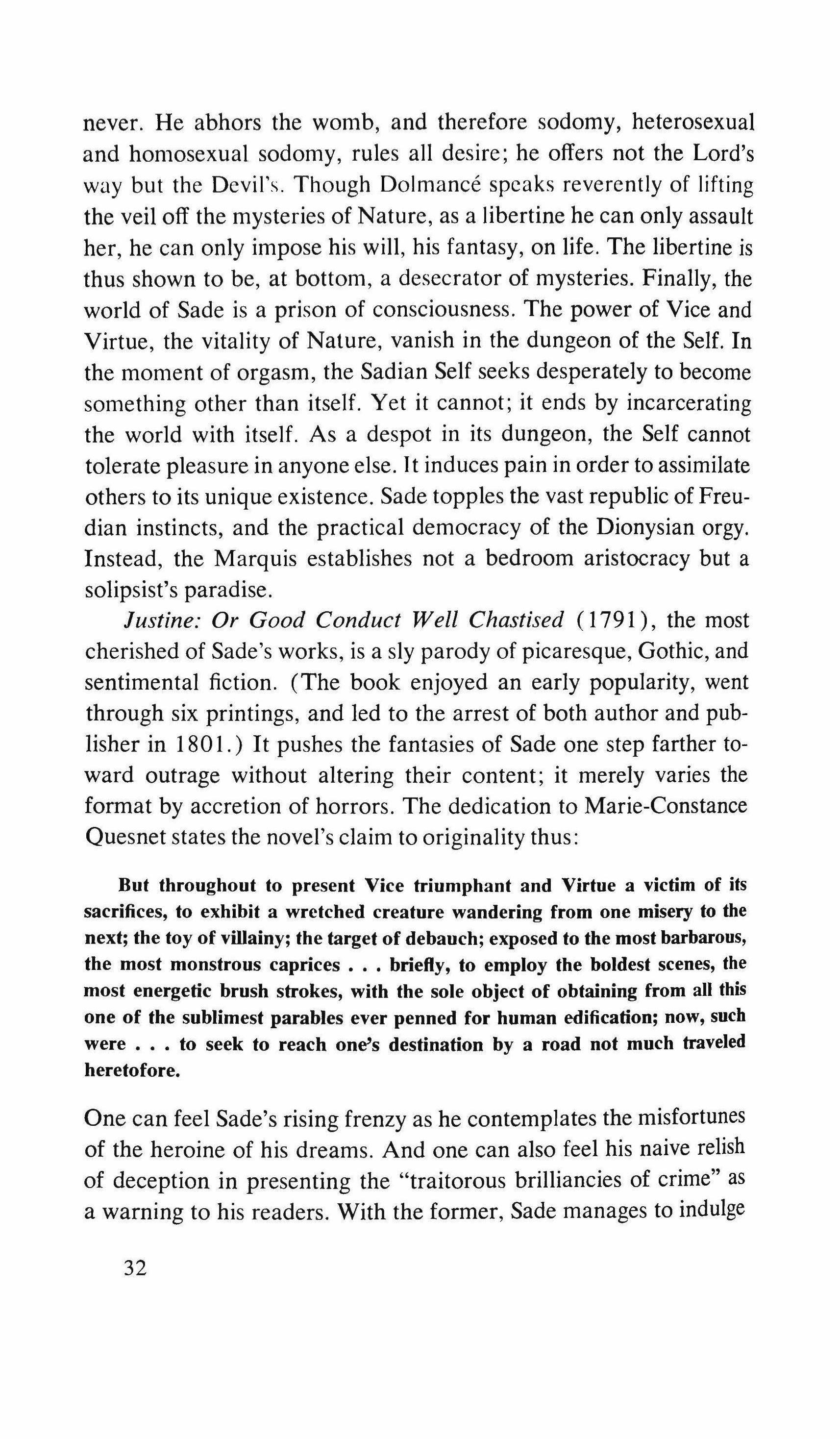
never. He abhors the womb, and therefore sodomy, heterosexual and homosexual sodomy, rules all desire; he offers not the Lord's way but the Devil's, Though Dolrnance speaks reverently of lifting the veil off the mysteries of Nature, as a libertine he can only assault her, he can only impose his will, his fantasy, on life. The libertine is thus shown to be, at bottom, a desecrator of mysteries. Finally, the world of Sade is a prison of consciousness. The power of Vice and Virtue, the vitality of Nature, vanish in the dungeon of the Self. In the moment of orgasm, the Sadian Self seeks desperately to become something other than itself. Yet it cannot; it ends by incarcerating the world with itself. As a despot in its dungeon, the Self cannot tolerate pleasure in anyone else. It induces pain in order to assimilate others to its unique existence. Sade topples the vast republic of Freudian instincts, and the practical democracy of the Dionysian orgy. Instead, the Marquis establishes not a bedroom aristocracy but a solipsist's paradise.
Justine: Or Good Conduct Well Chastised (1791), the most cherished of Sade's works, is a sly parody of picaresque, Gothic, and sentimental fiction. (The book enjoyed an early popularity, went through six printings, and led to the arrest of both author and publisher in 1801.) It pushes the fantasies of Sade one step farther toward outrage without altering their content; it merely varies the format by accretion of horrors. The dedication to Marie-Constance Quesnet states the novel's claim to originality thus:
But throughout to present Vice triumphant and Virtue a victim of its sacrifices, to exhibit a wretched creature wandering from one misery to the next; the toy of villainy; the target of debauch; exposed to the most barbarous, the most monstrous caprices briefly, to employ the boldest scenes, the most energetic brush strokes, with the sole object of obtaining from all this one of the sublimest parables ever penned for human edification; now, such were to seek to reach one's destination by a road not much traveled heretofore.
One can feel Sade's rising frenzy as he contemplates the misfortunes of the heroine of his dreams. And one can also feel his naive relish of deception in presenting the "traitorous brilliancies of crime" as a warning to his readers. With the former, Sade manages to indulge
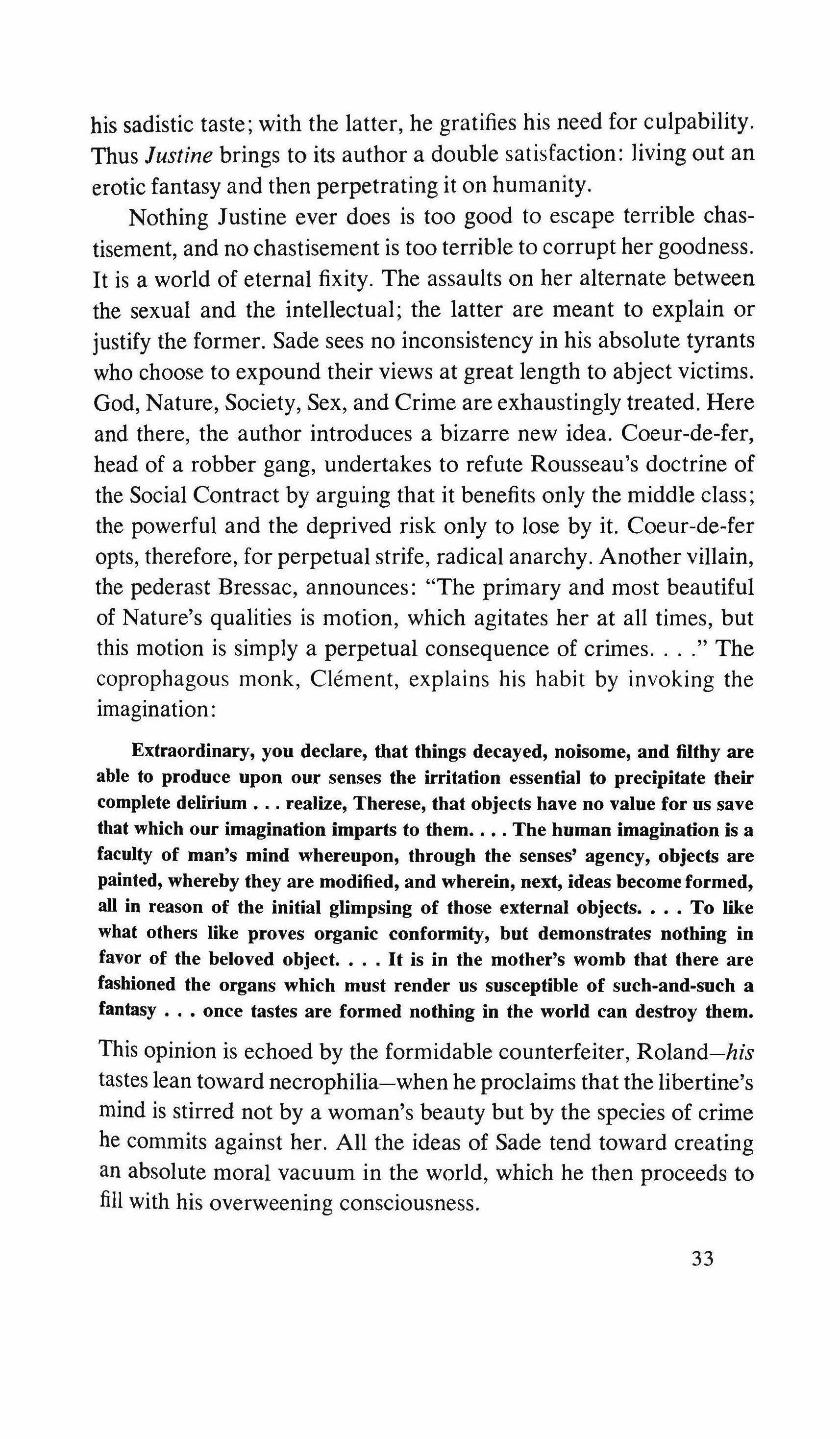
his sadistic taste; with the latter, he gratifies his need for culpability. Thus Justine brings to its author a double satisfaction: living out an erotic fantasy and then perpetrating it on humanity.
Nothing Justine ever does is too good to escape terrible chastisement, and no chastisement is too terrible to corrupt her goodness. It is a world of eternal fixity. The assaults on her alternate between the sexual and the intellectual; the latter are meant to explain or justify the former. Sade sees no inconsistency in his absolute tyrants who choose to expound their views at great length to abject victims. God, Nature, Society, Sex, and Crime are exhaustingly treated. Here and there, the author introduces a bizarre new idea. Coeur-de-fer, head of a robber gang, undertakes to refute Rousseau's doctrine of the Social Contract by arguing that it benefits only the middle class; the powerful and the deprived risk only to lose by it. Coeur-de-fer opts, therefore, for perpetual strife, radical anarchy. Another villain, the pederast Bressac, announces: "The primary and most beautiful of Nature's qualities is motion, which agitates her at all times, but this motion is simply a perpetual consequence of crimes The coprophagous monk, Clement, explains his habit by invoking the imagination:
Extraordinary, you declare, that things decayed, noisome, and filthy are able to produce upon our senses the irritation essential to precipitate their complete delirium •.. realize, Therese, that objects have no value for us save that which our imagination imparts to them The human imagination is a faculty of man's mind whereupon, through the senses' agency, objects are painted, whereby they are modified, and wherein, next, ideas become formed, all in reason of the initial glimpsing of those external objects To like what others like proves organic conformity, but demonstrates nothing in favor of the beloved object. It is in the mother's womb that there are fashioned the organs which must render us susceptible of such-and-such a fantasy ..• once tastes are formed nothing in the world can destroy them.
This opinion is echoed by the formidable counterfeiter, Roland-his tastes lean toward necrophilia-when he proclaims that the libertine's mind is stirred not by a woman's beauty but by the species of crime he commits against her. All the ideas of Sade tend toward creating an absolute moral vacuum in the world, which he then proceeds to fill with his overweening consciousness.
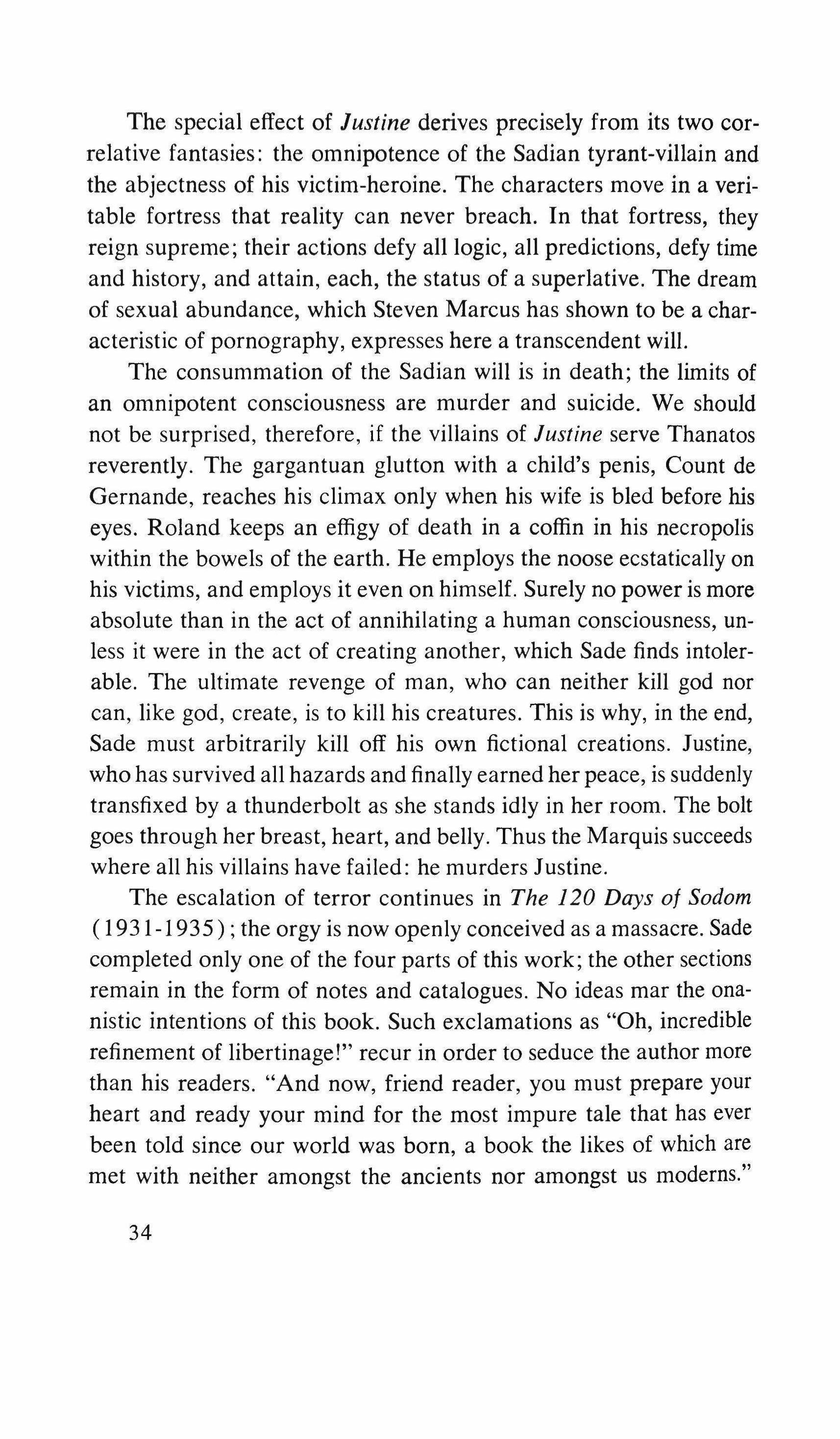
The special effect of Justine derives precisely from its two correlative fantasies: the omnipotence of the Sadian tyrant-villain and the abjectness of his victim-heroine. The characters move in a veritable fortress that reality can never breach. In that fortress, they reign supreme; their actions defy all logic, all predictions, defy time and history, and attain, each, the status of a superlative. The dream of sexual abundance, which Steven Marcus has shown to be a characteristic of pornography, expresses here a transcendent will.
The consummation of the Sadian will is in death; the limits of an omnipotent consciousness are murder and suicide. We should not be surprised, therefore, if the villains of Justine serve Thanatos reverently. The gargantuan glutton with a child's penis, Count de Gernande, reaches his climax only when his wife is bled before his eyes. Roland keeps an effigy of death in a coffin in his necropolis within the bowels of the earth. He employs the noose ecstatically on his victims, and employs it even on himself. Surely no power is more absolute than in the act of annihilating a human consciousness, unless it were in the act of creating another, which Sade finds intolerable. The ultimate revenge of man, who can neither kill god nor can, like god, create, is to kill his creatures. This is why, in the end, Sade must arbitrarily kill off his own fictional creations. Justine, who has survived all hazards and finally earned her peace, is suddenly transfixed by a thunderbolt as she stands idly in her room. The bolt goes through her breast, heart, and belly. Thus the Marquis succeeds where all his villains have failed: he murders Justine.
The escalation of terror continues in The 120 Days of Sodom ( 1931-1935) ; the orgy is now openly conceived as a massacre. Sade completed only one of the four parts of this work; the other sections remain in the form of notes and catalogues. No ideas mar the onanistic intentions of this book. Such exclamations as "Oh, incredible refinement of libertinage!" recur in order to seduce the author more than his readers. "And now, friend reader, you must prepare your heart and ready your mind for the most impure tale that has ever been told since our world was born, a book the likes of which are met with neither amongst the ancients nor amongst us moderns."

Sade, the pornographer, speaks out frankly, speaks even truly, but even as a pornographer, he speaks mainly to pleasure himself.
This is why the form of The 120 Days is reflexive; it can only mirror, or rather echo, itself. The four master libertines listen to four historians enumerate the 150 Simple, 150 Complex, 150 Criminal, and 150 Murderous Passions, which they then put into practice. Thus story and action echo back and forth to advantage; for as Sade says: "It is commonly accepted amongst thoroughbred libertines that the sensations communicated by the organs of hearing are the most flattering and those whose impressions are the liveliest. The.historians, in fact, serve their masters as Sade the author serves the man. The words we read turn back upon themselves; their form, repudiating an audience, becomes an antiform.
The pattern of the work justifies the rubric of antiform in another sense: it is purely arithmetical. With demented ingenuity, Sade reduces his fantasy to an equation. There are four master libertines, four wives who are their daughters, four woman historians, four duennas, eight fuckers, eight young girls, eight young boys, and six female cooks and scullery maids. The book is divided into four parts; the orgy lasts 17 weeks, or 120 days. All the arrangements of this mathematical menage are specified meticulously, the number of wines and dishes, the number of lashes for each punishment. The statutes which govern the progress of the orgy are as clear as they are inflexible; the schedule for the whole period is fixed. From a total of 46 characters, precisely 30 are massacred and 16 permitted to return to Paris. "Under no circumstances deviate from this plan," Sade enjoins himself in his notes, "everything has been worked out, the entirety several times reexamined with the greatest care and thoroughness." Number and ratio, we see, rule the form of this game directed by an autoerotic computer. In this Sade prefigures the parodic constructions of Beckett.
But the work is not only abstract, it is also hermetic. Nothing, absolutely nothing, must penetrate the Fortress of Silling where the action takes place, except the mind. That castle, situated somewhere on an impossible peak in the Black Forest, is impregnable because
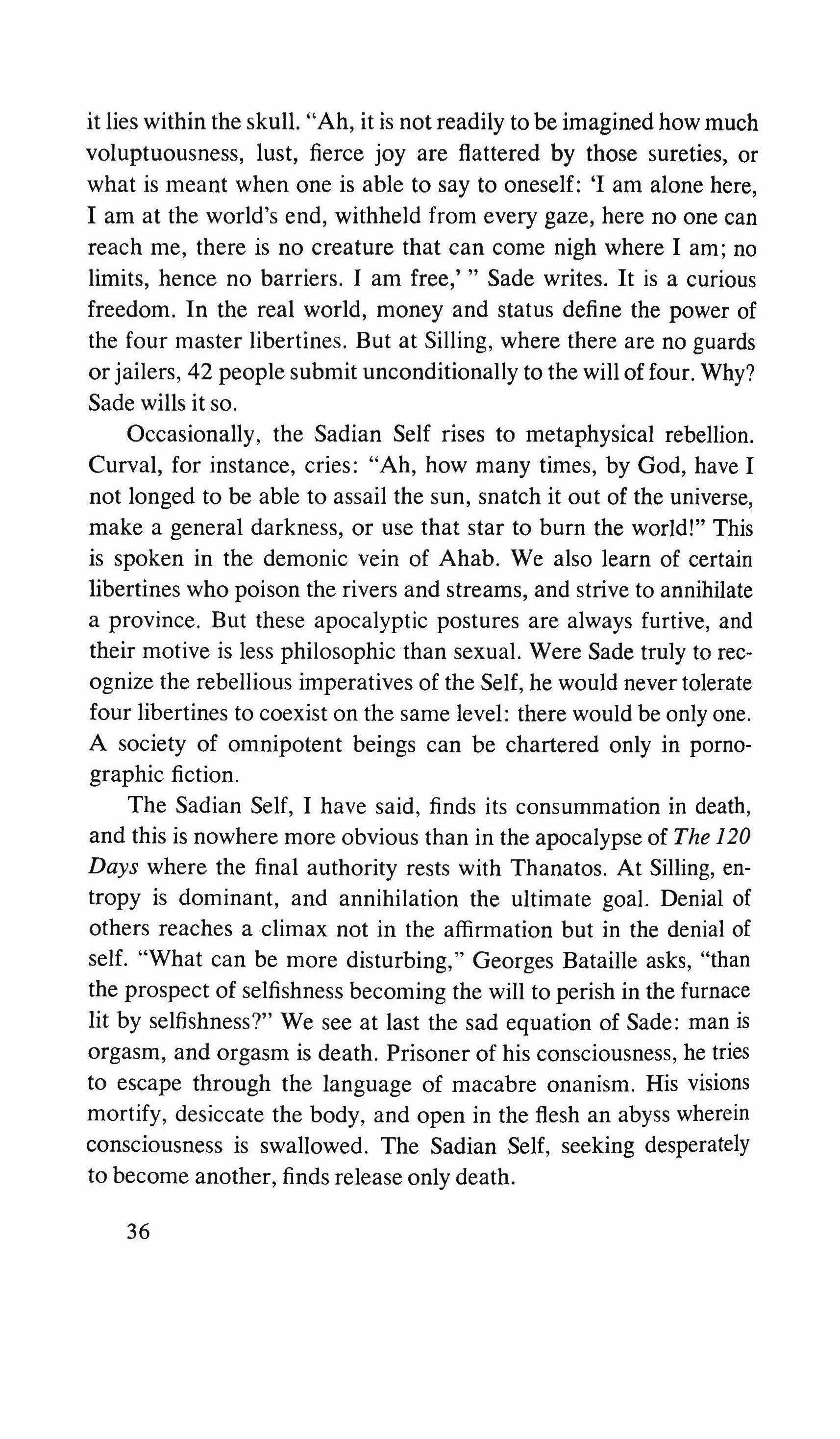
it lies within the skull. "Ah, it is not readily to be imagined how much voluptuousness, lust, fierce joy are flattered by those sureties, or what is meant when one is able to say to oneself: 'I am alone here, I am at the world's end, withheld from every gaze, here no one can reach me, there is no creature that can come nigh where I am; no limits, hence no barriers. I am free,' Sade writes. It is a curious freedom. In the real world, money and status define the power of the four master libertines. But at Silling, where there are no guards or jailers, 42 people submit unconditionally to the will of four. Why? Sade wills it so.
Occasionally, the Sadian Self rises to metaphysical rebellion. Curval, for instance, cries: "Ah, how many times, by God, have I not longed to be able to assail the sun, snatch it out of the universe, make a general darkness, or use that star to burn the world!" This is spoken in the demonic vein of Ahab. We also learn of certain libertines who poison the rivers and streams, and strive to annihilate a province. But these apocalyptic postures are always furtive, and their motive is less philosophic than sexual. Were Sade truly to recognize the rebellious imperatives of the Self, he would never tolerate four libertines to coexist on the same level: there would be only one. A society of omnipotent beings can be chartered only in pornographic fiction.
The Sadian Self, I have said, finds its consummation in death, and this is nowhere more obvious than in the apocalypse of The 120 Days where the final authority rests with Thanatos. At Silling, entropy is dominant, and annihilation the ultimate goal. Denial of others reaches a climax not in the affirmation but in the denial of self. "What can be more disturbing," Georges Bataille asks, "than the prospect of selfishness becoming the will to perish in the furnace lit by selfishness?" We see at last the sad equation of Sade: man is orgasm, and orgasm is death. Prisoner of his consciousness, he tries to escape through the language of macabre onanism. His visions mortify, desiccate the body, and open in the flesh an abyss wherein consciousness is swallowed. The Sadian Self, seeking desperately to become another, finds release only death. 36
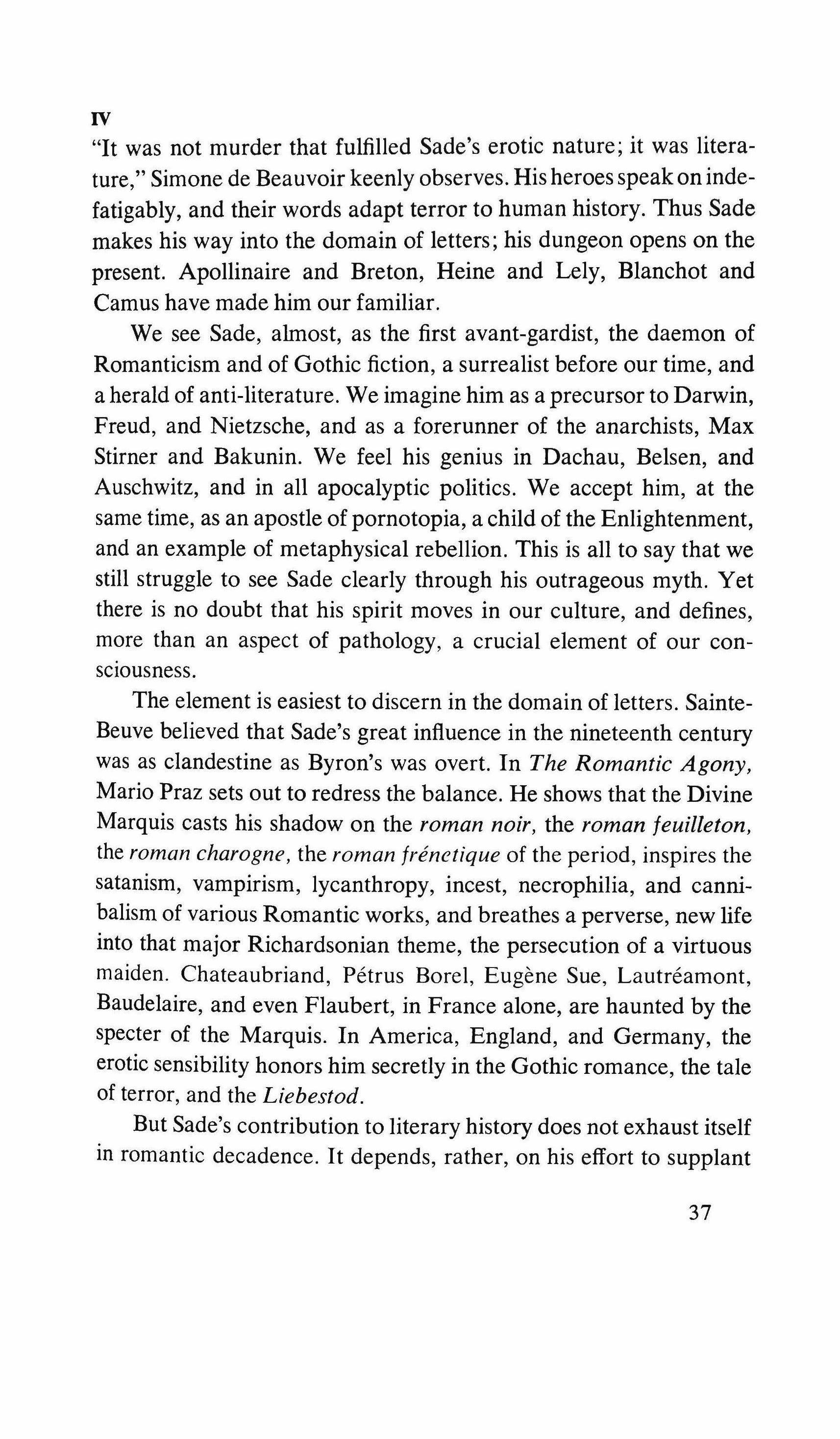
"It was not murder that fulfilled Sade's erotic nature; it was literature," Simone de Beauvoir keenly observes. His heroes speak on indefatigably, and their words adapt terror to human history. Thus Sade makes his way into the domain of letters; his dungeon opens on the present. Apollinaire and Breton, Heine and Lely, Blanchot and Camus have made him our familiar.
We see Sade, almost, as the first avant-gardist, the daemon of Romanticism and of Gothic fiction, a surrealist before our time, and a herald of anti-literature. We imagine him as a precursor to Darwin, Freud, and Nietzsche, and as a forerunner of the anarchists, Max Stirner and Bakunin. We feel his genius in Dachau, Belsen, and Auschwitz, and in all apocalyptic politics. We accept him, at the same time, as an apostle of pornotopia, a child of the Enlightenment, and an example of metaphysical rebellion. This is all to say that we still struggle to see Sade clearly through his outrageous myth. Yet there is no doubt that his spirit moves in our culture, and defines, more than an aspect of pathology, a crucial element of our consciousness.
The element is easiest to discern in the domain of letters. SainteBeuve believed that Sade's great influence in the nineteenth century was as clandestine as Byron's was overt. In The Romantic Agony, Mario Praz sets out to redress the balance. He shows that the Divine Marquis casts his shadow on the roman nair, the roman feuilleton, the roman charogne, the roman [renctique of the period, inspires the satanism, vampirism, lycanthropy, incest, necrophilia, and cannibalism of various Romantic works, and breathes a perverse, new life into that major Richardsonian theme, the persecution of a virtuous maiden. Chateaubriand, Petrus Borel, Eugene Sue, Lautreamont, Baudelaire, and even Flaubert, in France alone, are haunted by the specter of the Marquis. In America, England, and Germany, the erotic sensibility honors him secretly in the Gothic romance, the tale of terror, and the Liebestod.
But Sade's contribution to literary history does not exhaust itself in romantic decadence. It depends, rather, on his effort to supplant
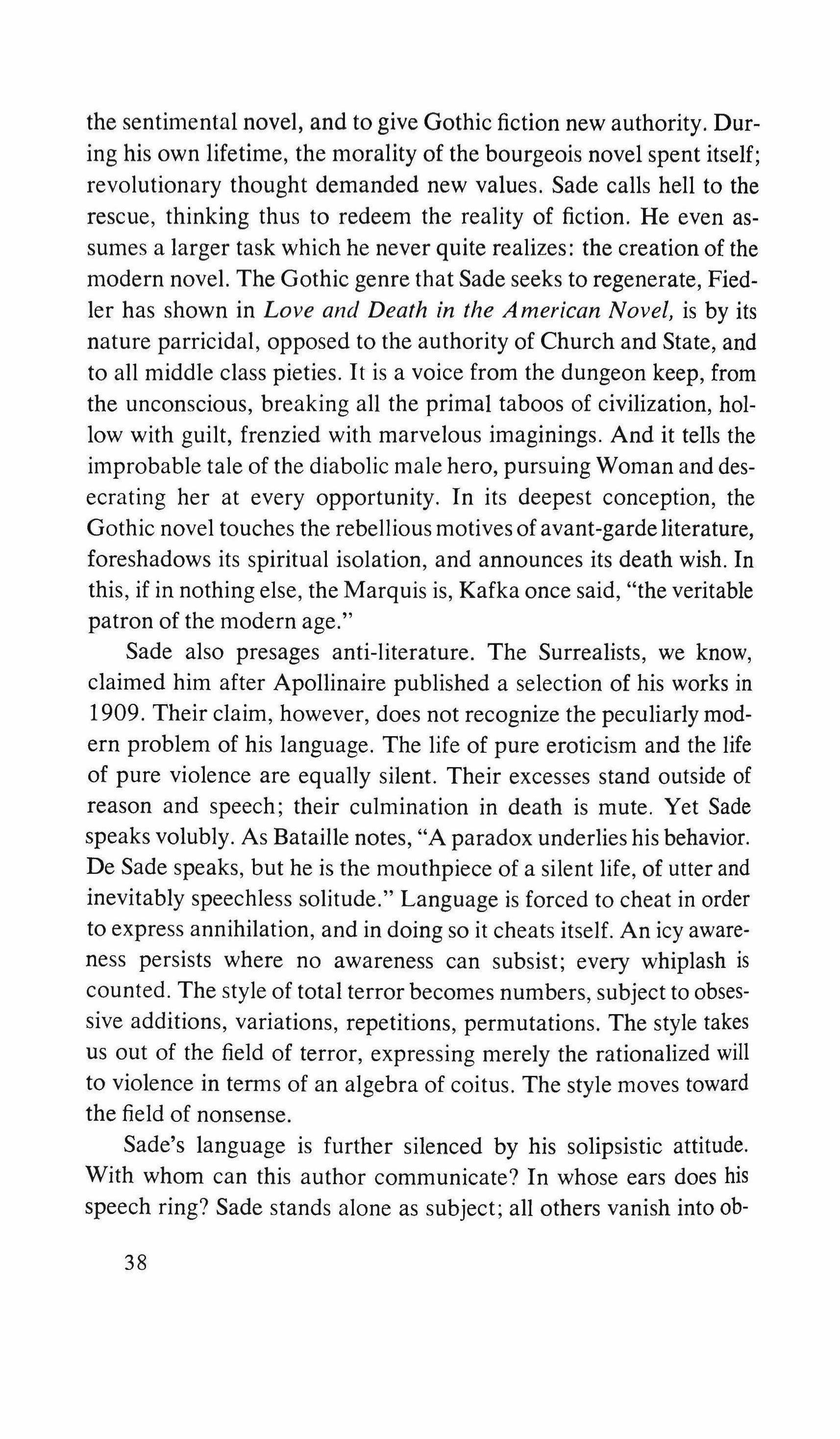
the sentimental novel, and to give Gothic fiction new authority. During his own lifetime, the morality of the bourgeois novel spent itself; revolutionary thought demanded new values. Sade calls hell to the rescue, thinking thus to redeem the reality of fiction. He even assumes a larger task which he never quite realizes: the creation of the modern novel. The Gothic genre that Sade seeks to regenerate, Fiedler has shown in Love and Death in the American Novel, is by its nature parricidal, opposed to the authority of Church and State, and to all middle class pieties. It is a voice from the dungeon keep, from the unconscious, breaking all the primal taboos of civilization, hollow with guilt, frenzied with marvelous imaginings. And it tells the improbable tale of the diabolic male hero, pursuing Woman and desecrating her at every opportunity. In its deepest conception, the Gothic novel touches the rebellious motives of avant-gardeliterature, foreshadows its spiritual isolation, and announces its death wish. In this, if in nothing else, the Marquis is, Kafka once said, "the veritable patron of the modern age."
Sade also presages anti-literature. The Surrealists, we know, claimed him after Apollinaire published a selection of his works in 1909. Their claim, however, does not recognize the peculiarly modern problem of his language. The life of pure eroticism and the life of pure violence are equally silent. Their excesses stand outside of reason and speech; their culmination in death is mute. Yet Sade speaks volubly. As Bataille notes, "A paradox underlies his behavior. De Sade speaks, but he is the mouthpiece of a silent life, of utter and inevitably speechless solitude." Language is forced to cheat in order to express annihilation, and in doing so it cheats itself. An icy awareness persists where no awareness can subsist; every whiplash is counted. The style of total terror becomes numbers, subject to obsessive additions, variations, repetitions, permutations. The style takes us out of the field of terror, expressing merely the rationalized will to violence in terms of an algebra of coitus. The style moves toward the field of nonsense.
Sade's language is further silenced by his solipsistic attitude. With whom can this author communicate? In whose ears does his speech ring? Sade stands alone as subject; all others vanish into ob-
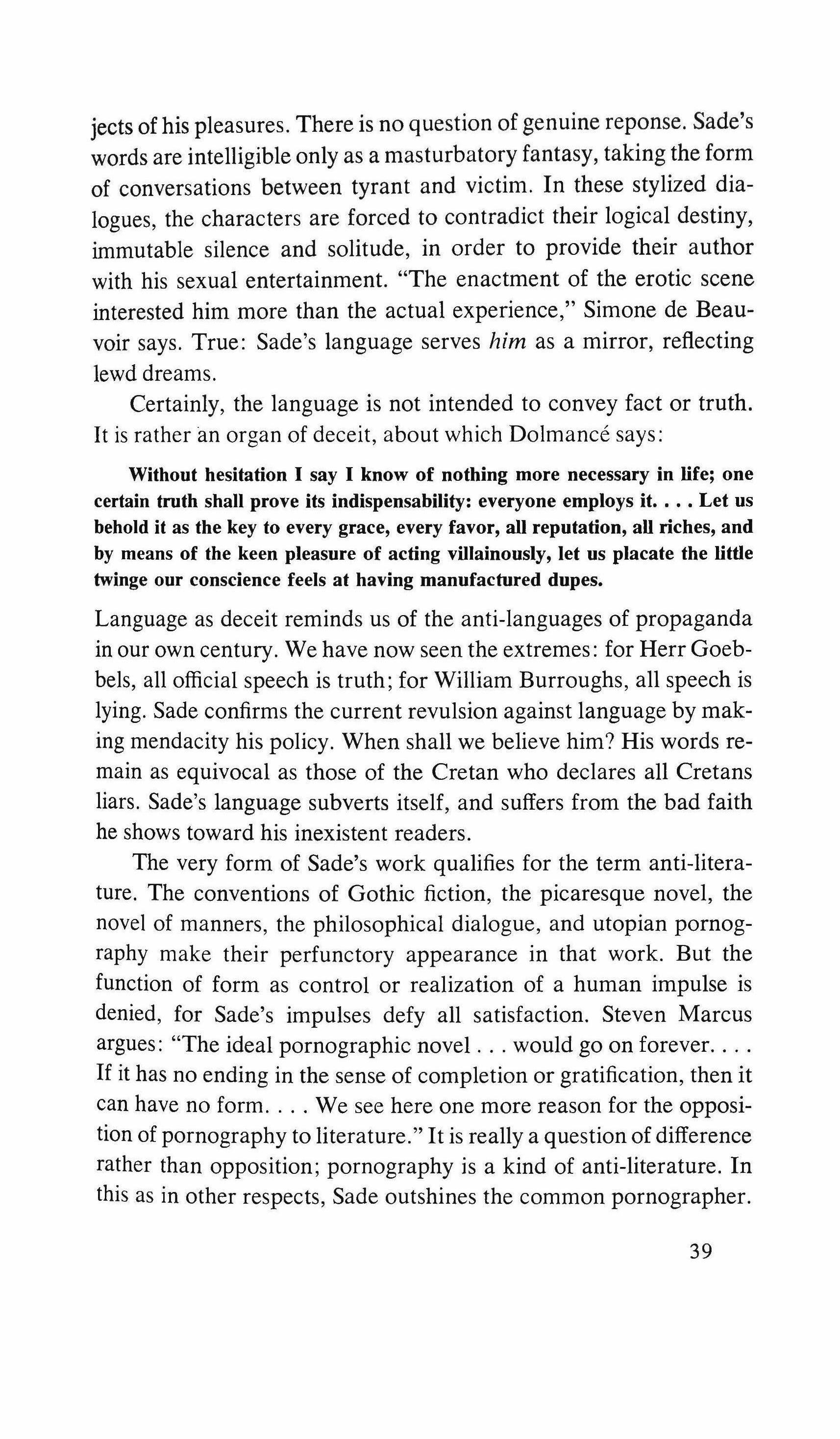
jects of his pleasures. There is no question of genuine reponse. Sade's words are intelligible only as a masturbatory fantasy, taking the form of conversations between tyrant and victim. In these stylized dialogues, the characters are forced to contradict their logical destiny, immutable silence and solitude, in order to provide their author with his sexual entertainment. "The enactment of the erotic scene interested him more than the actual experience," Simone de Beauvoir says. True: Sade's language serves him as a mirror, reflecting lewd dreams.
Certainly, the language is not intended to convey fact or truth. It is rather an organ of deceit, about which Dolmance says:
Without hesitation I say I know of nothing more necessary in life; one certain truth shall prove its indispensability: everyone employs it•..• Let us behold it as the key to every grace, every favor, all reputation, aU riches, and by means of the keen pleasure of acting villainously, let us placate the little twinge our conscience feels at having manufactured dupes.
Language as deceit reminds us of the anti-languages of propaganda in our own century. We have now seen the extremes: for Herr Goebbels, all official speech is truth; for William Burroughs, all speech is lying. Sade confirms the current revulsion against language by making mendacity his policy. When shall we believe him? His words remain as equivocal as those of the Cretan who declares all Cretans liars. Sade's language subverts itself, and suffers from the bad faith he shows toward his inexistent readers.
The very form of Sade's work qualifies for the term anti-literature. The conventions of Gothic fiction, the picaresque novel, the novel of manners, the philosophical dialogue, and utopian pornography make their perfunctory appearance in that work. But the function of form as control or realization of a human impulse is denied, for Sade's impulses defy all satisfaction. Steven Marcus argues: "The ideal pornographic novel would go on forever. If it has no ending in the sense of completion or gratification, then it can have no form We see here one more reason for the opposition of pornography to literature." It is really a question of difference rather than opposition; pornography is a kind of anti-literature. In this as in other respects, Sade outshines the common pornographer.
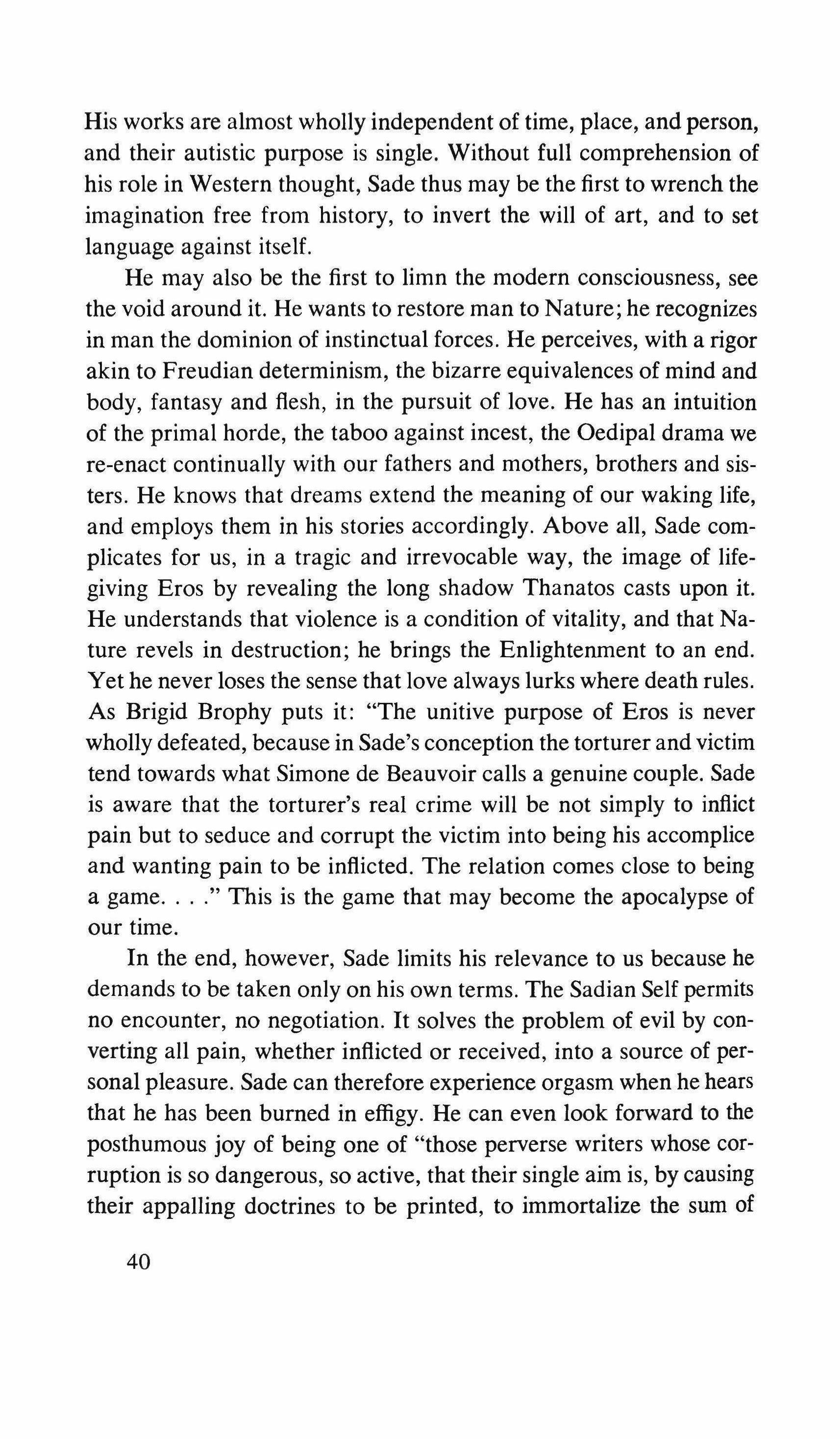
His works are almost wholly independent of time, place, and person, and their autistic purpose is single. Without full comprehension of his role in Western thought, Sade thus may be the first to wrench the imagination free from history, to invert the will of art, and to set language against itself.
He may also be the first to limn the modern consciousness, see the void around it. He wants to restore man to Nature; he recognizes in man the dominion of instinctual forces. He perceives, with a rigor akin to Freudian determinism, the bizarre equivalences of mind and body, fantasy and flesh, in the pursuit of love. He has an intuition of the primal horde, the taboo against incest, the Oedipal drama we re-enact continually with our fathers and mothers, brothers and sisters. He knows that dreams extend the meaning of our waking life, and employs them in his stories accordingly. Above all, Sade complicates for us, in a tragic and irrevocable way, the image of lifegiving Eros by revealing the long shadow Thanatos casts upon it. He understands that violence is a condition of vitality, and that Nature revels in destruction; he brings the Enlightenment to an end. Yet he never loses the sense that love always lurks where death rules. As Brigid Brophy puts it: "The unitive purpose of Eros is never wholly defeated, because in Sade's conception the torturer and victim tend towards what Simone de Beauvoir calls a genuine couple. Sade is aware that the torturer's real crime will be not simply to inflict pain but to seduce and corrupt the victim into being his accomplice and wanting pain to be inflicted. The relation comes close to being a game This is the game that may become the apocalypse of our time.
In the end, however, Sade limits his relevance to us because he demands to be taken only on his own terms. The Sadian Self permits no encounter, no negotiation. It solves the problem of evil by converting all pain, whether inflicted or received, into a source of personal pleasure. Sade can therefore experience orgasm when he hears that he has been burned in effigy. He can even look forward to the posthumous joy of being one of "those perverse writers whose corruption is so dangerous, so active, that their single aim is, by causing their appalling doctrines to be printed, to immortalize the sum of
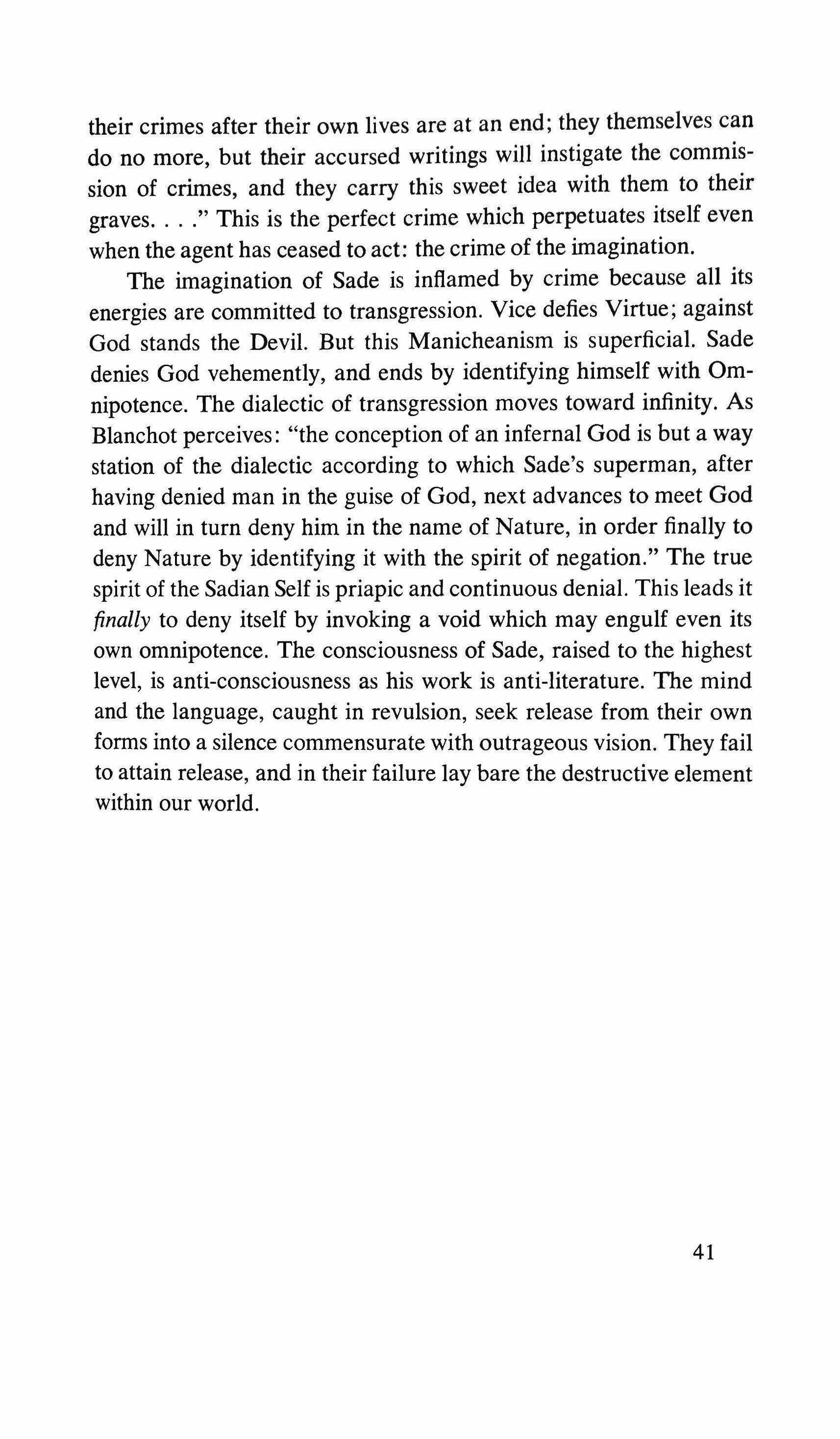
their crimes after their own lives are at an end; they themselves can do no more, but their accursed writings will instigate the commission of crimes, and they carry this sweet idea with them to their graves This is the perfect crime which perpetuates itself even when the agent has ceased to act: the crime of the imagination. The imagination of Sade is inflamed by crime because all its energies are committed to transgression. Vice defies Virtue; against God stands the Devil. But this Manicheanism is superficial. Sade denies God vehemently, and ends by identifying himself with Omnipotence. The dialectic of transgression moves toward infinity. As Blanchot perceives: "the conception of an infernal God is but a way station of the dialectic according to which Sade's superman, after having denied man in the guise of God, next advances to meet God and will in turn deny him in the name of Nature, in order finally to deny Nature by identifying it with the spirit of negation." The true spirit of the Sadian Self is priapic and continuous denial. This leads it finally to deny itself by invoking a void which may engulf even its own omnipotence. The consciousness of Sade, raised to the highest level, is anti-consciousness as his work is anti-literature. The mind and the language, caught in revulsion, seek release from their own forms into a silence commensurate with outrageous vision. They fail to attain release, and in their failure lay bare the destructive element within our world.
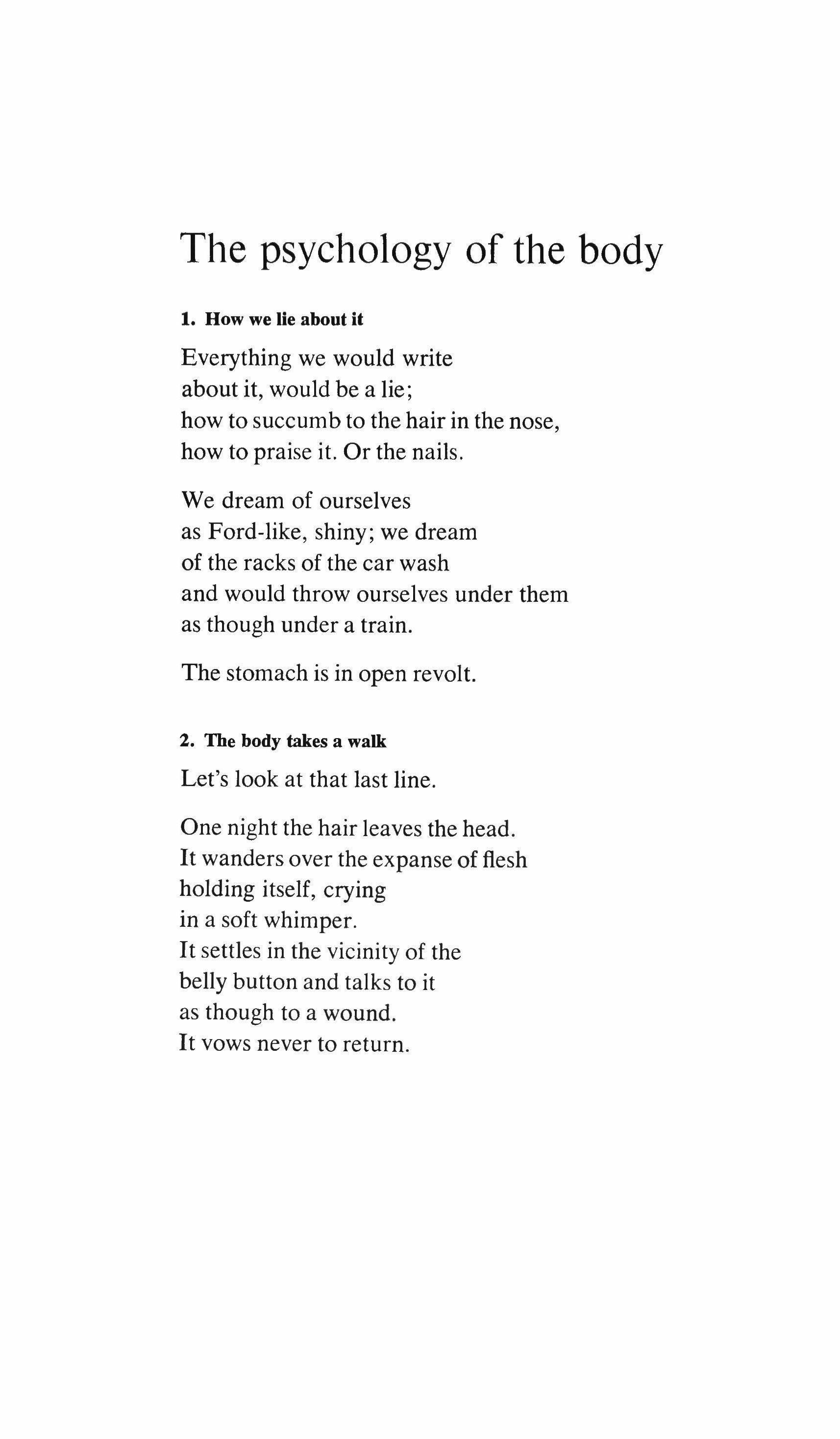
1. How we lie about it
Everything we would write about it, would be a lie; how to succumb to the hair in the nose, how to praise it. Or the nails.
We dream of ourselves as Ford-like, shiny; we dream of the racks of the car wash and would throw ourselves under them as though under a train.
The stomach is in open revolt.
2. The body takes a walk
Let's look at that last line.
One night the hair leaves the head. It wanders over the expanse of flesh holding itself, crying in a soft whimper.
It settles in the vicinity of the belly button and talks to it as though to a wound. It vows never to return.
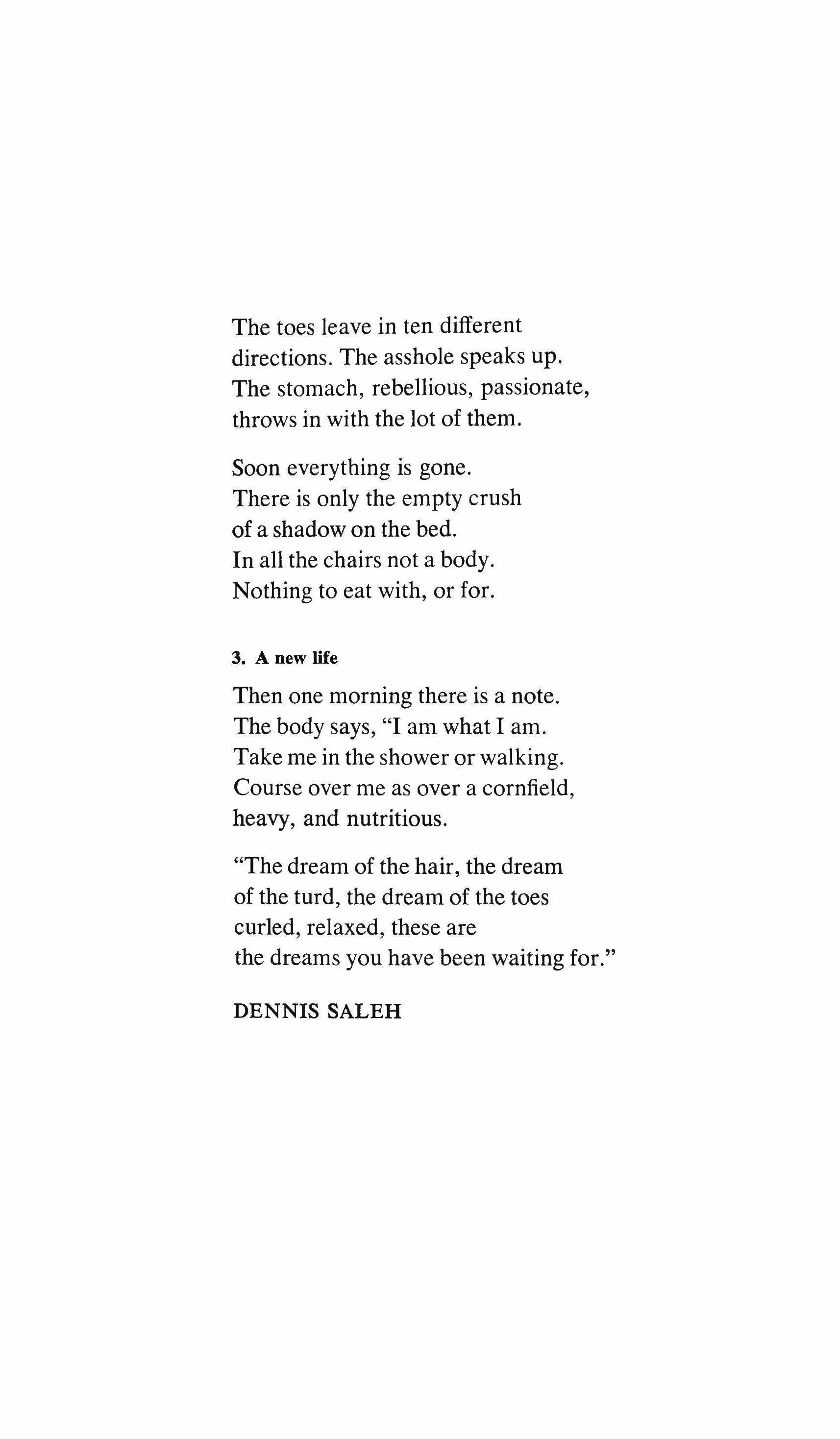
The toes leave in ten different directions. The asshole speaks up. The stomach, rebellious, passionate, throws in with the lot of them.
Soon everything is gone. There is only the empty crush of a shadow on the bed. In all the chairs not a body. Nothing to eat with, or for.
3. A new life
Then one morning there is a note. The body says, "I am what I am. Take me in the shower or walking. Course over me as over a cornfield, heavy, and nutritious.
"The dream of the hair, the dream of the turd, the dream of the toes curled, relaxed, these are the dreams you have been waiting for."
DENNIS SALEH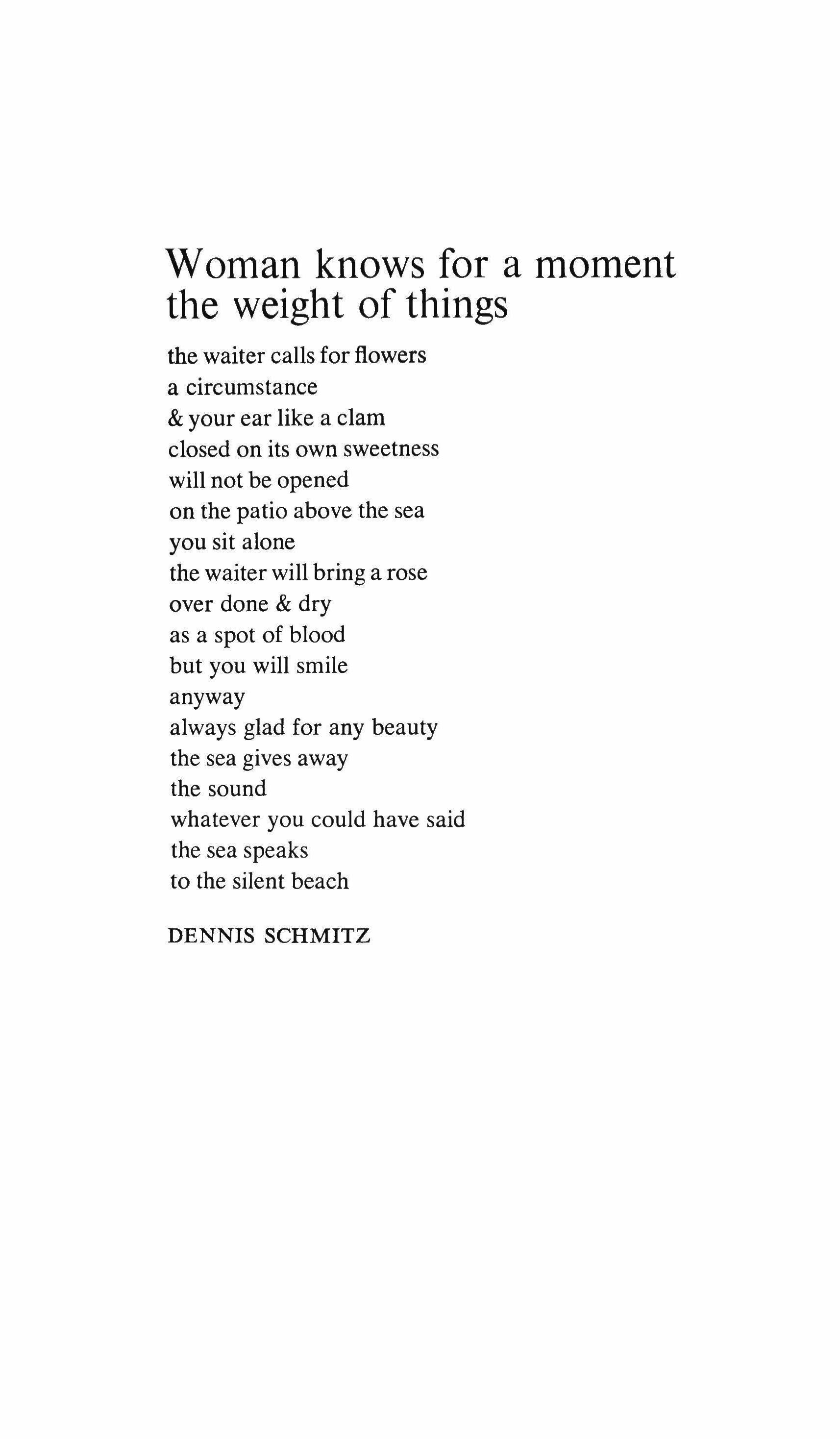
the waiter calls for flowers a circumstance & your ear like a clam closed on its own sweetness will not be opened on the patio above the sea you sit alone the waiter will bring a rose over done & dry as a spot of blood but you will smile anyway always glad for any beauty the sea gives away the sound whatever you could have said the sea speaks to the silent beach
DENNIS SCHMITZ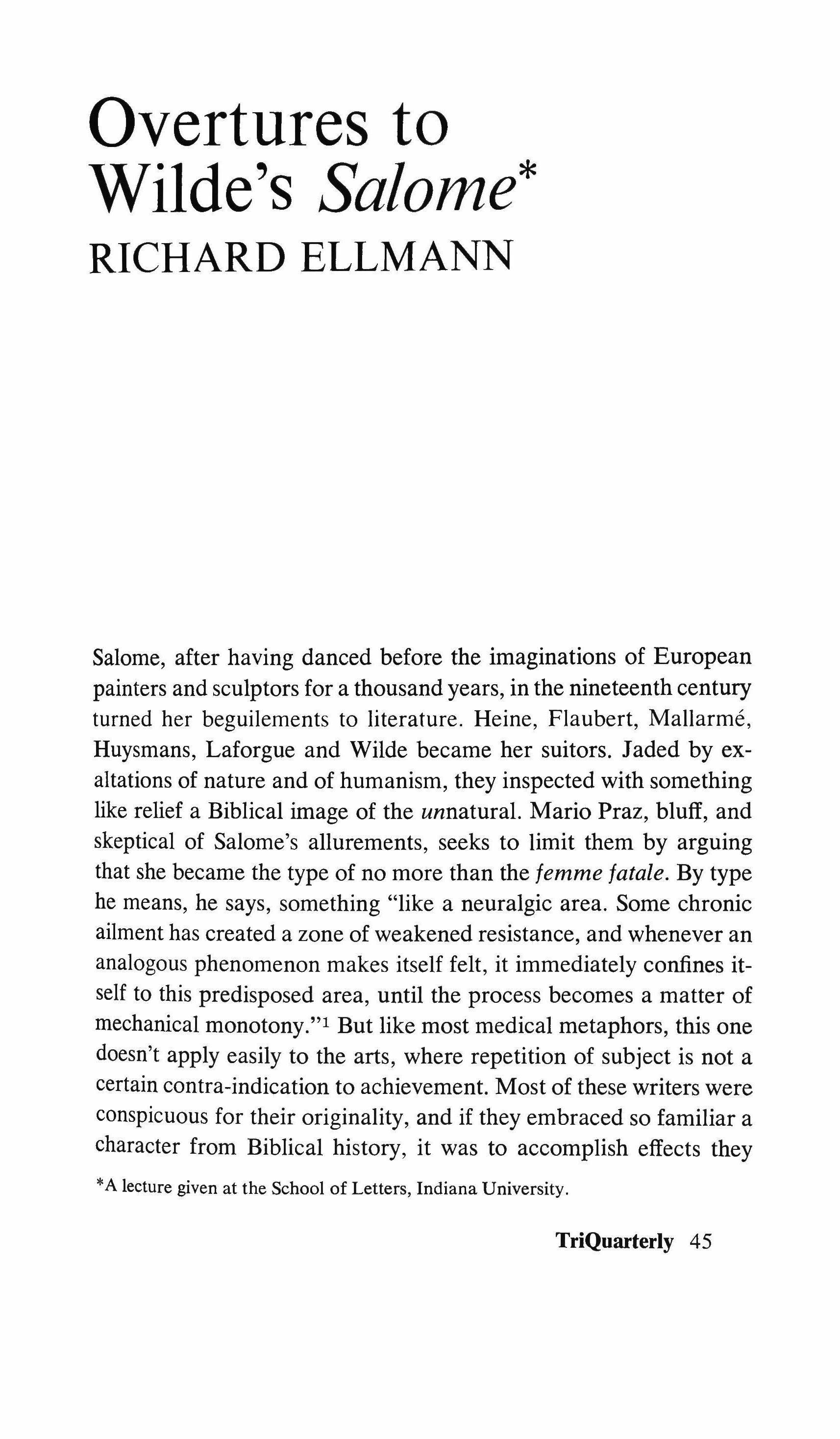
Salome, after having danced before the imaginations of European painters and sculptors for a thousand years, in the nineteenth century turned her beguilements to literature. Heine, Flaubert, Mallarrne, Huysmans, Laforgue and Wilde became her suitors. Jaded by exaltations of nature and of humanism, they inspected with something like relief a Biblical image of the unnatural. Mario Praz, bluff, and skeptical of Salome's allurements, seeks to limit them by arguing that she became the type of no more than the femme fatale. By type he means, he says, something "like a neuralgic area. Some chronic ailment has created a zone of weakened resistance, and whenever an analogous phenomenon makes itself felt, it immediately confines itself to this predisposed area, until the process becomes a matter of mechanical monotony."! But like most medical metaphors, this one doesn't apply easily to the arts, where repetition of subject is not a certain contra-indication to achievement. Most of these writers were conspicuous for their originality, and if they embraced so familiar a character from Biblical history, it was to accomplish effects they
* A lecture given at the School of Letters, Indiana University.
TriQuarterly 45
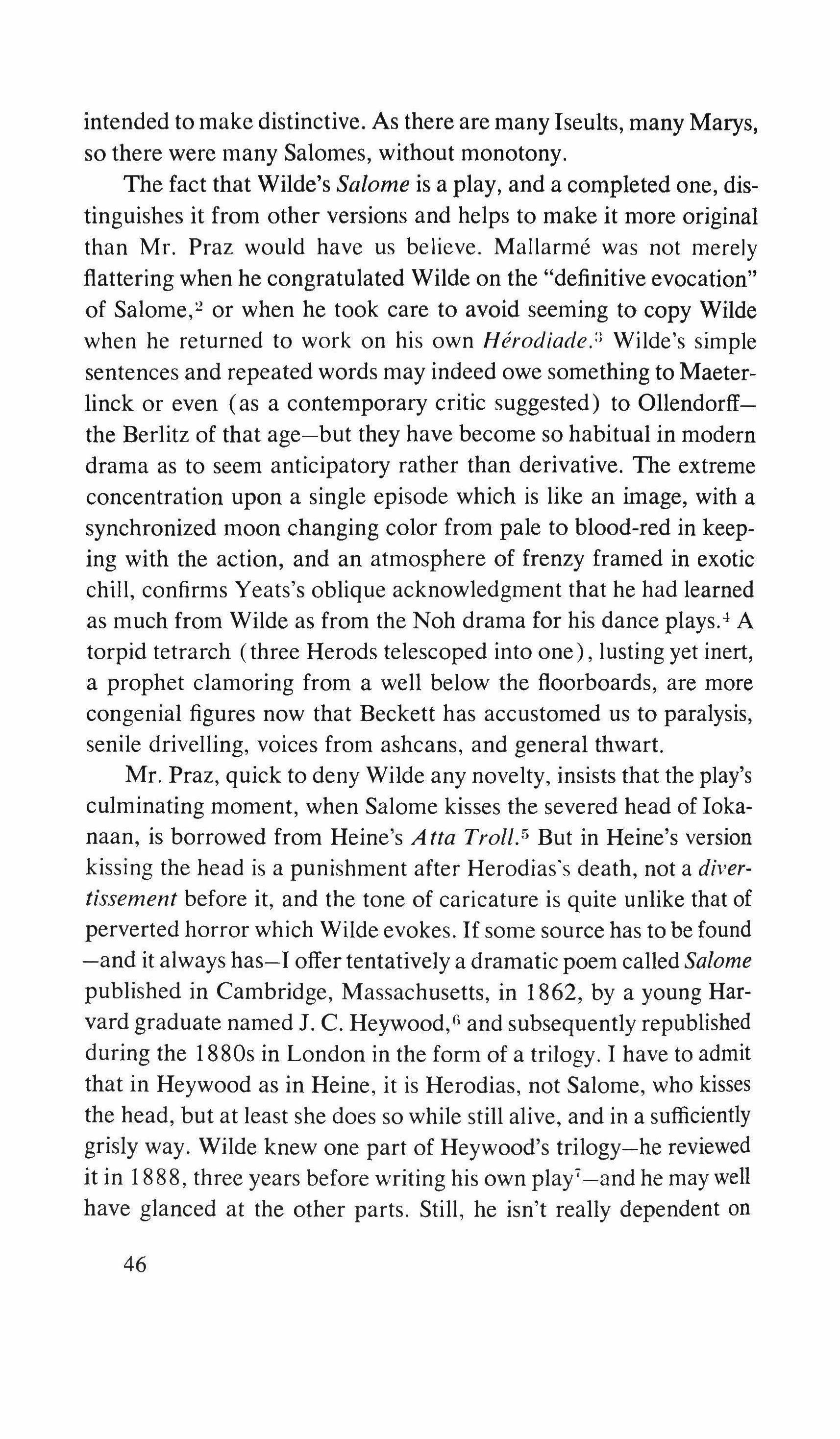
intended to make distinctive. As there are many Iseults, many Marys, so there were many Salomes, without monotony.
The fact that Wilde's Salome is a play, and a completed one, distinguishes it from other versions and helps to make it more original than Mr. Praz would have us believe. Mallarrne was not merely flattering when he congratulated Wilde on the "definitive evocation" of Salome," or when he took care to avoid seeming to copy Wilde when he returned to work on his own Herodiade» Wilde's simple sentences and repeated words may indeed owe something to Maeterlinck or even (as a contemporary critic suggested) to Ollendorffthe Berlitz of that age-but they have become so habitual in modern drama as to seem anticipatory rather than derivative. The extreme concentration upon a single episode which is like an image, with a synchronized moon changing color from pale to blood-red in keeping with the action, and an atmosphere of frenzy framed in exotic chill, confirms Yeats's oblique acknowledgment that he had learned as much from Wilde as from the Noh drama for his dance plays.! A torpid tetrarch (three Herods telescoped into one), lusting yet inert, a prophet clamoring from a well below the floorboards, are more congenial figures now that Beckett has accustomed us to paralysis, senile drivelling, voices from ashcans, and general thwart.
Mr. Praz, quick to deny Wilde any novelty, insists that the play's culminating moment, when Salome kisses the severed head of Iokanaan, is borrowed from Heine's A tta Troll+ But in Heine's version kissing the head is a punishment after Herodias's death, not a divertissement before it, and the tone of caricature is quite unlike that of perverted horror which Wilde evokes. If some source has to be found -and it always has-T offer tentatively a dramatic poem called Salome published in Cambridge, Massachusetts, in 1862, by a young Harvard graduate named J. C. Heywood," and subsequently republished during the 1880s in London in the form of a trilogy. I have to admit that in Heywood as in Heine, it is Herodias, not Salome, who kisses the head, but at least she does so while still alive, and in a sufficiently grisly way. Wilde knew one part of Heywood's trilogy-he reviewed it in 1888, three years before writing his own play--and he may well have glanced at the other parts. Still, he isn't really dependent on
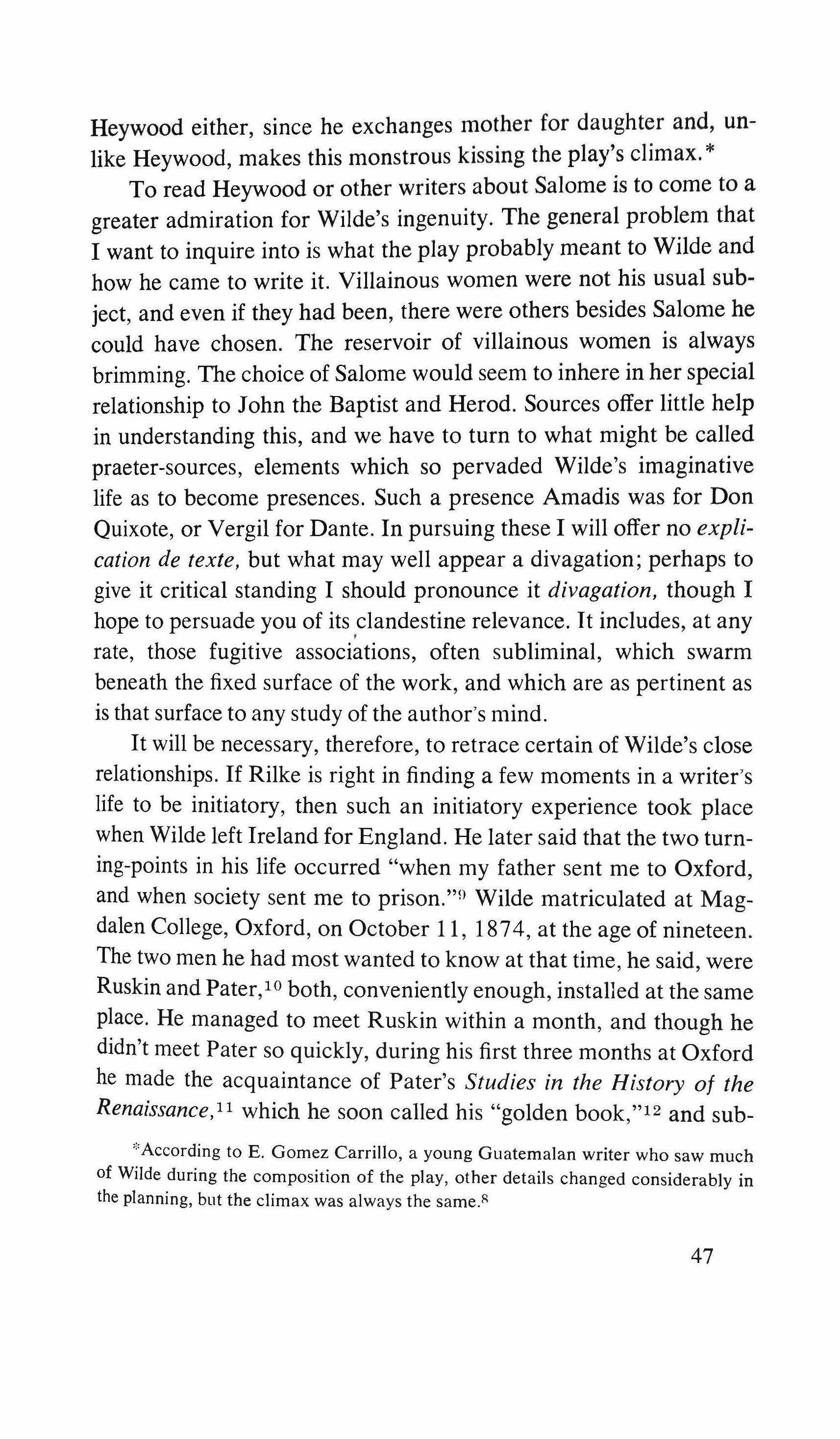
Heywood either, since he exchanges mother for daughter and, unlike Heywood, makes this monstrous kissing the play's climax. *
To read Heywood or other writers about Salome is to come to a greater admiration for Wilde's ingenuity. The general problem that I want to inquire into is what the play probably meant to Wilde and how he came to write it. Villainous women were not his usual subject, and even if they had been, there were others besides Salome he could have chosen. The reservoir of villainous women is always brimming. The choice of Salome would seem to inhere in her special relationship to John the Baptist and Herod. Sources offer little help in understanding this, and we have to turn to what might be called praeter-sources, elements which so pervaded Wilde's imaginative life as to become presences. Such a presence Amadis was for Don Quixote, or Vergil for Dante. In pursuing these I will offer no explication de texte, but what may well appear a divagation; perhaps to give it critical standing I should pronounce it divagation, though I hope to persuade you of its clandestine relevance. It includes, at any rate, those fugitive associations, often subliminal, which swarm beneath the fixed surface of the work, and which are as pertinent as is that surface to any study of the author's mind.
It will be necessary, therefore, to retrace certain of Wilde's close relationships. If Rilke is right in finding a few moments in a writer's life to be initiatory, then such an initiatory experience took place when Wilde left Ireland for England. He later said that the two turning-points in his life occurred "when my father sent me to Oxford, and when society sent me to prison.?" Wilde matriculated at Magdalen College, Oxford, on October 11, 1874, at the age of nineteen. The two men he had most wanted to know at that time, he said, were Ruskin and Pater, 10 both, conveniently enough, installed at the same place. He managed to meet Ruskin within a month, and though he didn't meet Pater so quickly, during his first three months at Oxford he made the acquaintance of Pater's Studies in the History of the Renaissance.ii which he soon called his "golden book,"12 and sub-
"According to E. Gomez Carrillo, a young Guatemalan writer who saw much of Wilde during the composition of the play, other details changed considerably in the planning, but the climax was always the same.f
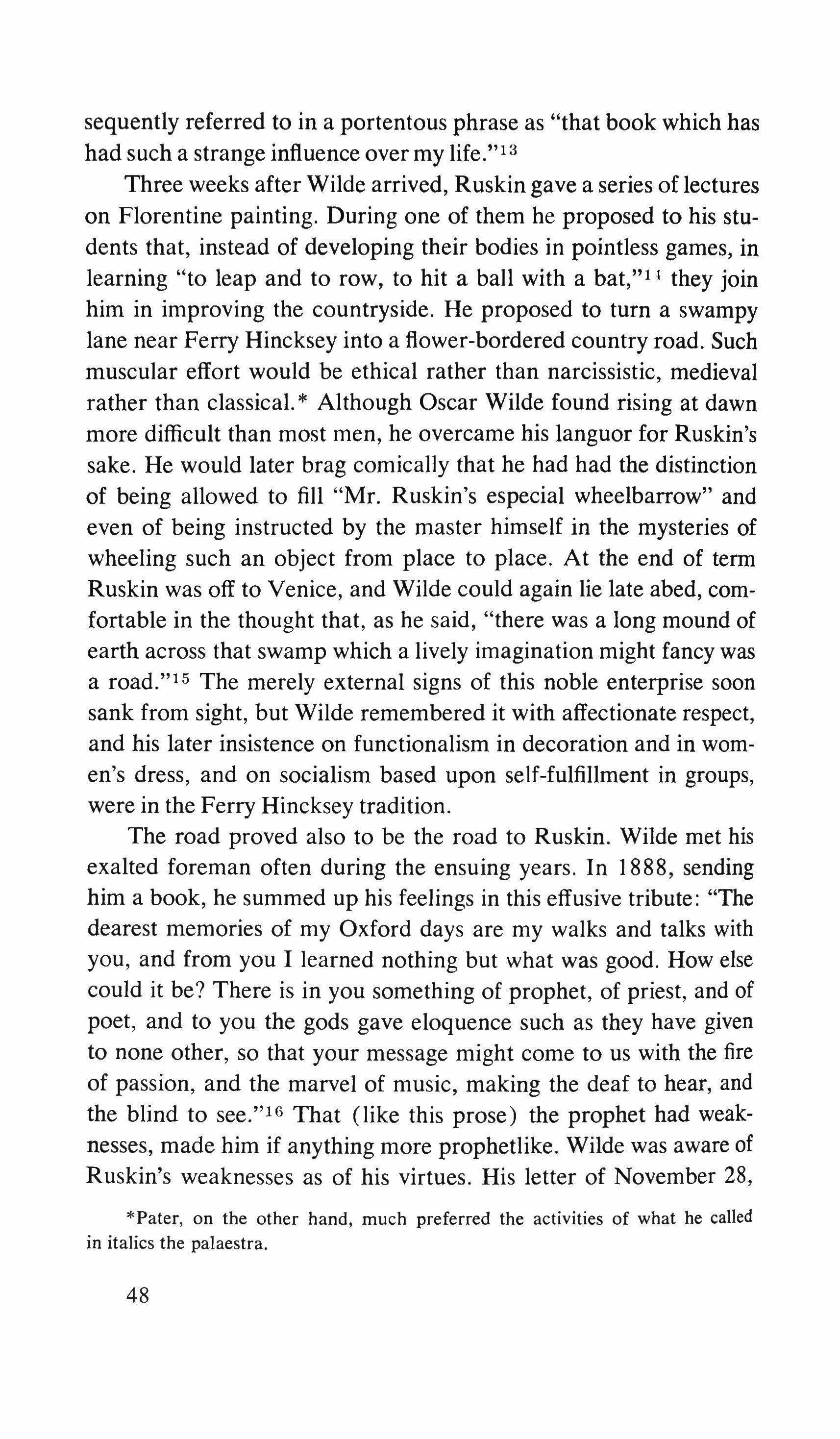
sequently referred to in a portentous phrase as "that book which has had such a strange influence over my life."13
Three weeks after Wilde arrived, Ruskin gave a series of lectures on Florentine painting. During one of them he proposed to his students that, instead of developing their bodies in pointless games, in learning "to leap and to row, to hit a ball with a bat.:" they join him in improving the countryside. He proposed to turn a swampy lane near Ferry Hincksey into a flower-bordered country road. Such muscular effort would be ethical rather than narcissistic, medieval rather than classical. * Although Oscar Wilde found rising at dawn more difficult than most men, he overcame his languor for Ruskin's sake. He would later brag comically that he had had the distinction of being allowed to fill "Mr. Ruskin's especial wheelbarrow" and even of being instructed by the master himself in the mysteries of wheeling such an object from place to place. At the end of term Ruskin was off to Venice, and Wilde could again lie late abed, comfortable in the thought that, as he said, "there was a long mound of earth across that swamp which a lively imagination might fancy was a road."15 The merely external signs of this noble enterprise soon sank from sight, but Wilde remembered it with affectionate respect, and his later insistence on functionalism in decoration and in women's dress, and on socialism based upon self-fulfillment in groups, were in the Ferry Hincksey tradition.
The road proved also to be the road to Ruskin. Wilde met his exalted foreman often during the ensuing years. In 1888, sending him a book, he summed up his feelings in this effusive tribute: "The dearest memories of my Oxford days are my walks and talks with you, and from you I learned nothing but what was good. How else could it be? There is in you something of prophet, of priest, and of poet, and to you the gods gave eloquence such as they have given to none other, so that your message might come to us with the fire of passion, and the marvel of music, making the deaf to hear, and the blind to see."16 That (like this prose) the prophet had weaknesses, made him if anything more prophetlike. Wilde was aware of Ruskin's weaknesses as of his virtues. His letter of November 28,
*Pater, on the other hand, much preferred the activities of what he called in italics the palaestra.
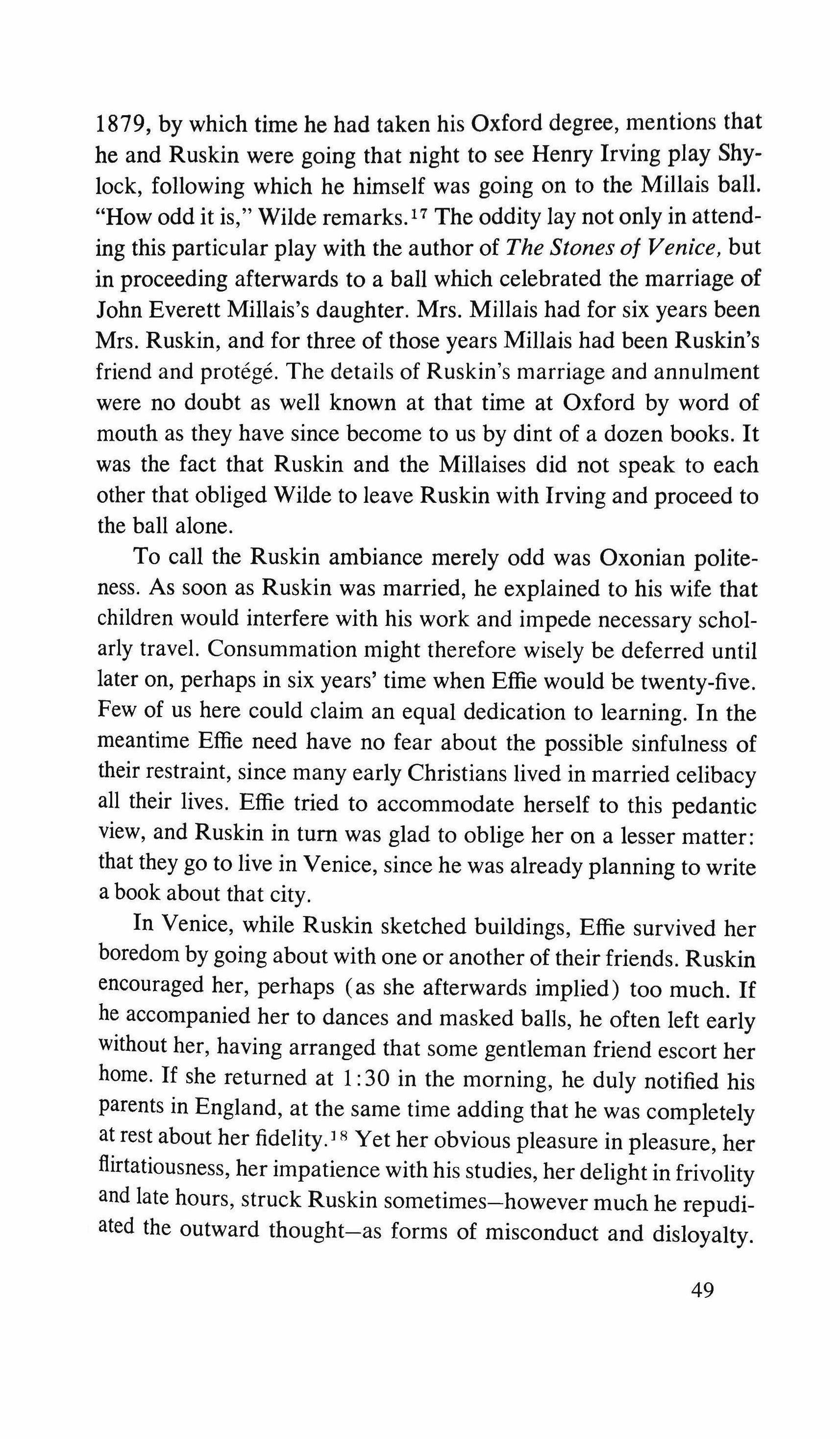
1879, by which time he had taken his Oxford degree, mentions that he and Ruskin were going that night to see Henry Irving play Shylock, following which he himself was going on to the Millais ball. "How odd it is," Wilde remarks. 17 The oddity lay not only in attending this particular play with the author of The Stones of Venice, but in proceeding afterwards to a ball which celebrated the marriage of John Everett Millais's daughter. Mrs. Millais had for six years been Mrs. Ruskin, and for three of those years Millais had been Ruskin's friend and protege. The details of Ruskin's marriage and annulment were no doubt as well known at that time at Oxford by word of mouth as they have since become to us by dint of a dozen books. It was the fact that Ruskin and the Millaises did not speak to each other that obliged Wilde to leave Ruskin with Irving and proceed to the ball alone.
To call the Ruskin ambiance merely odd was Oxonian politeness. As soon as Ruskin was married, he explained to his wife that children would interfere with his work and impede necessary scholarly travel. Consummation might therefore wisely be deferred until later on, perhaps in six years' time when Effie would be twenty-five. Few of us here could claim an equal dedication to learning. In the meantime Effie need have no fear about the possible sinfulness of their restraint, since many early Christians lived in married celibacy all their lives. Effie tried to accommodate herself to this pedantic view, and Ruskin in tum was glad to oblige her on a lesser matter: that they go to live in Venice, since he was already planning to write a book about that city.
In Venice, while Ruskin sketched buildings, Effie survived her boredom by going about with one or another of their friends. Ruskin encouraged her, perhaps (as she afterwards implied) too much. If he accompanied her to dances and masked balls, he often left early without her, having arranged that some gentleman friend escort her home. If she returned at 1: 30 in the morning, he duly notified his parents in England, at the same time adding that he was completely at rest about her fidelity." 8 Yet her obvious pleasure in pleasure, her flirtatiousness, her impatience with his studies, her delight in frivolity and late hours, struck Ruskin sometimes-however much he repudiated the outward thought-as forms of misconduct and disloyalty.
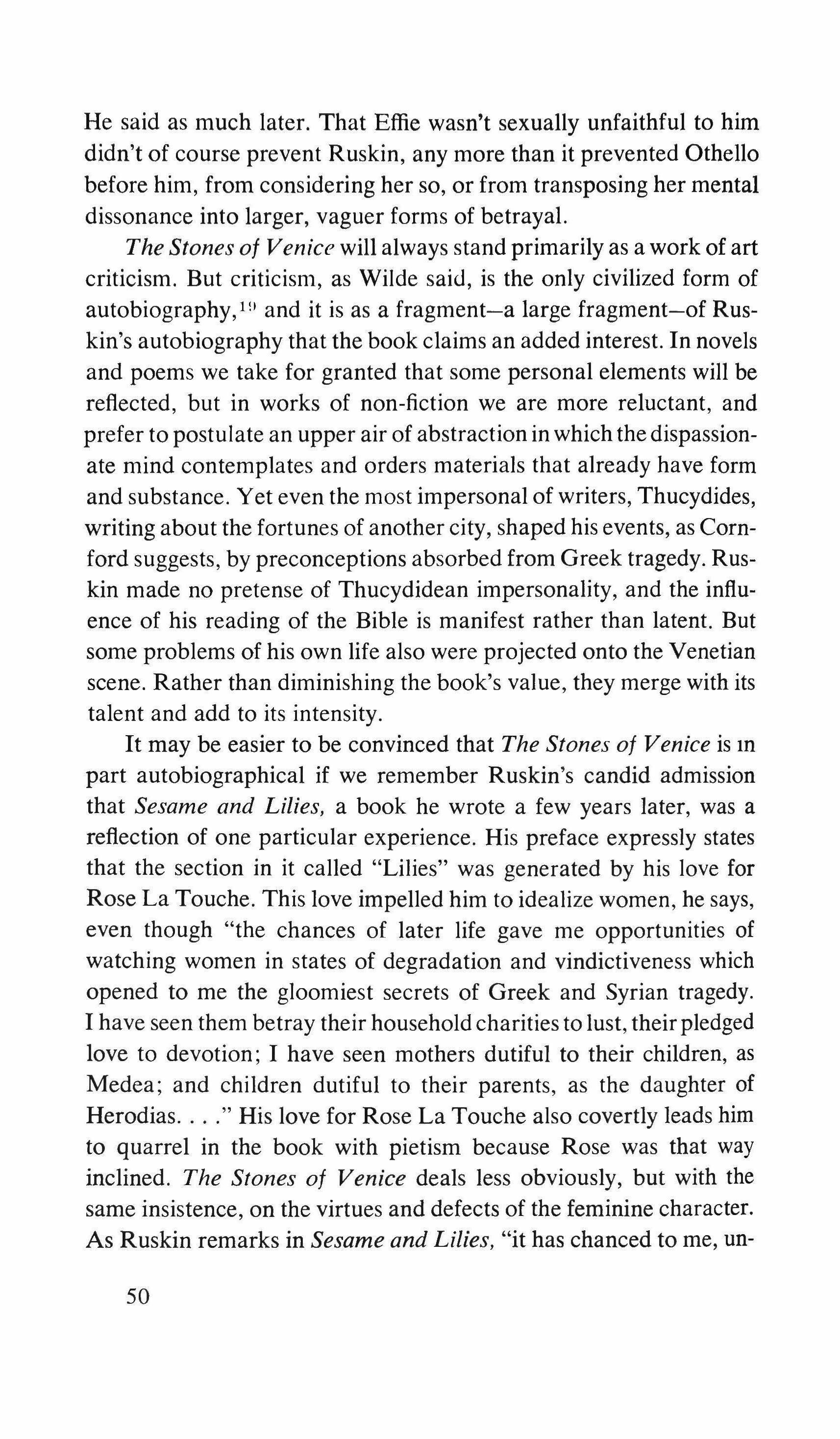
He said as much later. That Effie wasn't sexually unfaithful to him didn't of course prevent Ruskin, any more than it prevented Othello before him, from considering her so, or from transposing her mental dissonance into larger, vaguer forms of betrayal.
The Stones of Venice will always stand primarily as a work of act criticism. But criticism, as Wilde said, is the only civilized form of autobiography.!" and it is as a fragment-a large fragment-of Ruskin's autobiography that the book claims an added interest. In novels and poems we take for granted that some personal elements will be reflected, but in works of non-fiction we are more reluctant, and prefer to postulate an upper air of abstraction in which the dispassionate mind contemplates and orders materials that already have form and substance. Yet even the most impersonal of writers, Thucydides, writing about the fortunes of another city, shaped his events, as Cornford suggests, by preconceptions absorbed from Greek tragedy. Ruskin made no pretense of Thucydidean impersonality, and the influence of his reading of the Bible is manifest rather than latent. But some problems of his own life also were projected onto the Venetian scene. Rather than diminishing the book's value, they merge with its talent and add to its intensity.
It may be easier to be convinced that The Stones of Venice is m part autobiographical if we remember Ruskin's candid admission that Sesame and Lilies, a book he wrote a few years later, was a reflection of one particular experience. His preface expressly states that the section in it called "Lilies" was generated by his love for Rose La Touche. This love impelled him to idealize women, he says, even though "the chances of later life gave me opportunities of watching women in states of degradation and vindictiveness which opened to me the gloomiest secrets of Greek and Syrian tragedy. I have seen them betray their household charities to lust, their pledged love to devotion; I have seen mothers dutiful to their children, as Medea; and children dutiful to their parents, as the daughter of Herodias His love for Rose La Touche also covertly leads him to quarrel in the book with pietism because Rose was that way inclined. The Stones of Venice deals less obviously, but with the same insistence, on the virtues and defects of the feminine character. As Ruskin remarks in Sesame and Lilies, "it has chanced to me, un-
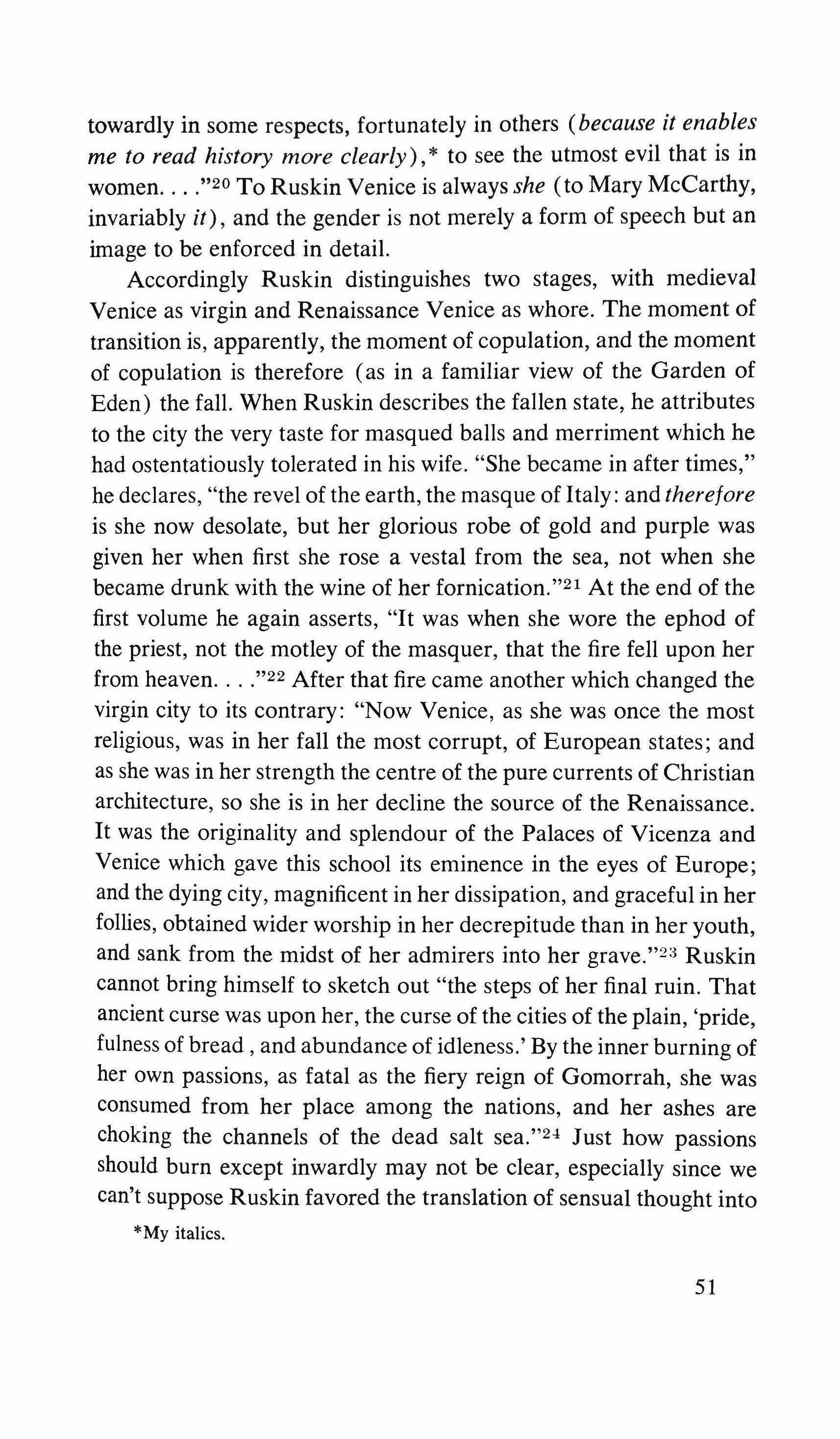
towardly in some respects, fortunately in others (because it enables me to read history more clearly), * to see the utmost evil that is in women "20 To Ruskin Venice is always she (to Mary McCarthy, invariably it), and the gender is not merely a form of speech but an image to be enforced in detail.
Accordingly Ruskin distinguishes two stages, with medieval Venice as virgin and Renaissance Venice as whore. The moment of transition is, apparently, the moment of copulation, and the moment of copulation is therefore (as in a familiar view of the Garden of Eden) the fall. When Ruskin describes the fallen state, he attributes to the city the very taste for masqued balls and merriment which he had ostentatiously tolerated in his wife. "She became in after times," he declares, "the revel of the earth, the masque of Italy: and therefore is she now desolate, but her glorious robe of gold and purple was given her when first she rose a vestal from the sea, not when she became drunk with the wine of her fornication."21 At the end of the first volume he again asserts, "It was when she wore the ephod of the priest, not the motley of the masquer, that the fire fell upon her from heaven "22 After that fire came another which changed the virgin city to its contrary: "Now Venice, as she was once the most religious, was in her fall the most corrupt, of European states; and as she was in her strength the centre of the pure currents of Christian architecture, so she is in her decline the source of the Renaissance. It was the originality and splendour of the Palaces of Vicenza and Venice which gave this school its eminence in the eyes of Europe; and the dying city, magnificent in her dissipation, and graceful in her follies, obtained wider worship in her decrepitude than in her youth, and sank from the midst of her admirers into her grave."2:3 Ruskin cannot bring himself to sketch out "the steps of her final ruin. That ancient curse was upon her, the curse of the cities of the plain, 'pride, fulness of bread, and abundance of idleness.' By the inner burning of her own passions, as fatal as the fiery reign of Gomorrah, she was consumed from her place among the nations, and her ashes are choking the channels of the dead salt sea. "24 Just how passions should burn except inwardly may not be clear, especially since we can't suppose Ruskin favored the translation of sensual thought into *My italics.
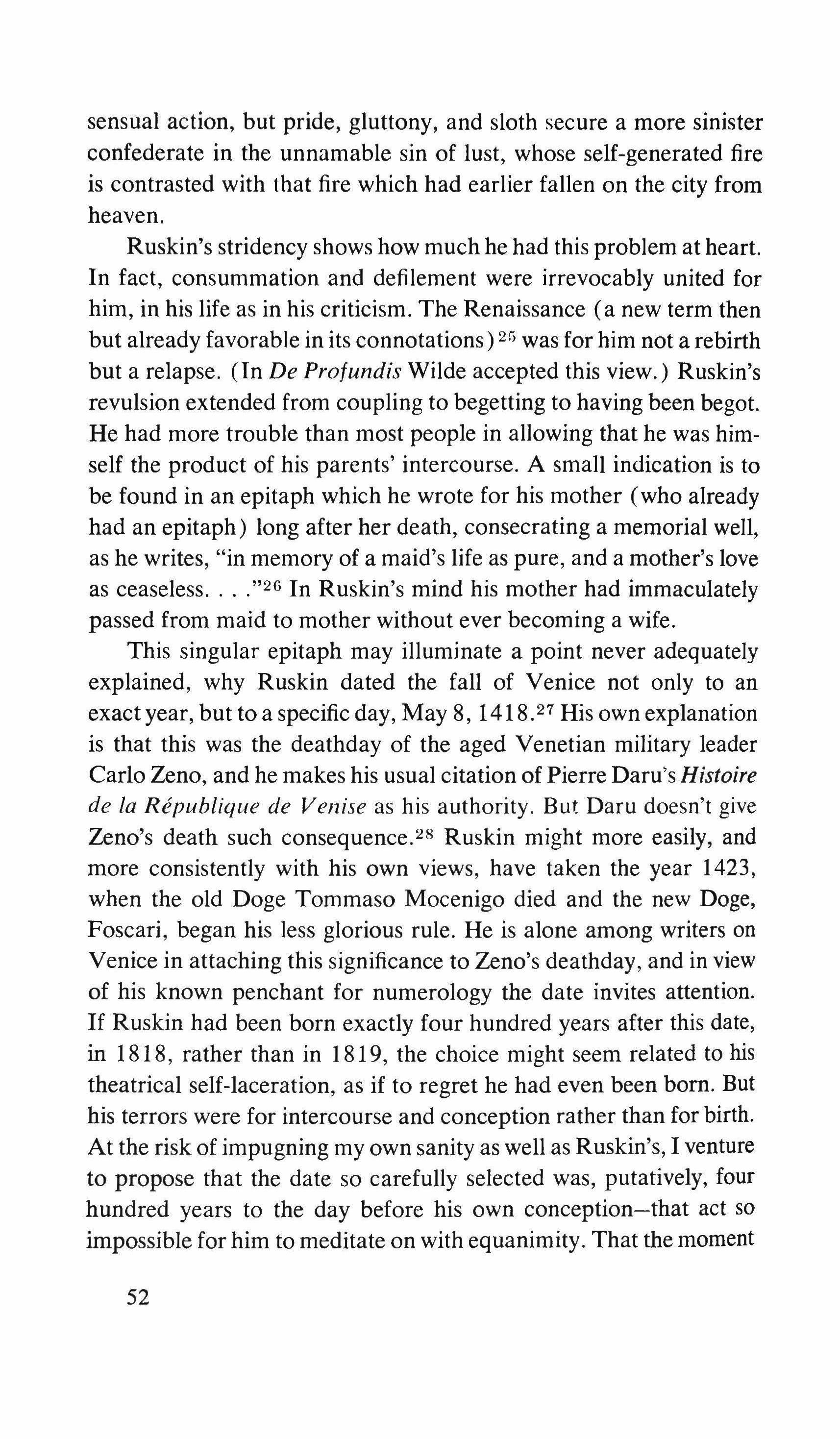
sensual action, but pride, gluttony, and sloth secure a more sinister confederate in the unnamable sin of lust, whose self-generated fire is contrasted with that fire which had earlier fallen on the city from heaven.
Ruskin's stridency shows how much he had this problem at heart. In fact, consummation and defilement were irrevocably united for him, in his life as in his criticism. The Renaissance (a new term then but already favorable in its connotations) 2" was for him not a rebirth but a relapse. (In De Projundis Wilde accepted this view.) Ruskin's revulsion extended from coupling to begetting to having been begot. He had more trouble than most people in allowing that he was himself the product of his parents' intercourse. A small indication is to be found in an epitaph which he wrote for his mother (who already had an epitaph) long after her death, consecrating a memorial well, as he writes, "in memory of a maid's life as pure, and a mother's love as ceaseless "26 In Ruskin's mind his mother had immaculately passed from maid to mother without ever becoming a wife.
This singular epitaph may illuminate a point never adequately explained, why Ruskin dated the fall of Venice not only to an exact year, but to a specific day, May 8, 1418.27 His own explanation is that this was the deathday of the aged Venetian military leader Carlo Zeno, and he makes his usual citation of Pierre Daru's Histoire de fa Republique de Venise as his authority. But Daru doesn't give Zeno's death such consequence.s" Ruskin might more easily, and more consistently with his own views, have taken the year 1423, when the old Doge Tommaso Mocenigo died and the new Doge, Foscari, began his less glorious rule. He is alone among writers on Venice in attaching this significance to Zeno's deathday, and in view of his known penchant for numerology the date invites attention. If Ruskin had been born exactly four hundred years after this date, in 1818, rather than in 1819, the choice might seem related to his theatrical self-laceration, as if to regret he had even been born. But his terrors were for intercourse and conception rather than for birth. At the risk of impugning my own sanity as well as Ruskin's, I venture to propose that the date so carefully selected was, putatively, four hundred years to the day before his own conception-that act so impossible for him to meditate on with equanimity. That the moment
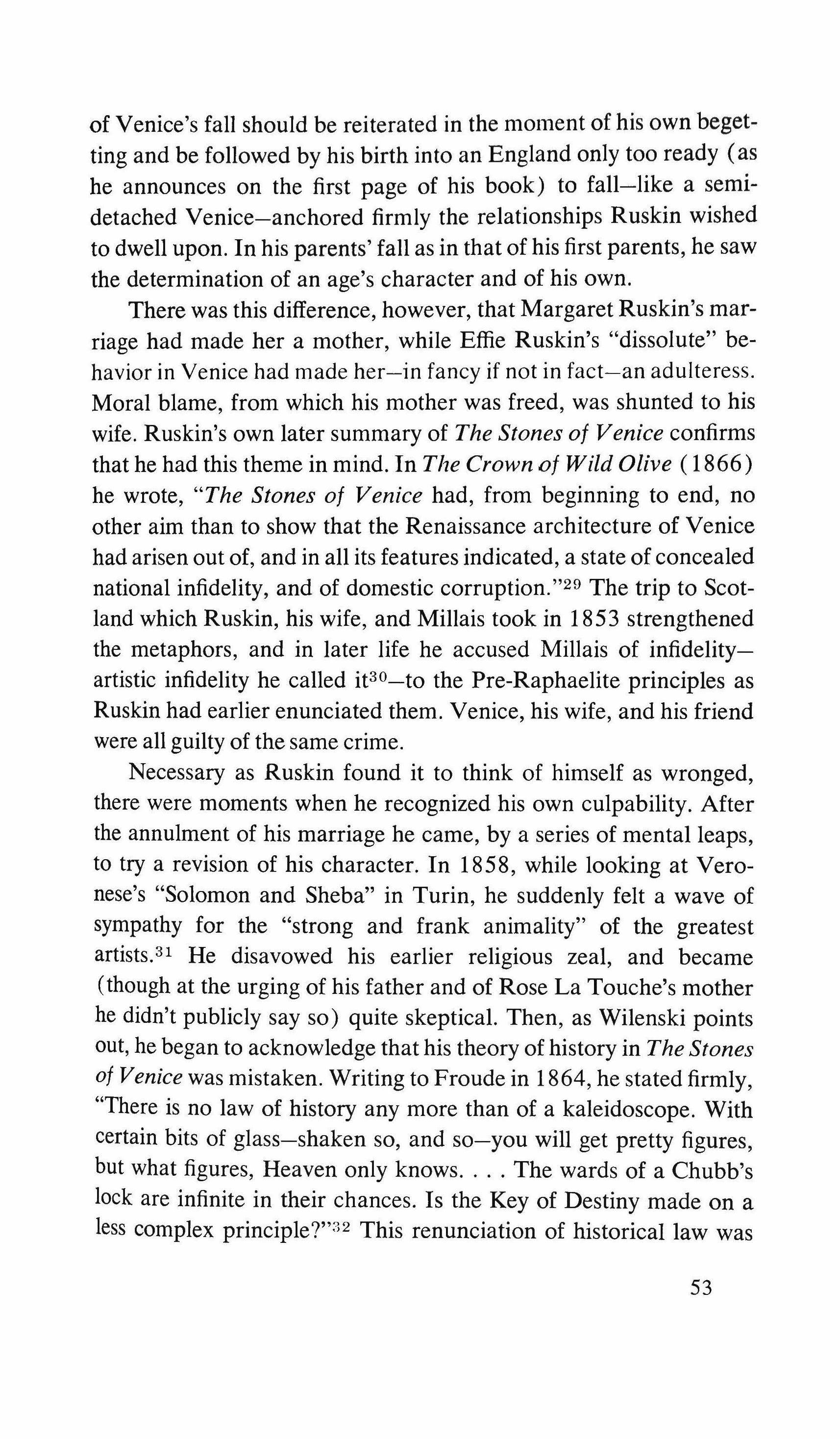
of Venice's fall should be reiterated in the moment of his own begetting and be followed by his birth into an England only too ready (as he announces on the first page of his book) to fall-like a semidetached Venice-anchored firmly the relationships Ruskin wished to dwell upon. In his parents' fall as in that of his first parents, he saw the determination of an age's character and of his own.
There was this difference, however, that Margaret Ruskin's marriage had made her a mother, while Effie Ruskin's "dissolute" behavior in Venice had made her-in fancy if not in fact-an adulteress. Moral blame, from which his mother was freed, was shunted to his wife. Ruskin's own later summary of The Stones of Venice confirms that he had this theme in mind. In The Crown of Wild Olive (1866) he wrote, "The Stones of Venice had, from beginning to end, no other aim than to show that the Renaissance architecture of Venice had arisen out of, and in all its features indicated, a state of concealed national infidelity, and of domestic corruption."29 The trip to Scotland which Ruskin, his wife, and Millais took in 1853 strengthened the metaphors, and in later life he accused Millais of infidelityartistic infidelity he called it30-to the Pre-Raphaelite principles as Ruskin had earlier enunciated them. Venice, his wife, and his friend were all guilty of the same crime.
Necessary as Ruskin found it to think of himself as wronged, there were moments when he recognized his own culpability. After the annulment of his marriage he came, by a series of mental leaps, to try a revision of his character. In 1858, while looking at Veronese's "Solomon and Sheba" in Turin, he suddenly felt a wave of sympathy for the "strong and frank animality" of the greatest artists.s- He disavowed his earlier religious zeal, and became (though at the urging of his father and of Rose La Touche's mother he didn't publicly say so) quite skeptical. Then, as Wilenski points out, he began to acknowledge that his theory of history in The Stones of Venice was mistaken. Writing to Froude in 1864, he stated firmly, "There is no law of history any more than of a kaleidoscope. With certain bits of glass-shaken so, and so-you will get pretty figures, but what figures, Heaven only knows The wards of a Chubb's lock are infinite in their chances. Is the Key of Destiny made on a less complex principle?"32 This renunciation of historical law was
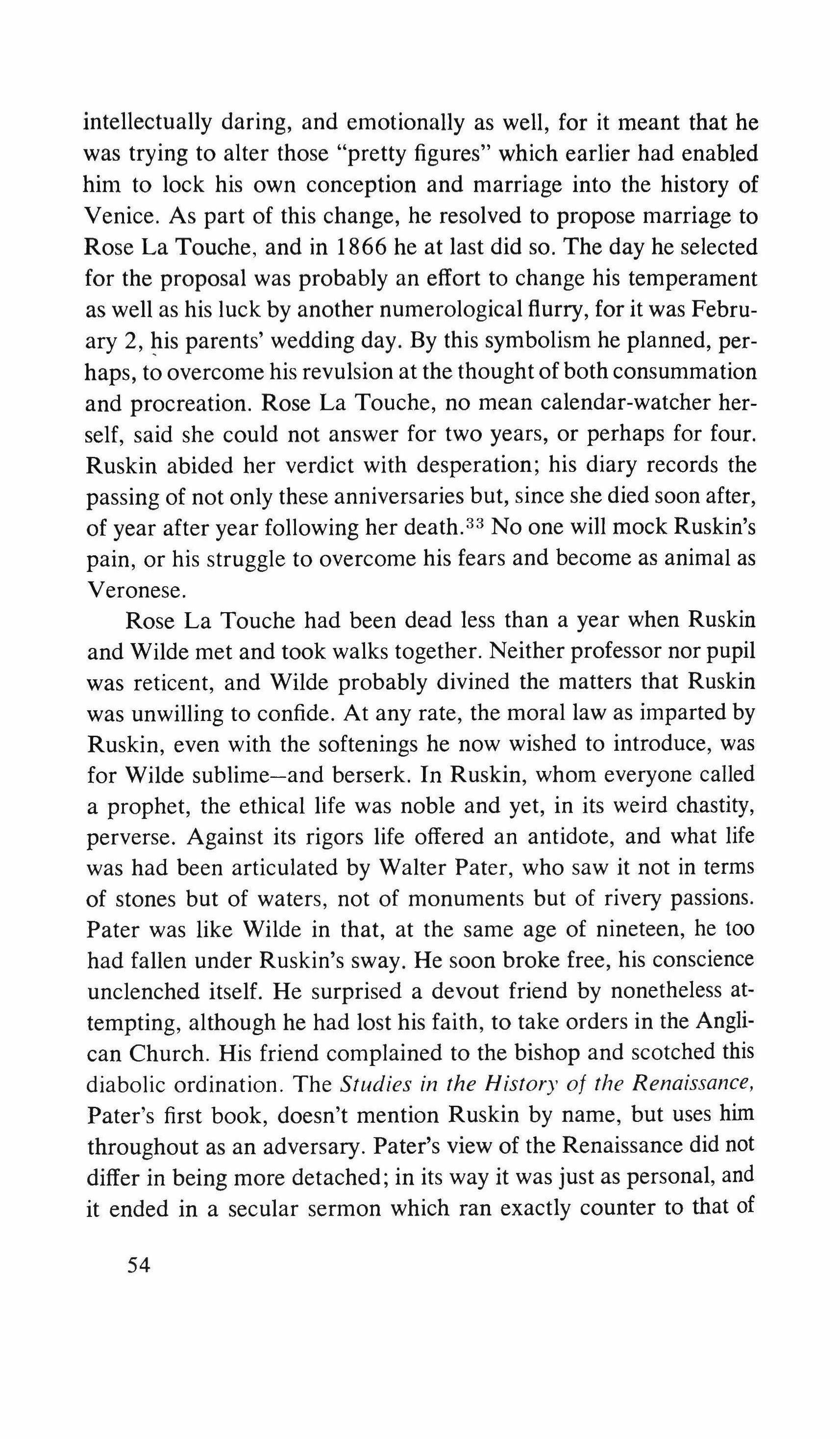
intellectually daring, and emotionally as well, for it meant that he was trying to alter those "pretty figures" which earlier had enabled him to lock his own conception and marriage into the history of Venice. As part of this change, he resolved to propose marriage to Rose La Touche, and in 1866 he at last did so. The day he selected for the proposal was probably an effort to change his temperament as well as his luck by another numerological flurry, for it was February 2, his parents' wedding day. By this symbolism he planned, perhaps, to overcome his revulsion at the thought of both consummation and procreation. Rose La Touche, no mean calendar-watcher herself, said she could not answer for two years, or perhaps for four. Ruskin abided her verdict with desperation; his diary records the passing of not only these anniversaries but, since she died soon after, of year after year following her death.P" No one will mock Ruskin's pain, or his struggle to overcome his fears and become as animal as Veronese.
Rose La Touche had been dead less than a year when Ruskin and Wilde met and took walks together. Neither professor nor pupil was reticent, and Wilde probably divined the matters that Ruskin was unwilling to confide. At any rate, the moral law as imparted by Ruskin, even with the softenings he now wished to introduce, was for Wilde sublime-and berserk. In Ruskin, whom everyone called a prophet, the ethical life was noble and yet, in its weird chastity, perverse. Against its rigors life offered an antidote, and what life was had been articulated by Walter Pater, who saw it not in terms of stones but of waters, not of monuments but of rivery passions. Pater was like Wilde in that, at the same age of nineteen, he too had fallen under Ruskin's sway. He soon broke free, his conscience unclenched itself. He surprised a devout friend by nonetheless attempting, although he had lost his faith, to take orders in the Anglican Church. His friend complained to the bishop and scotched this diabolic ordination. The Studies in the History of the Renaissance, Pater's first book, doesn't mention Ruskin by name, but uses him throughout as an adversary. Pater's view of the Renaissance did not differ in being more detached; in its way it was just as personal, and it ended in a secular sermon which ran exactly counter to that of
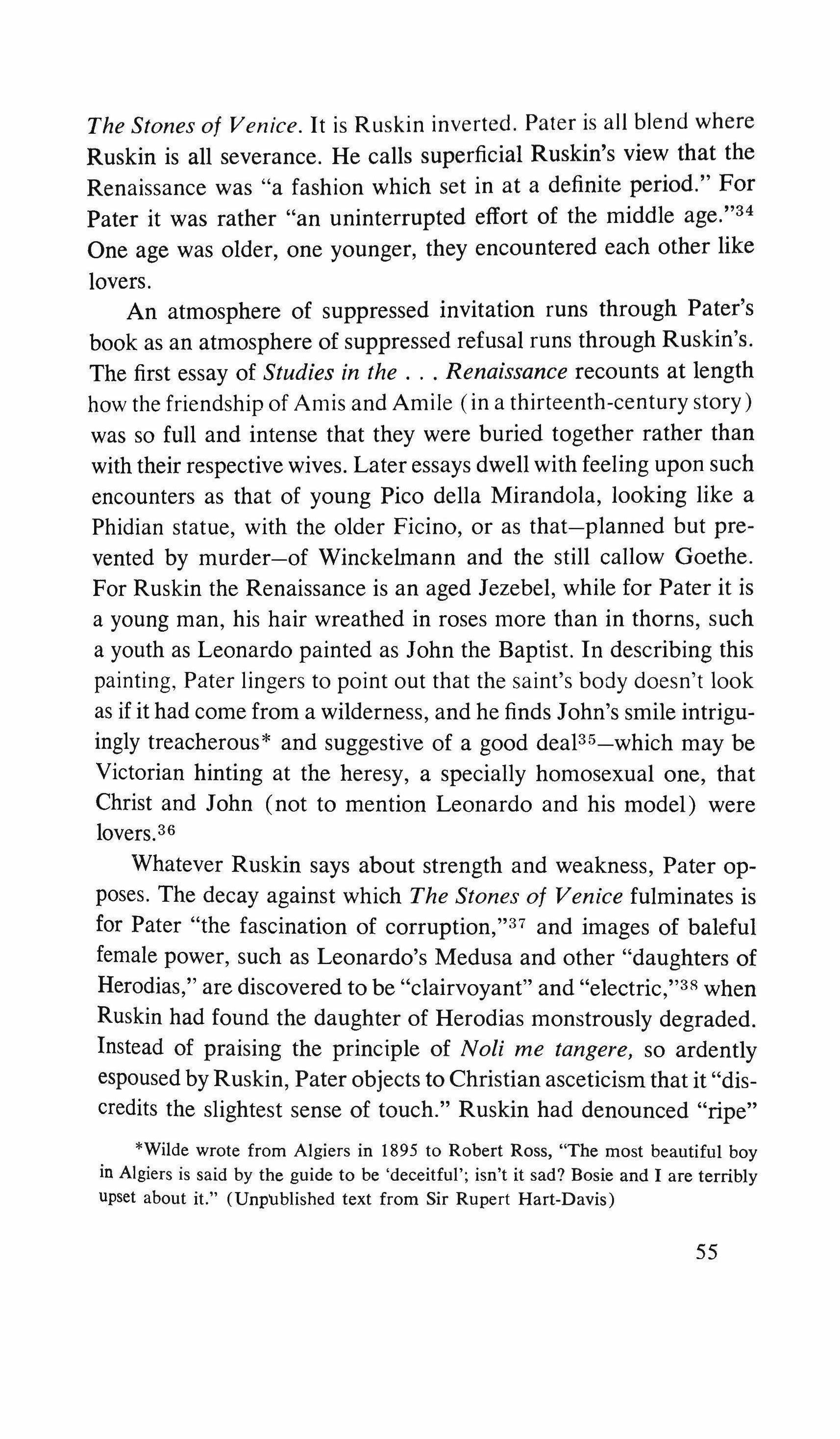
The Stones of Venice. It is Ruskin inverted. Pater is all blend where Ruskin is all severance. He calls superficial Ruskin's view that the Renaissance was "a fashion which set in at a definite period." For Pater it was rather "an uninterrupted effort of the middle age."34 One age was older, one younger, they encountered each other like lovers.
An atmosphere of suppressed invitation runs through Pater's book as an atmosphere of suppressed refusal runs through Ruskin's. The first essay of Studies in the Renaissance recounts at length how the friendship of Amis and Amile (in a thirteenth-century story) was so full and intense that they were buried together rather than with their respective wives. Later essays dwell with feeling upon such encounters as that of young Pico della Mirandola, looking like a Phidian statue, with the older Ficino, or as that-planned but prevented by murder-of Winckelmann and the still callow Goethe. For Ruskin the Renaissance is an aged Jezebel, while for Pater it is a young man, his hair wreathed in roses more than in thorns, such a youth as Leonardo painted as John the Baptist. In describing this painting, Pater lingers to point out that the saint's body doesn't look as if it had come from a wilderness, and he finds John's smile intriguingly treacherous* and suggestive of a good dea135-which may be Victorian hinting at the heresy, a specially homosexual one, that Christ and John (not to mention Leonardo and his model) were lovers. 36
Whatever Ruskin says about strength and weakness, Pater opposes. The decay against which The Stones of Venice fulminates is for Pater "the fascination of corruption,"37 and images of baleful female power, such as Leonardo's Medusa and other "daughters of Herodias," are discovered to be "clairvoyant" and "electric,"3R when Ruskin had found the daughter of Herodias monstrously degraded. Instead of praising the principle of Noli me tangere, so ardently espoused by Ruskin, Pater objects to Christian asceticism that it "discredits the slightest sense of touch." Ruskin had denounced "ripe"
*Wilde wrote from Algiers in 1895 to Robert Ross, "The most beautiful boy in Algiers is said by the guide to be 'deceitful'; isn't it sad? Bosie and I are terribly upset about it." (Unpublished text from Sir Rupert Hart-Davis)
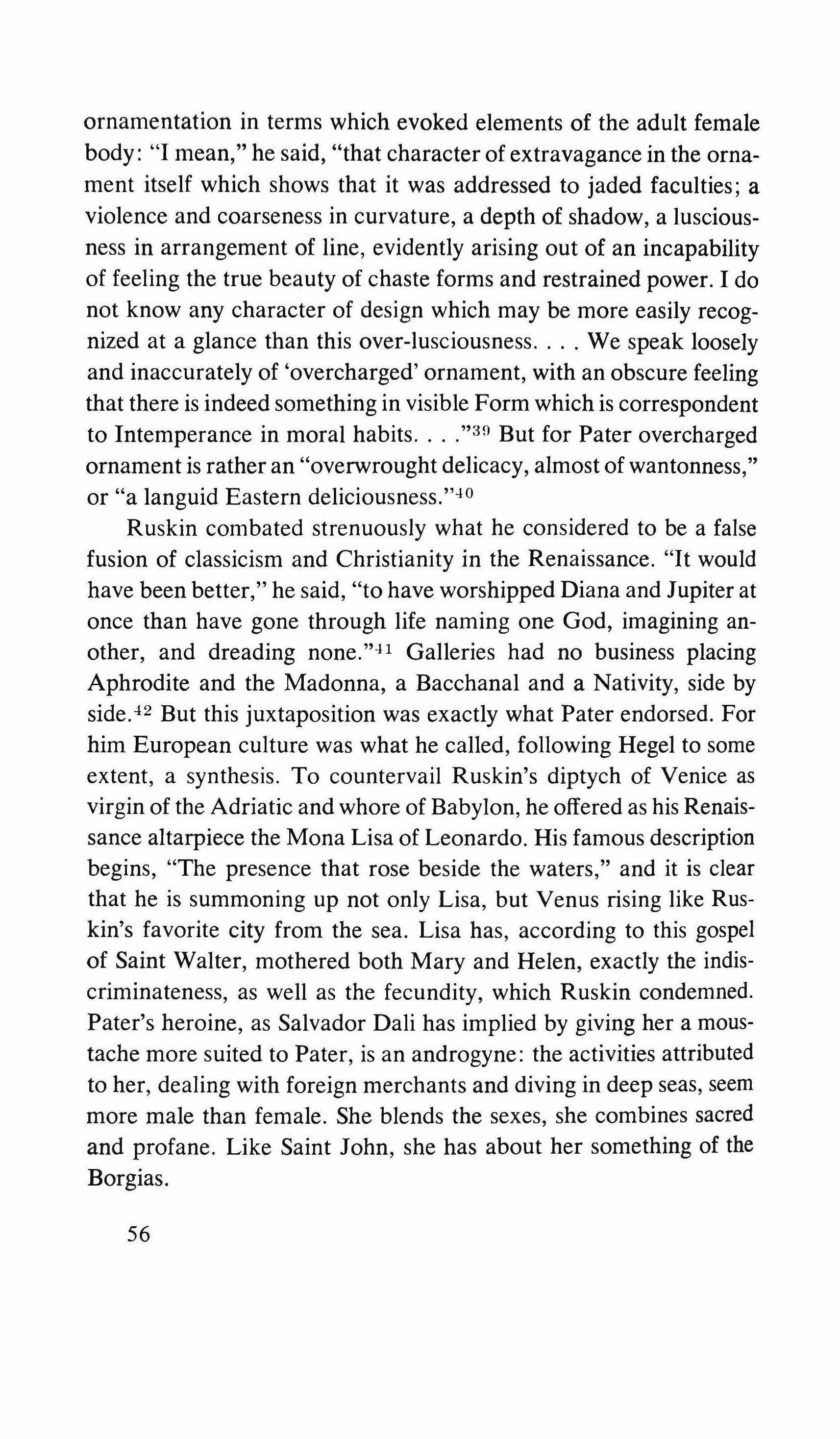
ornamentation in terms which evoked elements of the adult female body: "I mean," he said, "that character of extravagance in the ornament itself which shows that it was addressed to jaded faculties; a violence and coarseness in curvature, a depth of shadow, a lusciousness in arrangement of line, evidently arising out of an incapability of feeling the true beauty of chaste forms and restrained power. I do not know any character of design which may be more easily recognized at a glance than this over-lusciousness We speak loosely and inaccurately of 'overcharged' ornament, with an obscure feeling that there is indeed something in visible Form which is correspondent to Intemperance in moral habits "3!! But for Pater overcharged ornament is rather an "overwroughtdelicacy, almost of wantonness," or "a languid Eastern deliciousness.t+?
Ruskin combated strenuously what he considered to be a false fusion of classicism and Christianity in the Renaissance. "It would have been better," he said, "to have worshipped Diana and Jupiter at once than have gone through life naming one God, imagining another, and dreading none."H Galleries had no business placing Aphrodite and the Madonna, a Bacchanal and a Nativity, side by side.t? But this juxtaposition was exactly what Pater endorsed. For him European culture was what he called, following Hegel to some extent, a synthesis. To countervail Ruskin's diptych of Venice as virgin of the Adriatic and whore of Babylon, he offered as his Renaissance altarpiece the Mona Lisa of Leonardo. His famous description begins, "The presence that rose beside the waters," and it is clear that he is summoning up not only Lisa, but Venus rising like Ruskin's favorite city from the sea. Lisa has, according to this gospel of Saint Walter, mothered both Mary and Helen, exactly the indiscriminateness, as well as the fecundity, which Ruskin condemned. Pater's heroine, as Salvador Dali has implied by giving her a moustache more suited to Pater, is an androgyne: the activities attributed to her, dealing with foreign merchants and diving in deep seas, seem more male than female. She blends the sexes, she combines sacred and profane. Like Saint John, she has about her something of the Borgias.
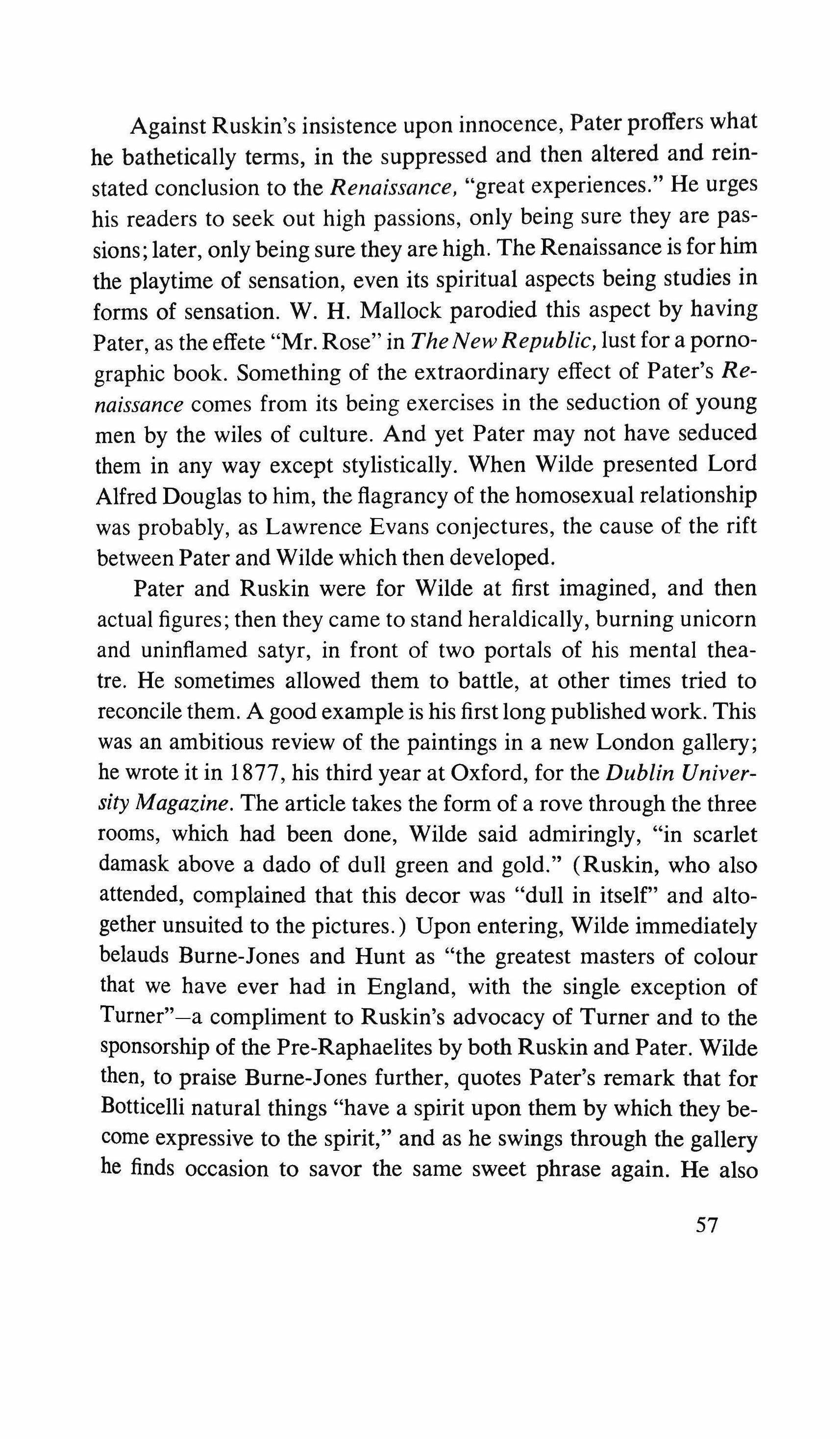
Against Ruskin's insistence upon innocence, Pater proffers what he bathetically terms, in the suppressed and then altered and reinstated conclusion to the Renaissance, "great experiences." He urges his readers to seek out high passions, only being sure they are passions; later, onlybeing sure they are high. The Renaissance is for him the playtime of sensation, even its spiritual aspects being studies in forms of sensation. W. H. Mallock parodied this aspect by having Pater, as the effete "Mr. Rose" in The New Republic, lust for a pornographic book. Something of the extraordinary effect of Pater's Renaissance comes from its being exercises in the seduction of young men by the wiles of culture. And yet Pater may not have seduced them in any way except stylistically. When Wilde presented Lord Alfred Douglas to him, the flagrancy of the homosexual relationship was probably, as Lawrence Evans conjectures, the cause of the rift between Pater and Wilde which then developed.
Pater and Ruskin were for Wilde at first imagined, and then actual figures; then they came to stand heraldically, burning unicorn and uninflamed satyr, in front of two portals of his mental theatre. He sometimes allowed them to battle, at other times tried to reconcile them. A good example is his first long published work. This was an ambitious review of the paintings in a new London gallery; he wrote it in 1877, his third year at Oxford, for the Dublin University Magazine. The article takes the form of a rove through the three rooms, which had been done, Wilde said admiringly, "in scarlet damask above a dado of dull green and gold." (Ruskin, who also attended, complained that this decor was "dull in itself" and altogether unsuited to the pictures.) Upon entering, Wilde immediately belauds Burne-Jones and Hunt as "the greatest masters of colour that we have ever had in England, with the single exception of Turner"-a compliment to Ruskin's advocacy of Turner and to the sponsorship of the Pre-Raphaelites by both Ruskin and Pater. Wilde then, to praise Burne-Jones further, quotes Pater's remark that for Botticelli natural things "have a spirit upon them by which they become expressive to the spirit," and as he swings through the gallery he finds occasion to savor the same sweet phrase again. He also
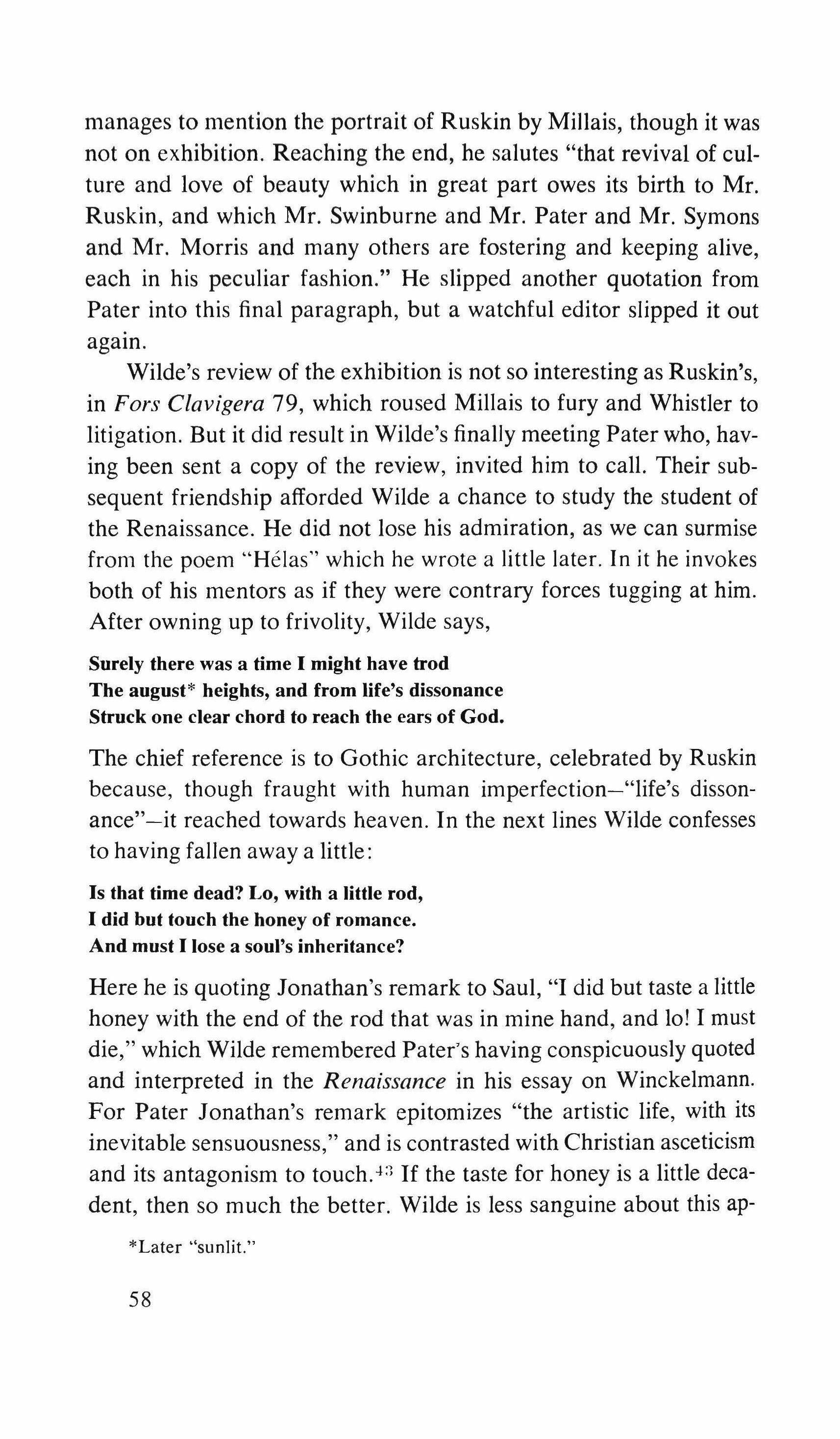
manages to mention the portrait of Ruskin by Millais, though it was not on exhibition. Reaching the end, he salutes "that revival of culture and love of beauty which in great part owes its birth to Mr. Ruskin, and which Mr. Swinburne and Mr. Pater and Mr. Symons and Mr. Morris and many others are fostering and keeping alive, each in his peculiar fashion." He slipped another quotation from Pater into this final paragraph, but a watchful editor slipped it out agam.
Wilde's review of the exhibition is not so interesting as Ruskin's, in Fors Clavigera 79, which roused Millais to fury and Whistler to litigation. But it did result in Wilde's finally meeting Pater who, having been sent a copy of the review, invited him to call. Their subsequent friendship afforded Wilde a chance to study the student of the Renaissance. He did not lose his admiration, as we can surmise from the poem "Helas' which he wrote a little later. In it he invokes both of his mentors as if they were contrary forces tugging at him. After owning up to frivolity, Wilde says,
Surely there was a time I might have trod
The august* heights, and from life's dissonance Struck one clear chord to reach the ears of God.
The chief reference is to Gothic architecture, celebrated by Ruskin because, though fraught with human imperfection-"life's dissonance"-it reached towards heaven. In the next lines Wilde confesses to having fallen away a little:
Is that time dead? Lo, with a little rod, I did but touch the honey of romance. And must I lose a soul's inheritance?
Here he is quoting Jonathan's remark to Saul, "I did but taste a little honey with the end of the rod that was in mine hand, and lo! I must die," which Wilde remembered Pater's having conspicuously quoted and interpreted in the Renaissance in his essay on Winckelmann. For Pater Jonathan's remark epitomizes "the artistic life, with its inevitable sensuousness," and is contrasted with Christian asceticism and its antagonism to touch. -!:1 If the taste for honey is a little decadent, then so much the better. Wilde is less sanguine about this ap-
*Later "sunlit."
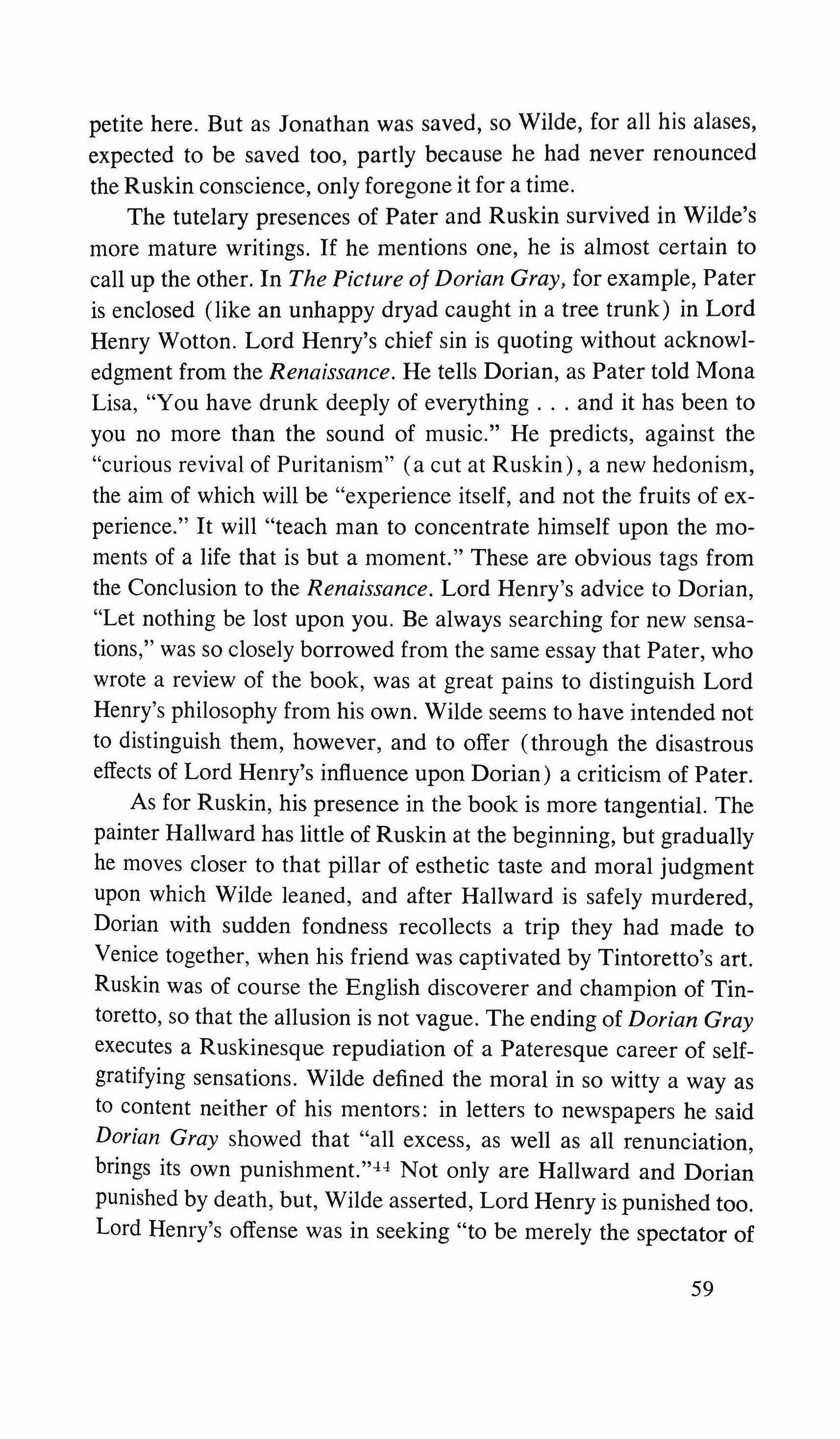
petite here. But as Jonathan was saved, so Wilde, for all his alases, expected to be saved too, partly because he had never renounced the Ruskin conscience, only foregone it for a time.
The tutelary presences of Pater and Ruskin survived in Wilde's more mature writings. If he mentions one, he is almost certain to call up the other. In The Picture of Dorian Gray, for example, Pater is enclosed (like an unhappy dryad caught in a tree trunk) in Lord Henry Wotton. Lord Henry's chief sin is quoting without acknowledgment from the Renaissance. He tells Dorian, as Pater told Mona Lisa, "You have drunk deeply of everything and it has been to you no more than the sound of music." He predicts, against the "curious revival of Puritanism" (a cut at Ruskin), a new hedonism, the aim of which will be "experience itself, and not the fruits of experience." It will "teach man to concentrate himself upon the moments of a life that is but a moment." These are obvious tags from the Conclusion to the Renaissance. Lord Henry's advice to Dorian, "Let nothing be lost upon you. Be always searching for new sensations," was so closely borrowed from the same essay that Pater, who wrote a review of the book, was at great pains to distinguish Lord Henry's philosophy from his own. Wilde seems to have intended not to distinguish them, however, and to offer (through the disastrous effects of Lord Henry's influence upon Dorian) a criticism of Pater.
As for Ruskin, his presence in the book is more tangential. The painter Hallward has little of Ruskin at the beginning, but gradually he moves closer to that pillar of esthetic taste and moral judgment upon which Wilde leaned, and after Hallward is safely murdered, Dorian with sudden fondness recollects a trip they had made to Venice together, when his friend was captivated by Tintoretto's art. Ruskin was of course the English discoverer and champion of Tintoretto, so that the allusion is not vague. The ending of Dorian Gray executes a Ruskinesque repudiation of a Pateresque career of selfgratifying sensations. Wilde defined the moral in so witty a way as to content neither of his mentors: in letters to newspapers he said Dorian Gray showed that "all excess, as well as all renunciation, brings its own punishment.t'+' Not only are Hallward and Dorian punished by death, but, Wilde asserted, Lord Henry is punished too. Lord Henry's offense was in seeking "to be merely the spectator of

life. He finds that those who reject the battle are more deeply wounded than those who take part in it."45 The phrase "spectator of life" was one that Wilde used in objecting to Pater's Marius the Epicurean.tv However incongruous his conception of himself as activist, with it he lorded it over his too donnish friend. For Pater, while he touted (sporadically at least) the life of pleasure, was careful not to be caught living it. He idealized touch until it became contemplation. He allowed only his eye to participate in the high passions about which he loved to expatiate. Dorian at least had the courage to risk himself.
In Dorian Gray the Pater side of Wilde's thought is routed, through not deprived of fascination. Yet Hallward, when his ethical insistence brings him close to Ruskin, is killed too. In The Soul of Man under Socialism, also written in 1891, Wilde superimposes Ruskin's social ethic upon Pater's "full expression of personality," fusing instead of destroying them. In Salome, to which I come at last, the formulation is close to Dorian Gray, with both opposites executed. Behind the figure of Iokanaan lurks the image of that perversely untouching, untouchable prophet John whom Wilde knew at Oxford. When Iokanaan, up from his cistern for a moment, cries to Salome, "Arriere, fille de Sodome! Ne me touchez pas. II ne faut pas profaner Ie temple du Seigneur Dieu," a thought of Ruskin, by now sunk down into madness, can scarcely have failed to cross Wilde's mind. By this time Wilde would also have recognized in the prophet's behavior (as in Ruskin's) something of his own, for after his first three years of marriage he had discontinued sexual relations with his wife. Iokanaan is not Ruskin, but he is Ruskinism as Wilde understood that pole of his character. Then when Salome evinces her appetite for strange experiences, her eagerness to kiss a literally disembodied lover in a relation at once totally sensual and totally "mystical"47 (Wilde's own term for her), she shows something of that diseased contemplation for which Wilde had reprehended Pater. Her adaptation, or perversion, of the Song of Songs to describe a man's rather than a woman's beauty also is reminiscent of Pater's Renaissance as well as of Wilde's predisposition. It is Salome, and
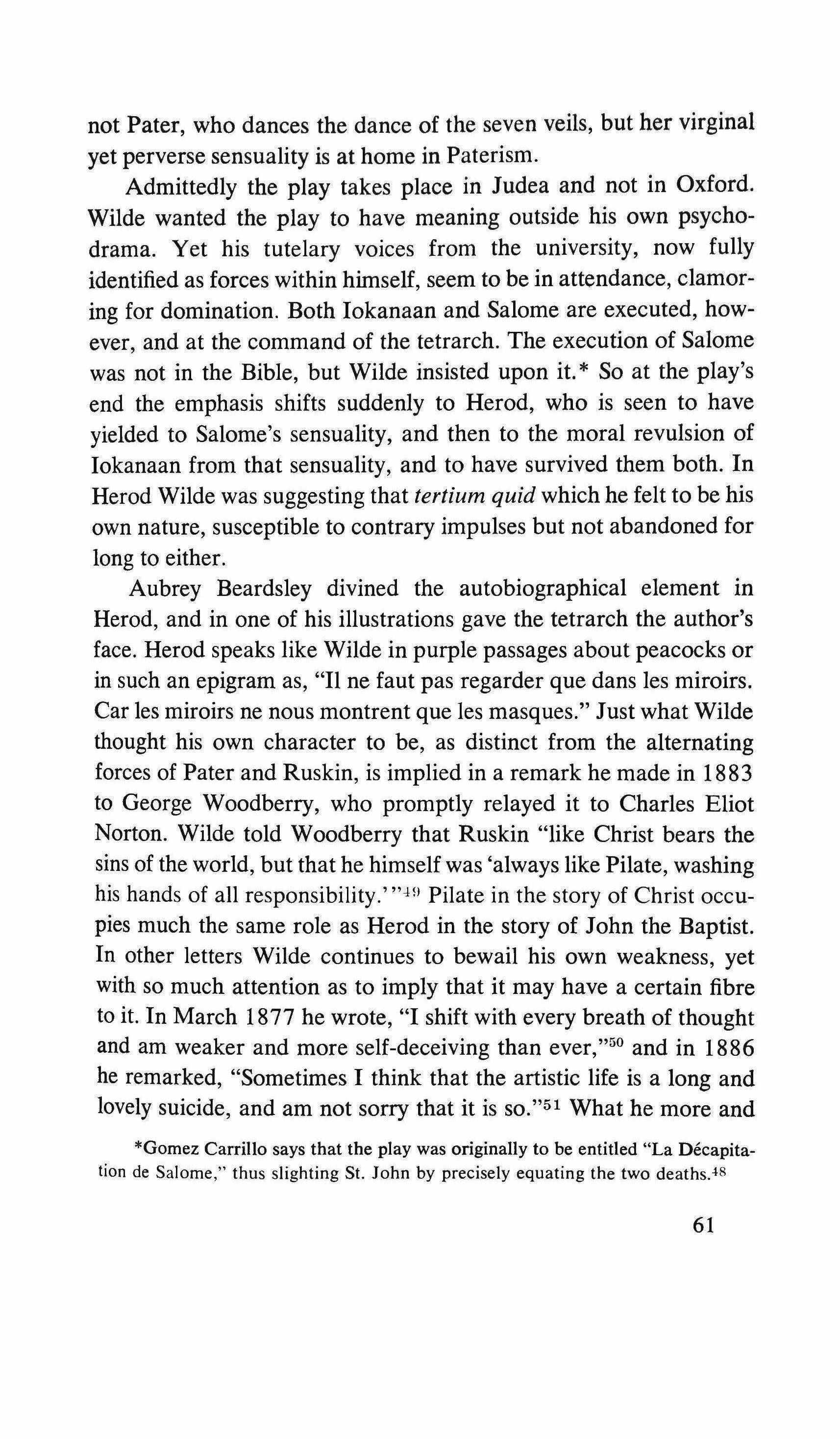
not Pater, who dances the dance of the seven veils, but her virginal yet perverse sensuality is at home in Paterism.
Admittedly the play takes place in Judea and not in Oxford. Wilde wanted the play to have meaning outside his own psychodrama. Yet his tutelary voices from the university, now fully identified as forces within himself, seem to be in attendance, clamoring for domination. Both Iokanaan and Salome are executed, however, and at the command of the tetrarch. The execution of Salome was not in the Bible, but Wilde insisted upon it. * So at the play's end the emphasis shifts suddenly to Herod, who is seen to have yielded to Salome's sensuality, and then to the moral revulsion of Iokanaan from that sensuality, and to have survived them both. In Herod Wilde was suggesting that tertium quid which he felt to be his own nature, susceptible to contrary impulses but not abandoned for long to either.
Aubrey Beardsley divined the autobiographical element in Herod, and in one of his illustrations gave the tetrarch the author's face. Herod speaks like Wilde in purple passages about peacocks or in such an epigram as, "11 ne faut pas regarder que dans les miroirs. Car les miroirs ne nous montrent que les masques." Just what Wilde thought his own character to be, as distinct from the alternating forces of Pater and Ruskin, is implied in a remark he made in 1883 to George Woodberry, who promptly relayed it to Charles Eliot Norton. Wilde told Woodberry that Ruskin "like Christ bears the sins of the world, but that he himself was 'always like Pilate, washing his hands of all responsibility. "'4!l Pilate in the story of Christ occupies much the same role as Herod in the story of John the Baptist. In other letters Wilde continues to bewail his own weakness, yet with so much attention as to imply that it may have a certain fibre to it. In March 1877 he wrote, "I shift with every breath of thought and am weaker and more self-deceiving than ever.?" and in 1886 he remarked, "Sometimes I think that the artistic life is a long and lovely suicide, and am not sorry that it is SO."51 What he more and *Gomez Carrillo says that the play was originally to be entitled "La Decapitation de Salome," thus slighting St. John by precisely equating the two deaths.tf
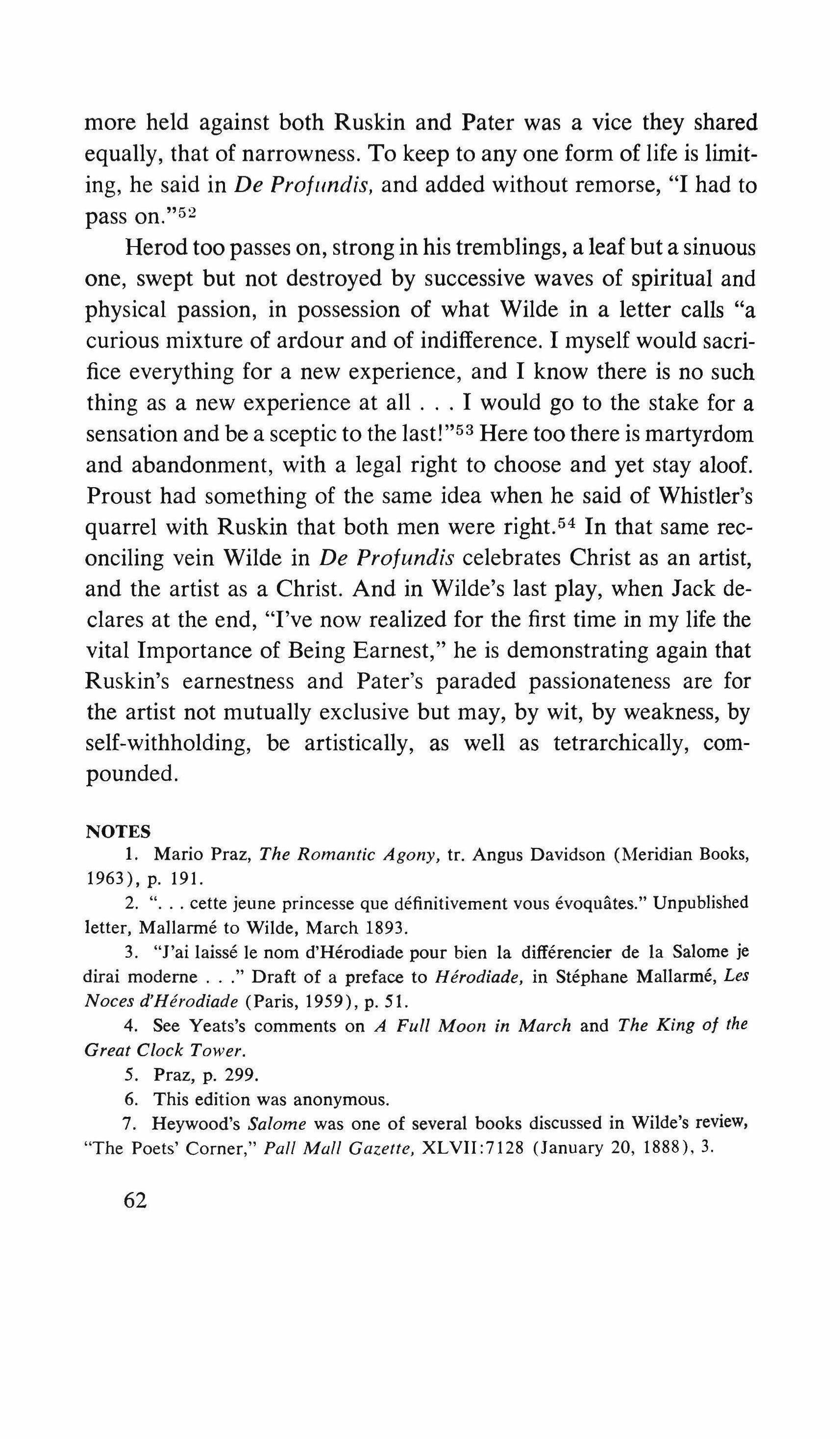
more held against both Ruskin and Pater was a vice they shared equally, that of narrowness. To keep to anyone form of life is limiting, he said in De Projundis, and added without remorse, "I had to pass on."52
Herod too passes on, strong in his tremblings, a leaf but a sinuous one, swept but not destroyed by successive waves of spiritual and physical passion, in possession of what Wilde in a letter calls "a curious mixture of ardour and of indifference. I myself would sacrifice everything for a new experience, and I know there is no such thing as a new experience at all I would go to the stake for a sensation and be a sceptic to the last!"53 Here too there is martyrdom and abandonment, with a legal right to choose and yet stay aloof. Proust had something of the same idea when he said of Whistler's quarrel with Ruskin that both men were right. 54 In that same reconciling vein Wilde in De Profundis celebrates Christ as an artist, and the artist as a Christ. And in Wilde's last play, when Jack declares at the end, "I've now realized for the first time in my life the vital Importance of Being Earnest," he is demonstrating again that Ruskin's earnestness and Pater's paraded passionateness are for the artist not mutually exclusive but may, by wit, by weakness, by self-withholding, be artistically, as well as tetrarchically, compounded.
1. Mario Praz, The Romantic Agony, tr. Angus Davidson (Meridian Books, 1963), p. 191.
2. cette jeune princesse que definitivement vous evoquates." Unpublished letter, Mallarrne to Wilde, March 1893.
3. "J'ai laisse Ie nom d'Herodiade pour bien la differencier de la Salome je dirai modeme Draft of a preface to Herodiade, in Stephane Mallarme, Les Noces d'Herodiade (Paris, 1959), p. 51.
4. See Yeats's comments on A Full Moon in March and The King of the Great Clock Tower.
5. Praz, p. 299.
6. This edition was anonymous.
7. Heywood's Salome was one of several books discussed in Wilde's review, "The Poets' Corner," Pall Mall Gazette, XLVII:7128 (January 20, 1888),3.
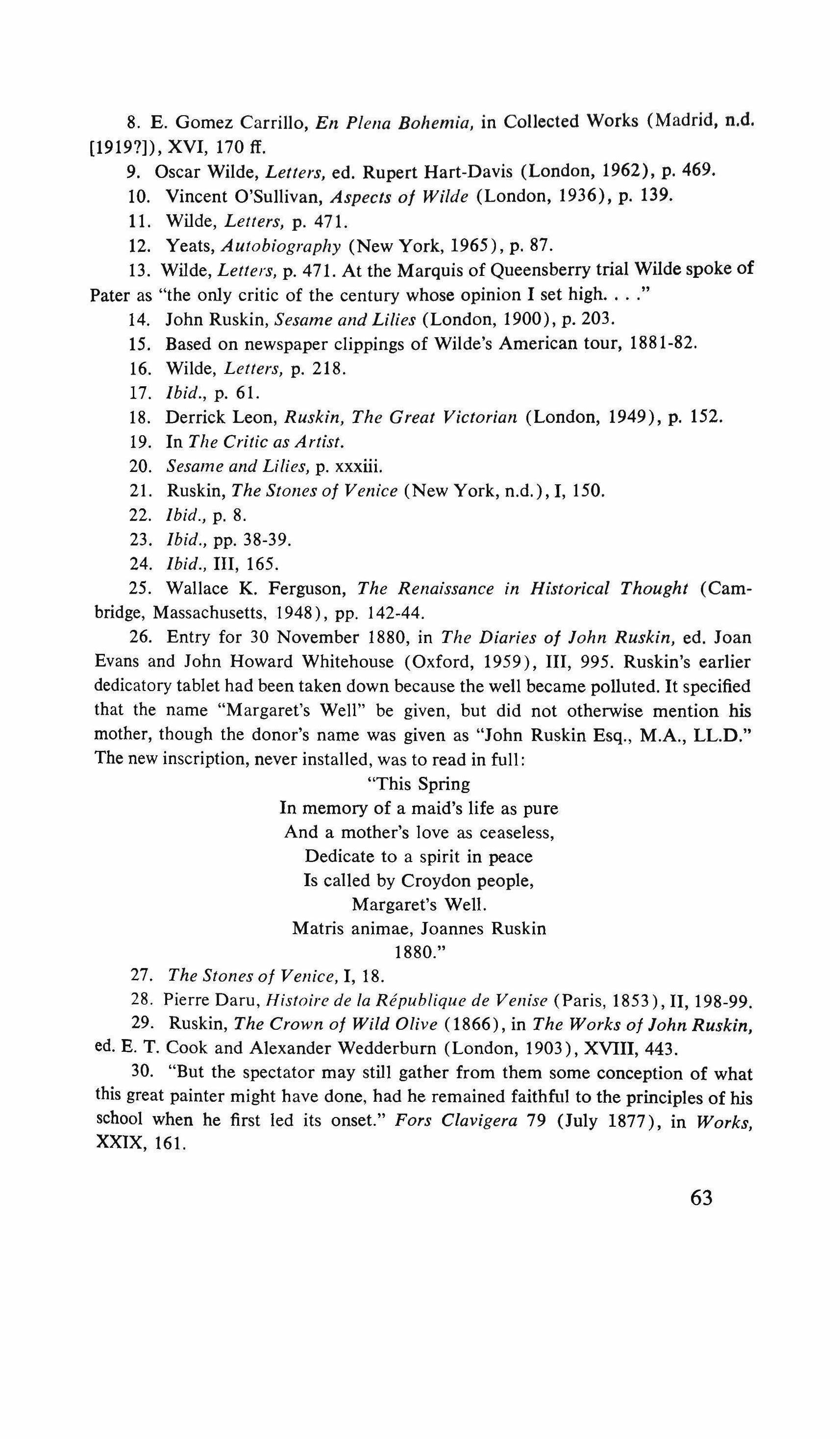
8. E. Gomez Carrillo, En Plena Bohemia, in Collected Works (Madrid, n.d. [1919?]), XVI, 170 if.
9. Oscar Wilde, Letters, ed. Rupert Hart-Davis (London, 1962), p. 469.
10. Vincent O'Sullivan, Aspects 0/ Wilde (London, 1936), p. 139.
11. Wilde, Letters, p. 471.
12. Yeats, Autobiography (New York, 1965), p. 87.
13. Wilde, Letters, p. 471. At the Marquis of Queensberry trial Wilde spoke of Pater as "the only critic of the century whose opinion I set high
14. John Ruskin, Sesame and Lilies (London, 1900), p. 203.
15. Based on newspaper clippings of Wilde's American tour, 1881-82.
16. Wilde, Letters, p. 218.
17. Ibid., p. 61.
18. Derrick Leon, Ruskin, The Great Victorian (London, 1949), p. 152.
19. In The Critic as Artist.
20. Sesame and Lilies, p. xxxiii.
21. Ruskin, The Stones 0/ Venice (New York, n.d.), I, 150.
22. Ibid., p. 8.
23. Ibid., pp. 38-39.
24. Ibid., III, 165.
25. Wallace K. Ferguson, The Renaissance in Historical Thought (Cambridge, Massachusetts, 1948), pp. 142-44.
26. Entry for 30 November 1880, in The Diaries 0/ John Ruskin, ed. Joan Evans and John Howard Whitehouse (Oxford, 1959), III, 995. Ruskin's earlier dedicatory tablet had been taken down because the well became polluted. It specified that the name "Margaret's Well" be given, but did not otherwise mention his mother, though the donor's name was given as "John Ruskin Esq., M.A., LL.D." The new inscription, never installed, was to read in full: "This Spring In memory of a maid's life as pure And a mother's love as ceaseless, Dedicate to a spirit in peace Is called by Croydon people, Margaret's Well. Matris animae, Joannes Ruskin 1880."
27. The Stones of Venice, I, 18.
28. Pierre Daru, Histoire de fa Republique de Venise (Paris, 1853), II, 198-99.
29. Ruskin, The Crown of Wild Olive (1866), in The Works of John Ruskin, ed. E. T. Cook and Alexander Wedderburn (London, 1903), XVIII, 443.
30. "But the spectator may still gather from them some conception of what this great painter might have done, had he remained faithful to the principles of his school when he first led its onset." Fors Clavigera 79 (July 1877), in Works, XXIX, 161.
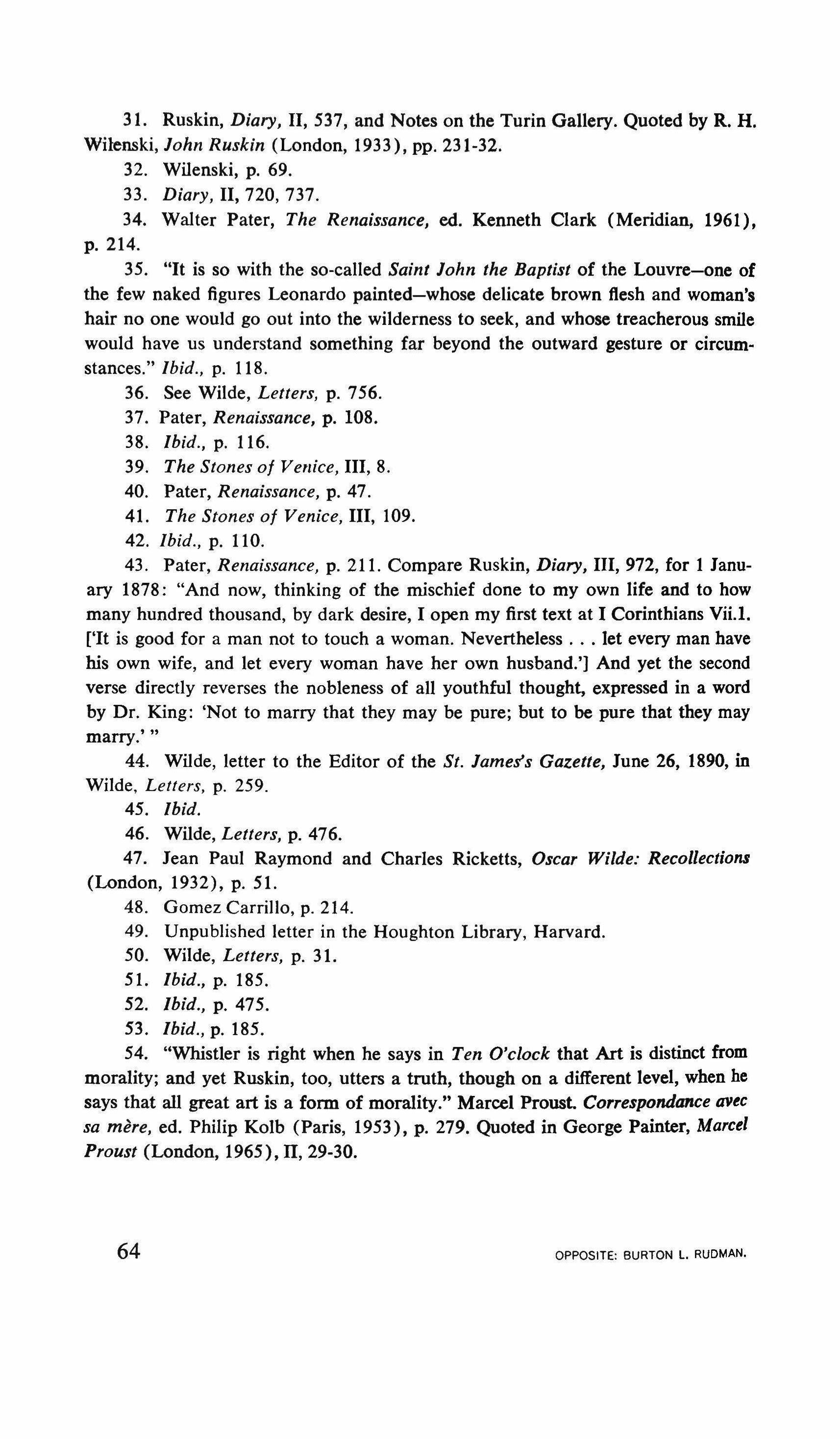
31. Ruskin, Diary, II, 537, and Notes on the Turin Gallery. Quoted by R. H. Wilenski, John Ruskin (London, 1933), pp. 231-32.
32. Wilenski, p. 69.
33. Diary, 11,720,737.
34. Walter Pater, The Renaissance, ed. Kenneth Clark (Meridian, 1961), p.214.
35. "It is so with the so-called Saint John the Baptist of the Louvre-one of the few naked figures Leonardo painted-whose delicate brown flesh and woman's hair no one would go out into the wilderness to seek, and whose treacherous smile would have us understand something far beyond the outward gesture or circumstances." lbid., p. 118.
36. See Wilde, Letters, p. 756.
37. Pater, Renaissance, p. 108.
38. Ibid., p. 116.
39. The Stones of Venice, III, 8.
40. Pater, Renaissance, p. 47.
41. The Stones of Venice, III, 109.
42. lbid., p. 110.
43. Pater, Renaissance, p. 211. Compare Ruskin, Diary, III, 972, for 1 January 1878: "And now, thinking of the mischief done to my own life and to how many hundred thousand, by dark desire, I open my first text at I Corinthians Vii.I. ['It is good for a man not to touch a woman. Nevertheless let every man have his own wife, and let every woman have her own husband.'] And yet the second verse directly reverses the nobleness of all youthful thought, expressed in a word by Dr. King: 'Not to marry that they may be pure; but to be pure that they may marry.'''
44. Wilde, letter to the Editor of the St. James's Gazette, June 26, 1890, in Wilde, Letters, p. 259.
45. Ibid.
46. Wilde, Letters, p. 476.
47. Jean Paul Raymond and Charles Ricketts, Oscar Wilde: Recollections (London, 1932), p. 51.
48. Gomez Carrillo, p. 214.
49. Unpublished letter in the Houghton Library, Harvard.
50. Wilde, Letters, p. 31.
51. Ibid., p. 185.
52. Ibid., p. 475.
53. Ibid., p. 185.
54. "Whistler is right when he says in Ten O'clock that Art is distinct from morality; and yet Ruskin, too, utters a truth, though on a different level, when he says that all great art is a form of morality." Marcel Proust. Correspondasce avec sa mere, ed. Philip Kolb (Paris, 1953), p. 279. Quoted in George Painter, Marcel Proust (London, 1965), 11,29-30.
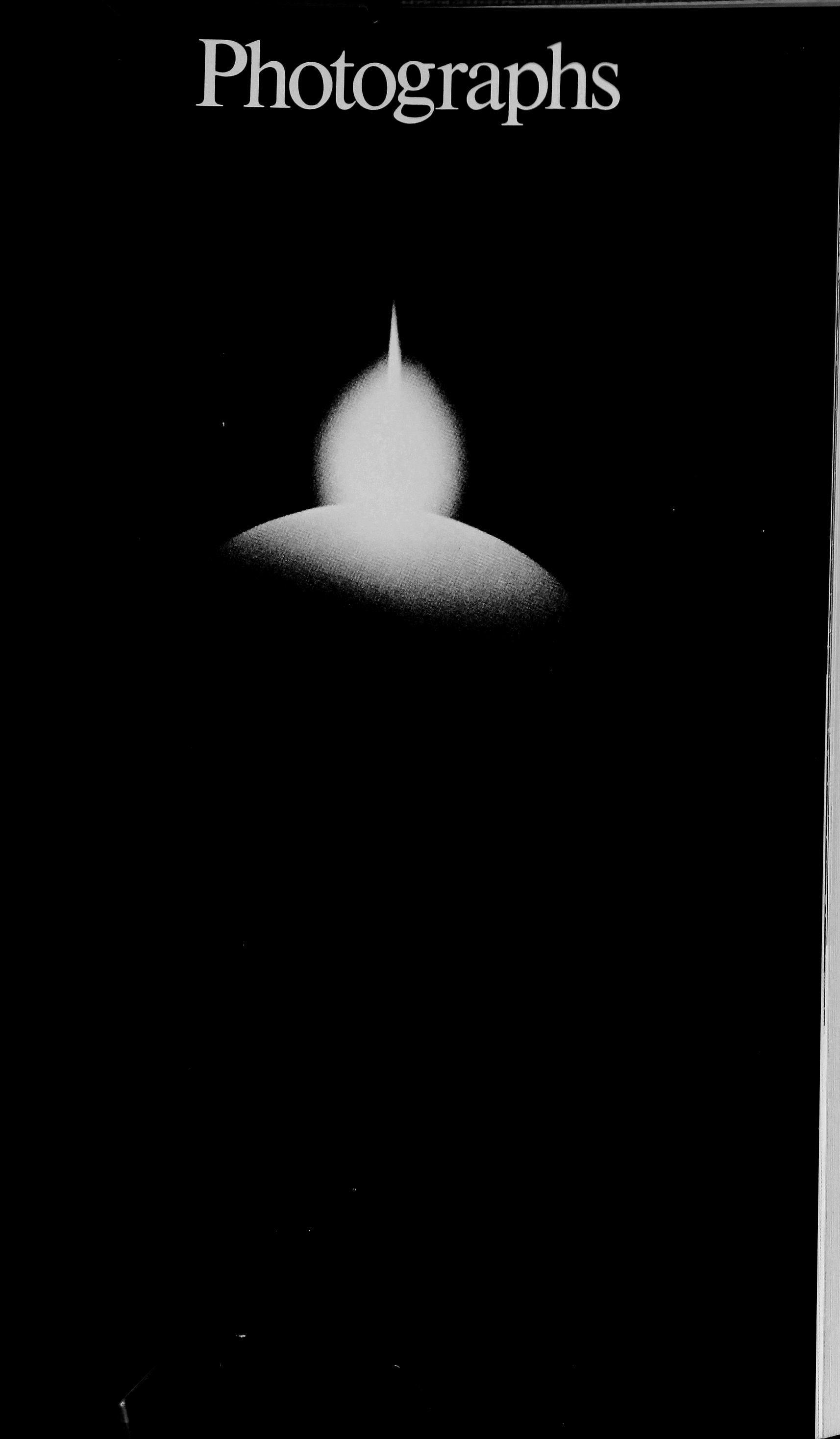
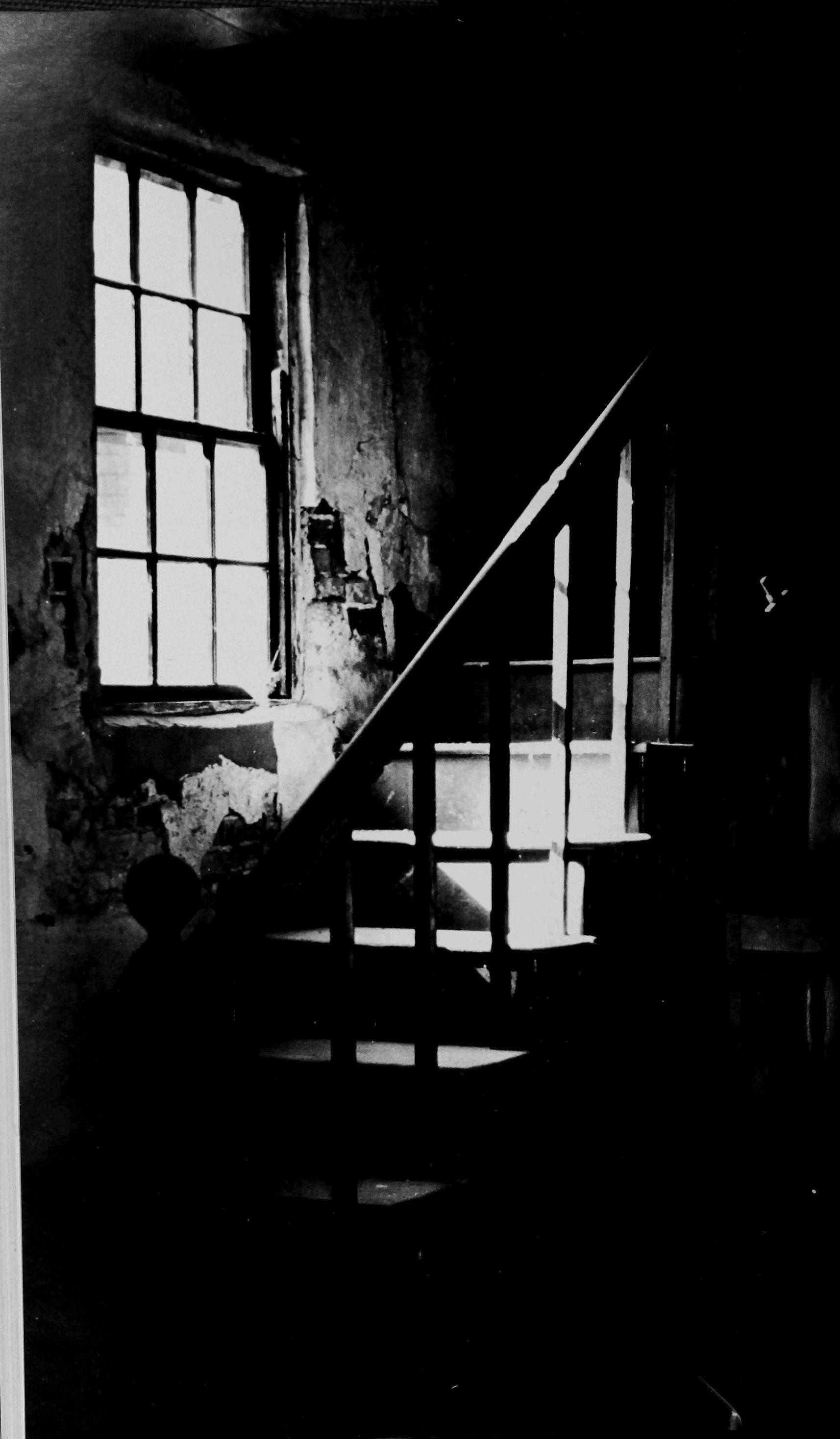
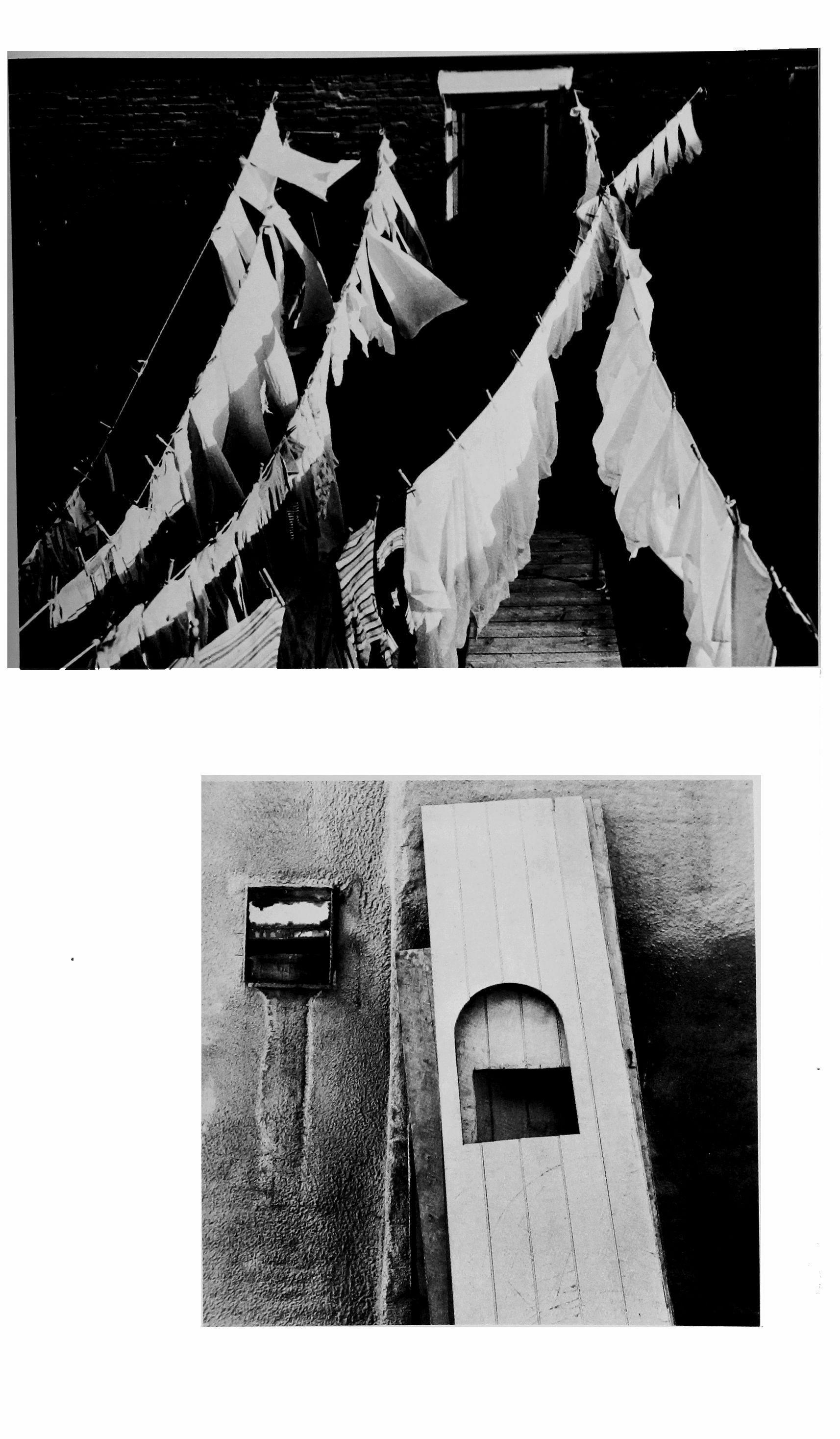
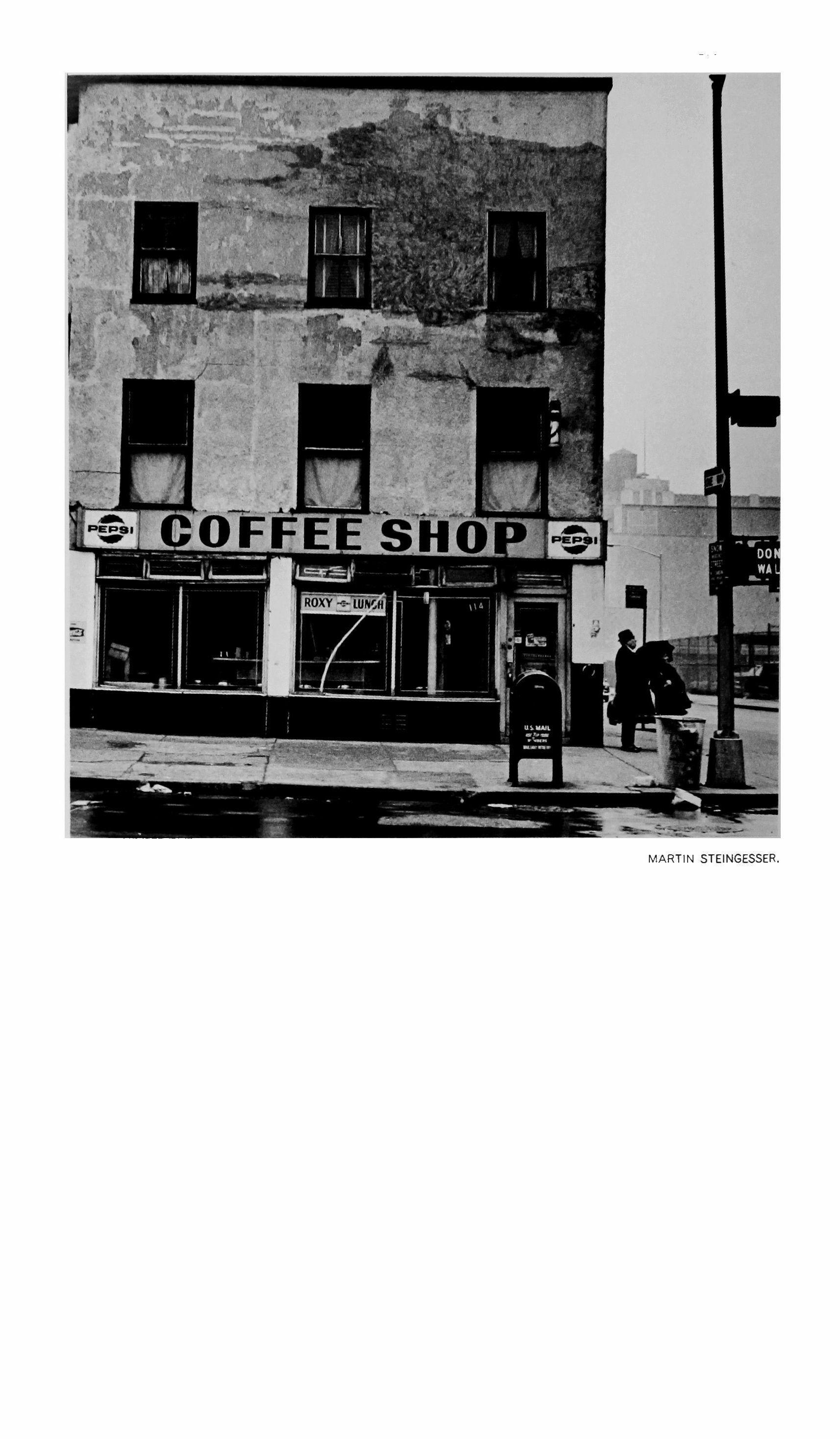 MARTIN STEINGESSER.
MARTIN STEINGESSER.
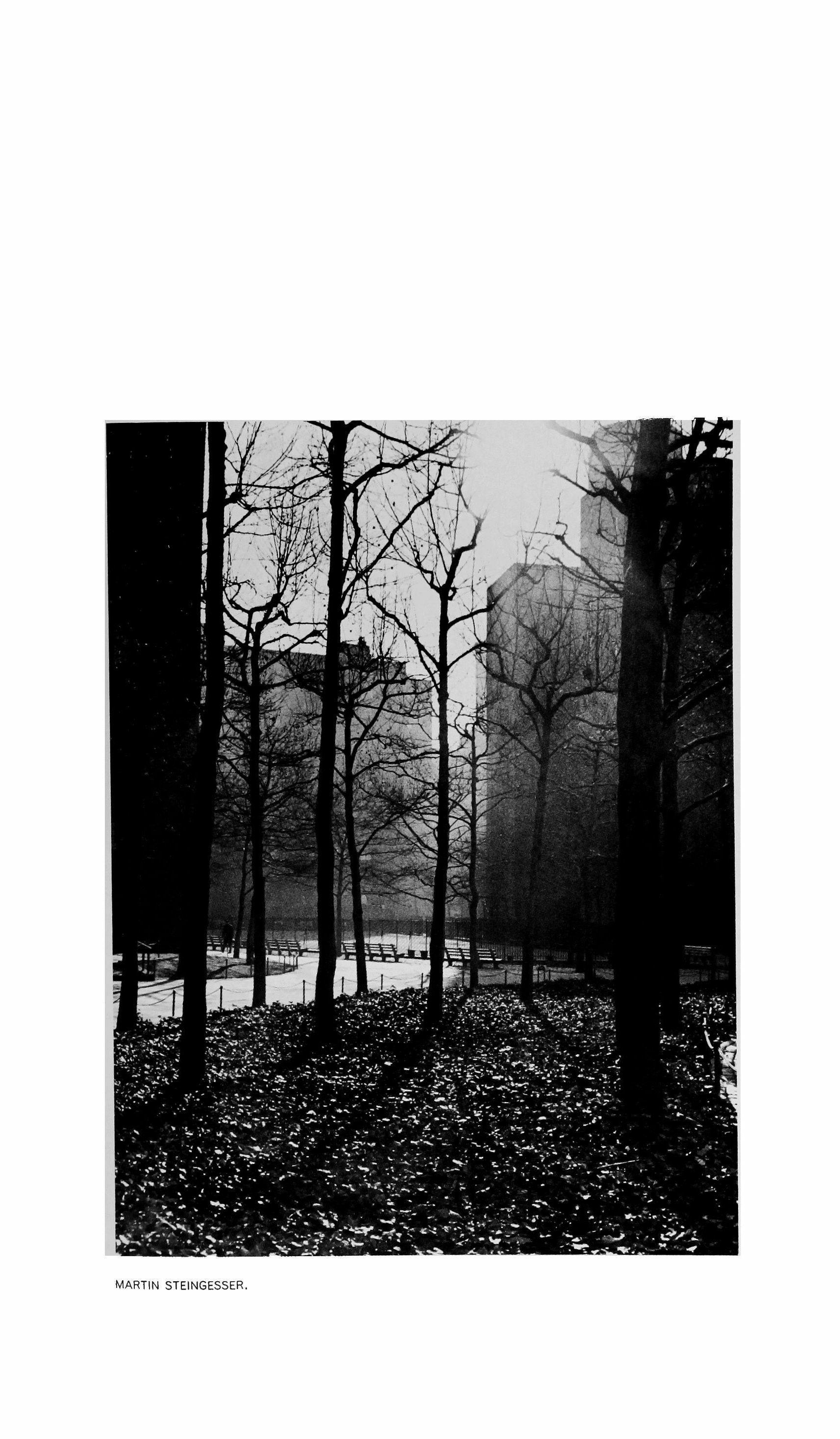 MARTIN STEINGESSER.
MARTIN STEINGESSER.
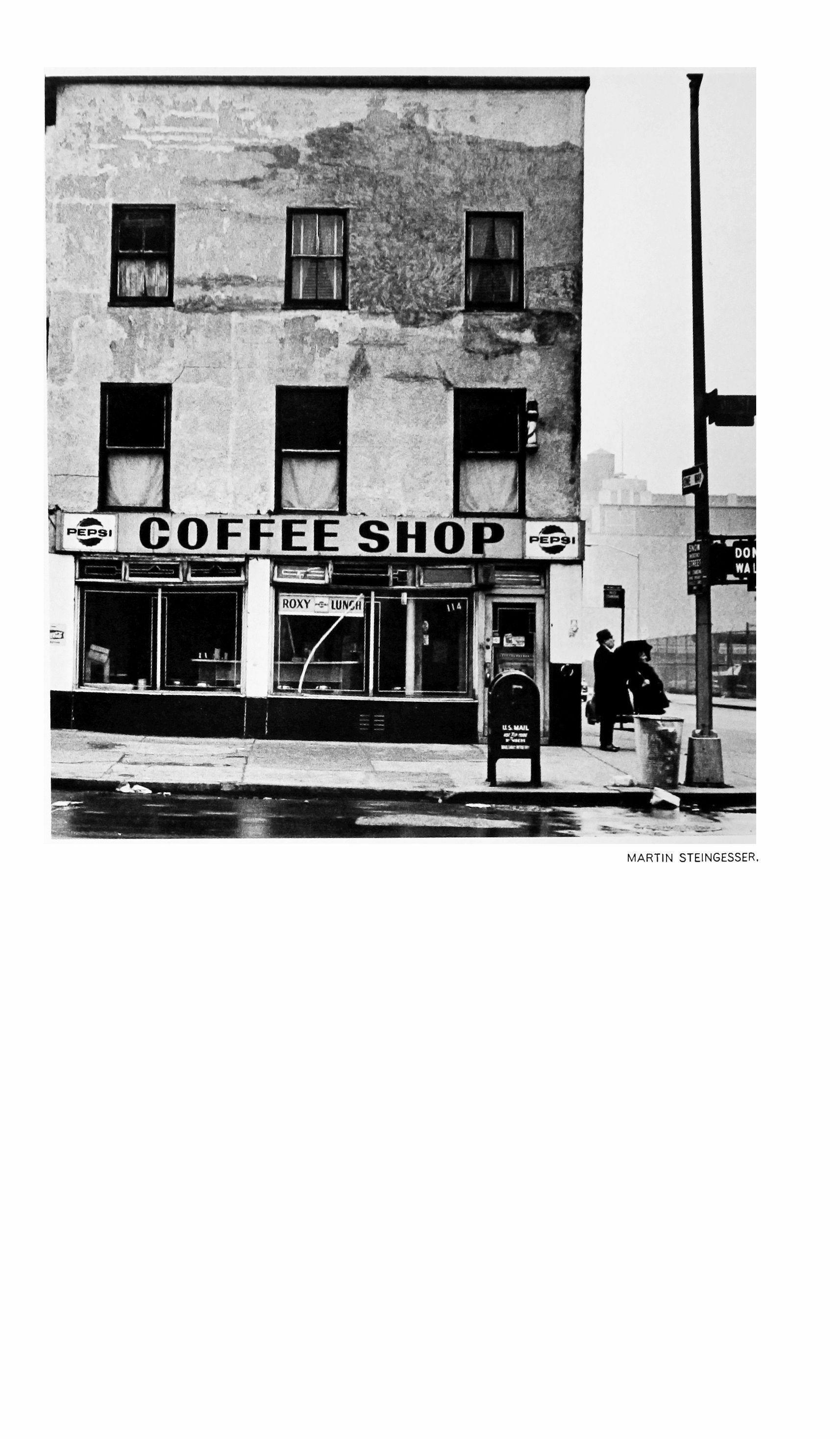 MARTIN STEINGESSER.
MARTIN STEINGESSER.
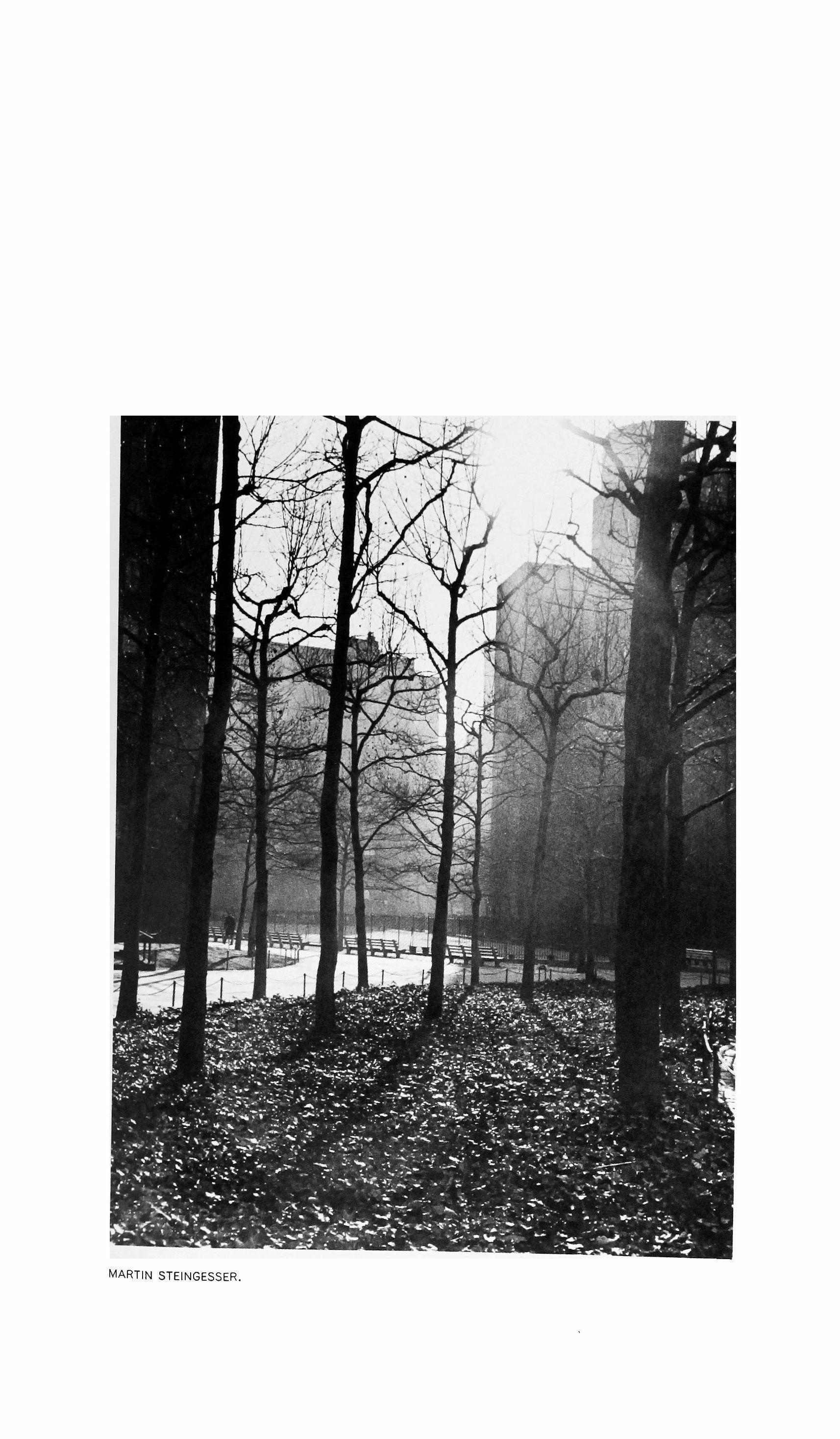 MARTIN STEINGESSER.
MARTIN STEINGESSER.
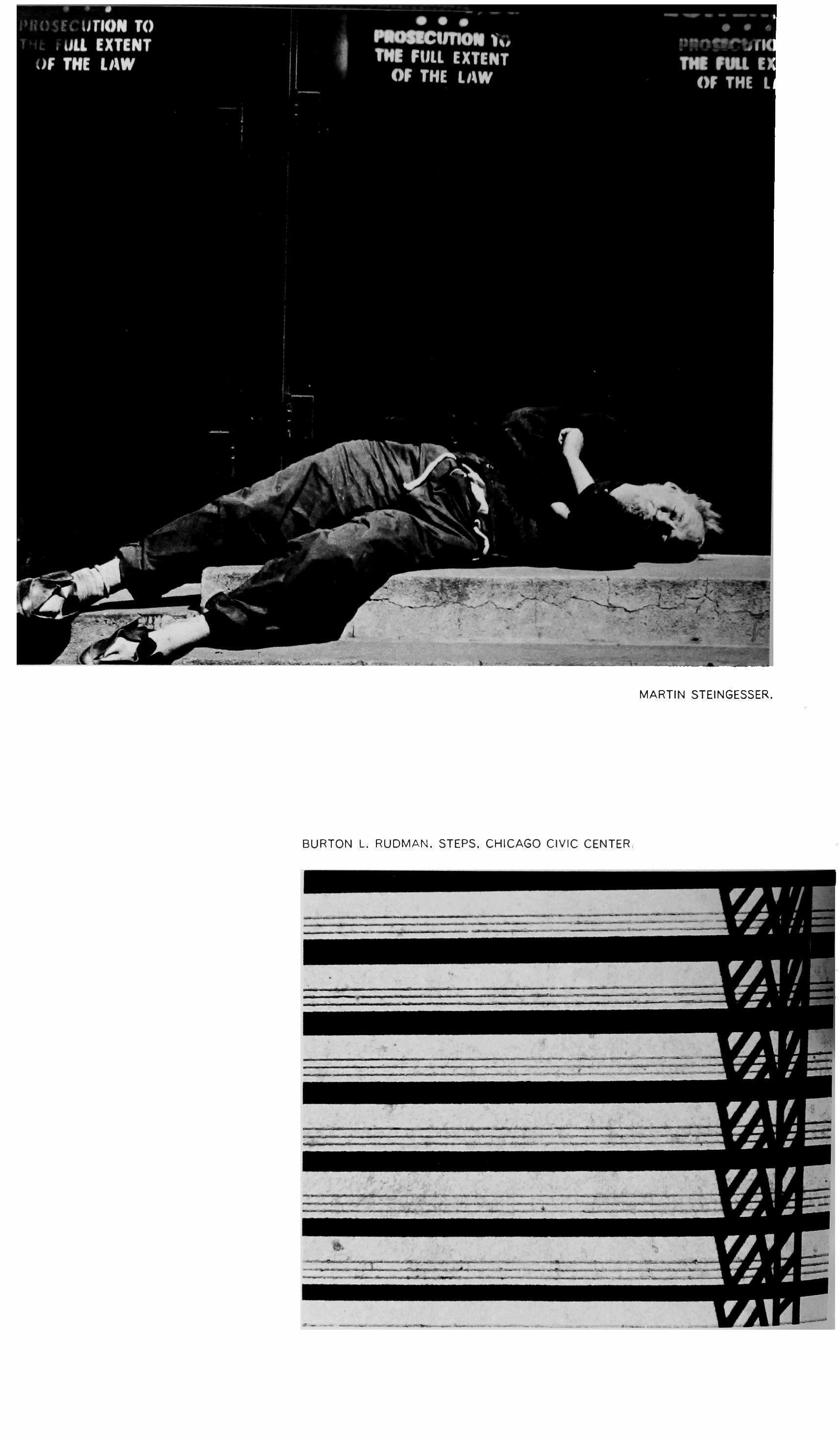 MARTIN STEINGESSER.
BURTON L. RUOMAN. STEPS. CHICAGO CIVIC CENTER
MARTIN STEINGESSER.
BURTON L. RUOMAN. STEPS. CHICAGO CIVIC CENTER
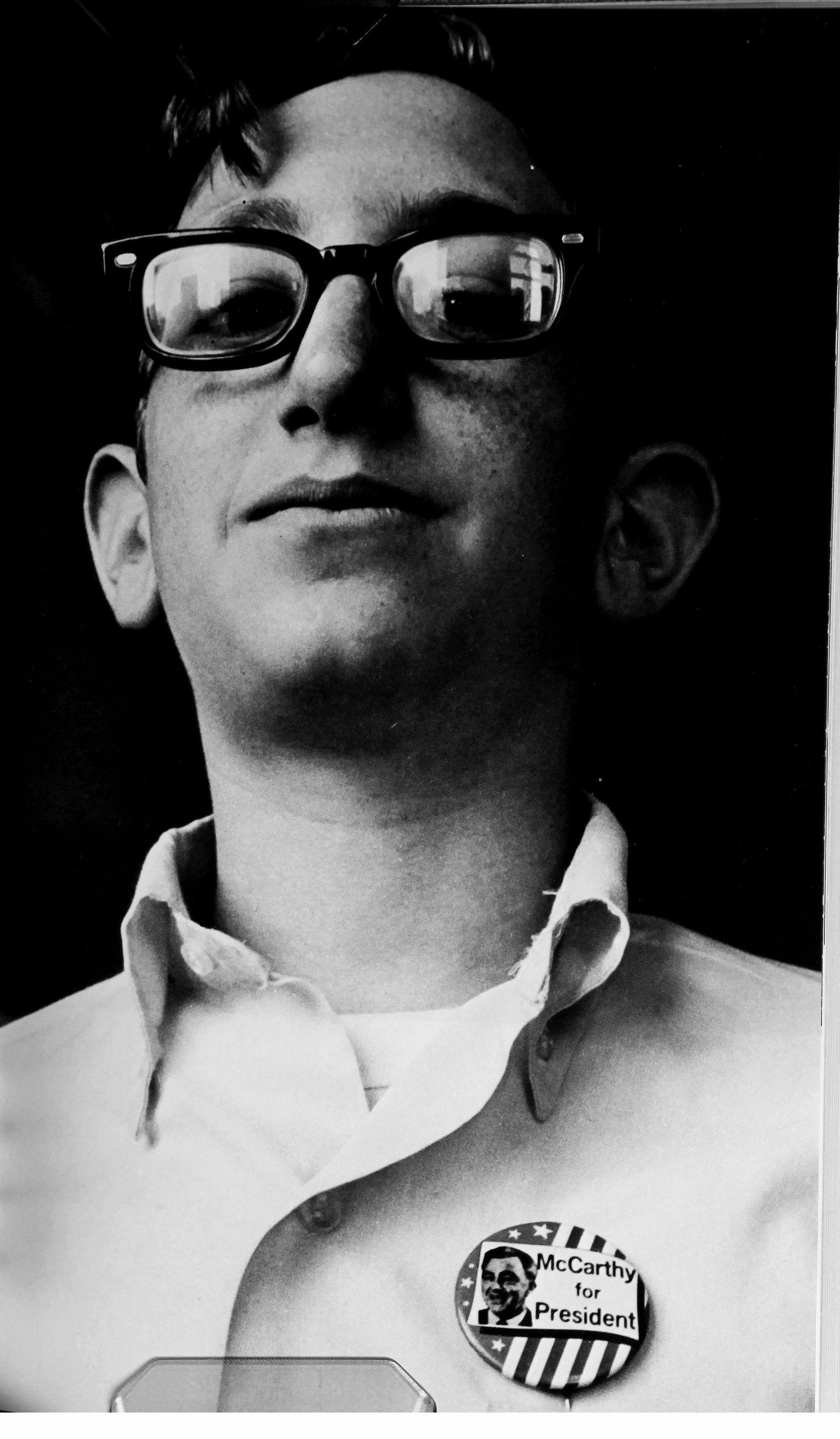
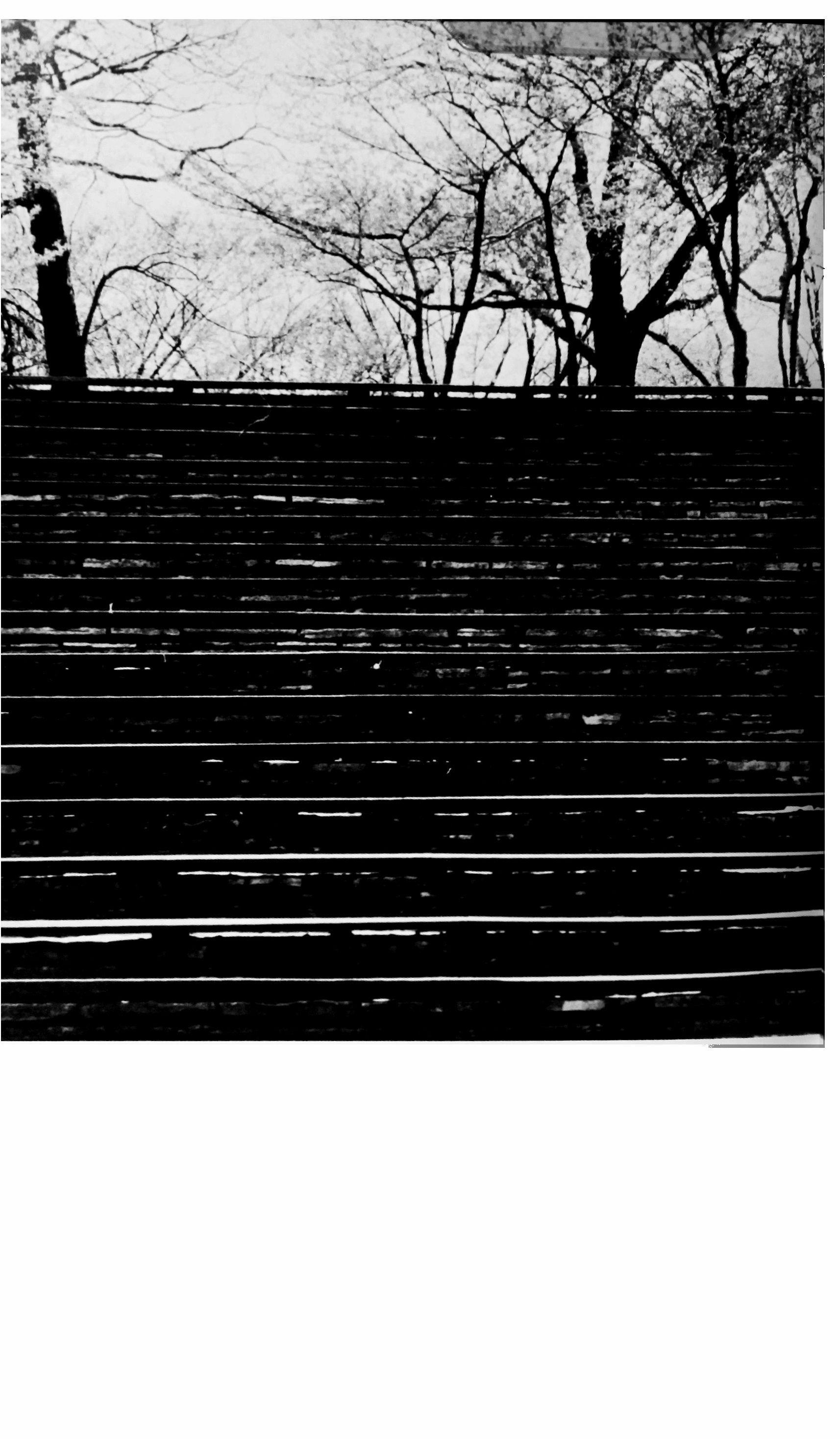
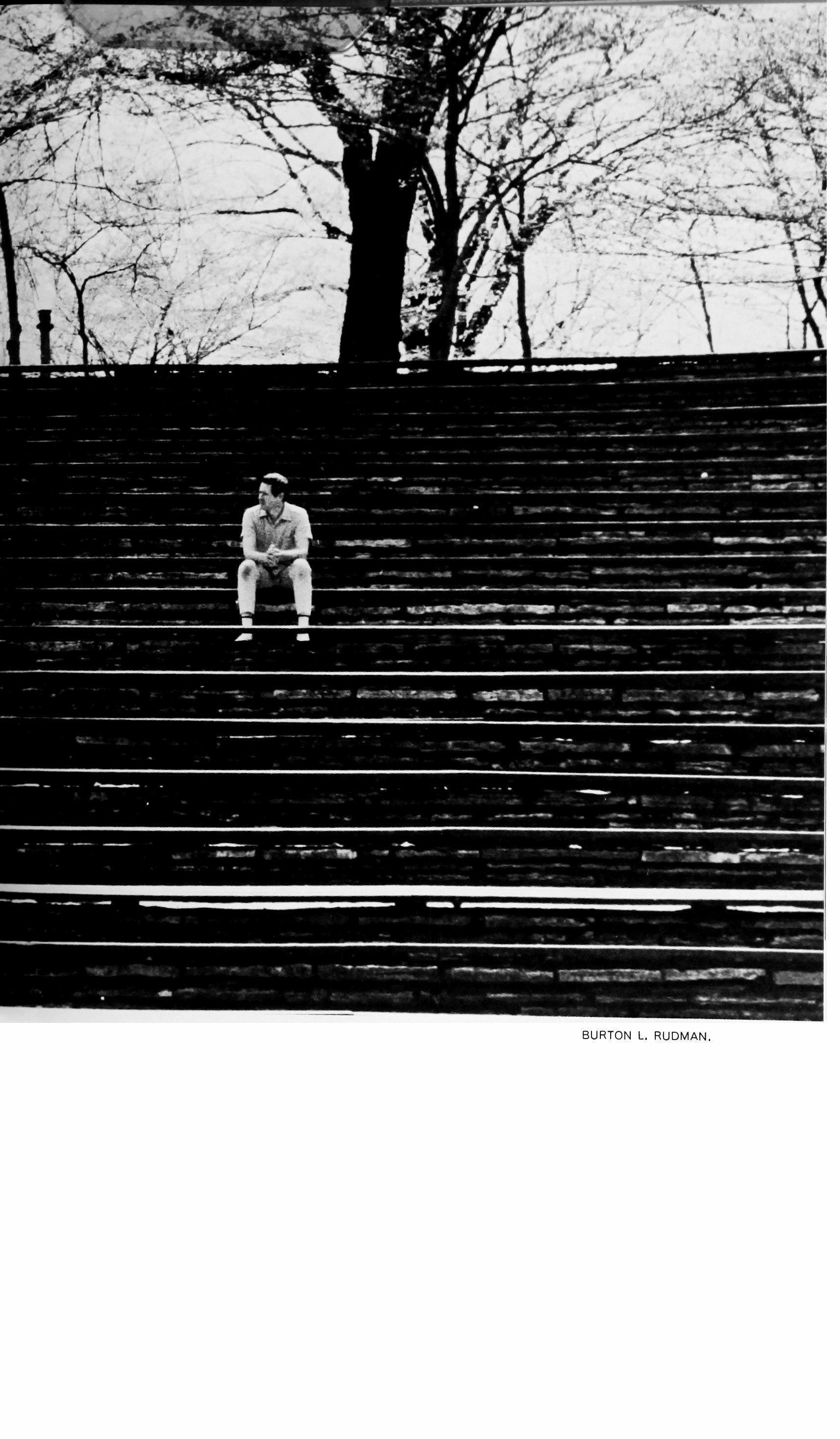 BURTON L. RUDMAN.
BURTON L. RUDMAN.
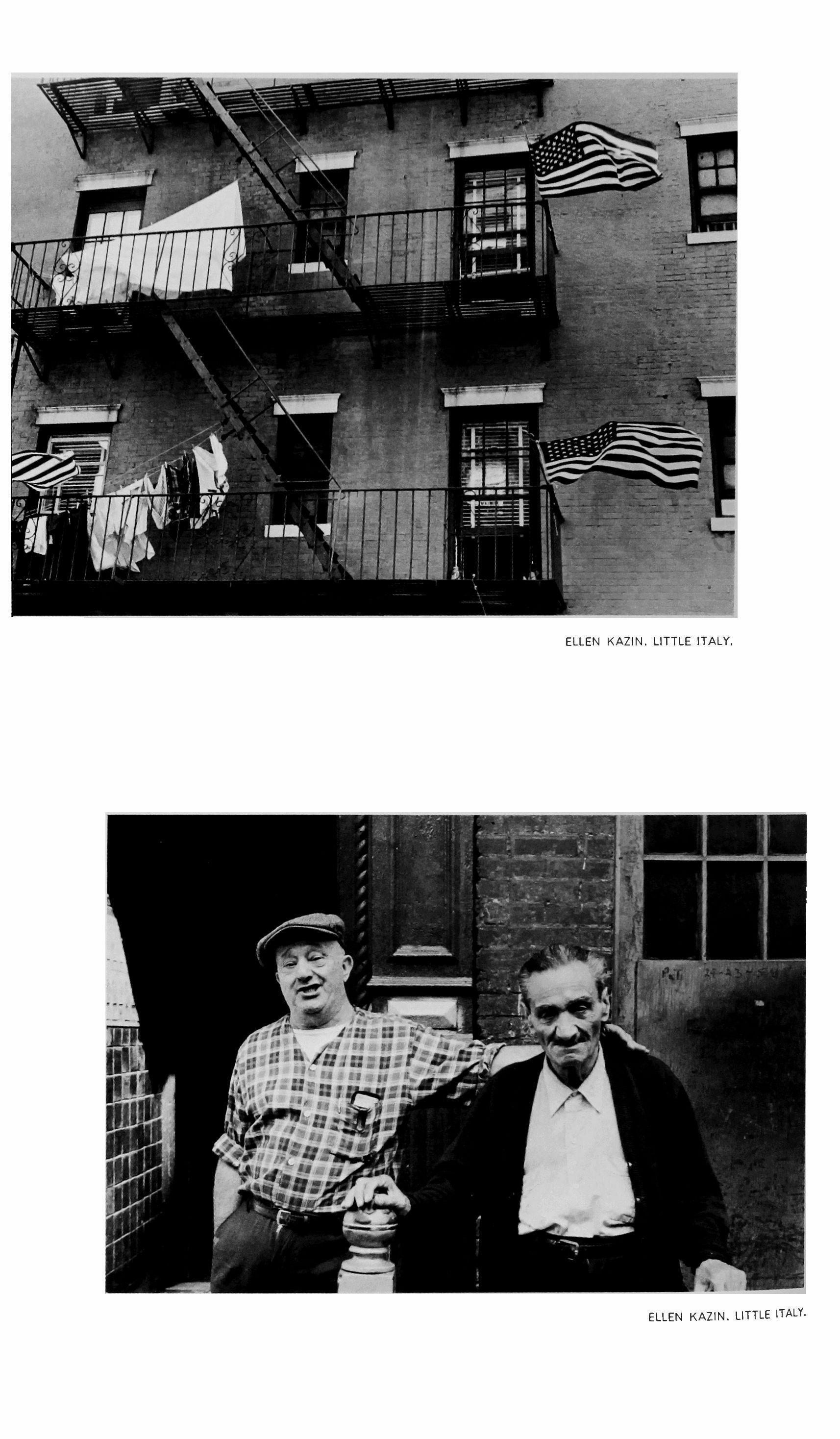 ELLEN KAZIN. LITTLE ITALY.
ELLEN KAZIN. LITTLE ITALY.
ELLEN KAZIN. LITTLE ITALY.
ELLEN KAZIN. LITTLE ITALY.
 KENJI KANESAKA. CUERNAVACA.
KENJI KANESAKA. CUERNAVACA.
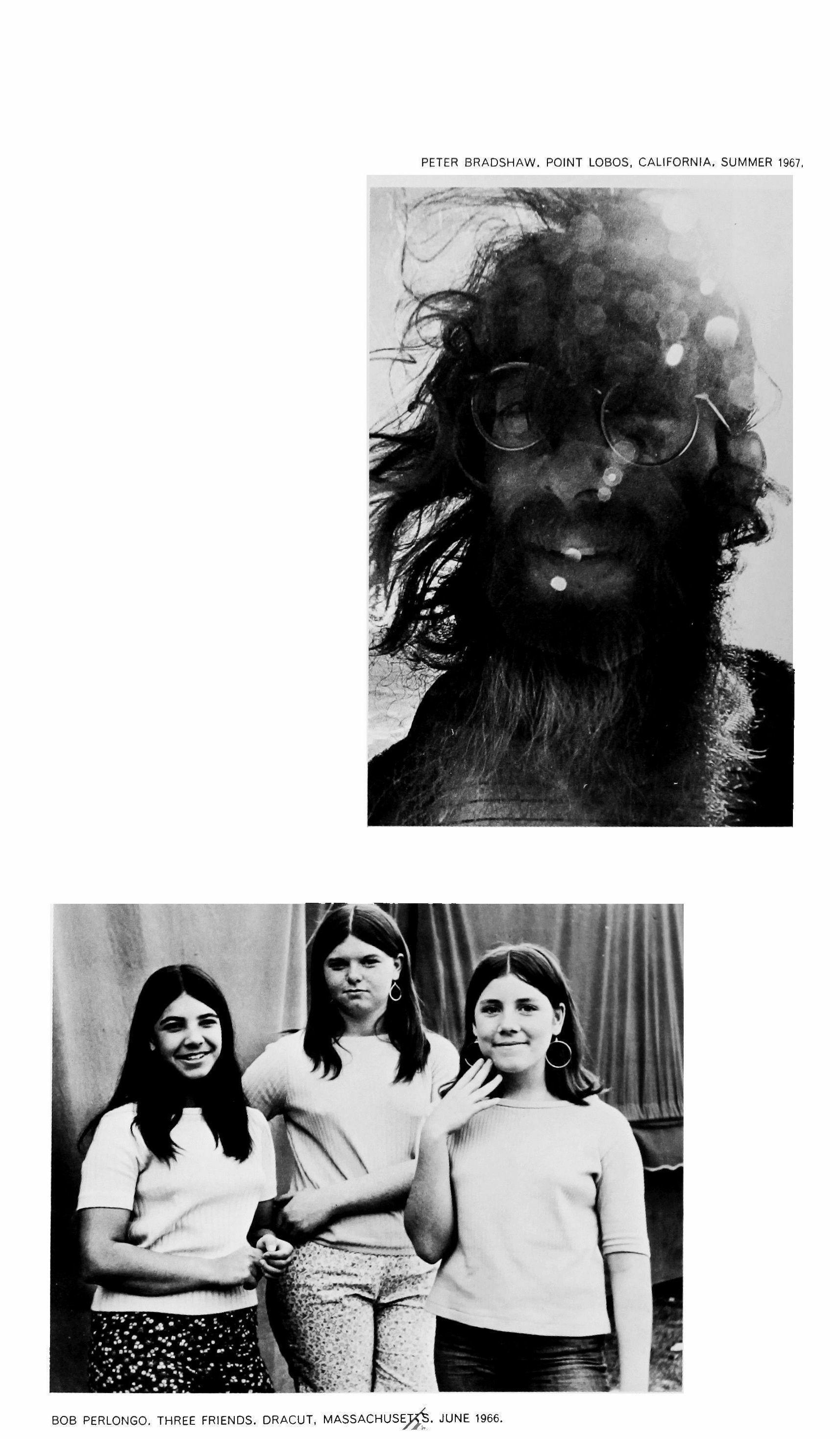 PETER BRADSHAW. POINT LOBOS. CALIFORNIA. SUMMER 1967.
BOB PERLONGO. THREE FRIENDS. DRACUT. MASSACHUS�. JUNE 1966.
PETER BRADSHAW. POINT LOBOS. CALIFORNIA. SUMMER 1967.
BOB PERLONGO. THREE FRIENDS. DRACUT. MASSACHUS�. JUNE 1966.
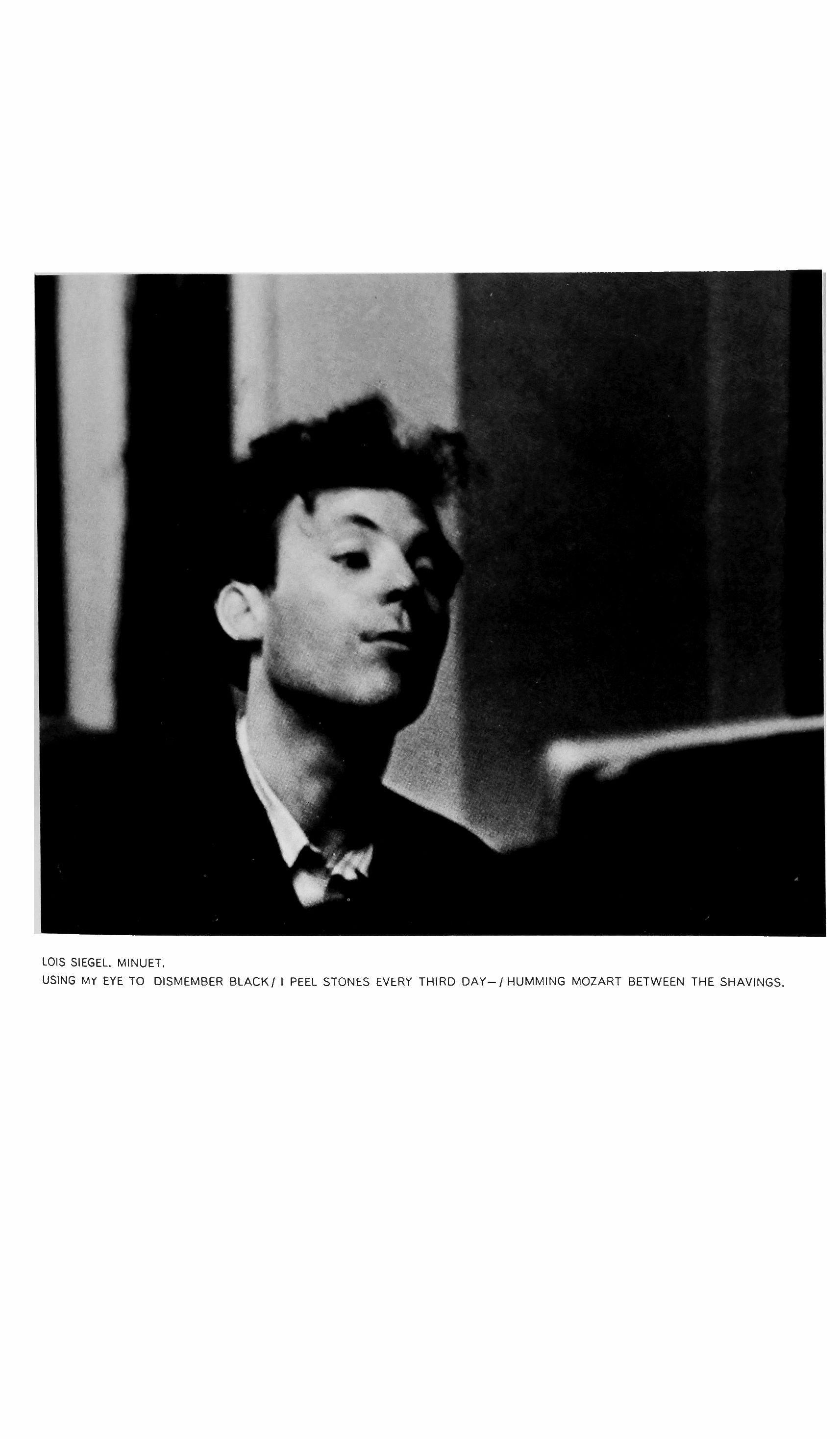
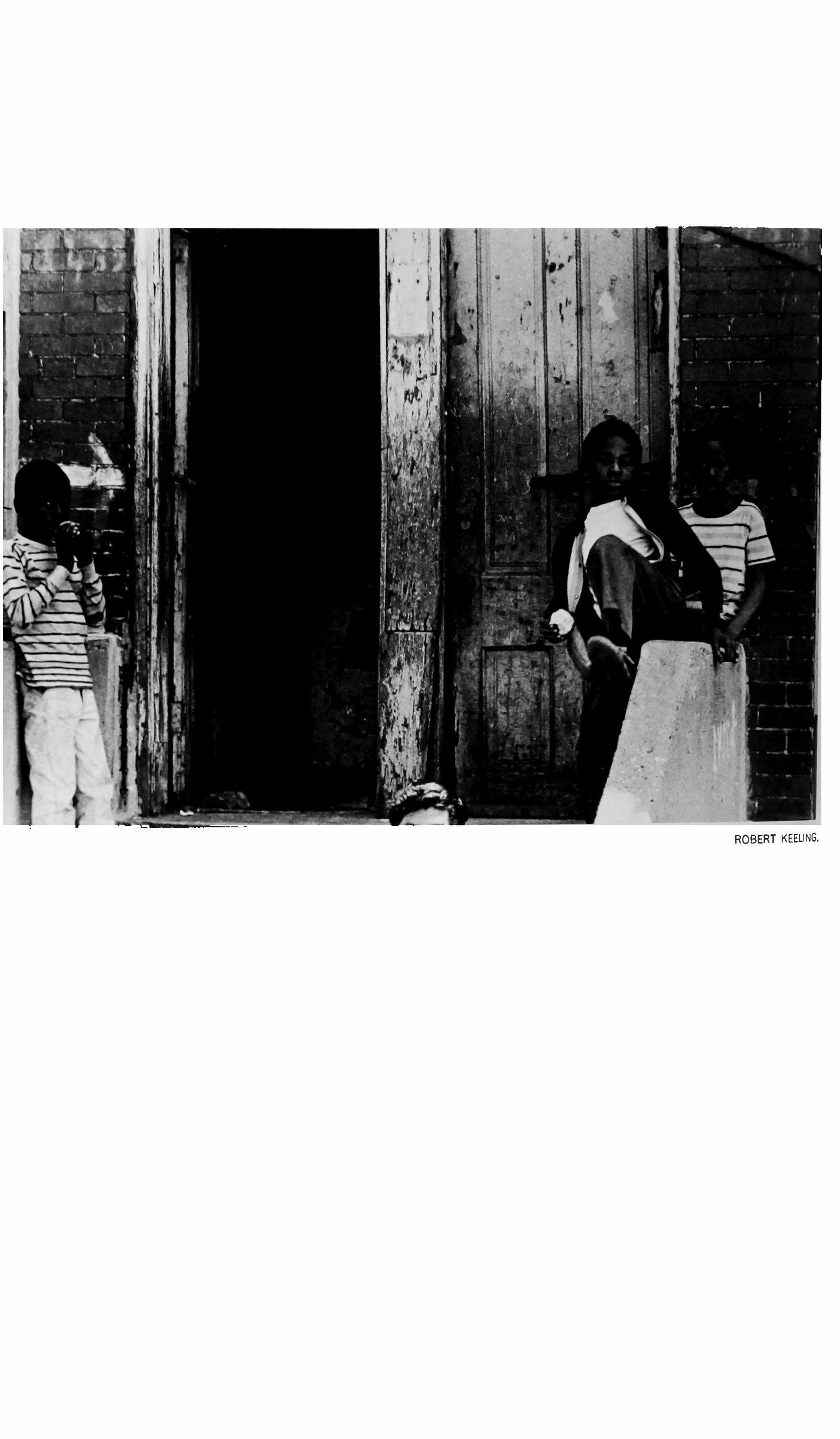 ROBERT KEELING.
ROBERT KEELING.
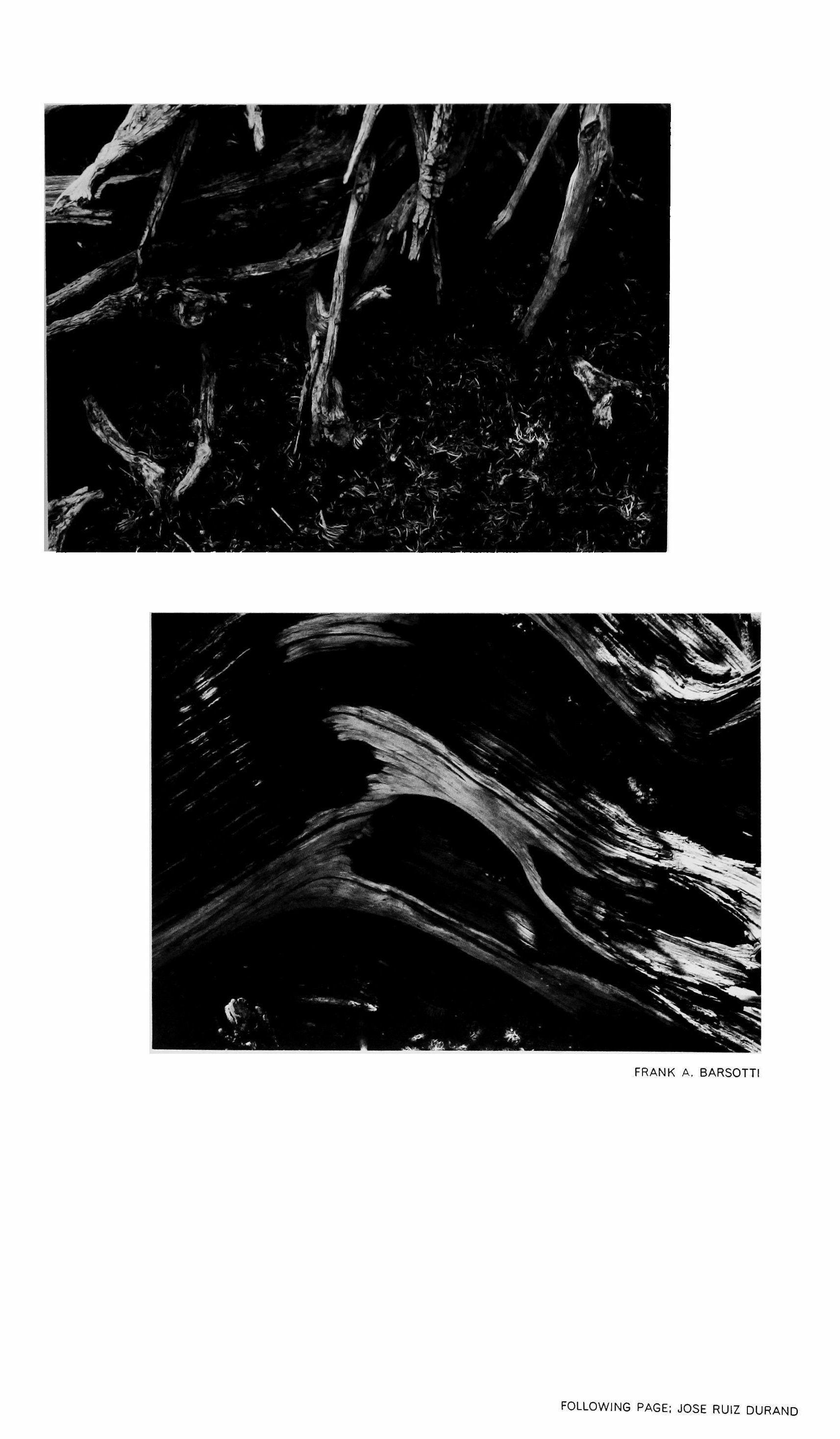
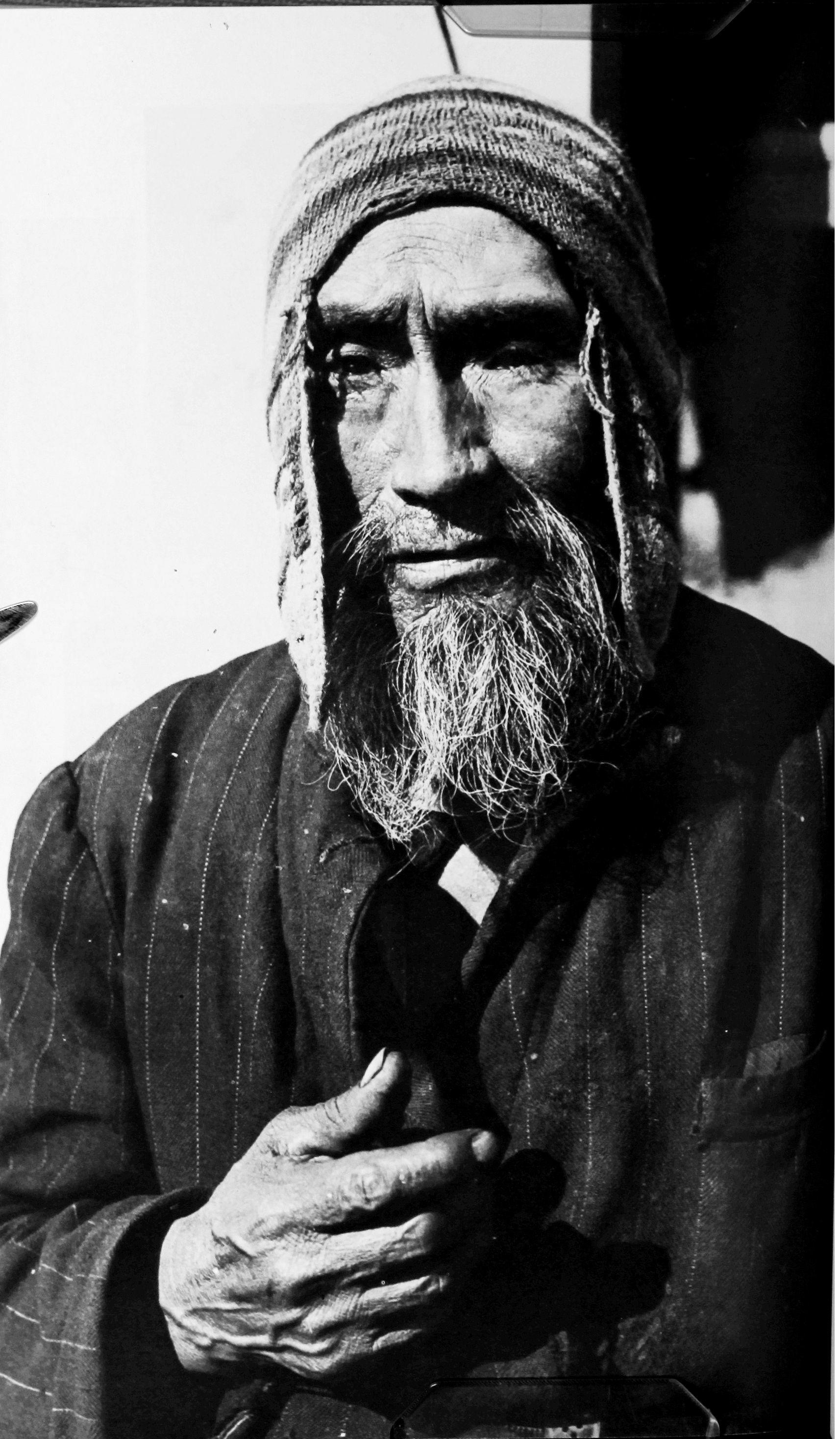
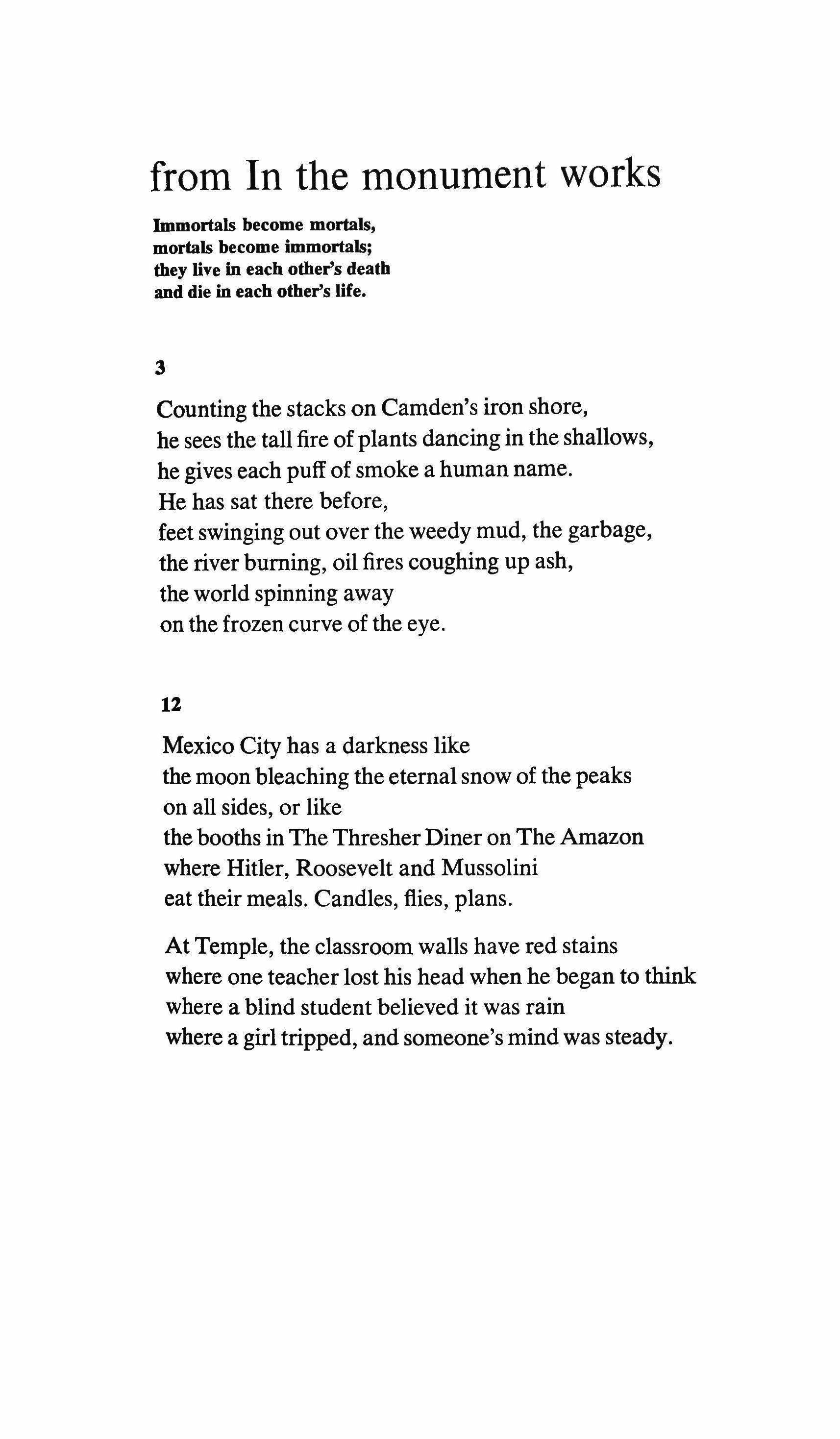
Immortals become mortals, mortals become immortals; they live in each other's death and die in each other's life.
3
Counting the stacks on Camden's iron shore, he sees the tall fire of plants dancing in the shallows, he gives each puff of smoke a human name. He has sat there before, feet swinging out over the weedy mud, the garbage, the river burning, oil fires coughing up ash, the world spinning away on the frozen curve of the eye.
12
Mexico City has a darkness like the moon bleaching the eternal snow of the peaks on all sides, or like the booths in The Thresher Diner on The Amazon where Hitler, Roosevelt and Mussolini eat their meals. Candles, flies, plans.
At Temple, the classroom walls have red stains where one teacher lost his head when he began to think where a blind student believed it was rain where a girltripped, and someone's mind was steady.
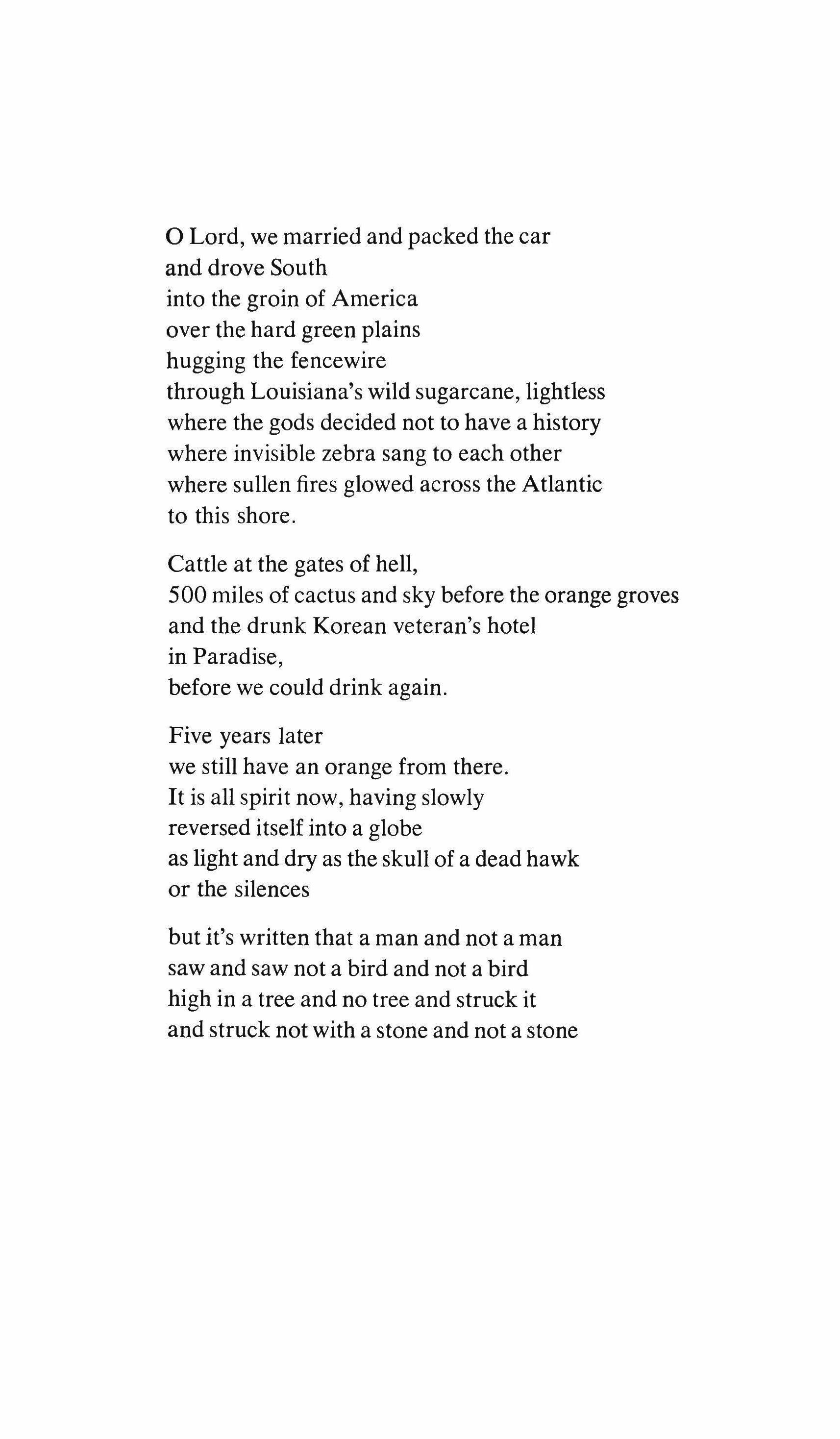
o Lord, we married and packed the car and drove South into the groin of America over the hard green plains hugging the fencewire through Louisiana's wild sugarcane, lightless where the gods decided not to have a history where invisible zebra sang to each other where sullen fires glowed across the Atlantic to this shore.
Cattle at the gates of hell, 500 miles of cactus and sky before the orange groves and the drunk Korean veteran's hotel in Paradise, before we could drink again. Five years later we still have an orange from there. It is all spirit now, having slowly reversed itself into a globe as light and dry as the skull of a dead hawk or the silences
but it's written that a man and not a man saw and saw not a bird and not a bird high in a tree and no tree and struck it and struck not with a stone and not a stone
In a horse's guts pecked out by vultures on the road to Oaxaca, in a ragged chunk of artery
I saw the Four Edges:
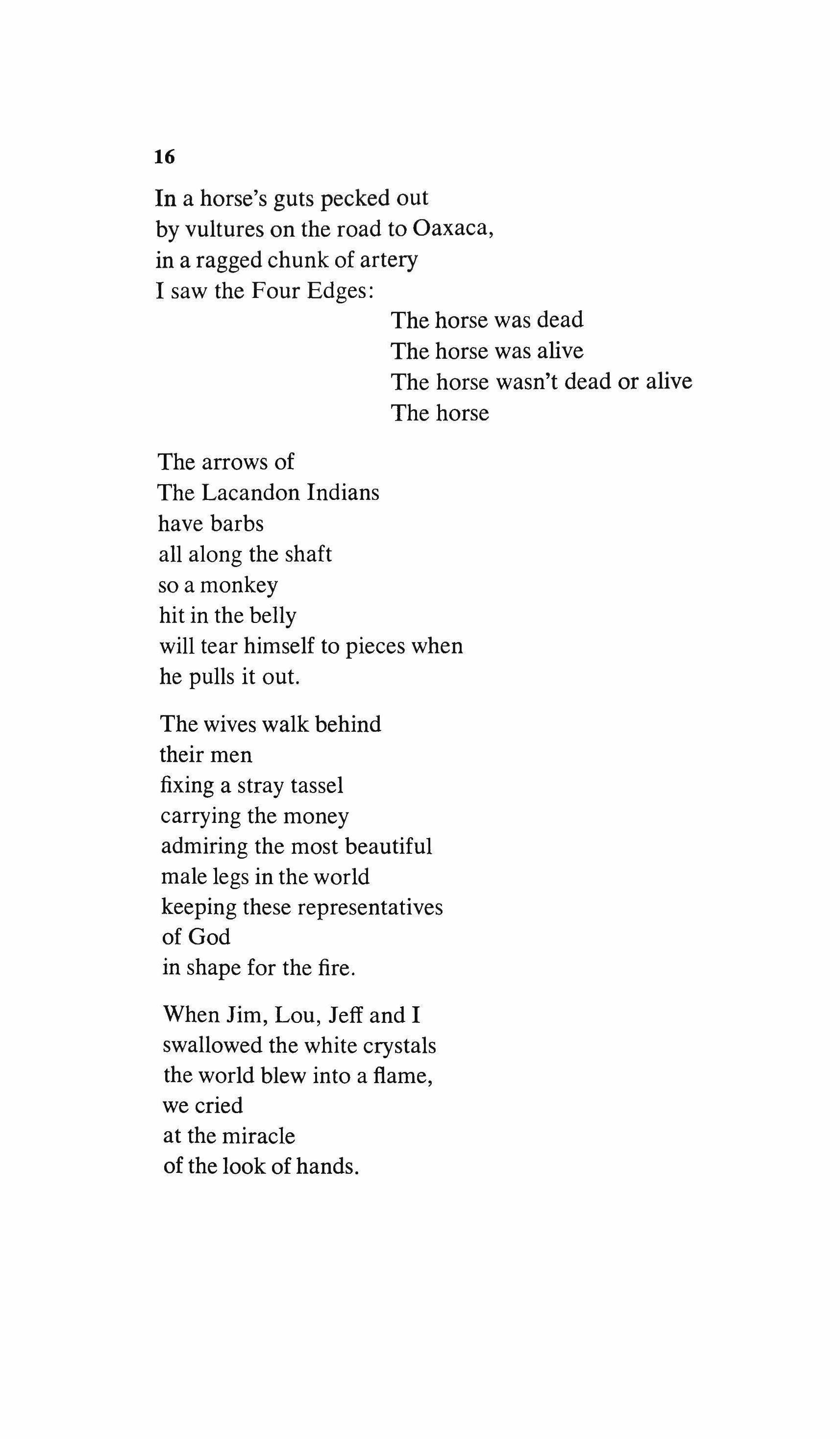
The horse was dead
The horse was alive
The horse wasn't dead or alive
The horse
The arrows of The Lacandon Indians have barbs all along the shaft so a monkey hit in the belly will tear himself to pieces when he pulls it out.
The wives walk behind their men
fixing a stray tassel carrying the money admiring the most beautiful male legs in the world keeping these representatives of God in shape for the fire.
When Jim, Lou, Jeff and I swallowed the white crystals the world blew into a flame, we cried at the miracle of the look of hands.
Now the veined hands of both my fathers let me go into the twilight of comic books. Secret folded notes stuffed in a cigar box strung between windows over the alley between our houses fall again.
I see her triangle, soft and hairless as a cloud, gleaming under the night light, Teddy's fingers twisting away from his unknown cancer, hands dropping tiny newts, stones being heated the baseball field, stubbly friends
smoke twirls up through a little hole in the roof the mules try each rock before stepping down into the village with loads of branches that cover them thick and green, the valley smolders and is penetrated only
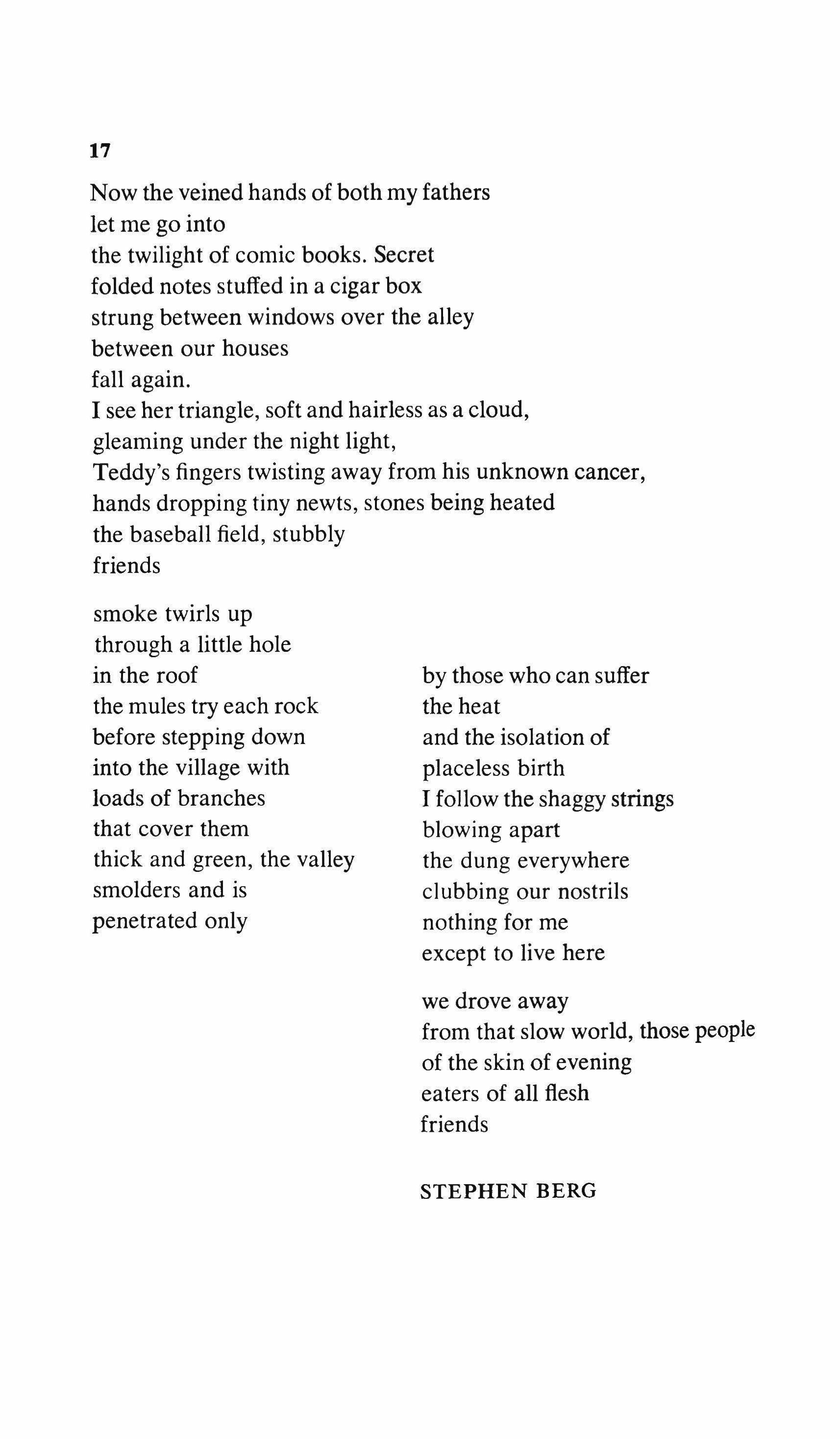
by those who can suffer the heat and the isolation of placeless birth I follow the shaggy strings blowing apart the dung everywhere clubbing our nostrils nothing for me except to live here we drove away from that slow world, those people of the skin of evening eaters of all flesh friends
STEPHEN BERG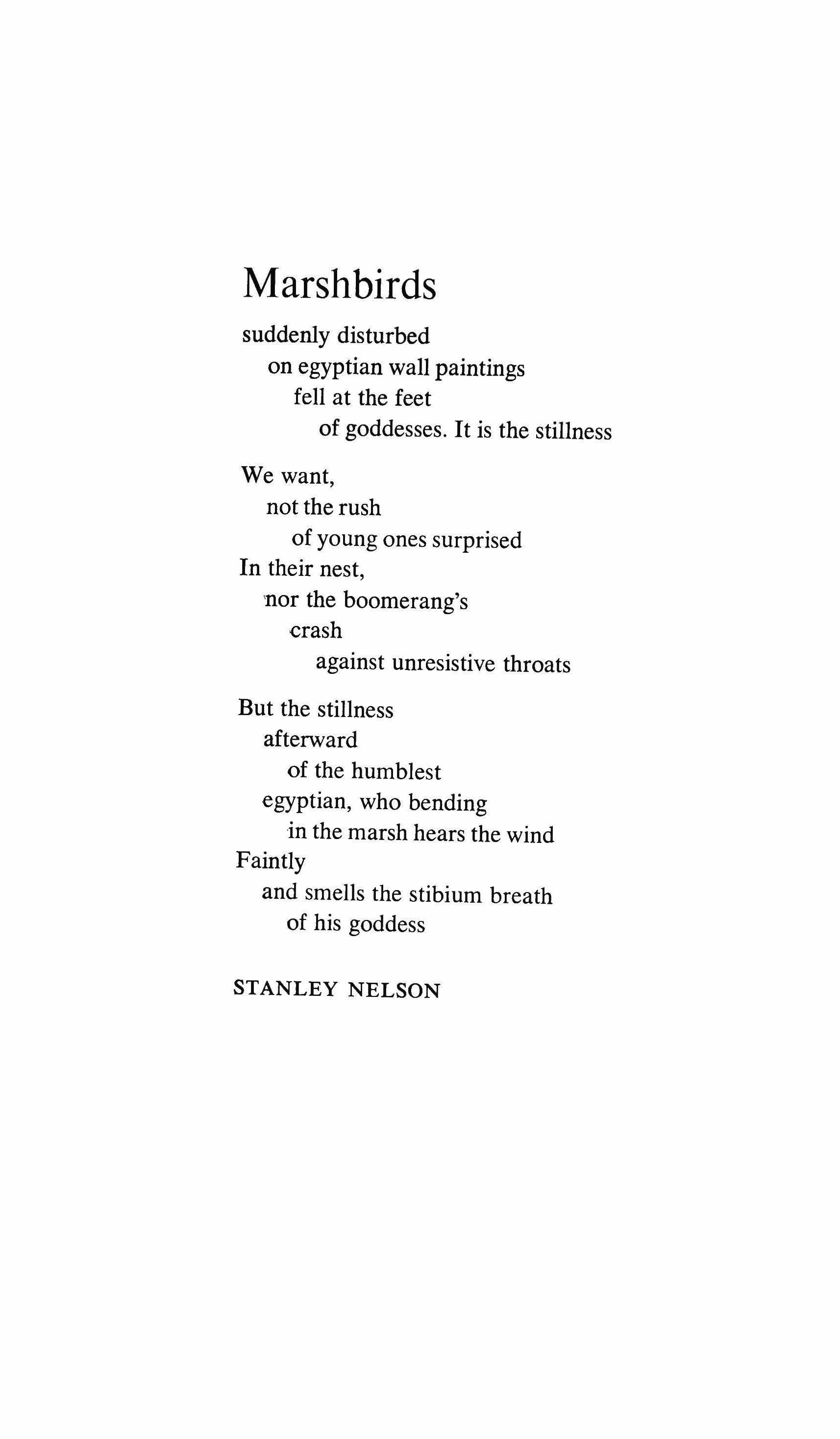
suddenly disturbed on egyptian wall paintings fell at the feet of goddesses. It is the stillness
We want, not the rush of young ones surprised In their nest, nor the boomerang's crash against unresistive throats
But the stillness afterward of the humblest egyptian, who bending in the marsh hears the wind Faintly and smells the stibium breath of his goddess
STANLEY NELSON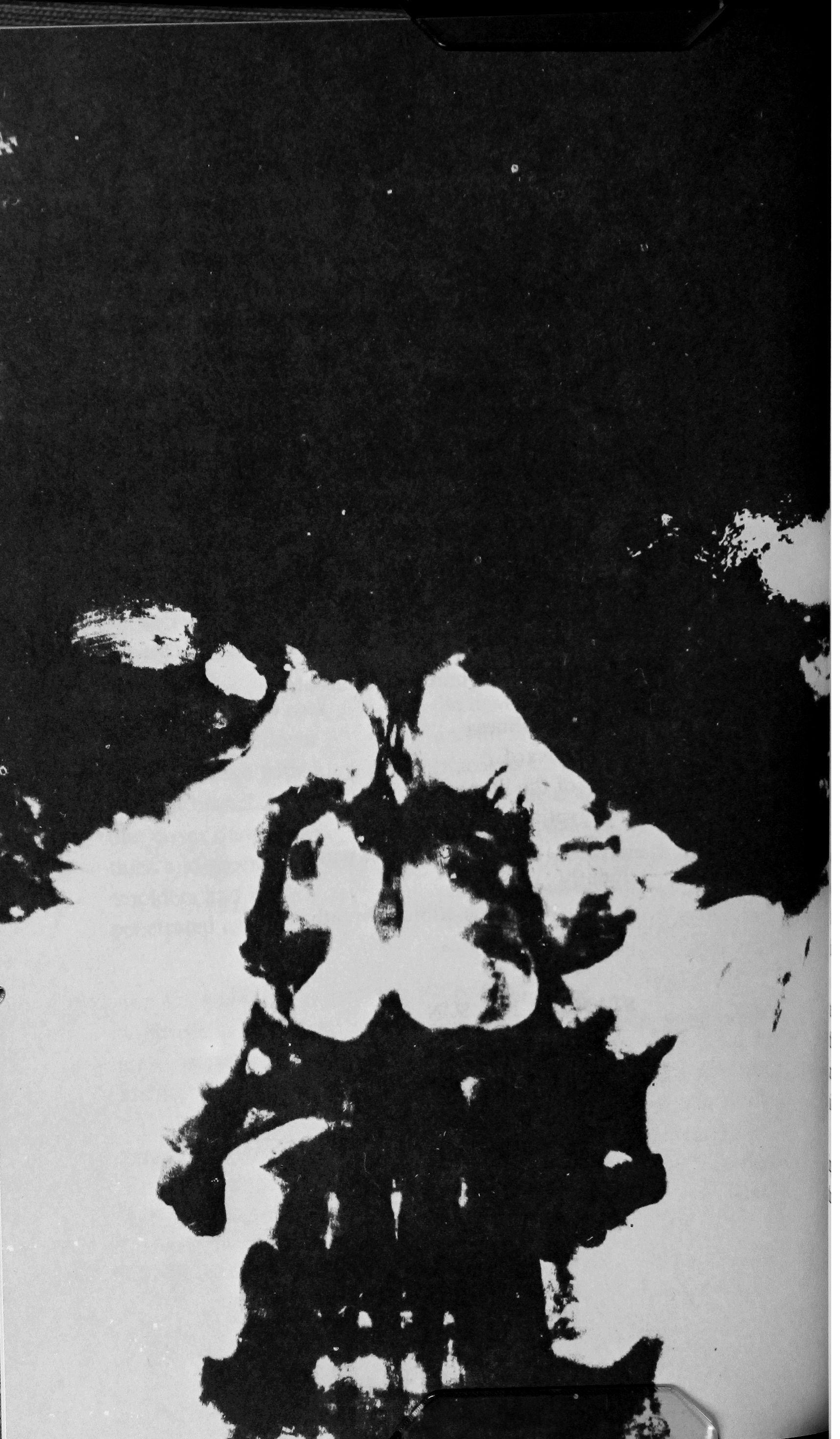
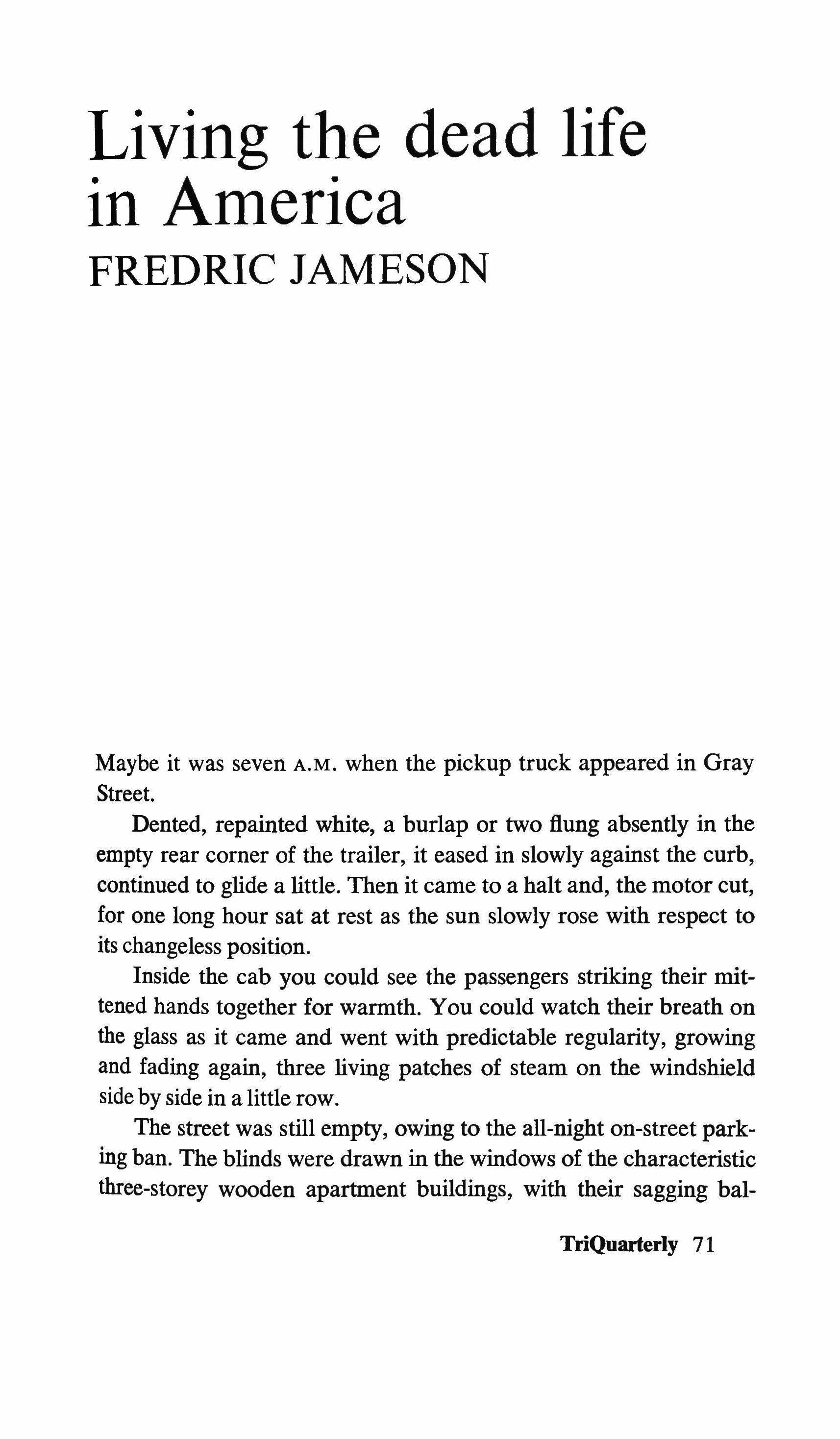
Maybe it was seven A.M. when the pickup truck appeared in Gray Street.
Dented, repainted white, a burlap or two flung absently in the empty rear corner of the trailer, it eased in slowly against the curb, continued to glide a little. Then it came to a halt and, the motor cut, for one long hour sat at rest as the sun slowly rose with respect to its changeless position.
Inside the cab you could see the passengers striking their mittened hands together for warmth. You could watch their breath on the glass as it came and went with predictable regularity, growing and fading again, three living patches of steam on the windshield side by side in a little row.
The street was still empty, owing to the all-night on-street parking ban. The blinds were drawn in the windows of the characteristic three-storey wooden apartment buildings, with their sagging bal-
TriQuarterly 71
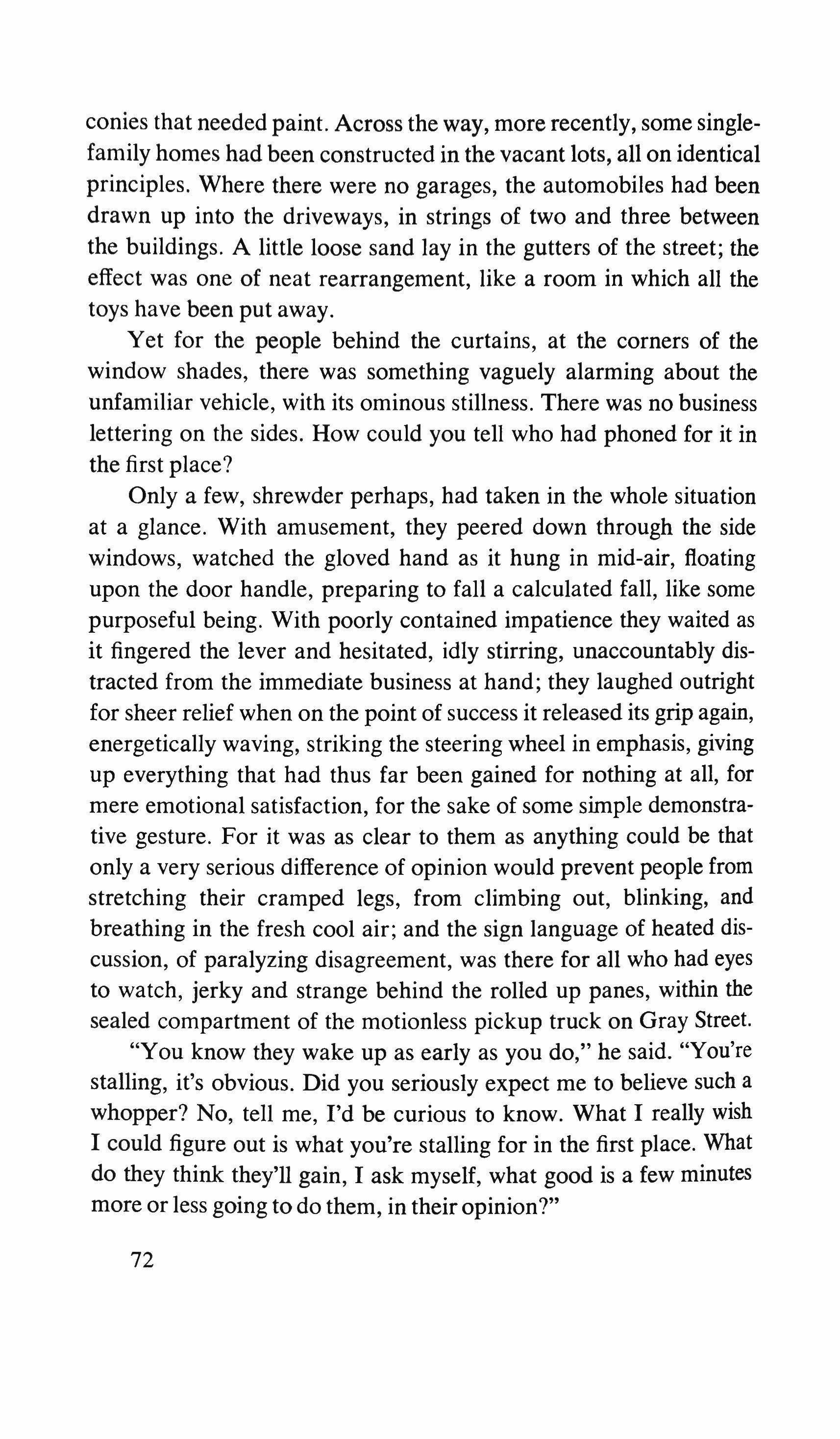
conies that needed paint. Across the way, more recently, some singlefamily homes had been constructed in the vacant lots, all on identical principles. Where there were no garages, the automobiles had been drawn up into the driveways, in strings of two and three between the buildings. A little loose sand lay in the gutters of the street; the effect was one of neat rearrangement, like a room in which all the toys have been put away.
Yet for the people behind the curtains, at the corners of the window shades, there was something vaguely alarming about the unfamiliar vehicle, with its ominous stillness. There was no business lettering on the sides. How could you tell who had phoned for it in the first place?
Only a few, shrewder perhaps, had taken in the whole situation at a glance. With amusement, they peered down through the side windows, watched the gloved hand as it hung in mid-air, floating upon the door handle, preparing to fall a calculated fall, like some purposeful being. With poorly contained impatience they waited as it fingered the lever and hesitated, idly stirring, unaccountably distracted from the immediate business at hand; they laughed outright for sheer relief when on the point of success it released its grip again, energetically waving, striking the steering wheel in emphasis, giving up everything that had thus far been gained for nothing at all, for mere emotional satisfaction, for the sake of some simple demonstrative gesture. For it was as clear to them as anything could be that only a very serious difference of opinion would prevent people from stretching their cramped legs, from climbing out, blinking, and breathing in the fresh cool air; and the sign language of heated discussion, of paralyzing disagreement, was there for all who had eyes to watch, jerky and strange behind the rolled up panes, within the sealed compartment of the motionless pickup truck on Gray Street.
"You know they wake up as early as you do," he said. "You're stalling, it's obvious. Did you seriously expect me to believe such a whopper? No, tell me, I'd be curious to know. What I really wish I could figure out is what you're stalling for in the first place. What do they think they'll gain, I ask myself, what good is a few minutes more or less going to do them, in their opinion?"
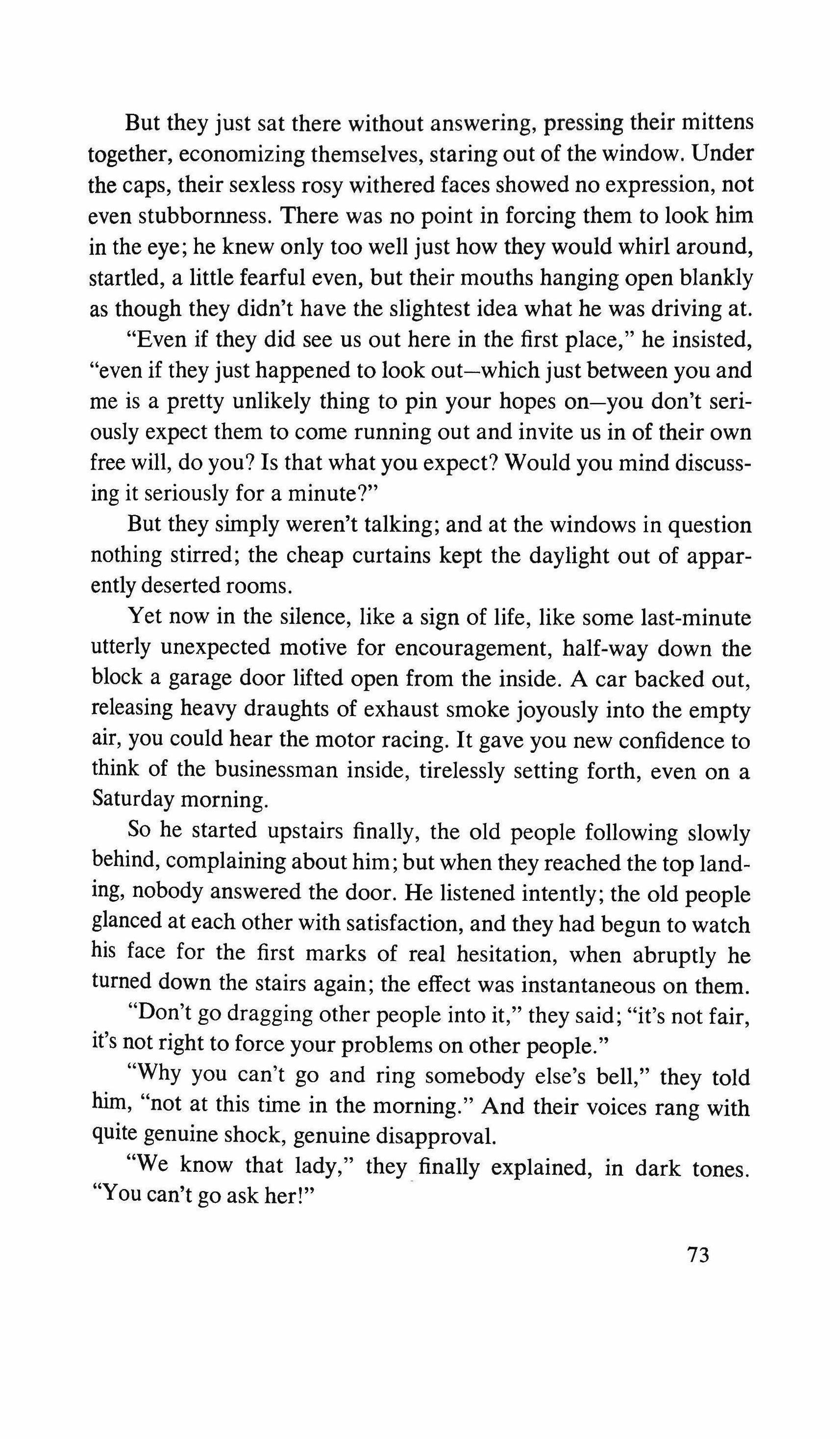
But they just sat there without answering, pressing their mittens together, economizing themselves, staring out of the window. Under the caps, their sexless rosy withered faces showed no expression, not even stubbornness. There was no point in forcing them to look him in the eye; he knew only too well just how they would whirl around, startled, a little fearful even, but their mouths hanging open blankly as though they didn't have the slightest idea what he was driving at.
"Even if they did see us out here in the first place," he insisted, "even if they just happened to look out-which just between you and me is a pretty unlikely thing to pin your hopes on-you don't seriously expect them to come running out and invite us in of their own free will, do you? Is that what you expect? Would you mind discussing it seriously for a minute?"
But they simply weren't talking; and at the windows in question nothing stirred; the cheap curtains kept the daylight out of apparently deserted rooms.
Yet now in the silence, like a sign of life, like some last-minute utterly unexpected motive for encouragement, half-way down the block a garage door lifted open from the inside. A car backed out, releasing heavy draughts of exhaust smoke joyously into the empty air, you could hear the motor racing. It gave you new confidence to think of the businessman inside, tirelessly setting forth, even on a Saturday morning.
So he started upstairs finally, the old people following slowly behind, complaining about him; but when they reached the top landing, nobody answered the door. He listened intently; the old people glanced at each other with satisfaction, and they had begun to watch his face for the first marks of real hesitation, when abruptly he turned down the stairs again; the effect was instantaneous on them.
"Don't go dragging other people into it," they said; "it's not fair, it's not right to force your problems on other people."
"Why you can't go and ring somebody else's bell," they told him, "not at this time in the morning." And their voices rang with quite genuine shock, genuine disapproval.
"We know that lady," they finally explained, in dark tones. "You can't go ask her!"
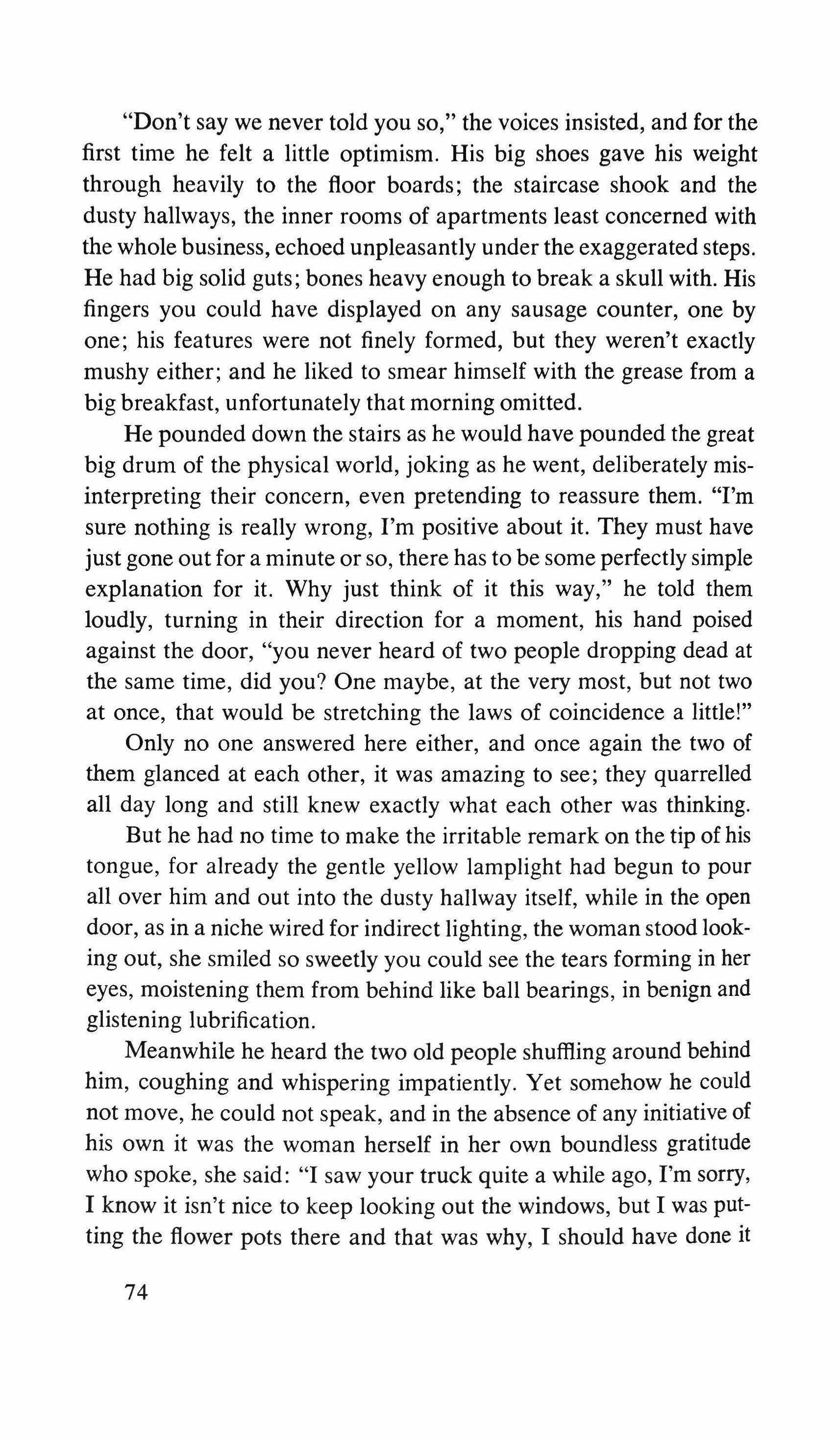
"Don't say we never told you so," the voices insisted, and for the first time he felt a little optimism. His big shoes gave his weight through heavily to the floor boards; the staircase shook and the dusty hallways, the inner rooms of apartments least concerned with the whole business, echoed unpleasantly under the exaggerated steps. He had big solid guts; bones heavy enough to break a skull with. His fingers you could have displayed on any sausage counter, one by one; his features were not finely formed, but they weren't exactly mushy either; and he liked to smear himself with the grease from a big breakfast, unfortunately that morning omitted.
He pounded down the stairs as he would have pounded the great big drum of the physical world, joking as he went, deliberately misinterpreting their concern, even pretending to reassure them. "I'm sure nothing is really wrong, I'm positive about it. They must have just gone out for a minute or so, there has to be some perfectly simple explanation for it. Why just think of it this way," he told them loudly, turning in their direction for a moment, his hand poised against the door, "you never heard of two people dropping dead at the same time, did you? One maybe, at the very most, but not two at once, that would be stretching the laws of coincidence a little!"
Only no one answered here either, and once again the two of them glanced at each other, it was amazing to see; they quarrelled all day long and still knew exactly what each other was thinking.
But he had no time to make the irritable remark on the tip of his tongue, for already the gentle yellow lamplight had begun to pour all over him and out into the dusty hallway itself, while in the open door, as in a niche wired for indirect lighting, the woman stood looking out, she smiled so sweetly you could see the tears forming in her eyes, moistening them from behind like ball bearings, in benign and glistening lubrification.
Meanwhile he heard the two old people shuffling around behind him, coughing and whispering impatiently. Yet somehow he could not move, he could not speak, and in the absence of any initiative of his own it was the woman herself in her own boundless gratitude who spoke, she said: "I saw your truck quite a while ago, I'm sorry, I know it isn't nice to keep looking out the windows, but I was putting the flower pots there and that was why, I should have done it
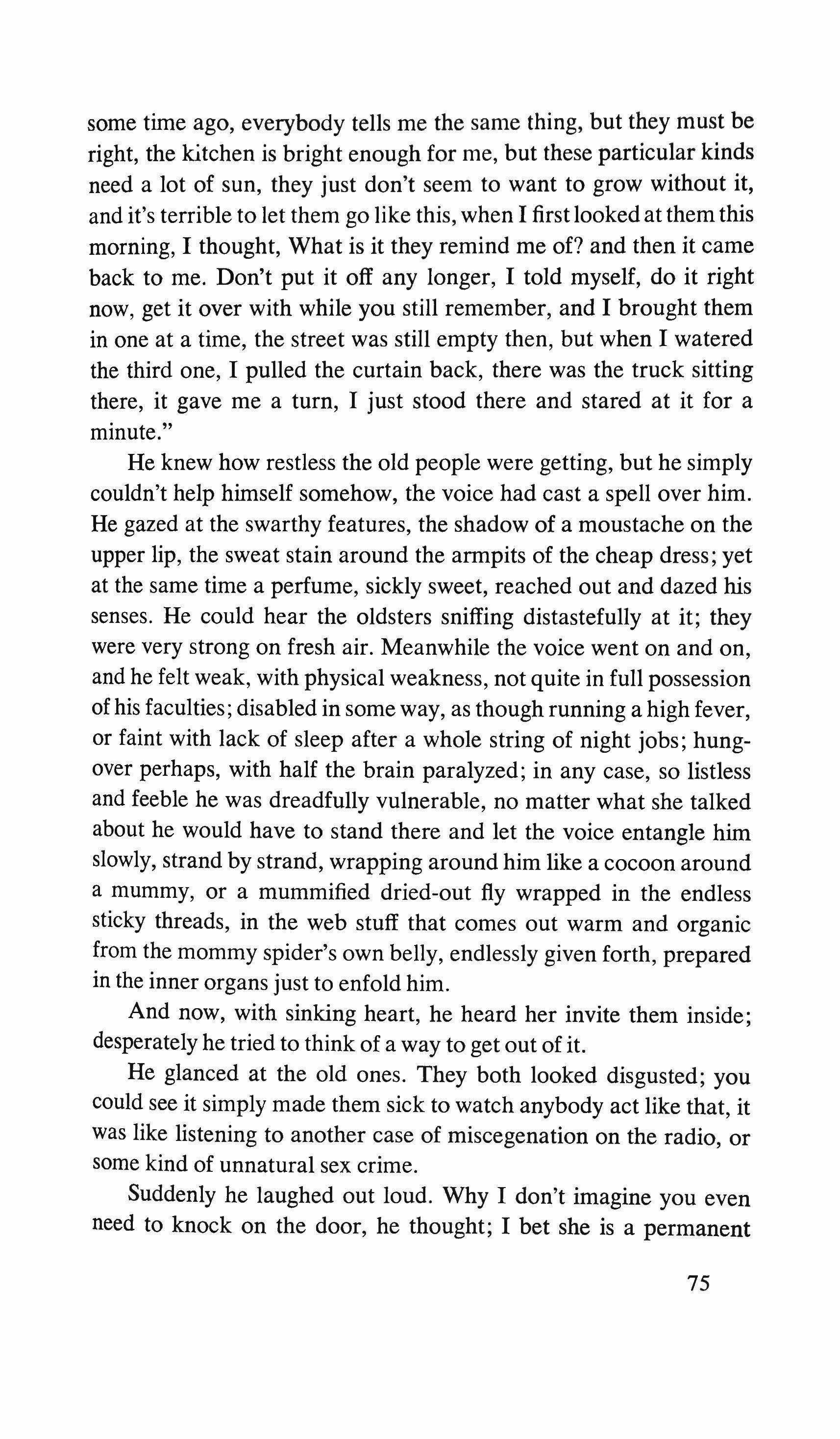
some time ago, everybody tells me the same thing, but they must be right, the kitchen is bright enough for me, but these particular kinds need a lot of sun, they just don't seem to want to grow without it, and it's terrible to let them go like this, when I first looked at them this morning, I thought, What is it they remind me of? and then it came back to me. Don't put it off any longer, I told myself, do it right now, get it over with while you still remember, and I brought them in one at a time, the street was still empty then, but when I watered the third one, I pulled the curtain back, there was the truck sitting there, it gave me a turn, I just stood there and stared at it for a minute."
He knew how restless the old people were getting, but he simply couldn't help himself somehow, the voice had cast a spell over him. He gazed at the swarthy features, the shadow of a moustache on the upper lip, the sweat stain around the armpits of the cheap dress; yet at the same time a perfume, sickly sweet, reached out and dazed his senses. He could hear the oldsters sniffing distastefully at it; they were very strong on fresh air. Meanwhile the voice went on and on, and he felt weak, with physical weakness, not quite in full possession of his faculties; disabled in some way, as though running a high fever, or faint with lack of sleep after a whole string of night jobs; hungover perhaps, with half the brain paralyzed; in any case, so listless and feeble he was dreadfully vulnerable, no matter what she talked about he would have to stand there and let the voice entangle him slowly, strand by strand, wrapping around him like a cocoon around a mummy, or a mummified dried-out fly wrapped in the endless sticky threads, in the web stuff that comes out warm and organic from the mommy spider's own belly, endlessly given forth, prepared in the inner organs just to enfold him.
And now, with sinking heart, he heard her invite them inside; desperately he tried to think of a way to get out of it.
He glanced at the old ones. They both looked disgusted; you could see it simply made them sick to watch anybody act like that, it was like listening to another case of miscegenation on the radio, or some kind of unnatural sex crime.
Suddenly he laughed out loud. Why I don't imagine you even need to knock on the door, he thought; I bet she is a permanent
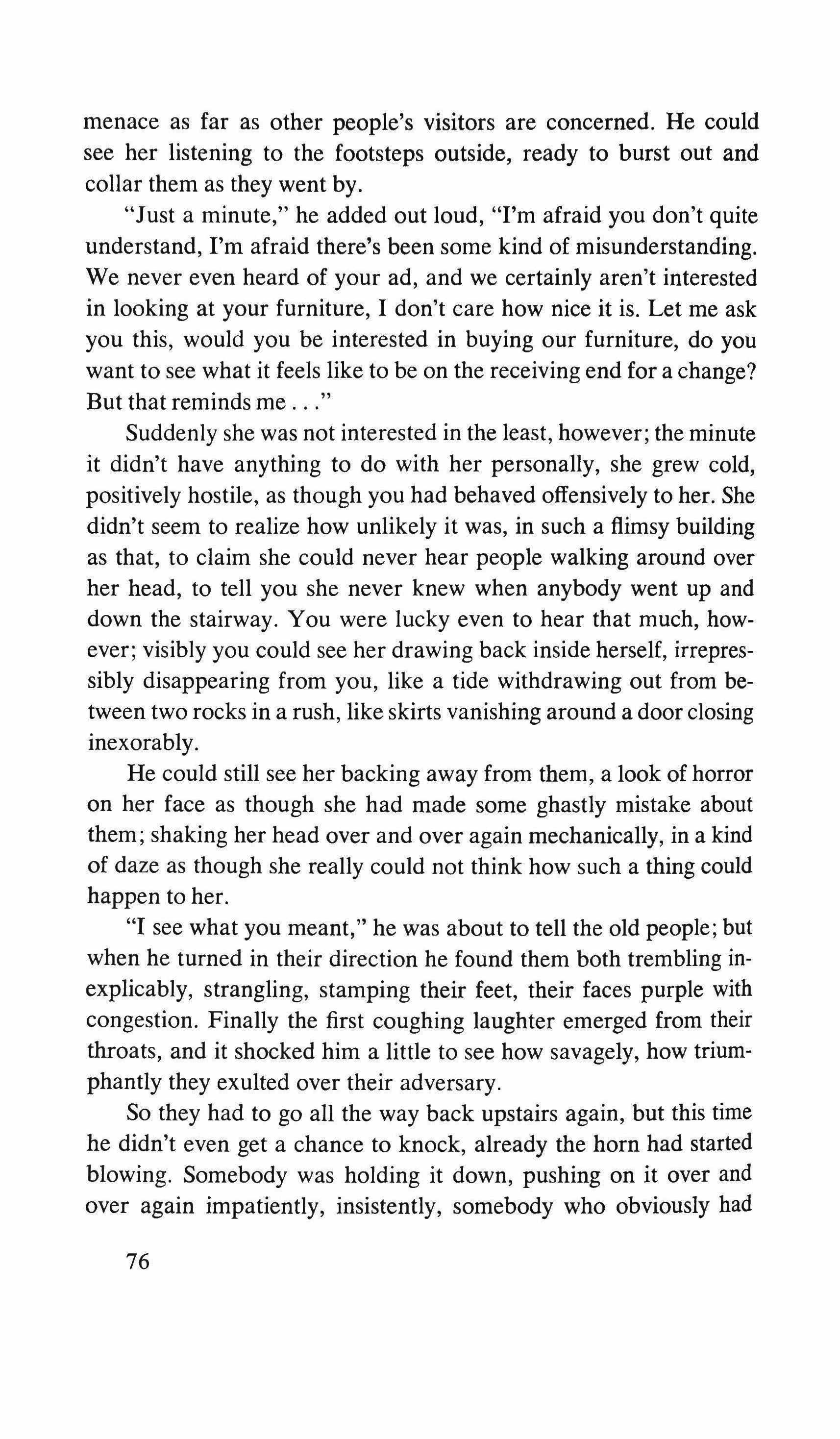
menace as far as other people's visitors are concerned. He could see her listening to the footsteps outside, ready to burst out and collar them as they went by.
"Just a minute," he added out loud, "I'm afraid you don't quite understand, I'm afraid there's been some kind of misunderstanding. We never even heard of your ad, and we certainly aren't interested in looking at your furniture, I don't care how nice it is. Let me ask you this, would you be interested in buying our furniture, do you want to see what it feels like to be on the receiving end for a change? But that reminds me
Suddenly she was not interested in the least, however; the minute it didn't have anything to do with her personally, she grew cold, positively hostile, as though you had behaved offensively to her. She didn't seem to realize how unlikely it was, in such a flimsy building as that, to claim she could never hear people walking around over her head, to tell you she never knew when anybody went up and down the stairway. You were lucky even to hear that much, however; visibly you could see her drawing back inside herself, irrepressibly disappearing from you, like a tide withdrawing out from between two rocks in a rush, like skirts vanishing around a door closing inexorably.
He could still see her backing away from them, a look of horror on her face as though she had made some ghastly mistake about them; shaking her head over and over again mechanically, in a kind of daze as though she really could not think how such a thing could happen to her.
"I see what you meant," he was about to tell the old people; but when he turned in their direction he found them both trembling inexplicably, strangling, stamping their feet, their faces purple with congestion. Finally the first coughing laughter emerged from their throats, and it shocked him a little to see how savagely, how triumphantly they exulted over their adversary.
So they had to go all the way back upstairs again, but this time he didn't even get a chance to knock, already the horn had started blowing. Somebody was holding it down, pushing on it over and over again impatiently, insistently, somebody who obviously had
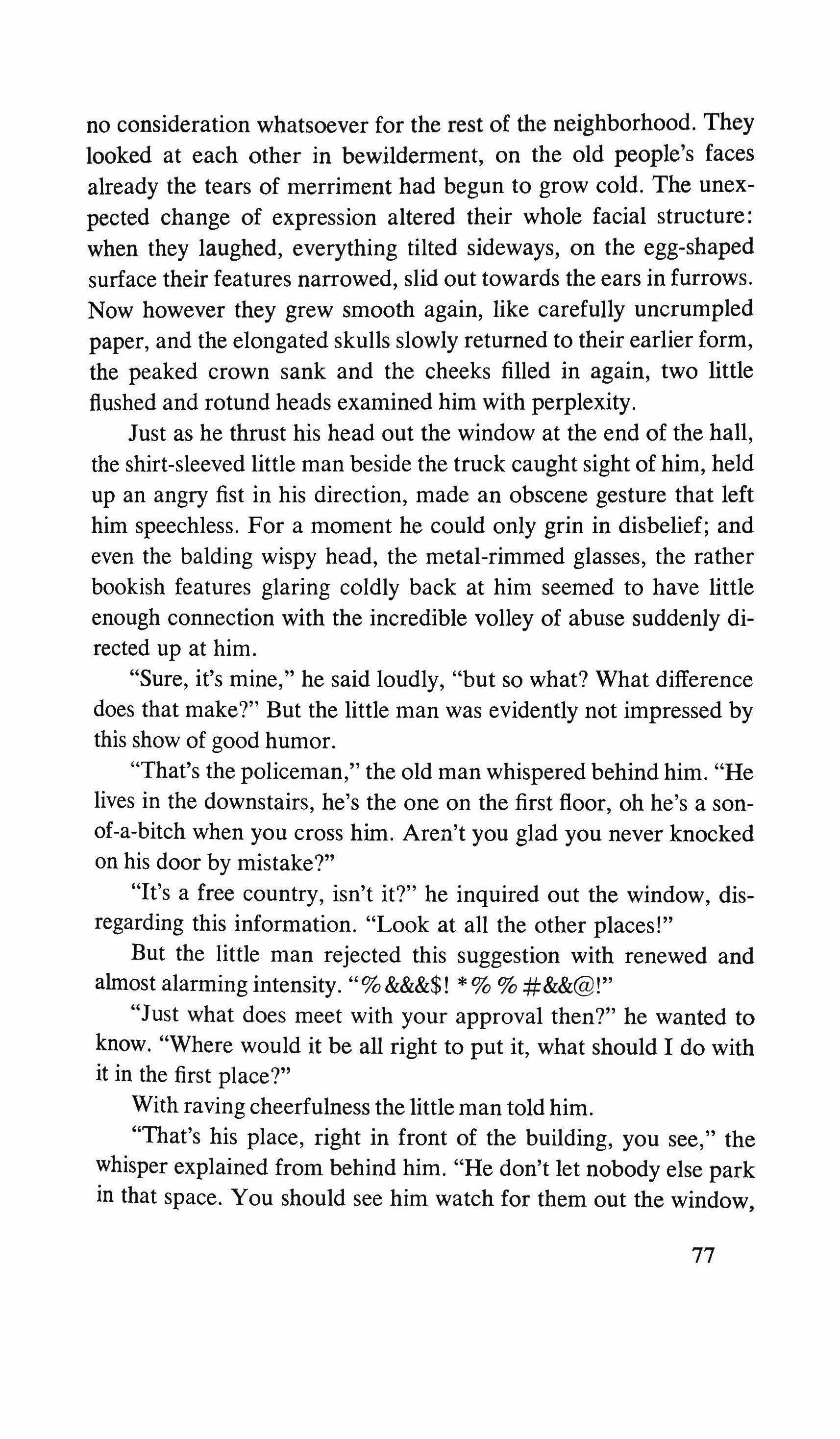
no consideration whatsoever for the rest of the neighborhood. They looked at each other in bewilderment, on the old people's faces already the tears of merriment had begun to grow cold. The unexpected change of expression altered their whole facial structure: when they laughed, everything tilted sideways, on the egg-shaped surface their features narrowed, slid out towards the ears in furrows. Now however they grew smooth again, like carefully uncrumpled paper, and the elongated skulls slowly returned to their earlier form, the peaked crown sank and the cheeks filled in again, two little flushed and rotund heads examined him with perplexity.
Just as he thrust his head out the window at the end of the hall, the shirt-sleeved little man beside the truck caught sight of him, held up an angry fist in his direction, made an obscene gesture that left him speechless. For a moment he could only grin in disbelief; and even the balding wispy head, the metal-rimmed glasses, the rather bookish features glaring coldly back at him seemed to have little enough connection with the incredible volley of abuse suddenly directed up at him.
"Sure, it's mine," he said loudly, "but so what? What difference does that make?" But the little man was evidently not impressed by this show of good humor.
"That's the policeman," the old man whispered behind him. "He lives in the downstairs, he's the one on the first floor, oh he's a sonof-a-bitch when you cross him. Aren't you glad you never knocked on his door by mistake?"
"It's a free country, isn't it?" he inquired out the window, disregarding this information. "Look at all the other places!"
But the little man rejected this suggestion with renewed and almost alarming intensity. "% &&&$! * % % #&&@!"
"Just what does meet with your approval then?" he wanted to know. "Where would it be all right to put it, what should I do with it in the first place?"
With raving cheerfulness the little man told him.
"That's his place, right in front of the building, you see," the whisper explained from behind him. "He don't let nobody else park in that space. You should see him watch for them out the window, 77
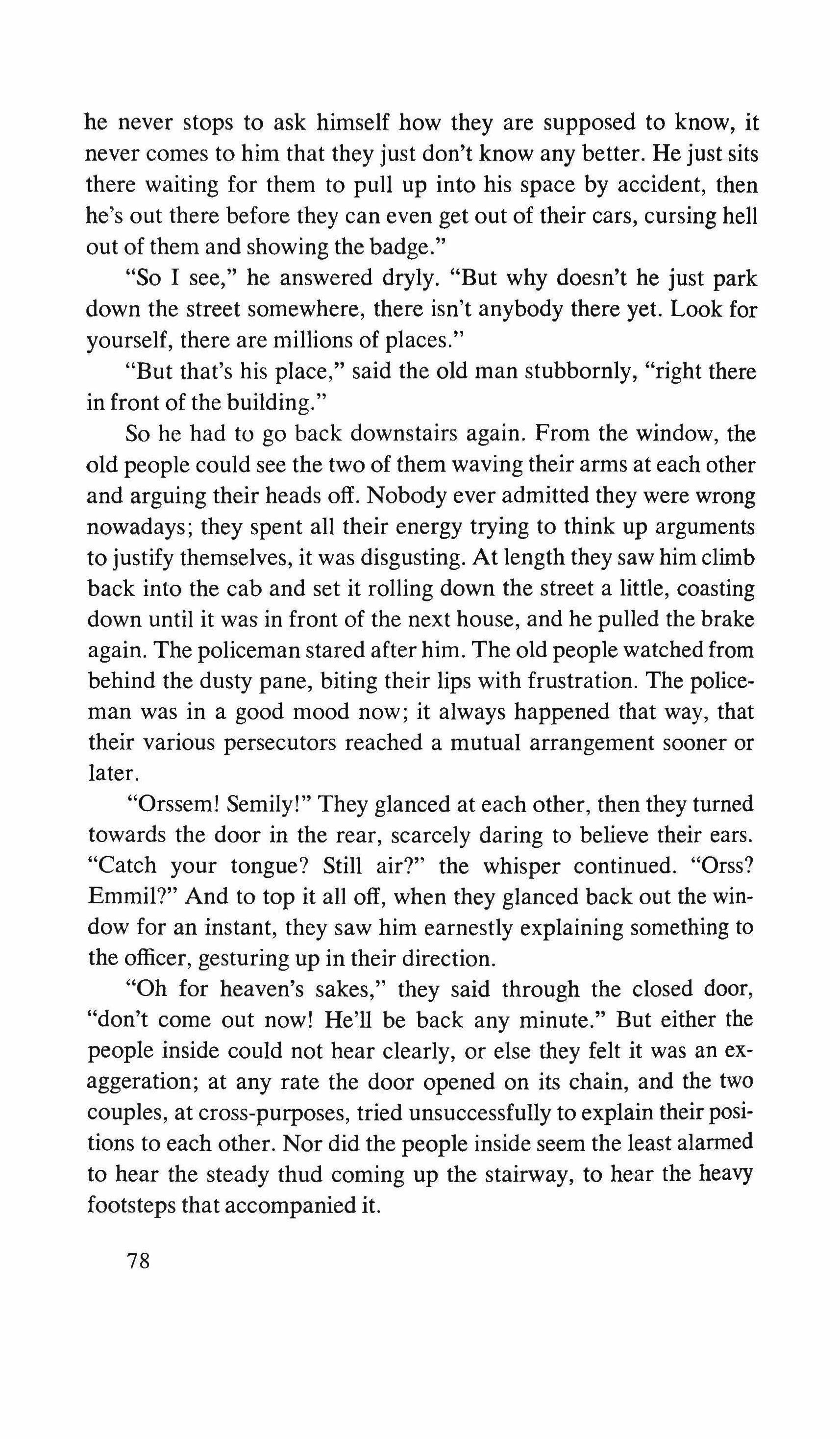
he never stops to ask himself how they are supposed to know, it never comes to him that they just don't know any better. He just sits there waiting for them to pull up into his space by accident, then he's out there before they can even get out of their cars, cursing hell out of them and showing the badge."
"So I see," he answered dryly. "But why doesn't he just park down the street somewhere, there isn't anybody there yet. Look for yourself, there are millions of places."
"But that's his place," said the old man stubbornly, "right there in front of the building."
So he had to go back downstairs again. From the window, the old people could see the two of them waving their arms at each other and arguing their heads off. Nobody ever admitted they were wrong nowadays; they spent all their energy trying to think up arguments to justify themselves, it was disgusting. At length they saw him climb back into the cab and set it rolling down the street a little, coasting down until it was in front of the next house, and he pulled the brake again. The policeman stared after him. The old people watched from behind the dusty pane, biting their lips with frustration. The policeman was in a good mood now; it always happened that way, that their various persecutors reached a mutual arrangement sooner or later.
"Orssem! Semily!" They glanced at each other, then they turned towards the door in the rear, scarcely daring to believe their ears. "Catch your tongue? Still air?" the whisper continued. "Orss? Emmi1?" And to top it all off, when they glanced back out the window for an instant, they saw him earnestly explaining something to the officer, gesturing up in their direction.
"Oh for heaven's sakes," they said through the closed door, "don't come out now! He'll be back any minute." But either the people inside could not hear clearly, or else they felt it was an exaggeration; at any rate the door opened on its chain, and the two couples, at cross-purposes, tried unsuccessfully to explain their positions to each other. Nor did the people inside seem the least alarmed to hear the steady thud coming up the stairway, to hear the heavy footsteps that accompanied it.
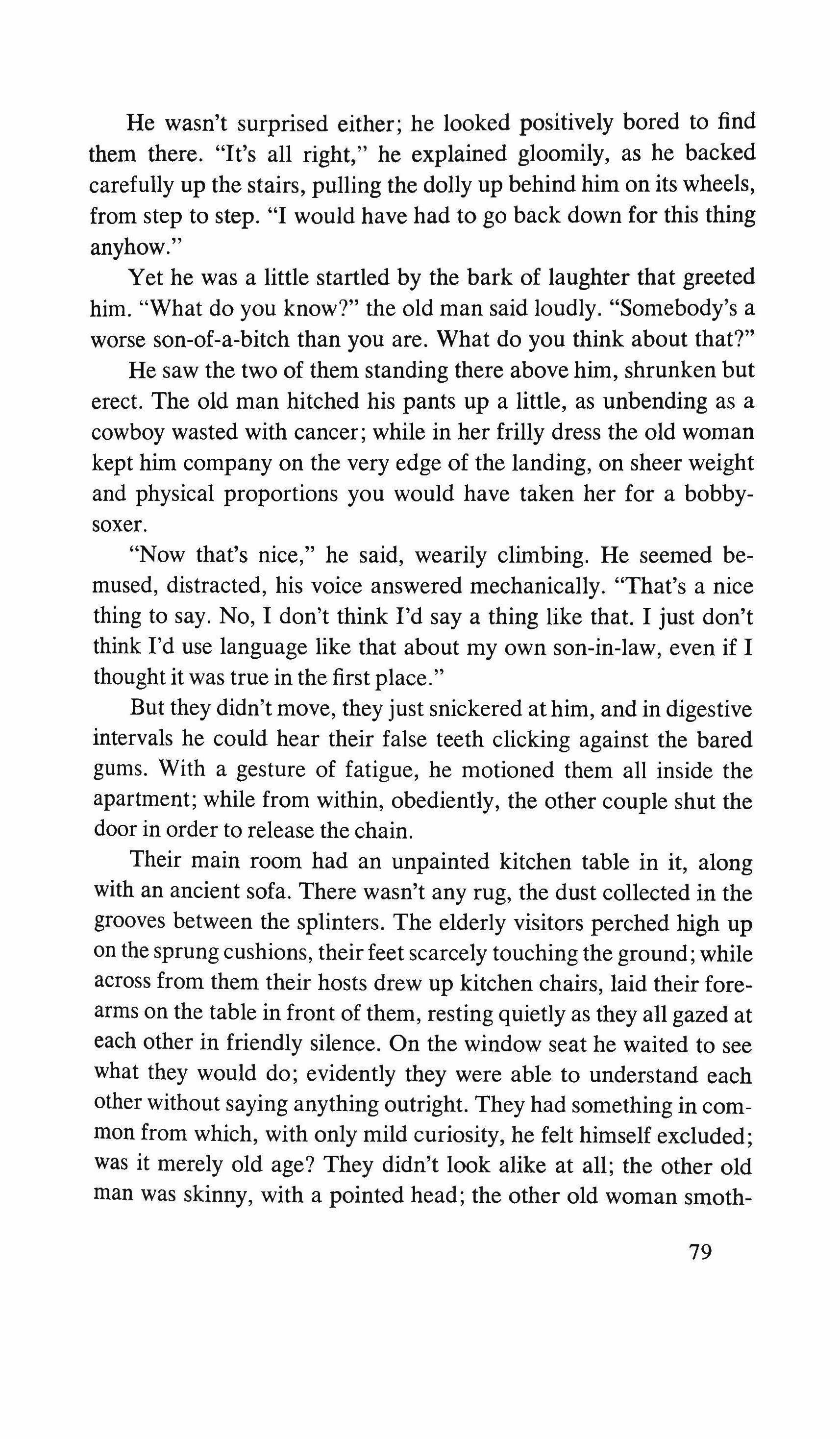
He wasn't surprised either; he looked positively bored to find them there. "It's all right," he explained gloomily, as he backed carefully up the stairs, pulling the dolly up behind him on its wheels, from step to step. "I would have had to go back down for this thing anyhow."
Yet he was a little startled by the bark of laughter that greeted him. "What do you know?" the old man said loudly. "Somebody's a worse son-of-a-bitch than you are. What do you think about that?"
He saw the two of them standing there above him, shrunken but erect. The old man hitched his pants up a little, as unbending as a cowboy wasted with cancer; while in her frilly dress the old woman kept him company on the very edge of the landing, on sheer weight and physical proportions you would have taken her for a bobbysoxer.
"Now that's nice," he said, wearily climbing. He seemed bemused, distracted, his voice answered mechanically. "That's a nice thing to say. No, I don't think I'd say a thing like that. I just don't think I'd use language like that about my own son-in-law, even if I thought it was true in the first place."
But they didn't move, they just snickered at him, and in digestive intervals he could hear their false teeth clicking against the bared gums. With a gesture of fatigue, he motioned them all inside the apartment; while from within, obediently, the other couple shut the door in order to release the chain.
Their main room had an unpainted kitchen table in it, along with an ancient sofa. There wasn't any rug, the dust collected in the grooves between the splinters. The elderly visitors perched high up on the sprung cushions, their feet scarcely touching the ground; while across from them their hosts drew up kitchen chairs, laid their forearms on the table in front of them, resting quietly as they all gazed at each other in friendly silence. On the window seat he waited to see what they would do; evidently they were able to understand each other without saying anything outright. They had something in common from which, with only mild curiosity, he felt himself excluded; was it merely old age? They didn't look alike at all; the other old man was skinny, with a pointed head; the other old woman smoth79
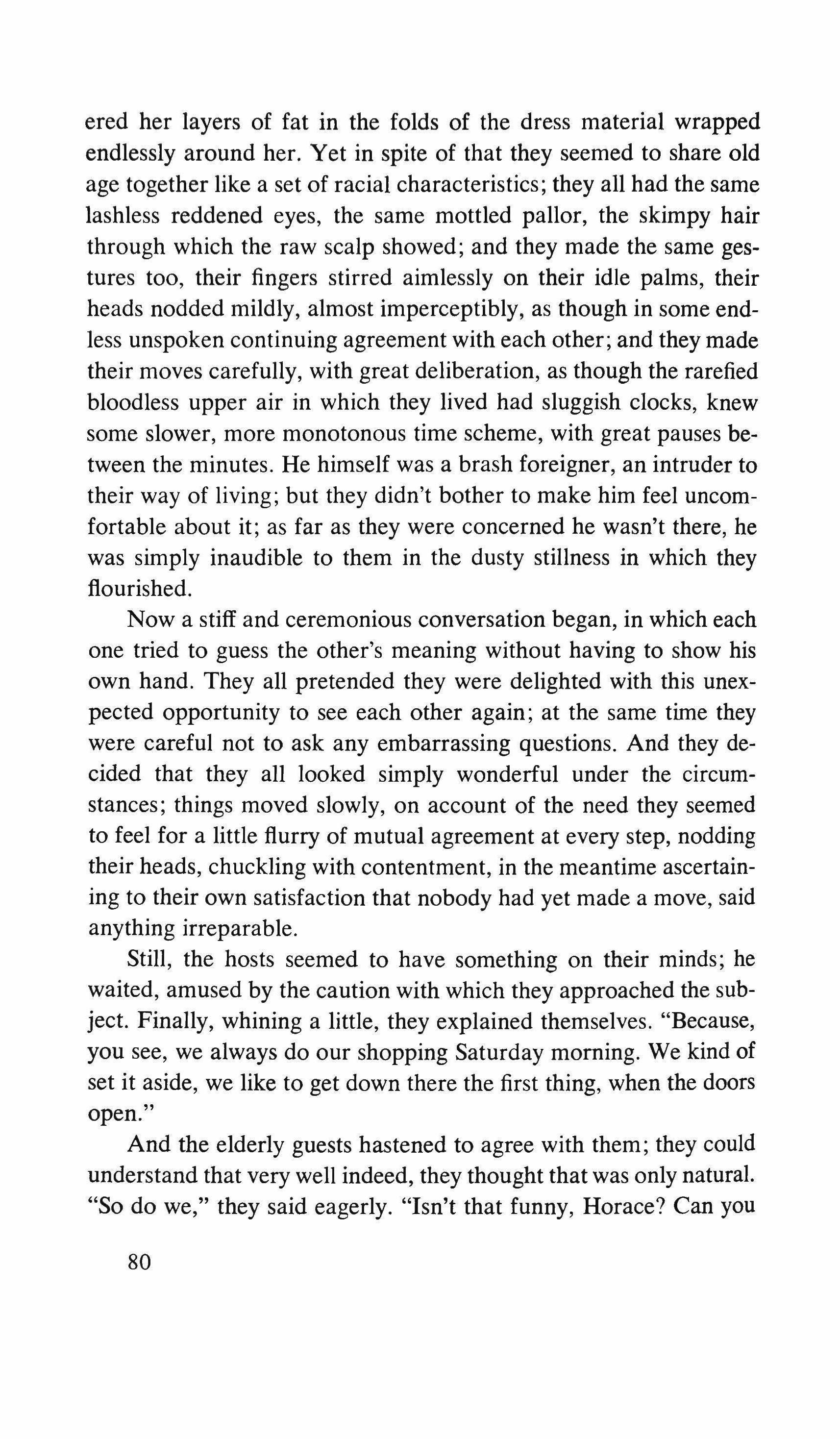
ered her layers of fat in the folds of the dress material wrapped endlessly around her. Yet in spite of that they seemed to share old age together like a set of racial characteristics; they all had the same lashless reddened eyes, the same mottled pallor, the skimpy hair through which the raw scalp showed; and they made the same gestures too, their fingers stirred aimlessly on their idle palms, their heads nodded mildly, almost imperceptibly, as though in some endless unspoken continuing agreement with each other; and they made their moves carefully, with great deliberation, as though the rarefied bloodless upper air in which they lived had sluggish clocks, knew some slower, more monotonous time scheme, with great pauses between the minutes. He himself was a brash foreigner, an intruder to their way of living; but they didn't bother to make him feel uncomfortable about it; as far as they were concerned he wasn't there, he was simply inaudible to them in the dusty stillness in which they flourished.
Now a stiff and ceremonious conversation began, in which each one tried to guess the other's meaning without having to show his own hand. They all pretended they were delighted with this unexpected opportunity to see each other again; at the same time they were careful not to ask any embarrassing questions. And they decided that they all looked simply wonderful under the circumstances; things moved slowly, on account of the need they seemed to feel for a little flurry of mutual agreement at every step, nodding their heads, chuckling with contentment, in the meantime ascertaining to their own satisfaction that nobody had yet made a move, said anything irreparable.
Still, the hosts seemed to have something on their minds; he waited, amused by the caution with which they approached the subject. Finally, whining a little, they explained themselves. "Because, you see, we always do our shopping Saturday morning. We kind of set it aside, we like to get down there the first thing, when the doors open."
And the elderly guests hastened to agree with them; they could understand that very well indeed, they thought that was only natural. "So do we," they said eagerly. "Isn't that funny, Horace? Can you
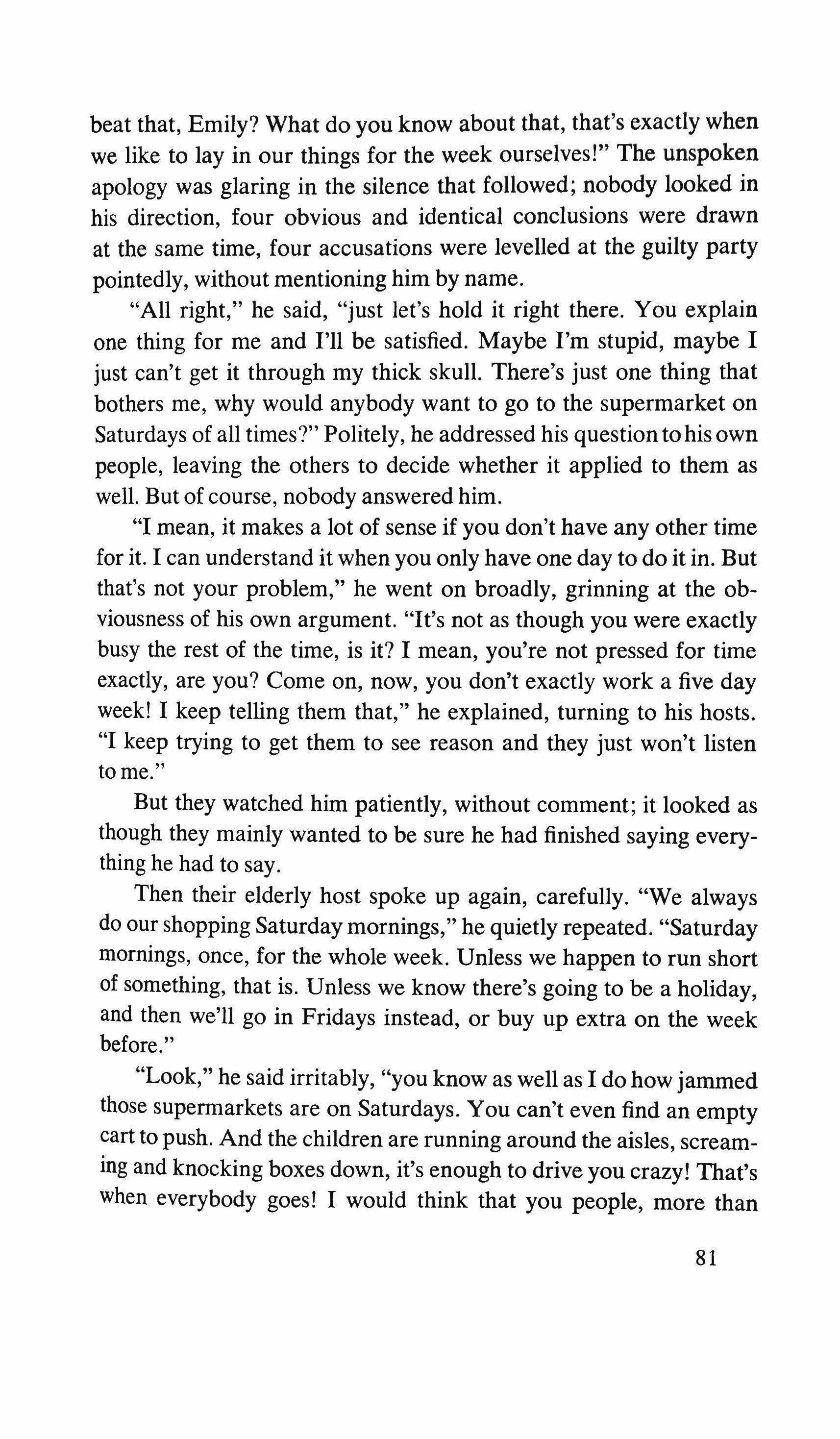
beat that, Emily? What do you know about that, that's exactly when we like to lay in our things for the week ourselves!" The unspoken apology was glaring in the silence that followed; nobody looked in his direction, four obvious and identical conclusions were drawn at the same time, four accusations were levelled at the guilty party pointedly, without mentioning him by name.
"All right," he said, "just let's hold it right there. You explain one thing for me and I'll be satisfied. Maybe I'm stupid, maybe I just can't get it through my thick skull. There's just one thing that bothers me, why would anybody want to go to the supermarket on Saturdays of all times?" Politely, he addressed his question tohisown people, leaving the others to decide whether it applied to them as well. But of course, nobody answered him.
"I mean, it makes a lot of sense if you don't have any other time for it. I can understand it when you only have one day to do it in. But that's not your problem," he went on broadly, grinning at the obviousness of his own argument. "It's not as though you were exactly busy the rest of the time, is it? I mean, you're not pressed for time exactly, are you? Come on, now, you don't exactly work a five day week! I keep telling them that," he explained, turning to his hosts. "I keep trying to get them to see reason and they just won't listen to me."
But they watched him patiently, without comment; it looked as though they mainly wanted to be sure he had finished saying everything he had to say.
Then their elderly host spoke up again, carefully. "We always do our shopping Saturdaymornings," he quietly repeated. "Saturday mornings, once, for the whole week. Unless we happen to run short of something, that is. Unless we know there's going to be a holiday, and then we'll go in Fridays instead, or buy up extra on the week before."
"Look," he said irritably, "you know as well as I do how jammed those supermarkets are on Saturdays. You can't even find an empty cart to push. And the children are running around the aisles, screaming and knocking boxes down, it's enough to drive you crazy! That's When everybody goes! I would think that you people, more than
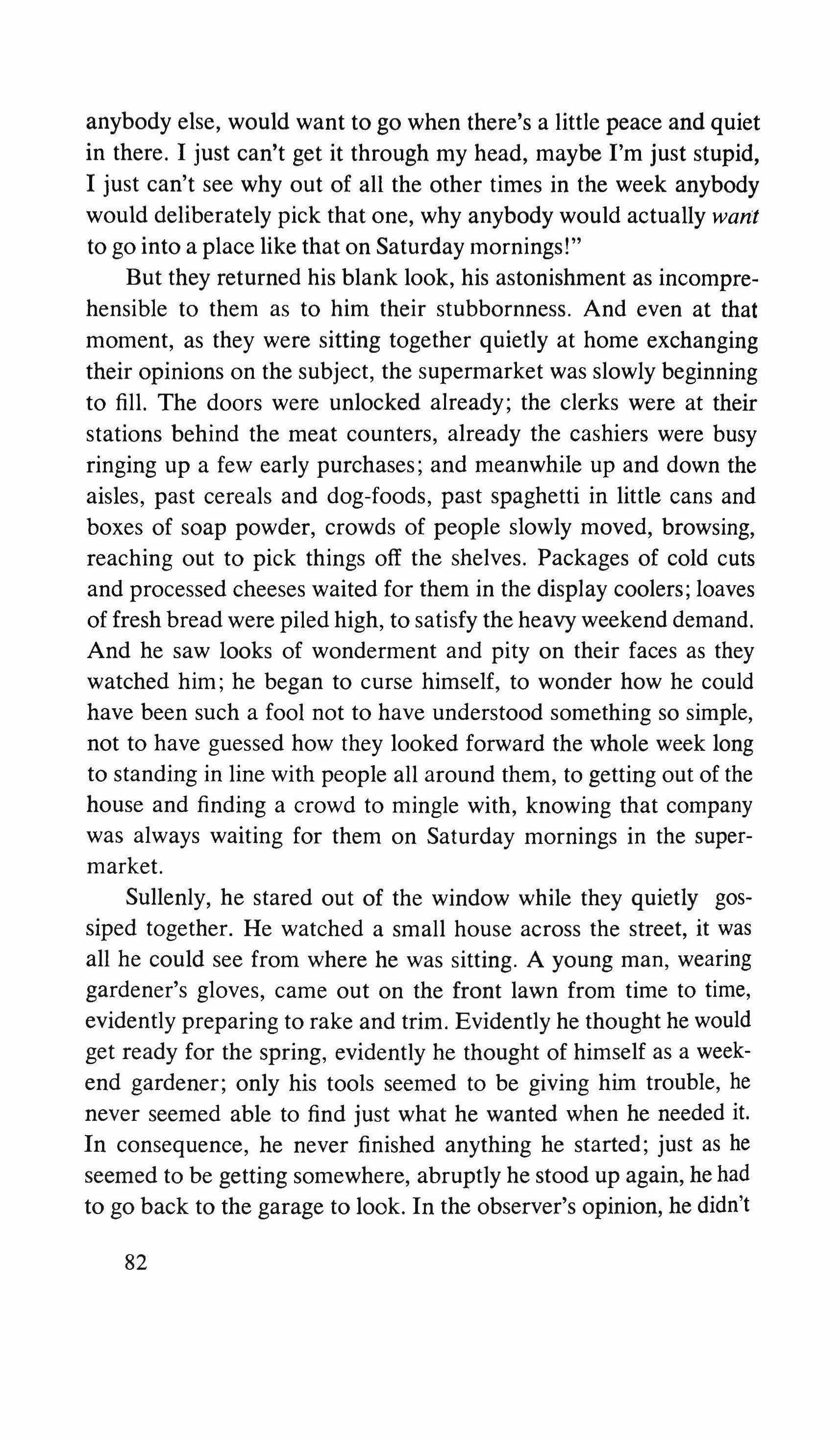
anybody else, would want to go when there's a little peace and quiet in there. I just can't get it through my head, maybe I'm just stupid, I just can't see why out of all the other times in the week anybody would deliberately pick that one, why anybody would actually want to go into a place like that on Saturday mornings!"
But they returned his blank look, his astonishment as incomprehensible to them as to him their stubbornness. And even at that moment, as they were sitting together quietly at home exchanging their opinions on the subject, the supermarket was slowly beginning to fill. The doors were unlocked already; the clerks were at their stations behind the meat counters, already the cashiers were busy ringing up a few early purchases; and meanwhile up and down the aisles, past cereals and dog-foods, past spaghetti in little cans and boxes of soap powder, crowds of people slowly moved, browsing, reaching out to pick things off the shelves. Packages of cold cuts and processed cheeses waited for them in the display coolers; loaves of fresh bread were piled high, to satisfy the heavy weekend demand. And he saw looks of wonderment and pity on their faces as they watched him; he began to curse himself, to wonder how he could have been such a fool not to have understood something so simple, not to have guessed how they looked forward the whole week long to standing in line with people all around them, to getting out of the house and finding a crowd to mingle with, knowing that company was always waiting for them on Saturday mornings in the supermarket.
Sullenly, he stared out of the window while they quietly gossiped together. He watched a small house across the street, it was all he could see from where he was sitting. A young man, wearing gardener's gloves, came out on the front lawn from time to time, evidently preparing to rake and trim. Evidently he thought he would get ready for the spring, evidently he thought of himself as a weekend gardener; only his tools seemed to be giving him trouble, he never seemed able to find just what he wanted when he needed it. In consequence, he never finished anything he started; just as he seemed to be getting somewhere, abruptly he stood up again, he had to go back to the garage to look. In the observer's opinion, he didn't
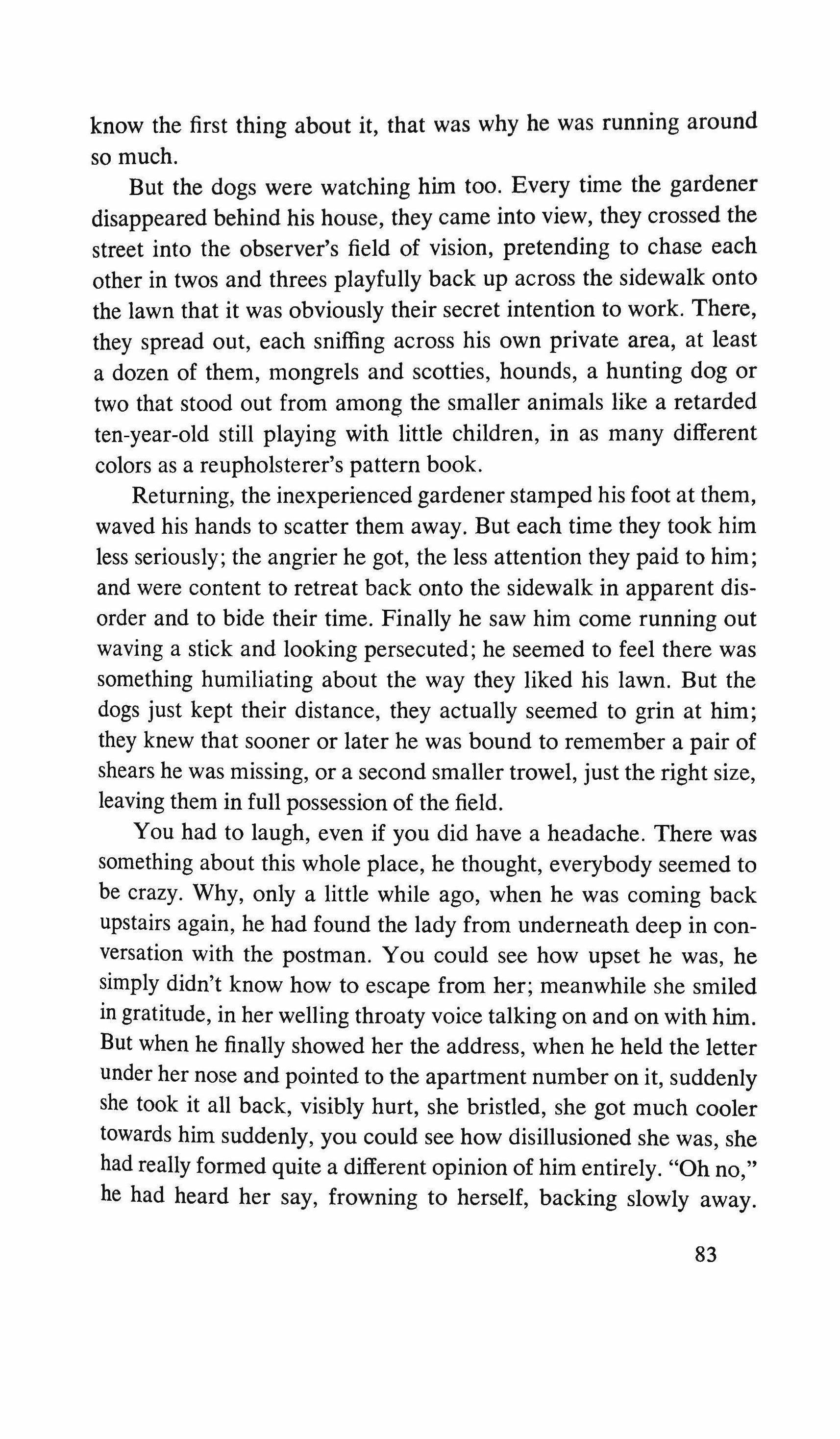
know the first thing about it, that was why he was running around so much.
But the dogs were watching him too. Every time the gardener disappeared behind his house, they came into view, they crossed the street into the observer's field of vision, pretending to chase each other in twos and threes playfully back up across the sidewalk onto the lawn that it was obviously their secret intention to work. There, they spread out, each sniffing across his own private area, at least a dozen of them, mongrels and scotties, hounds, a hunting dog or two that stood out from among the smaller animals like a retarded ten-year-old still playing with little children, in as many different colors as a reupholsterer's pattern book.
Returning, the inexperienced gardener stamped his foot at them, waved his hands to scatter them away. But each time they took him less seriously; the angrier he got, the less attention they paid to him; and were content to retreat back onto the sidewalk in apparent disorder and to bide their time. Finally he saw him come running out waving a stick and looking persecuted; he seemed to feel there was something humiliating about the way they liked his lawn. But the dogs just kept their distance, they actually seemed to grin at him; they knew that sooner or later he was bound to remember a pair of shears he was missing, or a second smaller trowel, just the right size, leaving them in full possession of the field.
You had to laugh, even if you did have a headache. There was something about this whole place, he thought, everybody seemed to be crazy. Why, only a little while ago, when he was coming back upstairs again, he had found the lady from underneath deep in conversation with the postman. You could see how upset he was, he simply didn't know how to escape from her; meanwhile she smiled in gratitude, in her welling throaty voice talking on and on with him. But when he finally showed her the address, when he held the letter under her nose and pointed to the apartment number on it, suddenly she took it all back, visibly hurt, she bristled, she got much cooler towards him suddenly, you could see how disillusioned she was, she had really formed quite a different opinion of him entirely. "Oh no," he had heard her say, frowning to herself, backing slowly away.
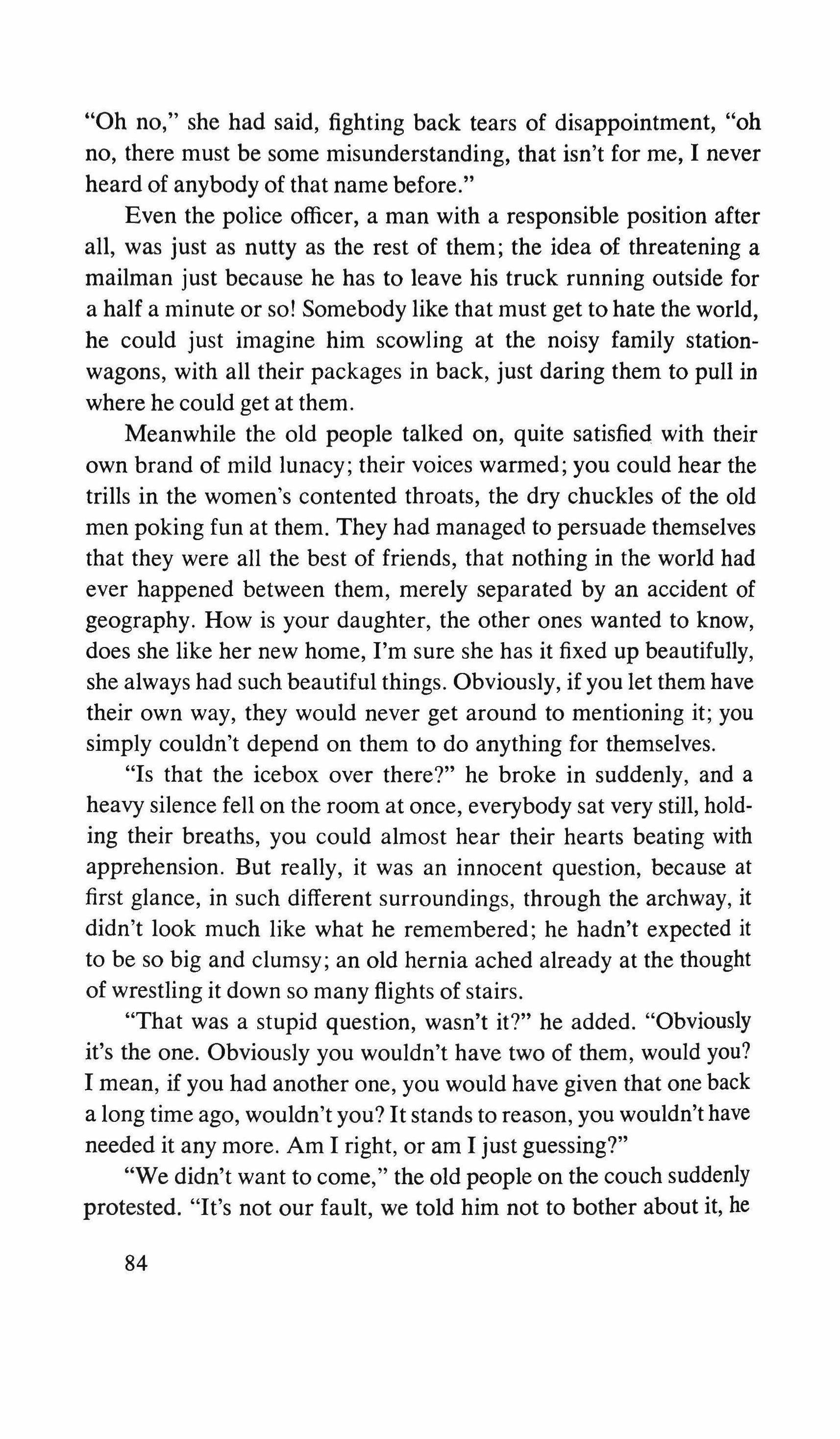
"Oh no," she had said, fighting back tears of disappointment, "oh no, there must be some misunderstanding, that isn't for me, I never heard of anybody of that name before."
Even the police officer, a man with a responsible position after all, was just as nutty as the rest of them; the idea of threatening a mailman just because he has to leave his truck running outside for a half a minute or so! Somebody like that must get to hate the world, he could just imagine him scowling at the noisy family stationwagons, with all their packages in back, just daring them to pull in where he could get at them.
Meanwhile the old people talked on, quite satisfied with their own brand of mild lunacy; their voices warmed; you could hear the trills in the women's contented throats, the dry chuckles of the old men poking fun at them. They had managed to persuade themselves that they were all the best of friends, that nothing in the world had ever happened between them, merely separated by an accident of geography. How is your daughter, the other ones wanted to know, does she like her new home, I'm sure she has it fixed up beautifully, she always had such beautiful things. Obviously, if you let them have their own way, they would never get around to mentioning it; you simply couldn't depend on them to do anything for themselves.
"Is that the icebox over there?" he broke in suddenly, and a heavy silence fell on the room at once, everybody sat very still, holding their breaths, you could almost hear their hearts beating with apprehension. But really, it was an innocent question, because at first glance, in such different surroundings, through the archway, it didn't look much like what he remembered; he hadn't expected it to be so big and clumsy; an old hernia ached already at the thought of wrestling it down so many flights of stairs.
"That was a stupid question, wasn't it?" he added. "Obviously it's the one. Obviously you wouldn't have two of them, would you? I mean, if you had another one, you would have given that one back a long time ago, wouldn't you? It stands to reason, you wouldn't have needed it any more. Am I right, or am I just guessing?"
"We didn't want to come," the old people on the couch suddenly protested. "It's not our fault, we told him not to bother about it, he
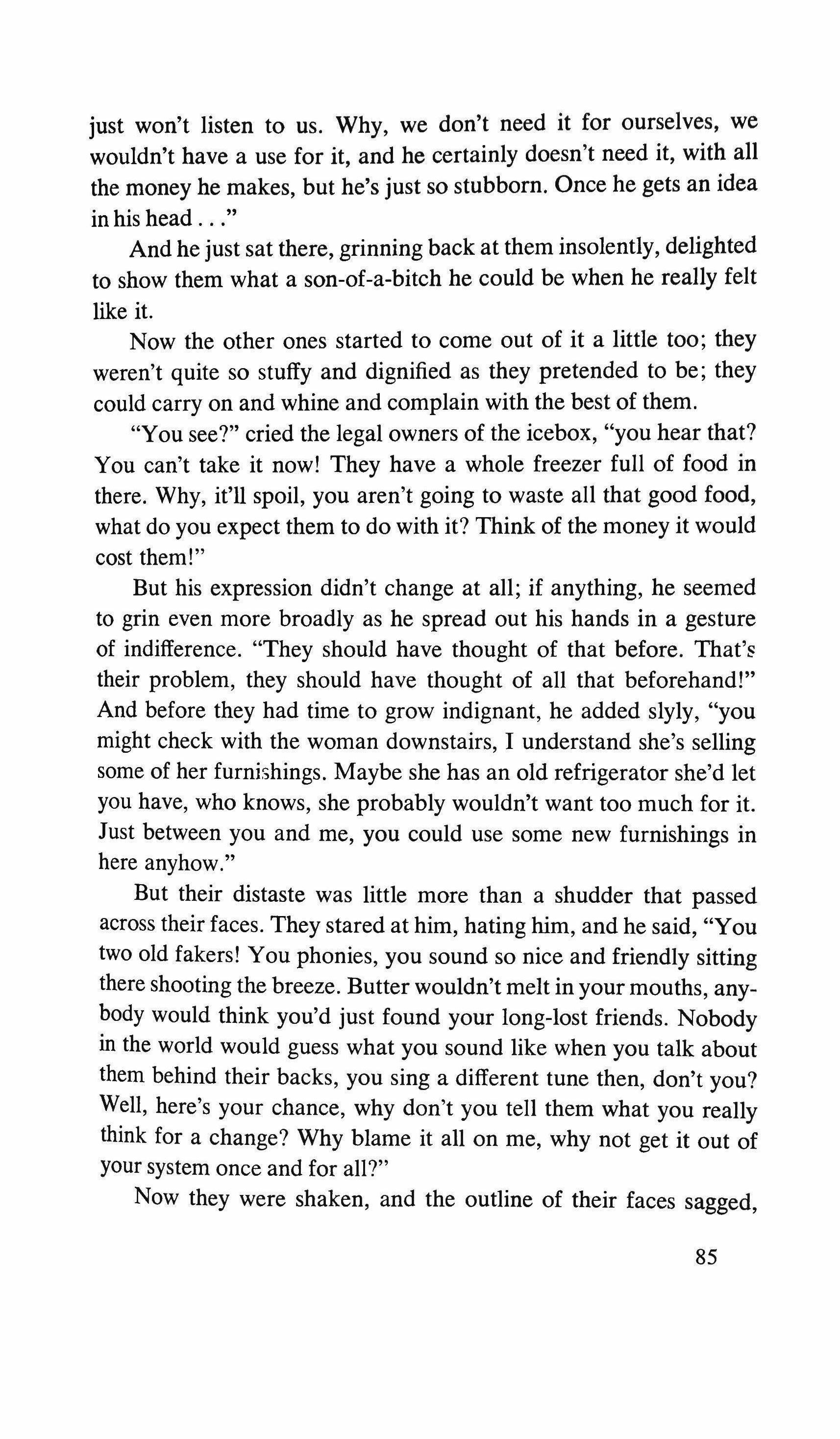
just won't listen to us. Why, we don't need it for ourselves, we wouldn't have a use for it, and he certainly doesn't need it, with all the money he makes, but he's just so stubborn. Once he gets an idea in his head ."
And he just sat there, grinning back at them insolently, delighted to show them what a son-of-a-bitch he could be when he really felt like it.
Now the other ones started to come out of it a little too; they weren't quite so stuffy and dignified as they pretended to be; they could carryon and whine and complain with the best of them.
"You see?" cried the legal owners of the icebox, "you hear that? You can't take it now! They have a whole freezer full of food in there. Why, it'll spoil, you aren't going to waste all that good food, what do you expect them to do with it? Think of the money it would cost them!"
But his expression didn't change at all; if anything, he seemed to grin even more broadly as he spread out his hands in a gesture of indifference. "They should have thought of that before. That's their problem, they should have thought of all that beforehand!" And before they had time to grow indignant, he added slyly, "you might check with the woman downstairs, I understand she's selling some of her furnishings. Maybe she has an old refrigerator she'd let you have, who knows, she probably wouldn't want too much for it. Just between you and me, you could use some new furnishings in here anyhow."
But their distaste was little more than a shudder that passed across their faces. They stared at him, hating him, and he said, "You two old fakers! You phonies, you sound so nice and friendly sitting there shooting the breeze. Butter wouldn't melt in your mouths, anybody would think you'd just found your long-lost friends. Nobody in the world would guess what you sound like when you talk about them behind their backs, you sing a different tune then, don't you? Well, here's your chance, why don't you tell them what you really think for a change? Why blame it all on me, why not get it out of your system once and for all?"
Now they were shaken, and the outline of their faces sagged, 85
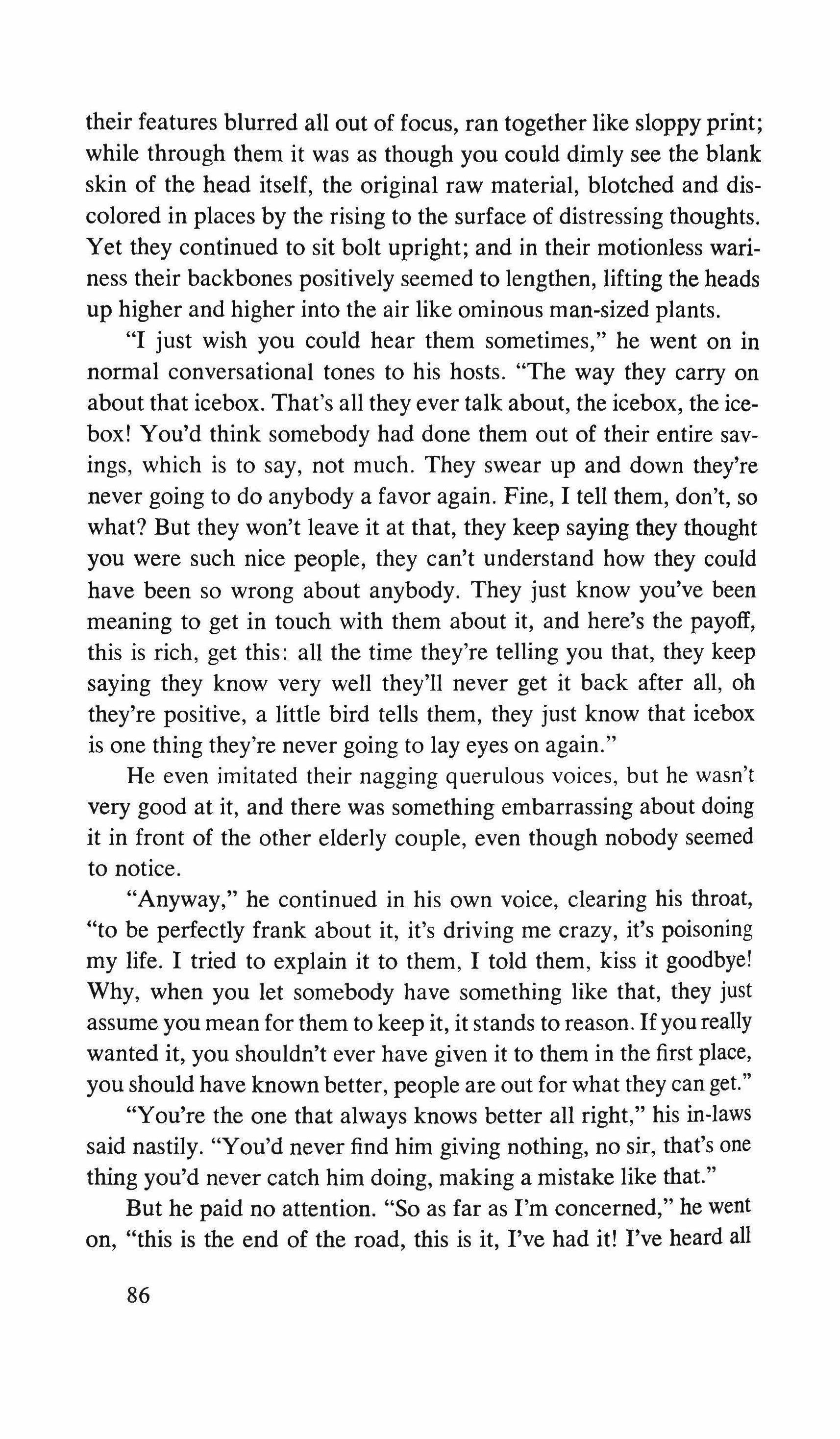
their features blurred all out of focus, ran together like sloppy print; while through them it was as though you could dimly see the blank skin of the head itself, the original raw material, blotched and discolored in places by the rising to the surface of distressing thoughts. Yet they continued to sit bolt upright; and in their motionless wariness their backbones positively seemed to lengthen, lifting the heads up higher and higher into the air like ominous man-sized plants.
"I just wish you could hear them sometimes," he went on in normal conversational tones to his hosts. "The way they carry on about that icebox. That's all they ever talk about, the icebox, the icebox! You'd think somebody had done them out of their entire savings, which is to say, not much. They swear up and down they're never going to do anybody a favor again. Fine, I tell them, don't, so what? But they won't leave it at that, they keep saying they thought you were such nice people, they can't understand how they could have been so wrong about anybody. They just know you've been meaning to get in touch with them about it, and here's the payoff, this is rich, get this: all the time they're telling you that, they keep saying they know very well they'll never get it back after all, oh they're positive, a little bird tells them, they just know that icebox is one thing they're never going to lay eyes on again."
He even imitated their nagging querulous voices, but he wasn't very good at it, and there was something embarrassing about doing it in front of the other elderly couple, even though nobody seemed to notice.
"Anyway," he continued in his own voice, clearing his throat, "to be perfectly frank about it, it's driving me crazy, it's poisoning my life. I tried to explain it to them, I told them, kiss it goodbye! Why, when you let somebody have something like that, they just assume you mean for them to keep it, it stands to reason. Ifyou really wanted it, you shouldn't ever have given it to them in the first place, you should have known better, people are out for what they can get."
"You're the one that always knows better all right," his in-laws said nastily. "You'd never find him giving nothing, no sir, that's one thing you'd never catch him doing, making a mistake like that."
But he paid no attention. "So as far as I'm concerned," he went on, "this is the end of the road, this is it, I've had it! I've heard all
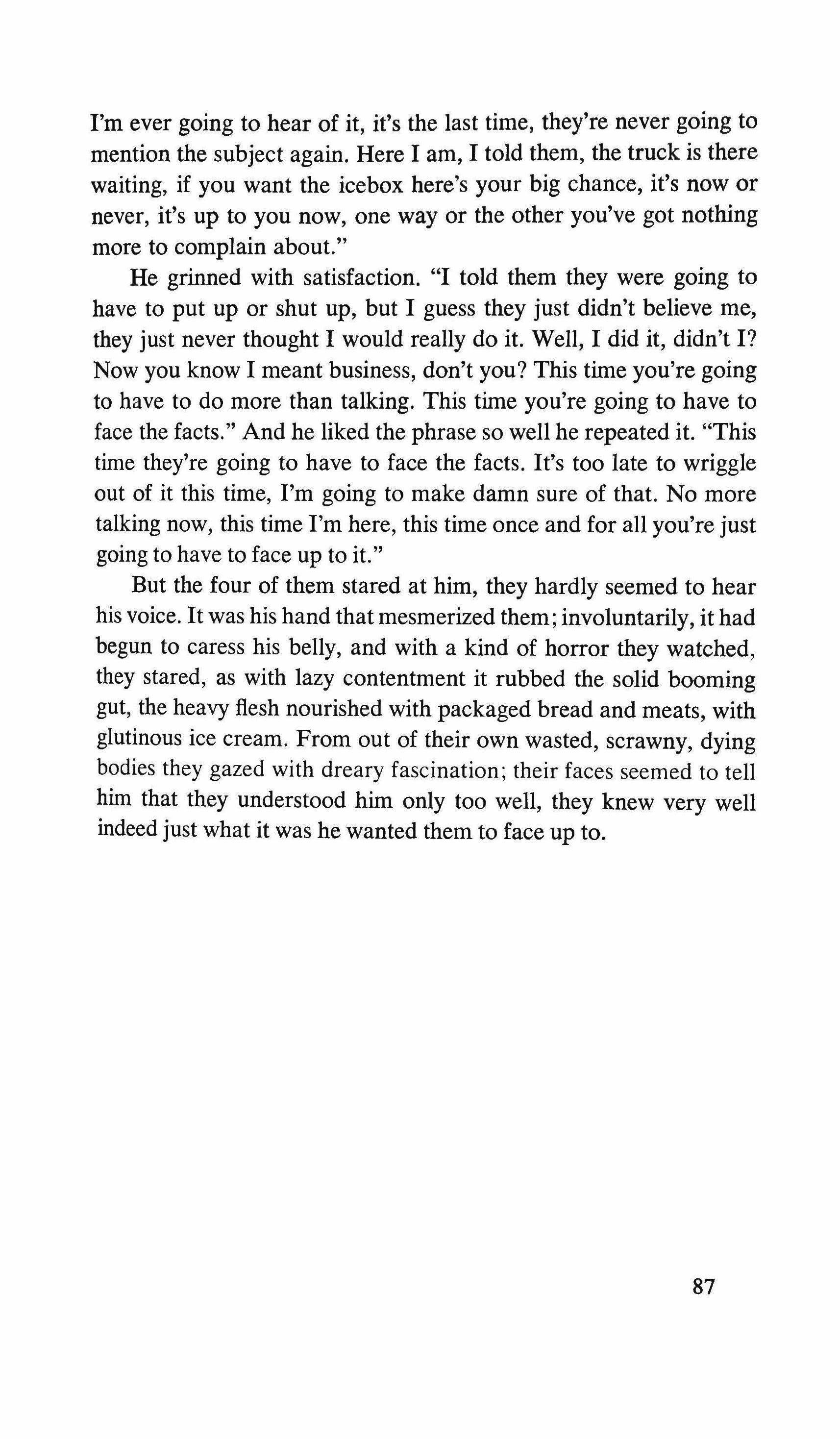
I'm ever going to hear of it, it's the last time, they're never going to mention the subject again. Here I am, I told them, the truck is there waiting, if you want the icebox here's your big chance, it's now or never, it's up to you now, one way or the other you've got nothing more to complain about."
He grinned with satisfaction. "I told them they were going to have to put up or shut up, but I guess they just didn't believe me, they just never thought I would really do it. Well, I did it, didn't I?
Now you know I meant business, don't you? This time you're going to have to do more than talking. This time you're going to have to face the facts." And he liked the phrase so well he repeated it. "This time they're going to have to face the facts. It's too late to wriggle out of it this time, I'm going to make damn sure of that. No more talking now, this time I'm here, this time once and for all you're just going to have to face up to it."
But the four of them stared at him, they hardly seemed to hear his voice. It was his hand that mesmerized them; involuntarily, it had begun to caress his belly, and with a kind of horror they watched, they stared, as with lazy contentment it rubbed the solid booming gut, the heavy flesh nourished with packaged bread and meats, with glutinous ice cream. From out of their own wasted, scrawny, dying bodies they gazed with dreary fascination; their faces seemed to tell him that they understood him only too well, they knew very well indeed just what it was he wanted them to face up to.
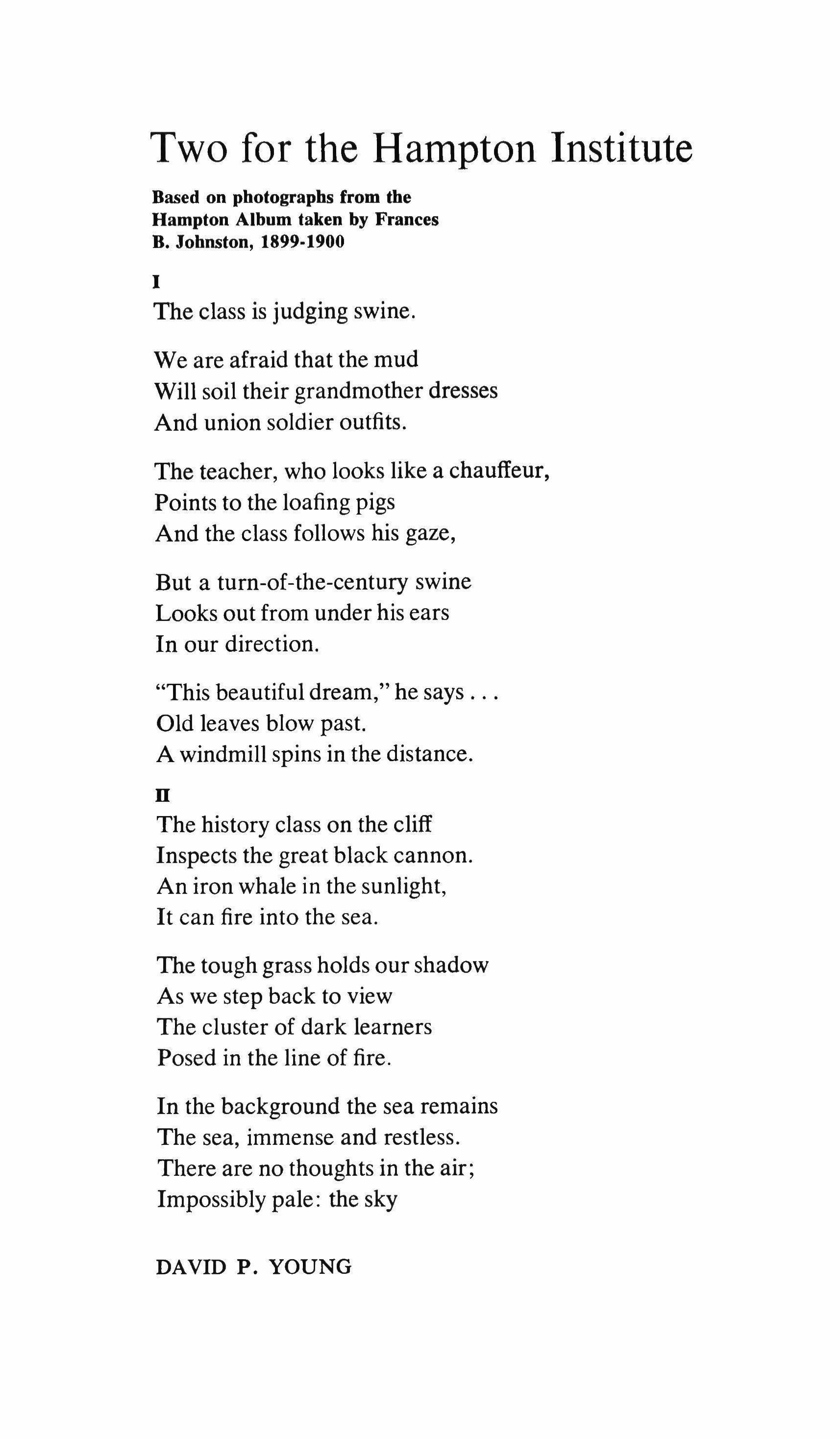
Based on photographs from the Hampton Album taken by Frances B. Johnston, 1899·1900
IThe class is judging swine.
We are afraid that the mud Will soil their grandmother dresses And union soldier outfits.
The teacher, who looks like a chauffeur, Points to the loafing pigs And the class follows his gaze,
But a turn-of-the-century swine
Looks out from under his ears
In our direction.
"This beautiful dream," he says Old leaves blow past. A windmill spins in the distance.
n
The history class on the cliff Inspects the great black cannon. An iron whale in the sunlight, It can fire into the sea.
The tough grass holds our shadow
As we step back to view
The cluster of dark learners
Posed in the line of fire.
In the background the sea remains The sea, immense and restless. There are no thoughts in the air; Impossibly pale: the sky
DAVID P. YOUNG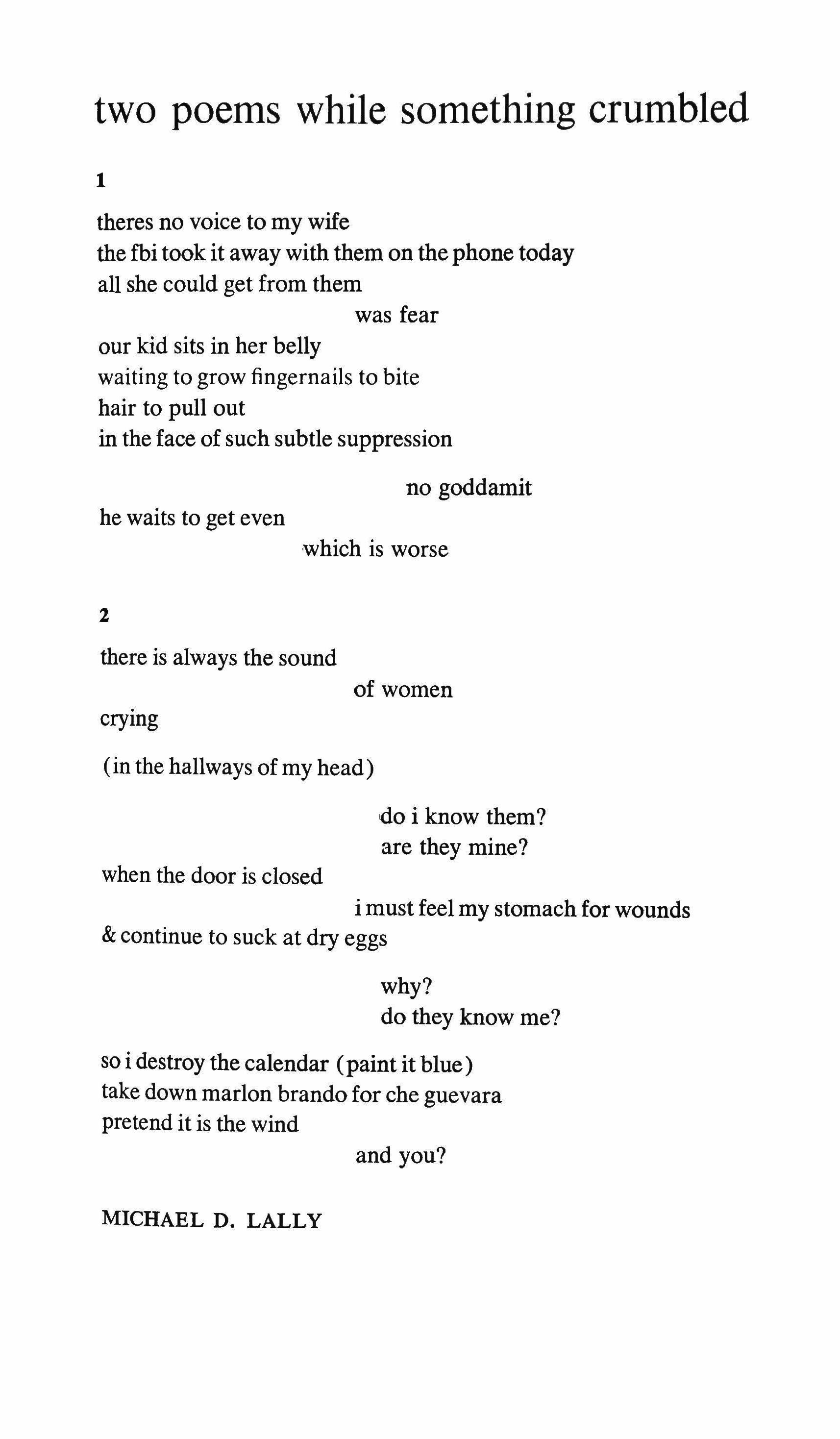
1 theres no voice to my wife the fbi took it away with them on thephone today all she could get from them was fear our kid sits in her belly waiting to grow fingernails to bite hair to pull out in the face of such subtle suppression no goddamit he waits to get even which is worse
2 there is always the sound of women crying (in the hallways of my head) do i know them? are they mine? when the door is closed i must feel my stomach for wounds & continue to suck at dry eggs
why? do they know me? so i destroy the calendar (paint it blue) take down marIon brando for che guevara pretend it is the wind and you?
MICHAEL D. LALLY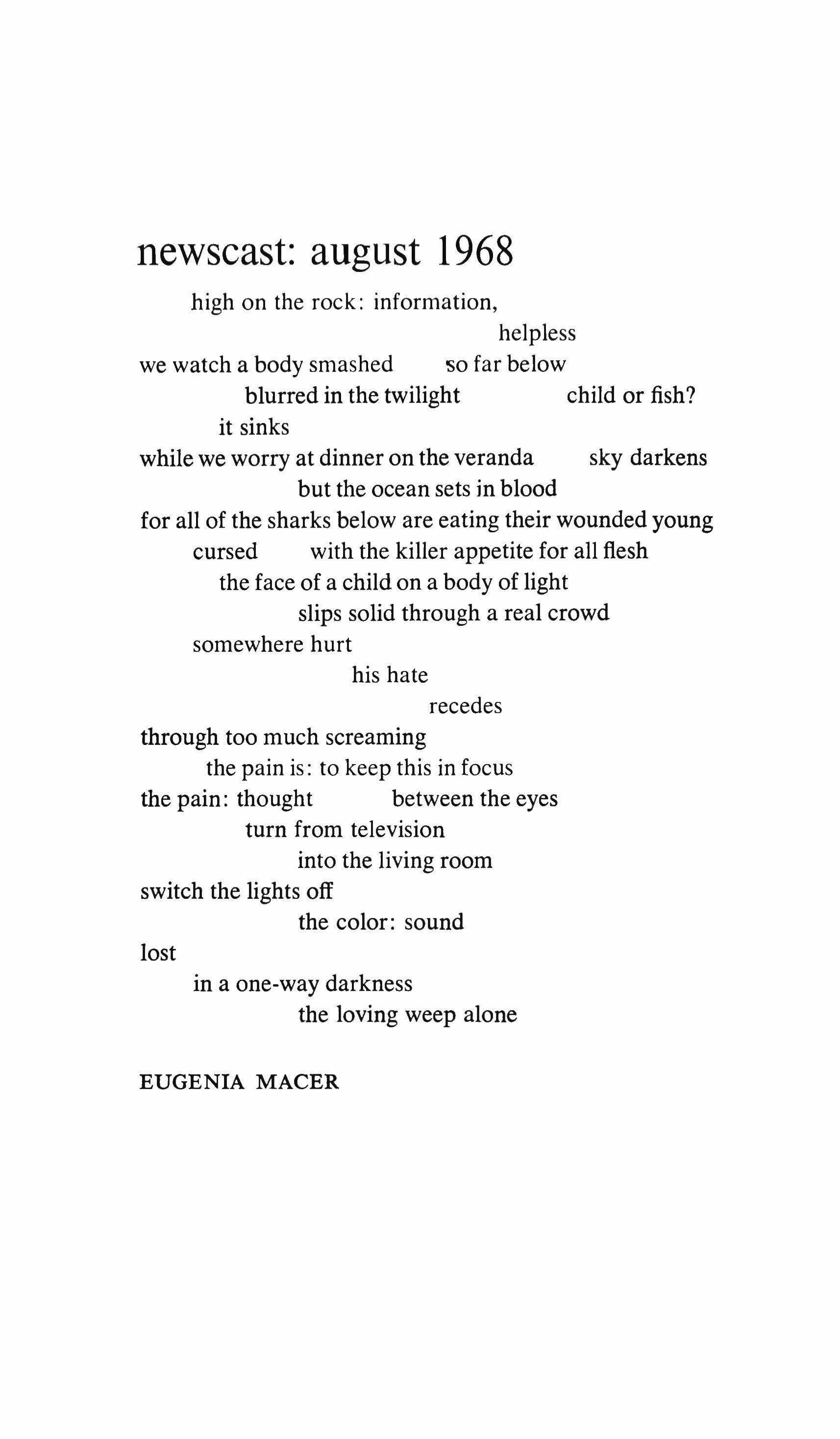
high on the rock: information, helpless we watch a body smashed 'So far below blurred in the twilight child or fish? it sinks while we worry at dinner on the veranda sky darkens but the ocean sets in blood for all of the sharks below are eating their wounded young cursed with the killer appetite for all flesh the face of a child on a body of light slips solid through a real crowd somewhere hurt his hate recedes through too much screaming the pain is: to keep this in focus the pain: thought between the eyes turn from television into the living room switch the lights off the color: sound lost in a one-way darkness the loving weep alone
EUGENIA MACER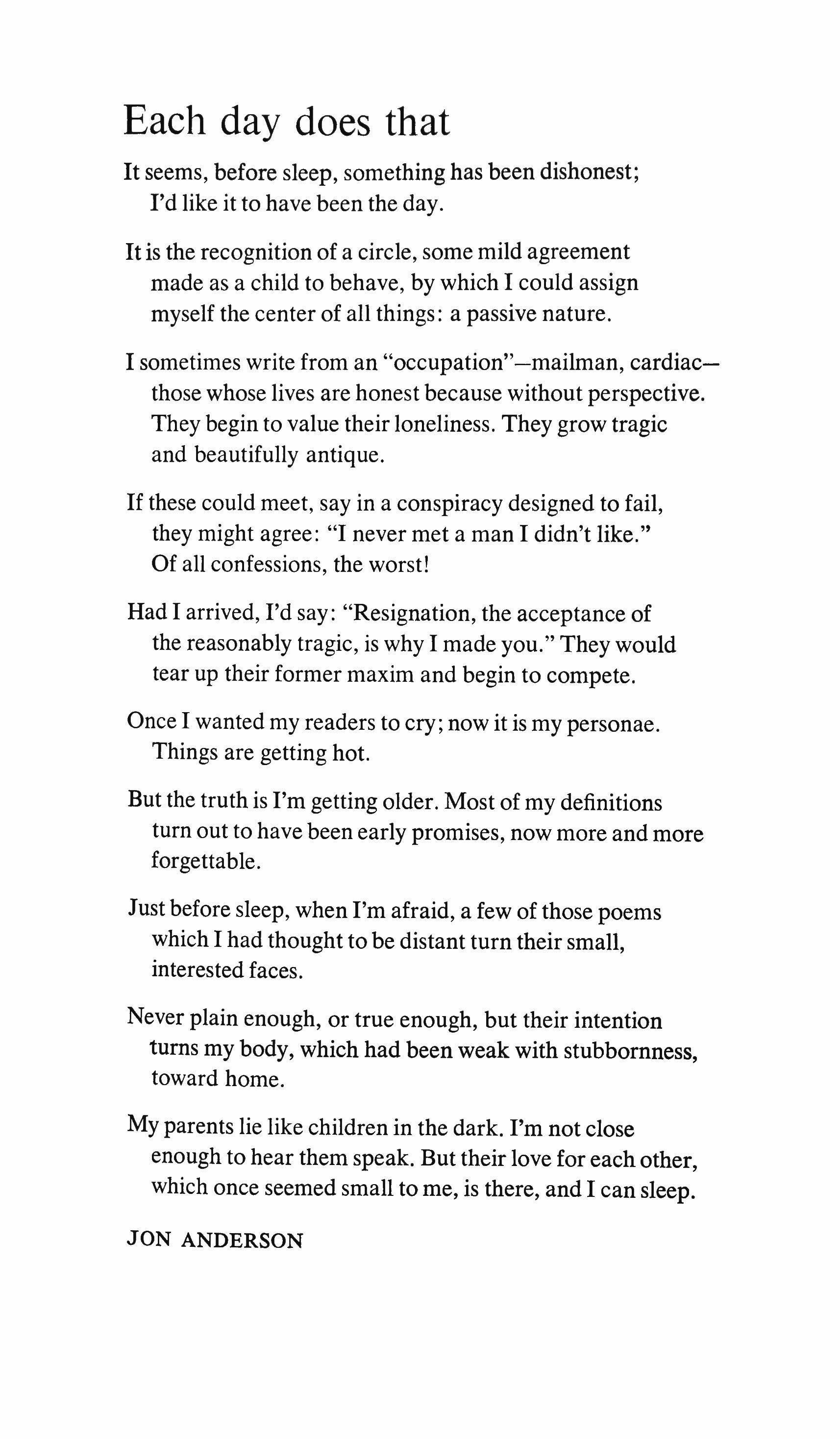
It seems, before sleep, something has been dishonest; I'd like it to have been the day.
It is the recognition of a circle, some mild agreement made as a child to behave, by which I could assign myself the center of all things: a passive nature.
I sometimes write from an "occupation"-mailman, cardiacthose whose lives are honest because without perspective. They begin to value their loneliness. They grow tragic and beautifully antique.
If these could meet, say in a conspiracy designed to fail, they might agree: "I never met a man I didn't like." Of all confessions, the worst!
Had I arrived, I'd say: "Resignation, the acceptance of the reasonably tragic, is why I made you." They would tear up their former maxim and begin to compete.
Once I wanted my readers to cry; now it is my personae. Things are getting hot.
But the truth is I'm getting older. Most of my definitions turn out to have been early promises, now more and more forgettable.
Just before sleep, when I'm afraid, a few of those poems which I had thought to be distant turn their small, interested faces.
Never plain enough, or true enough, but their intention turns my body, which had been weak with stubbornness, toward home.
My parents lie like children in the dark. I'm not close enough to hear them speak. But their love for each other, which once seemed small to me, is there, and I can sleep.
JON ANDERSON
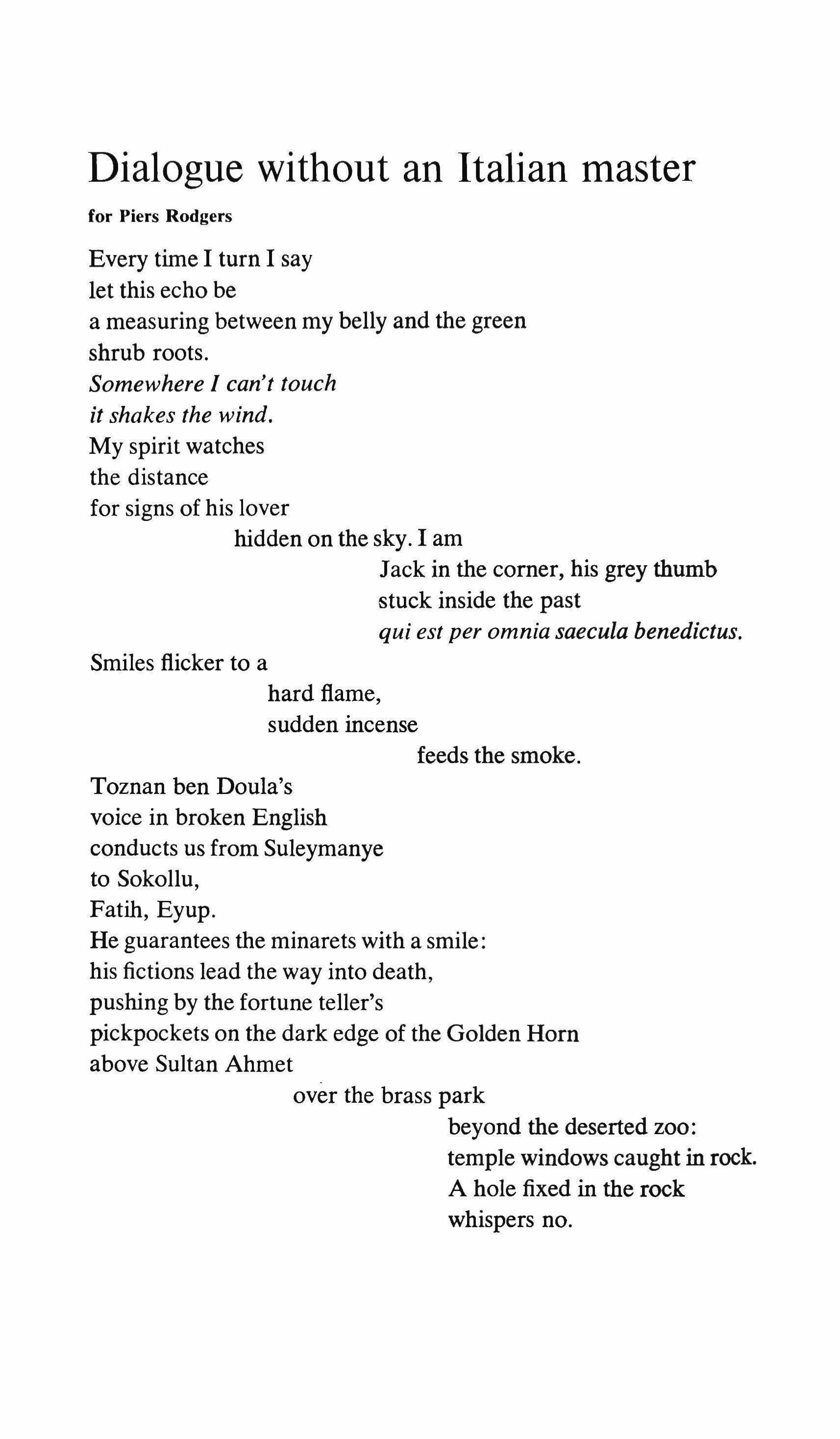
Every time I turn I say let this echo be a measuring between my belly and the green shrub roots. Somewhere I can't touch it shakes the wind. My spirit watches the distance for signs of his lover hidden on the sky. I am Jack in the corner, his grey thumb stuck inside the past qui est per omnia saecula benedictus. Smiles flicker to a hard flame, sudden incense feeds the smoke.
Toznan ben Doula's voice in broken English conducts us from Suleyrnanye to Sokollu, Fatih, Eyup. He guarantees the minarets with a smile: his fictions lead the way into death, pushing by the fortune teller's pickpockets on the dark edge of the Golden Horn above Sultan Ahmet over the brass park beyond the deserted zoo: temple windows caught in rock. A hole fixed in the rock whispers no.
I lean back at the point of the last hill
to find you gone, Monsieur Gautier's tea-house empty.
From a quiet heaven rain stirs, coughing among the olives. A wet cat rubs against my sleeve. If you have pity to spare I'll tell you where in what country Flora, Alcibiades, Thais melt the snow with their branches.
Doula the guide has run away to the nearest whorehouse. Banker, go home.
A long drop below my feet
women wrapped in prayer shawls sleep under the dripping mosque, too hungry to beg. My skin rests against a marble trellis, flies suck my leg.
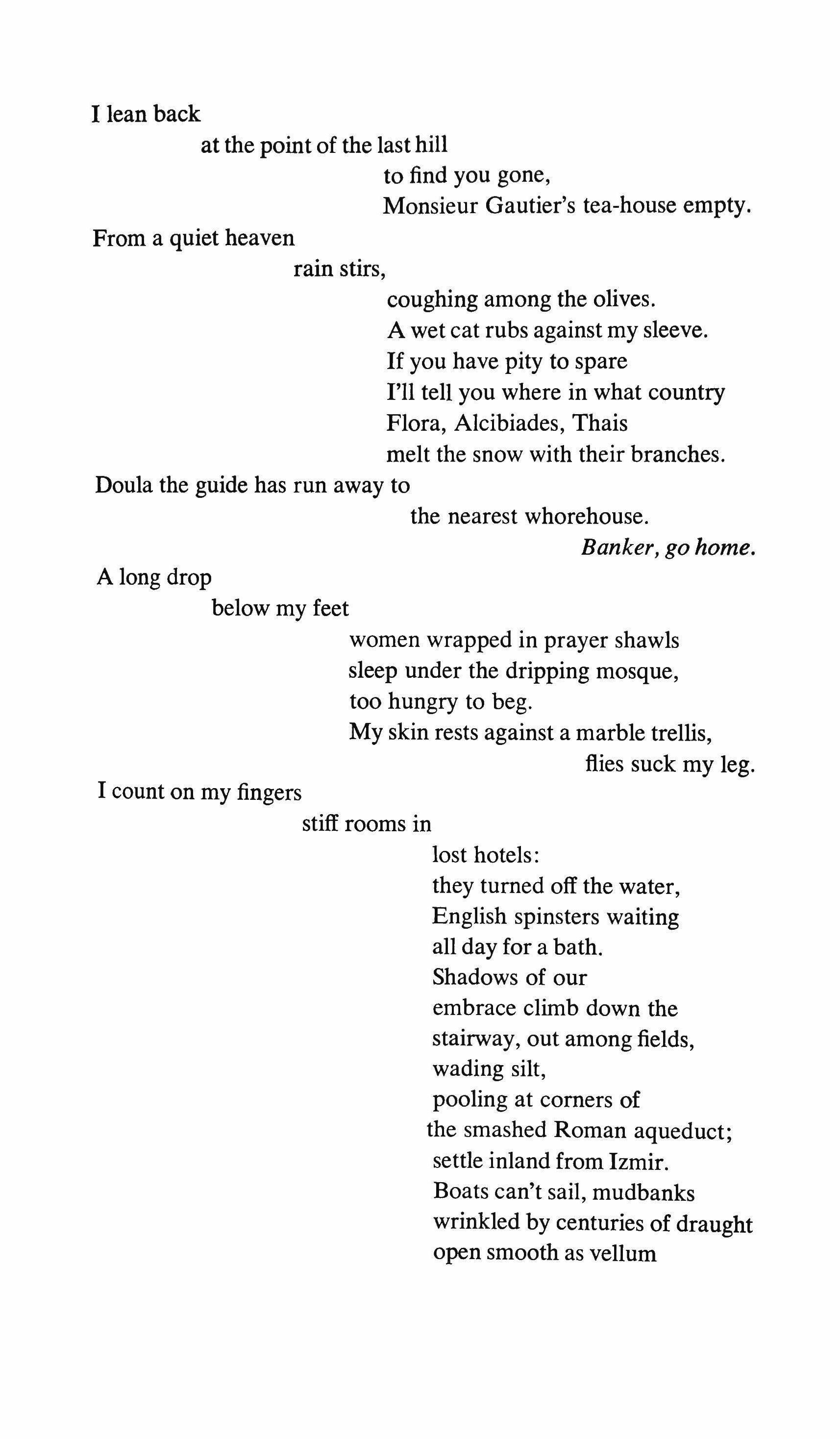
I count on my fingers
stiff rooms in lost hotels: they turned off the water, English spinsters waiting all day for a bath. Shadows of our embrace climb down the stairway, out among fields, wading silt, pooling at comers of the smashed Roman aqueduct; settle inland from Izmir.
Boats can't sail, mudbanks wrinkled by centuries of draught open smooth as vellum
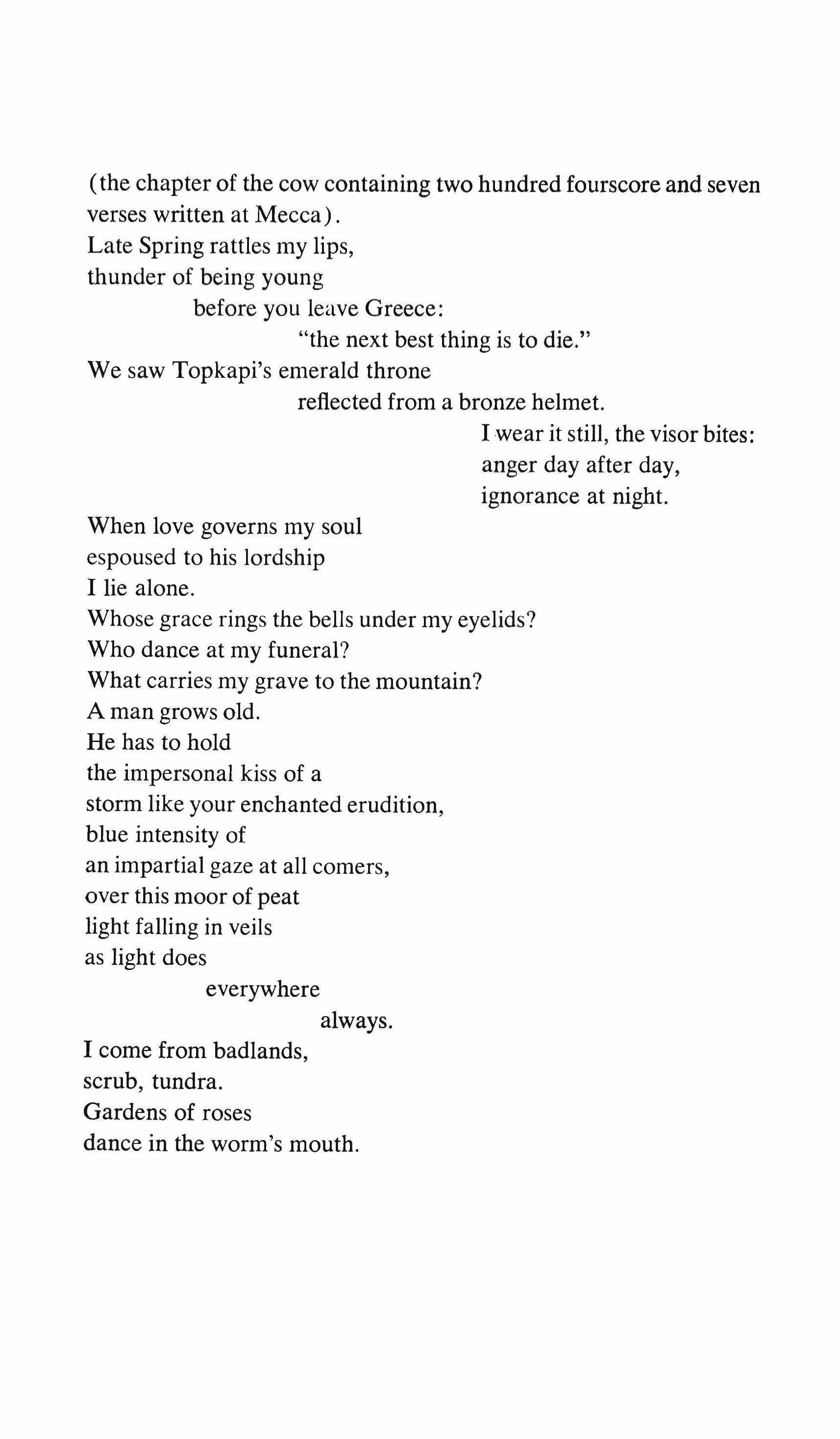
(the chapter of the cow containing two hundred fourscore and seven verses written at Mecca).
Late Spring rattles my lips, thunder of being young before you leave Greece: "the next best thing is to die."
We saw Topkapi's emerald throne reflected from a bronze helmet. I wear it still, the visor bites: anger day after day, ignorance at night.
When love governs my soul espoused to his lordship I lie alone.
Whose grace rings the bells under my eyelids? Who dance at my funeral? What carries my grave to the mountain? A man grows old. He has to hold the impersonal kiss of a storm like your enchanted erudition, blue intensity of an impartial gaze at all comers, over this moor of peat light falling in veils as light does everywhere always. I come from badlands, scrub, tundra. Gardens of roses dance in the worm's mouth.
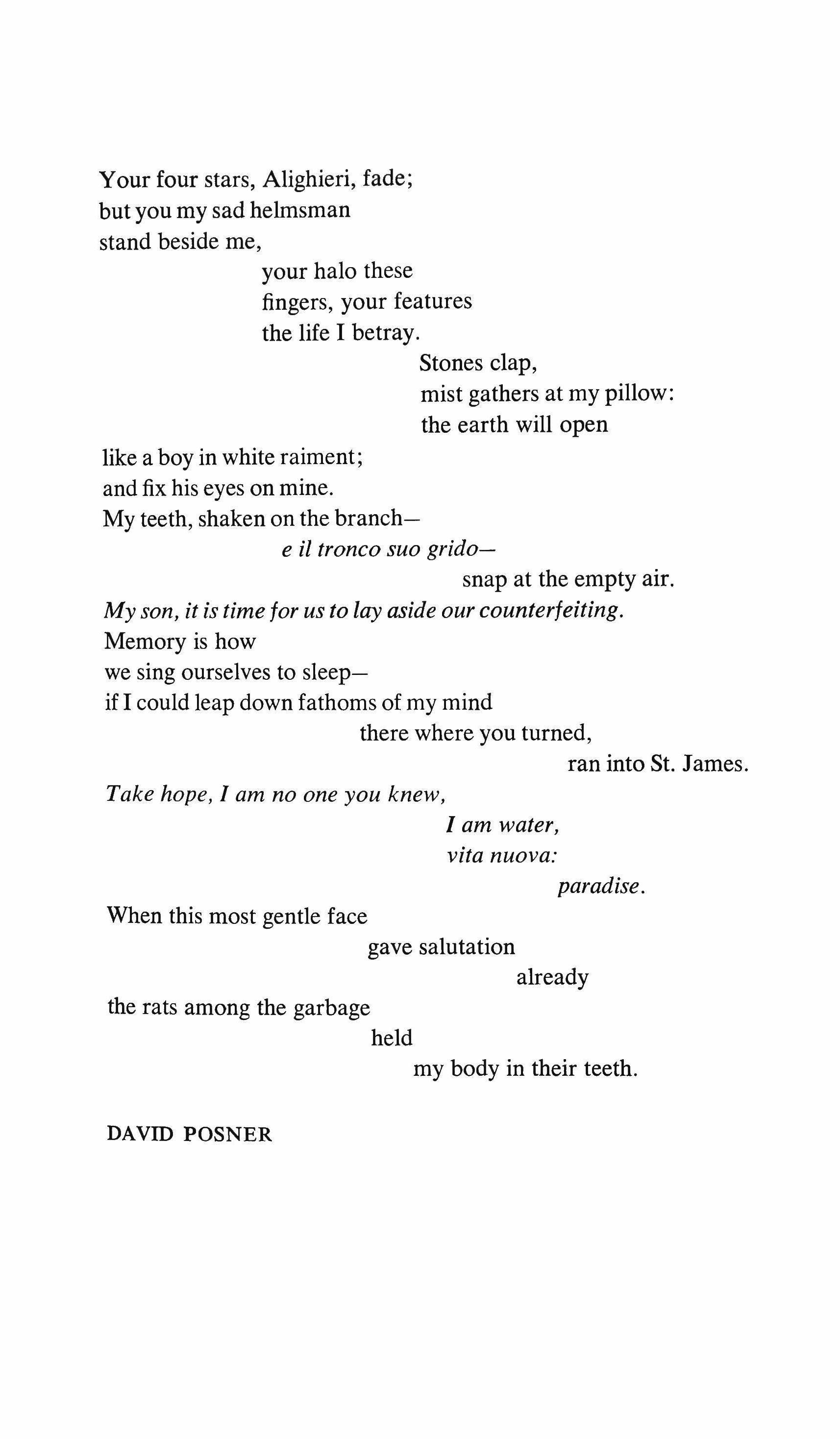
Your four stars, Alighieri, fade; but you my sad helmsman stand beside me, your halo these fingers, your features the life I betray.
Stones clap, mist gathers at my pillow: the earth will open like a boy in white raiment; and fix his eyes on mine. My teeth, shaken on the branche il tronco suo gridosnap at the empty air. My son, it is time for us to lay aside our counterfeiting. Memory is how we sing ourselves to sleepif I could leap down fathoms of my mind there where you turned, ran into St. James.
Take hope, I am no one you knew, I am water, vita nuova: paradise. When this most gentle face gave salutation already the rats among the garbage held my body in their teeth.
DAVID POSNER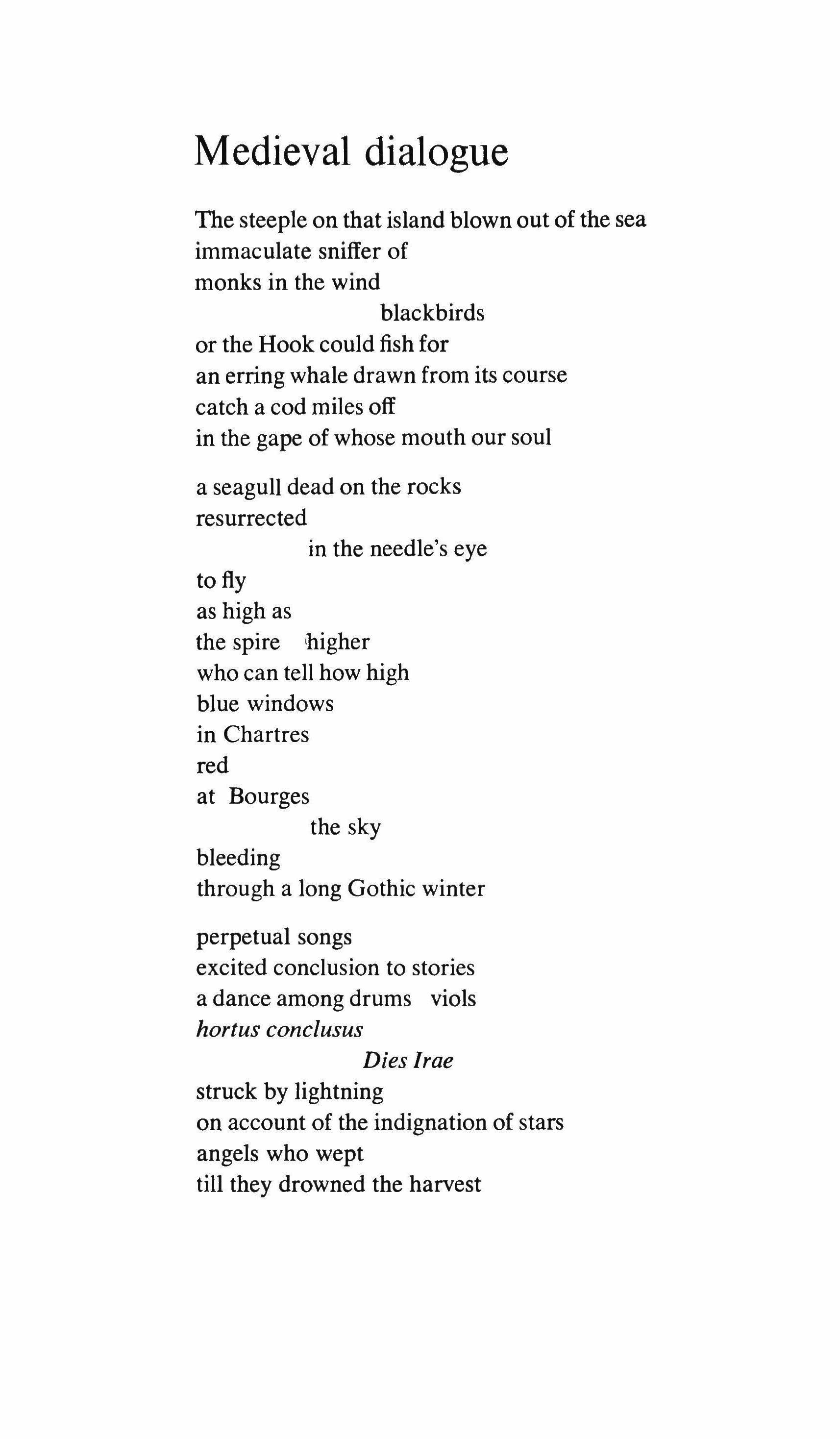
The steeple on that island blown out of the sea immaculate sniffer of monks in the wind blackbirds or the Hook could fish for an erring whale drawn from its course catch a cod miles off in the gape of whose mouth our soul a seagull dead on the rocks resurrected in the needle's eye to fly as high as the spire <higher who can tell how high blue windows in Chartres red at Bourges the sky bleeding through a long Gothic winter perpetual songs excited conclusion to stories a dance among drums viols hortus conclusus
Dies [rae struck by lightning on account of the indignation of stars angels who wept till they drowned the harvest
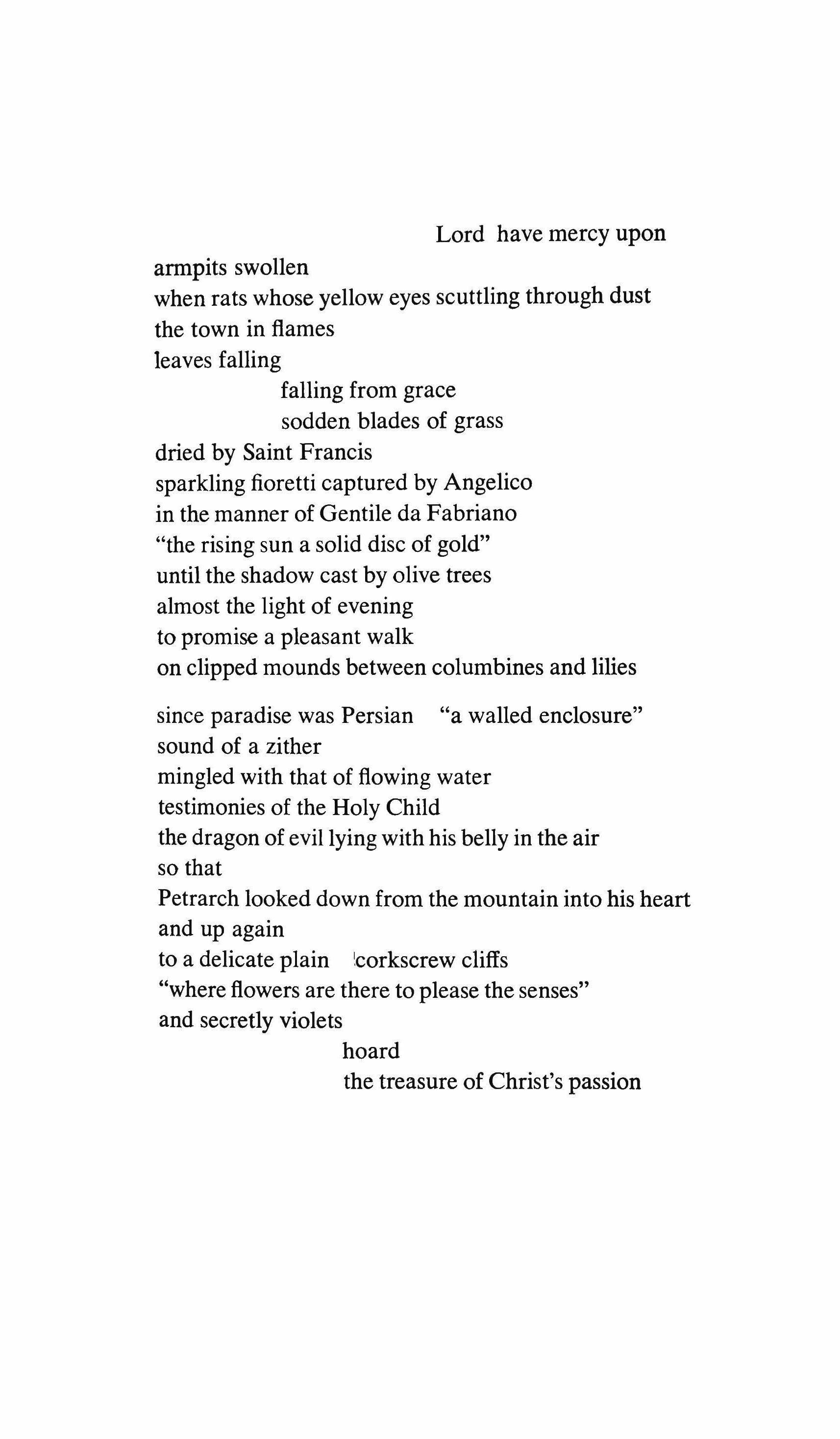
Lord have mercy upon armpits swollen when rats whose yellow eyes scuttling through dust the town in flames leaves falling falling from grace sodden blades of grass dried by Saint Francis sparkling fioretti captured by Angelico in the manner of Gentile da Fabriano "the rising sun a solid disc of gold" until the shadow cast by olive trees almost the light of evening to promise a pleasant walk on clipped mounds between columbines and lilies since paradise was Persian "a walled enclosure" sound of a zither mingled with that of flowing water testimonies of the Holy Child the dragon of evil lying with his belly in the air so that Petrarch looked down from the mountain into his heart and up again to a delicate plain 'corkscrew cliffs "where flowers are there to please the senses" and secretly violets hoard the treasure of Christ's passion
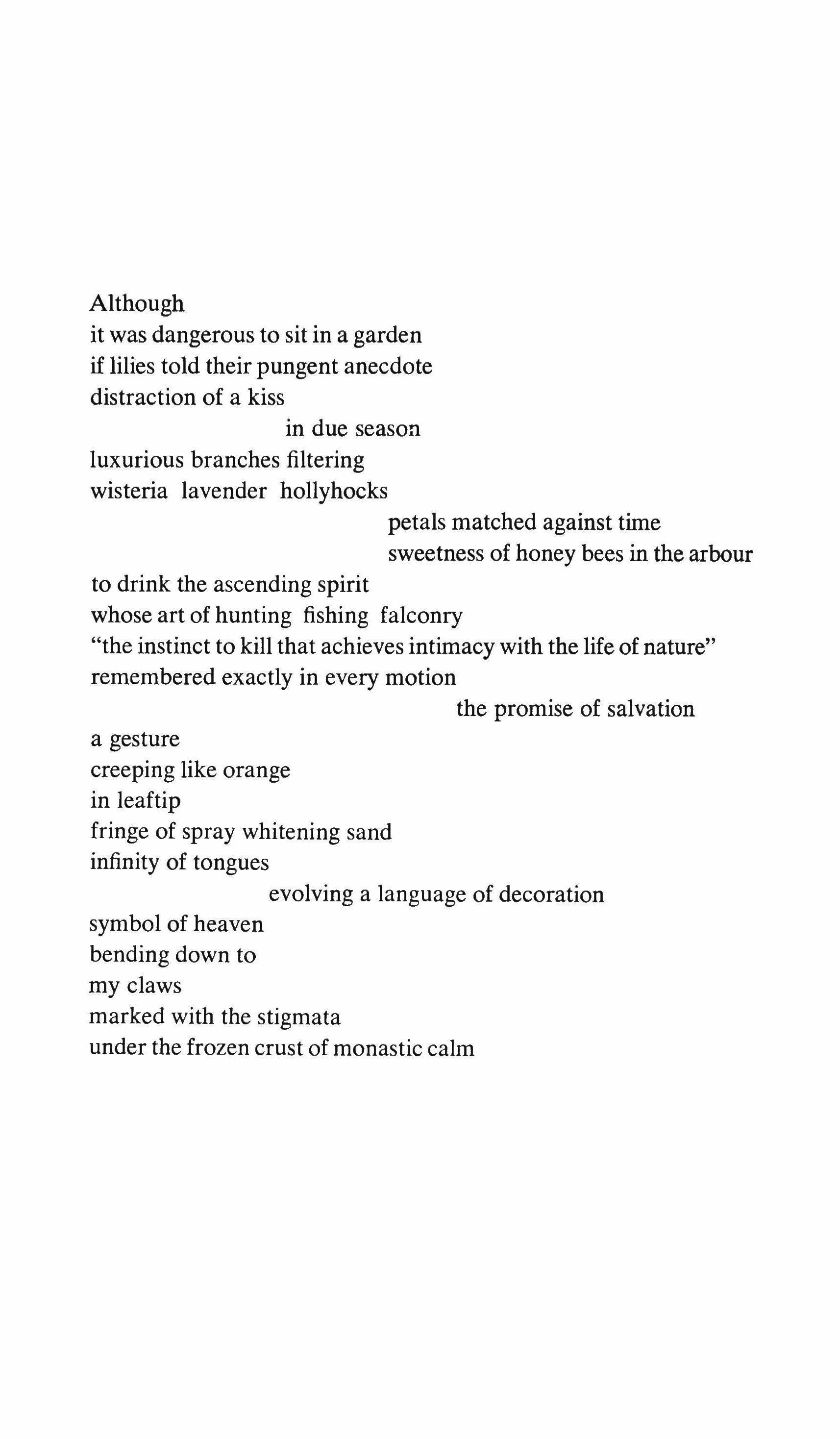
Although it was dangerous to sit in a garden if lilies told their pungent anecdote distraction of a kiss in due season
luxurious branches filtering wisteria lavender hollyhocks
petals matched against time sweetness of honey bees in the arbour to drink the ascending spirit whose art of hunting fishing falconry "the instinct to kill that achieves intimacy with the life of nature" remembered exactly in every motion the promise of salvation a gesture creeping like orange in leaftip fringe of spray whitening sand infinity of tongues
evolving a language of decoration symbol of heaven bending down to my claws
marked with the stigmata under the frozen crust of monastic calm
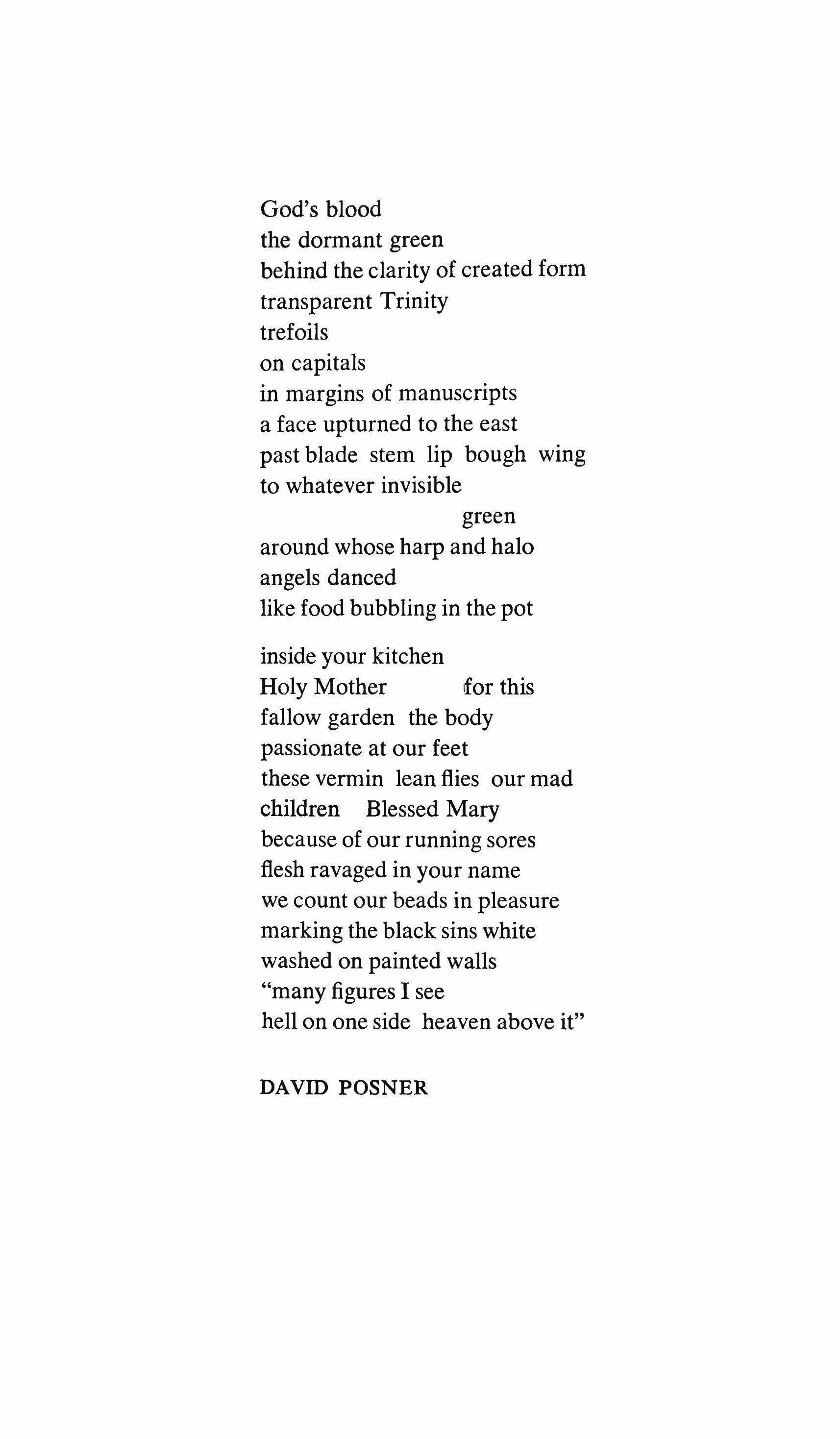
God's blood the dormant green behind the clarity of created form transparent Trinity trefoils on capitals in margins of manuscripts a face upturned to the east past blade stem lip bough wing to whatever invisible green around whose harp and halo angels danced like food bubbling in the pot inside your kitchen
Holy Mother for this fallow garden the body passionate at our feet these vermin lean flies our mad children Blessed Mary because of our running sores flesh ravaged in your name we count our beads in pleasure marking the black sins white washed on painted walls "many figures I see hell on one side heaven above it"
DAVID POSNER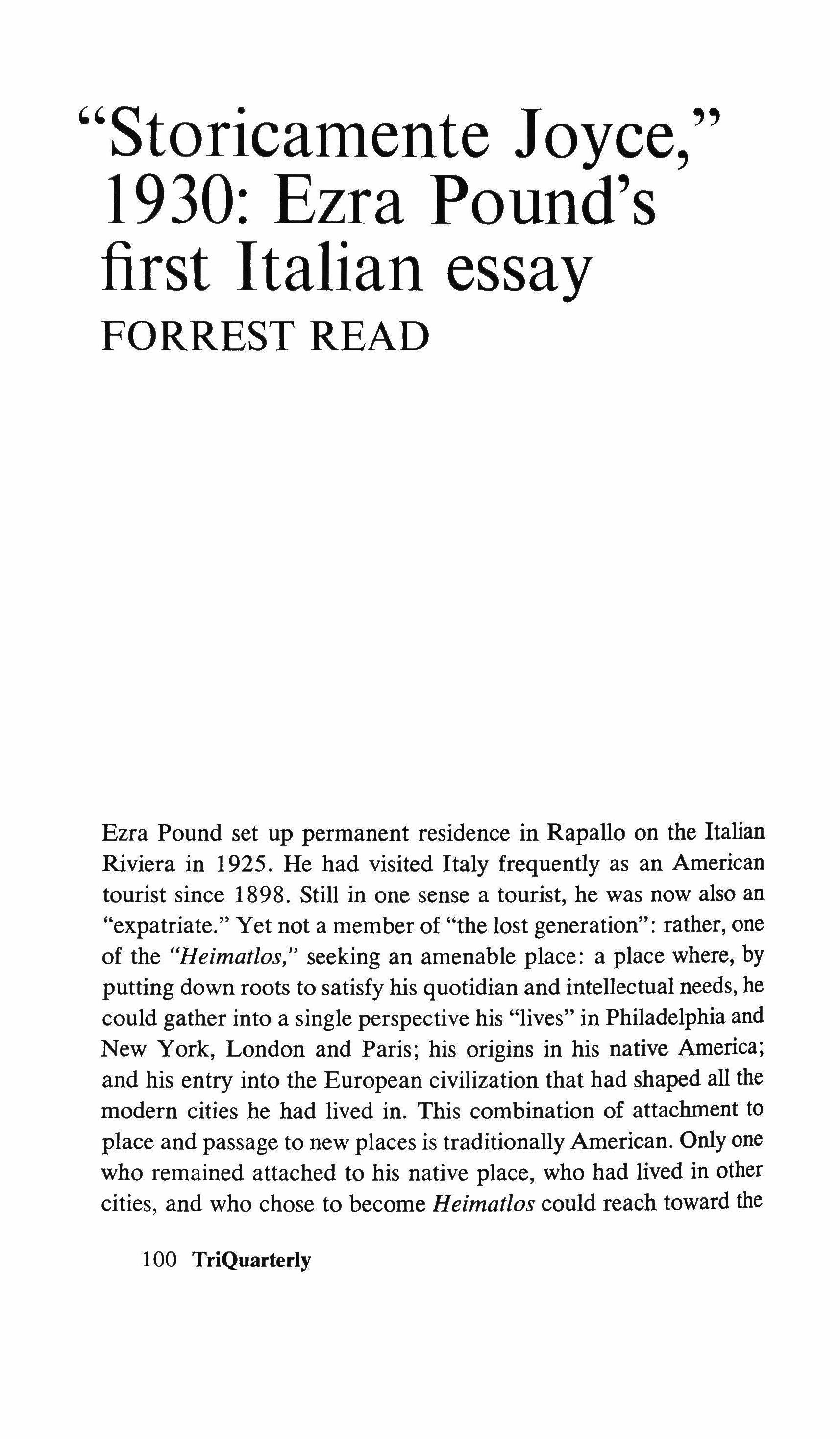
Ezra Pound set up permanent residence in Rapallo on the Italian Riviera in 1925. He had visited Italy frequently as an American tourist since 1898. Still in one sense a tourist, he was now also an "expatriate." Yet not a member of "the lost generation": rather, one of the "Heimatlos," seeking an amenable place: a place where, by putting down roots to satisfy his quotidian and intellectual needs, he could gather into a single perspective his "lives" in Philadelphia and New York, London and Paris; his origins in his native America; and his entry into the European civilization that had shaped all the modern cities he had lived in. This combination of attachment to place and passage to new places is traditionally American. Only one who remained attached to his native place, who had lived in other cities, and who chose to become Heimatlos could reach toward the 100 TriQuarterly
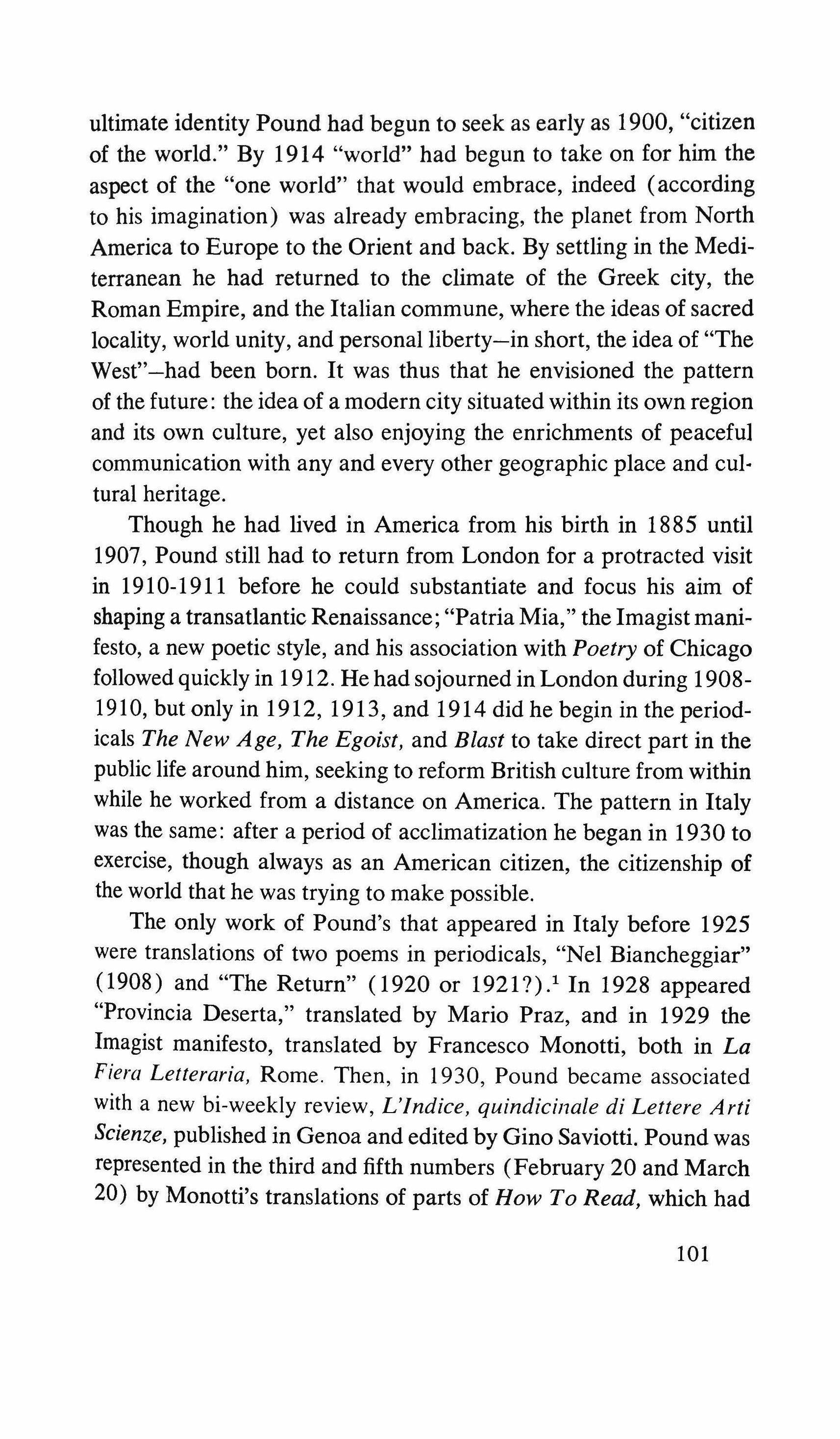
ultimate identity Pound had begun to seek as early as 1900, "citizen of the world." By 1914 "world" had begun to take on for him the aspect of the "one world" that would embrace, indeed (according to his imagination) was already embracing, the planet from North America to Europe to the Orient and back. By settling in the Mediterranean he had returned to the climate of the Greek city, the Roman Empire, and the Italian commune, where the ideas of sacred locality, world unity, and personal liberty-in short, the idea of "The West"-had been born. It was thus that he envisioned the pattern of the future: the idea of a modern city situated within its own region and its own culture, yet also enjoying the enrichments of peaceful communication with any and every other geographic place and cultural heritage.
Though he had lived in America from his birth in 1885 until 1907, Pound still had to return from London for a protracted visit in 1910-1911 before he could substantiate and focus his aim of shaping a transatlantic Renaissance; "Patria Mia," the Imagist manifesto, a new poetic style, and his association with Poetry of Chicago followed quickly in 1912. He had sojourned in London during 19081910, but only in 1912, 1913, and 1914 did he begin in the periodicals The New Age, The Egoist, and Blast to take direct part in the public life around him, seeking to reform British culture from within while he worked from a distance on America. The pattern in Italy was the same: after a period of acclimatization he began in 1930 to exercise, though always as an American citizen, the citizenship of the world that he was trying to make possible.
The only work of Pound's that appeared in Italy before 1925 were translations of two poems in periodicals, "Nel Biancheggiar" ( 1908) and "The Return" (1920 or 1921?).1 In 1928 appeared "Provincia Deserta," translated by Mario Praz, and in 1929 the Imagist manifesto, translated by Francesco Monotti, both in La Fiera Letteraria, Rome. Then, in 1930, Pound became associated with a new bi-weekly review, L'lndice, quindicinale di Lettere Arti Scienze, published in Genoa and edited by Gino Saviotti. Pound was represented in the third and fifth numbers (February 20 and March 20) by Monotti's translations of parts of How To Read, which had
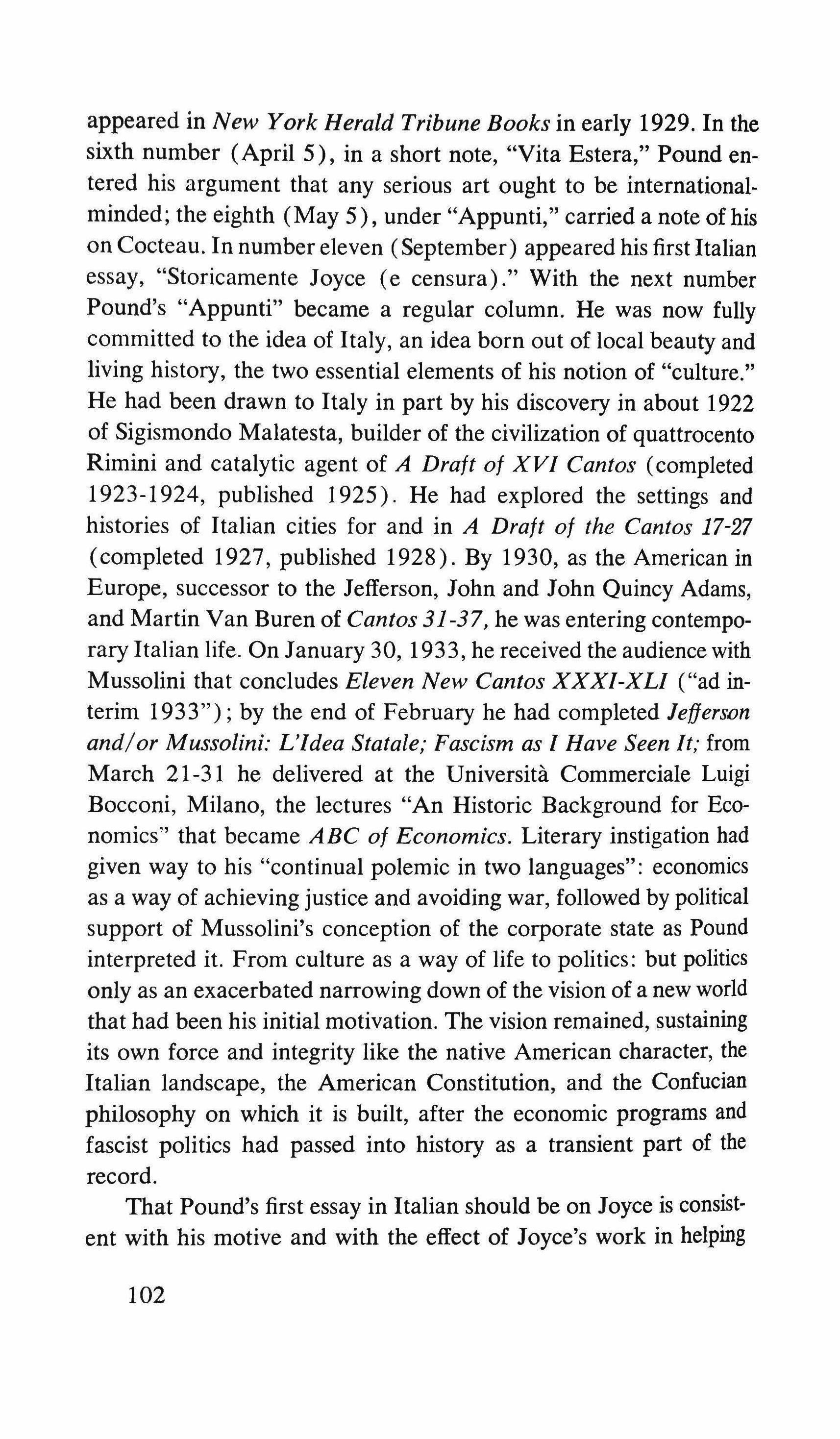
appeared in New York Herald Tribune Books in early 1929. In the sixth number (April 5), in a short note, "Vita Estera," Pound entered his argument that any serious art ought to be internationalminded; the eighth (May 5), under "Appunti," carried a note of his on Cocteau. In number eleven (September) appeared his first Italian essay, "Storicamente Joyce (e censura)." With the next number Pound's "Appunti" became a regular column. He was now fully committed to the idea of Italy, an idea born out of local beauty and living history, the two essential elements of his notion of "culture." He had been drawn to Italy in part by his discovery in about 1922 of Sigismondo Malatesta, builder of the civilization of quattrocento Rimini and catalytic agent of A Draft of XVI Cantos (completed 1923-1924, published 1925). He had explored the settings and histories of Italian cities for and in A Draft of the Cantos 17-27 (completed 1927, published 1928). By 1930, as the American in Europe, successor to the Jefferson, John and John Quincy Adams, and Martin Van Buren of Cantos 31-37, he was entering contemporary Italian life. On January 30, 1933, he received the audience with Mussolini that concludes Eleven New Cantos XXXI-XLI ("ad interim 1933"); by the end of February he had completed Jefferson and/or Mussolini: L'ldea Statale; Fascism as I Have Seen It; from March 21-31 he delivered at the Universita Commerciale Luigi Bocconi, Milano, the lectures "An Historic Background for Economics" that became ABC of Economics. Literary instigation had given way to his "continual polemic in two languages": economics as a way of achieving justice and avoiding war, followed by political support of Mussolini's conception of the corporate state as Pound interpreted it. From culture as a way of life to politics: but politics only as an exacerbated narrowing down of the vision of a new world that had been his initial motivation. The vision remained, sustaining its own force and integrity like the native American character, the Italian landscape, the American Constitution, and the Confucian philosophy on which it is built, after the economic programs and fascist politics had passed into history as a transient part of the record.
That Pound's first essay in Italian should be on Joyce is consistent with his motive and with the effect of Joyce's work in helping
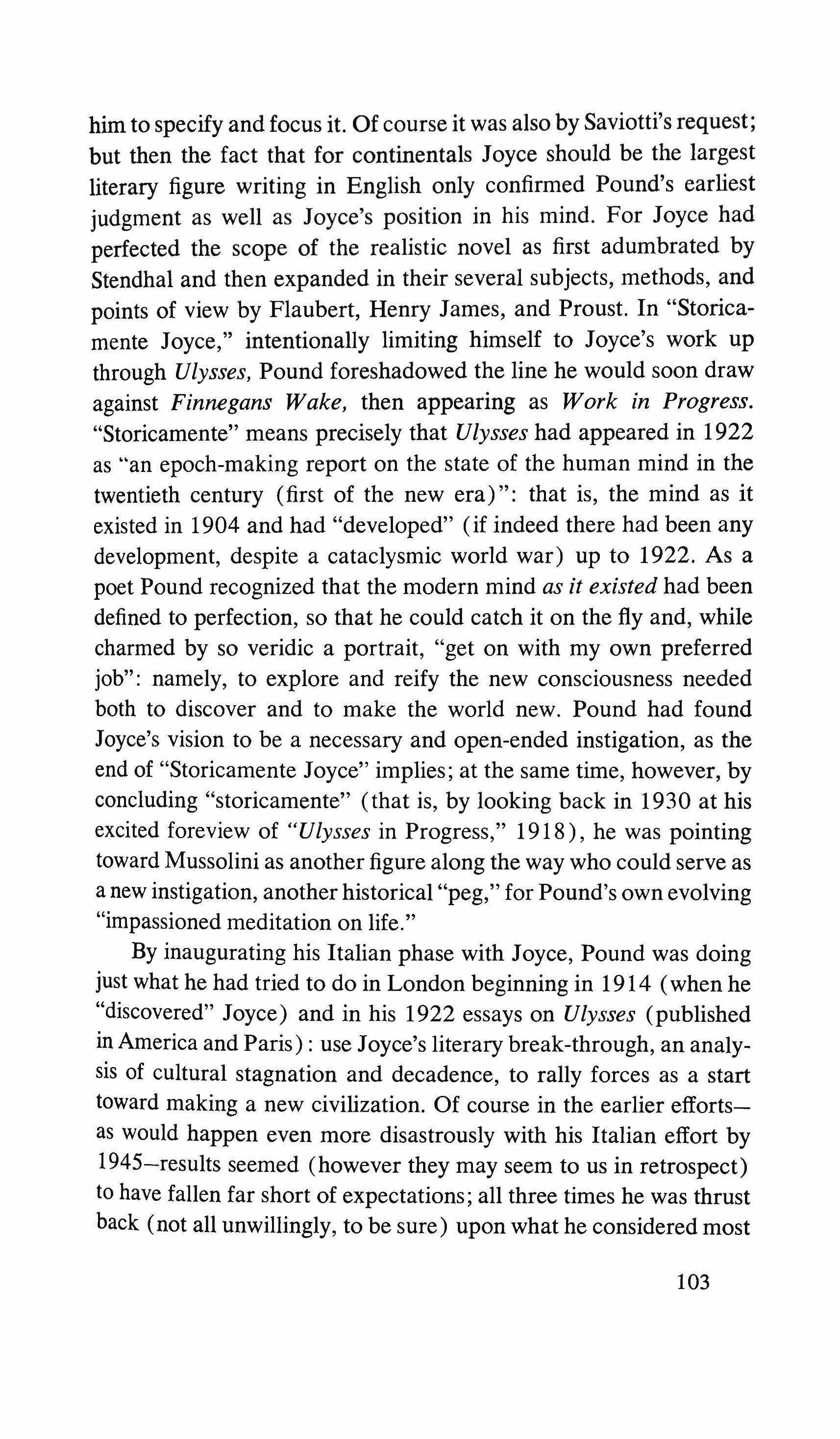
him to specify and focus it. Of course it was also by Saviotti's request; but then the fact that for continentals Joyce should be the largest literary figure writing in English only confirmed Pound's earliest judgment as well as Joyce's position in his mind. For Joyce had perfected the scope of the realistic novel as first adumbrated by Stendhal and then expanded in their several subjects, methods, and points of view by Flaubert, Henry James, and Proust. In "Storicamente Joyce," intentionally limiting himself to Joyce's work up through Ulysses, Pound foreshadowed the line he would soon draw against Finnegans Wake, then appearing as Work in Progress. "Storicamente" means precisely that Ulysses had appeared in 1922 as "an epoch-making report on the state of the human mind in the twentieth century (first of the new era)": that is, the mind as it existed in 1904 and had "developed" (if indeed there had been any development, despite a cataclysmic world war) up to 1922. As a poet Pound recognized that the modern mind as it existed had been defined to perfection, so that he could catch it on the fly and, while charmed by so veridic a portrait, "get on with my own preferred job": namely, to explore and reify the new consciousness needed both to discover and to make the world new. Pound had found Joyce's vision to be a necessary and open-ended instigation, as the end of "Storicamente Joyce" implies; at the same time, however, by concluding "storicamente" (that is, by looking back in 1930 at his excited foreview of "Ulysses in Progress," 1918), he was pointing toward Mussolini as another figure along the way who could serve as a new instigation, another historical "peg," for Pound's own evolving "impassioned meditation on life."
By inaugurating his Italian phase with Joyce, Pound was doing just what he had tried to do in London beginning in 1914 (when he "discovered" Joyce) and in his 1922 essays on Ulysses (published in America and Paris): use Joyce's literary break-through, an analysis of cultural stagnation and decadence, to rally forces as a start toward making a new civilization. Of course in the earlier effortsas would happen even more disastrously with his Italian effort by 1945-results seemed (however they may seem to us in retrospect) to have fallen far short of expectations; all three times he was thrust back (not all unwillingly, to be sure) upon what he considered most
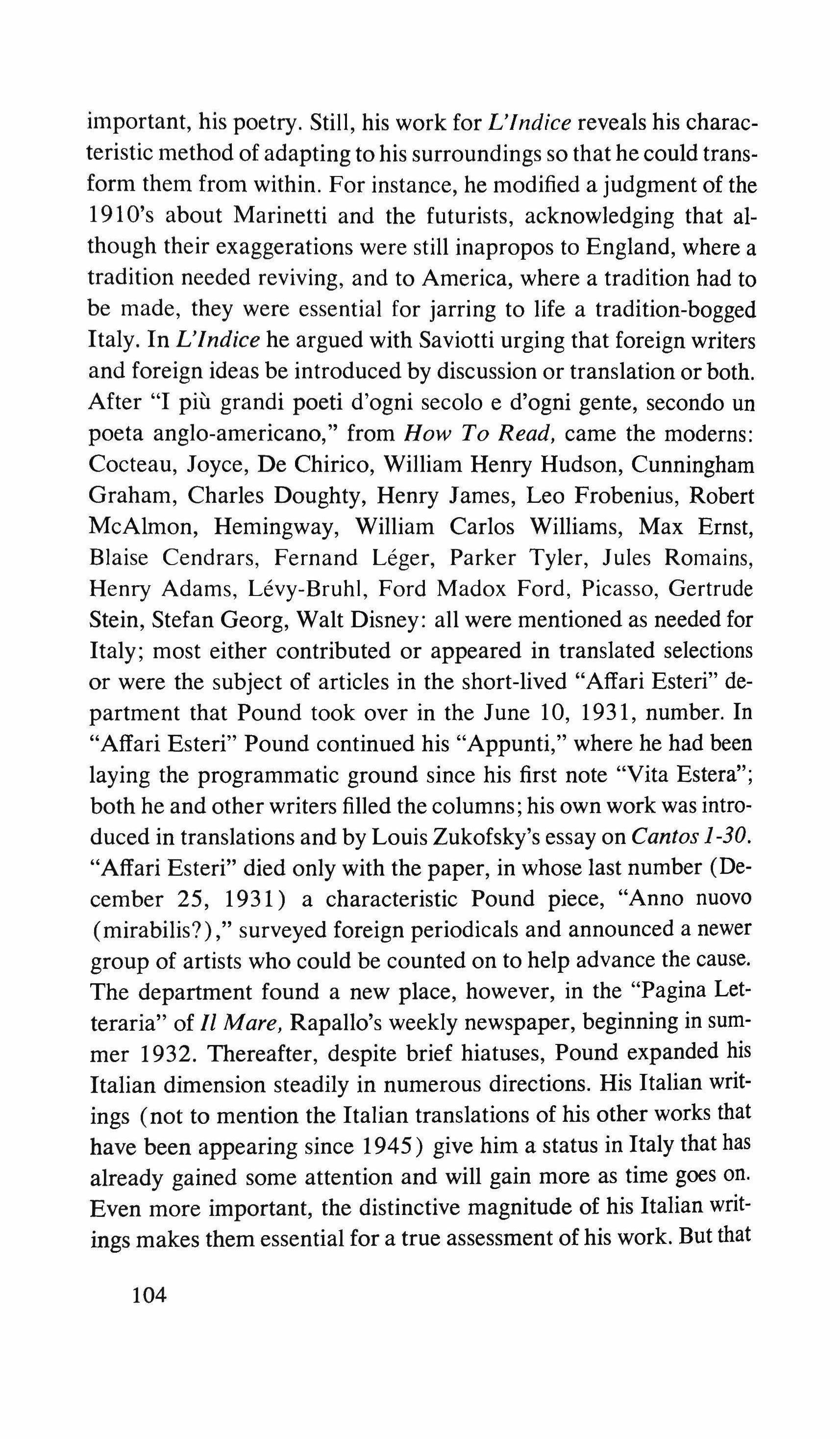
important, his poetry. Still, his work for L'!ndice reveals his characteristic method of adapting to his surroundings so that he could transform them from within. For instance, he modified a judgment of the 1910's about Marinetti and the futurists, acknowledging that although their exaggerations were still inapropos to England, where a tradition needed reviving, and to America, where a tradition had to be made, they were essential for jarring to life a tradition-bogged Italy. In L'!ndice he argued with Saviotti urging that foreign writers and foreign ideas be introduced by discussion or translation or both. After "I pili grandi poeti d'ogni secolo e d'ogni gente, secondo un poeta anglo-americano," from How To Read, came the moderns: Cocteau, Joyce, De Chirico, William Henry Hudson, Cunningham Graham, Charles Doughty, Henry James, Leo Frobenius, Robert McAlmon, Hemingway, William Carlos Williams, Max Ernst, Blaise Cendrars, Fernand Leger, Parker Tyler, Jules Romains, Henry Adams, Levy-Bruhl, Ford Madox Ford, Picasso, Gertrude Stein, Stefan Georg, Walt Disney: all were mentioned as needed for Italy; most either contributed or appeared in translated selections or were the subject of articles in the short-lived "Affari Esteri" department that Pound took over in the June 10, 1931, number. In "Affari Esteri" Pound continued his "Appunti," where he had been laying the programmatic ground since his first note "Vita Estera"; both he and other writers filled the columns; his own work was introduced in translations and by Louis Zukofsky's essay on Cantos 1-30. "Affari Esteri" died only with the paper, in whose last number (December 25, 1931) a characteristic Pound piece, "Anno nuovo (mirabilis?)," surveyed foreign periodicals and announced a newer group of artists who could be counted on to help advance the cause. The department found a new place, however, in the "Pagina Letteraria" of 1l Mare, Rapallo's weekly newspaper, beginning in summer 1932. Thereafter, despite brief hiatuses, Pound expanded his Italian dimension steadily in numerous directions. His Italian writings (not to mention the Italian translations of his other works that have been appearing since 1945) give him a status in Italy that has already gained some attention and will gain more as time goes on. Even more important, the distinctive magnitude of his Italian writings makes them essential for a true assessment of his work. But that
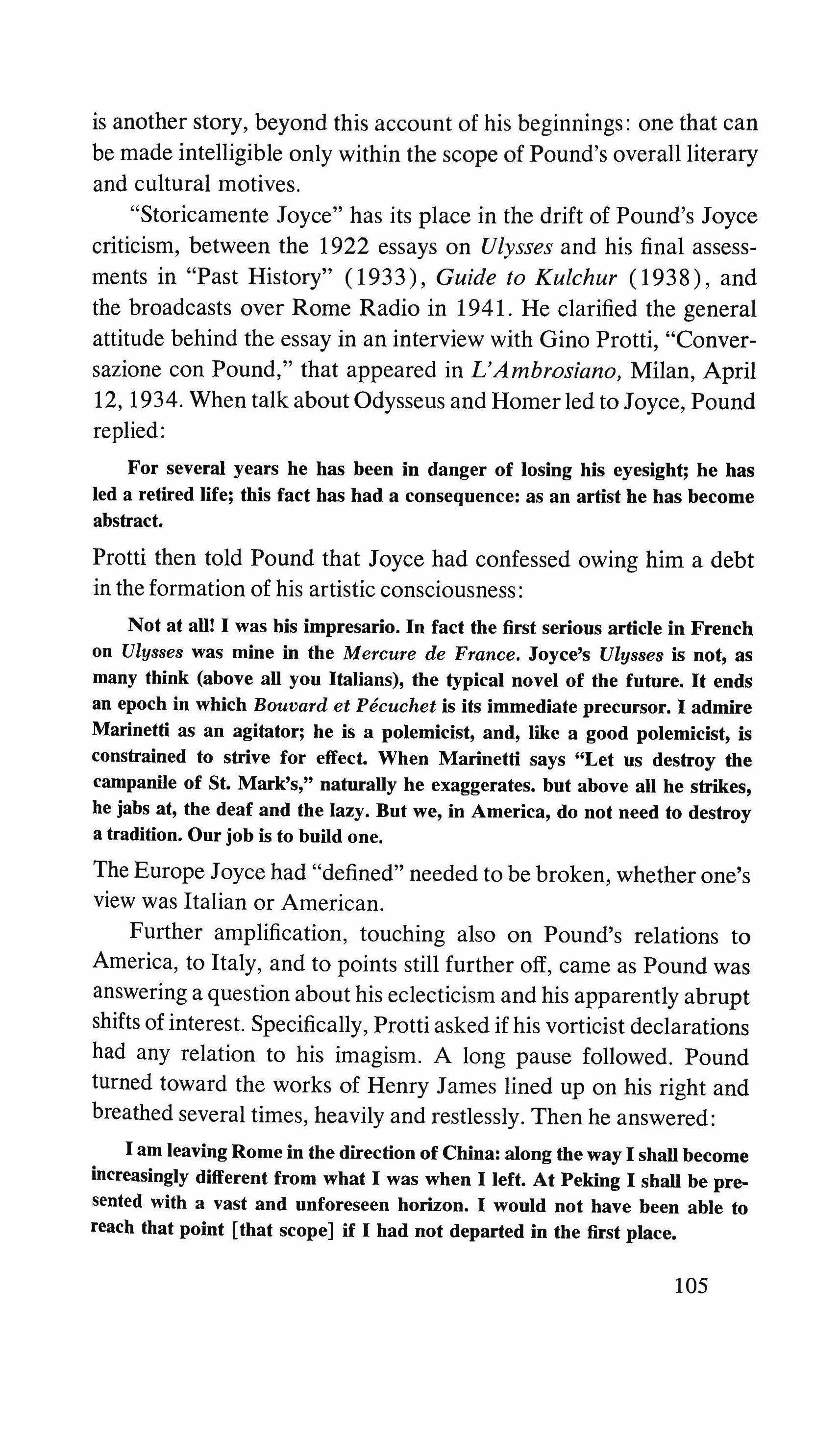
is another story, beyond this account of his beginnings: one that can be made intelligible only within the scope of Pound's overall literary and cultural motives.
"Storicamente Joyce" has its place in the drift of Pound's Joyce criticism, between the 1922 essays on Ulysses and his final assessments in "Past History" (1933), Guide to Kulchur (1938), and the broadcasts over Rome Radio in 1941. He clarified the general attitude behind the essay in an interview with Gino Protti, "Conversazione con Pound," that appeared in L'Ambrosiano, Milan, April 12,1934. When talk about Odysseus and Homer led to Joyce, Pound replied:
For several years he has been in danger of losing his eyesight; he has led a retired life; this fact has had a consequence: as an artist he has become abstract.
Protti then told Pound that Joyce had confessed owing him a debt in the formation of his artistic consciousness:
Not at all! I was his impresario. In fact the first serious article in French on Ulysses was mine in the Mercure de France. Joyce's Ulysses is not, as many think (above all you Italians), the typical novel of the future. It ends an epoch in which Bouvard et Pecuchet is its immediate precursor. I admire Marinetti as an agitator; he is a polemicist, and, like a good polemicist, is constrained to strive for effect. When Marinetti says "Let us destroy the campanile of St. Mark's," naturally he exaggerates. but above all he strikes, he jabs at, the deaf and the lazy. But we, in America, do not need to destroy a tradition. Our job is to build one.
The Europe Joyce had "defined" needed to be broken, whether one's view was Italian or American.
Further amplification, touching also on Pound's relations to America, to Italy, and to points still further off, came as Pound was answering a question about his eclecticism and his apparently abrupt shifts of interest. Specifically, Protti asked if his vorticist declarations had any relation to his imagism. A long pause followed. Pound turned toward the works of Henry James lined up on his right and breathed several times, heavily and restlessly. Then he answered:
I am leaving Rome in the direction of China: along the way I shall become increasingly different from what I was when I left. At Peking I shall be presented with a vast and unforeseen borizon. I would not have been able to reach that point [that scope] if I had not departed in the first place.
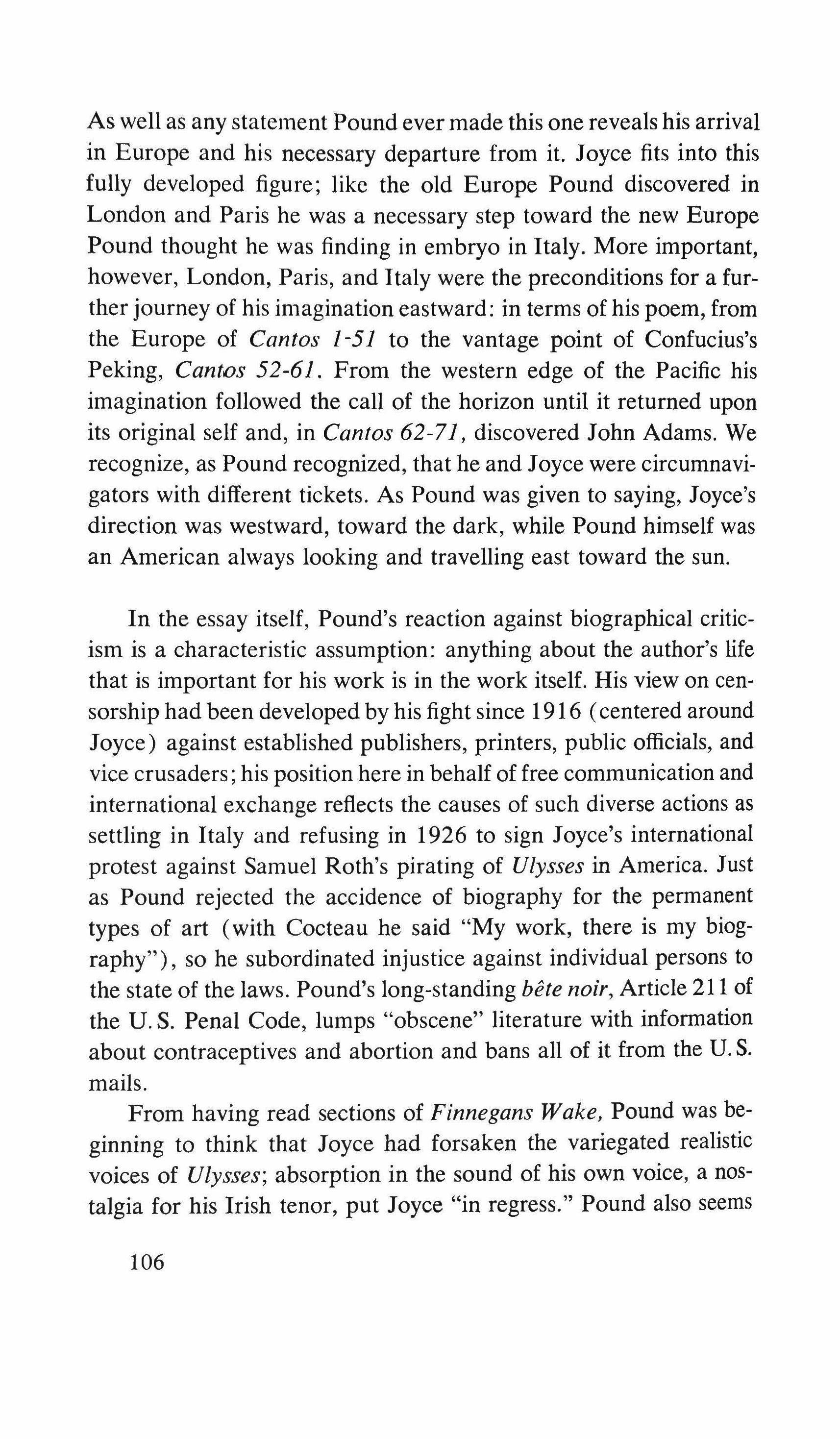
As well as any statement Pound ever made this one reveals his arrival in Europe and his necessary departure from it. Joyce fits into this fully developed figure; like the old Europe Pound discovered in London and Paris he was a necessary step toward the new Europe Pound thought he was finding in embryo in Italy. More important, however, London, Paris, and Italy were the preconditions for a further journey of his imagination eastward: in terms of his poem, from the Europe of Cantos /-51 to the vantage point of Confucius's Peking, Cantos 52-61. From the western edge of the Pacific his imagination followed the call of the horizon until it returned upon its original self and, in Cantos 62-71, discovered John Adams. We recognize, as Pound recognized, that he and Joyce were circumnavigators with different tickets. As Pound was given to saying, Joyce's direction was westward, toward the dark, while Pound himself was an American always looking and travelling east toward the sun.
In the essay itself, Pound's reaction against biographical criticism is a characteristic assumption: anything about the author's life that is important for his work is in the work itself. His view on censorship had been developed by his fight since 1916 (centered around Joyce) against established publishers, printers, public officials, and vice crusaders; his position here in behalf of free communication and international exchange reflects the causes of such diverse actions as settling in Italy and refusing in 1926 to sign Joyce's international protest against Samuel Roth's pirating of Ulysses in America. Just as Pound rejected the accidence of biography for the permanent types of art (with Cocteau he said "My work, there is my biography"), so he subordinated injustice against individual persons to the state of the laws. Pound's long-standing bete nair, Article 211 of the U. S. Penal Code, lumps "obscene" literature with information about contraceptives and abortion and bans all of it from the U. S. mails.
From having read sections of Finnegans Wake, Pound was beginning to think that Joyce had forsaken the variegated realistic voices of Ulysses; absorption in the sound of his own voice, a nostalgia for his Irish tenor, put Joyce "in regress." Pound also seems
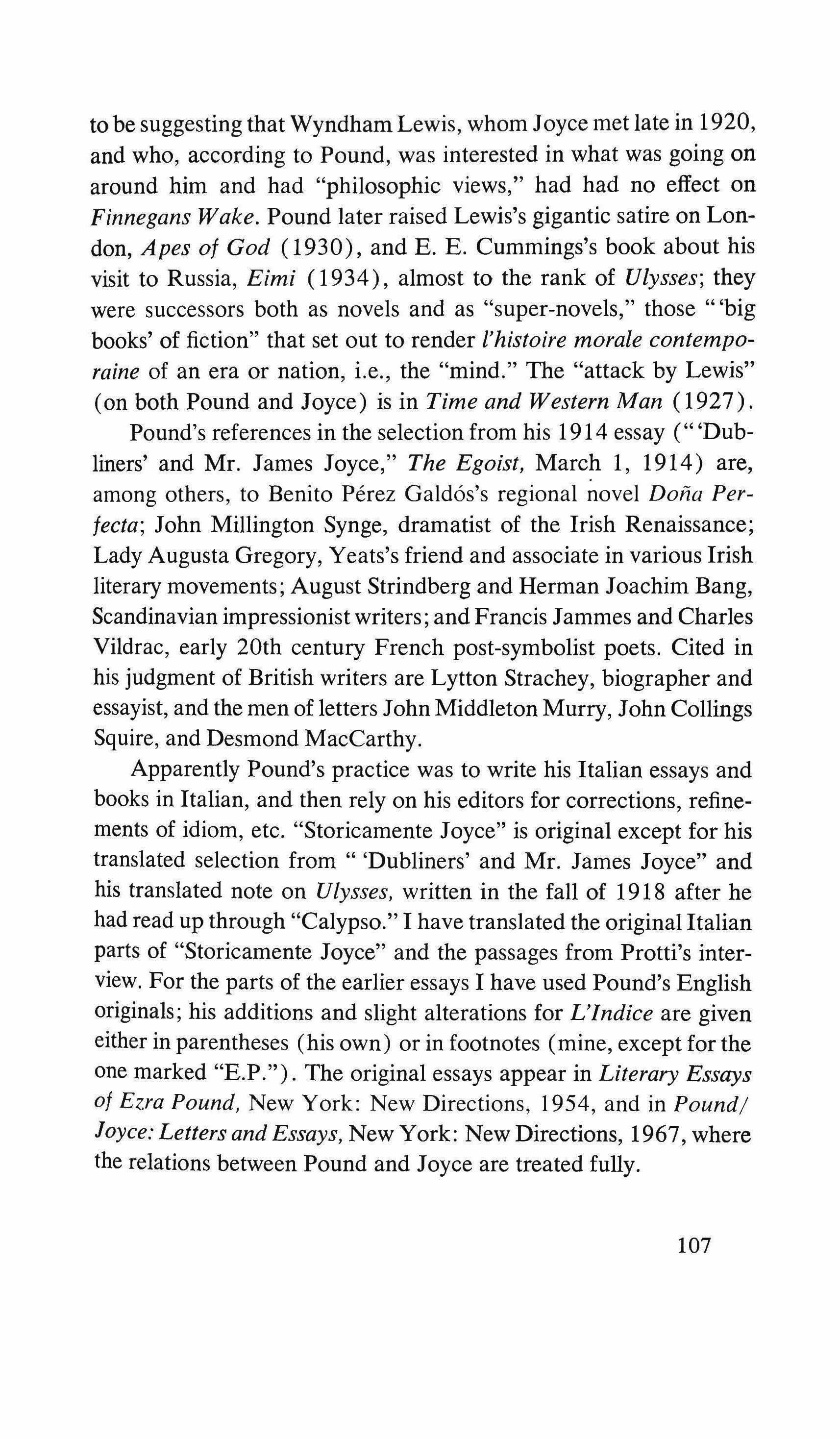
to be suggesting that Wyndham Lewis, whom Joyce met late in 1920, and who, according to Pound, was interested in what was going on around him and had "philosophic views," had had no effect on Finnegans Wake. Pound later raised Lewis's gigantic satire on London, Apes of God (1930), and E. E. Cummings's book about his visit to Russia, Eimi (1934), almost to the rank of Ulysses; they were successors both as novels and as "super-novels," those" 'big books' of fiction" that set out to render l'histoire morale contemporaine of an era or nation, i.e., the "mind." The "attack by Lewis" (on both Pound and Joyce) is in Time and Western Man (1927). Pound's references in the selection from his 1914 essay (" 'Dubliners' and Mr. James Joyce," The Egoist, March 1, 1914) are, among others, to Benito Perez Gald6s's regional novel Dona Perfecta; John Millington Synge, dramatist of the Irish Renaissance; Lady Augusta Gregory, Yeats's friend and associate in various Irish literary movements; August Strindberg and Herman Joachim Bang, Scandinavian impressionistwriters; and Francis Jammes and Charles Vildrac, early 20th century French post-symbolist poets. Cited in his judgment of British writers are Lytton Strachey, biographer and essayist, and the men of letters John Middleton Murry, John Collings Squire, and Desmond MacCarthy.
Apparently Pound's practice was to write his Italian essays and books in Italian, and then rely on his editors for corrections, refinements of idiom, etc. "Storicamente Joyce" is original except for his translated selection from" 'Dubliners' and Mr. James Joyce" and his translated note on Ulysses, written in the fall of 1918 after he had read up through "Calypso." I have translated the original Italian parts of "Storicamente Joyce" and the passages from Protti's interview. For the parts of the earlier essays I have used Pound's English originals; his additions and slight alterations for L'Indice are given either in parentheses (his own) or in footnotes (mine, except for the one marked "E.P."). The original essays appear in Literary Essays of Ezra Pound, New York: New Directions, 1954, and in Pound/ Joyce: Letters and Essays, New York: New Directions, 1967, where the relations between Pound and Joyce are treated fully.
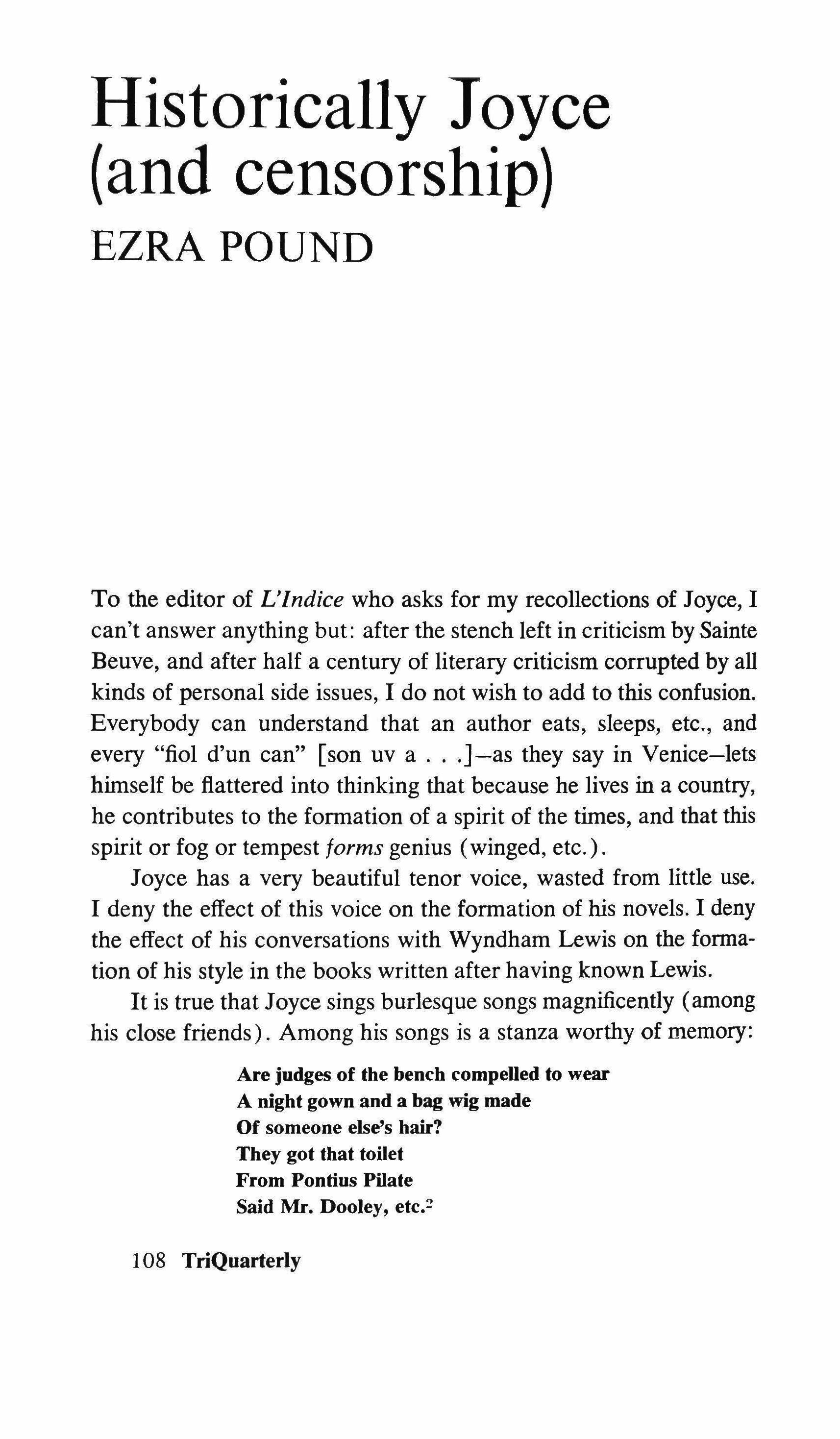
To the editor of L'Indice who asks for my recollections of Joyce, I can't answer anything but: after the stench left in criticism by Sainte Beuve, and after half a century of literary criticism corrupted by all kinds of personal side issues, I do not wish to add to this confusion. Everybody can understand that an author eats, sleeps, etc., and every "fiol d'un can" [son uv a J-as they say in Venice-lets himself be flattered into thinking that because he lives in a country, he contributes to the formation of a spirit of the times, and that this spirit or fog or tempest forms genius (winged, etc.)
Joyce has a very beautiful tenor voice, wasted from little use. I deny the effect of this voice on the formation of his novels. I deny the effect of his conversations with Wyndham Lewis on the formation of his style in the books written after having known Lewis.
It is true that Joyce sings burlesque songs magnificently (among his close friends). Among his songs is a stanza worthy of memory:
Are judges of the bench compelled to wear
A night gown and a bag wig made
Of someone else's hair?
They got that toilet
From Pontius Pilate
Said Mr. Dooley, etc.?
108 TriQuarterly
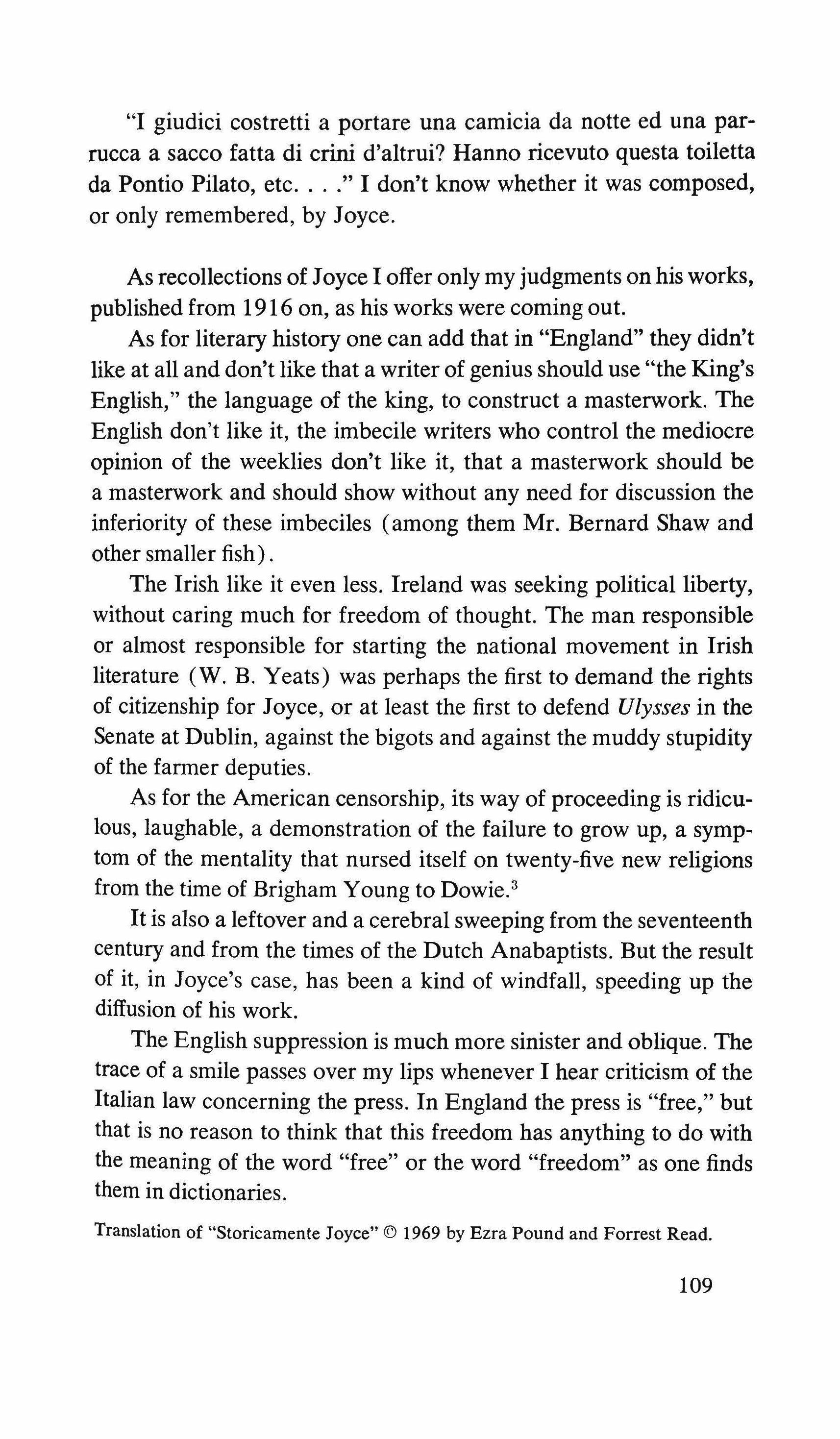
"I giudici costretti a portare una camicia da notte ed una parrucca a sacco fatta di crini d'altrui? Hanno ricevuto questa toiletta da Pontio Pilato, etc I don't know whether it was composed, or only remembered, by Joyce.
As recollections of Joyce I offer only my judgments on his works, published from 1916 on, as his works were coming out.
As for literary history one can add that in "England" they didn't like at all and don't like that a writer of genius should use "the King's English," the language of the king, to construct a masterwork. The English don't like it, the imbecile writers who control the mediocre opinion of the weeklies don't like it, that a masterwork should be a masterwork and should show without any need for discussion the inferiority of these imbeciles (among them Mr. Bernard Shaw and other smaller fish)
The Irish like it even less. Ireland was seeking political liberty, without caring much for freedom of thought. The man responsible or almost responsible for starting the national movement in Irish literature (W. B. Yeats) was perhaps the first to demand the rights of citizenship for Joyce, or at least the first to defend Ulysses in the Senate at Dublin, against the bigots and against the muddy stupidity of the farmer deputies.
As for the American censorship, its way of proceeding is ridiculous, laughable, a demonstration of the failure to grow up, a symptom of the mentality that nursed itself on twenty-five new religions from the time of Brigham Young to Dowie."
It is also a leftover and a cerebral sweeping from the seventeenth century and from the times of the Dutch Anabaptists. But the result of it, in Joyce's case, has been a kind of windfall, speeding up the diffusion of his work.
The English suppression is much more sinister and oblique. The trace of a smile passes over my lips whenever I hear criticism of the Italian law concerning the press. In England the press is "free," but that is no reason to think that this freedom has anything to do with the meaning of the word "free" or the word "freedom" as one finds them in dictionaries.
Translation of "Storicamente Joyce" <0 1969 by Ezra Pound and Forrest Read.
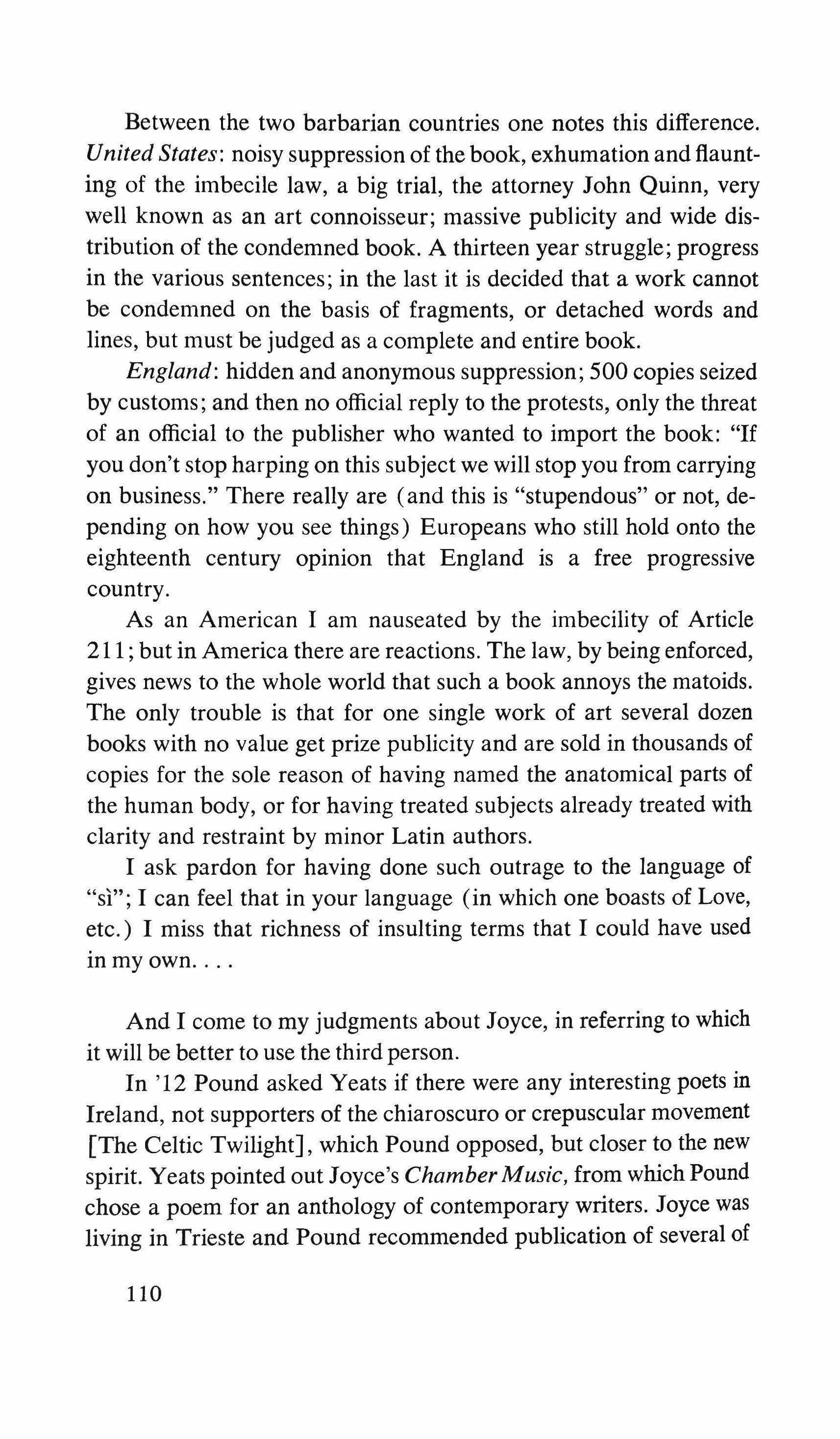
Between the two barbarian countries one notes this difference. United States: noisy suppression of the book, exhumation and flaunting of the imbecile law, a big trial, the attorney John Quinn, very well known as an art connoisseur; massive publicity and wide distribution of the condemned book. A thirteen year struggle; progress in the various sentences; in the last it is decided that a work cannot be condemned on the basis of fragments, or detached words and lines, but must be judged as a complete and entire book.
England: hidden and anonymous suppression; 500 copies seized by customs; and then no official reply to the protests, only the threat of an official to the publisher who wanted to import the book: "If you don't stop harping on this subject we will stop you from carrying on business." There really are (and this is "stupendous" or not, depending on how you see things) Europeans who still hold onto the eighteenth century opinion that England is a free progressive country.
As an American I am nauseated by the imbecility of Article 211; but in America there are reactions. The law, by being enforced, gives news to the whole world that such a book annoys the matoids. The only trouble is that for one single work of art several dozen books with no value get prize publicity and are sold in thousands of copies for the sole reason of having named the anatomical parts of the human body, or for having treated subjects already treated with clarity and restraint by minor Latin authors.
I ask pardon for having done such outrage to the language of "si"; I can feel that in your language (in which one boasts of Love, etc.) I miss that richness of insulting terms that I could have used in my own
And I come to my judgments about Joyce, in referring to which it will be better to use the third person.
In '12 Pound asked Yeats if there were any interesting poets in Ireland, not supporters of the chiaroscuro or crepuscular movement [The Celtic Twilight], which Pound opposed, but closer to the new spirit. Yeats pointed out Joyce's ChamberMusic, from which Pound chose a poem for an anthology of contemporary writers. Joyce was living in Trieste and Pound recommended publication of several of
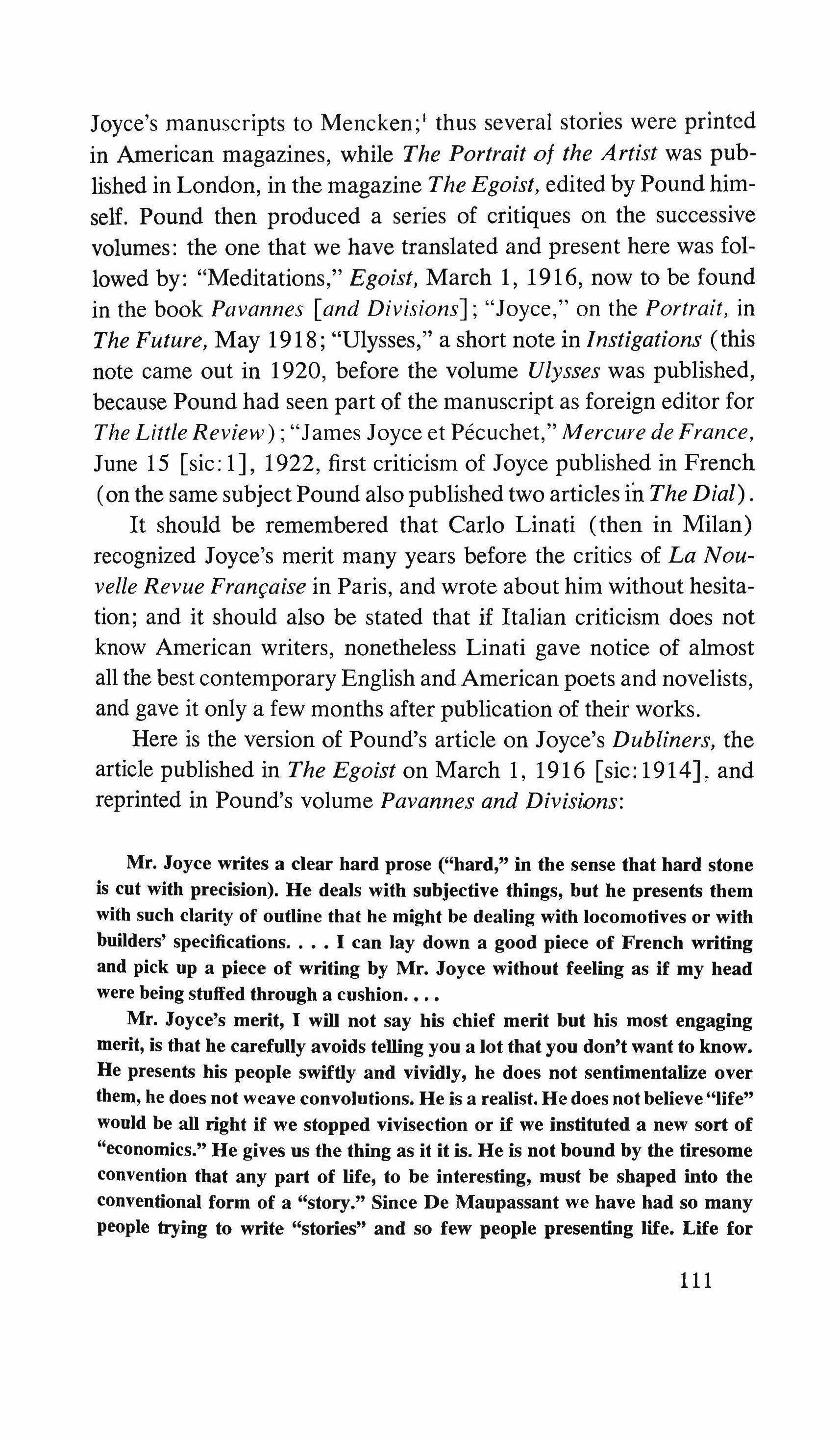
Joyce's manuscripts to Mencken;' thus several stories were printed in American magazines, while The Portrait of the Artist was published in London, in the magazine The Egoist, edited by Pound himself. Pound then produced a series of critiques on the successive volumes: the one that we have translated and present here was followed by: "Meditations," Egoist, March 1, 1916, now to be found in the book Pavannes [and Divisions]; "Joyce," on the Portrait, in The Future, May 1918; "Ulysses," a short note in Instigations (this note came out in 1920, before the volume Ulysses was published, because Pound had seen part of the manuscript as foreign editor for The Little Review); "James Joyce et Pecuchet," Mercure de France, June 15 [sic: 1], 1922, first criticism of Joyce published in French (on the same subject Pound also published two articles in The Dial).
It should be remembered that Carlo Linati (then in Milan) recognized Joyce's merit many years before the critics of La Nouvelle Revue Francoise in Paris, and wrote about him without hesitation; and it should also be stated that if Italian criticism does not know American writers, nonetheless Linati gave notice of almost all the best contemporary English and American poets and novelists, and gave it only a few months after publication of their works.
Here is the version of Pound's article on Joyce's Dubliners, the article published in The Egoist on March 1, 1916 [sic: 1914], and reprinted in Pound's volume Pavannes and Divisions:
Mr. Joyce writes a clear hard prose ("hard," in the sense that hard stone is cut with precision). He deals with subjective things, but he presents them with such clarity of outline that he might be dealing with locomotives or with builders' specifications I can lay down a good piece of French writing and pick up a piece of writing by Mr. Joyce without feeling as if my head were being stuffed through a cushion
Mr. Joyce's merit, I will not say his chief merit but his most engaging merit, is that he carefully avoids telling you a lot that you don't want to know. He presents his people swiftly and vividly, he does not sentimentalize over them, he does not weave convolutions. He is a realist. He does not believe "life" would be all right if we stopped vivisection or if we instituted a new sort of "economics." He gives us the thing as it it is. He is not bound by the tiresome convention that any part of life, to be interesting, must be shaped into the conventional form of a "story." Since De Maupassant we have had so many people trying to write "stories" and so few people presenting life. Life for
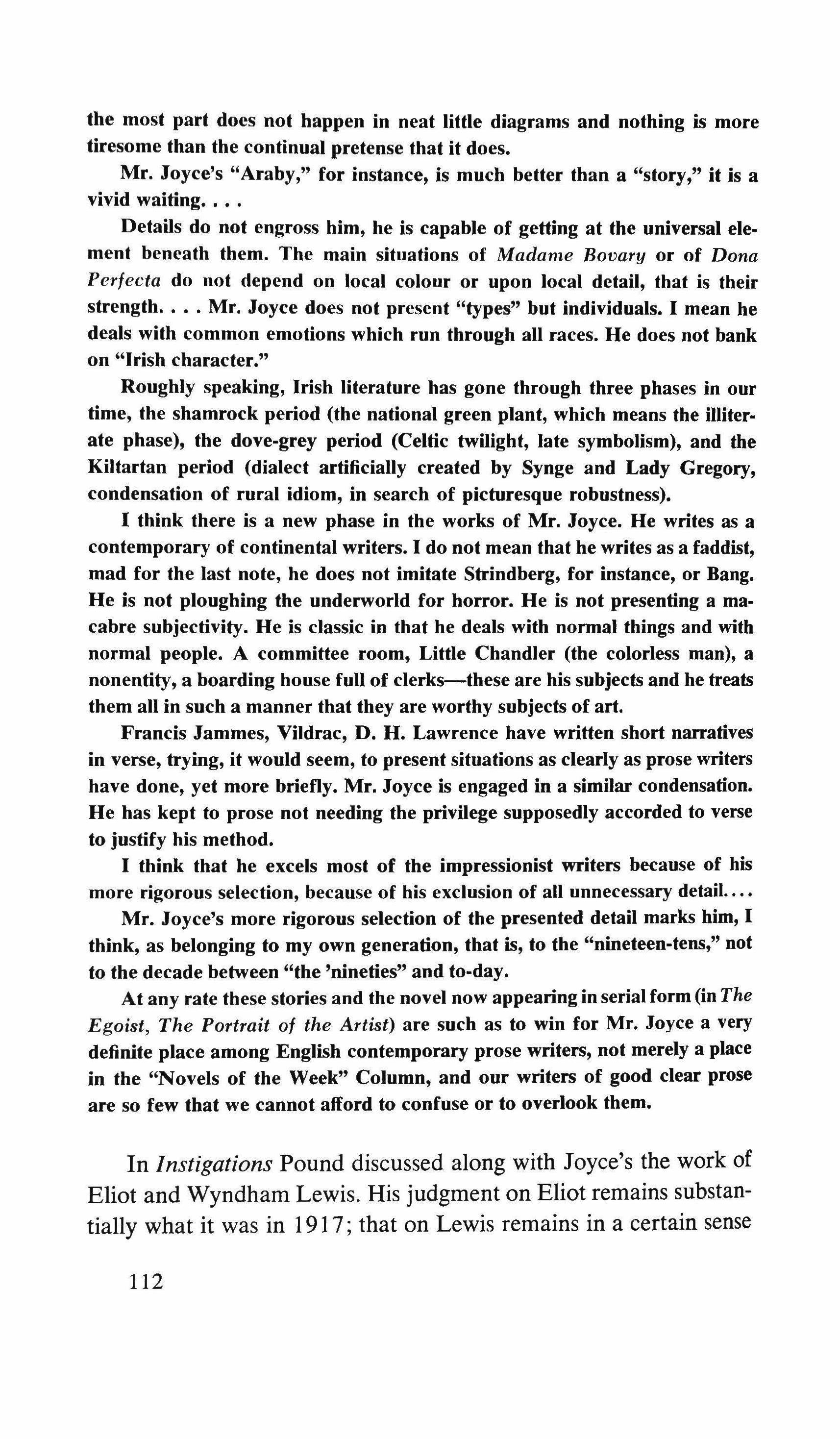
the most part does not happen in neat little diagrams and nothing is more tiresome than the continual pretense that it does.
Mr .Joyce's"Araby," for instance, is much better than a "story," it is a vivid waiting.
Details do not engross him, he is capable of getting at the universal element beneath them. The main situations of Madame Bovary or of Dona Perfecta do not depend on local colour or upon local detail, that is their strength ...• Mr .Joyce does not present "types" but individuals. I mean he deals with common emotions which run through all races. He does not bank on "Irish character."
Roughly speaking, Irish literature has gone through three phases in our time, the shamrock period (the national green plant, which means the illiterate phase), the dove-grey period (Celtic twilight, late symbolism), and the Kiltartan period (dialect artificially created by Synge and Lady Gregory, condensation of rural idiom, in search of picturesque robustness).
I think there is a new phase in the works of Mr .Joyce. He writes as a contemporary of continental writers. I do not mean that he writes as a faddist, mad for the last note, he does not imitate Strindberg, for instance, or Bang. He is not ploughing the underworld for horror. He is not presenting a macabre subjectivity. He is classic in that he deals with normal things and with normal people. A committee room, Little Chandler (the colorless man), a nonentity, a boarding house full of clerks-these are his subjects and he treats them all in such a manner that they are worthy subjects of art.
Francis .Jammes, Vildrac, D. H. Lawrence have written short narratives in verse, trying, it would seem, to present situations as clearly as prose writers have done, yet more briefly. Mr .Joyce is engaged in a similar condensation. He has kept to prose not needing the privilege supposedly accorded to verse to justify his method.
I think that he excels most of the impressionist writers because of his more rigorous selection, because of his exclusion of all unnecessary detail
Mr .Joyce's more rigorous selection of the presented detail marks him, I think, as belonging to my own generation, that is, to the "nineteen-tens," not to the decade between "the 'nineties" and to-day.
At any rate these stories and the novel now appearing in serial form (in The Egoist, The Portrait of the Artist) are such as to win for Mr .Joyce a very definite place among English contemporary prose writers, not merely a place in the "Novels of the Week" Column, and our writers of good clear prose are so few that we cannot afford to confuse or to overlook them.
In Instigations Pound discussed along with Joyce's the work of Eliot and Wyndham Lewis. His judgment on Eliot remains substantially what it was in 1917; that on Lewis remains in a certain sense
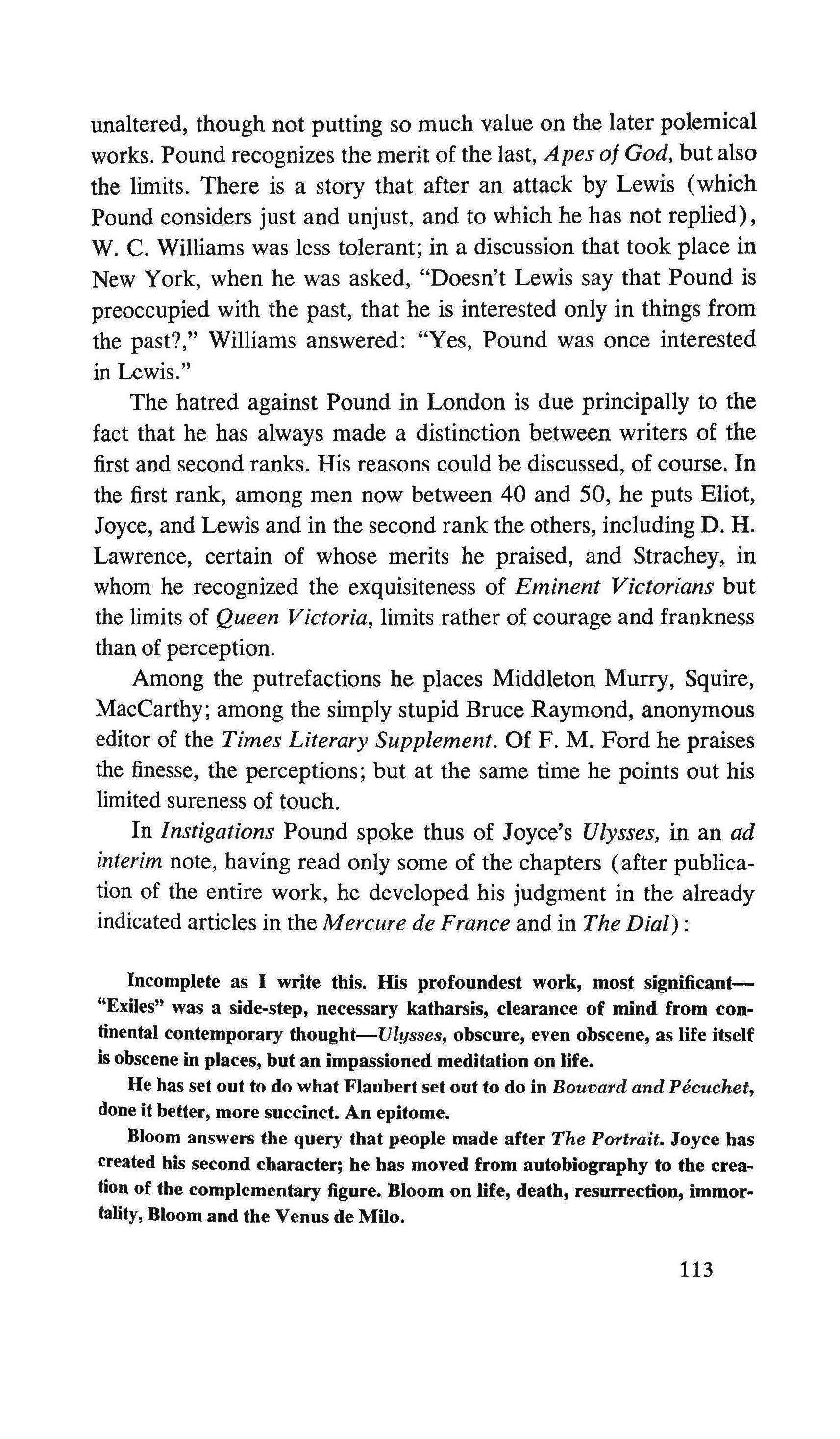
unaltered, though not putting so much value on the later polemical works. Pound recognizes the merit of the last, Apes of God, but also the limits. There is a story that after an attack by Lewis (which Pound considers just and unjust, and to which he has not replied), W. C. Williams was less tolerant; in a discussion that took place in New York, when he was asked, "Doesn't Lewis say that Pound is preoccupied with the past, that he is interested only in things from the past?," Williams answered: "Yes, Pound was once interested in Lewis."
The hatred against Pound in London is due principally to the fact that he has always made a distinction between writers of the first and second ranks. His reasons could be discussed, of course. In the first rank, among men now between 40 and 50, he puts Eliot, Joyce, and Lewis and in the second rank the others, including D. H. Lawrence, certain of whose merits he praised, and Strachey, in whom he recognized the exquisiteness of Eminent Victorians but the limits of Queen Victoria, limits rather of courage and frankness than of perception.
Among the putrefactions he places Middleton Murry, Squire, MacCarthy; among the simply stupid Bruce Raymond, anonymous editor of the Times Literary Supplement. Of F. M. Ford he praises the finesse, the perceptions; but at the same time he points out his limited sureness of touch.
In Instigations Pound spoke thus of Joyce's Ulysses, in an ad interim note, having read only some of the chapters (after publication of the entire work, he developed his judgment in the already indicated articles in the Mercure de France and in The Dial):
Incomplete as I write this. His profoundest work, most significant"Exiles" was a side-step, necessary katharsis, clearance of mind from continental contemporary thought-Ulysses, obscure, even obscene, as life itself is obscene in places, but an impassioned meditation on life.
He has set out to do what Flaubert set out to do in Bouvard and Pecuchet, done it better, more succinct. An epitome.
Bloom answers the query that people made after The Portrait .Joyce has created his second character; he has moved from autobiography to the creation of the complementary figure. Bloom on life, death, resurrection, immortality, Bloom and the Venus de Milo.
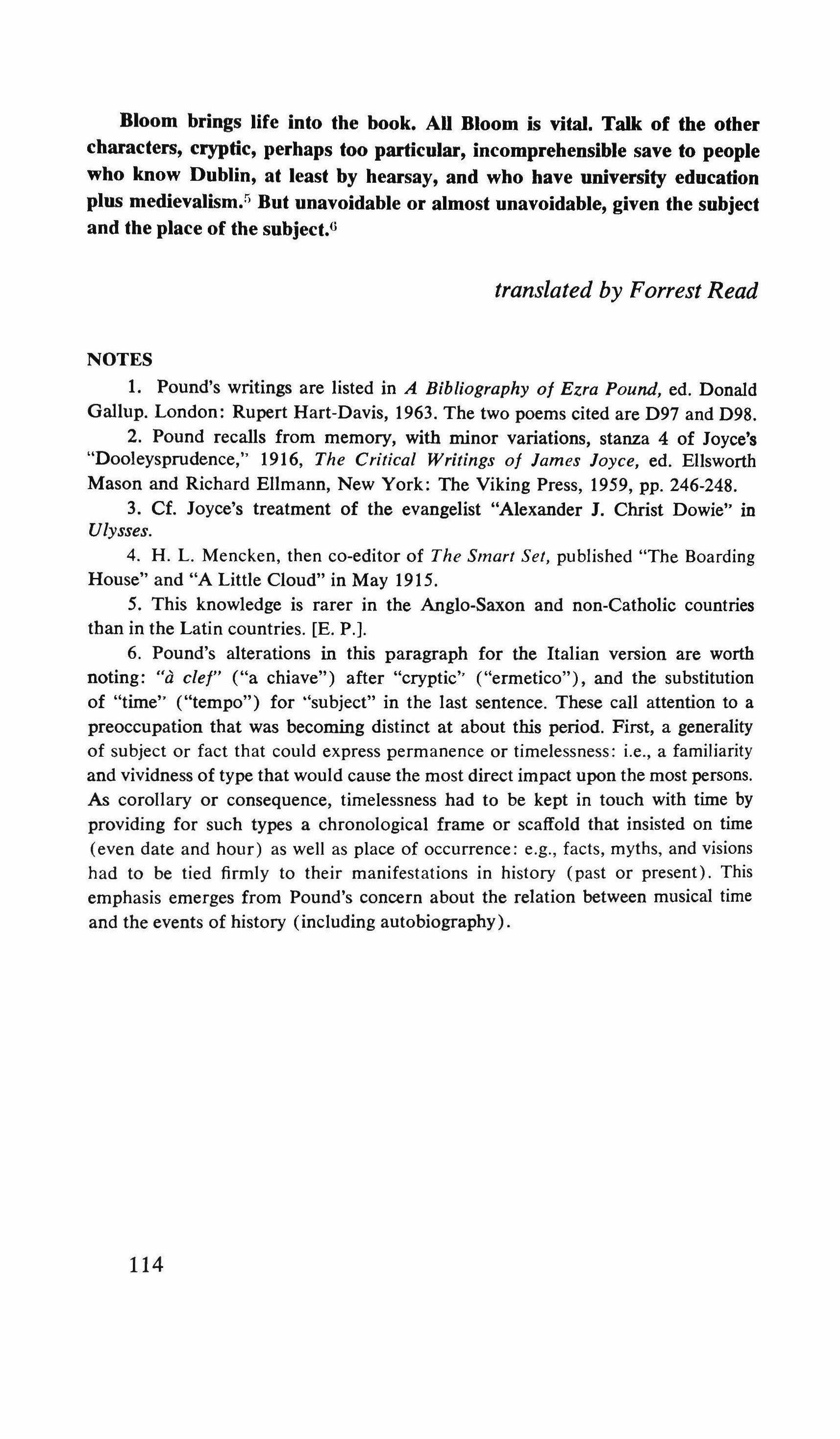
Bloom brings life into the book. AU Bloom is vital. Talk of the other characters, cryptic, perhaps too particular, incomprehensible save to people who know Dublin, at least by hearsay, and who have university education plus medievalism." But unavoidable or almost unavoidable, given the subject and the place of the subject.(i
translated by Forrest Read1. Pound's writings are listed in A Bibliography of Ezra Pound, ed. Donald Gallup. London: Rupert Hart-Davis, 1963. The two poems cited are D97 and D98.
2. Pound recalls from memory, with minor variations, stanza 4 of Joyce's "Dooleysprudence,' 1916, The Critical Writings of James Joyce, ed. Ellsworth Mason and Richard Ellmann, New York: The Viking Press, 1959, pp. 246-248.
3. Cf. Joyce's treatment of the evangelist "Alexander J. Christ Dowie" in Ulysses.
4. H. L. Mencken, then co-editor of The Smart Set, published "The Boarding House" and "A Little Cloud" in May 1915.
5. This knowledge is rarer in the Anglo-Saxon and non-Catholic countries than in the Latin countries. [E. P.].
6. Pound's alterations in this paragraph for the Italian version are worth noting: "il clef" ("a chiave") after "cryptic" ("ermetico"), and the substitution of "time" ("tempo") for "subject" in the last sentence. These call attention to a preoccupation that was becoming distinct at about this period. First, a generality of subject or fact that could express permanence or timelessness: i.e., a familiarity and vividness of type that would cause the most direct impact upon the most persons. As corollary or consequence, timelessness had to be kept in touch with time by providing for such types a chronological frame or scaffold that insisted on time (even date and hour) as well as place of occurrence: e.g., facts, myths, and visions had to be tied firmly to their manifestations in history (past or present). This emphasis emerges from Pound's concern about the relation between musical time and the events of history (including autobiography).
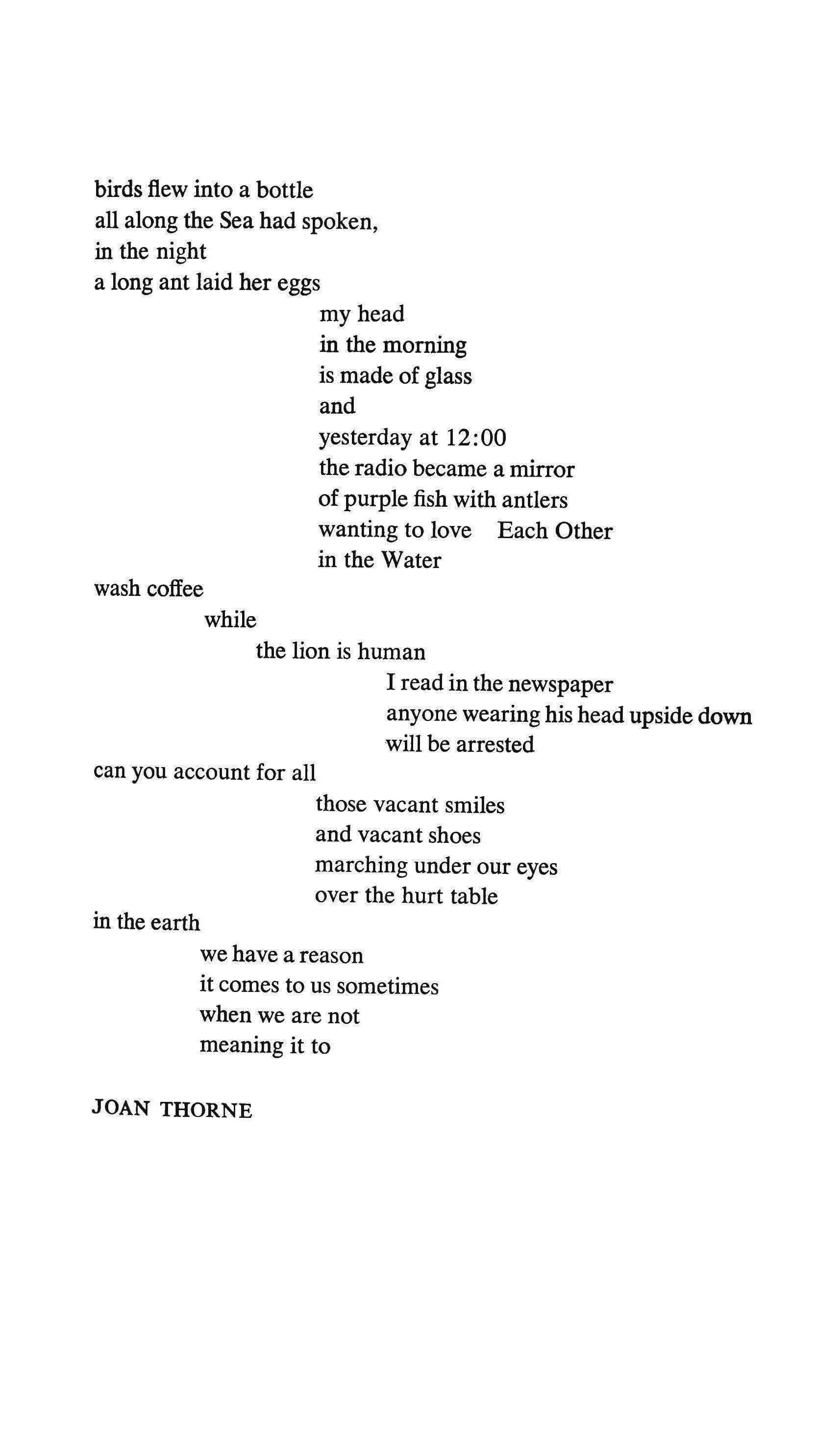
birds flew into a bottle all along the Sea had spoken, in the night a long ant laid her eggs my head in the morning is made of glass and yesterday at 12:00 the radio became a mirror of purple fish with antlers wanting to love Each Other in the Water wash coffee while the lion is human
I read in the newspaper anyone wearing his head upside down will be arrested can you account for all those vacant smiles and vacant shoes marching under our eyes over the hurt table in the earth we have a reason it comes to us sometimes when we are not meaning it to
JOAN THORNE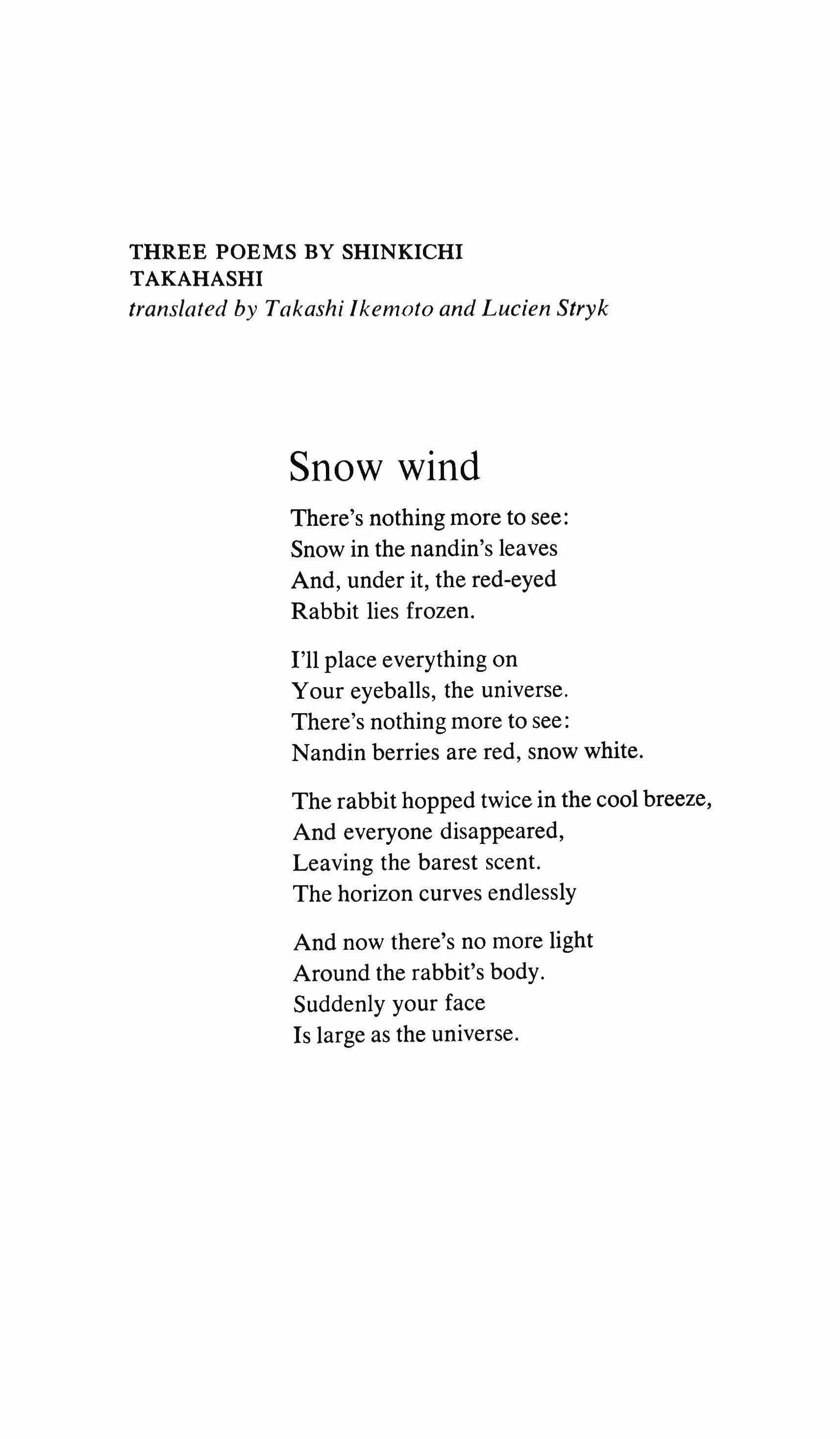
There's nothing more to see: Snow in the nandin's leaves And, under it, the red-eyed Rabbit lies frozen.
I'll place everything on Your eyeballs, the universe. There's nothing more to see: Nandin berries are red, snow white.
The rabbit hopped twice in the cool breeze, And everyone disappeared, Leaving the barest scent. The horizon curves endlessly
And now there's no more light Around the rabbit's body.
Suddenly your face Is large as the universe.
That was the best moment of the monk's life. Firm on a pile of firewood
With nothing more to say, hear, see, Smoke wrapped him, his folded hands blazed.
There was nothing more to do, the end Of everything. He remembered, as a cool breeze Streamed through him, that one is always In the same place, and that there is no time.
Suddenly a whirling mushroom cloud rose Before his singed eyes, and he was a mass Of flame. Globes, one after another, rolled out, The delighted sparrows flew round like fire balls.
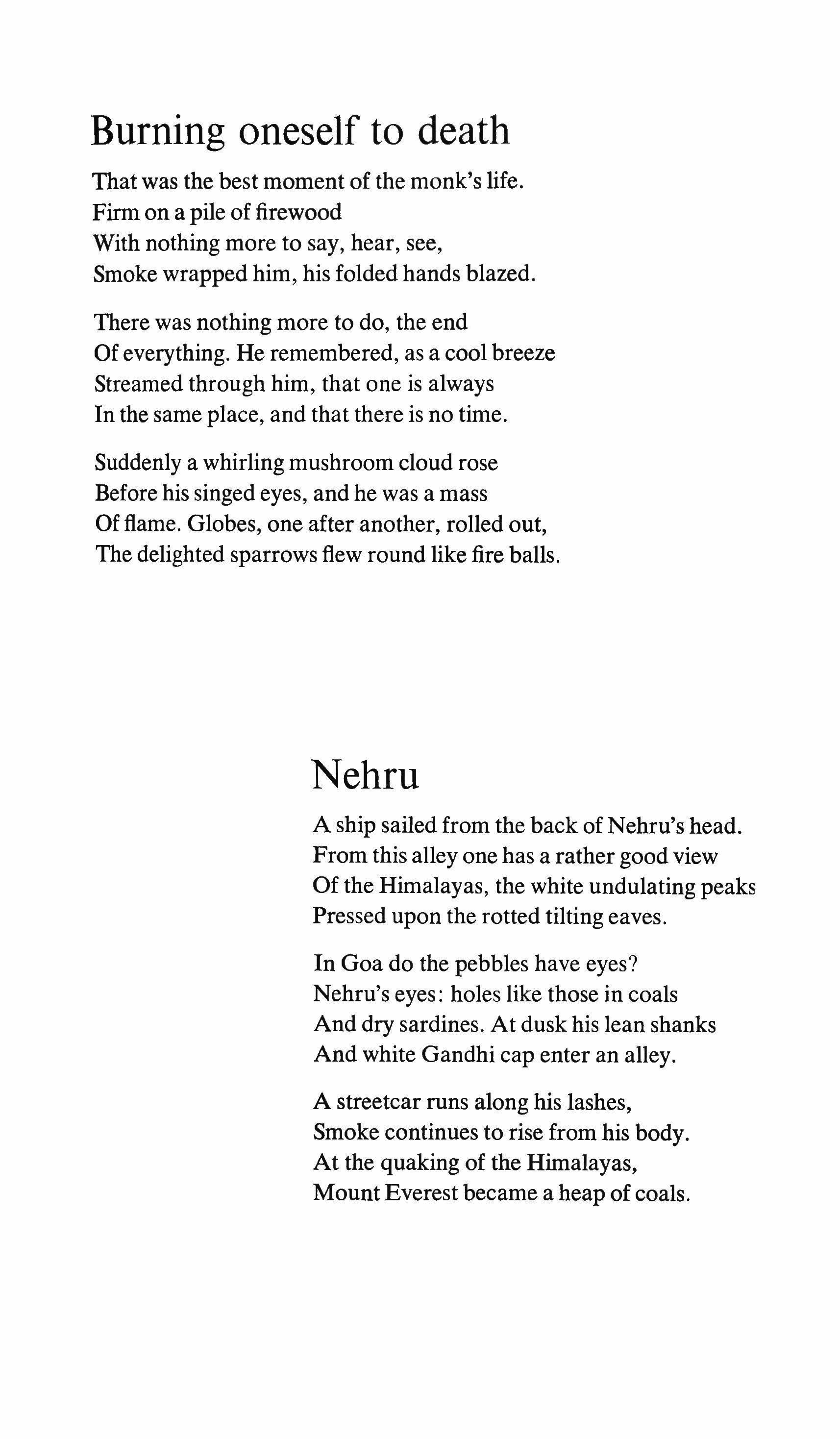
A ship sailed from the back of Nehru's head. From this alley one has a rather good view Of the Himalayas, the white undulating peaks Pressed upon the rotted tilting eaves.
In Goa do the pebbles have eyes? Nehru's eyes: holes like those in coals And dry sardines. At dusk his lean shanks And white Gandhi cap enter an alley.
A streetcar runs along his lashes, Smoke continues to rise from his body. At the quaking of the Himalayas, Mount Everest became a heap of coals.
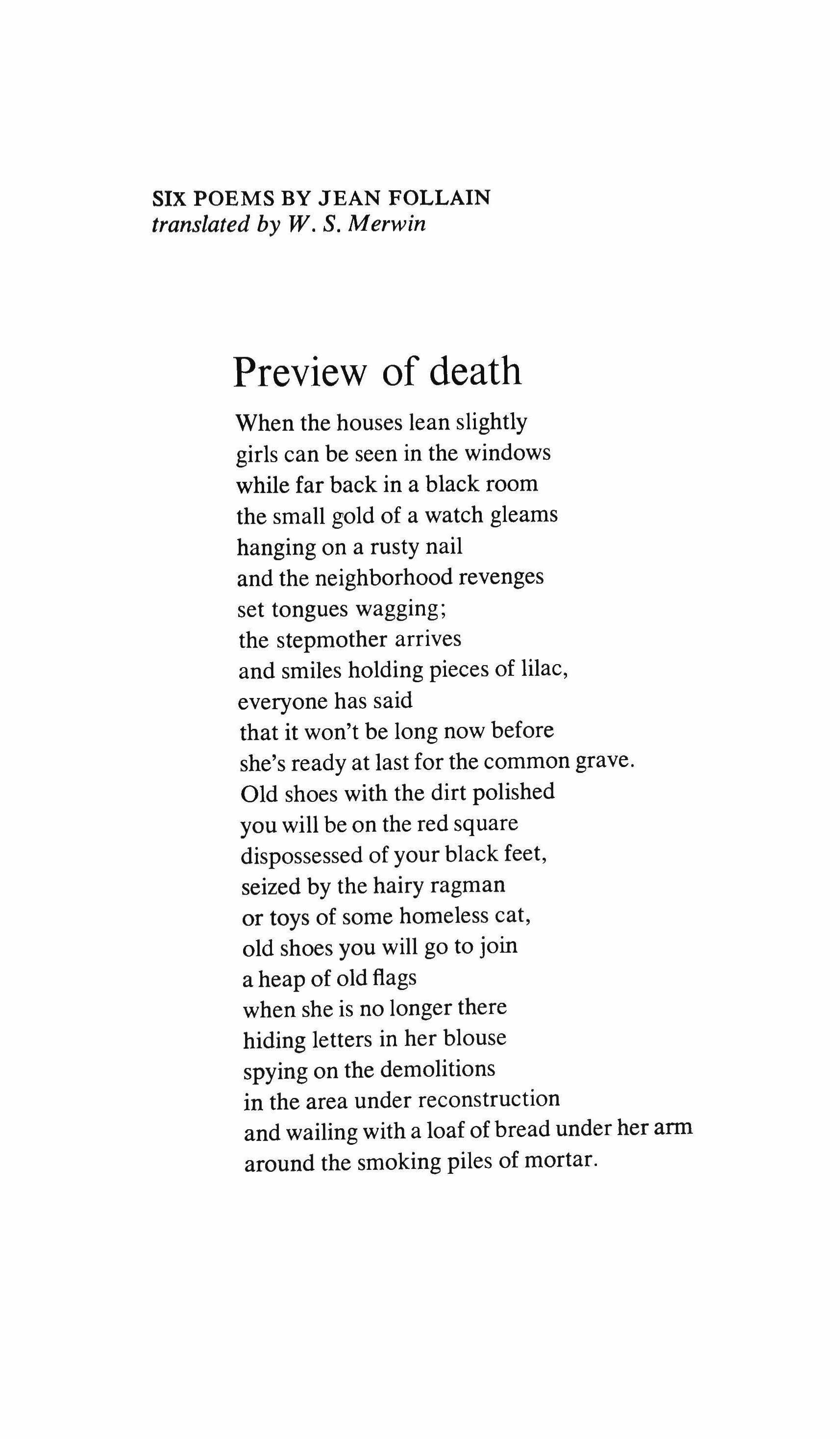
When the houses lean slightly girls can be seen in the windows while far back in a black room the small gold of a watch gleams hanging on a rusty nail and the neighborhood revenges set tongues wagging; the stepmother arrives and smiles holding pieces of lilac, everyone has said that it won't be long now before she's ready at last for the common grave. Old shoes with the dirt polished you will be on the red square dispossessed of your black feet, seized by the hairy ragman or toys of some homeless cat, old shoes you will go to join a heap of old flags when she is no longer there hiding letters in her blouse spying on the demolitions in the area under reconstruction and wailing with a loaf of bread under her arm around the smoking piles of mortar.
Above an ancient palace buried under the plain a woman is walking a serf insects with their weapons die under her feet except for a few wounded that will live till the sun is low and the hour when a man hungry for dark jugged hare heaves to his shoulder the grave-digger's spade. It will still take years before the monument is disinterred from the red soil ravaged by rains and winds.
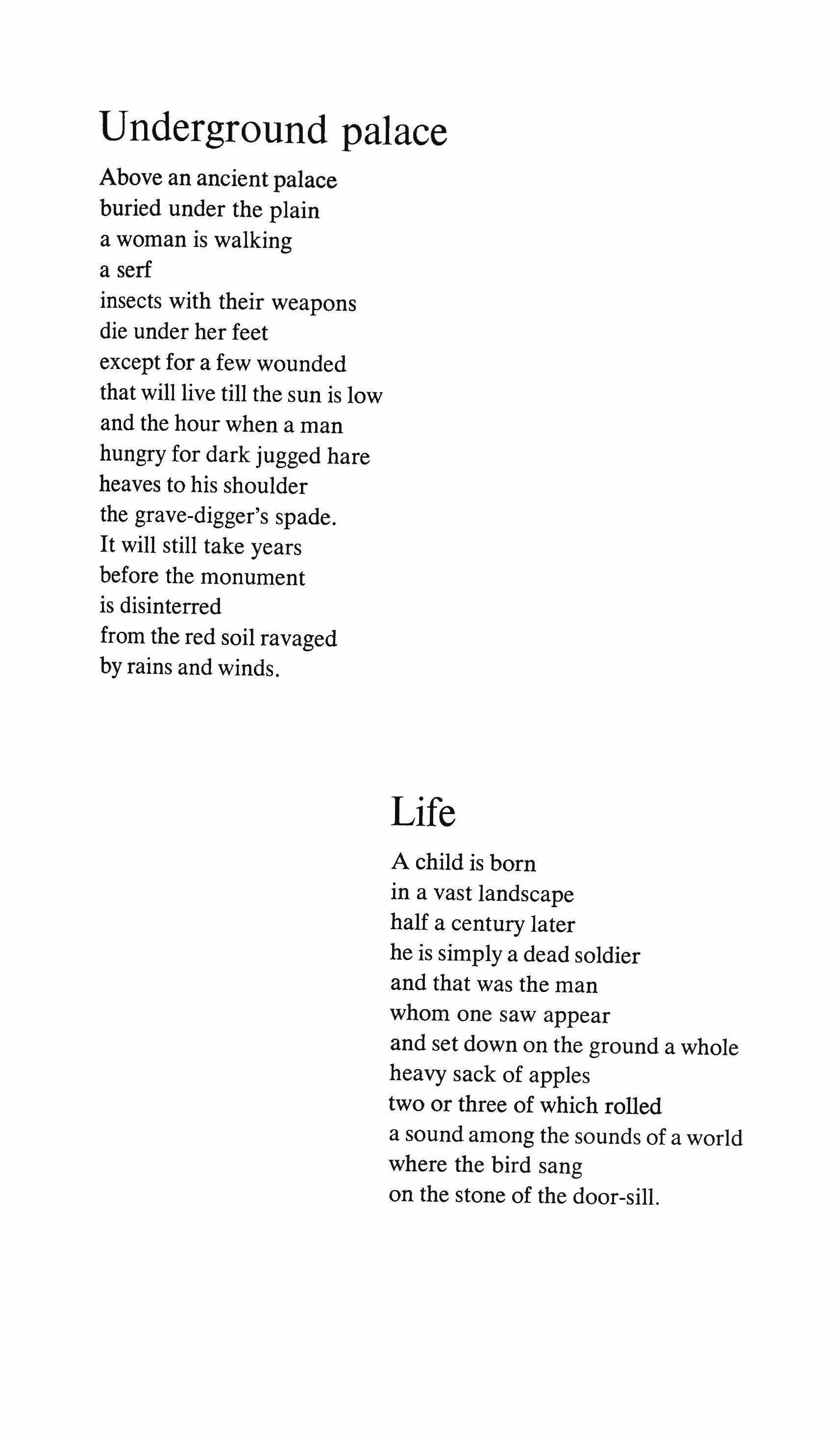
A child is born in a vast landscape half a century later he is simply a dead soldier and that was the man whom one saw appear and set down on the ground a whole heavy sack of apples two or three of which rolled a sound among the sounds of a world where the bird sang on the stone of the door-sill.
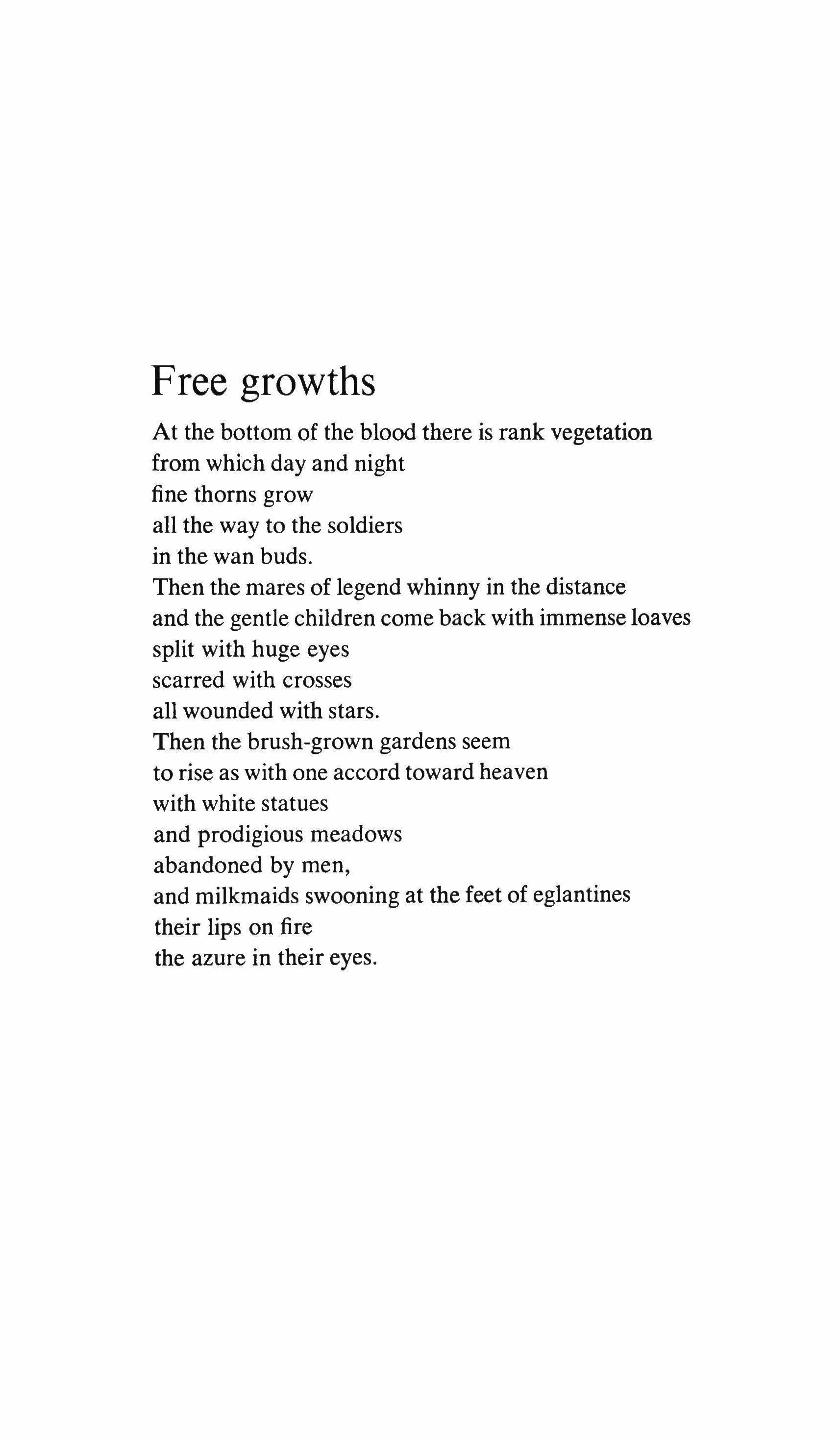
At the bottom of the blood there is rank vegetation from which day and night fine thorns grow all the way to the soldiers in the wan buds.
Then the mares of legend whinny in the distance and the gentle children come back with immense loaves split with huge eyes scarred with crosses all wounded with stars.
Then the brush-grown gardens seem to rise as with one accord toward heaven with white statues and prodigious meadows abandoned by men, and milkmaids swooning at the feet of eglantines their lips on fire the azure in their eyes.
The man went out to look his companion's skin shivered near flowers never naked except this evening the burnished harrows went past; back in the room used for everything he studied a face and torso hardly worn the dress laid aside for a moment looked to him like the black flag in the days of anarchy and old parents.
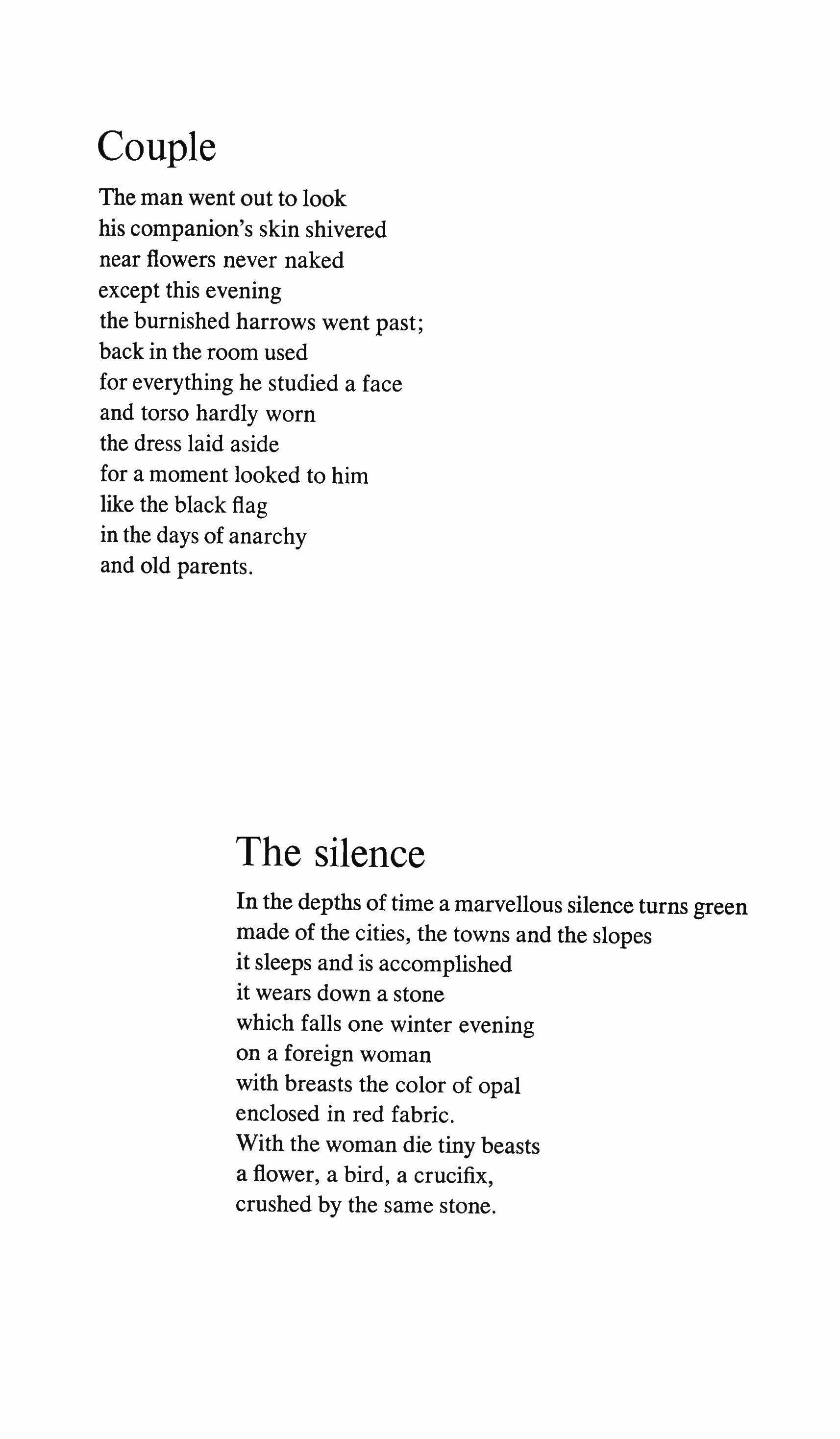
In the depths of time a marvellous silence turns green made of the cities, the towns and the slopes it sleeps and is accomplished it wears down a stone which falls one winter evening on a foreign woman with breasts the color of opal enclosed in red fabric. With the woman die tiny beasts a flower, a bird, a crucifix, crushed by the same stone.
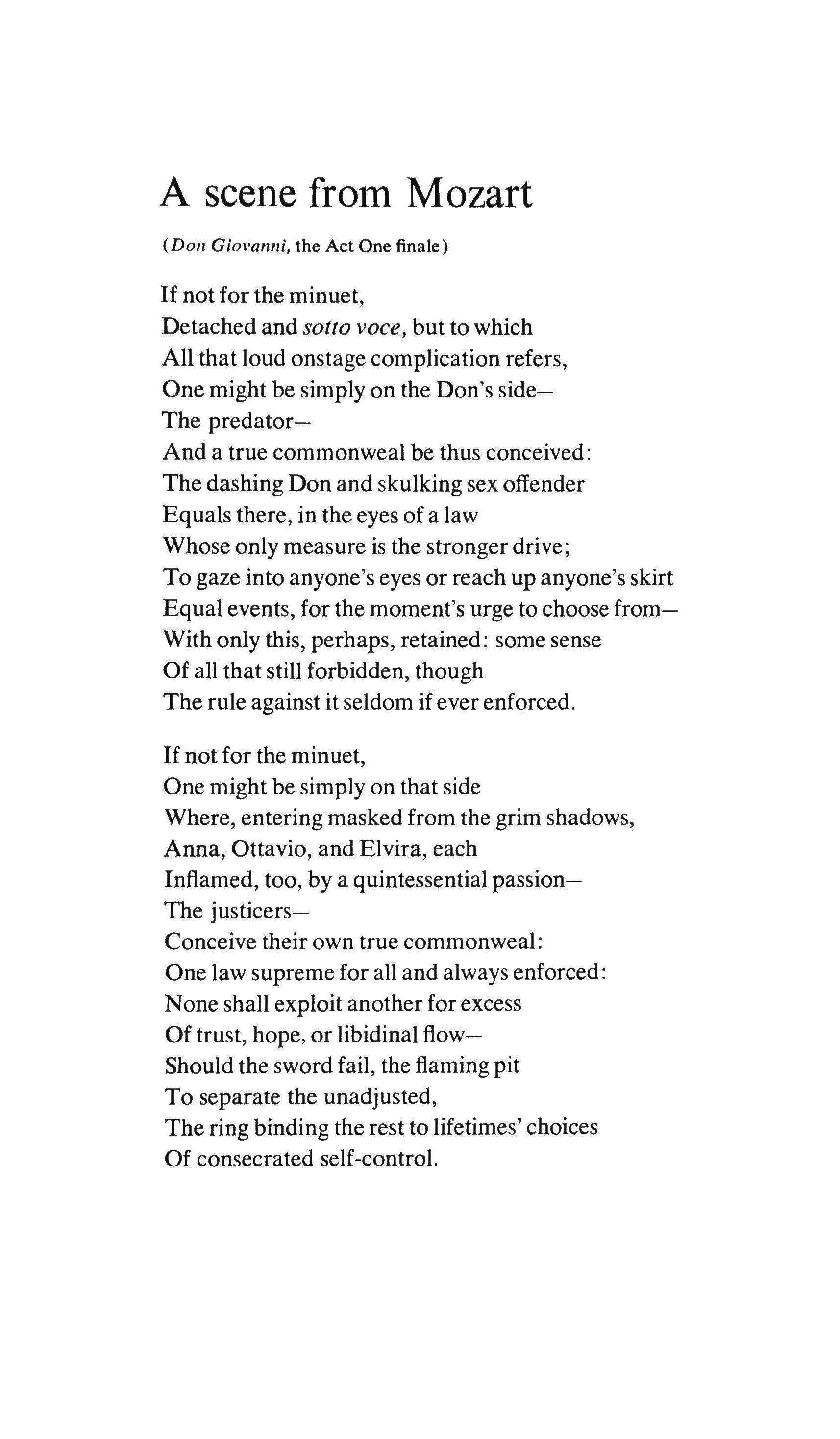
(Don Giovanni, the Act One finale)
If not for the minuet,
Detached and sotto voce, but to which All that loud onstage complication refers, One might be simply on the Don's side
The predator-
And a true commonweal be thus conceived: The dashing Don and skulking sex offender
Equals there, in the eyes of a law
Whose only measure is the stronger drive; To gaze into anyone's eyes or reach up anyone's skirt
Equal events, for the moment's urge to choose from
With only this, perhaps, retained: some sense Of all that still forbidden, though The rule against it seldom if ever enforced.
If not for the minuet,
One might be simply on that side
Where, entering masked from the grim shadows, Anna, Ottavio, and Elvira, each Inflamed, too, by a quintessential passion
The justicers-
Conceive their own true commonweal:
One law supreme for all and always enforced: None shall exploit another for excess
Of trust, hope, or libidinal flow
Should the sword fail, the flaming pit
To separate the unadjusted, The ring binding the rest to lifetimes' choices
Of consecrated self-control.
But Mozart the frustrate, Mozart the exploitee Knew better. To whatever heights and depths
One passion or the other drives the singers, All are but tangents to that quietly Exact and so exacting minuet
By which he says, louder than all his singers: Be only and most simply on my sideThe composer.
MARTIN HALPERN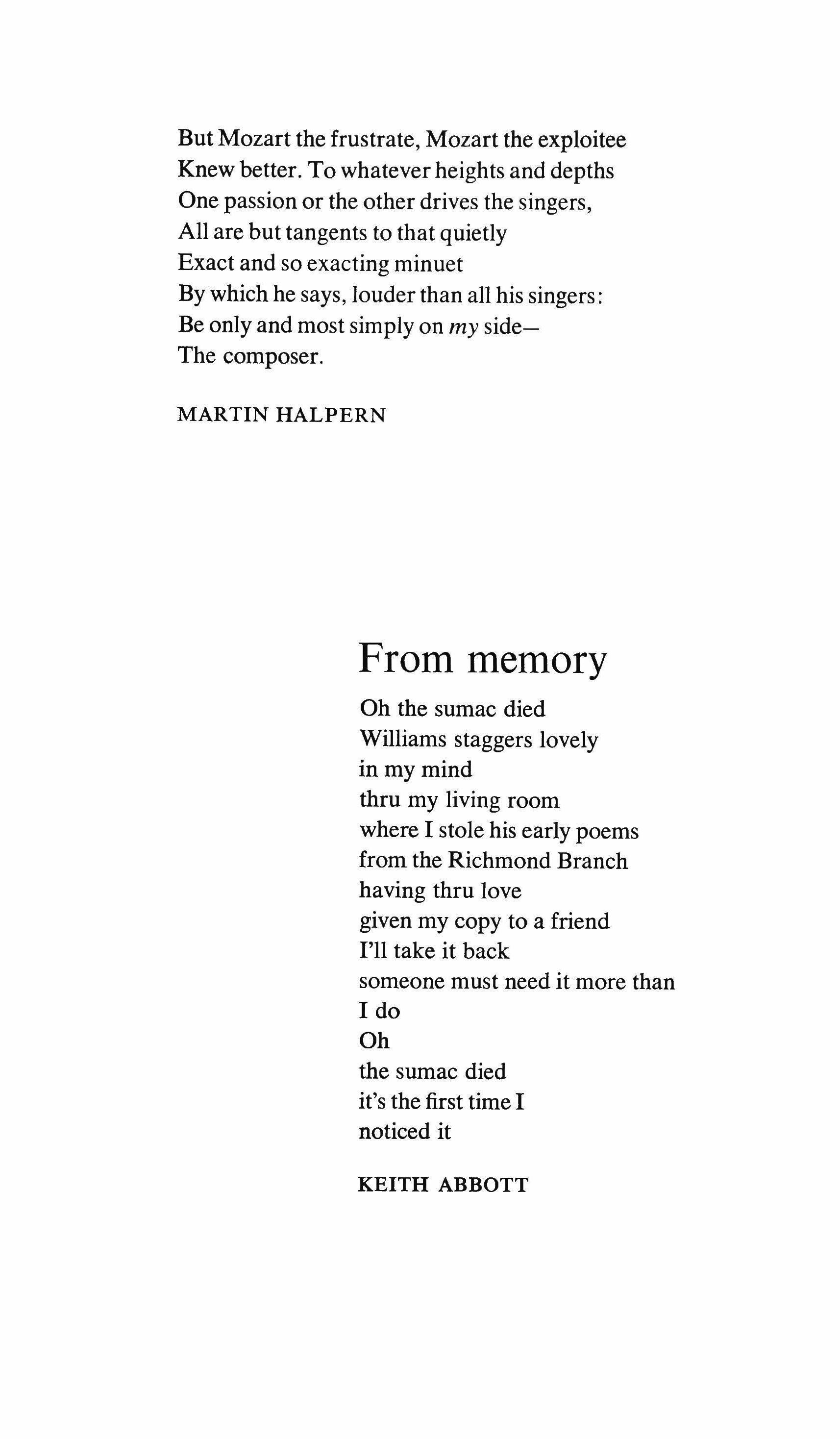
Oh the sumac died Williams staggers lovely in my mind thru my living room where I stole his early poems from the Richmond Branch having thru love given my copy to a friend I'll take it back someone must need it more than I do
Oh the sumac died it's the first time I noticed it
KEITH ABBOTT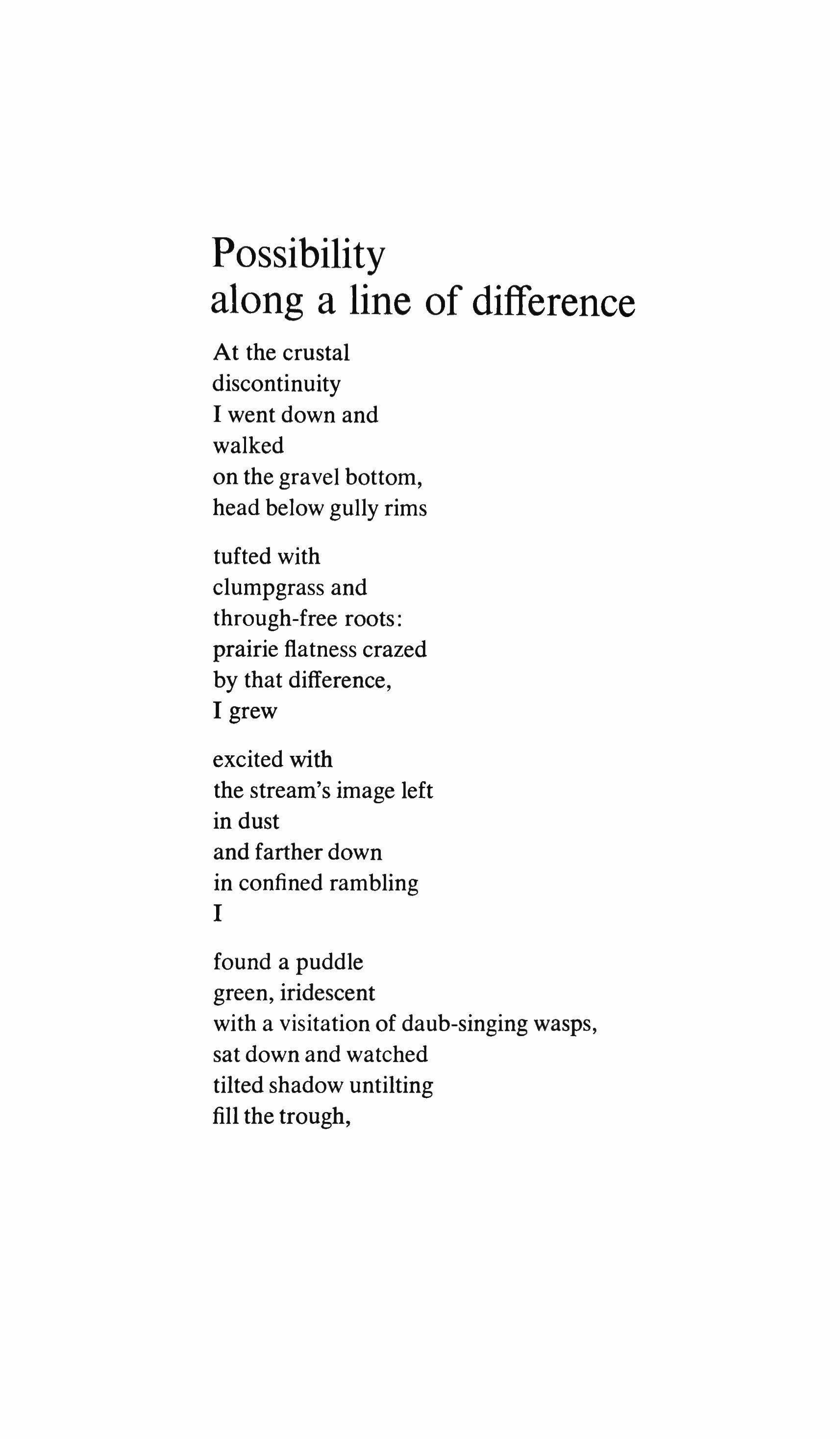
At the crustal discontinuity
I went down and walked on the gravel bottom, head below gully rims tufted with clumpgrass and through-free roots: prairie flatness crazed by that difference, I grew excited with the stream's image left in dust and farther down in confined rambling
I found a puddle green, iridescent with a visitation of daub-singing wasps, sat down and watched tilted shadow untilting fill the trough,
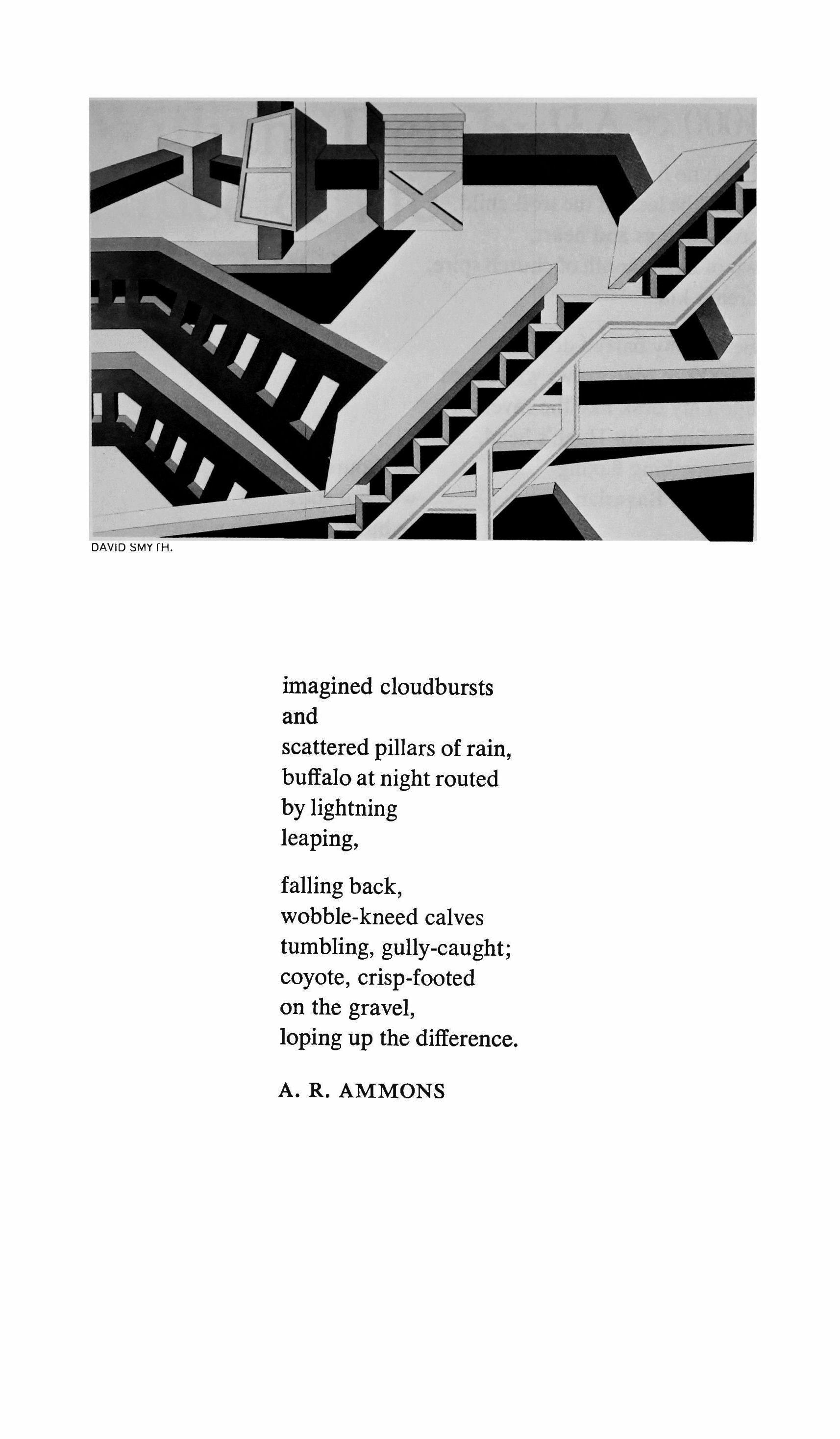
imagined cloudbursts and scattered pillars of rain, buffalo at night routed by lightning leaping, falling back, wobble-kneed calves tumbling, gully-caught; coyote, crisp-footed on the gravel, loping up the difference.
A. R. AMMONS DAVID SMY [H.I post no hours, hear no plaintsthis is the land of the troll-child, crooked legs and heart, wit of hawk, tooth of church spire, dream kill.
Behind my barred door a 1000 cc bike grows will-bones upon my desk like the raven guarding Saint Hugh's head, or something flexing in a wild Bavarian tower.
Lives ago it was a viking ship with kraken guts, keel and ribs from blue clay dug and fit. It dreamed to Greenland.
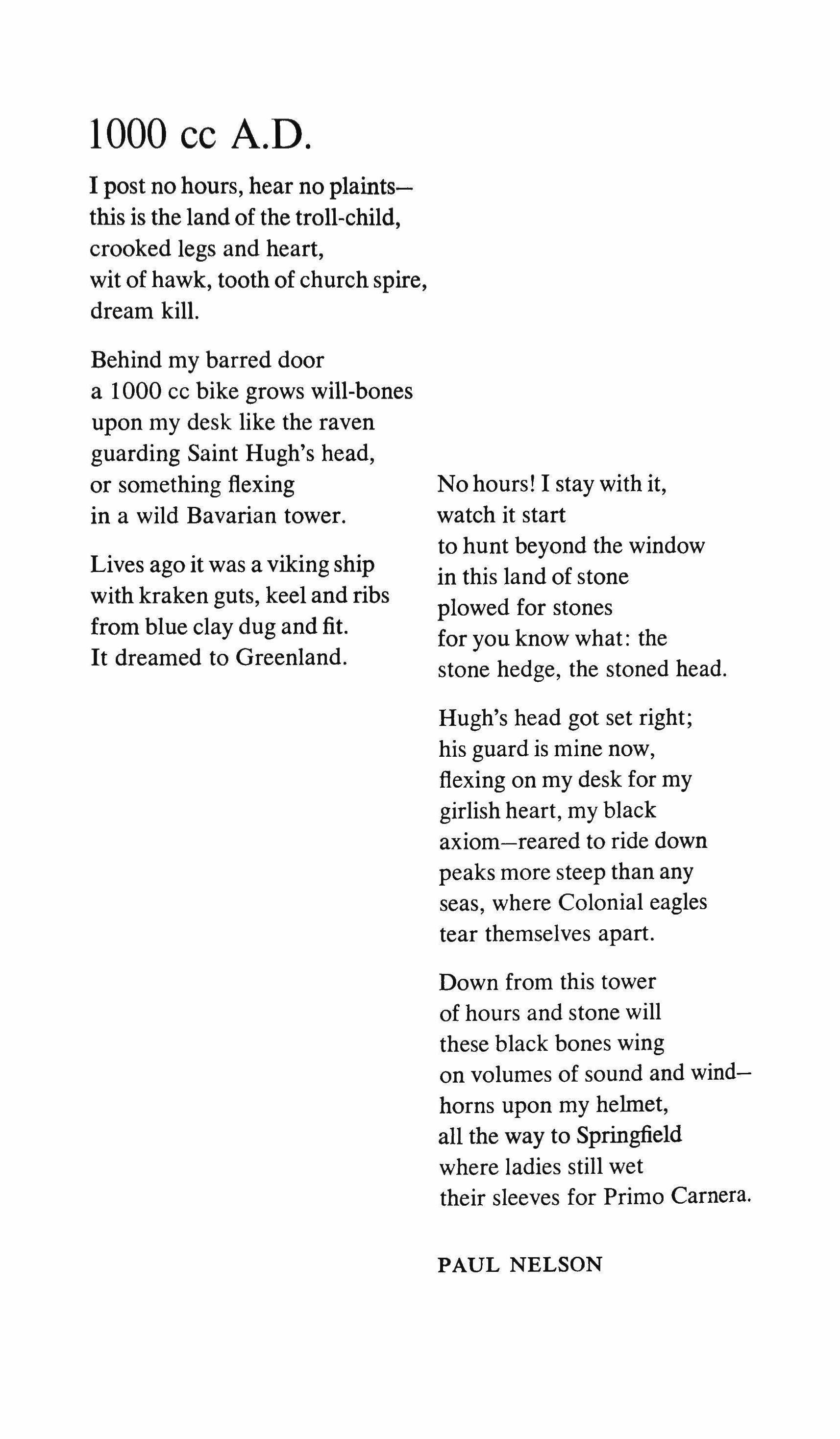
No hours! I stay with it, watch it start to hunt beyond the window in this land of stone plowed for stones for you know what: the stone hedge, the stoned head.
Hugh's head got set right; his guard is mine now, flexing on my desk for my girlish heart, my black axiom-reared to ride down peaks more steep than any seas, where Colonial eagles tear themselves apart.
Down from this tower of hours and stone will these black bones wing on volumes of sound and windhorns upon my helmet, all the way to Springfield where ladies still wet their sleeves for Primo Carnera.
PAUL NELSON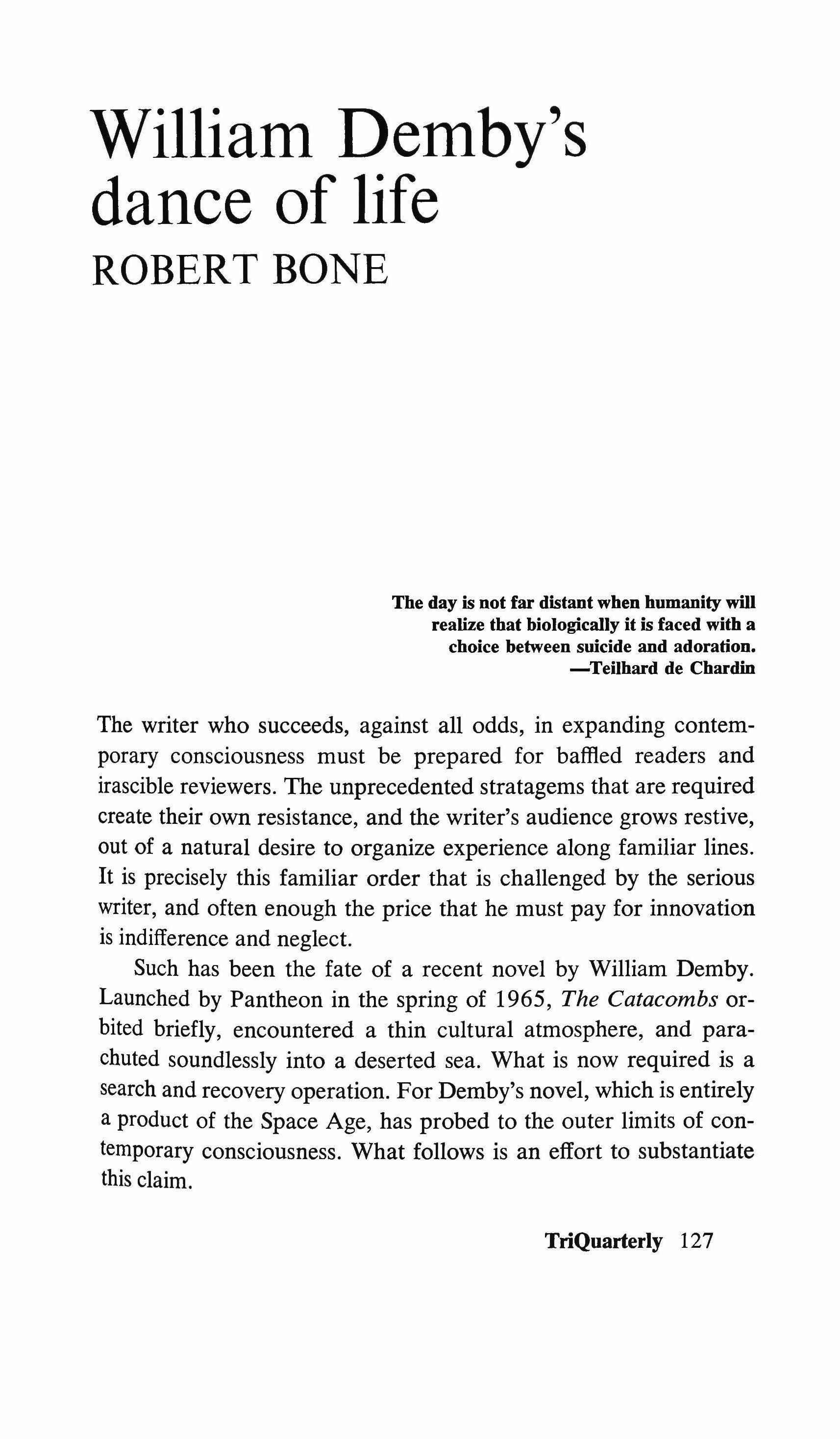
The day is not far distant when humanity will realize that biologically it is faced with a choice between suicide and adoration.
-Teilhard de ChardinThe writer who succeeds, against all odds, in expanding contemporary consciousness must be prepared for baffled readers and irascible reviewers. The unprecedented stratagems that are required create their own resistance, and the writer's audience grows restive, out of a natural desire to organize experience along familiar lines. It is precisely this familiar order that is challenged by the serious writer, and often enough the price that he must pay for innovation is indifference and neglect.
Such has been the fate of a recent novel by William Demby. Launched by Pantheon in the spring of 1965, The Catacombs orbited briefly, encountered a thin cultural atmosphere, and parachuted soundlessly into a deserted sea. What is now required is a search and recovery operation. For Demby's novel, which is entirely a product of the Space Age, has probed to the outer limits of contemporary consciousness. What follows is an effort to substantiate this claim.
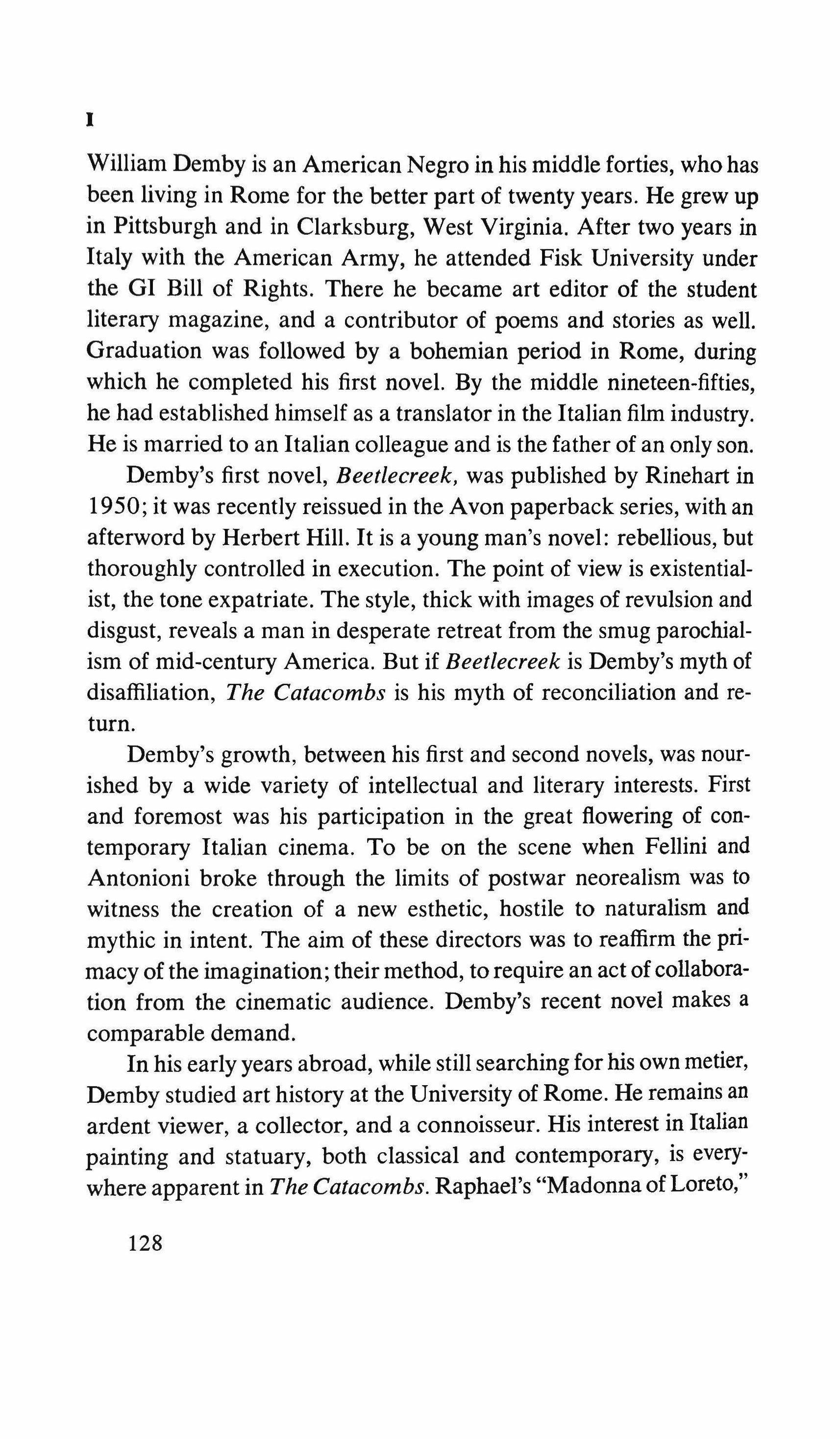
William Demby is an American Negro in his middle forties, who has been living in Rome for the better part of twenty years. He grew up in Pittsburgh and in Clarksburg, West Virginia. After two years in Italy with the American Army, he attended Fisk University under the GI Bill of Rights. There he became art editor of the student literary magazine, and a contributor of poems and stories as well. Graduation was followed by a bohemian period in Rome, during which he completed his first novel. By the middle nineteen-fifties, he had established himself as a translator in the Italian film industry. He is married to an Italian colleague and is the father of an only son.
Demby's first novel, Beetlecreek, was published by Rinehart in 1950; it was recently reissued in the Avon paperback series, with an afterword by Herbert Hill. It is a young man's novel: rebellious, but thoroughly controlled in execution. The point of view is existentialist, the tone expatriate. The style, thick with images of revulsion and disgust, reveals a man in desperate retreat from the smug parochialism of mid-century America. But if Beetlecreek is Demby's myth of disaffiliation, The Catacombs is his myth of reconciliation and return.
Demby's growth, between his first and second novels, was nourished by a wide variety of intellectual and literary interests. First and foremost was his participation in the great flowering of contemporary Italian cinema. To be on the scene when Fellini and Antonioni broke through the limits of postwar neorealism was to witness the creation of a new esthetic, hostile to naturalism and mythic in intent. The aim of these directors was to reaffirm the primacy of the imagination; their method, to require an act ofcollaboration from the cinematic audience. Demby's recent novel makes a comparable demand.
In his early years abroad, while still searching for his own metier, Demby studied art history at the University of Rome. He remains an ardent viewer, a collector, and a connoisseur. His interest in Italian painting and statuary, both classical and contemporary, is everywhere apparent in The Catacombs. Raphael's "Madonna of Loreto,"
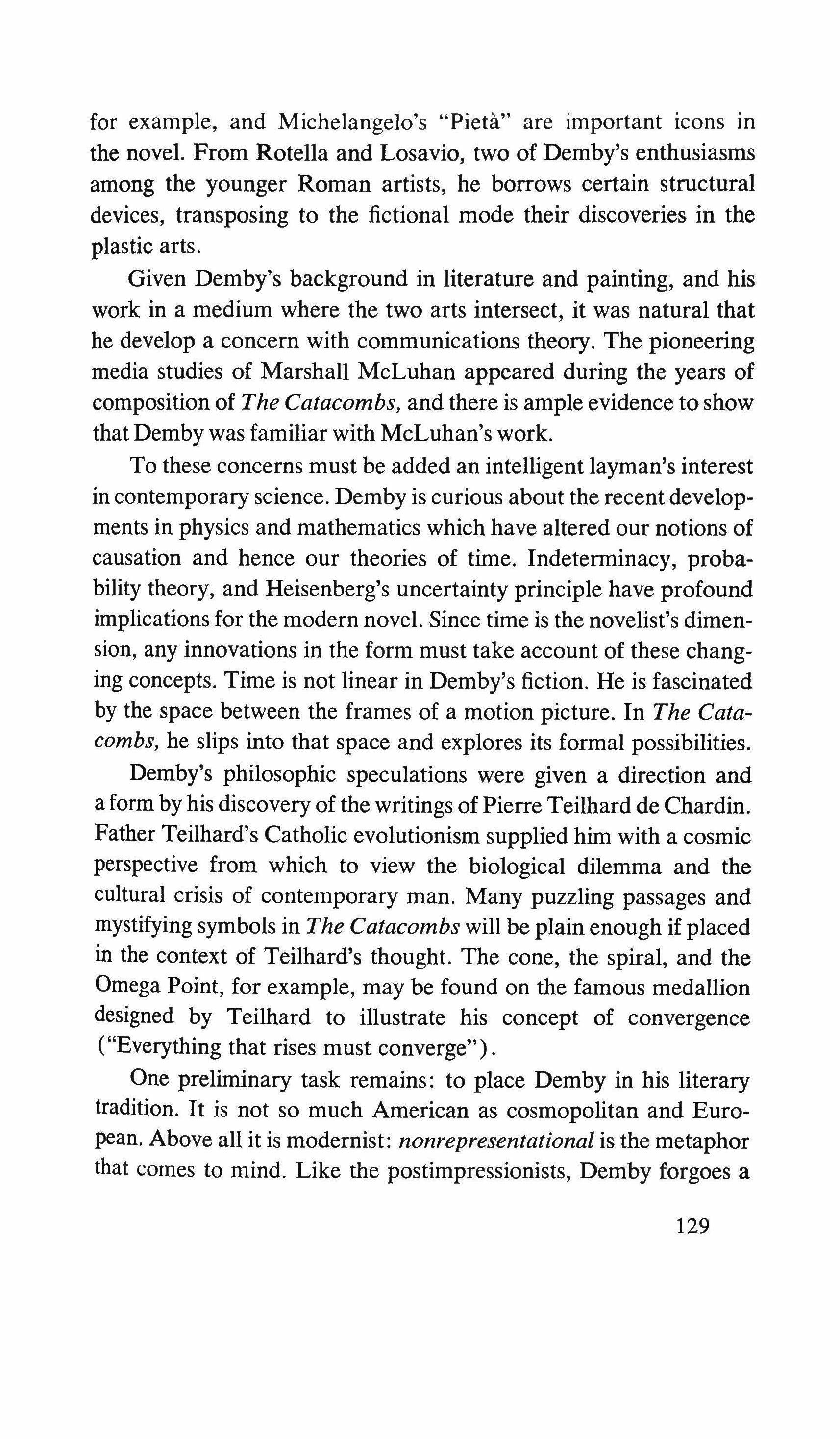
for example, and Michelangelo's "Pieta" are important icons in the novel. From Rotella and Losavio, two of Demby's enthusiasms among the younger Roman artists, he borrows certain structural devices, transposing to the fictional mode their discoveries in the plastic arts.
Given Demby's background in literature and painting, and his work in a medium where the two arts intersect, it was natural that he develop a concern with communications theory. The pioneering media studies of Marshall McLuhan appeared during the years of composition of The Catacombs, and there is ample evidence to show that Demby was familiar with McLuhan's work.
To these concerns must be added an intelligent layman's interest in contemporary science. Demby is curious about the recent developments in physics and mathematics which have altered our notions of causation and hence our theories of time. Indeterminacy, probability theory, and Heisenberg'S uncertainty principle have profound implications for the modern novel. Since time is the novelist's dimension, any innovations in the form must take account of these changing concepts. Time is not linear in Demby's fiction. He is fascinated by the space between the frames of a motion picture. In The Catacombs, he slips into that space and explores its formal possibilities. Demby's philosophic speculations were given a direction and a form by his discovery of the writings of Pierre Teilhard de Chardin. Father Teilhard's Catholic evolutionism supplied him with a cosmic perspective from which to view the biological dilemma and the cultural crisis of contemporary man. Many puzzling passages and mystifying symbols in The Catacombs will be plain enough if placed in the context of Teilhard's thought. The cone, the spiral, and the Omega Point, for example, may be found on the famous medallion designed by Teilhard to illustrate his concept of convergence ("Everything that rises must converge").
One preliminary task remains: to place Demby in his literary tradition. It is not so much American as cosmopolitan and European. Above all it is modernist: nonrepresentational is the metaphor that comes to mind. Like the postimpressionists, Demby forgoes a
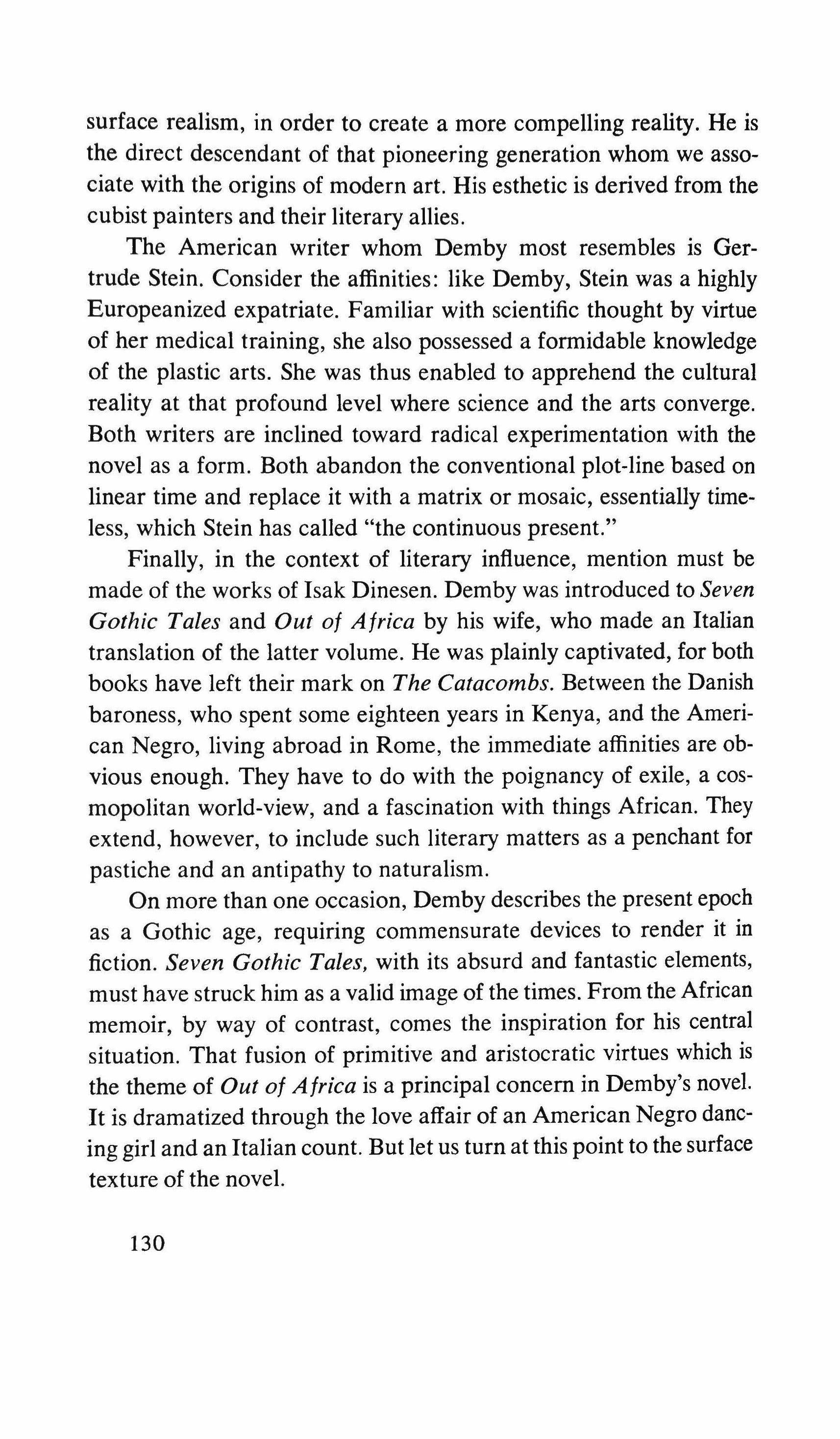
surface realism, in order to create a more compelling reality. He is the direct descendant of that pioneering generation whom we associate with the origins of modern art. His esthetic is derived from the cubist painters and their literary allies.
The American writer whom Demby most resembles is Gertrude Stein. Consider the affinities: like Demby, Stein was a highly Europeanized expatriate. Familiar with scientific thought by virtue of her medical training, she also possessed a formidable knowledge of the plastic arts. She was thus enabled to apprehend the cultural reality at that profound level where science and the arts converge. Both writers are inclined toward radical experimentation with the novel as a form. Both abandon the conventional plot-line based on linear time and replace it with a matrix or mosaic, essentially timeless, which Stein has called "the continuous present."
Finally, in the context of literary influence, mention must be made of the works of Isak Dinesen. Demby was introduced to Seven Gothic Tales and Out of Africa by his wife, who made an Italian translation of the latter volume. He was plainly captivated, for both books have left their mark on The Catacombs. Between the Danish baroness, who spent some eighteen years in Kenya, and the American Negro, living abroad in Rome, the immediate affinities are obvious enough. They have to do with the poignancy of exile, a cosmopolitan world-view, and a fascination with things African. They extend, however, to include such literary matters as a penchant for pastiche and an antipathy to naturalism.
On more than one occasion, Demby describes the present epoch as a Gothic age, requiring commensurate devices to render it in fiction. Seven Gothic Tales, with its absurd and fantastic elements, must have struck him as a valid image of the times. From the African memoir, by way of contrast, comes the inspiration for his central situation. That fusion of primitive and aristocratic virtues which is the theme of Out of Africa is a principal concern in Demby's novel. It is dramatized through the love affair of an American Negro dancing girl and an Italian count. But let us turn at this point to the surface texture of the novel.
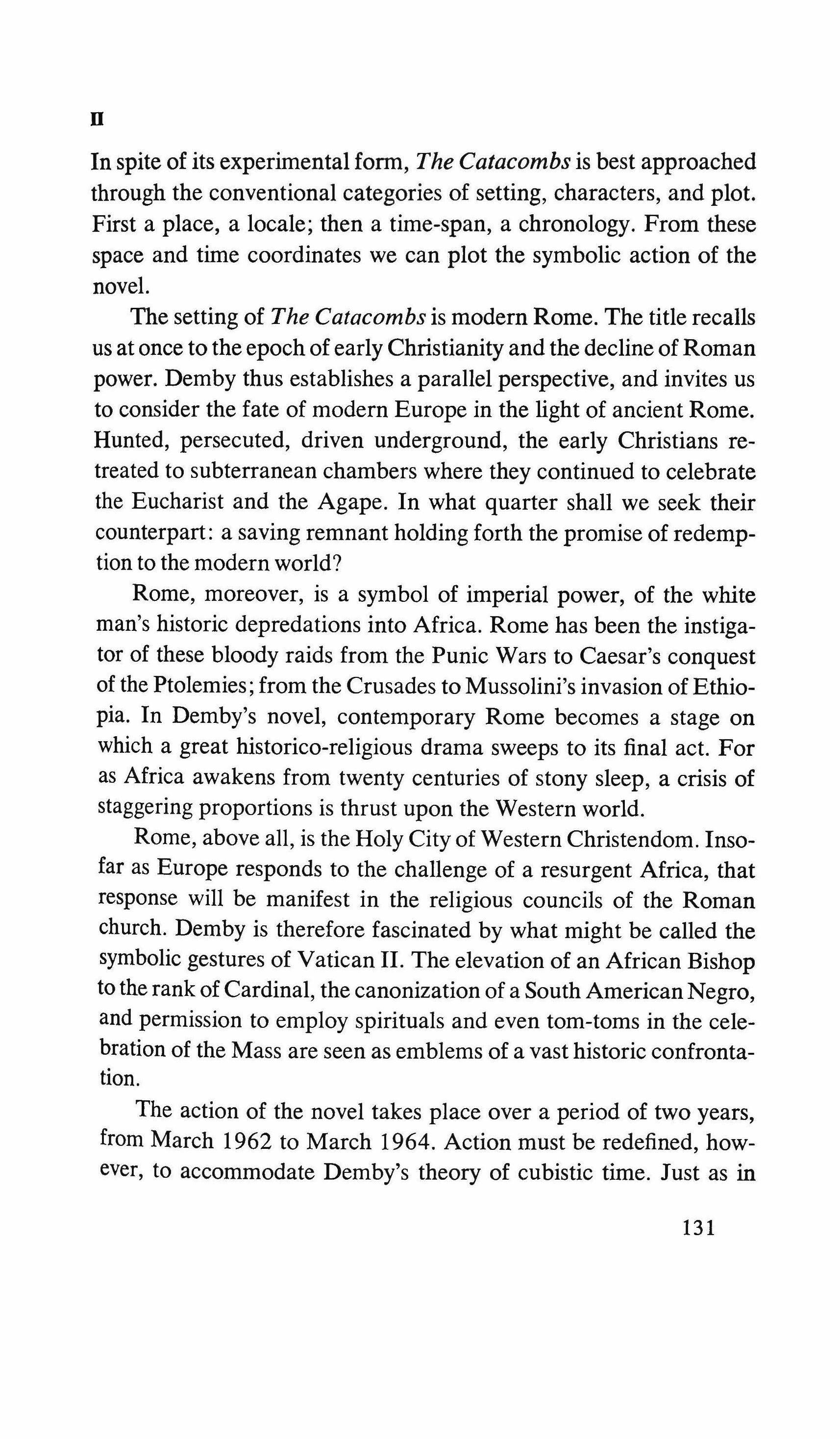
In spite of its experimental form, The Catacombs is best approached through the conventional categories of setting, characters, and plot. First a place, a locale; then a time-span, a chronology. From these space and time coordinates we can plot the symbolic action of the novel.
The setting of The Catacombs is modern Rome. The title recalls us at once to the epoch of early Christianity and the decline of Roman power. Demby thus establishes a parallel perspective, and invites us to consider the fate of modern Europe in the light of ancient Rome. Hunted, persecuted, driven underground, the early Christians retreated to subterranean chambers where they continued to celebrate the Eucharist and the Agape. In what quarter shall we seek their counterpart: a saving remnant holding forth the promise of redemption to the modern world?
Rome, moreover, is a symbol of imperial power, of the white man's historic depredations into Africa. Rome has been the instigator of these bloody raids from the Punic Wars to Caesar's conquest of the Ptolemies; from the Crusades to Mussolini's invasion of Ethiopia. In Demby's novel, contemporary Rome becomes a stage on which a great historico-religious drama sweeps to its final act. For as Africa awakens from twenty centuries of stony sleep, a crisis of staggering proportions is thrust upon the Western world.
Rome, above all, is the Holy City of Western Christendom. Insofar as Europe responds to the challenge of a resurgent Africa, that response will be manifest in the religious councils of the Roman church. Demby is therefore fascinated by what might be called the symbolic gestures of Vatican II. The elevation of an African Bishop to the rank of Cardinal, the canonization of a South American Negro, and permission to employ spirituals and even tom-toms in the celebration of the Mass are seen as emblems of a vast historic confrontation.
The action of the novel takes place over a period of two years, from March 1962 to March 1964. Action must be redefined, however, to accommodate Demby's theory of cubistic time. Just as in
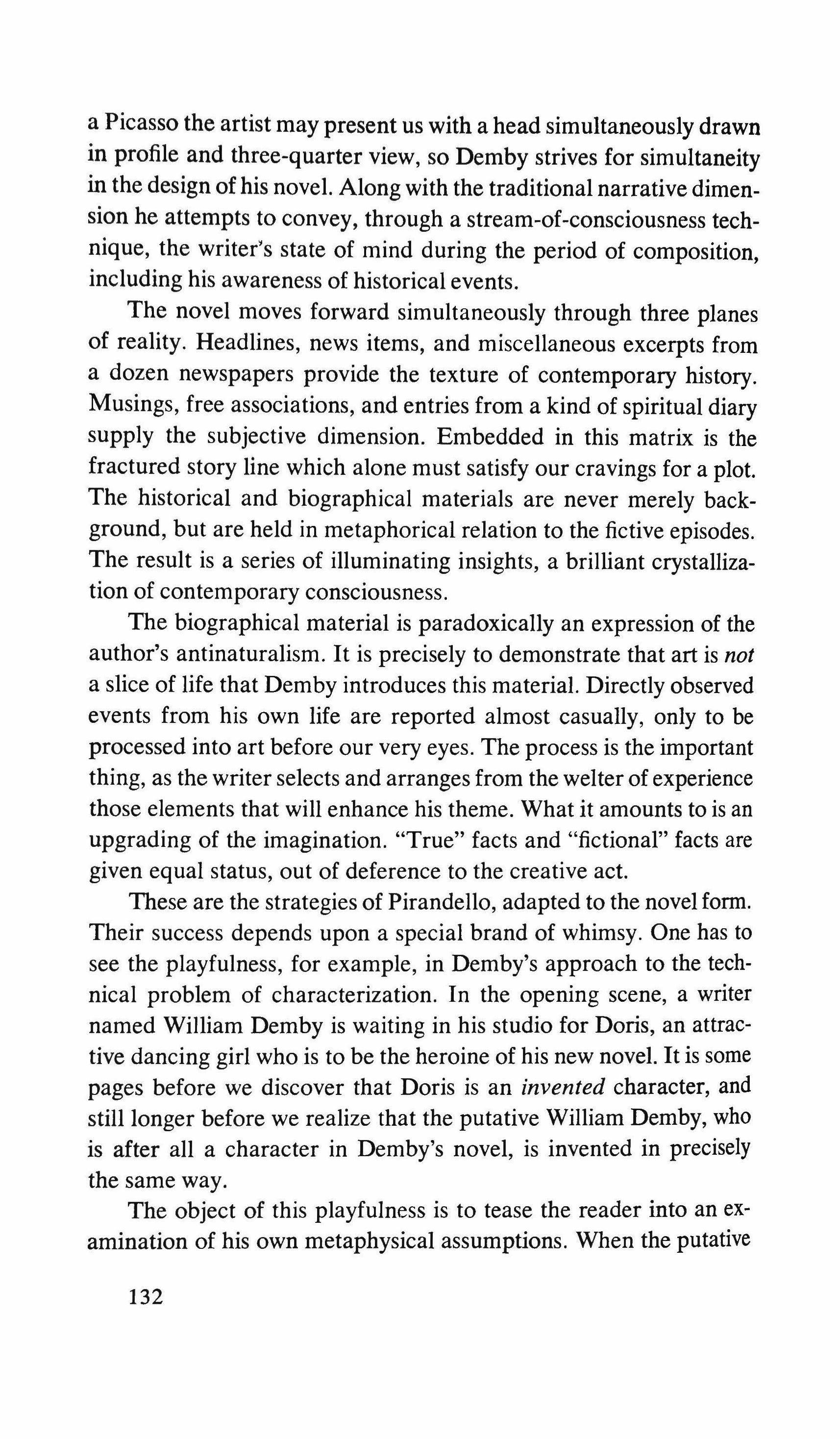
a Picasso the artist may present us with a head simultaneously drawn in profile and three-quarter view, so Demby strives for simultaneity in the design of his novel. Along with the traditional narrative dimension he attempts to convey, through a stream-of-consciousness technique, the writer's state of mind during the period of composition, including his awareness of historical events.
The novel moves forward simultaneously through three planes of reality. Headlines, news items, and miscellaneous excerpts from a dozen newspapers provide the texture of contemporary history. Musings, free associations, and entries from a kind of spiritual diary supply the subjective dimension. Embedded in this matrix is the fractured story line which alone must satisfy our cravings for a plot. The historical and biographical materials are never merely background, but are held in metaphorical relation to the fictive episodes. The result is a series of illuminating insights, a brilliant crystallization of contemporary consciousness.
The biographical material is paradoxically an expression of the author's antinaturalism. It is precisely to demonstrate that art is not a slice of life that Demby introduces this material. Directly observed events from his own life are reported almost casually, only to be processed into art before our very eyes. The process is the important thing, as the writer selects and arranges from the welter of experience those elements that will enhance his theme. What it amounts to is an upgrading of the imagination. "True" facts and "fictional" facts are given equal status, out of deference to the creative act.
These are the strategies of Pirandello, adapted to the novel form, Their success depends upon a special brand of whimsy. One has to see the playfulness, for example, in Demby's approach to the technical problem of characterization. In the opening scene, a writer named William Demby is waiting in his studio for Doris, an attractive dancing girl who is to be the heroine of his new novel. It is some pages before we discover that Doris is an invented character, and still longer before we realize that the putative William Demby, who is after all a character in Demby's novel, is invented in precisely the same way.
The object of this playfulness is to tease the reader into an examination of his own metaphysical assumptions. When the putative
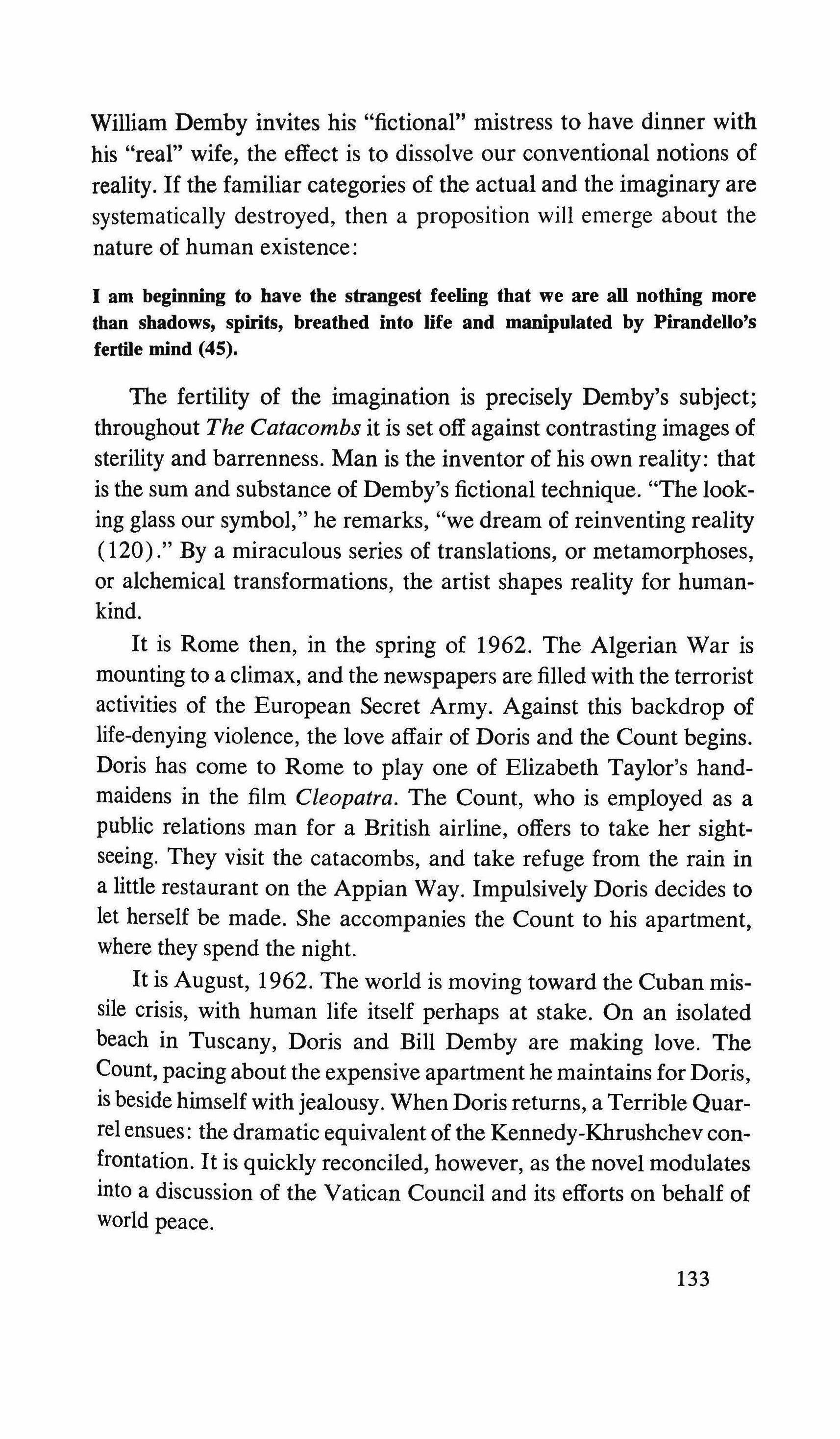
William Demby invites his "fictional" mistress to have dinner with his "real" wife, the effect is to dissolve our conventional notions of reality. If the familiar categories of the actual and the imaginary are systematically destroyed, then a proposition will emerge about the nature of human existence:
I am beginning to have the strangest feeling that we are all nothing more than shadows, spirits, breathed into life and manipulated by PirandeUo's fertile mind (45).
The fertility of the imagination is precisely Demby's subject; throughout The Catacombs it is set off against contrasting images of sterility and barrenness. Man is the inventor of his own reality: that is the sum and substance of Demby's fictional technique. "The looking glass our symbol," he remarks, "we dream of reinventing reality (120)." By a miraculous series of translations, or metamorphoses, or alchemical transformations, the artist shapes reality for humankind.
It is Rome then, in the spring of 1962. The Algerian War is mounting to a climax, and the newspapers are filled with the terrorist activities of the European Secret Army. Against this backdrop of life-denying violence, the love affair of Doris and the Count begins. Doris has come to Rome to play one of Elizabeth Taylor's handmaidens in the film Cleopatra. The Count, who is employed as a public relations man for a British airline, offers to take her sightseeing. They visit the catacombs, and take refuge from the rain in a little restaurant on the Appian Way. Impulsively Doris decides to let herself be made. She accompanies the Count to his apartment, where they spend the night.
It is August, 1962. The world is moving toward the Cuban missile crisis, with human life itself perhaps at stake. On an isolated beach in Tuscany, Doris and Bill Demby are making love. The Count, pacing about the expensive apartment he maintains for Doris, is beside himself with jealousy. When Doris returns, a Terrible Quarrel ensues: the dramatic equivalent of the Kennedy-Khrushchev confrontation. It is quickly reconciled, however, as the novel modulates into a discussion of the Vatican Council and its efforts on behalf of world peace.
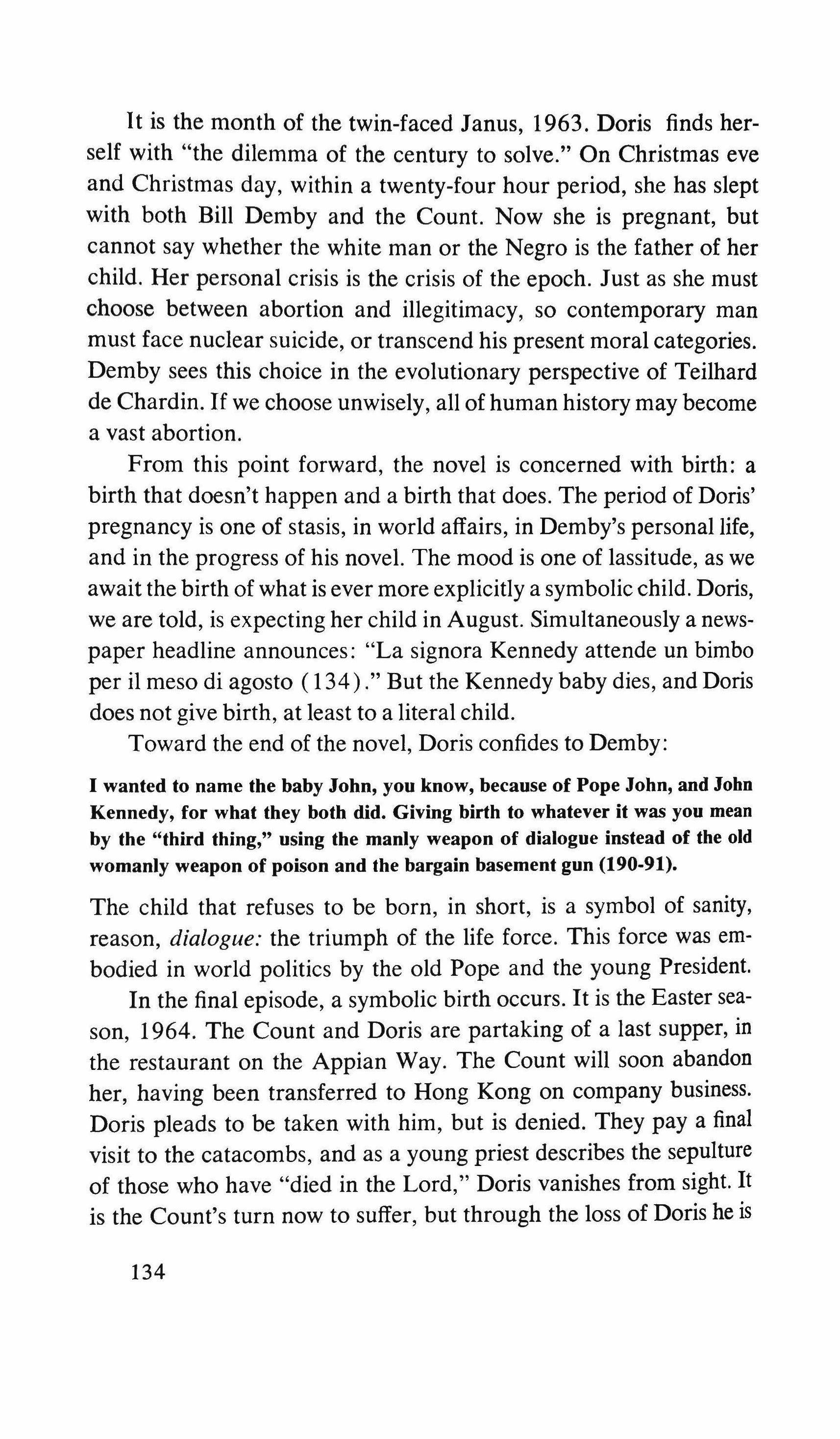
It is the month of the twin-faced Janus, 1963. Doris finds herself with "the dilemma of the century to solve." On Christmas eve and Christmas day, within a twenty-four hour period, she has slept with both Bill Demby and the Count. Now she is pregnant, but cannot say whether the white man or the Negro is the father of her child. Her personal crisis is the crisis of the epoch. Just as she must choose between abortion and illegitimacy, so contemporary man must face nuclear suicide, or transcend his present moral categories. Demby sees this choice in the evolutionary perspective of Teilhard de Chardin. If we choose unwisely, all of human history may become a vast abortion.
From this point forward, the novel is concerned with birth: a birth that doesn't happen and a birth that does. The period of Doris' pregnancy is one of stasis, in world affairs, in Demby's personal life, and in the progress of his novel. The mood is one of lassitude, as we await the birth of what is ever more explicitly a symbolic child. Doris, we are told, is expecting her child in August. Simultaneously a newspaper headline announces: "La signora Kennedy attende un bimbo per il meso di agosto (134)." But the Kennedy baby dies, and Doris does not give birth, at least to a literal child.
Toward the end of the novel, Doris confides to Demby:
I wanted to name the baby John, you know, because of Pope John, and John Kennedy, for what they both did. Giving birth to whatever it was you mean by the "third thing," using the manly weapon of dialogue instead of the old womanly weapon of poison and the bargain basement gun (190-91).
The child that refuses to be born, in short, is a symbol of sanity, reason, dialogue: the triumph of the life force. This force was embodied in world politics by the old Pope and the young President.
In the final episode, a symbolic birth occurs. It is the Easter season, 1964. The Count and Doris are partaking of a last supper, in the restaurant on the Appian Way. The Count will soon abandon her, having been transferred to Hong Kong on company business. Doris pleads to be taken with him, but is denied. They pay a final visit to the catacombs, and as a young priest describes the sepulture of those who have "died in the Lord," Doris vanishes from sight. It is the Count's turn now to suffer, but through the loss of Doris he is
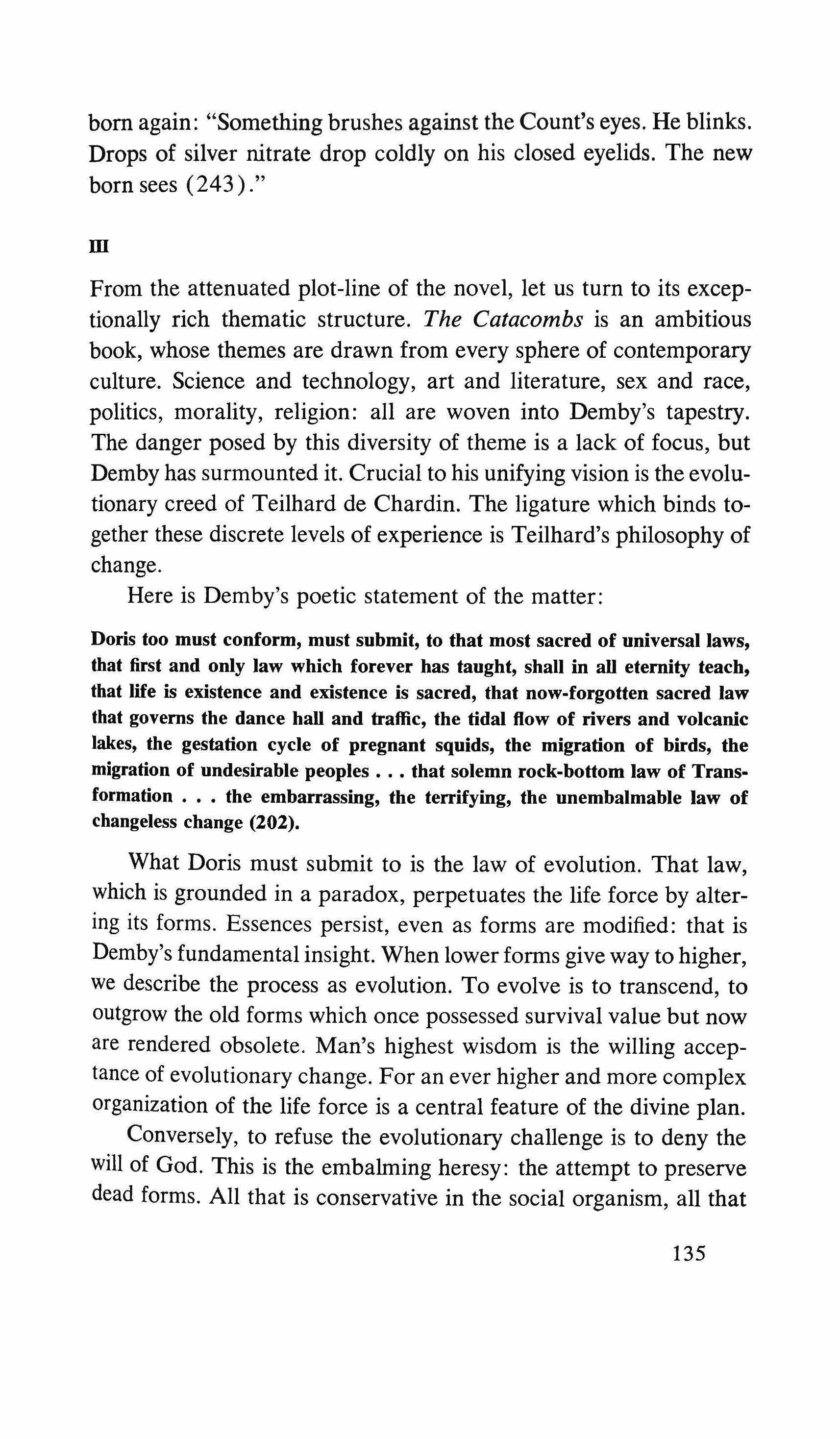
born again: "Something brushes against the Count's eyes. He blinks. Drops of silver nitrate drop coldly on his closed eyelids. The new born sees (243)."
From the attenuated plot-line of the novel, let us turn to its exceptionally rich thematic structure. The Catacombs is an ambitious book, whose themes are drawn from every sphere of contemporary culture. Science and technology, art and literature, sex and race, politics, morality, religion: all are woven into Demby's tapestry. The danger posed by this diversity of theme is a lack of focus, but Demby has surmounted it. Crucial to his unifying vision is the evolutionary creed of Teilhard de Chardin. The ligature which binds together these discrete levels of experience is Teilhard's philosophy of change.
Here is Demby's poetic statement of the matter:
Doris too must conform, must submit, to that most sacred of universal laws, that first and only law which forever has taught, shall in all eternity teach, that life is existence and existence is sacred, that now-forgotten sacred law that governs the dance hall and traffic, the tidal flow of rivers and volcanic lakes, the gestation cycle of pregnant squids, the migration of birds, the migration of undesirable peoples •.• that solemn rock-bottom law of Transformation the embarrassing, the terrifying, the unembalmable law of changeless change (202).
What Doris must submit to is the law of evolution. That law, which is grounded in a paradox, perpetuates the life force by altering its forms. Essences persist, even as forms are modified: that is Demby's fundamental insight. When lower forms give way to higher, we describe the process as evolution. To evolve is to transcend, to outgrow the old forms which once possessed survival value but now are rendered obsolete. Man's highest wisdom is the willing acceptance of evolutionary change. For an ever higher and more complex organization of the life force is a central feature of the divine plan. Conversely, to refuse the evolutionary challenge is to deny the will of God. This is the embalming heresy: the attempt to preserve dead forms. All that is conservative in the social organism, all that
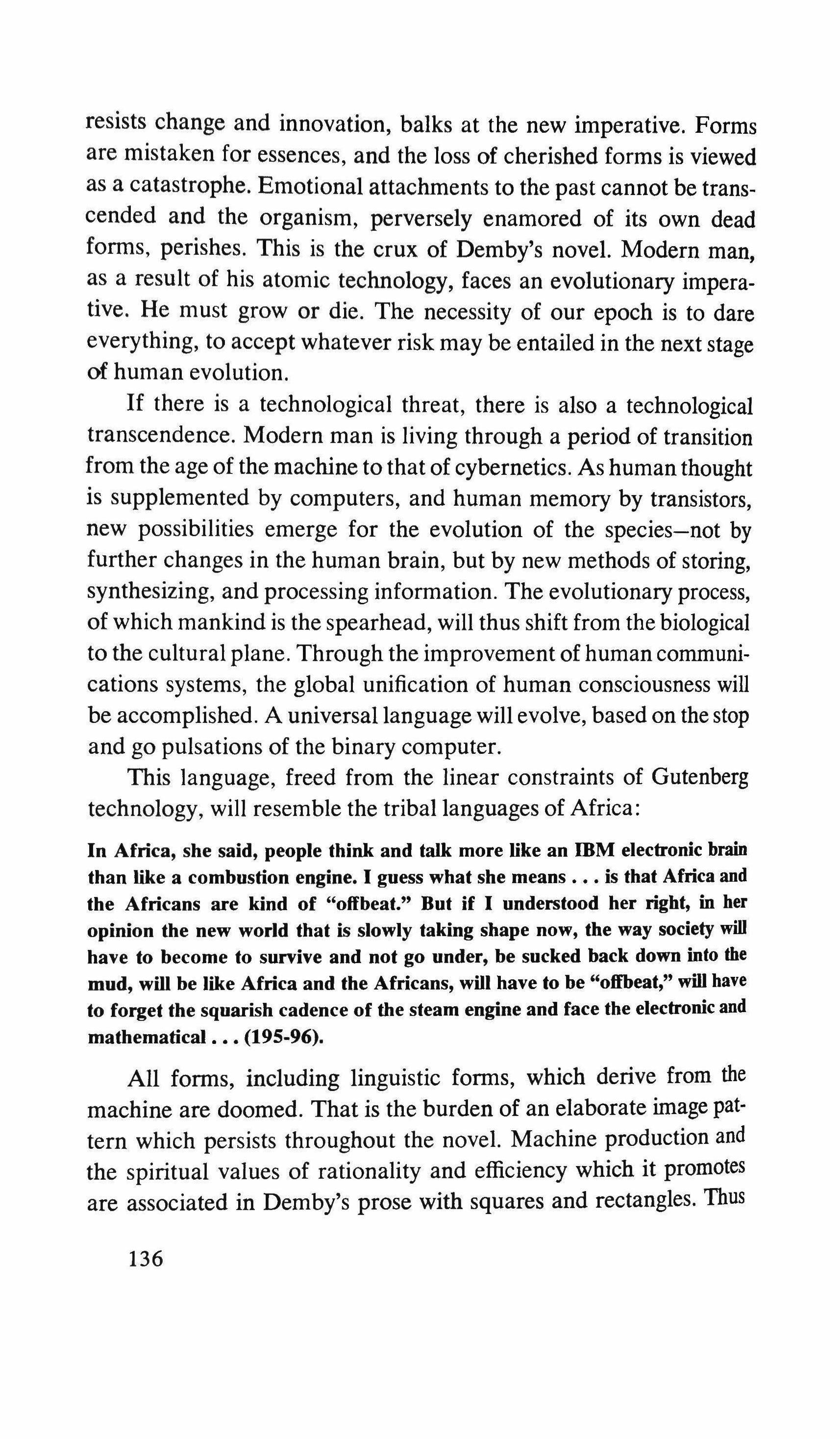
resists change and innovation, balks at the new imperative. Forms are mistaken for essences, and the loss of cherished forms is viewed as a catastrophe. Emotional attachments to the past cannot be transcended and the organism, perversely enamored of its own dead forms, perishes. This is the crux of Demby's novel. Modern man, as a result of his atomic technology, faces an evolutionary imperative. He must grow or die. The necessity of our epoch is to dare everything, to accept whatever risk may be entailed in the next stage of human evolution.
If there is a technological threat, there is also a technological transcendence. Modern man is living through a period of transition from the age of the machine to that of cybernetics. As human thought is supplemented by computers, and human memory by transistors, new possibilities emerge for the evolution of the species-not by further changes in the human brain, but by new methods of storing, synthesizing, and processing information. The evolutionary process, of which mankind is the spearhead, will thus shift from the biological to the cultural plane. Through the improvement of human communications systems, the global unification of human consciousness will be accomplished. A universal language will evolve, based on the stop and go pulsations of the binary computer.
This language, freed from the linear constraints of Gutenberg technology, will resemble the tribal languages of Africa:
In Africa, she said, people think and talk more like an mM electronic brain than like a combustion engine. I guess what she means is that Africa and the Africans are kind of "offbeat." But if I understood her right, in her opinion the new world that is slowly taking shape now, the way society will have to become to survive and not go under, be sucked back down into the mud, will be like Africa and the Africans, will have to be "offbeat," will have to forget the squarish cadence of the steam engine and face the electronic and mathematical (195-96).
All forms, including linguistic forms, which derive from the machine are doomed. That is the burden of an elaborate image pattern which persists throughout the novel. Machine production and the spiritual values of rationality and efficiency which it promotes are associated in Demby's prose with squares and rectangles. Thus
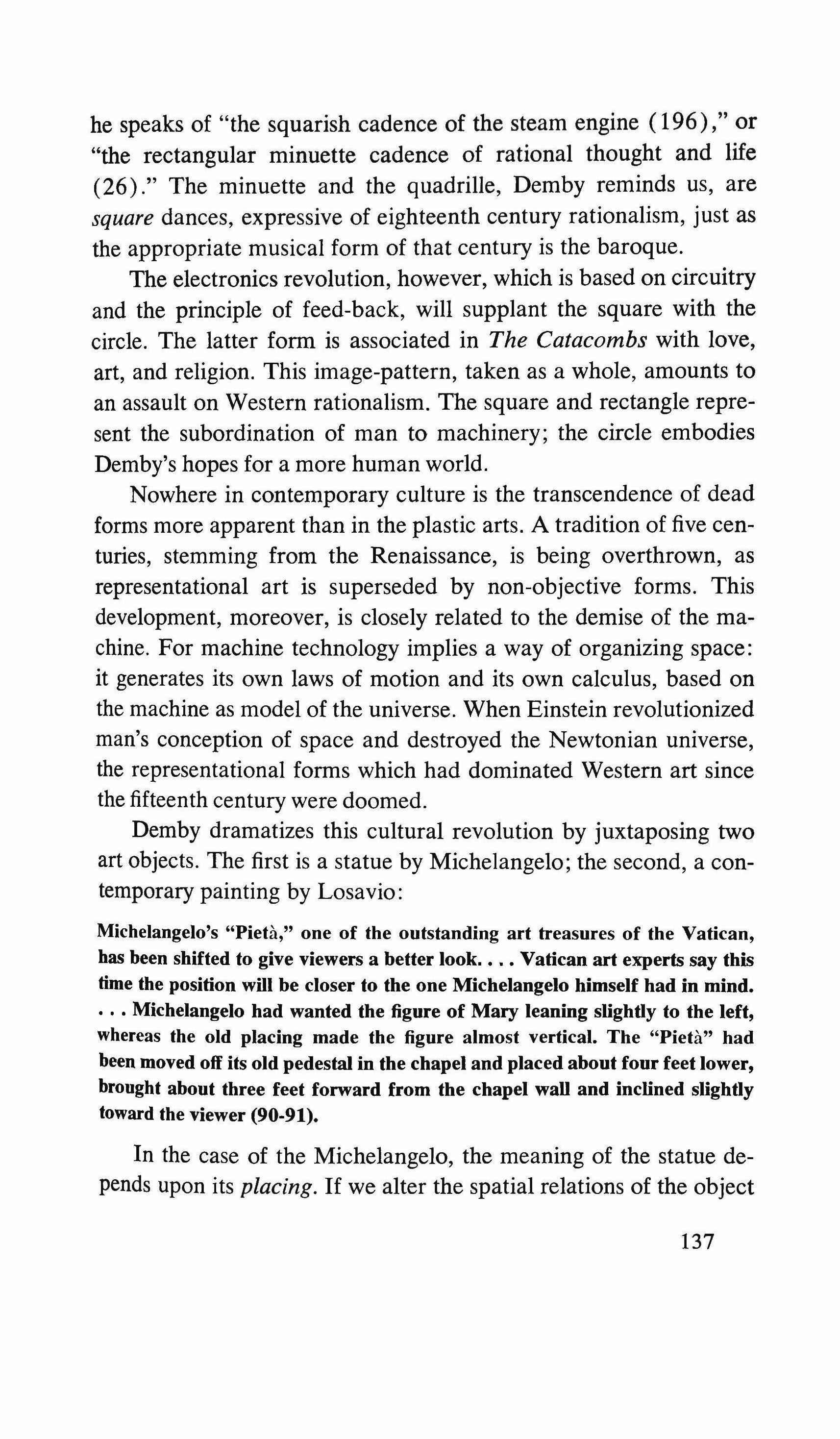
he speaks of "the squarish cadence of the steam engine (196)," or "the rectangular minuette cadence of rational thought and life (26)." The minuette and the quadrille, Demby reminds us, are square dances, expressive of eighteenth century rationalism, just as the appropriate musical form of that century is the baroque.
The electronics revolution, however, which is based on circuitry and the principle of feed-back, will supplant the square with the circle. The latter form is associated in The Catacombs with love, art, and religion. This image-pattern, taken as a whole, amounts to an assault on Western rationalism. The square and rectangle represent the subordination of man to machinery; the circle embodies Demby's hopes for a more human world.
Nowhere in contemporary culture is the transcendence of dead forms more apparent than in the plastic arts. A tradition of five centuries, stemming from the Renaissance, is being overthrown, as representational art is superseded by non-objective forms. This development, moreover, is closely related to the demise of the machine. For machine technology implies a way of organizing space: it generates its own laws of motion and its own calculus, based on the machine as model of the universe. When Einstein revolutionized man's conception of space and destroyed the Newtonian universe, the representational forms which had dominated Western art since the fifteenth century were doomed.
Demby dramatizes this cultural revolution by juxtaposing two art objects. The first is a statue by Michelangelo; the second, a contemporary painting by Losavio:
Michelangelo's "Pieta," one of the outstanding art treasures of the Vatican, has been shifted to give viewers a better look Vatican art experts say this time the position will be closer to the one Michelangelo himself had in mind
Michelangelo had wanted the figure of Mary leaning slightly to the left, whereas the old placing made the figure almost vertical. The "Pieta" had been moved off its old pedestal in the chapel and placed about four feet lower, brought about three feet forward from the chapel wall and inclined slightly toward the viewer (90-91).
In the case of the Michelangelo, the meaning of the statue depends upon its placing. If we alter the spatial relations of the object
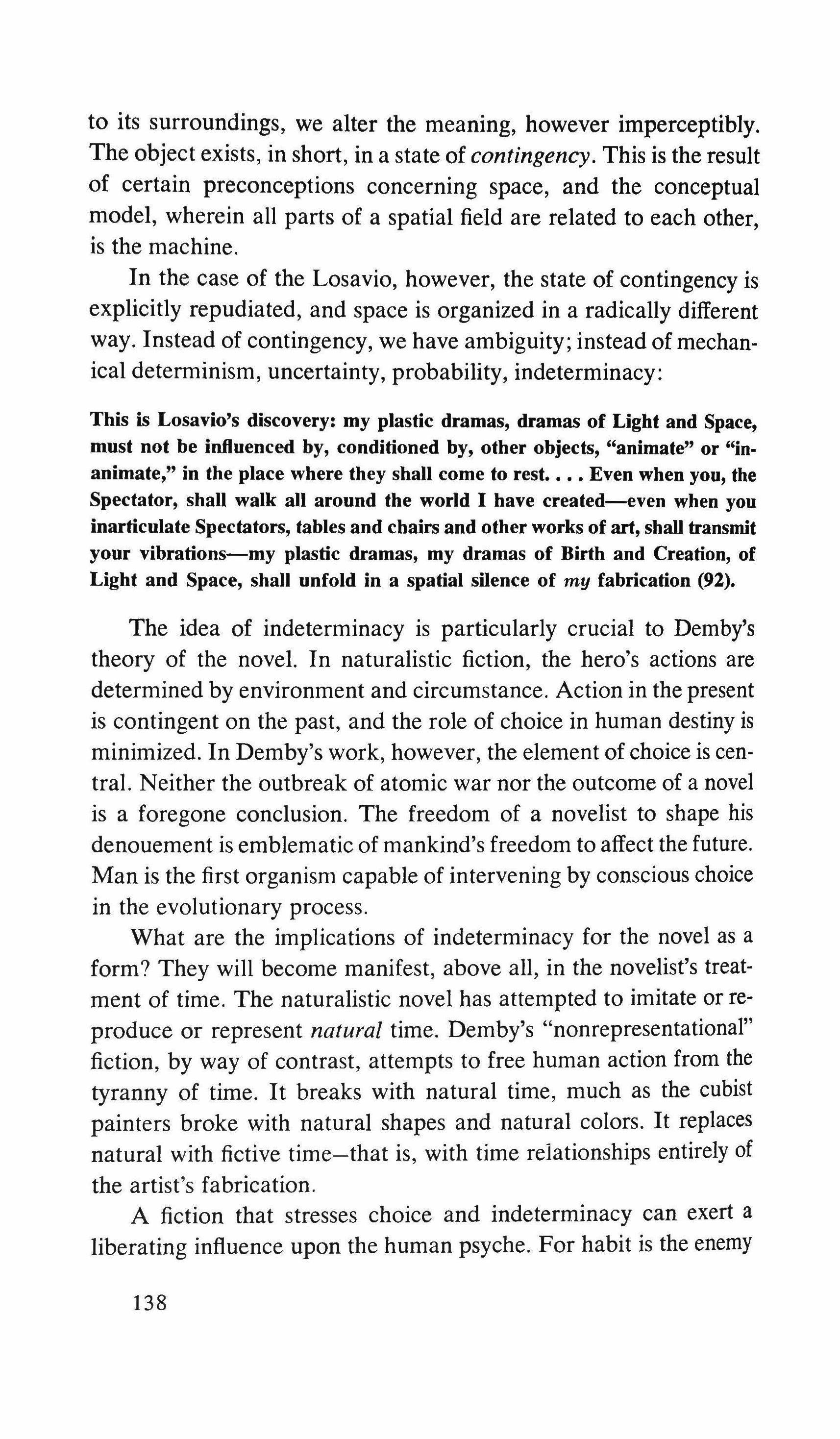
to its surroundings, we alter the meaning, however imperceptibly. The object exists, in short, in a state of contingency. This is the result of certain preconceptions concerning space, and the conceptual model, wherein all parts of a spatial field are related to each other, is the machine.
In the case of the Losavio, however, the state of contingency is explicitly repudiated, and space is organized in a radically different way. Instead of contingency, we have ambiguity; instead of mechanical determinism, uncertainty, probability, indeterminacy:
This is Losavio's discovery: my plastic dramas, dramas of Light and Space, must not be influenced by, conditioned by, other objects, "animate" or "inanimate," in the place where they shall come to rest Even when you, the Spectator, shall walk all around the world I have created-even when you inarticulate Spectators, tables and chairs and other works of art, shall transmit your vibrations-my plastic dramas, my dramas of Birth and Creation, of Light and Space, shall unfold in a spatial silence of my fabrication (92).
The idea of indeterminacy is particularly crucial to Demby's theory of the novel. In naturalistic fiction, the hero's actions are determined by environment and circumstance. Action in the present is contingent on the past, and the role of choice in human destiny is minimized. In Demby's work, however, the element of choice is central. Neither the outbreak of atomic war nor the outcome of a novel is a foregone conclusion. The freedom of a novelist to shape his denouement is emblematic of mankind's freedom to affect the future. Man is the first organism capable of intervening by conscious choice in the evolutionary process. What are the implications of indeterminacy for the novel as a form? They will become manifest, above all, in the novelist's treatment of time. The naturalistic novel has attempted to imitate or reproduce or represent natural time. Demby's "nonrepresentational" fiction, by way of contrast, attempts to free human action from the tyranny of time. It breaks with natural time, much as the cubist painters broke with natural shapes and natural colors. It replaces natural with fictive time-that is, with time relationships entirely of the artist's fabrication.
A fiction that stresses choice and indeterminacy can exert a liberating influence upon the human psyche. For habit is the enemy
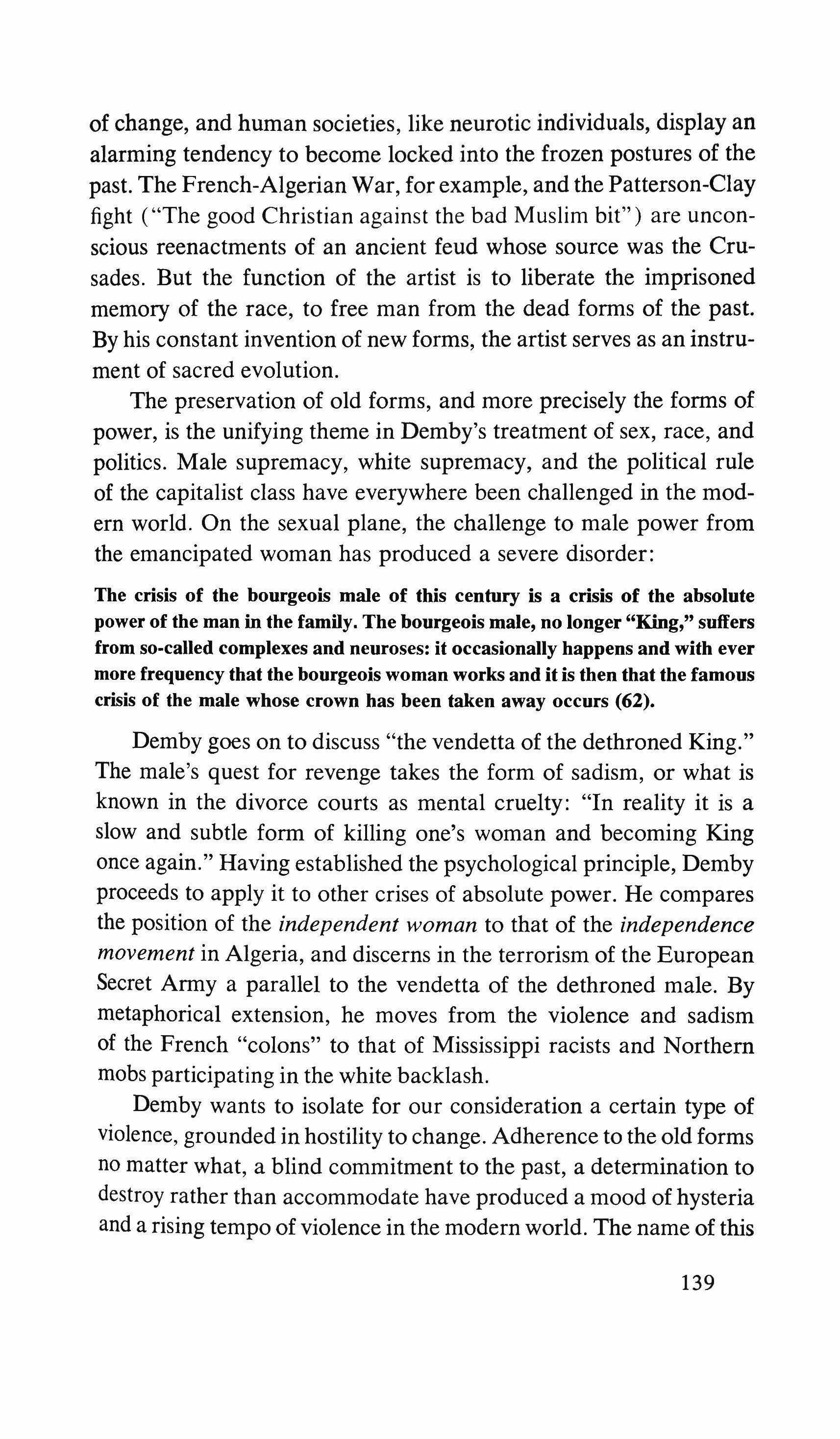
of change, and human societies, like neurotic individuals, display an alarming tendency to become locked into the frozen postures of the past. The French-Algerian War, for example, and the Patterson-Clay fight ("The good Christian against the bad Muslim bit") are unconscious reenactments of an ancient feud whose source was the Crusades. But the function of the artist is to liberate the imprisoned memory of the race, to free man from the dead forms of the past. By his constant invention of new forms, the artist serves as an instrument of sacred evolution.
The preservation of old forms, and more precisely the forms of power, is the unifying theme in Demby's treatment of sex, race, and politics. Male supremacy, white supremacy, and the political rule of the capitalist class have everywhere been challenged in the modern world. On the sexual plane, the challenge to male power from the emancipated woman has produced a severe disorder: The crisis of the bourgeois male of this century is a crisis of the absolute power of the man in the family. The bourgeois male, no longer "King," suffers from so-called complexes and neuroses: it occasionally happens and with ever more frequency that the bourgeois woman works and it is then that the famous crisis of the male whose crown has been taken away occurs (62).
Demby goes on to discuss "the vendetta of the dethroned King." The male's quest for revenge takes the form of sadism, or what is known in the divorce courts as mental cruelty: "In reality it is a slow and subtle form of killing one's woman and becoming King once again." Having established the psychological principle, Demby proceeds to apply it to other crises of absolute power. He compares the position of the independent woman to that of the independence movement in Algeria, and discerns in the terrorism of the European Secret Army a parallel to the vendetta of the dethroned male. By metaphorical extension, he moves from the violence and sadism of the French "colons" to that of Mississippi racists and Northern mobs participating in the white backlash.
Demby wants to isolate for our consideration a certain type of violence, grounded in hostility to change. Adherence to the old forms no matter what, a blind commitment to the past, a determination to destroy rather than accommodate have produced a mood of hysteria and a rising tempo of violence in the modern world. The name of this
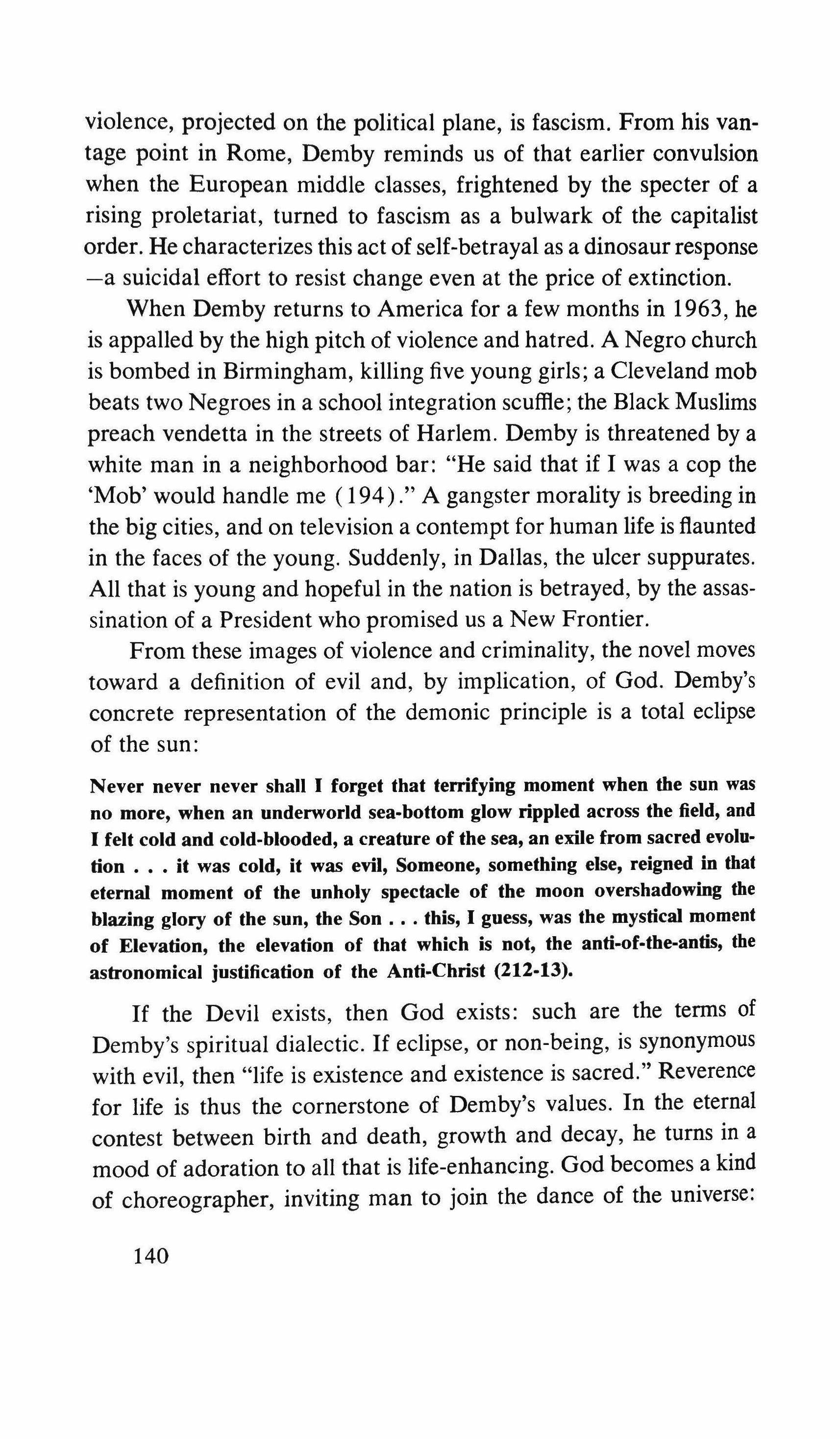
violence, projected on the political plane, is fascism. From his vantage point in Rome, Demby reminds us of that earlier convulsion when the European middle classes, frightened by the specter of a rising proletariat, turned to fascism as a bulwark of the capitalist order. He characterizes this act of self-betrayal as a dinosaur response -a suicidal effort to resist change even at the price of extinction. When Demby returns to America for a few months in 1963, he is appalled by the high pitch of violence and hatred. A Negro church is bombed in Birmingham, killing five young girls; a Cleveland mob beats two Negroes in a school integration scuffle; the Black Muslims preach vendetta in the streets of Harlem. Demby is threatened by a white man in a neighborhood bar: "He said that if I was a cop the 'Mob' would handle me (194)." A gangster morality is breeding in the big cities, and on television a contempt for human life is flaunted in the faces of the young. Suddenly, in Dallas, the ulcer suppurates. All that is young and hopeful in the nation is betrayed, by the assassination of a President who promised us a New Frontier. From these images of violence and criminality, the novel moves toward a definition of evil and, by implication, of God. Demby's concrete representation of the demonic principle is a total eclipse of the sun:
Never never never shall I forget that terrifying moment when the sun was no more, when an underworld sea-bottom glow rippled across the field, and I felt cold and cold-blooded, a creature of the sea, an exile from sacred evolution it was cold, it was evil, Someone, something else, reigned in that eternal moment of the unholy spectacle of the moon overshadowing the blazing glory of the sun, the Son this, I guess, was the mystical moment of Elevation, the elevation of that which is not, the anti-of-the-antis, the astronomical justification of the Anti-Christ (212-13).
If the Devil exists, then God exists: such are the terms of Demby's spiritual dialectic. If eclipse, or non-being, is synonymous with evil, then "life is existence and existence is sacred." Reverence for life is thus the cornerstone of Demby's values. In the eternal contest between birth and death, growth and decay, he turns in a mood of adoration to all that is life-enhancing. God becomes a kind of choreographer, inviting man to join the dance of the universe:
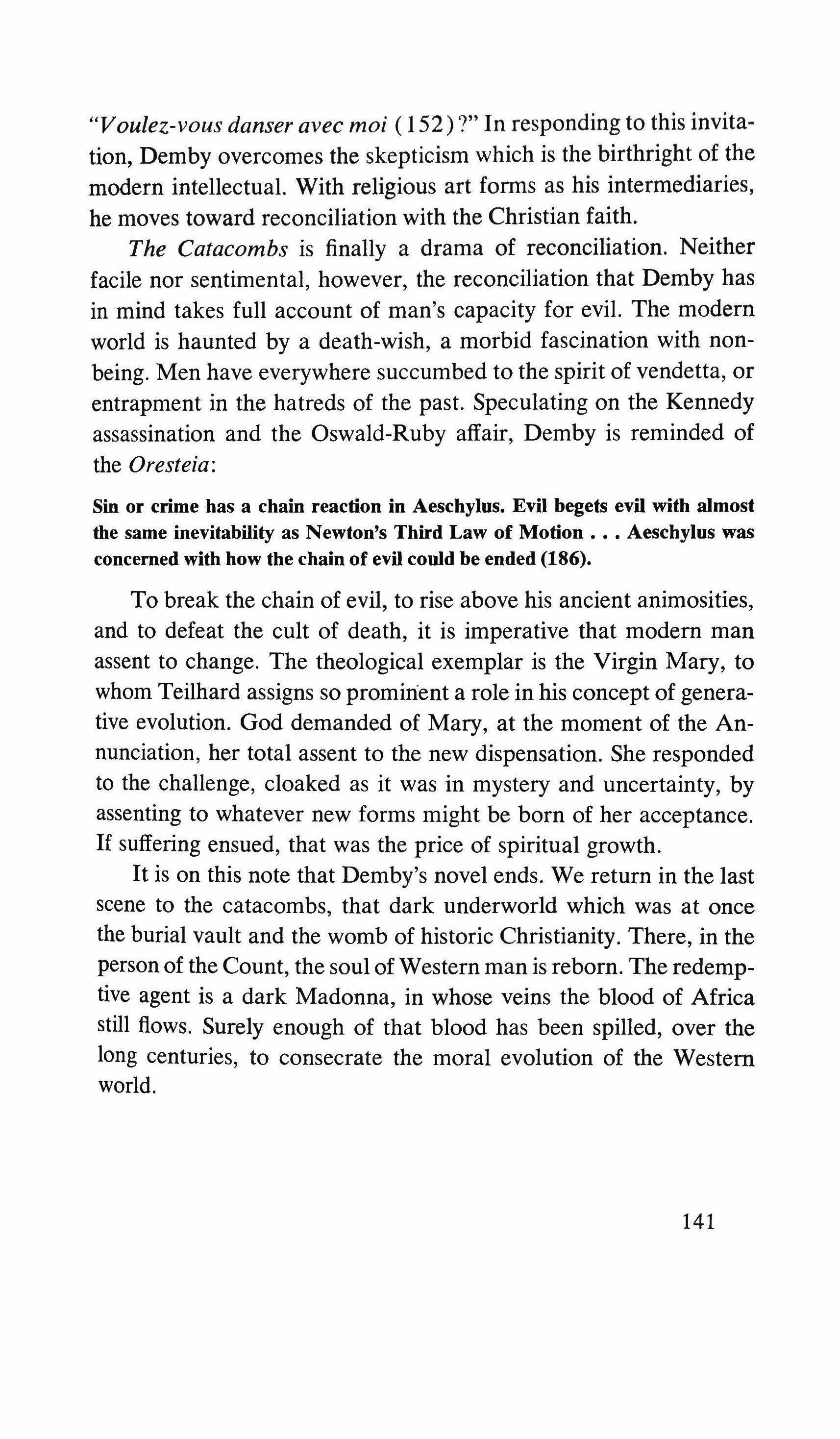
"Voulez-vous danser avec moi ( 152)?" In responding to this invitation, Demby overcomes the skepticism which is the birthright of the modern intellectual. With religious art forms as his intermediaries, he moves toward reconciliation with the Christian faith.
The Catacombs is finally a drama of reconciliation. Neither facile nor sentimental, however, the reconciliation that Demby has in mind takes full account of man's capacity for evil. The modern world is haunted by a death-wish, a morbid fascination with nonbeing. Men have everywhere succumbed to the spirit of vendetta, or entrapment in the hatreds of the past. Speculating on the Kennedy assassination and the Oswald-Ruby affair, Demby is reminded of the Oresteia:
Sin or crime has a chain reaction in Aeschylus. Evil begets evil with almost the same inevitability as Newton's Third Law of Motion Aeschylus was concerned with how the chain of evil could be ended (186).
To break the chain of evil, to rise above his ancient animosities, and to defeat the cult of death, it is imperative that modem man assent to change. The theological exemplar is the Virgin Mary, to whom Teilhard assigns so promirient a role in his concept of generative evolution. God demanded of Mary, at the moment of the Annunciation, her total assent to the new dispensation. She responded to the challenge, cloaked as it was in mystery and uncertainty, by assenting to whatever new forms might be born of her acceptance. If suffering ensued, that was the price of spiritual growth.
It is on this note that Demby's novel ends. We return in the last scene to the catacombs, that dark underworld which was at once the burial vault and the womb of historic Christianity. There, in the person of the Count, the soul of Western man is reborn. The redemptive agent is a dark Madonna, in whose veins the blood of Africa still flows. Surely enough of that blood has been spilled, over the long centuries, to consecrate the moral evolution of the Western world.
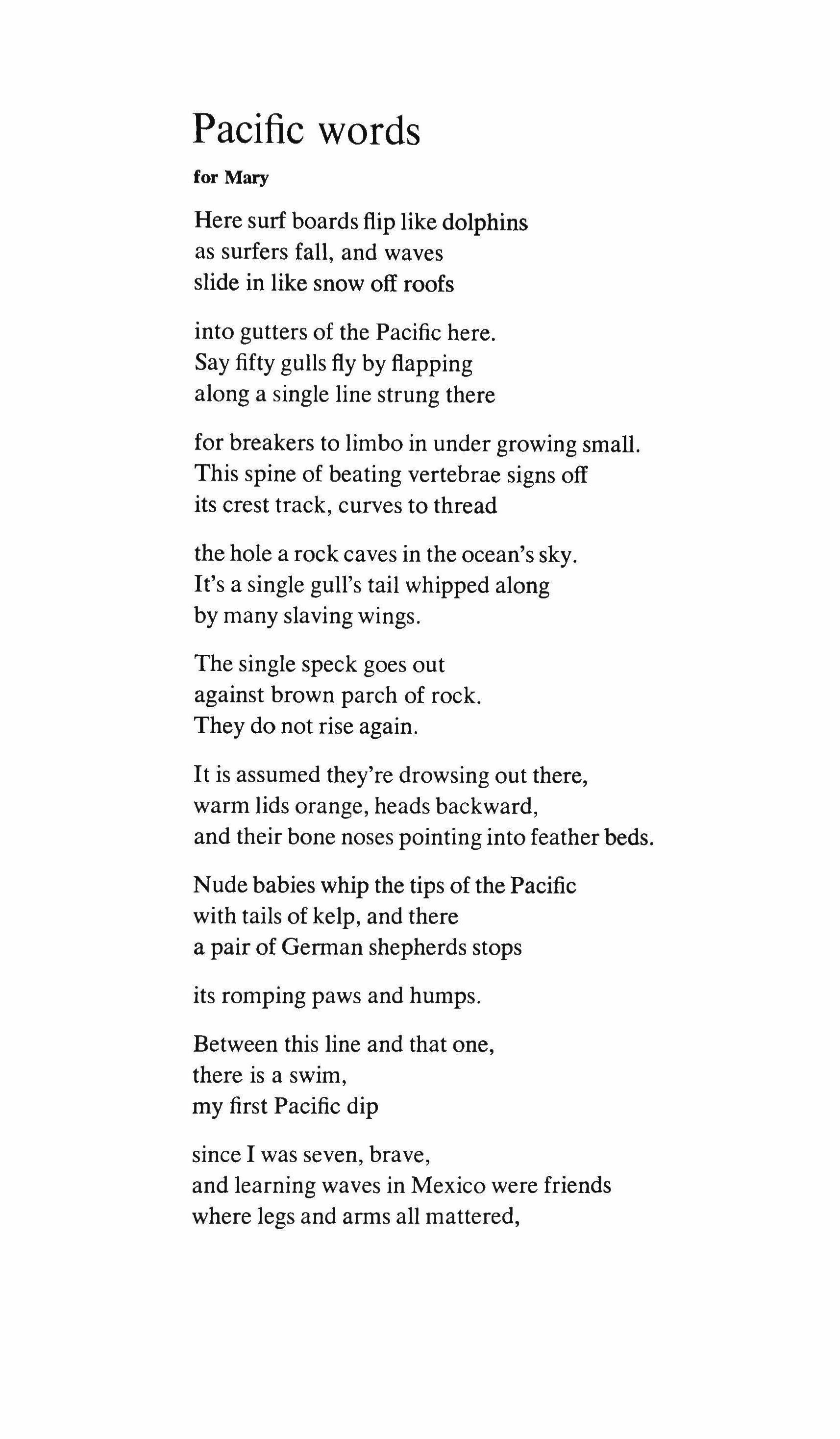
Here surf boards flip like dolphins as surfers fall, and waves slide in like snow off roofs into gutters of the Pacific here. Say fifty gulls fly by flapping along a single line strung there for breakers to limbo in under growing small. This spine of beating vertebrae signs off its crest track, curves to thread the hole a rock caves in the ocean's sky. It's a single gull's tail whipped along by many slaving wings. The single speck goes out against brown parch of rock. They do not rise again.
It is assumed they're drowsing out there, warm lids orange, heads backward, and their bone noses pointing into feather beds.
Nude babies whip the tips of the Pacific with tails of kelp, and there a pair of German shepherds stops its romping paws and humps.
Between this line and that one, there is a swim, my first Pacific dip since I was seven, brave, and learning waves in Mexico were friends where legs and arms all mattered,
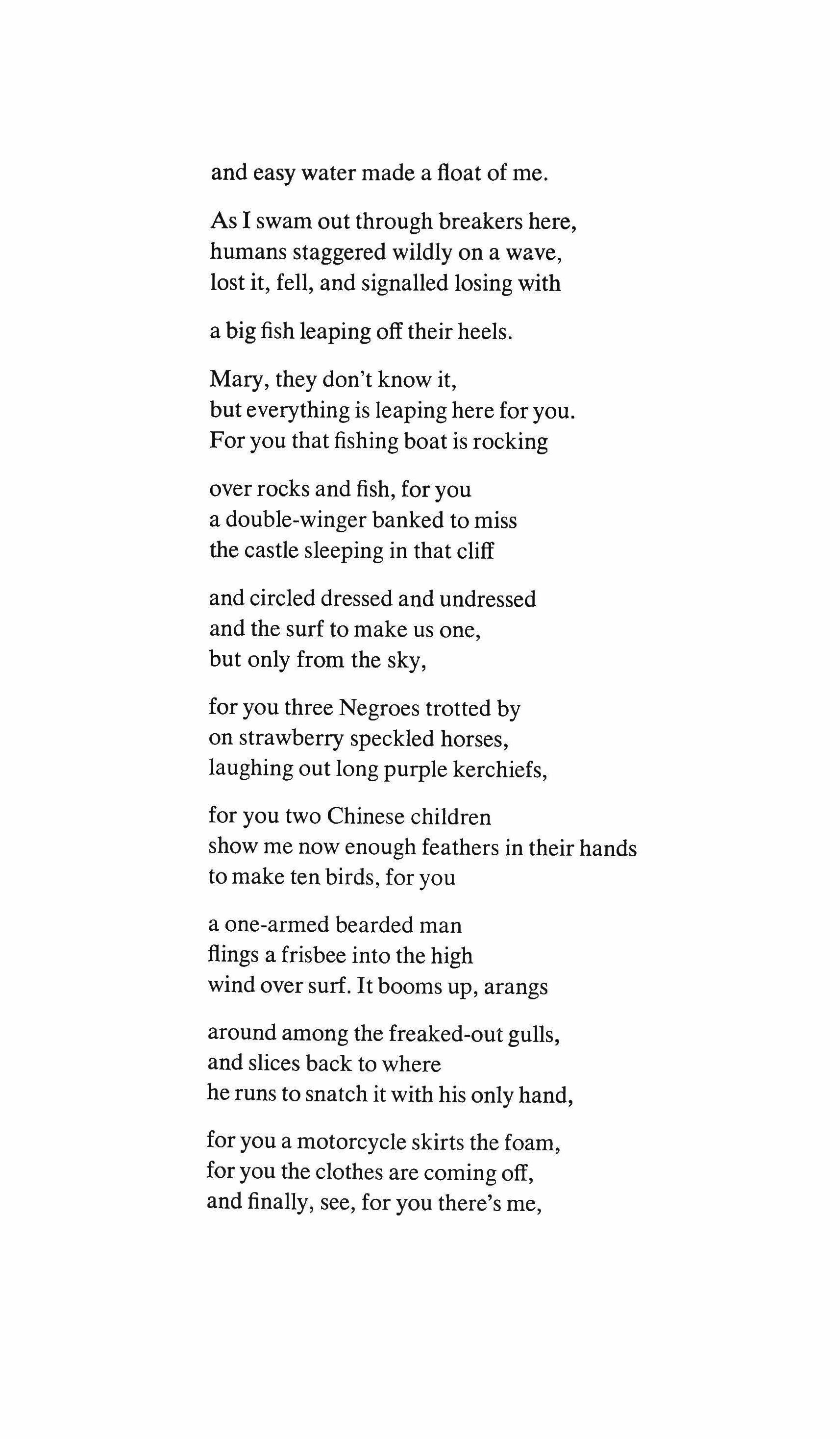
and easy water made a float of me.
As I swam out through breakers here, humans staggered wildly on a wave, lost it, fell, and signalled losing with a big fish leaping off their heels.
Mary, they don't know it, but everything is leaping here for you. For you that fishing boat is rocking over rocks and fish, for you a double-winger banked to miss the castle sleeping in that cliff and circled dressed and undressed and the surf to make us one, but only from the sky,
for you three Negroes trotted by on strawberry speckled horses, laughing out long purple kerchiefs,
for you two Chinese children show me now enough feathers in their hands to make ten birds, for you
a one-armed bearded man flings a frisbee into the high wind over surf. It booms up, arangs around among the freaked-out gulls, and slices back to where he runs to snatch it with his only hand,
for you a motorcycle skirts the foam, for you the clothes are coming off, and finally, see, for you there's me,
who will stay here till the fog, the surf of evening, chills me, and that single sloop the sun turns off and scuds away for night on this gray sea.
Then I'll walk the sound of this water back up to a lightless tunnel where I'll run to catch a green trolley
dragging its bell along between two silver rails up and down the city hills where pastel houses grow among the palms.
San Francisco
PETER JENSEN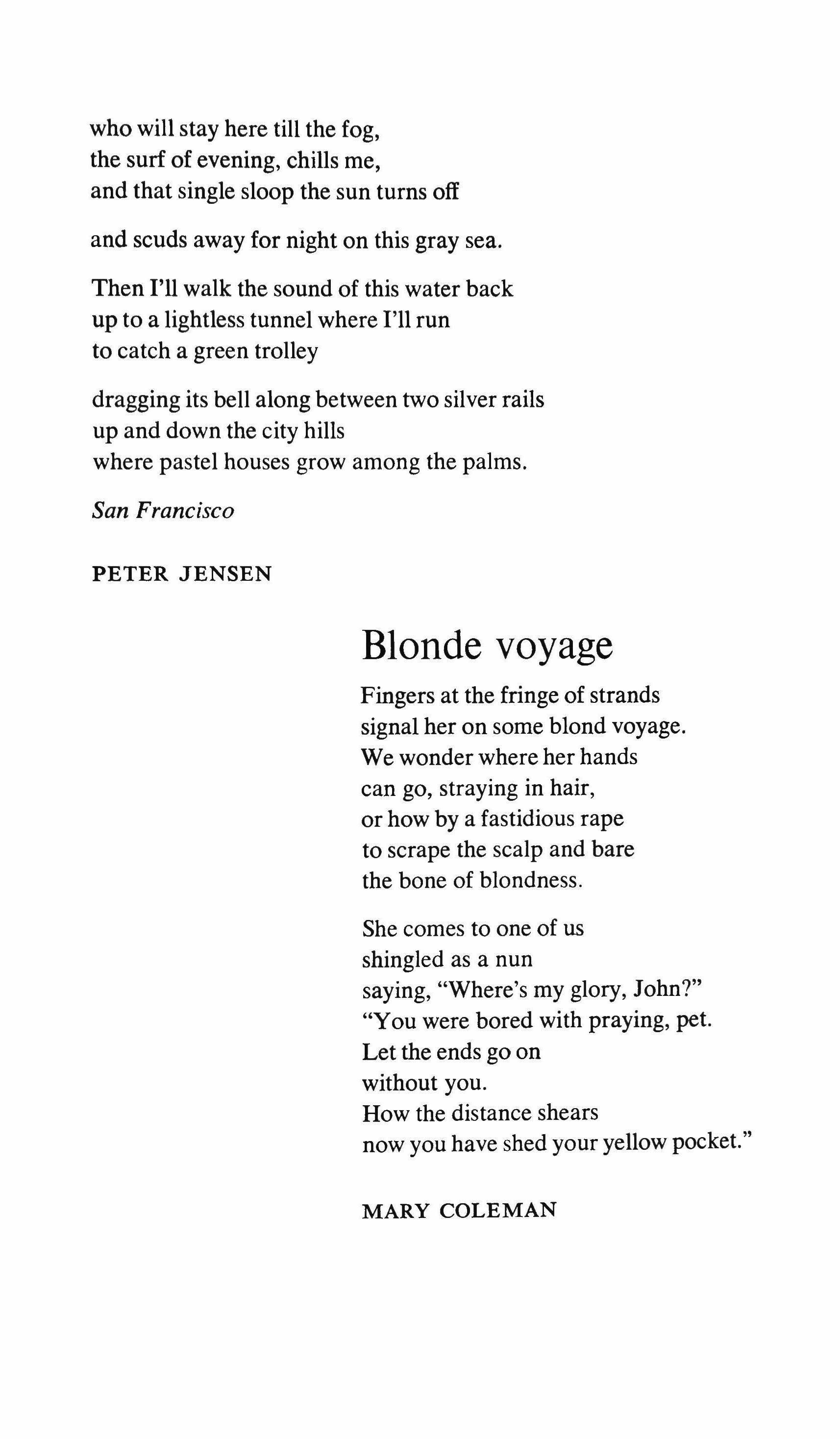
Fingers at the fringe of strands signal her on some blond voyage. We wonder where her hands can go, straying in hair, or how by a fastidious rape to scrape the scalp and bare the bone of blondness.
She comes to one of us shingled as a nun saying, "Where's my glory, John?" "You were bored with praying, pet. Let the ends go on without you. How the distance shears now you have shed your yellow pocket."
MARY COLEMAN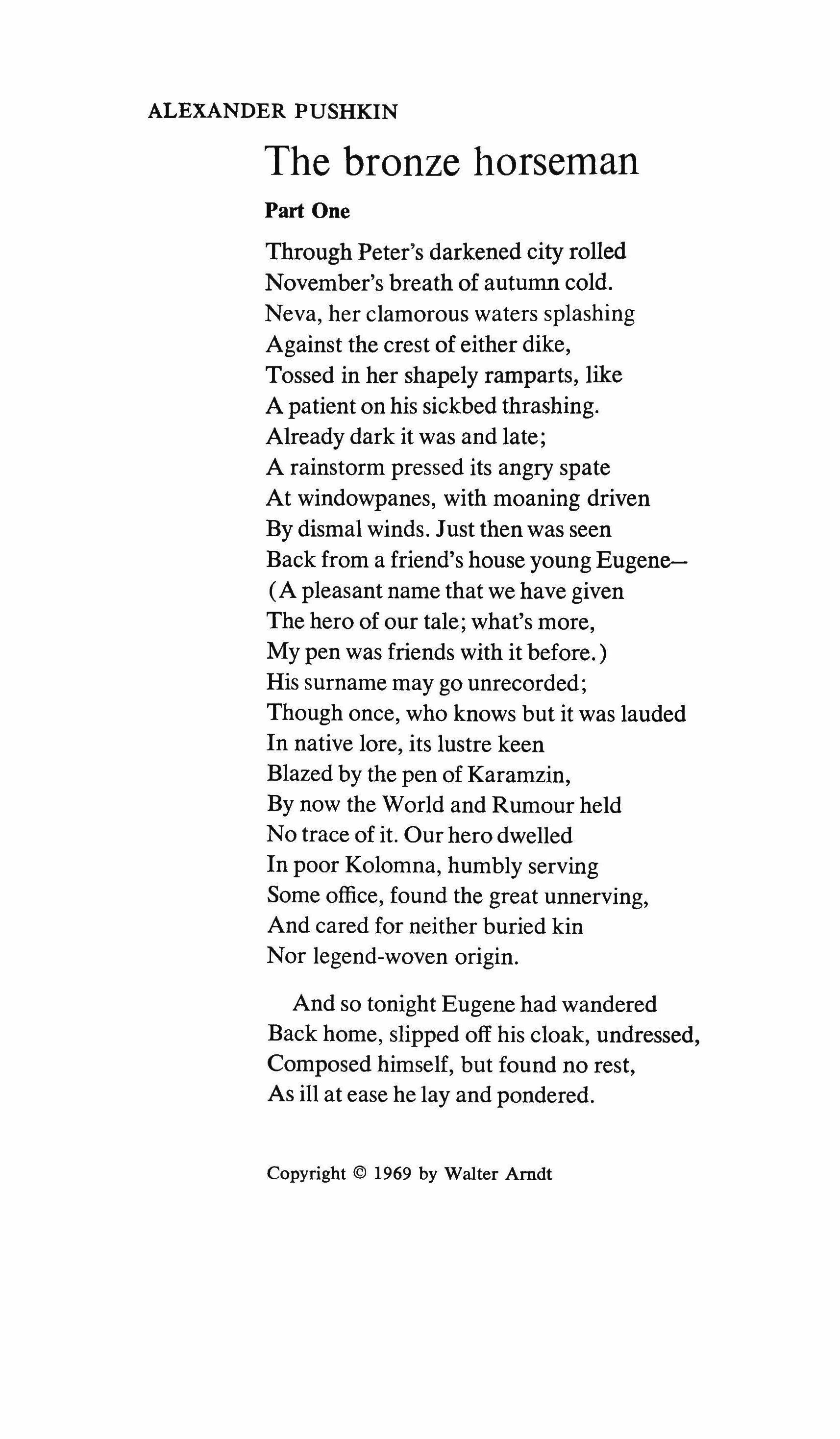
Through Peter's darkened city rolled November's breath of autumn cold. Neva, her clamorous waters splashing Against the crest of either dike, Tossed in her shapely ramparts, like A patient on his sickbed thrashing. Already dark it was and late; A rainstorm pressed its angry spate At windowpanes, with moaning driven By dismal winds. Just then was seen Back from a friend's house young Eugene(A pleasant name that we have given The hero of our tale; what's more, My pen was friends with it before.) His surname may go unrecorded; Though once, who knows but it was lauded In native lore, its lustre keen Blazed by the pen of Karamzin, By now the World and Rumour held No trace of it. Our hero dwelled In poor Kolomna, humbly serving Some office, found the great unnerving, And cared for neither buried kin Nor legend-woven origin.
And so tonight Eugene had wandered Back home, slipped off his cloak, undressed, Composed himself, but found no rest, As ill at ease he lay and pondered.
Copyright©
1969 by Walter Arndt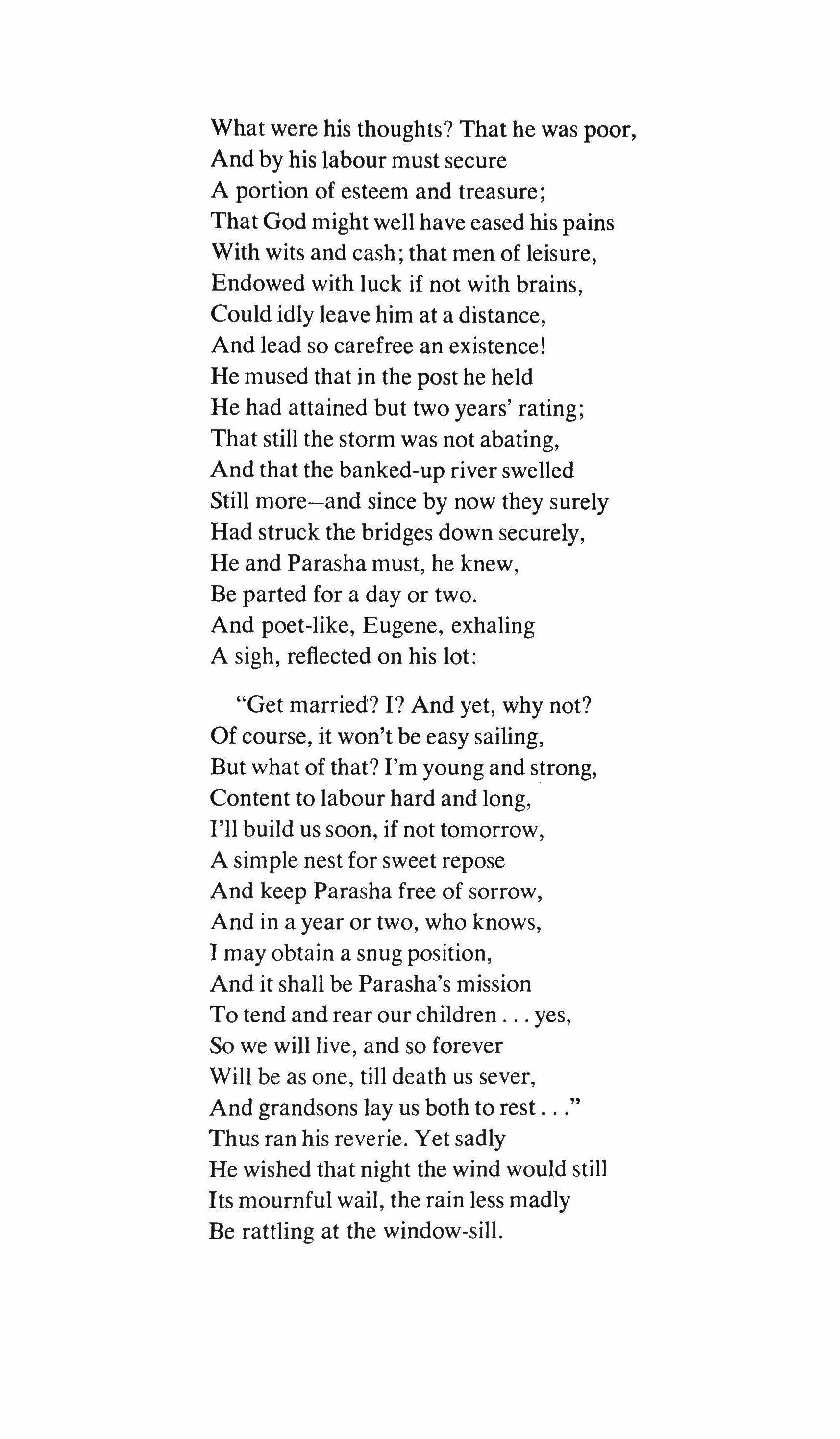
What were his thoughts? That he was poor, And by his labour must secure A portion of esteem and treasure; That God might well have eased his pains With wits and cash; that men of leisure, Endowed with luck if not with brains, Could idly leave him at a distance, And lead so carefree an existence! He mused that in the post he held He had attained but two years' rating; That still the storm was not abating, And that the banked-up river swelled Still more-and since by now they surely Had struck the bridges down securely, He and Parasha must, he knew, Be parted for a day or two.
And poet-like, Eugene, exhaling A sigh, reflected on his lot:
"Get married? I? And yet, why not? Of course, it won't be easy sailing, But what of that? I'm young and strong, Content to labour hard and long, I'll build us soon, if not tomorrow, A simple nest for sweet repose And keep Parasha free of sorrow, And in a year or two, who knows, I may obtain a snug position, And it shall be Parasha's mission To tend and rear our children yes, So we will live, and so forever Will be as one, till death us sever, And grandsons lay us both to rest " Thus ran his reverie. Yet sadly He wished that night the wind would still Its mournful wail, the rain less madly Be rattling at the window-sill.
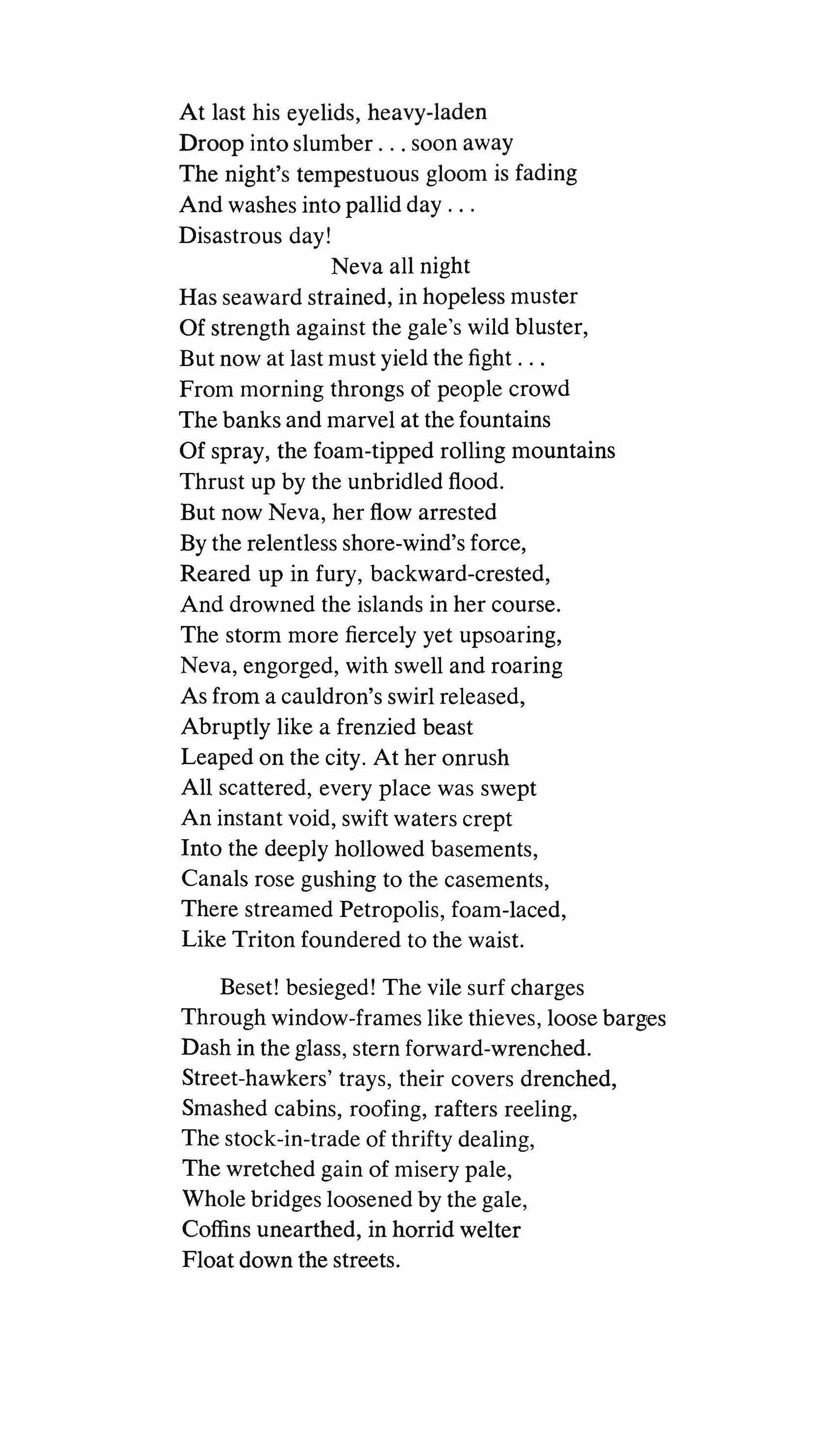
At last his eyelids, heavy-laden
Droop into slumber soon away
The night's tempestuous gloom is fading
And washes into pallid day
Disastrous day!
Neva all night
Has seaward strained, in hopeless muster
Of strength against the gale's wild bluster, But now at last must yield the fight
From morning throngs of people crowd
The banks and marvel at the fountains
Of spray, the foam-tipped rolling mountains
Thrust up by the unbridled flood.
But now Neva, her flow arrested
By the relentless shore-wind's force,
Reared up in fury, backward-crested, And drowned the islands in her course.
The storm more fiercely yet upsoaring, Neva, engorged, with swell and roaring
As from a cauldron's swirl released,
Abruptly like a frenzied beast
Leaped on the city. At her onrush
All scattered, every place was swept
An instant void, swift waters crept
Into the deeply hollowed basements, Canals rose gushing to the casements, There streamed Petropolis, foam-laced, Like Triton foundered to the waist.
Beset! besieged! The vile surf charges
Through window-frames like thieves, loose barges
Dash in the glass, stern forward-wrenched.
Street-hawkers' trays, their covers drenched, Smashed cabins, roofing, rafters reeling, The stock-in-trade of thrifty dealing, The wretched gain of misery pale, Whole bridges loosened by the gale, Coffins unearthed, in horrid welter
Float down the streets.
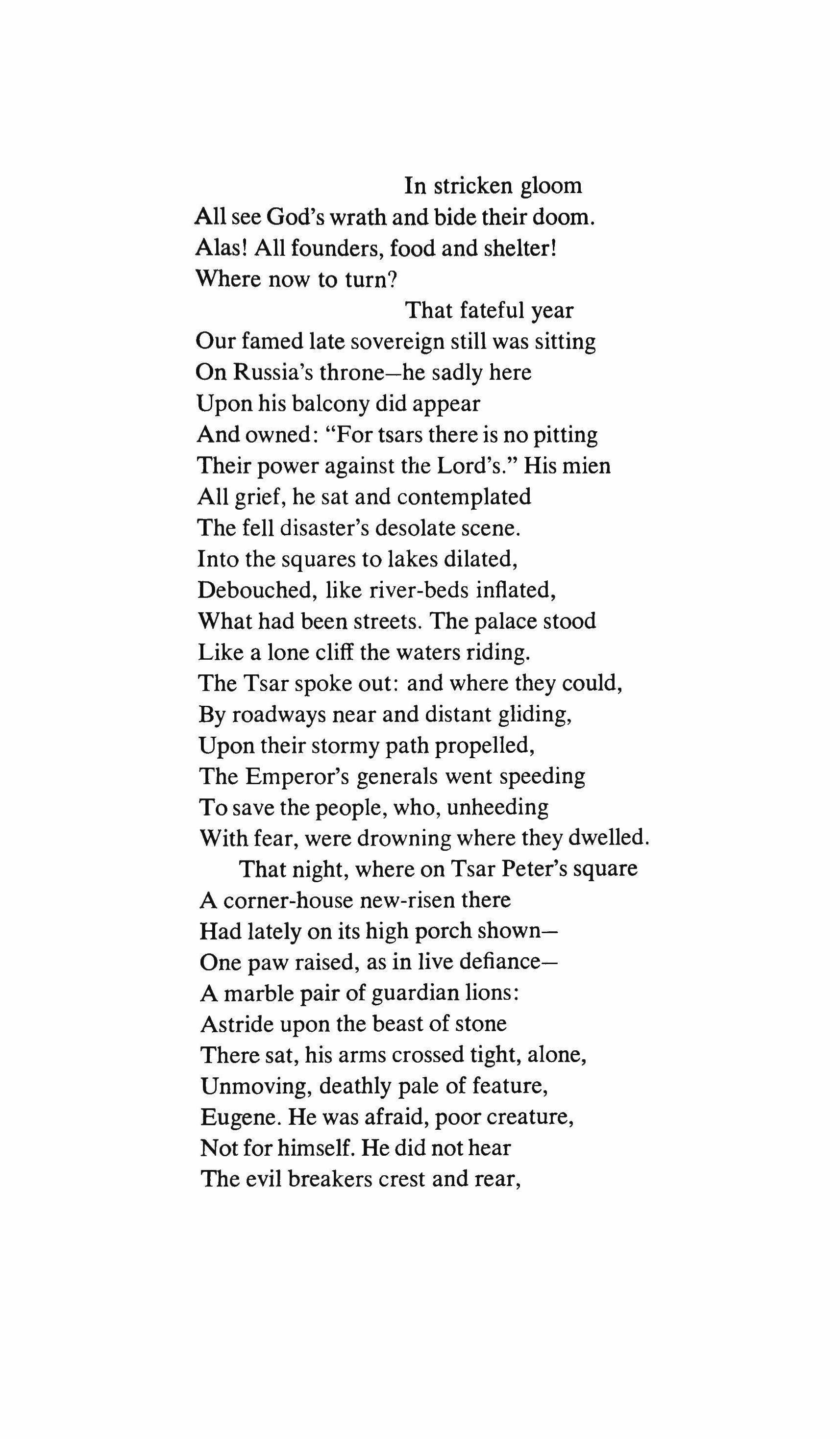
In stricken gloom
All see God's wrath and bide their doom. Alas! All founders, food and shelter! Where now to turn?
That fateful year
Our famed late sovereign still was sitting On Russia's throne-he sadly here Upon his balcony did appear And owned: "For tsars there is no pitting Their power against the Lord's." His mien All grief, he sat and contemplated The fell disaster's desolate scene. Into the squares to lakes dilated, Debouched, like river-beds inflated, What had been streets. The palace stood Like a lone cliff the waters riding. The Tsar spoke out: and where they could, By roadways near and distant gliding, Upon their stormy path propelled, The Emperor's generals went speeding To save the people, who, unheeding With fear, were drowning where they dwelled. That night, where on Tsar Peter's square A corner-house new-risen there
Had lately on its high porch shownOne paw raised, as in live defianceA marble pair of guardian lions: Astride upon the beast of stone
There sat, his arms crossed tight, alone, Unmoving, deathly pale of feature, Eugene. He was afraid, poor creature, Not for himself. He did not hear The evil breakers crest and rear,
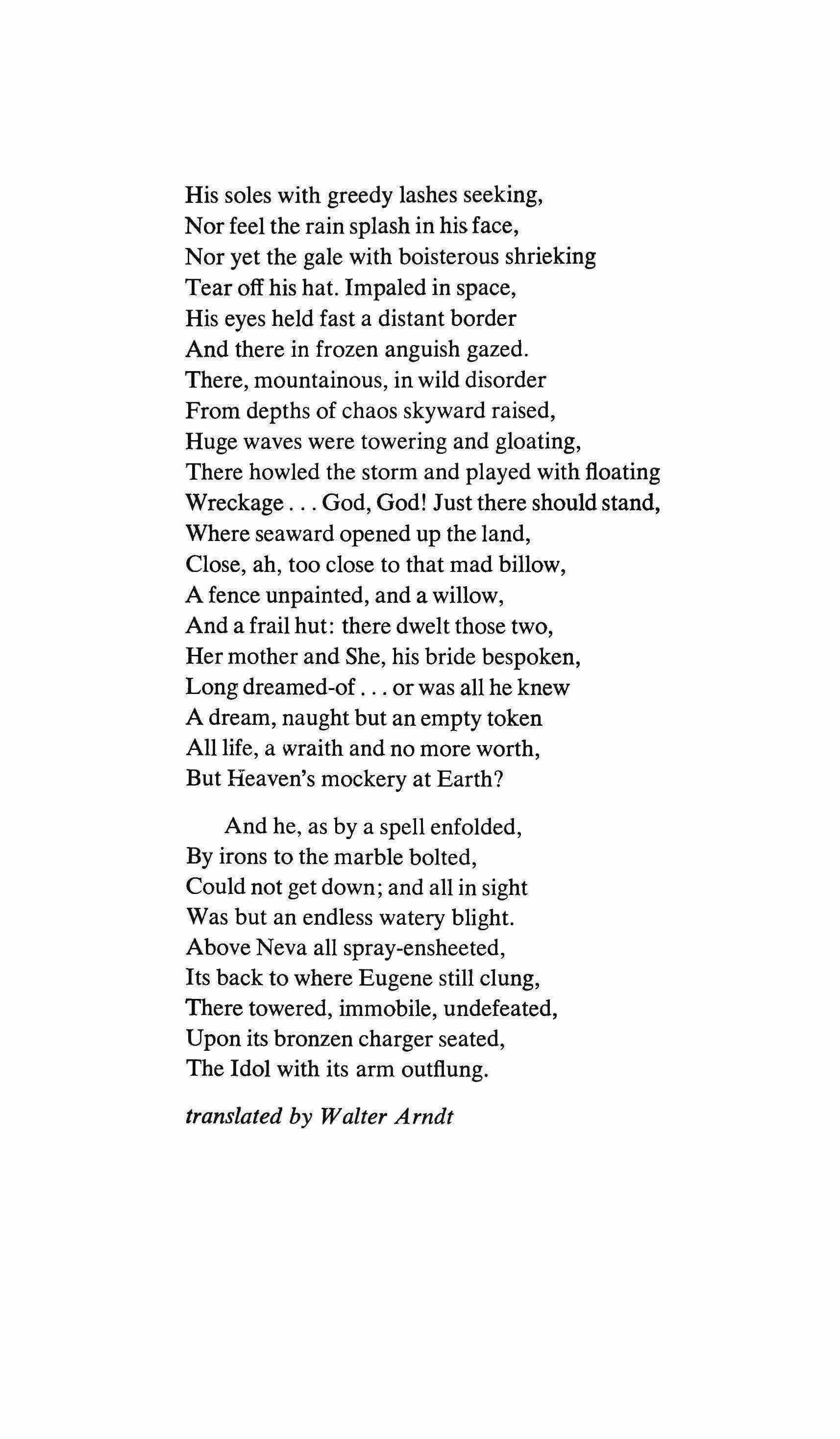
His soles with greedy lashes seeking, Nor feel the rain splash in his face, Nor yet the gale with boisterous shrieking Tear off his hat. Impaled in space, His eyes held fast a distant border And there in frozen anguish gazed. There, mountainous, in wild disorder
From depths of chaos skyward raised, Huge waves were towering and gloating, There howled the storm and played with floating Wreckage God, God! Just there should stand, Where seaward opened up the land, Close, ah, too close to that mad billow, A fence unpainted, and a willow, And a frail hut: there dwelt those two, Her mother and She, his bride bespoken, Long dreamed-of or was all he knew A dream, naught but an empty token All life, a wraith and no more worth, But Heaven's mockery at Earth?
And he, as by a spell enfolded, By irons to the marble bolted, Could not get down; and all in sight Was but an endless watery blight. Above Neva all spray-ensheeted, Its back to where Eugene still clung, There towered, immobile, undefeated, Upon its bronzen charger seated, The Idol with its arm outflung.
translated by Walter Arndt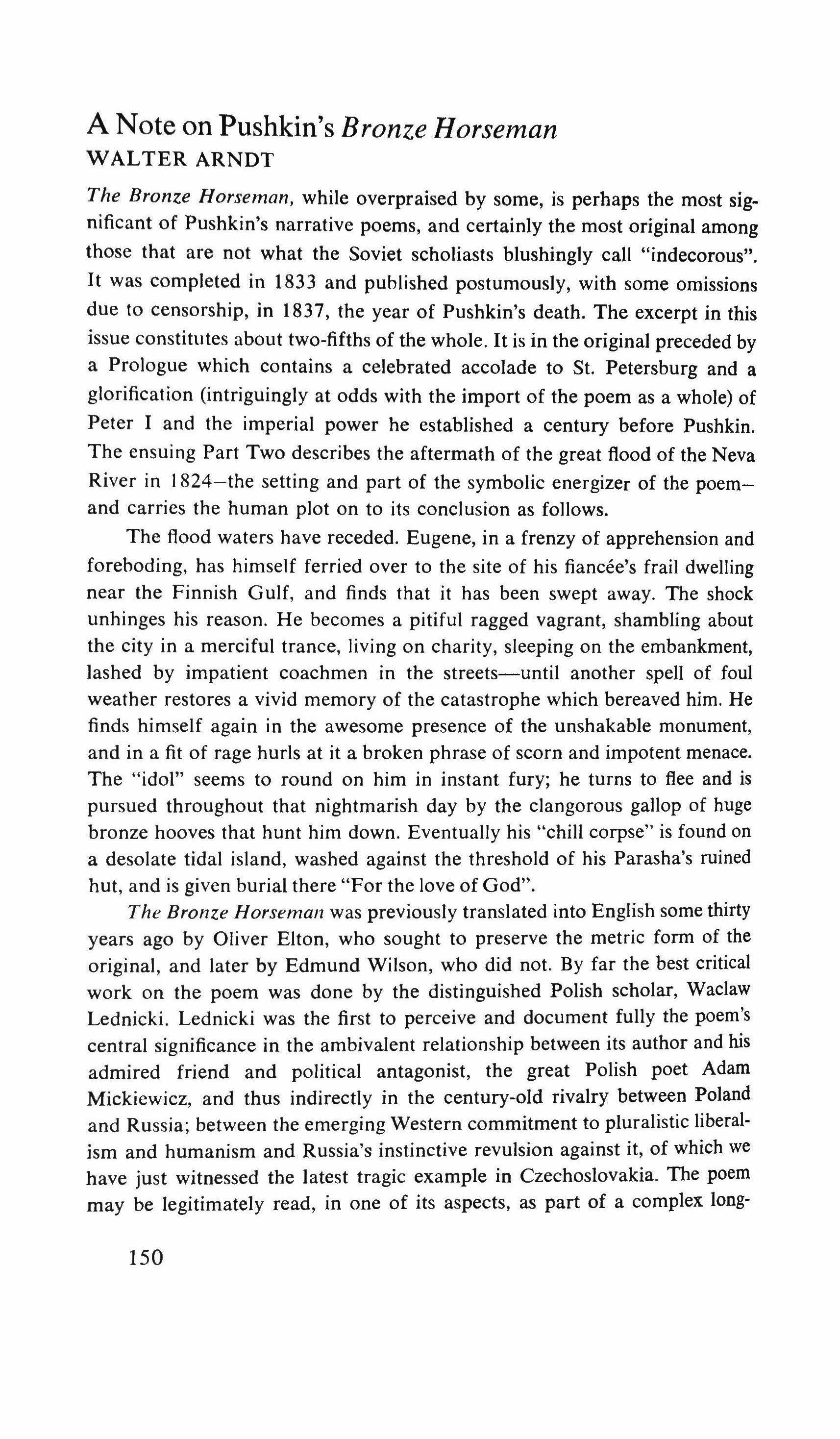
The Bronze Horseman, while overpraised by some, is perhaps the most significant of Pushkin's narrative poems, and certainly the most original among those that are not what the Soviet scholiasts blushingly call "indecorous". It was completed in 1833 and published postumously, with some omissions due to censorship, in 1837, the year of Pushkin's death. The excerpt in this issue constitutes about two-fifths of the whole. It is in the original preceded by a Prologue which contains a celebrated accolade to st. Petersburg and a glorification (intriguingly at odds with the import of the poem as a whole) of Peter I and the imperial power he established a century before Pushkin. The ensuing Part Two describes the aftermath of the great flood of the Neva River in 1824-the setting and part of the symbolic energizer of the poemand carries the human plot on to its conclusion as follows.
The flood waters have receded. Eugene, in a frenzy of apprehension and forehoding, has himself ferried over to the site of his fiancee's frail dwelling near the Finnish Gulf, and finds that it has been swept away. The shock unhinges his reason. He becomes a pitiful ragged vagrant, shambling about the city in a merciful trance, living on charity, sleeping on the embankment, lashed by impatient coachmen in the streets-until another spell of foul weather restores a vivid memory of the catastrophe which bereaved him. He finds himself again in the awesome presence of the unshakable monument, and in a fit of rage hurls at it a broken phrase of scorn and impotent menace. The "idol" seems to round on him in instant fury; he turns to flee and is pursued throughout that nightmarish day by the clangorous gallop of huge bronze hooves that hunt him down. Eventually his "chill corpse" is found on a desolate tidal island, washed against the threshold of his Parasha's ruined hut, and is given burial there "For the love of God".
The Bronze Horseman was previously translated into English some thirty years ago by Oliver Elton, who sought to preserve the metric form of the original, and later by Edmund Wilson, who did not. By far the best critical work on the poem was done by the distinguished Polish scholar, WacJaw Lednicki. Lednicki was the first to perceive and document fully the poem's central significance in the ambivalent relationship between its author and his admired friend and political antagonist, the great Polish poet Adam Mickiewicz, and thus indirectly in the century-old rivalry between Poland and Russia; between the emerging Western commitment to pluralistic liberalism and humanism and Russia's instinctive revulsion against it, of which we have just witnessed the latest tragic example in Czechoslovakia. The poem may be legitimately read, in one of its aspects, as part of a complex long-
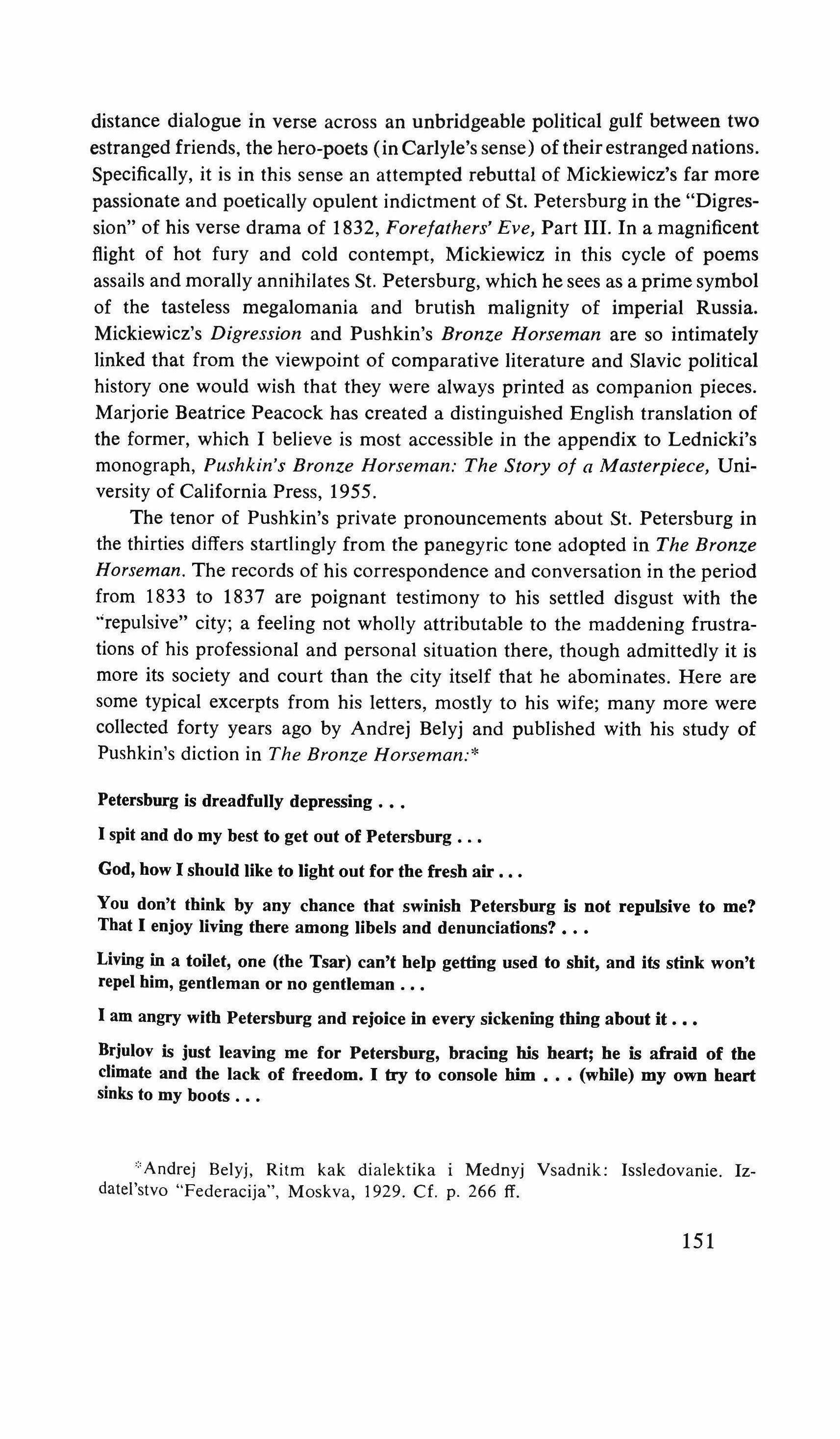
distance dialogue in verse across an unbridgeable political gulf between two estranged friends, the hero-poets (in Carlyle's sense) of their estranged nations. Specifically, it is in this sense an attempted rebuttal of Mickiewicz's far more passionate and poetically opulent indictment of St. Petersburg in the "Digression" of his verse drama of 1832, Forefathers' Eve, Part III. In a magnificent flight of hot fury and cold contempt, Mickiewicz in this cycle of poems assails and morally annihilates st. Petersburg, which he sees as a prime symbol of the tasteless megalomania and brutish malignity of imperial Russia. Mickiewicz's Digression and Pushkin's Bronze Horseman are so intimately linked that from the viewpoint of comparative literature and Slavic political history one would wish that they were always printed as companion pieces. Marjorie Beatrice Peacock has created a distinguished English translation of the former, which I believe is most accessible in the appendix to Lednicki's monograph, Pushkin's Bronze Horseman: The Story of a Masterpiece, University of California Press, 1955.
The tenor of Pushkin's private pronouncements about St. Petersburg in the thirties differs startlingly from the panegyric tone adopted in The Bronze Horseman. The records of his correspondence and conversation in the period from 1833 to 1837 are poignant testimony to his settled disgust with the "repulsive" city; a feeling not wholly attributable to the maddening frustrations of his professional and personal situation there, though admittedly it is more its society and court than the city itself that he abominates. Here are some typical excerpts from his letters, mostly to his wife; many more were collected forty years ago by Andrej Belyj and published with his study of Pushkin's diction in The Bronze Horseman:*
Petersburg is dreadfully depressing
I spit and do my best to get out of Petersburg
God, how I should like to light out for the fresh air
You don't think by any chance that swinish Petersburg is not repulsive to me? That I enjoy living there among libels and denunciations?
Living in a toilet, one (the Tsar) can't help getting used to shit, and its stink won't repel him, gentleman or no gentleman
I am angry with Petersburg and rejoice in every sickening thing about it
Brjulov is just leaving me for Petersburg, bracing his heart; he is afraid of the climate and the lack of freedom. I try to console him (while) my own heart sinks to my boots
':'Andrej Belyj, Ritm kak dialektika i Mednyj Vsadnik: Issledovanie. Izdatel'stvo "Federacija", Moskva, 1929. Cf. p. 266 ff.
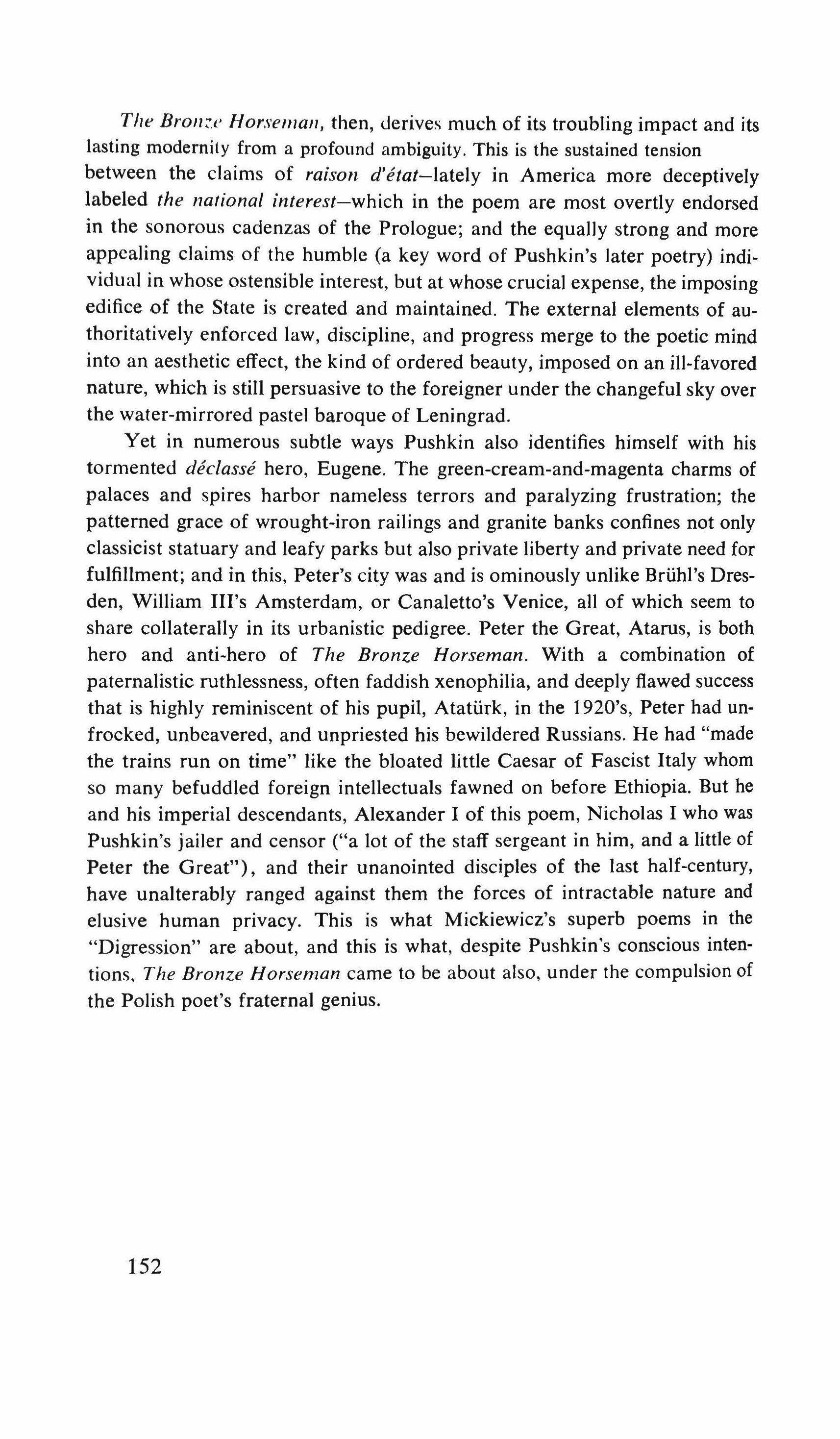
The Bronze Horseman, then, derives much of its troubling impact and its lasting modernity from a profound ambiguity. This is the sustained tension between the claims of raison d'etat-lately in America more deceptively labeled the national interest-which in the poem are most overtly endorsed in the sonorous cadenzas of the Prologue; and the equally strong and more appealing claims of the humble (a key word of Pushkin's later poetry) individual in whose ostensible interest, but at whose crucial expense, the imposing edifice of the State is created and maintained. The external elements of authoritatively enforced law, discipline, and progress merge to the poetic mind into an aesthetic effect, the kind of ordered beauty, imposed on an ill-favored nature, which is still persuasive to the foreigner under the changeful sky over the water-mirrored pastel baroque of Leningrad.
Yet in numerous subtle ways Pushkin also identifies himself with his tormented declasse hero, Eugene. The green-cream-and-magenta charms of palaces and spires harbor nameless terrors and paralyzing frustration; the patterned grace of wrought-iron railings and granite banks confines not only classicist statuary and leafy parks but also private liberty and private need for fulfillment; and in this, Peter's city was and is ominously unlike Bruhl's Dresden, William Ill's Amsterdam, or Canaletto's Venice, all of which seem to share collaterally in its urbanistic pedigree. Peter the Great, Atarus, is both hero and anti-hero of The Bronze Horseman. With a combination of paternalistic ruthlessness, often faddish xenophilia, and deeply flawed success that is highly reminiscent of his pupil, Atatiirk, in the 1920's, Peter had unfrocked, unbeavered, and unpriested his bewildered Russians. He had "made the trains run on time" like the bloated little Caesar of Fascist Italy whom so many befuddled foreign intellectuals fawned on before Ethiopia. But he and his imperial descendants, Alexander I of this poem, Nicholas I who was Pushkin's jailer and censor ("a lot of the staff sergeant in him, and a little of Peter the Great"), and their unanointed disciples of the last half-century, have unalterably ranged against them the forces of intractable nature and elusive human privacy. This is what Mickiewicz's superb poems in the "Digression" are about, and this is what, despite Pushkin's conscious intentions, The Bronze Horseman came to be about also, under the compulsion of the Polish poet's fraternal genius.
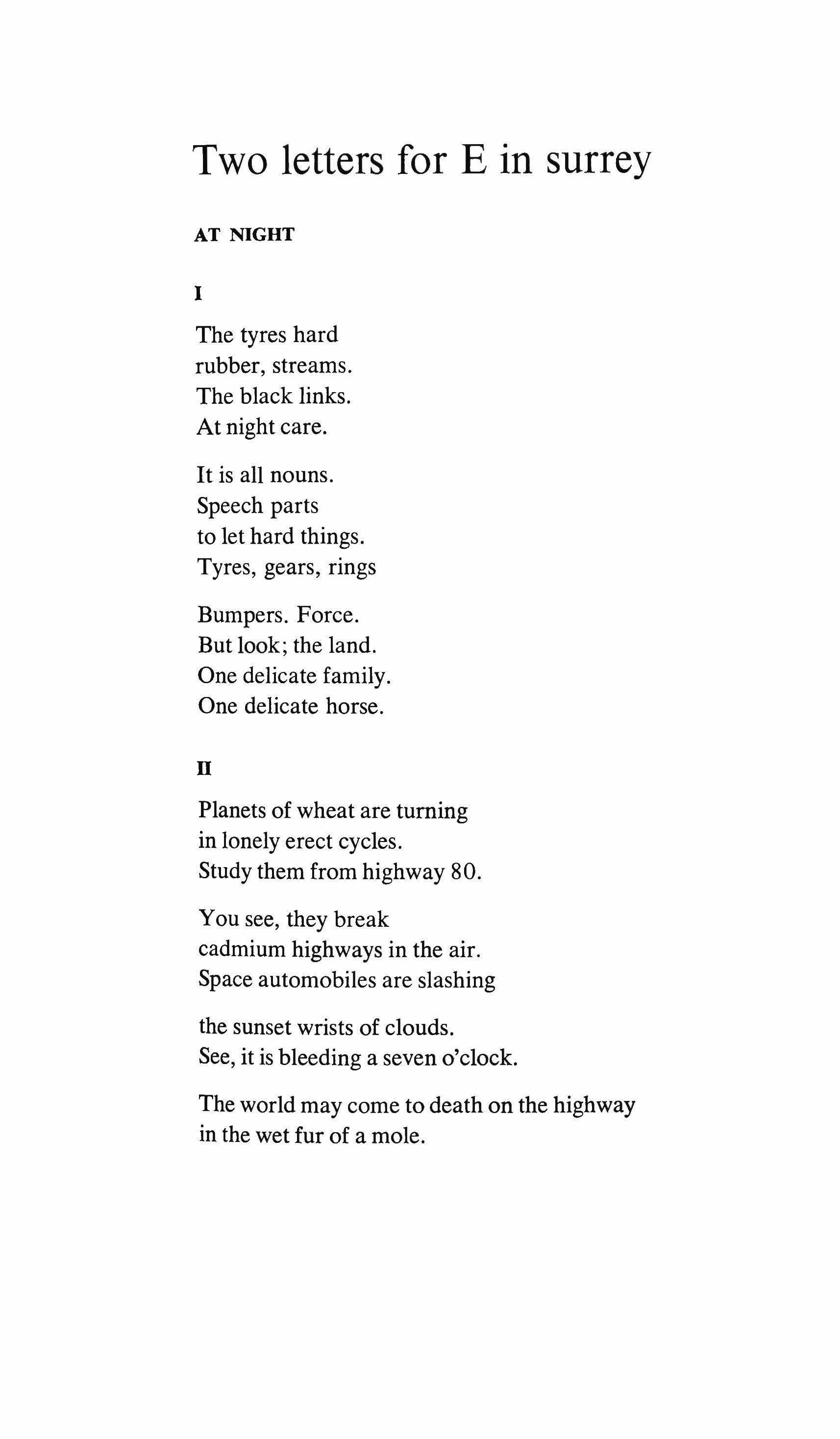
AT NIGHT
I
The tyres hard rubber, streams. The black links. At night care.
It is all nouns. Speech parts to let hard things. Tyres, gears, rings
Bumpers. Force. But look; the land. One delicate family. One delicate horse.
n
Planets of wheat are turning in lonely erect cycles. Study them from highway 80.
You see, they break cadmium highways in the air. Space automobiles are slashing the sunset wrists of clouds. See, it is bleeding a seven o'clock.
The world may come to death on the highway in the wet fur of a mole.
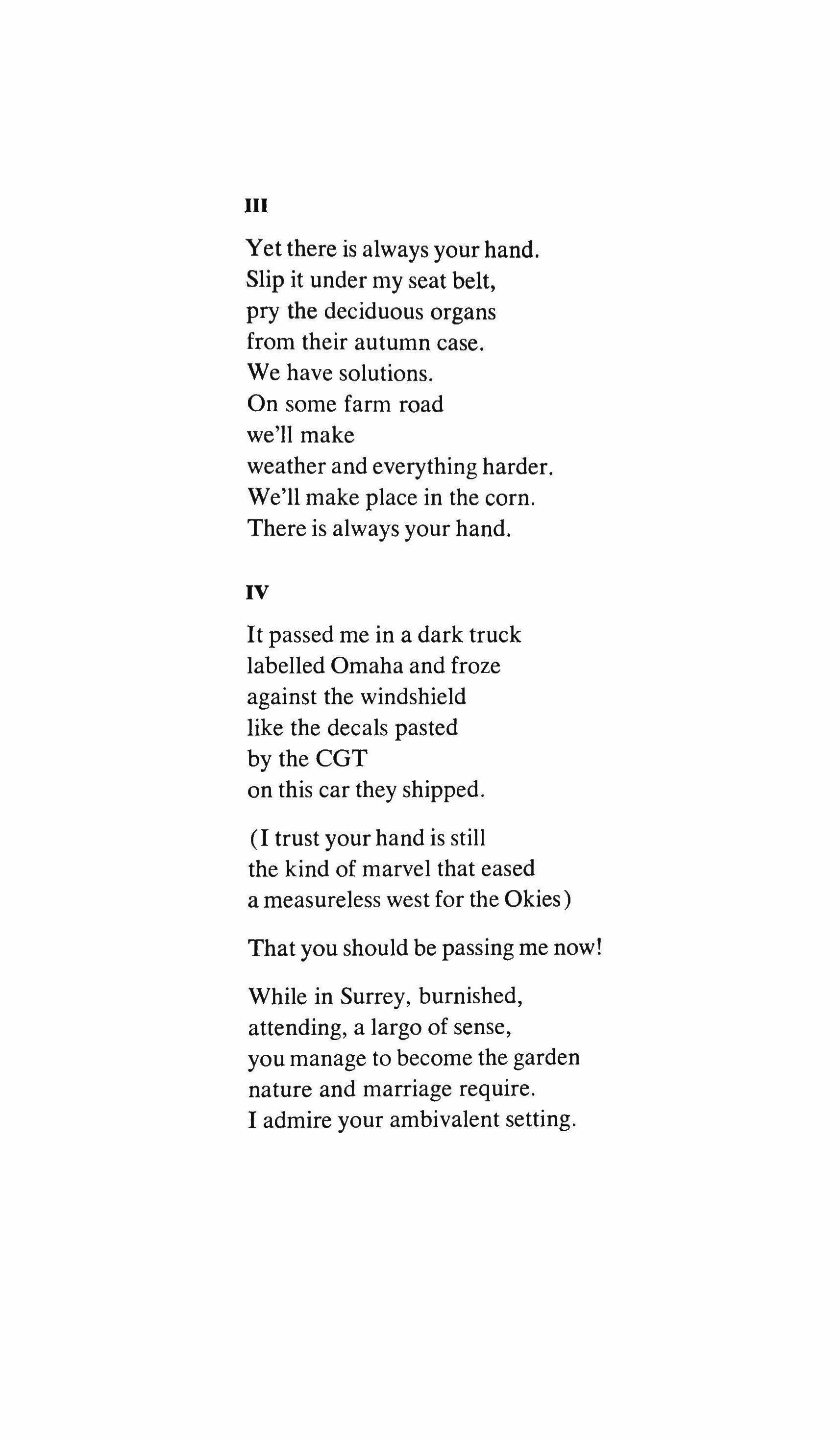
III
Yet there is always your hand. Slip it under my seat belt, pry the deciduous organs from their autumn case. We have solutions.
On some farm road we'lI make weather and everything harder. We'll make place in the corn. There is always your hand.
IV
It passed me in a dark truck labelled Omaha and froze against the windshield like the decals pasted by the CGT on this car they shipped.
(I trust your hand is still the kind of marvel that eased a measureless west for the Okies)
That you should be passing me now!
While in Surrey, burnished, attending, a largo of sense, you manage to become the garden nature and marriage require. I admire your ambivalent setting.
You hear it. The thick hardset tumble of lorries. Moline, Rock Island, Davenport, the lonely foreheads of night. The allnight coffee. Gears. Wrists, holding the shiftstick flower, the engine's blossom. Somewhere outside Des Moines, perhaps, a shudder of sunrise.
You turn to your husband, the pilot, and point from the courteous window to the dark red lining of a rose.
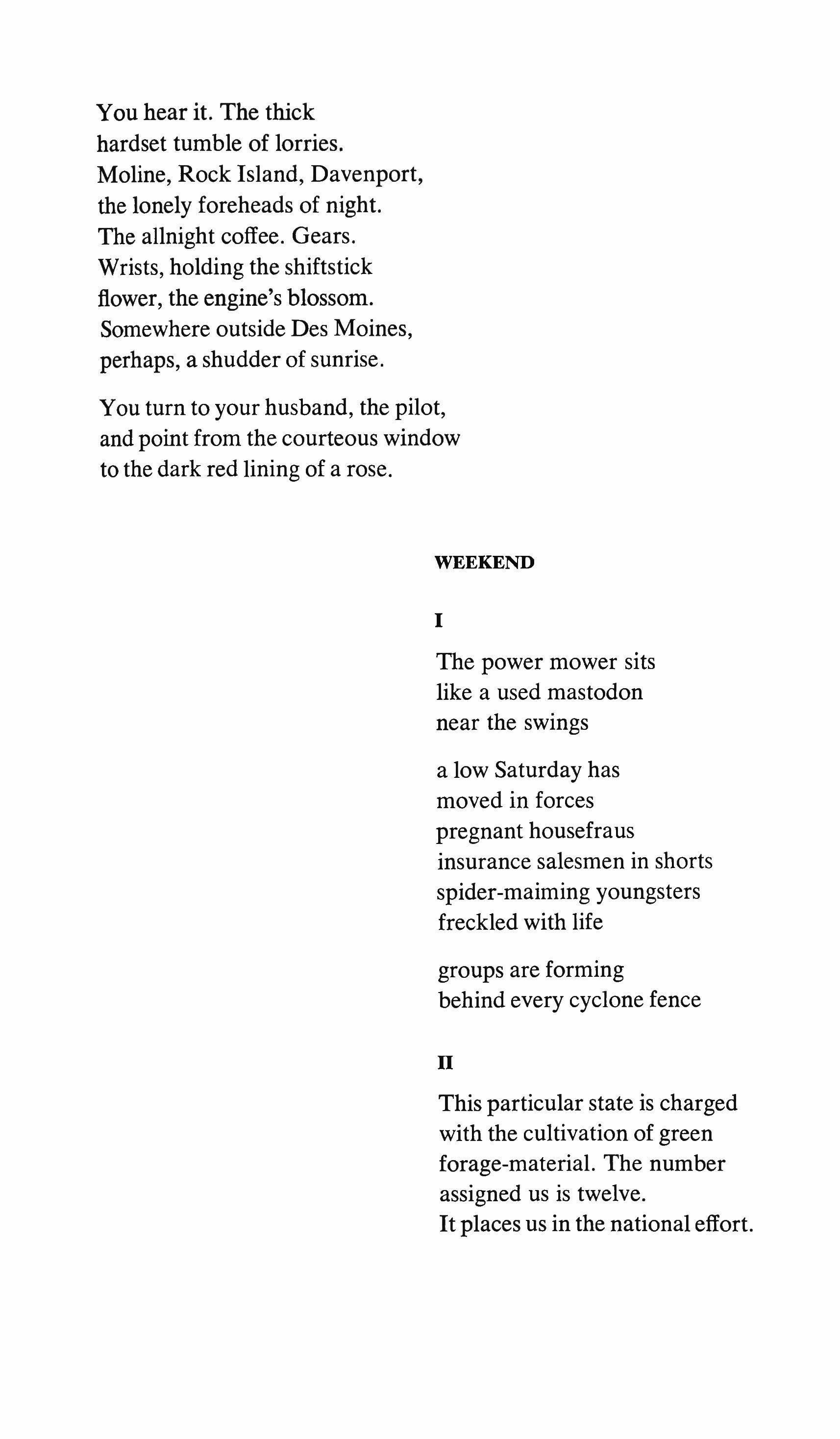
The power mower sits like a used mastodon near the swings
a low Saturday has moved in forces pregnant housefraus insurance salesmen in shorts spider-maiming youngsters freckled with life groups are forming behind every cyclone fence
n
This particular state is charged with the cultivation of green forage-material. The number assigned us is twelve. It places us in the national effort.
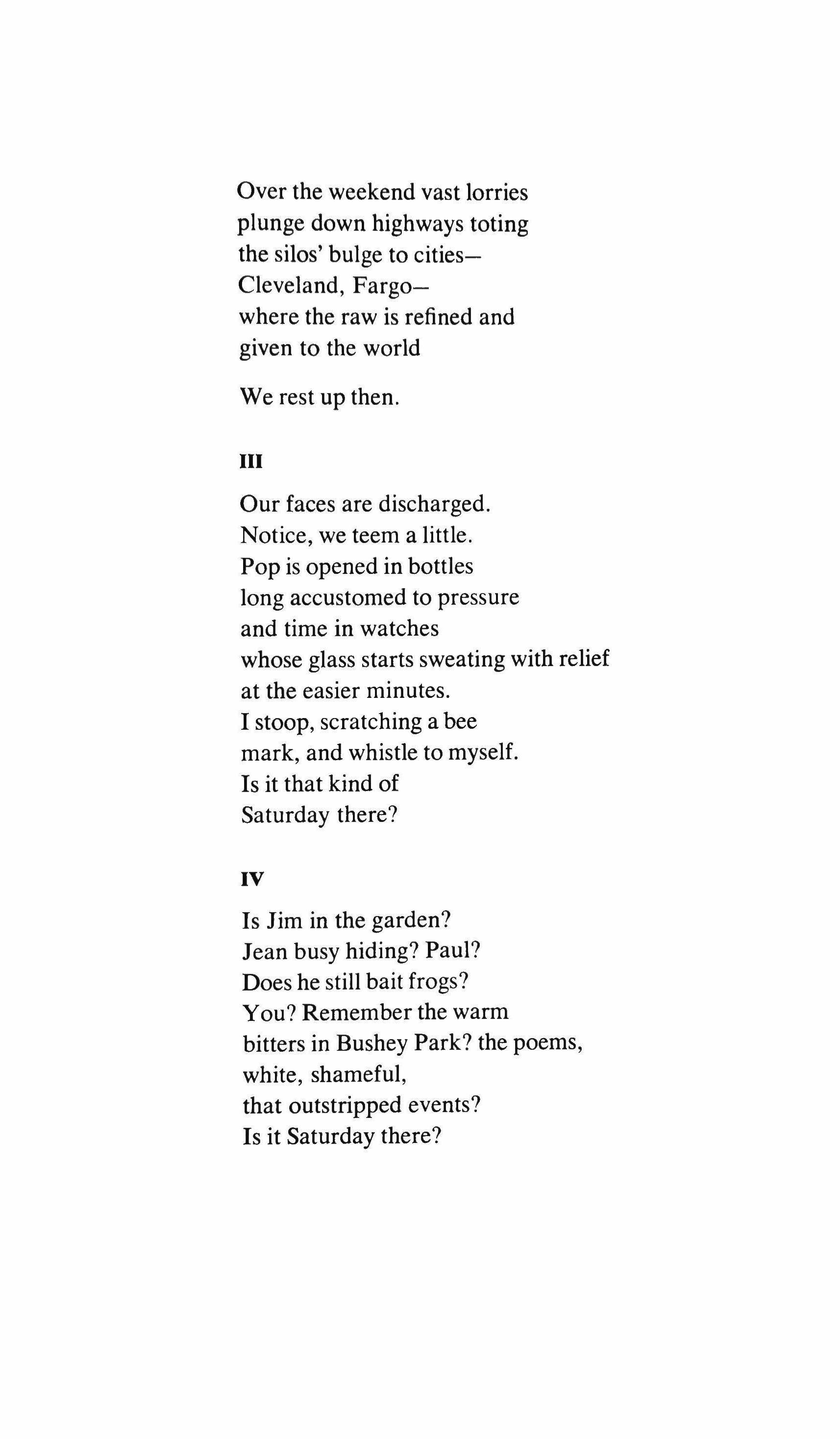
Over the weekend vast lorries plunge down highways toting the silos' bulge to citiesCleveland, Fargowhere the raw is refined and given to the world
We rest up then.
III
Our faces are discharged. Notice, we teem a little. Pop is opened in bottles long accustomed to pressure and time in watches whose glass starts sweating with relief at the easier minutes. I stoop, scratching a bee mark, and whistle to myself. Is it that kind of Saturday there?
IV
Is Jim in the garden? Jean busy hiding? Paul? Does he still bait frogs? You? Remember the warm bitters in Bushey Park? the poems, white, shameful, that outstripped events? Is it Saturday there?
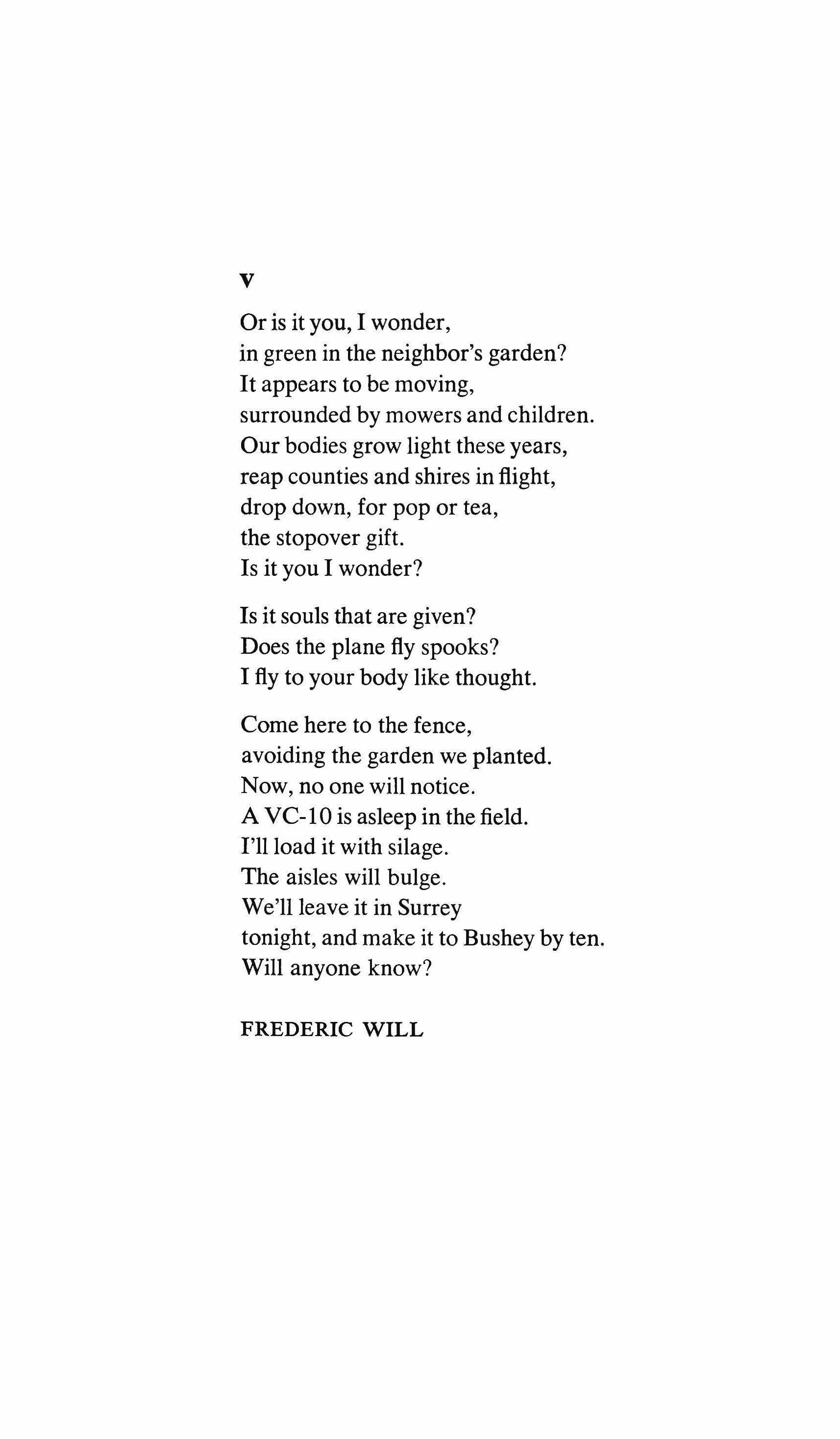
Or is it you, I wonder, in green in the neighbor's garden? It appears to be moving, surrounded by mowers and children. Our bodies grow light these years, reap counties and shires in flight, drop down, for pop or tea, the stopover gift. Is it you I wonder? Is it souls that are given? Does the plane fly spooks? I fly to your body like thought. Come here to the fence, avoiding the garden we planted. Now, no one will notice. A VC-l0 is asleep in the field. I'll load it with silage. The aisles will bulge. We'll leave it in Surrey tonight, and make it to Bushey by ten. Will anyone know?
FREDERIC WILL
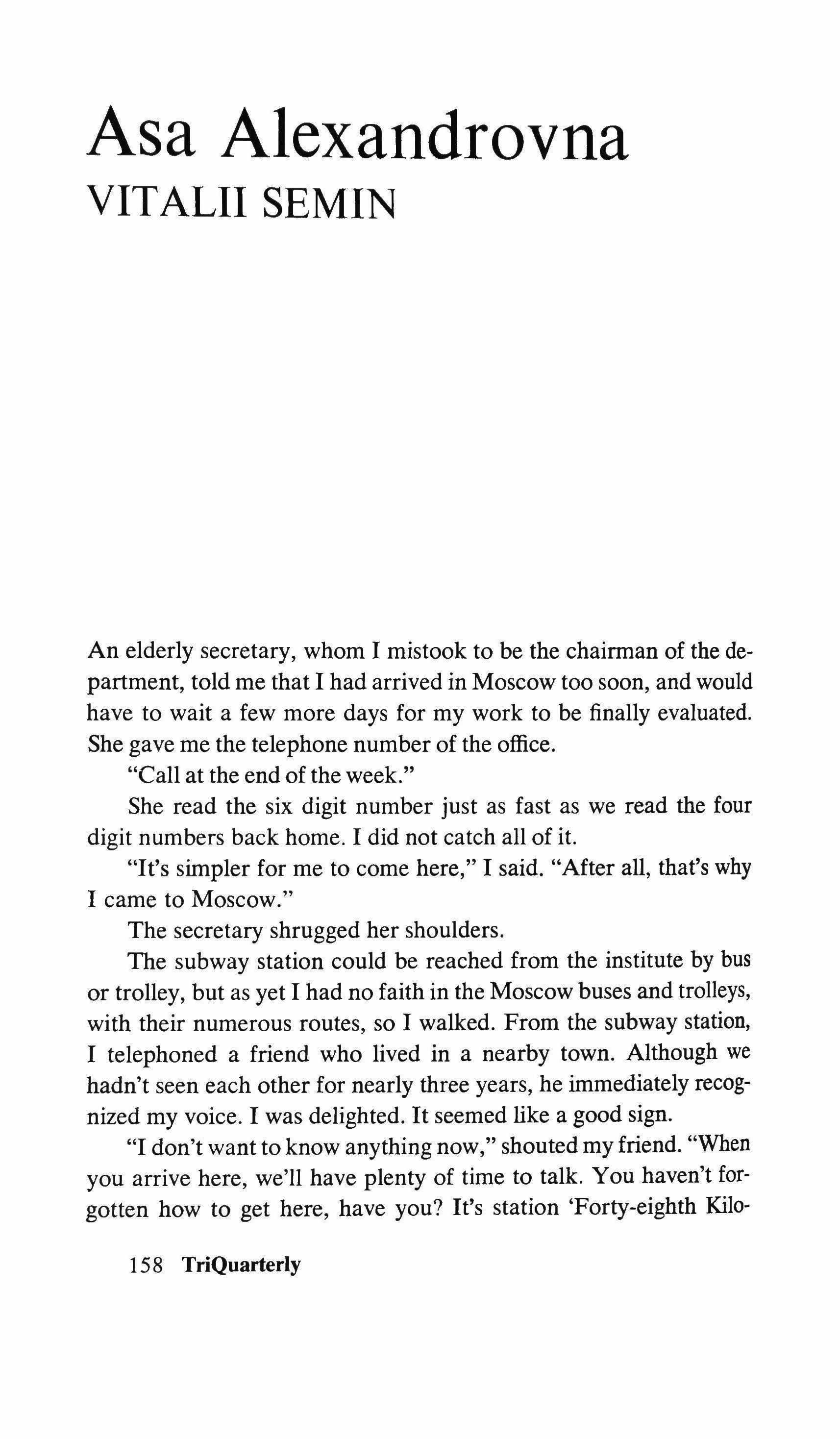
An elderly secretary, whom 1 mistook to be the chairman of the department, told me that 1 had arrived in Moscow too soon, and would have to wait a few more days for my work to be finally evaluated. She gave me the telephone number of the office.
"Call at the end of the week."
She read the six digit number just as fast as we read the four digit numbers back home. 1 did not catch all of it.
"It's simpler for me to come here," 1 said. "After all, that's why 1 came to Moscow."
The secretary shrugged her shoulders.
The subway station could be reached from the institute by bus or trolley, but as yet 1 had no faith in the Moscow buses and trolleys, with their numerous routes, so 1 walked. From the subway station, 1 telephoned a friend who lived in a nearby town. Although we hadn't seen each other for nearly three years, he immediately recognized my voice. 1 was delighted. It seemed like a good sign.
"I don't want to know anything now," shouted my friend. "When you arrive here, we'll have plenty of time to talk. You haven't forgotten how to get here, have you? It's station 'Forty-eighth Kilo-
158 TriQuarterly
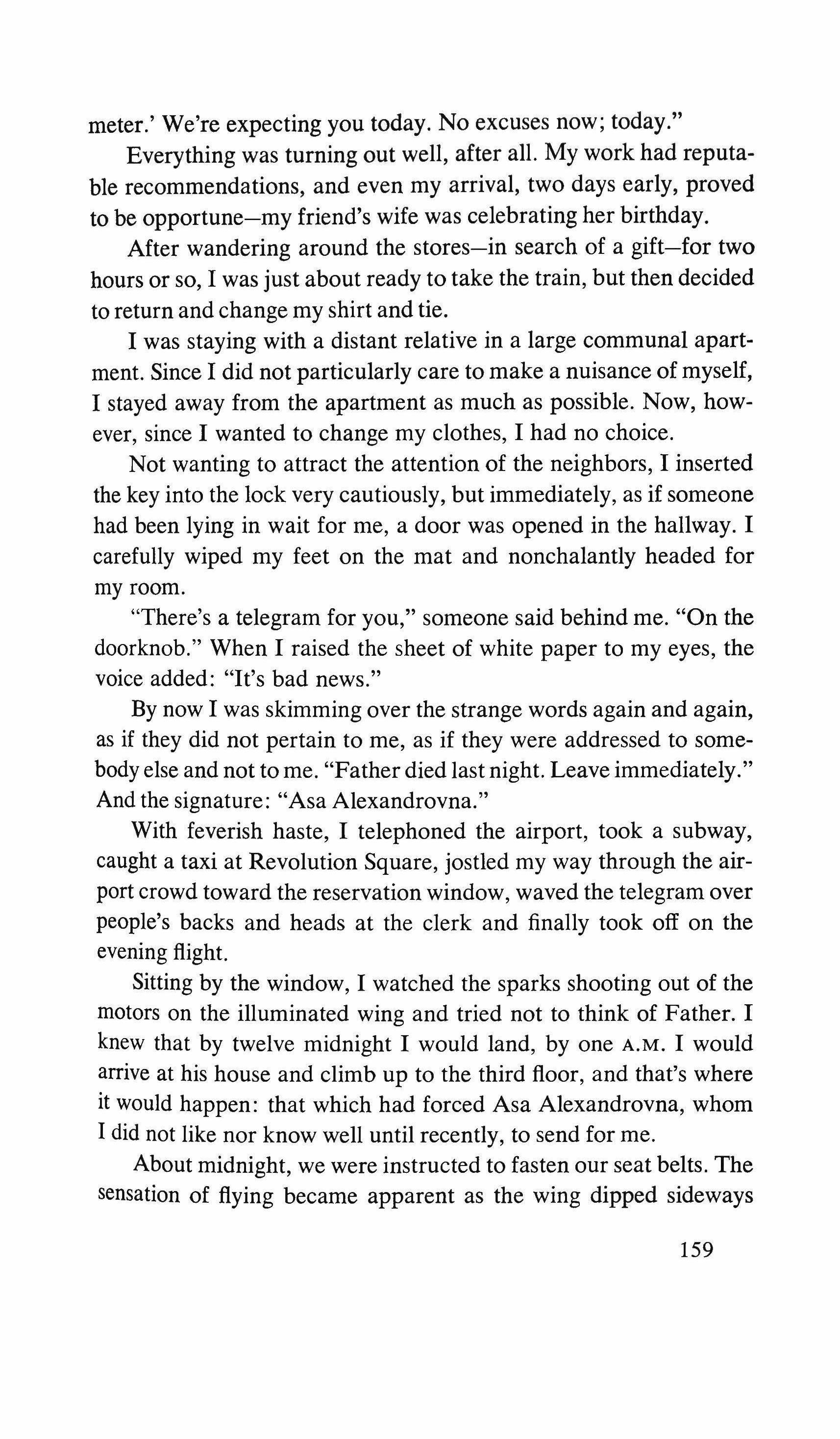
meter.' We're expecting you today. No excuses now; today."
Everything was turning out well, after all. My work had reputable recommendations, and even my arrival, two days early, proved to be opportune-my friend's wife was celebrating her birthday.
After wandering around the stores-in search of a gift-for two hours or so, I was just about ready to take the train, but then decided to return and change my shirt and tie.
I was staying with a distant relative in a large communal apartment. Since I did not particularly care to make a nuisance of myself, I stayed away from the apartment as much as possible. Now, however, since I wanted to change my clothes, I had no choice.
Not wanting to attract the attention of the neighbors, I inserted the key into the lock very cautiously, but immediately, as if someone had been lying in wait for me, a door was opened in the hallway. I carefully wiped my feet on the mat and nonchalantly headed for my room.
"There's a telegram for you," someone said behind me. "On the doorknob." When I raised the sheet of white paper to my eyes, the voice added: "It's bad news."
By now I was skimming over the strange words again and again, as if they did not pertain to me, as if they were addressed to somebody else and not to me. "Father died last night. Leave immediately." And the signature: "Asa Alexandrovna."
With feverish haste, I telephoned the airport, took a subway, caught a taxi at Revolution Square, jostled my way through the airport crowd toward the reservation window, waved the telegram over people's backs and heads at the clerk and finally took off on the evening flight.
Sitting by the window, I watched the sparks shooting out of the motors on the illuminated wing and tried not to think of Father. I knew that by twelve midnight I would land, by one A.M. I would arrive at his house and climb up to the third floor, and that's where it would happen: that which had forced Asa Alexandrovna, whom I did not like nor know well until recently, to send for me.
About midnight, we were instructed to fasten our seat belts. The sensation of flying became apparent as the wing dipped sideways
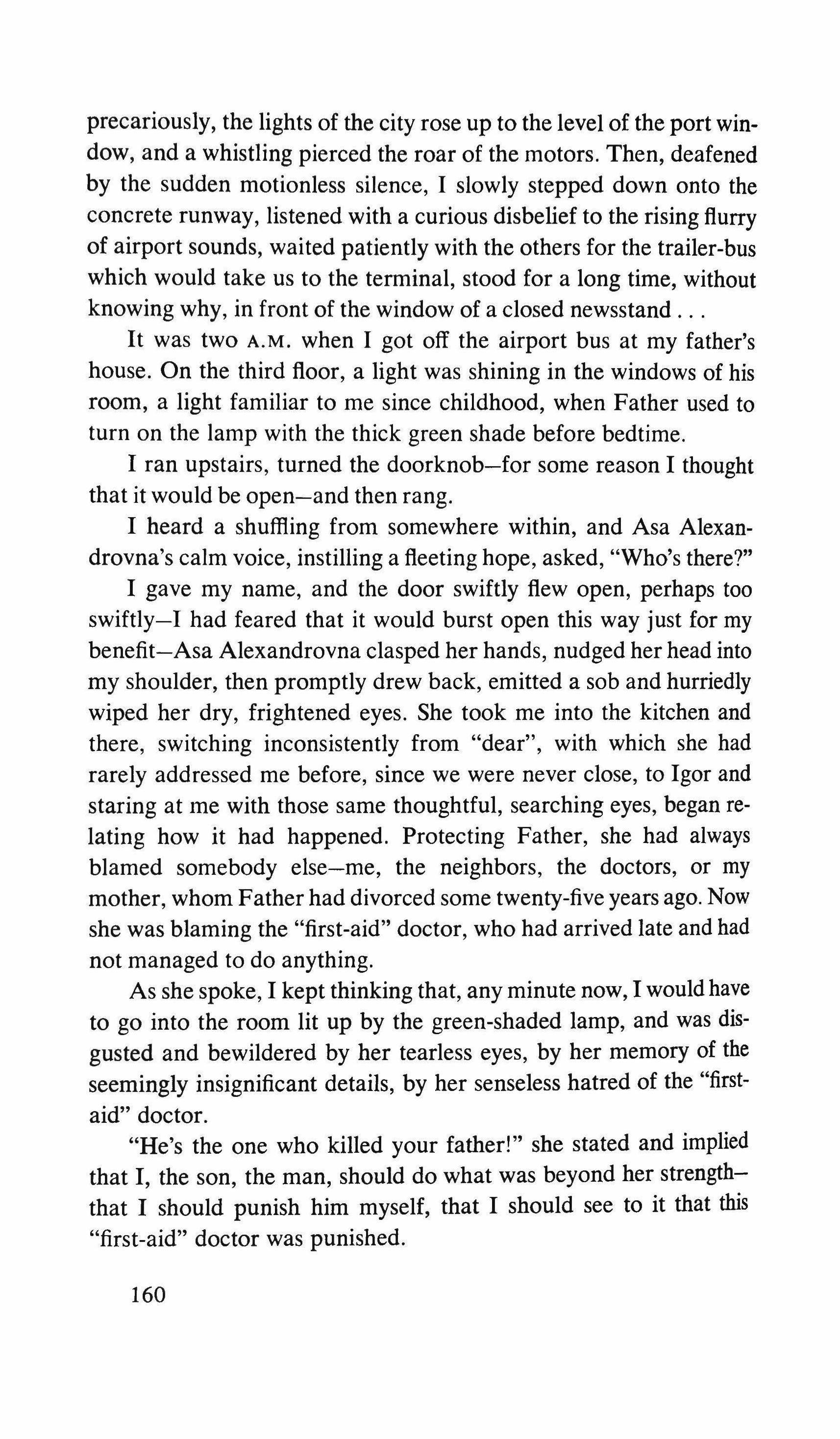
precariously, the lights of the city rose up to the level of the port window, and a whistling pierced the roar of the motors. Then, deafened by the sudden motionless silence, I slowly stepped down onto the concrete runway, listened with a curious disbelief to the rising flurry of airport sounds, waited patiently with the others for the trailer-bus which would take us to the terminal, stood for a long time, without knowing why, in front of the window of a closed newsstand
It was two A.M. when I got off the airport bus at my father's house. On the third floor, a light was shining in the windows of his room, a light familiar to me since childhood, when Father used to turn on the lamp with the thick green shade before bedtime.
I ran upstairs, turned the doorknob-for some reason I thought that it would be open-and then rang.
I heard a shuffling from somewhere within, and Asa Alexandrovna's calm voice, instilling a fleeting hope, asked, "Who's there?"
I gave my name, and the door swiftly flew open, perhaps too swiftly-I had feared that it would burst open this way just for my benefit-Asa Alexandrovna clasped her hands, nudged her head into my shoulder, then promptly drew back, emitted a sob and hurriedly wiped her dry, frightened eyes. She took me into the kitchen and there, switching inconsistently from "dear", with which she had rarely addressed me before, since we were never close, to Igor and staring at me with those same thoughtful, searching eyes, began relating how it had happened. Protecting Father, she had always blamed somebody else-me, the neighbors, the doctors, or my mother, whom Father had divorced some twenty-five years ago. Now she was blaming the "first-aid" doctor, who had arrived late and had not managed to do anything.
As she spoke, I kept thinking that, any minute now, I would have to go into the room lit up by the green-shaded lamp, and was disgusted and bewildered by her tearless eyes, by her memory of the seemingly insignificant details, by her senseless hatred of the "firstaid" doctor.
"He's the one who killed your father!" she stated and implied that I, the son, the man, should do what was beyond her strengththat I should punish him myself, that I should see to it that this "first-aid" doctor was punished.
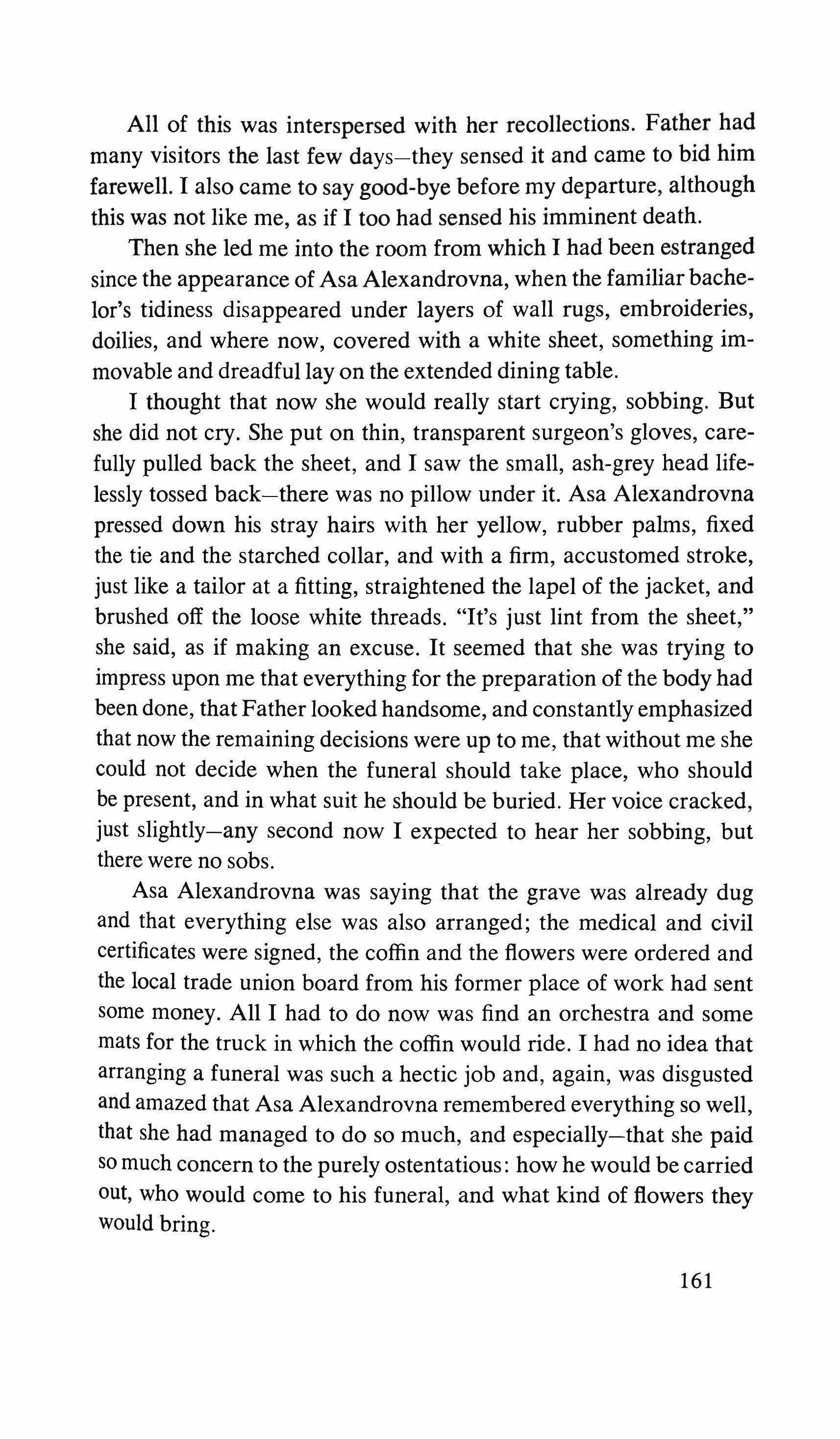
All of this was interspersed with her recollections. Father had many visitors the last few days-they sensed it and came to bid him farewell. I also came to say good-bye before my departure, although this was not like me, as if I too had sensed his imminent death.
Then she led me into the room from which I had been estranged since the appearance of Asa Alexandrovna, when the familiar bachelor's tidiness disappeared under layers of wall rugs, embroideries, doilies, and where now, covered with a white sheet, something immovable and dreadful lay on the extended dining table.
I thought that now she would really start crying, sobbing. But she did not cry. She put on thin, transparent surgeon's gloves, carefully pulled back the sheet, and I saw the small, ash-grey head lifelessly tossed back-there was no pillow under it. Asa Alexandrovna pressed down his stray hairs with her yellow, rubber palms, fixed the tie and the starched collar, and with a firm, accustomed stroke, just like a tailor at a fitting, straightened the lapel of the jacket, and brushed off the loose white threads. "It's just lint from the sheet," she said, as if making an excuse. It seemed that she was trying to impress upon me that everything for the preparation of the body had been done, that Father looked handsome, and constantly emphasized that now the remaining decisions were up to me, that without me she could not decide when the funeral should take place, who should be present, and in what suit he should be buried. Her voice cracked, just slightly-any second now I expected to hear her sobbing, but there were no sobs.
Asa Alexandrovna was saying that the grave was already dug and that everything else was also arranged; the medical and civil certificates were signed, the coffin and the flowers were ordered and the local trade union board from his former place of work had sent some money. All I had to do now was find an orchestra and some mats for the truck in which the coffin would ride. I had no idea that arranging a funeral was such a hectic job and, again, was disgusted and amazed that Asa Alexandrovna remembered everything so well, that she had managed to do so much, and especially-that she paid so much concern to the purely ostentatious: how he would be carried out, who would come to his funeral, and what kind of flowers they would bring.
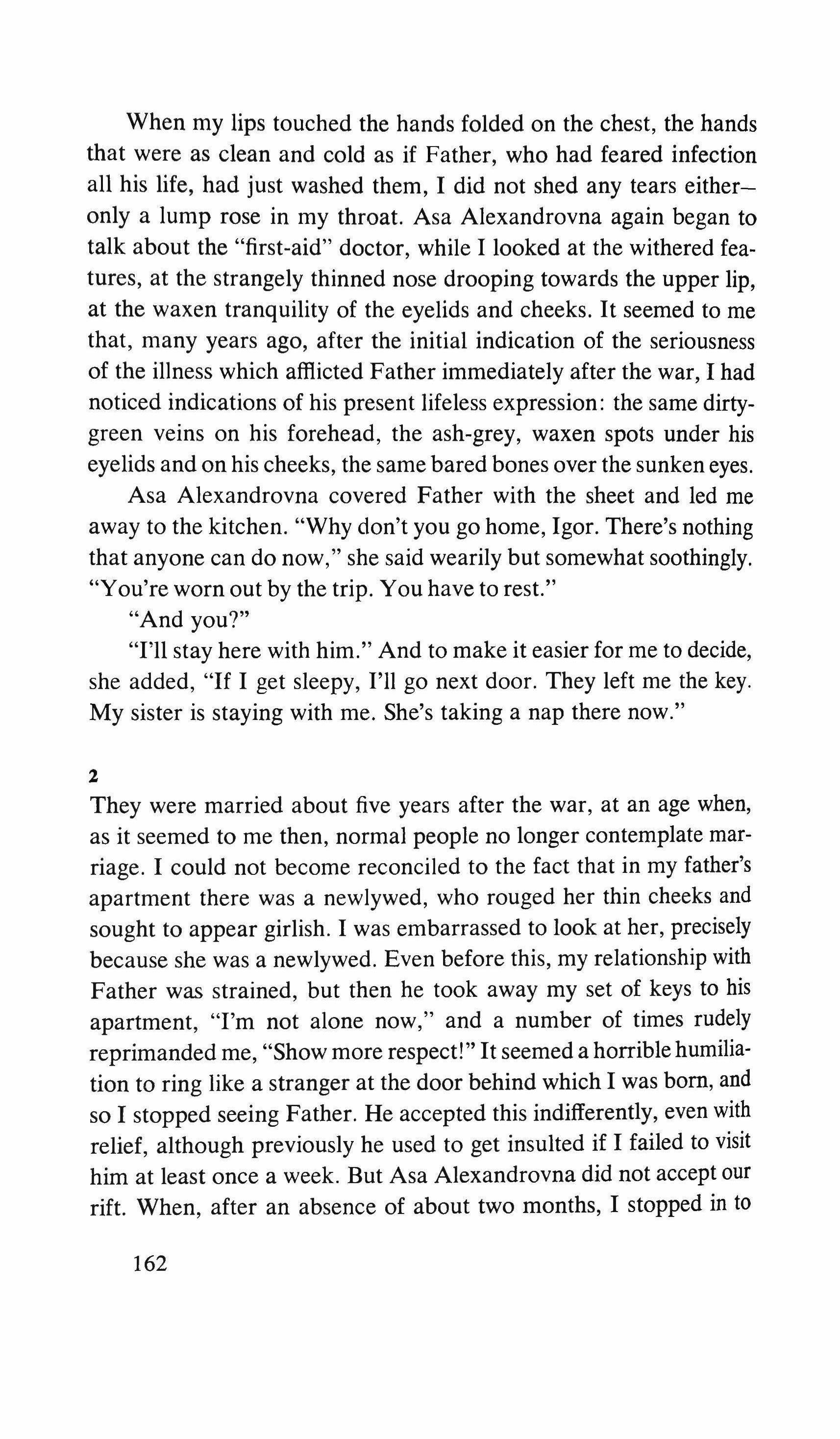
When my lips touched the hands folded on the chest, the hands that were as clean and cold as if Father, who had feared infection all his life, had just washed them, I did not shed any tears eitheronly a lump rose in my throat. Asa Alexandrovna again began to talk about the "first-aid" doctor, while I looked at the withered features, at the strangely thinned nose drooping towards the upper lip, at the waxen tranquility of the eyelids and cheeks. It seemed to me that, many years ago, after the initial indication of the seriousness of the illness which afflicted Father immediately after the war, I had noticed indications of his present lifeless expression: the same dirtygreen veins on his forehead, the ash-grey, waxen spots under his eyelids and on his cheeks, the same bared bones over the sunken eyes.
Asa Alexandrovna covered Father with the sheet and led me away to the kitchen. "Why don't you go home, Igor. There's nothing that anyone can do now," she said wearily but somewhat soothingly. "You're worn out by the trip. You have to rest."
"And you?"
"I'll stay here with him." And to make it easier for me to decide, she added, "If I get sleepy, I'll go next door. They left me the key. My sister is staying with me. She's taking a nap there now."
2
They were married about five years after the war, at an age when, as it seemed to me then, normal people no longer contemplate marriage. I could not become reconciled to the fact that in my father's apartment there was a newlywed, who rouged her thin cheeks and sought to appear girlish. I was embarrassed to look at her, precisely because she was a newlywed. Even before this, my relationship with Father was strained, but then he took away my set of keys to his apartment, "I'm not alone now," and a number of times rudely reprimanded me, "Show more respect!" It seemed a horrible humiliation to ring like a stranger at the door behind which I was born, and so I stopped seeing Father. He accepted this indifferently, even with relief, although previously he used to get insulted if I failed to visit him at least once a week. But Asa Alexandrovna did not accept our rift. When, after an absence of about two months, I stopped in to
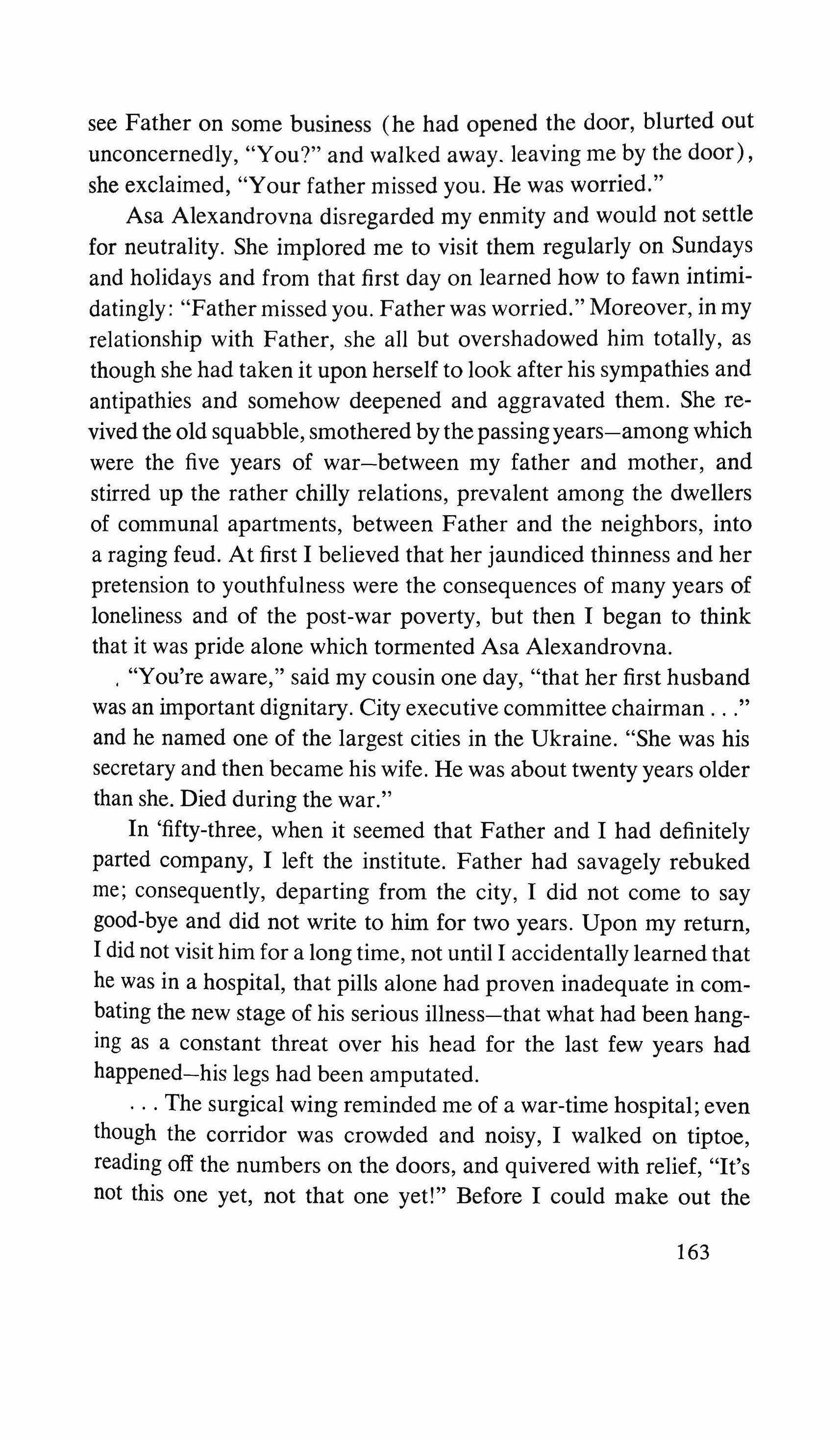
see Father on some business (he had opened the door, blurted out unconcernedly, "You?" and walked away. leaving me by the door), she exclaimed, "Your father missed you. He was worried."
Asa Alexandrovna disregarded my enmity and would not settle for neutrality. She implored me to visit them regularly on Sundays and holidays and from that first day on learned how to fawn intimidatingly: "Father missed you. Father was worried." Moreover, in my relationship with Father, she all but overshadowed him totally, as though she had taken it upon herself to look after his sympathies and antipathies and somehow deepened and aggravated them. She revived the old squabble, smothered by the passingyears-among which were the five years of war-between my father and mother, and stirred up the rather chilly relations, prevalent among the dwellers of communal apartments, between Father and the neighbors, into a raging feud. At first I believed that her jaundiced thinness and her pretension to youthfulness were the consequences of many years of loneliness and of the post-war poverty, but then I began to think that it was pride alone which tormented Asa Alexandrovna.
"You're aware," said my cousin one day, "that her first husband was an important dignitary. City executive committee chairman and he named one of the largest cities in the Ukraine. "She was his secretary and then became his wife. He was about twenty years older than she. Died during the war."
In 'fifty-three, when it seemed that Father and I had definitely parted company, I left the institute. Father had savagely rebuked me; consequently, departing from the city, I did not come to say good-bye and did not write to him for two years. Upon my return, I did not visit him for a long time, not until I accidentally learned that he was in a hospital, that pills alone had proven inadequate in combating the new stage of his serious illness-that what had been hanging as a constant threat over his head for the last few years had happened-his legs had been amputated
The surgical wing reminded me of a war-time hospital; even though the corridor was crowded and noisy, I walked on tiptoe, reading off the numbers on the doors, and quivered with relief, "It's not this one yet, not that one yet!" Before I could make out the 163
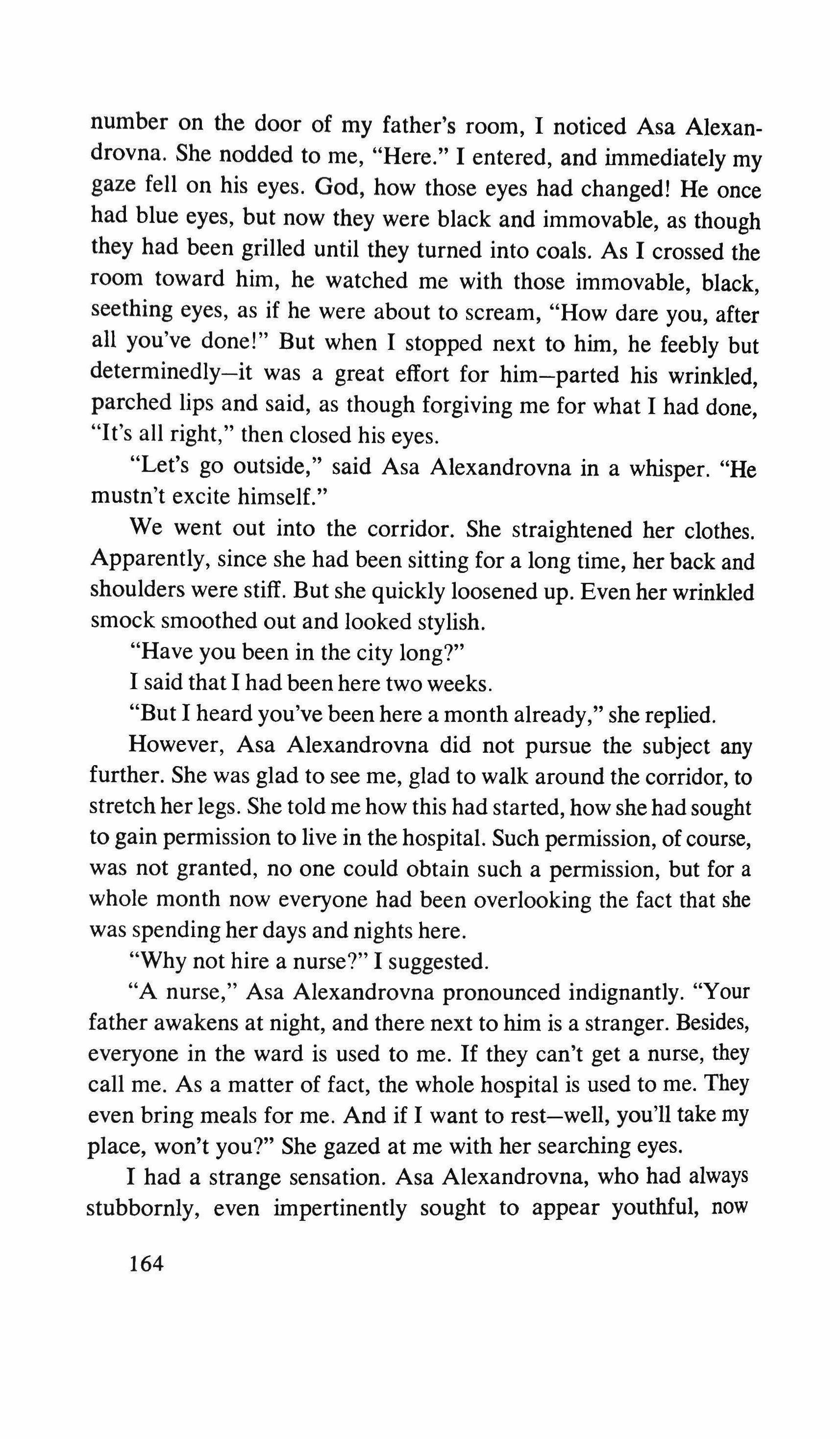
number on the door of my father's room, I noticed Asa Alexandrovna. She nodded to me, "Here." I entered, and immediately my gaze fell on his eyes. God, how those eyes had changed! He once had blue eyes, but now they were black and immovable, as though they had been grilled until they turned into coals. As I crossed the room toward him, he watched me with those immovable, black, seething eyes, as if he were about to scream, "How dare you, after all you've done!" But when I stopped next to him, he feebly but determinedly-it was a great effort for him-parted his wrinkled, parched lips and said, as though forgiving me for what I had done, "It's all right," then closed his eyes.
"Let's go outside," said Asa Alexandrovna in a whisper. "He mustn't excite himself."
We went out into the corridor. She straightened her clothes. Apparently, since she had been sitting for a long time, her back and shoulders were stiff. But she quickly loosened up. Even her wrinkled smock smoothed out and looked stylish.
"Have you been in the city long?"
I said that I had been here two weeks.
"But I heard you've been here a month already," she replied.
However, Asa Alexandrovna did not pursue the subject any further. She was glad to see me, glad to walk around the corridor, to stretch her legs. She told me how this had started, how she had sought to gain permission to live in the hospital. Such permission, of course, was not granted, no one could obtain such a permission, but for a whole month now everyone had been overlooking the fact that she was spending her days and nights here.
"Why not hire a nurse?" I suggested.
"A nurse," Asa Alexandrovna pronounced indignantly. "Your father awakens at night, and there next to him is a stranger. Besides, everyone in the ward is used to me. If they can't get a nurse, they call me. As a matter of fact, the whole hospital is used to me. They even bring meals for me. And if I want to rest-well, you'll take my place, won't you?" She gazed at me with her searching eyes. I had a strange sensation. Asa Alexandrovna, who had always stubbornly, even impertinently sought to appear youthful, now 164
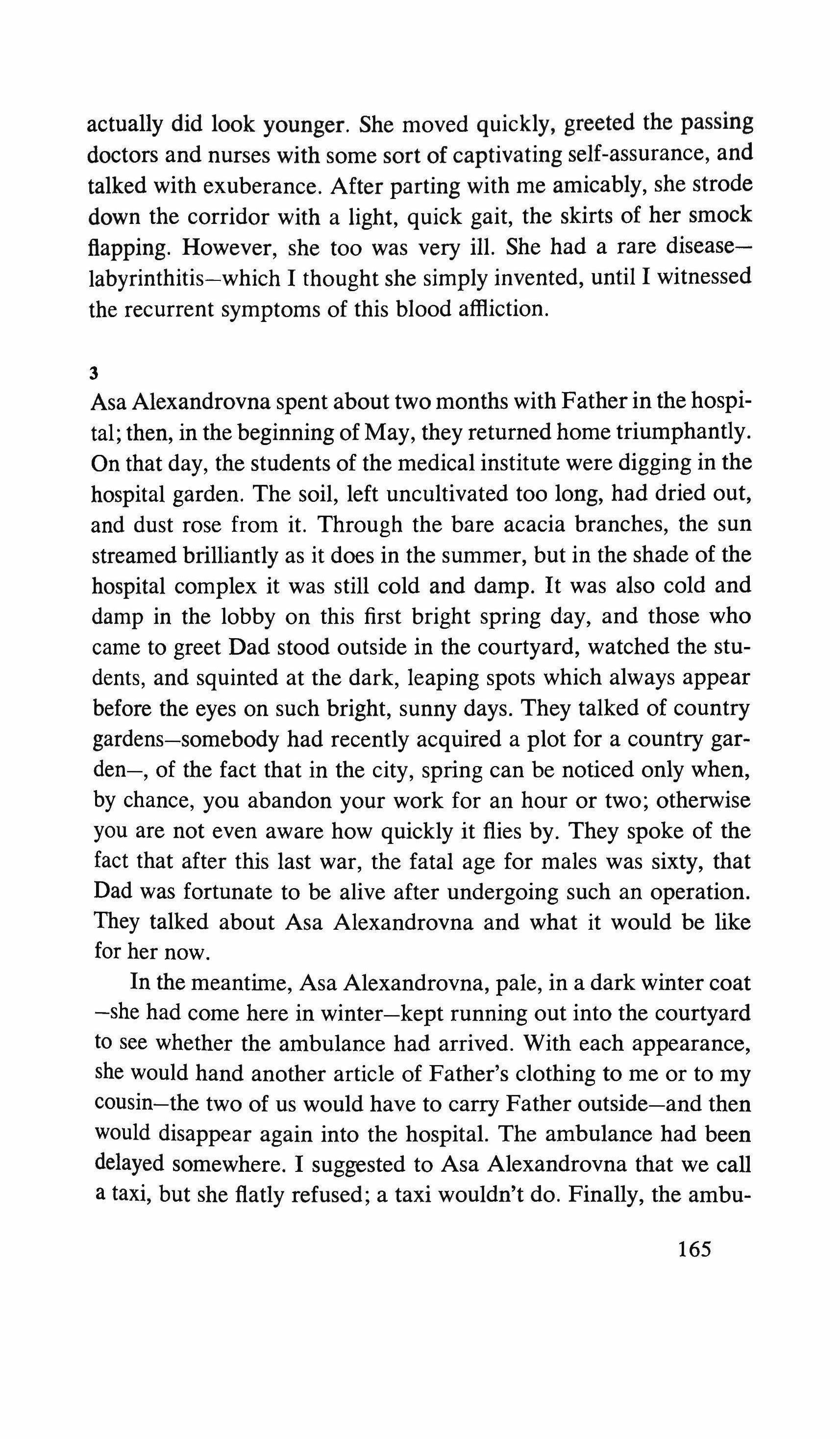
actually did look younger. She moved quickly, greeted the passing doctors and nurses with some sort of captivating self-assurance, and talked with exuberance. After parting with me amicably, she strode down the corridor with a light, quick gait, the skirts of her smock flapping. However, she too was very ill. She had a rare diseaselabyrinthitis-which I thought she simply invented, until I witnessed the recurrent symptoms of this blood affliction.
Asa Alexandrovna spent about two months with Father in the hospital; then, in the beginning of May, they returned home triumphantly. On that day, the students of the medical institute were digging in the hospital garden. The soil, left uncultivated too long, had dried out, and dust rose from it. Through the bare acacia branches, the sun streamed brilliantly as it does in the summer, but in the shade of the hospital complex it was still cold and damp. It was also cold and damp in the lobby on this first bright spring day, and those who came to greet Dad stood outside in the courtyard, watched the students, and squinted at the dark, leaping spots which always appear before the eyes on such bright, sunny days. They talked of country gardens-somebody had recently acquired a plot for a country garden=, of the fact that in the city, spring can be noticed only when, by chance, you abandon your work for an hour or two; otherwise you are not even aware how quickly it flies by. They spoke of the fact that after this last war, the fatal age for males was sixty, that Dad was fortunate to be alive after undergoing such an operation. They talked about Asa Alexandrovna and what it would be like for her now.
In the meantime, Asa Alexandrovna, pale, in a dark winter coat -she had come here in winter-kept running out into the courtyard to see whether the ambulance had arrived. With each appearance, she would hand another article of Father's clothing to me or to my cousin-the two of us would have to carry Father outside-and then would disappear again into the hospital. The ambulance had been delayed somewhere. I suggested to Asa Alexandrovna that we call a taxi, but she flatly refused; a taxi wouldn't do. Finally, the ambu-
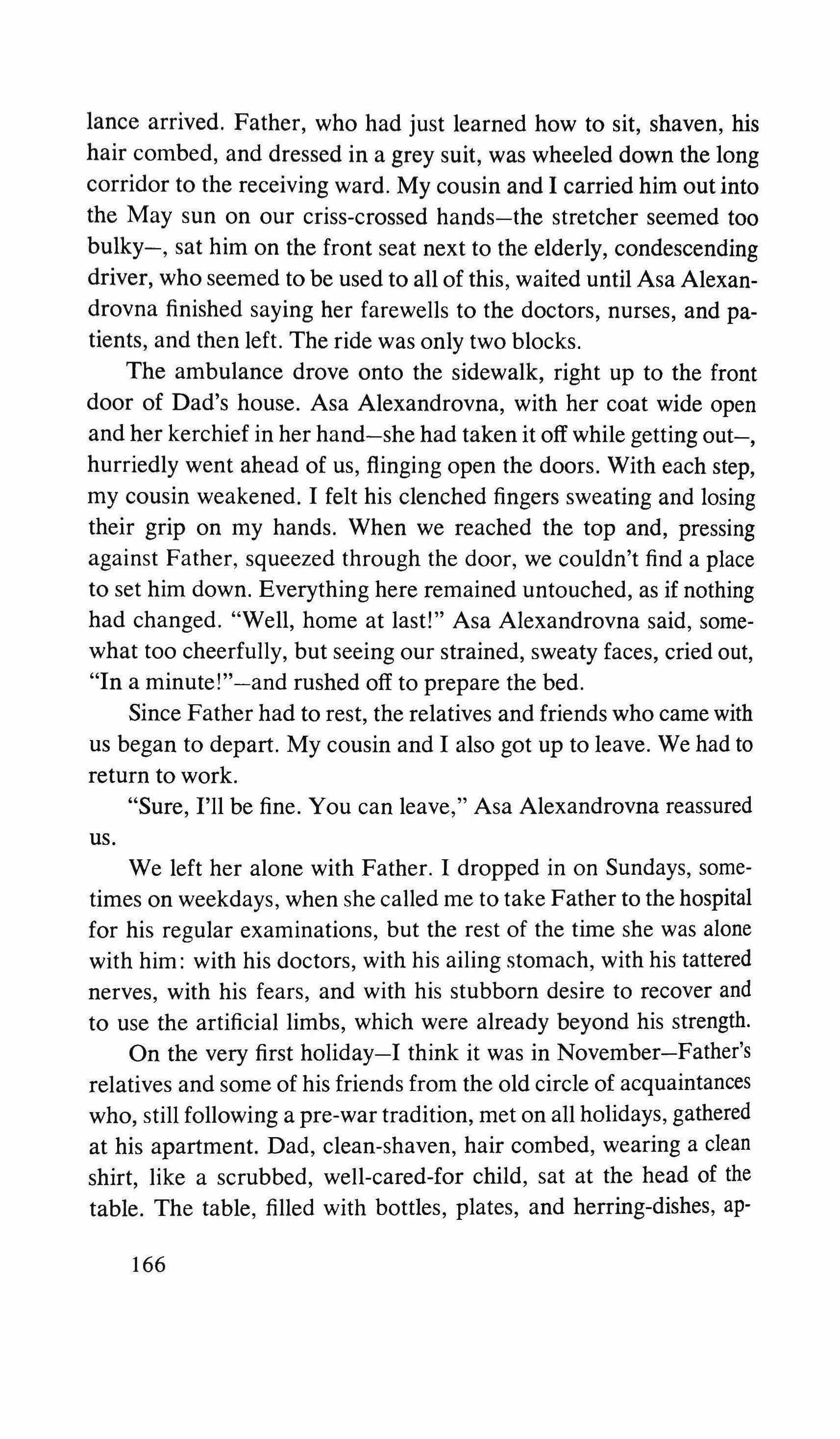
lance arrived. Father, who had just learned how to sit, shaven, his hair combed, and dressed in a grey suit, was wheeled down the long corridor to the receiving ward. My cousin and I carried him out into the May sun on our criss-crossed hands-the stretcher seemed too bulky-, sat him on the front seat next to the elderly, condescending driver, who seemed to be used to all of this, waited until Asa Alexandrovna finished saying her farewells to the doctors, nurses, and patients, and then left. The ride was only two blocks.
The ambulance drove onto the sidewalk, right up to the front door of Dad's house. Asa Alexandrovna, with her coat wide open and her kerchief in her hand-she had taken it off while getting out-, hurriedly went ahead of us, flinging open the doors. With each step, my cousin weakened. I felt his clenched fingers sweating and losing their grip on my hands. When we reached the top and, pressing against Father, squeezed through the door, we couldn't find a place to set him down. Everything here remained untouched, as if nothing had changed. "Well, home at last!" Asa Alexandrovna said, somewhat too cheerfully, but seeing our strained, sweaty faces, cried out, "In a minute!"-and rushed off to prepare the bed.
Since Father had to rest, the relatives and friends who came with us began to depart. My cousin and I also got up to leave. We had to return to work.
"Sure, I'll be fine. You can leave," Asa Alexandrovna reassured us.
We left her alone with Father. I dropped in on Sundays, sometimes on weekdays, when she called me to take Father to the hospital for his regular examinations, but the rest of the time she was alone with him: with his doctors, with his ailing stomach, with his tattered nerves, with his fears, and with his stubborn desire to recover and to use the artificial limbs, which were already beyond his strength.
On the very first holiday-I think it was in November-Father's relatives and some of his friends from the old circle of acquaintances who, still following a pre-war tradition, met on all holidays, gathered at his apartment. Dad, clean-shaven, hair combed, wearing a clean shirt, like a scrubbed, well-cared-for child, sat at the head of the table. The table, filled with bottles, plates, and herring-dishes, ap-
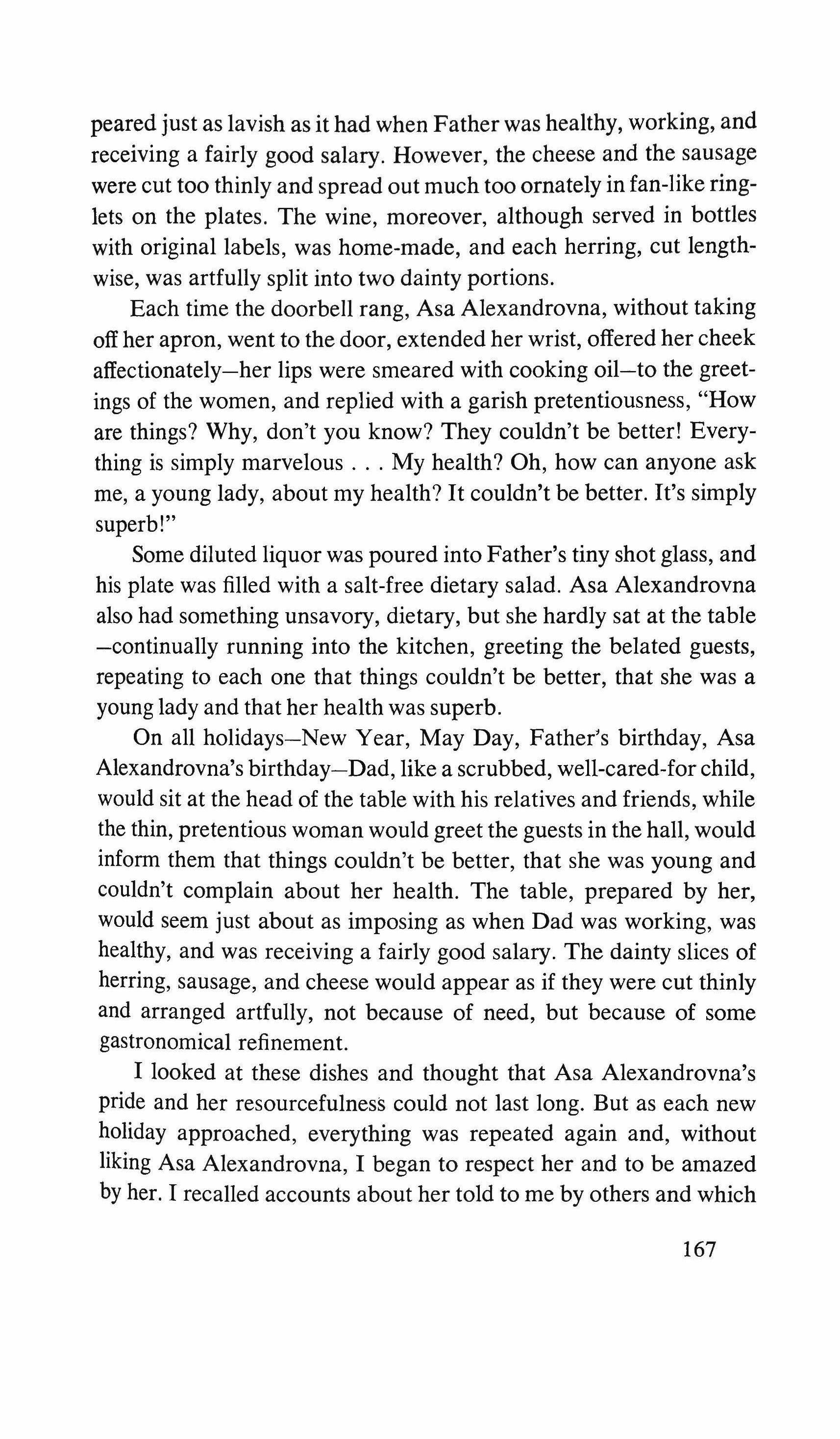
peared just as lavish as it had when Father was healthy, working, and receiving a fairly good salary. However, the cheese and the sausage were cut too thinly and spread out much too ornately in fan-like ringlets on the plates. The wine, moreover, although served in bottles with original labels, was home-made, and each herring, cut lengthwise, was artfully split into two dainty portions.
Each time the doorbell rang, Asa Alexandrovna, without taking off her apron, went to the door, extended her wrist, offered her cheek affectionately-her lips were smeared with cooking oil-to the greetings of the women, and replied with a garish pretentiousness, "How are things? Why, don't you know? They couldn't be better! Everything is simply marvelous My health? Oh, how can anyone ask me, a young lady, about my health? It couldn't be better. It's simply superb!"
Some diluted liquor was poured into Father's tiny shot glass, and his plate was filled with a salt-free dietary salad. Asa Alexandrovna also had something unsavory, dietary, but she hardly sat at the table -continually running into the kitchen, greeting the belated guests, repeating to each one that things couldn't be better, that she was a young lady and that her health was superb.
On all holidays-New Year, May Day, Father's birthday, Asa Alexandrovna's birthday-Dad, like a scrubbed, well-eared-for child, would sit at the head of the table with his relatives and friends, while the thin, pretentious woman would greet the guests in the hall, would inform them that things couldn't be better, that she was young and couldn't complain about her health. The table, prepared by her, would seem just about as imposing as when Dad was working, was healthy, and was receiving a fairly good salary. The dainty slices of herring, sausage, and cheese would appear as if they were cut thinly and arranged artfully, not because of need, but because of some gastronomical refinement.
I looked at these dishes and thought that Asa Alexandrovna's pride and her resourcefulness could not last long. But as each new holiday approached, everything was repeated again and, without liking Asa Alexandrovna, I began to respect her and to be amazed by her. I recalled accounts about her told to me by others and which 167
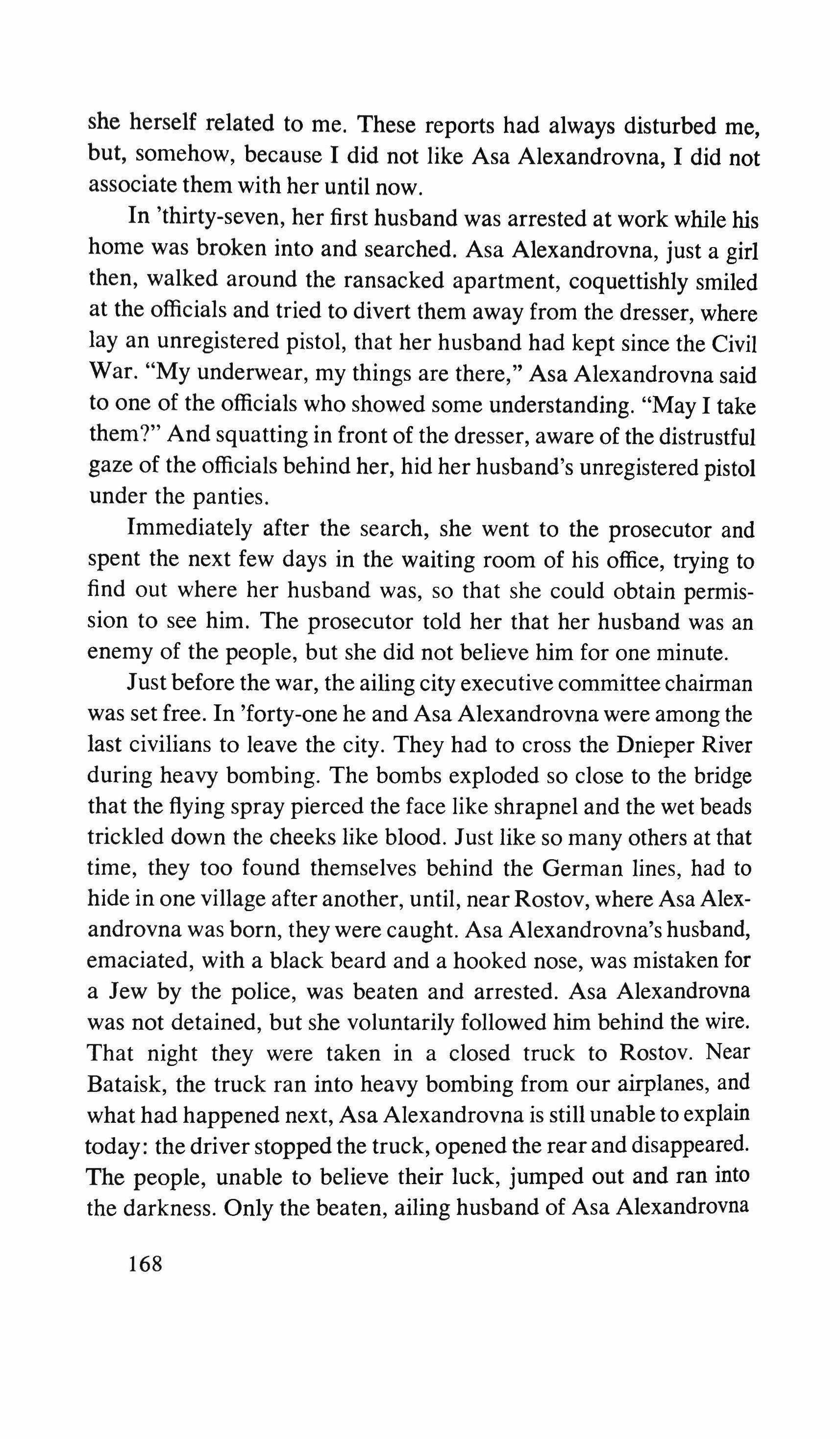
she herself related to me. These reports had always disturbed me, but, somehow, because I did not like Asa Alexandrovna, I did not associate them with her until now.
In 'thirty-seven, her first husband was arrested at work while his home was broken into and searched. Asa Alexandrovna, just a girl then, walked around the ransacked apartment, coquettishly smiled at the officials and tried to divert them away from the dresser, where lay an unregistered pistol, that her husband had kept since the Civil War. "My underwear, my things are there," Asa Alexandrovna said to one of the officials who showed some understanding. "May I take them?" And squatting in front of the dresser, aware of the distrustful gaze of the officials behind her, hid her husband's unregistered pistol under the panties.
Immediately after the search, she went to the prosecutor and spent the next few days in the waiting room of his office, trying to find out where her husband was, so that she could obtain permission to see him. The prosecutor told her that her husband was an enemy of the people, but she did not believe him for one minute.
Just before the war, the ailing city executive committee chairman was set free. In 'forty-one he and Asa Alexandrovna were among the last civilians to leave the city. They had to cross the Dnieper River during heavy bombing. The bombs exploded so close to the bridge that the flying spray pierced the face like shrapnel and the wet beads trickled down the cheeks like blood. Just like so many others at that time, they too found themselves behind the German lines, had to hide in one village after another, until, near Rostov, where Asa Alexandrovna was born, they were caught. Asa Alexandrovna's husband, emaciated, with a black beard and a hooked nose, was mistaken for a Jew by the police, was beaten and arrested. Asa Alexandrovna was not detained, but she voluntarily followed him behind the wire. That night they were taken in a closed truck to Rostov. Near Bataisk, the truck ran into heavy bombing from our airplanes, and what had happened next, Asa Alexandrovna is still unable to explain today: the driver stopped the truck, opened the rear and disappeared. The people, unable to believe their luck, jumped out and ran into the darkness. Only the beaten, ailing husband of Asa Alexandrovna
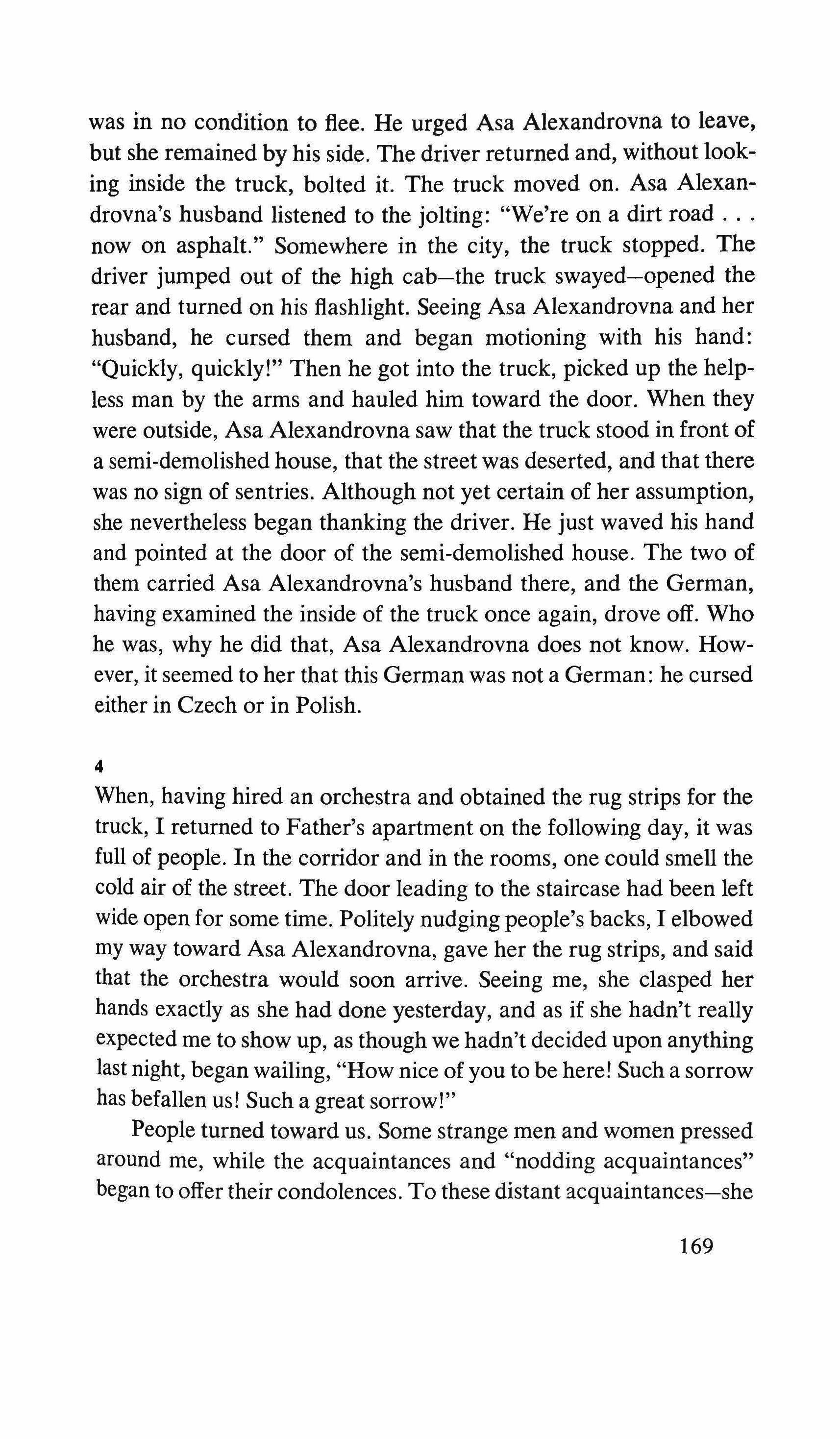
was in no condition to flee. He urged Asa Alexandrovna to leave, but she remained by his side. The driver returned and, without looking inside the truck, bolted it. The truck moved on. Asa Alexandrovna's husband listened to the jolting: "We're on a dirt road now on asphalt." Somewhere in the city, the truck stopped. The driver jumped out of the high cab-the truck swayed-opened the rear and turned on his flashlight. Seeing Asa Alexandrovna and her husband, he cursed them and began motioning with his hand: "Quickly, quickly!" Then he got into the truck, picked up the helpless man by the arms and hauled him toward the door. When they were outside, Asa Alexandrovna saw that the truck stood in front of a semi-demolished house, that the street was deserted, and that there was no sign of sentries. Although not yet certain of her assumption, she nevertheless began thanking the driver. He just waved his hand and pointed at the door of the semi-demolished house. The two of them carried Asa Alexandrovna's husband there, and the German, having examined the inside of the truck once again, drove off. Who he was, why he did that, Asa Alexandrovna does not know. However, it seemed to her that this German was not a German: he cursed either in Czech or in Polish.
4
When, having hired an orchestra and obtained the rug strips for the truck, I returned to Father's apartment on the following day, it was full of people. In the corridor and in the rooms, one could smell the cold air of the street. The door leading to the staircase had been left wide open for some time. Politely nudging people's backs, I elbowed my way toward Asa Alexandrovna, gave her the rug strips, and said that the orchestra would soon arrive. Seeing me, she clasped her hands exactly as she had done yesterday, and as if she hadn't really expected me to show up, as though we hadn't decided upon anything last night, began wailing, "How nice of you to be here! Such a sorrow has befallen us! Such a great sorrow!"
People turned toward us. Some strange men and women pressed around me, while the acquaintances and "nodding acquaintances" began to offer their condolences. To these distant acquaintances-she
169
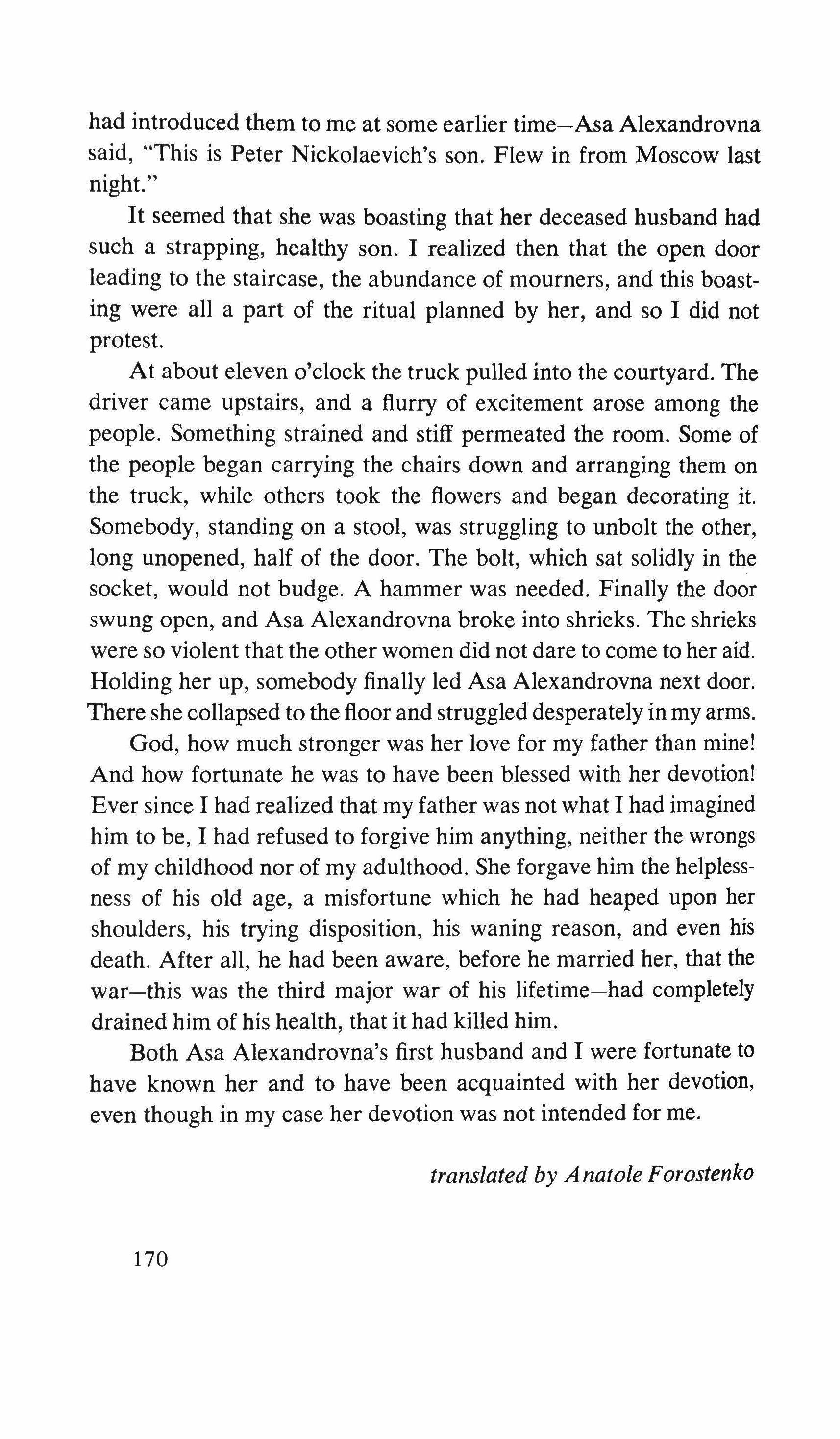
had introduced them to me at some earlier time-Asa Alexandrovna said, "This is Peter Nickolaevich's son. Flew in from Moscow last night."
It seemed that she was boasting that her deceased husband had such a strapping, healthy son. I realized then that the open door leading to the staircase, the abundance of mourners, and this boasting were all a part of the ritual planned by her, and so I did not protest.
At about eleven o'clock the truck pulled into the courtyard. The driver came upstairs, and a flurry of excitement arose among the people. Something strained and stiff permeated the room. Some of the people began carrying the chairs down and arranging them on the truck, while others took the flowers and began decorating it. Somebody, standing on a stool, was struggling to unbolt the other, long unopened, half of the door. The bolt, which sat solidly in the socket, would not budge. A hammer was needed. Finally the door swung open, and Asa Alexandrovna broke into shrieks. The shrieks were so violent that the other women did not dare to come to her aid. Holding her up, somebody finally led Asa Alexandrovna next door. There she collapsed to the floor and struggled desperately in my arms. God, how much stronger was her love for my father than mine! And how fortunate he was to have been blessed with her devotion! Ever since I had realized that my father was not what I had imagined him to be, I had refused to forgive him anything, neither the wrongs of my childhood nor of my adulthood. She forgave him the helplessness of his old age, a misfortune which he had heaped upon her shoulders, his trying disposition, his waning reason, and even his death. After all, he had been aware, before he married her, that the war-this was the third major war of his lifetime-had completely drained him of his health, that it had killed him.
Both Asa Alexandrovna's first husband and I were fortunate to have known her and to have been acquainted with her devotion, even though in my case her devotion was not intended for me.
translated by Anatole Forostenko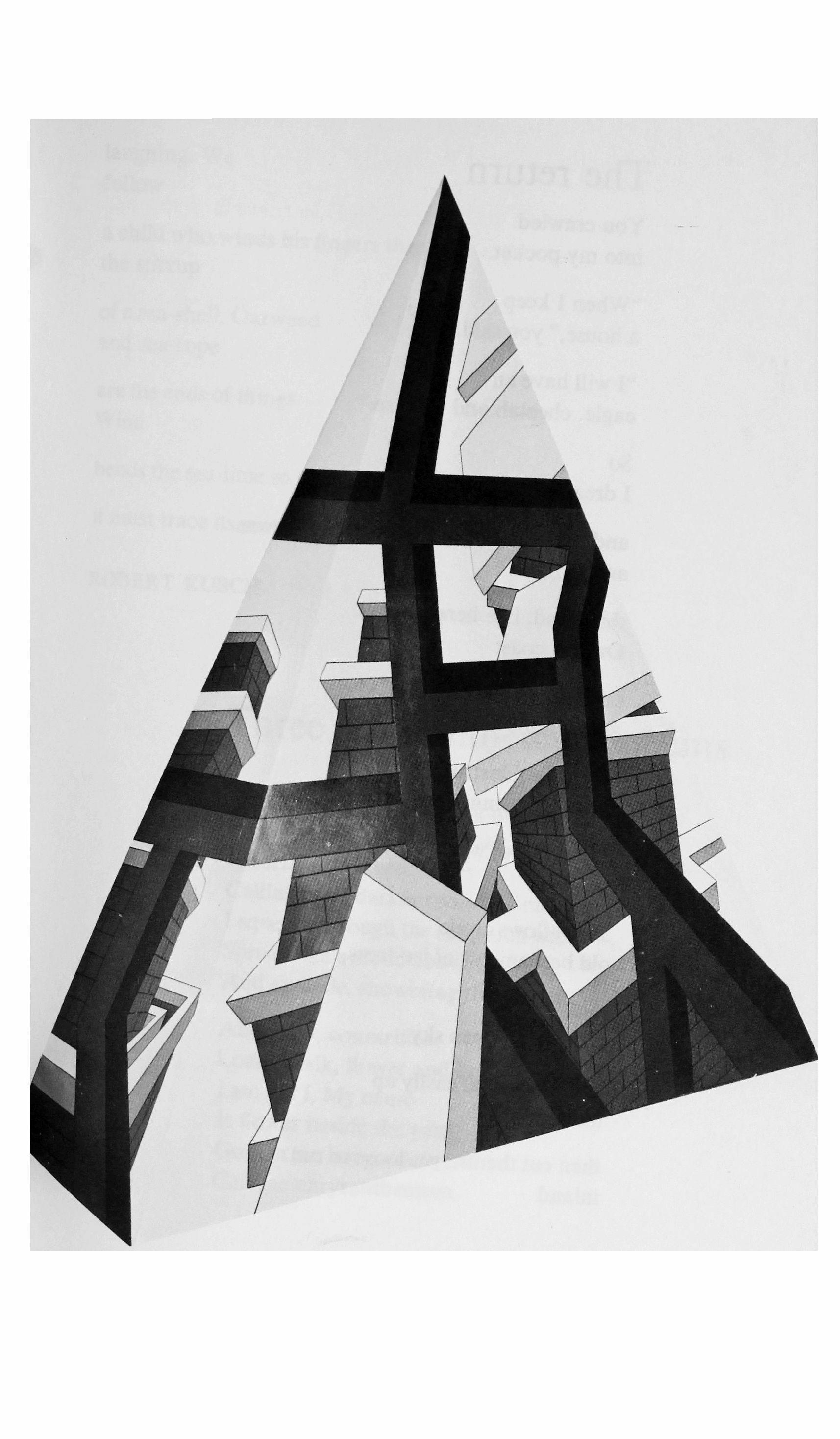
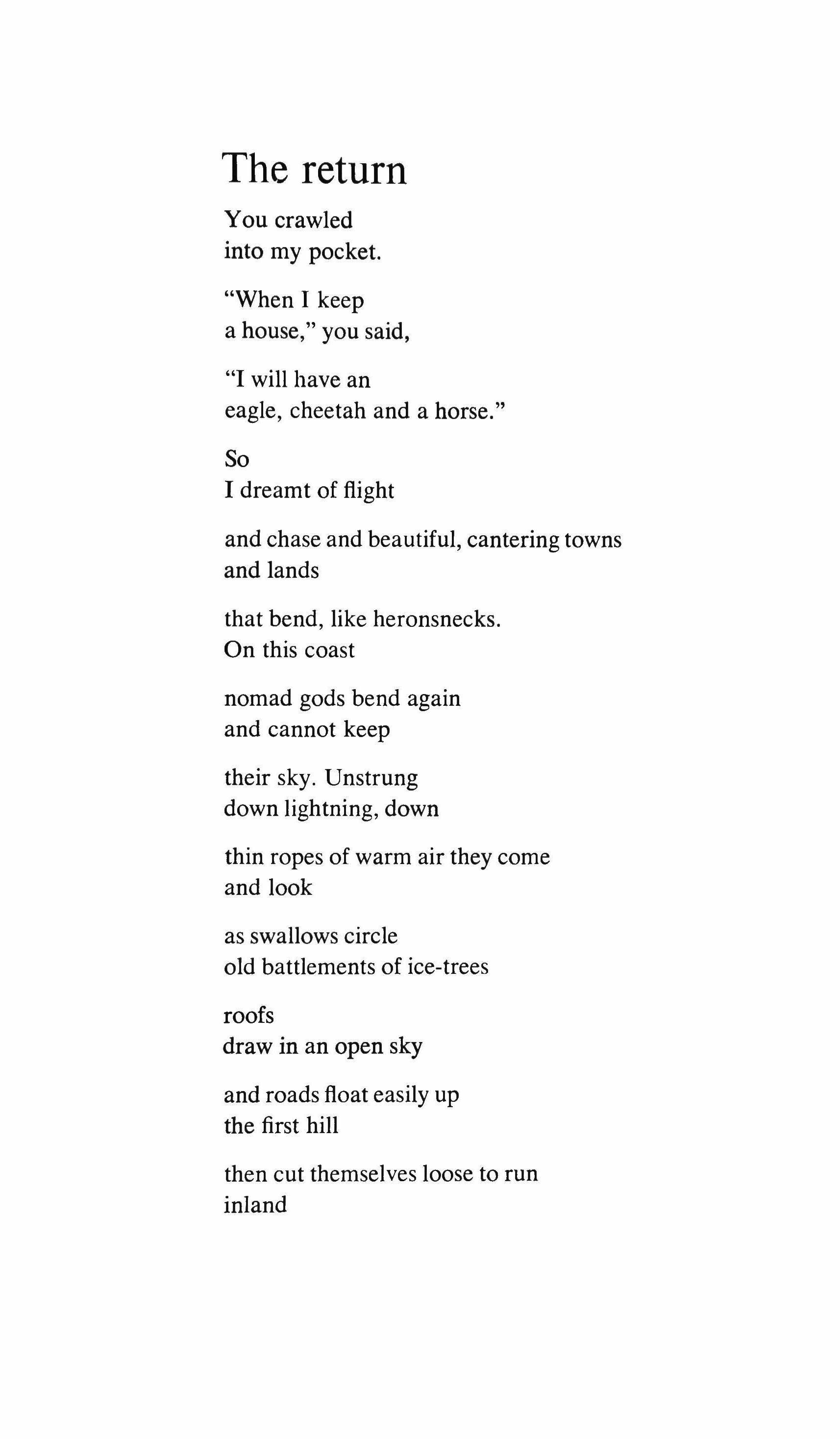
You crawled into my pocket.
"When 1 keep a house," you said,
"I will have an eagle, cheetah and a horse."
So I dreamt of flight and chase and beautiful, cantering towns and lands that bend, like heronsnecks. On this coast nomad gods bend again and cannot keep their sky Unstrung down lightning, down thin ropes of warm air they come and look as swallows circle old battlements of ice-trees roofs draw in an open sky and roads float easily up the first hill then cut themselves loose to run inland
laughing. We follow a child who winds his fingers through the stirrup of a sea-shell. Oarweed and sea-rope are the ends of things. Wind bends the sea-lime so far back it must trace its motions in the sand.
ROBERT KUSCH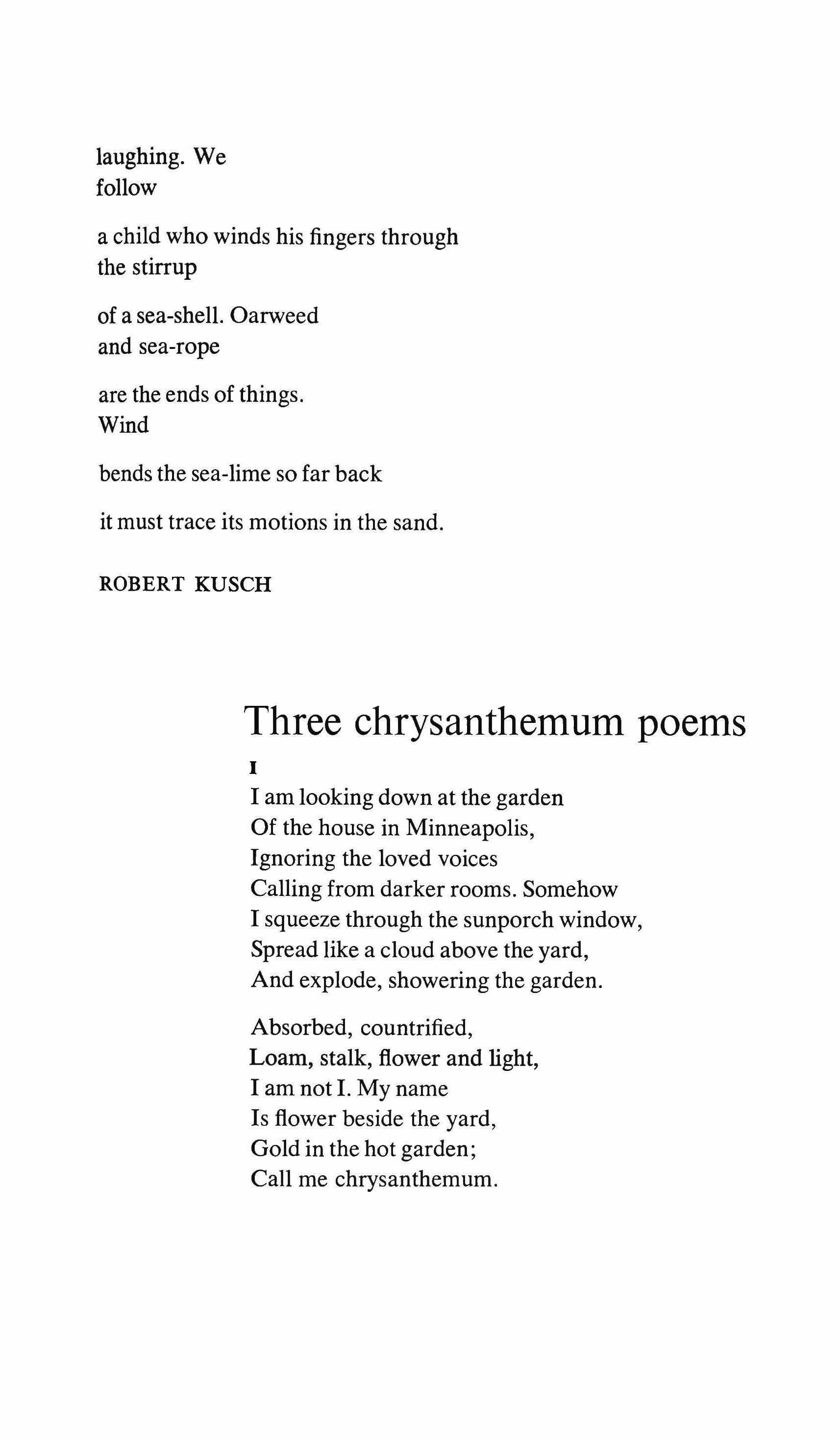
I
I am looking down at the garden Of the house in Minneapolis, Ignoring the loved voices Calling from darker rooms. Somehow I squeeze through the sunporch window, Spread like a cloud above the yard, And explode, showering the garden.
Absorbed, countrified, Loam, stalk, flower and light, I am not 1. My name Is flower beside the yard, Gold in the hot garden; Call me chrysanthemum.
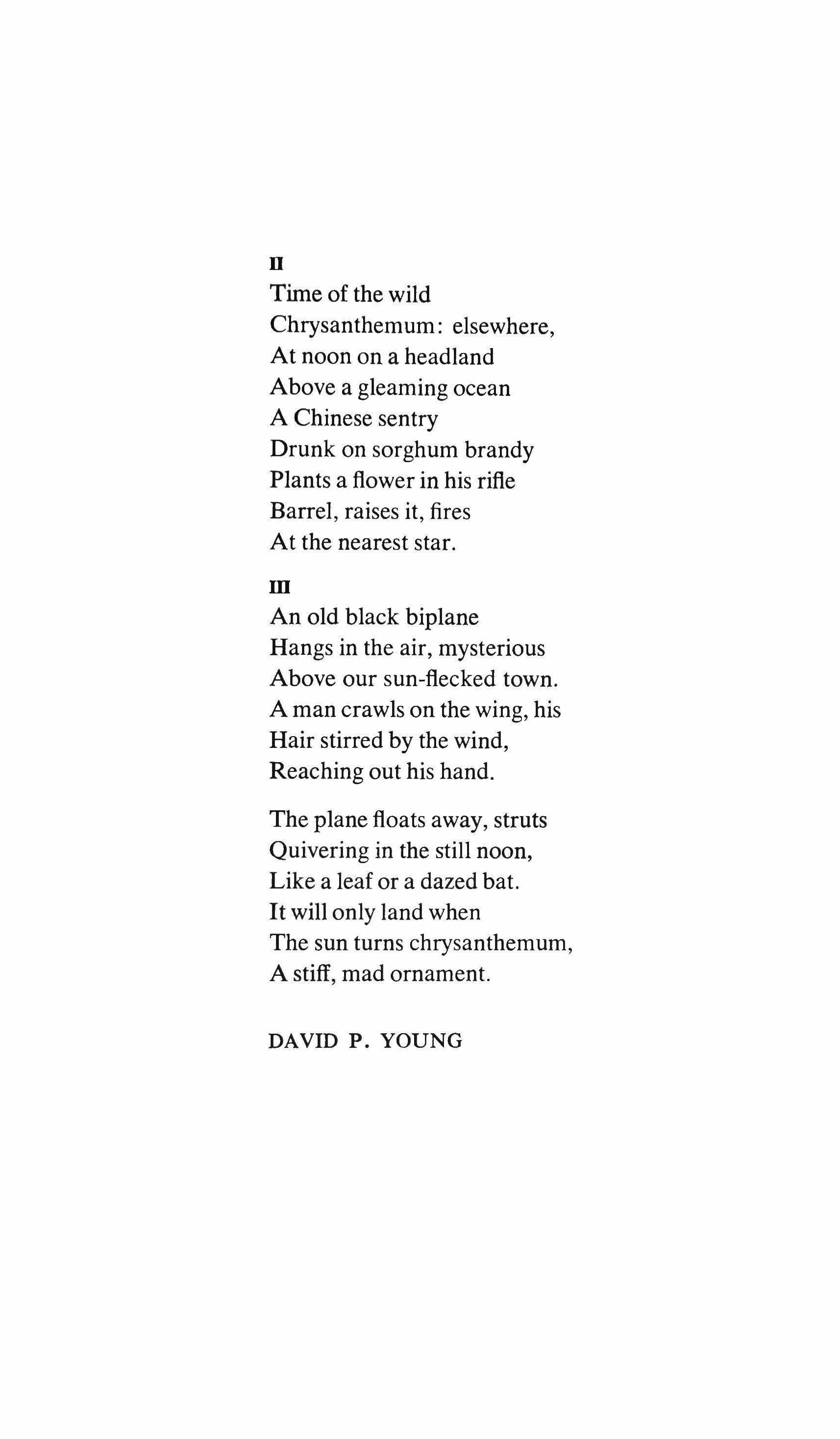
n
Time of the wild
Chrysanthemum: elsewhere, At noon on a headland
Above a gleaming ocean
A Chinese sentry
Drunk on sorghum brandy Plants a flower in his rifle Barrel, raises it, fires At the nearest star.
m
An old black biplane Hangs in the air, mysterious Above our sun-flecked town. A man crawls on the wing, his Hair stirred by the wind, Reaching out his hand.
The plane floats away, struts Quivering in the still noon, Like a leaf or a dazed bat. It will only land when The sun turns chrysanthemum, A stiff, mad ornament.
DAVID P. YOUNG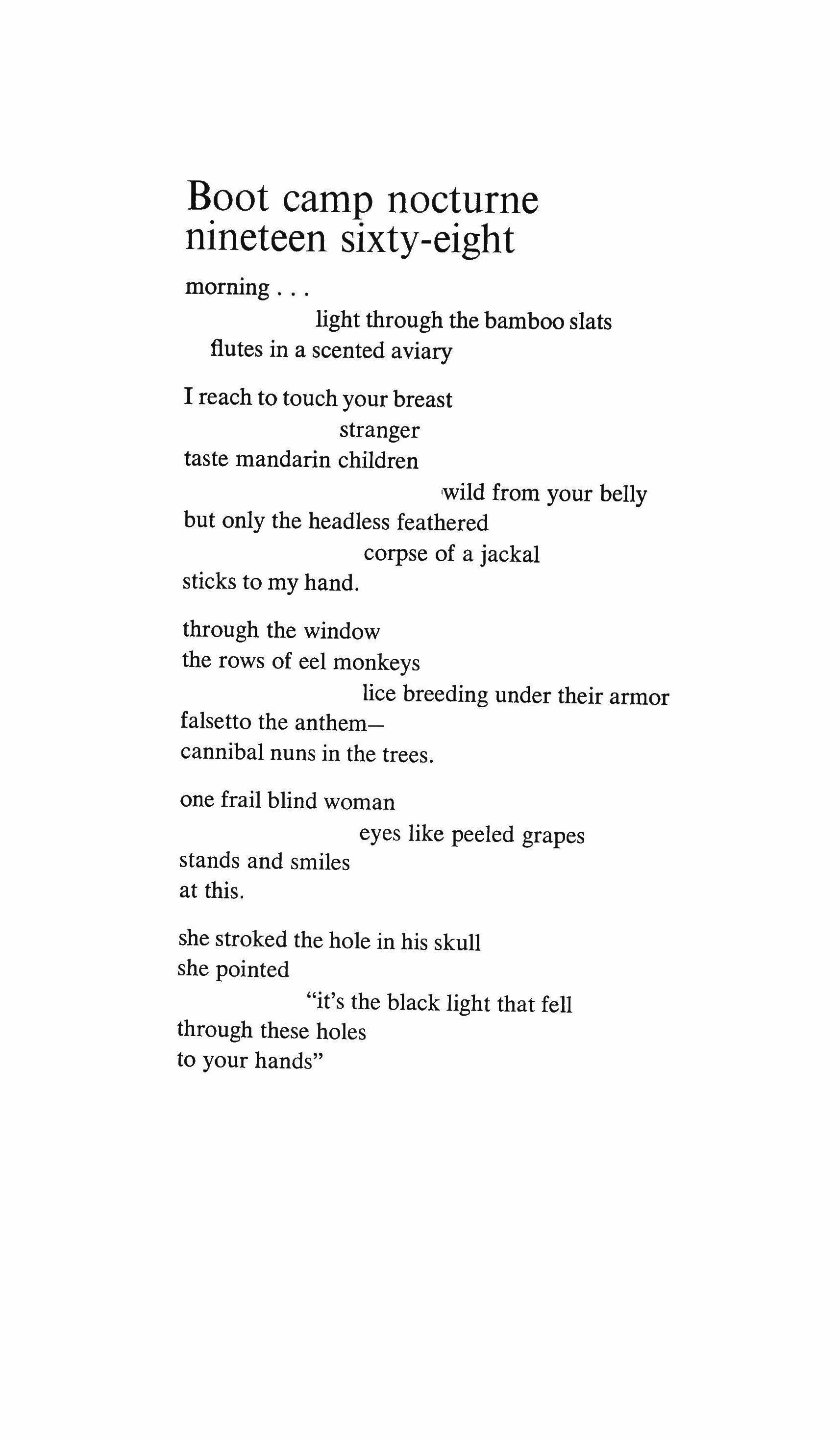
morrung
light through the bamboo slats fiutes in a scented aviary
I reach to touch your breast stranger taste mandarin children
'Wild from your belly but only the headless feathered corpse of a jackal sticks to my hand.
through the window the rows of eel monkeys
lice breeding under their armor falsetto the anthemcannibal nuns in the trees.
one frail blind woman
eyes like peeled grapes stands and smiles at this.
she stroked the hole in his skull she pointed
"it's the black light that fell through these holes to your hands"
He leaves, clutching the joke of David flies are snarling dogs yelp
the sound of axes rapping
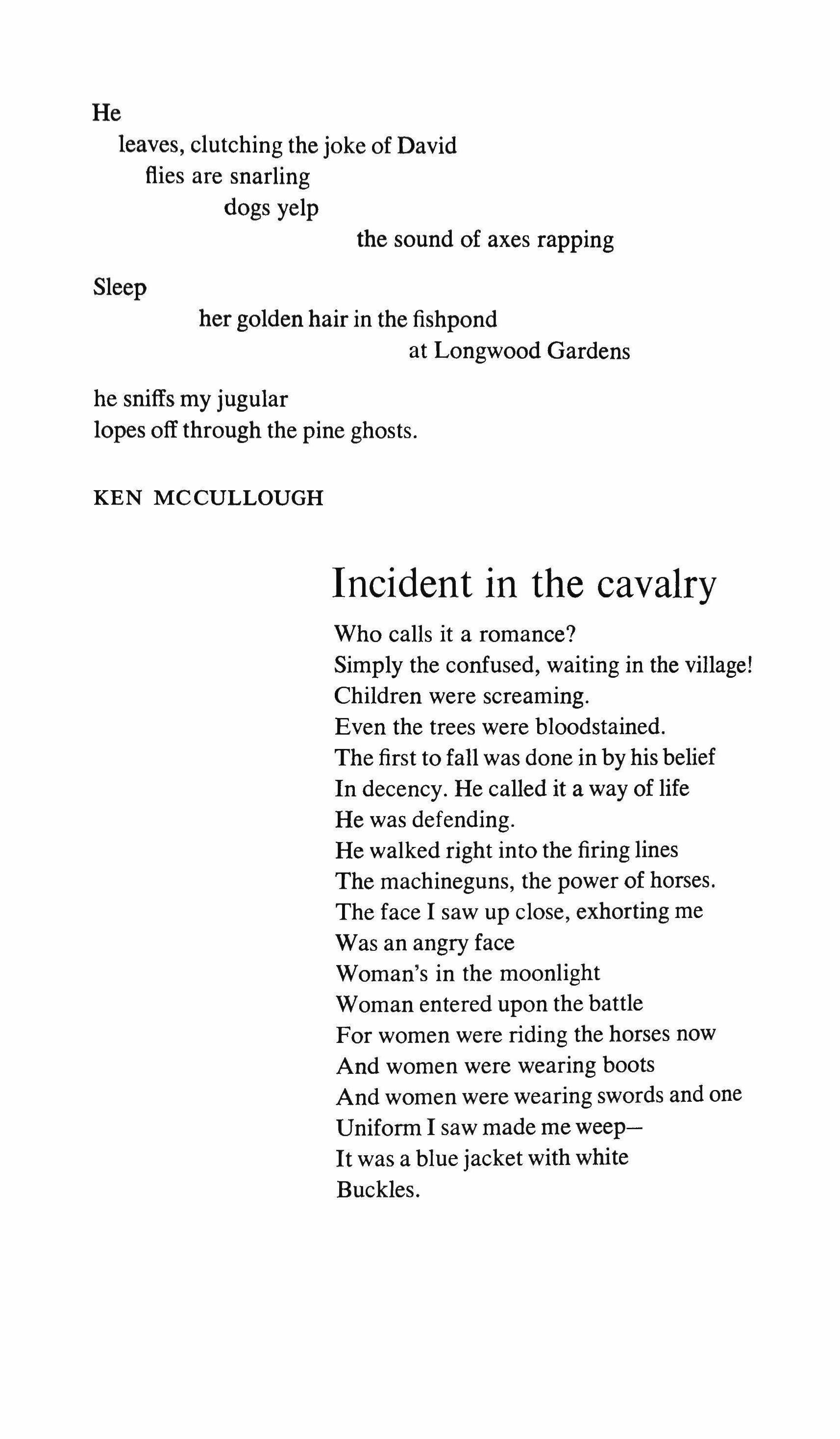
her golden hair in the fishpond at Longwood Gardens
he sniffs my jugular lopes off through the pine ghosts.
Who calls it a romance?
Simply the confused, waiting in the village!
Children were screaming. Even the trees were bloodstained. The first to fall was done in by his belief In decency. He called it a way of life
He was defending.
He walked right into the firing lines
The machineguns, the power of horses.
The face I saw up close, exhorting me
Was an angry face
Woman's in the moonlight
Woman entered upon the battle
For women were riding the horses now
And women were wearing boots
And women were wearing swords and one Uniform I saw made me weepIt was a blue jacket with white Buckles.
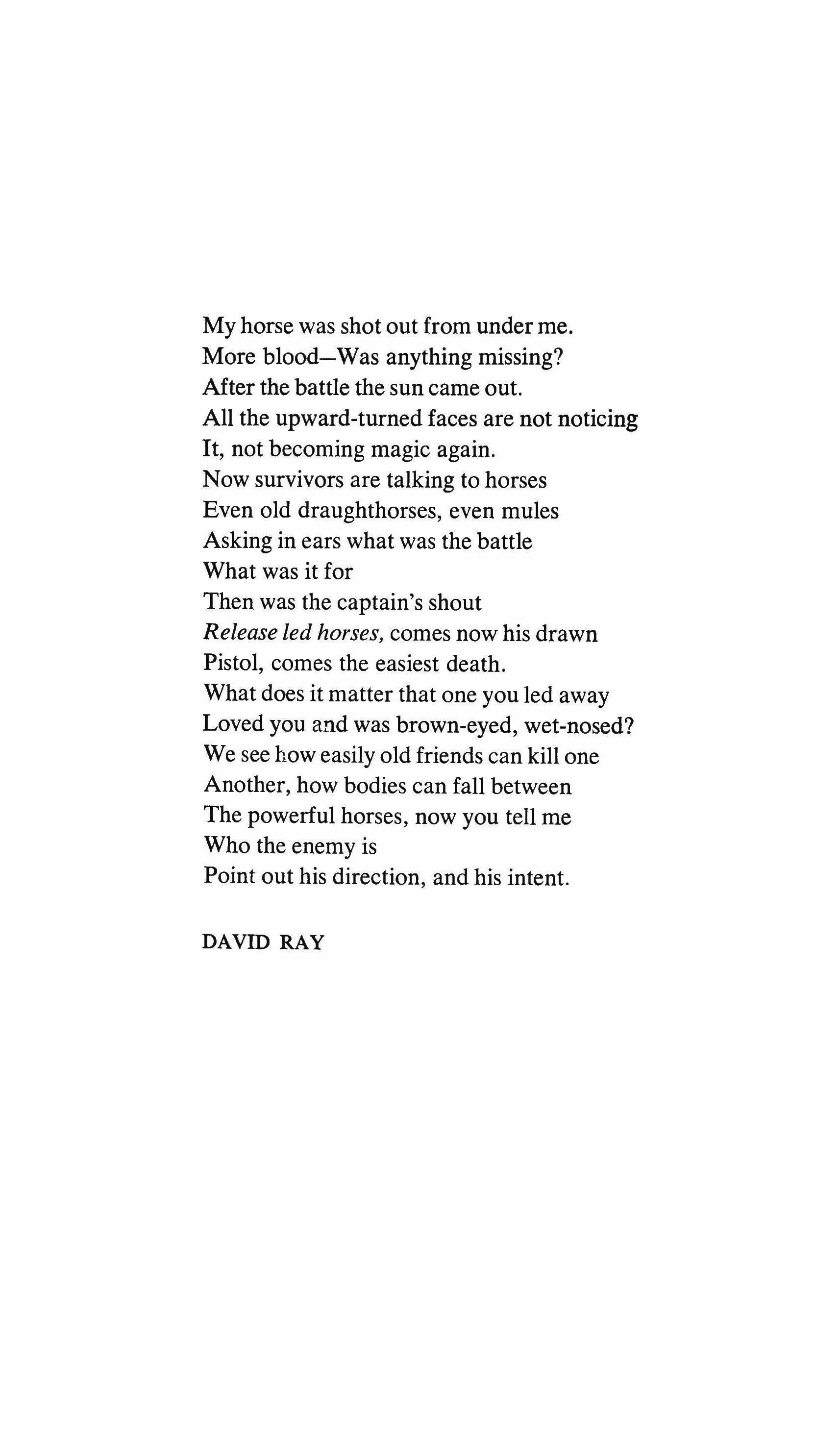
My horse was shot out from under me.
More blood-Was anything missing?
After the battle the sun came out.
All the upward-turned faces are not noticing It, not becoming magic again.
Now survivors are talking to horses
Even old draughthorses, even mules
Asking in ears what was the battle
What was it for Then was the captain's shout
Release led horses, comes now his drawn Pistol, comes the easiest death.
What does it matter that one you led away
Loved you and was brown-eyed, wet-nosed?
We see how easily old friends can kill one
Another, how bodies can fall between
The powerful horses, now you tell me
Who the enemy is
Point out his direction, and his intent.
DAVID RAY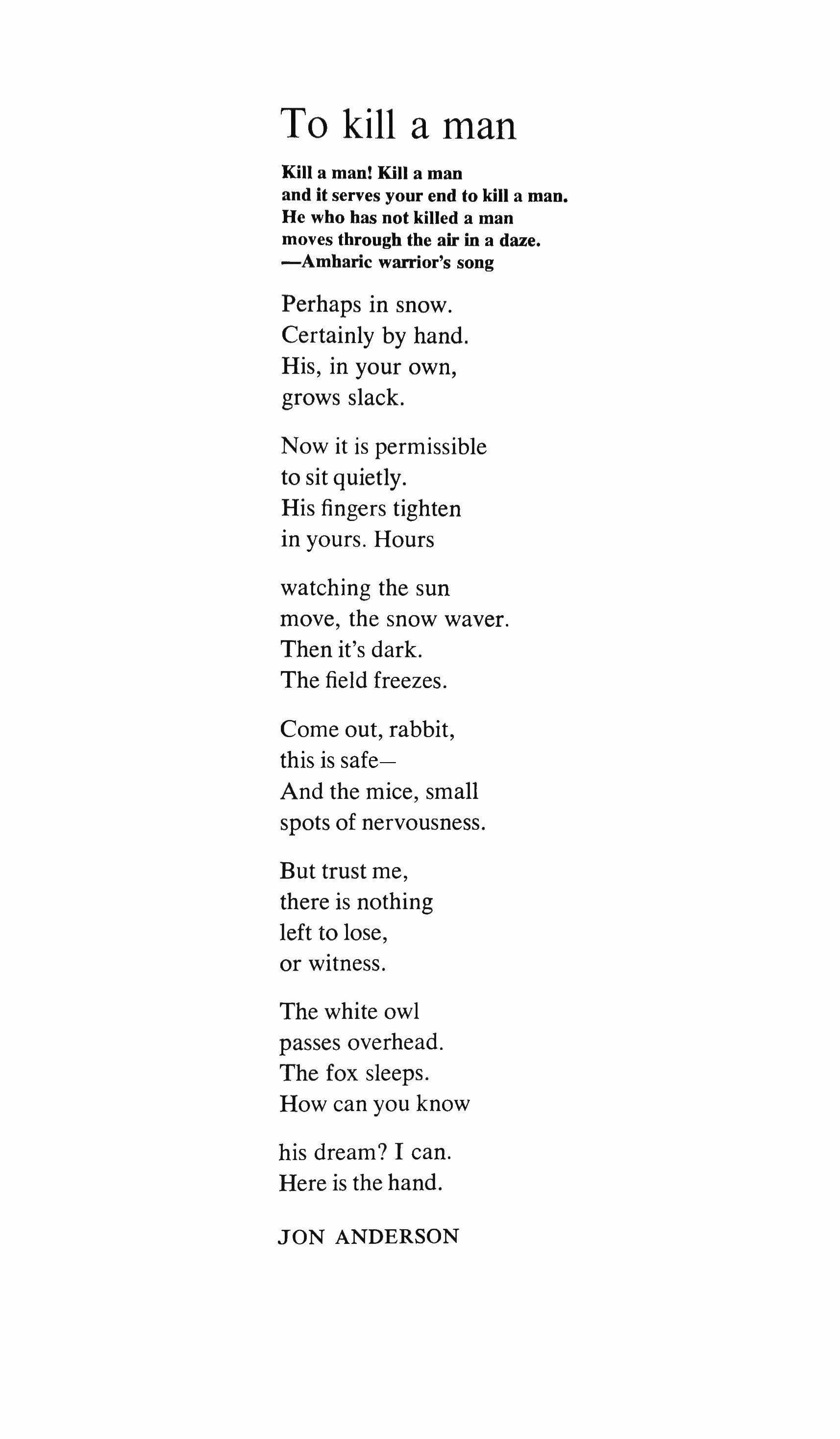
Kill a man! Kill a man and it serves your end to kill a man. He who has not killed a man moves through the air in a daze. -Amharic wanior's song
Perhaps in snow. Certainly by hand. His, in your own, grows slack.
Now it is permissible to sit quietly. His fingers tighten in yours. Hours watching the sun move, the snow waver. Then it's dark. The field freezes.
Come out, rabbit, this is safeAnd the mice, small spots of nervousness.
But trust me, there is nothing left to lose, or witness.
The white owl passes overhead. The fox sleeps. How can you know his dream? I can. Here is the hand.
JON ANDERSON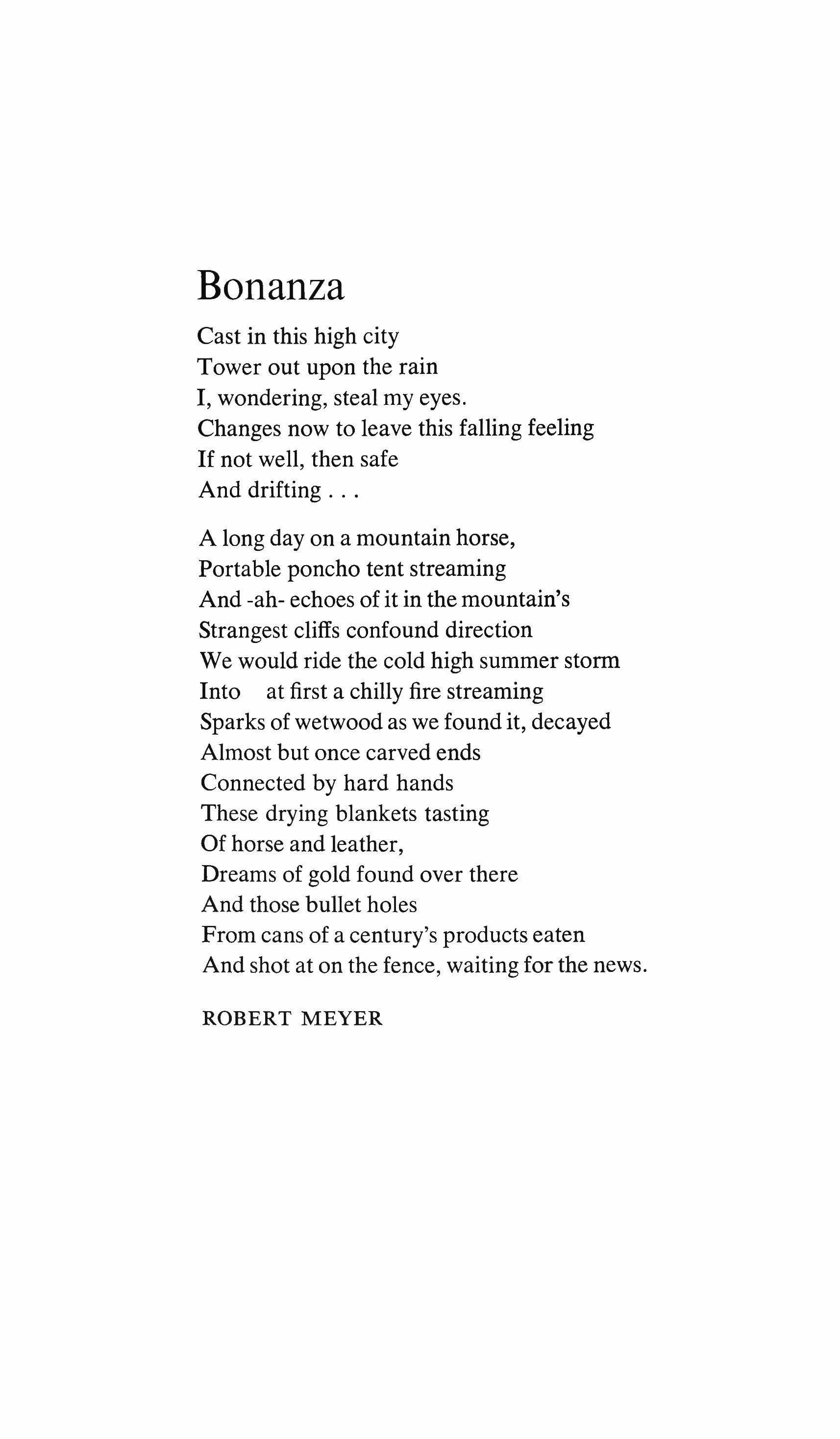
Cast in this high city
Tower out upon the rain
I, wondering, steal my eyes. Changes now to leave this falling feeling If not well, then safe And drifting
A long day on a mountain horse, Portable poncho tent streaming And -ah- echoes of it in the mountain's Strangest cliffs confound direction
We would ride the cold high summer storm Into at first a chilly fire streaming Sparks of wetwood as we found it, decayed
Almost but once carved ends Connected by hard hands
These drying blankets tasting Of horse and leather, Dreams of gold found over there And those bullet holes
From cans of a century's products eaten And shot at on the fence, waiting for the news.
ROBERT MEYER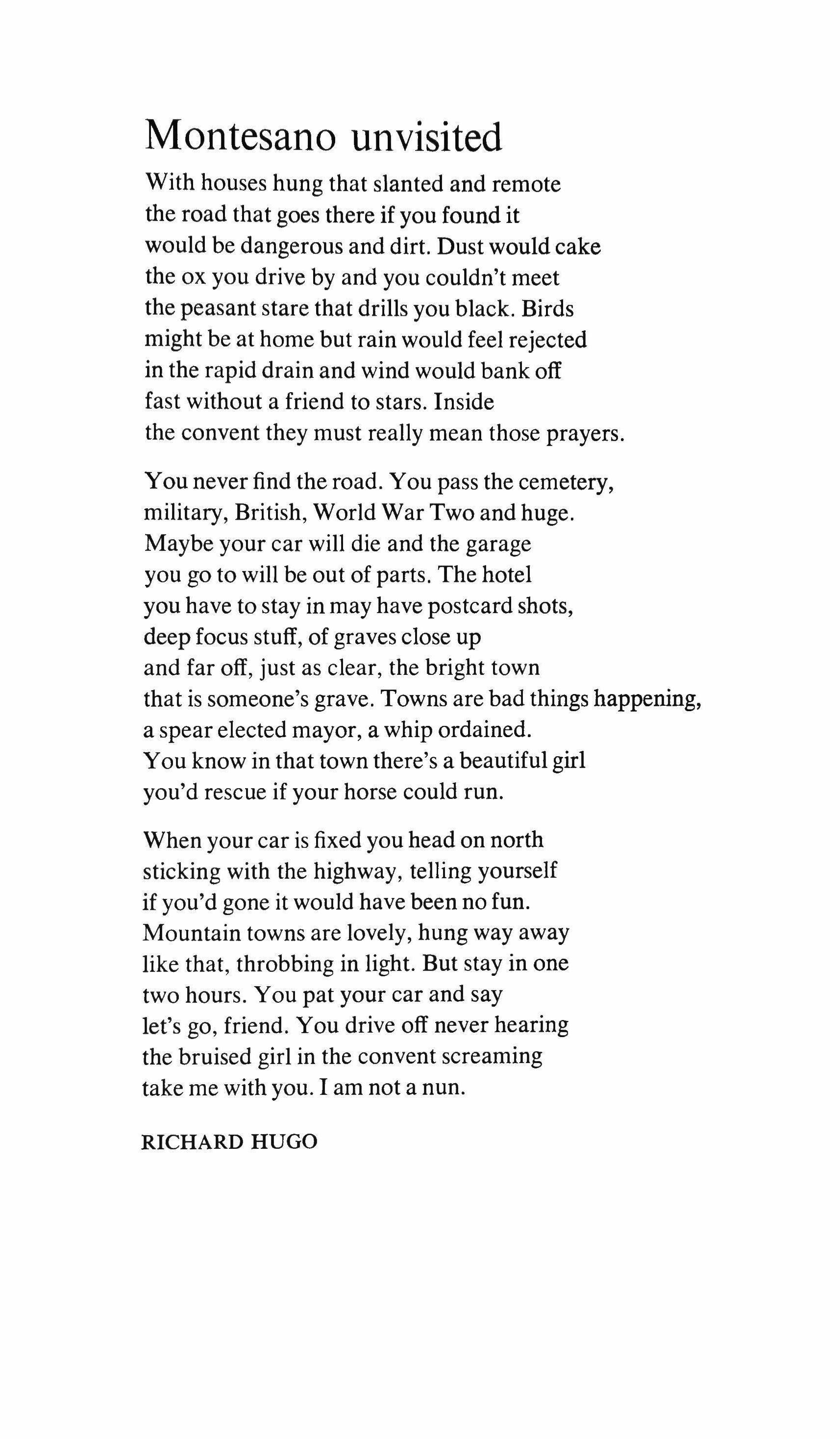
With houses hung that slanted and remote the road that goes there if you found it would be dangerous and dirt. Dust would cake the ox you drive by and you couldn't meet the peasant stare that drills you black. Birds might be at home but rain would feel rejected in the rapid drain and wind would bank off fast without a friend to stars. Inside the convent they must really mean those prayers.
You never find the road. You pass the cemetery, military, British, World War Two and huge. Maybe your car will die and the garage you go to will be out of parts. The hotel you have to stay in may have postcard shots, deep focus stuff, of graves close up and far off, just as clear, the bright town that is someone's grave. Towns are bad things happening, a spear elected mayor, a whip ordained. You know in that town there's a beautiful girl you'd rescue if your horse could run.
When your car is fixed you head on north sticking with the highway, telling yourself if you'd gone it would have been no fun. Mountain towns are lovely, hung way away like that, throbbing in light. But stay in one two hours. You pat your car and say let's go, friend. You drive off never hearing the bruised girl in the convent screaming take me with you. I am not a nun.
RICHARD HUGO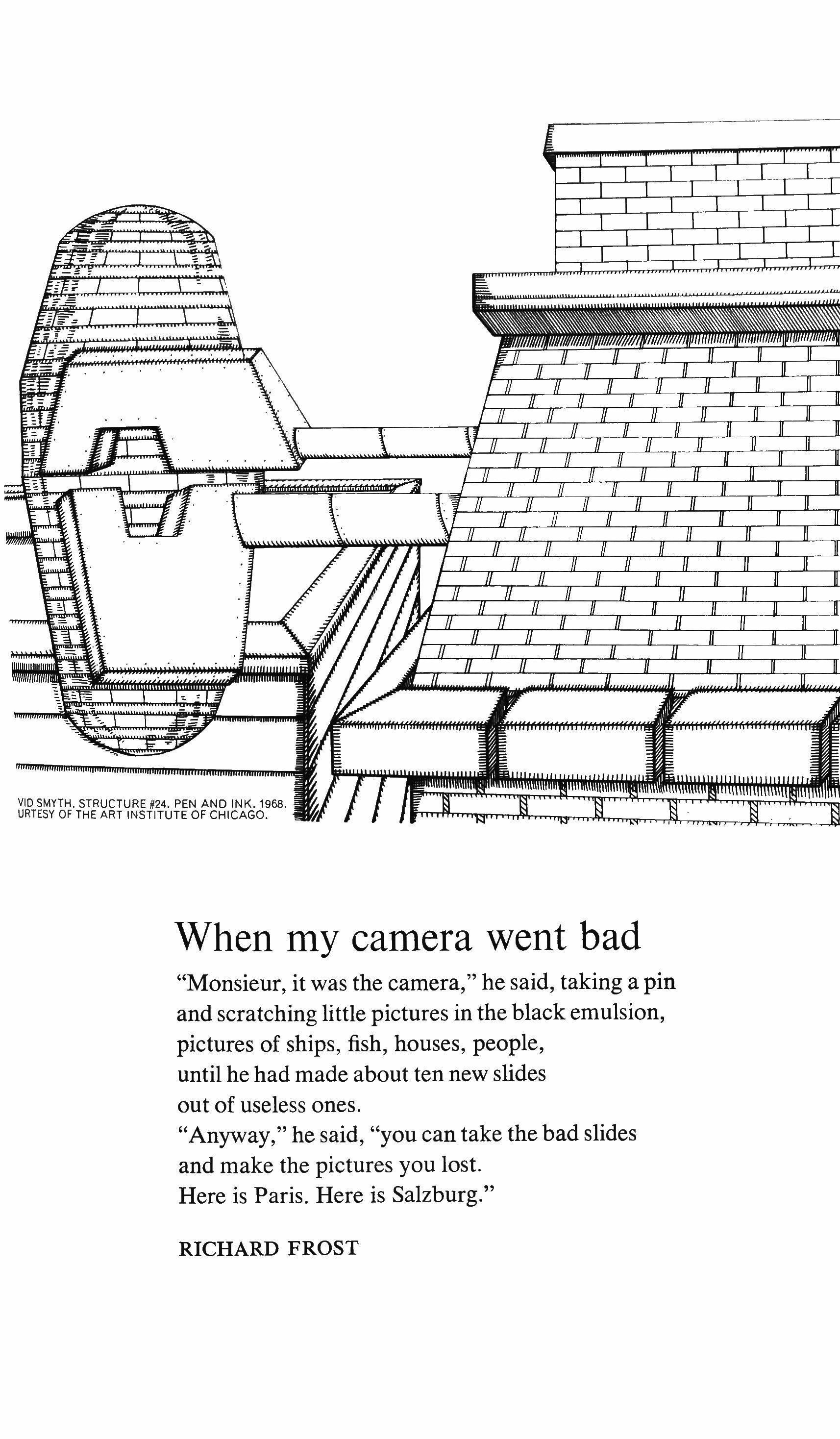
When my camera went bad
"Monsieur, it was the camera," he said, taking a pin and scratching little pictures in the black emulsion, pictures of ships, fish, houses, people, until he had made about ten new slides out of useless ones.
"Anyway," he said, "you can take the bad slides and make the pictures you lost. Here is Paris. Here is Salzburg."
RICHARD FROST VIO SMYTH. STRUCTURE #24. PEN AND INK. 1968. URTESY OF THE ART INSTITUTE OF CHICAGO.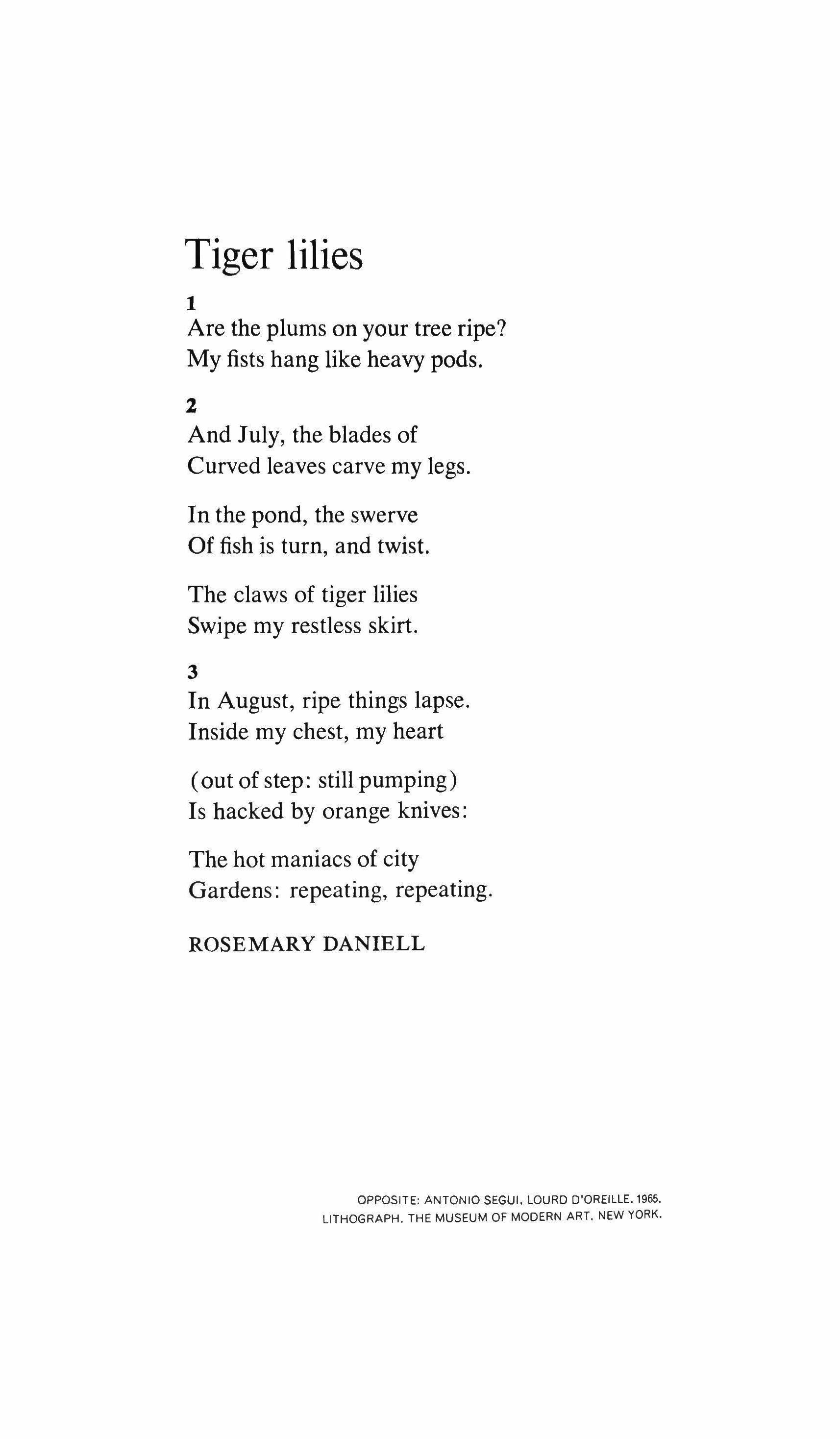
1 Are the plums on your tree ripe? My fists hang like heavy pods.
2 And July, the blades of Curved leaves carve my legs.
In the pond, the swerve Of fish is turn, and twist.
The claws of tiger lilies Swipe my restless skirt.
3 In August, ripe things lapse. Inside my chest, my heart (out of step: still pumping) Is hacked by orange knives:
The hot maniacs of city Gardens: repeating, repeating.
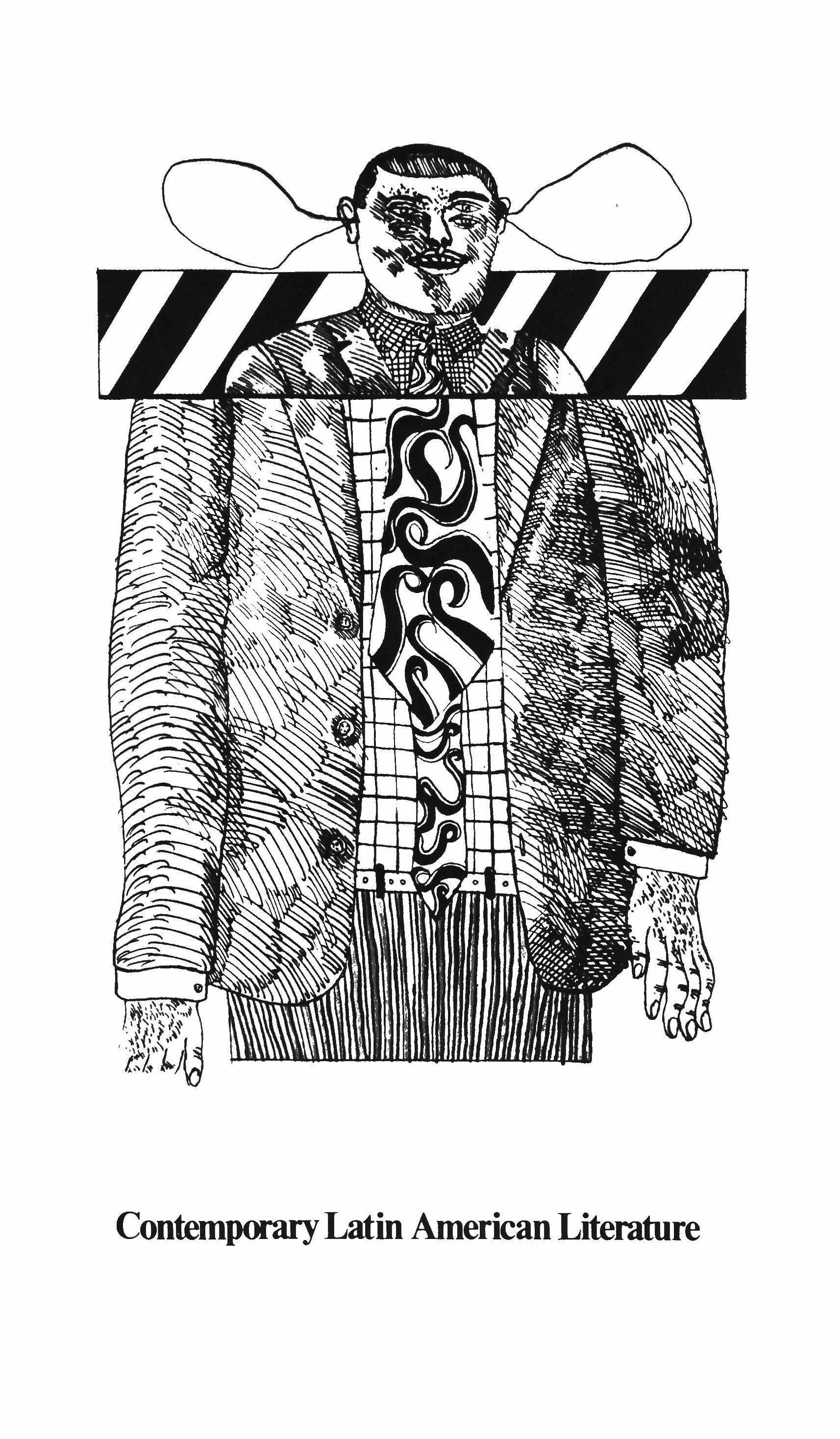
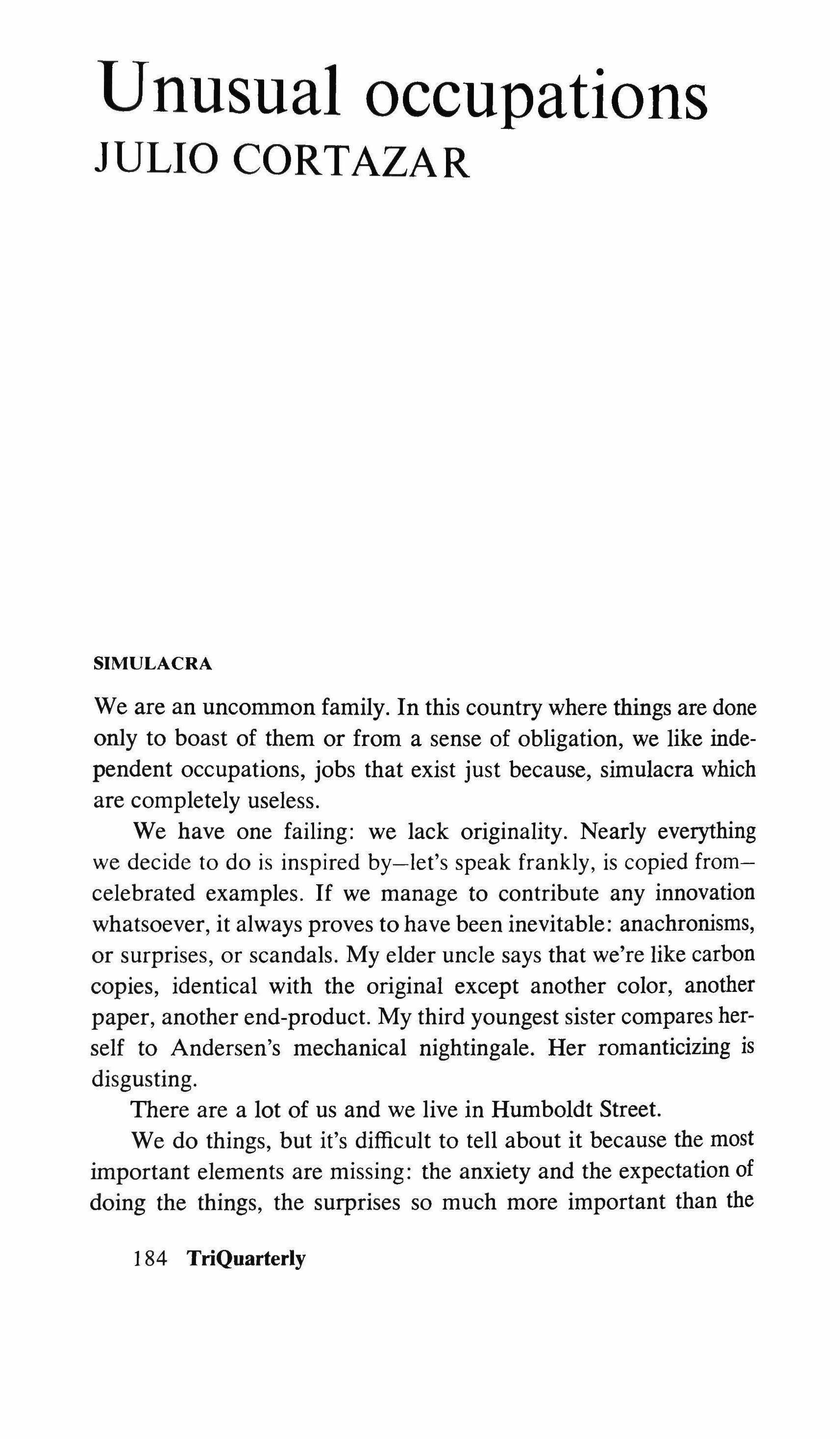
We are an uncommon family. In this country where things are done only to boast of them or from a sense of obligation, we like independent occupations, jobs that exist just because, simulacra which are completely useless.
We have one failing: we lack originality. Nearly everything we decide to do is inspired by-let's speak frankly, is copied fromcelebrated examples. If we manage to contribute any innovation whatsoever, it always proves to have been inevitable: anachronisms, or surprises, or scandals. My elder uncle says that we're like carbon copies, identical with the original except another color, another paper, another end-product. My third youngest sister compares herself to Andersen's mechanical nightingale. Her romanticizing is disgusting.
There are a lot of us and we live in Humboldt Street.
We do things, but it's difficult to tell about it because the most important elements are missing: the anxiety and the expectation of doing the things, the surprises so much more important than the
184 TriQuarterly
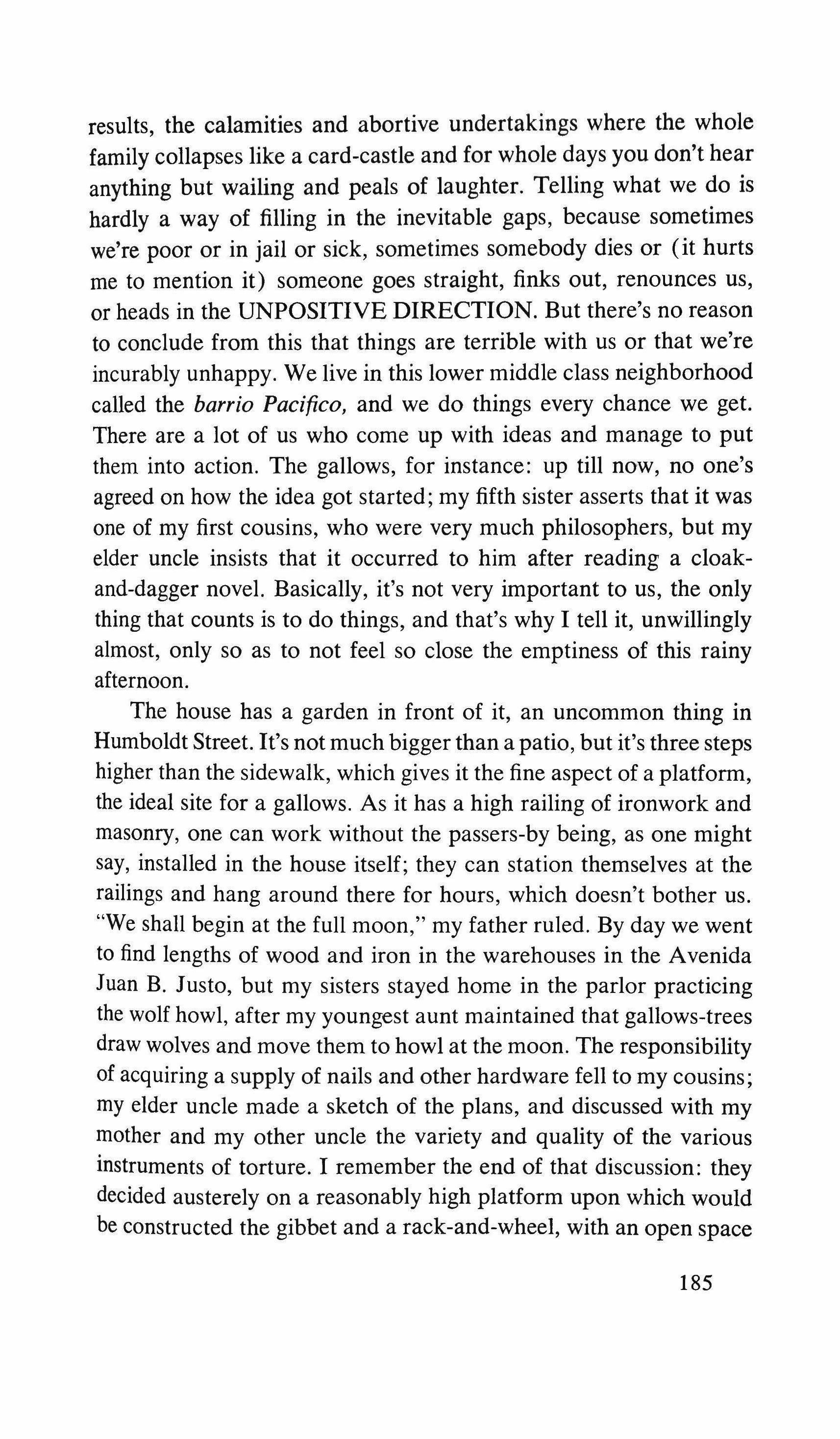
results, the calamities and abortive undertakings where the whole family collapses like a card-castle and for whole days you don't hear anything but wailing and peals of laughter. Telling what we do is hardly a way of filling in the inevitable gaps, because sometimes we're poor or in jailor sick, sometimes somebody dies or (it hurts me to mention it) someone goes straight, finks out, renounces us, or heads in the UNPOSITIVE DIRECTION. But there's no reason to conclude from this that things are terrible with us or that we're incurably unhappy. We live in this lower middle class neighborhood called the barrio Pacifico, and we do things every chance we get. There are a lot of us who come up with ideas and manage to put them into action. The gallows, for instance: up till now, no one's agreed on how the idea got started; my fifth sister asserts that it was one of my first cousins, who were very much philosophers, but my elder uncle insists that it occurred to him after reading a cloakand-dagger novel. Basically, it's not very important to us, the only thing that counts is to do things, and that's why I tell it, unwillingly almost, only so as to not feel so close the emptiness of this rainy afternoon.
The house has a garden in front of it, an uncommon thing in Humboldt Street. It's not much bigger than a patio, but it's three steps higher than the sidewalk, which gives it the fine aspect of a platform, the ideal site for a gallows. As it has a high railing of ironwork and masonry, one can work without the passers-by being, as one might say, installed in the house itself; they can station themselves at the railings and hang around there for hours, which doesn't bother us. "We shall begin at the full moon," my father ruled. By day we went to find lengths of wood and iron in the warehouses in the Avenida Juan B. Justo, but my sisters stayed home in the parlor practicing the wolf howl, after my youngest aunt maintained that gallows-trees draw wolves and move them to howl at the moon. The responsibility of acquiring a supply of nails and other hardware fell to my cousins; my elder uncle made a sketch of the plans, and discussed with my mother and my other uncle the variety and quality of the various instruments of torture. I remember the end of that discussion: they decided austerely on a reasonably high platform upon which would be constructed the gibbet and a rack-and-wheel, with an open space
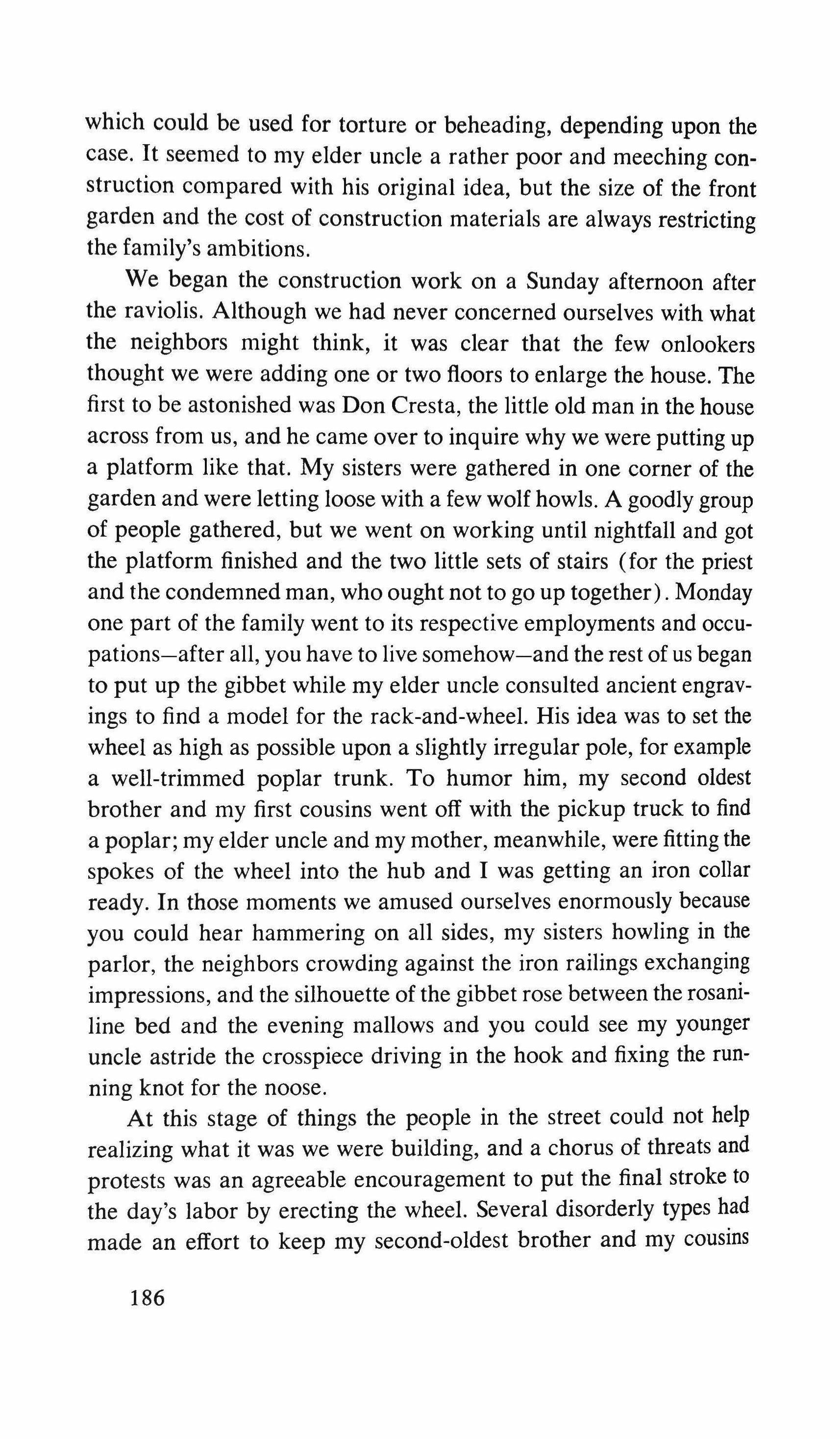
which could be used for torture or beheading, depending upon the case. It seemed to my elder uncle a rather poor and meeching construction compared with his original idea, but the size of the front garden and the cost of construction materials are always restricting the family's ambitions.
We began the construction work on a Sunday afternoon after the raviolis. Although we had never concerned ourselves with what the neighbors might think, it was clear that the few onlookers thought we were adding one or two floors to enlarge the house. The first to be astonished was Don Cresta, the little old man in the house across from us, and he came over to inquire why we were putting up a platform like that. My sisters were gathered in one corner of the garden and were letting loose with a few wolf howls. A goodly group of people gathered, but we went on working until nightfall and got the platform finished and the two little sets of stairs (for the priest and the condemned man, who ought not to go up together). Monday one part of the family went to its respective employments and occupations-after all, you have to live somehow-and the rest of us began to put up the gibbet while my elder uncle consulted ancient engravings to find a model for the rack-and-wheel. His idea was to set the wheel as high as possible upon a slightly irregular pole, for example a well-trimmed poplar trunk. To humor him, my second oldest brother and my first cousins went off with the pickup truck to find a poplar; my elder uncle and my mother, meanwhile, were fitting the spokes of the wheel into the hub and I was getting an iron collar ready. In those moments we amused ourselves enormously because you could hear hammering on all sides, my sisters howling in the parlor, the neighbors crowding against the iron railings exchanging impressions, and the silhouette of the gibbet rose between the rosaniline bed and the evening mallows and you could see my younger uncle astride the crosspiece driving in the hook and fixing the running knot for the noose.
At this stage of things the people in the street could not help realizing what it was we were building, and a chorus of threats and protests was an agreeable encouragement to put the final stroke to the day's labor by erecting the wheel. Several disorderly types had made an effort to keep my second-oldest brother and my cousins

from conveying into the house the magnificent poplar trunk which they'd fetched in the pickup truck. An attempt at harassment in the form of a tug-of-war was won easily by the family in full force tugging at the trunk in a disciplined way, and we set it down in the garden along with a very young child trapped in the roots. My father personally returned the child to its exasperated parents, putting it genteelly through the railings, and while attention was concentrated on these sentimental alternatives, my elder uncle, aided by my first cousins, fitted the wheel onto one end of the trunk and proceeded to raise it. The family was congregated on the platform at the moment the police arrived and commented favorably on how well the gallows looked. My third sister had stationed herself alone by the gate, so the dialogue with the deputy commissioner himself was left up to her; it was not difficult for her to persuade him that we were laboring within the precincts of our own property upon a project only the use of which could vest it with an illegal character, and that the complaints of the neighborhood were the products of animosity and the result of envy. Nightfall saved us from losing any more time.
We took supper on the platform by the light of a carbide lamp, spied upon by a crowd of around a hundred spiteful neighbors; never had the roast suckling pig tasted more exquisite, or the chianti been blacker and sweeter. A breeze from the north swung the gallows rope gently back and forth; the wheel of the rack creaked once or twice, as though the crows had already come to rest there and eat. The spectators began to go off, muttering vague threats; some twenty or thirty stayed on, hanging around the iron railing; they seemed to be waiting for something. After coffee we put out the lamp so that we could see the moon which was rising over the balustrades of the terrace, my sisters howled and my cousins and uncles loped slowly back and forth across the platform, their steps making the foundation shake underfoot. In the subsequent silence the moonlight came to fall at the height of the noose, and a cloud with silver borders seemed to stretch across the wheel. We looked at it all, so happy it was a pleasure, but the neighbors were murmuring at the railings as if they were disappointed or something. They were lighting cigarettes or were wandering off, some in pajamas and others more slowly. Only the street remained, the sound of the cop's nightstick on pave-
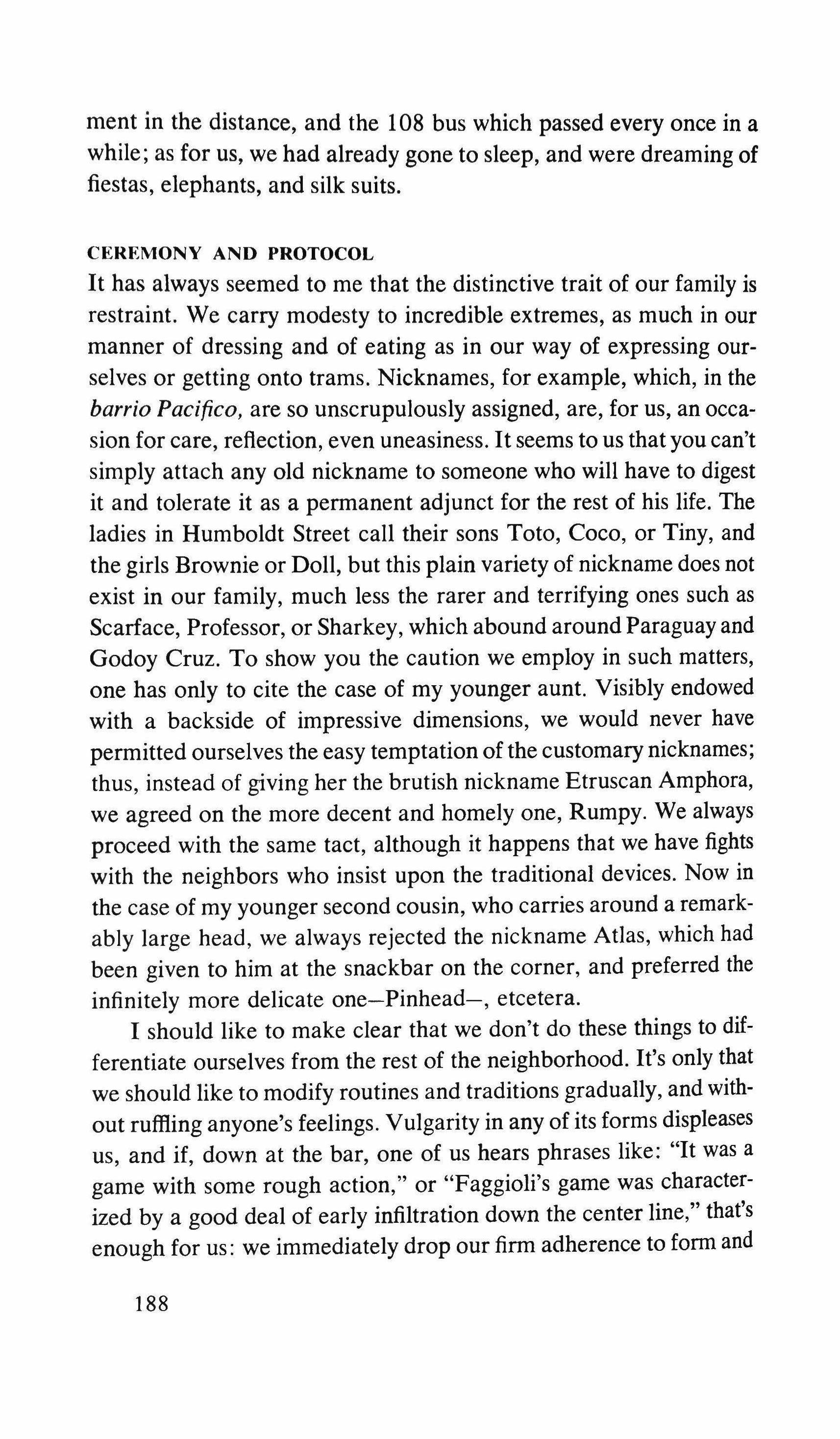
ment in the distance, and the 108 bus which passed every once in a while; as for us, we had already gone to sleep, and were dreaming of fiestas, elephants, and silk suits.
It has always seemed to me that the distinctive trait of our family is restraint. We carry modesty to incredible extremes, as much in our manner of dressing and of eating as in our way of expressing ourselves or getting onto trams. Nicknames, for example, which, in the barrio Pacifico, are so unscrupulously assigned, are, for us, an occasion for care, reflection, even uneasiness. It seems to us that you can't simply attach any old nickname to someone who will have to digest it and tolerate it as a permanent adjunct for the rest of his life. The ladies in Humboldt Street call their sons Toto, Coco, or Tiny, and the girls Brownie or Doll, but this plain variety of nickname does not exist in our family, much less the rarer and terrifying ones such as Scarface, Professor, or Sharkey, which abound around Paraguay and Godoy Cruz. To show you the caution we employ in such matters, one has only to cite the case of my younger aunt. Visibly endowed with a backside of impressive dimensions, we would never have permitted ourselves the easy temptation of the customary nicknames; thus, instead of giving her the brutish nickname Etruscan Amphora, we agreed on the more decent and homely one, Rumpy. We always proceed with the same tact, although it happens that we have fights with the neighbors who insist upon the traditional devices. Now in the case of my younger second cousin, who carries around a remarkably large head, we always rejected the nickname Atlas, which had been given to him at the snackbar on the corner, and preferred the infinitely more delicate one-Pinhead-, etcetera.
I should like to make clear that we don't do these things to differentiate ourselves from the rest of the neighborhood. It's only that we should like to modify routines and traditions gradually, and without ruffling anyone's feelings. Vulgarity in any of its forms displeases us, and if, down at the bar, one of us hears phrases like: "It was a game with some rough action," or "Faggioli's game was characterized by a good deal of early infiltration down the center line," that's enough for us: we immediately drop our firm adherence to form and
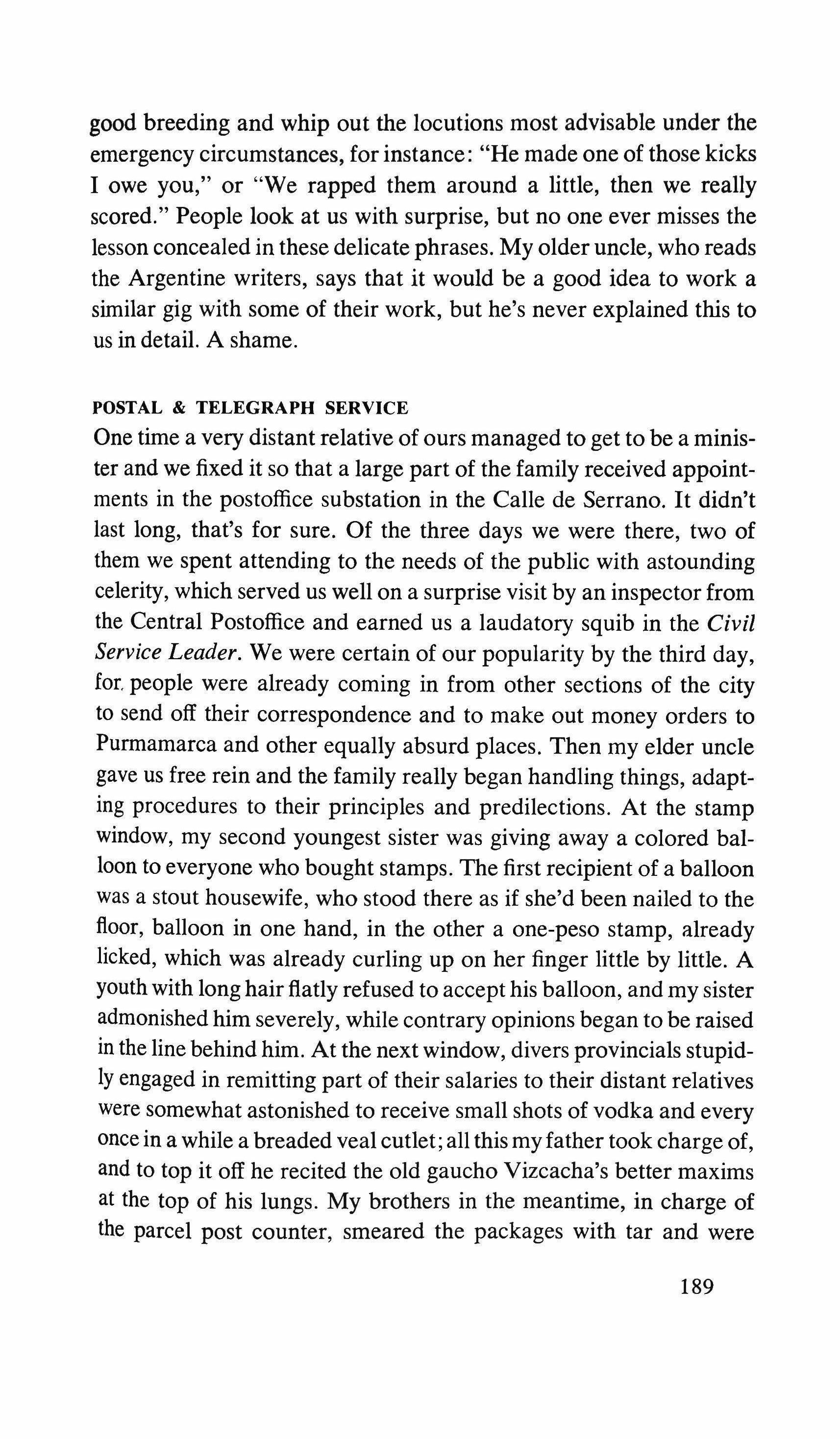
good breeding and whip out the locutions most advisable under the emergency circumstances, for instance: "He made one of those kicks lowe you," or "We rapped them around a little, then we really scored." People look at us with surprise, but no one ever misses the lesson concealed in these delicate phrases. My older uncle, who reads the Argentine writers, says that it would be a good idea to work a similar gig with some of their work, but he's never explained this to us in detail. A shame.
One time a very distant relative of ours managed to get to be a minister and we fixed it so that a large part of the family received appointments in the postoffice substation in the Calle de Serrano. It didn't last long, that's for sure. Of the three days we were there, two of them we spent attending to the needs of the public with astounding celerity, which served us well on a surprise visit by an inspector from the Central Postoffice and earned us a laudatory squib in the Civil Service Leader. We were certain of our popularity by the third day, for. people were already coming in from other sections of the city to send off their correspondence and to make out money orders to Purmamarca and other equally absurd places. Then my elder uncle gave us free rein and the family really began handling things, adapting procedures to their principles and predilections. At the stamp window, my second youngest sister was giving away a colored balloon to everyone who bought stamps. The first recipient of a balloon was a stout housewife, who stood there as if she'd been nailed to the floor, balloon in one hand, in the other a one-peso stamp, already licked, which was already curling up on her finger little by little. A youth with long hair flatly refused to accept his balloon, and my sister admonished him severely, while contrary opinions began to be raised in the line behind him. At the next window, divers provincials stupidly engaged in remitting part of their salaries to their distant relatives were somewhat astonished to receive small shots of vodka and every once in a while a breaded veal cutlet; all this my father took charge of, and to top it off he recited the old gaucho Vizcacha's better maxims at the top of his lungs. My brothers in the meantime, in charge of the parcel post counter, smeared the packages with tar and were
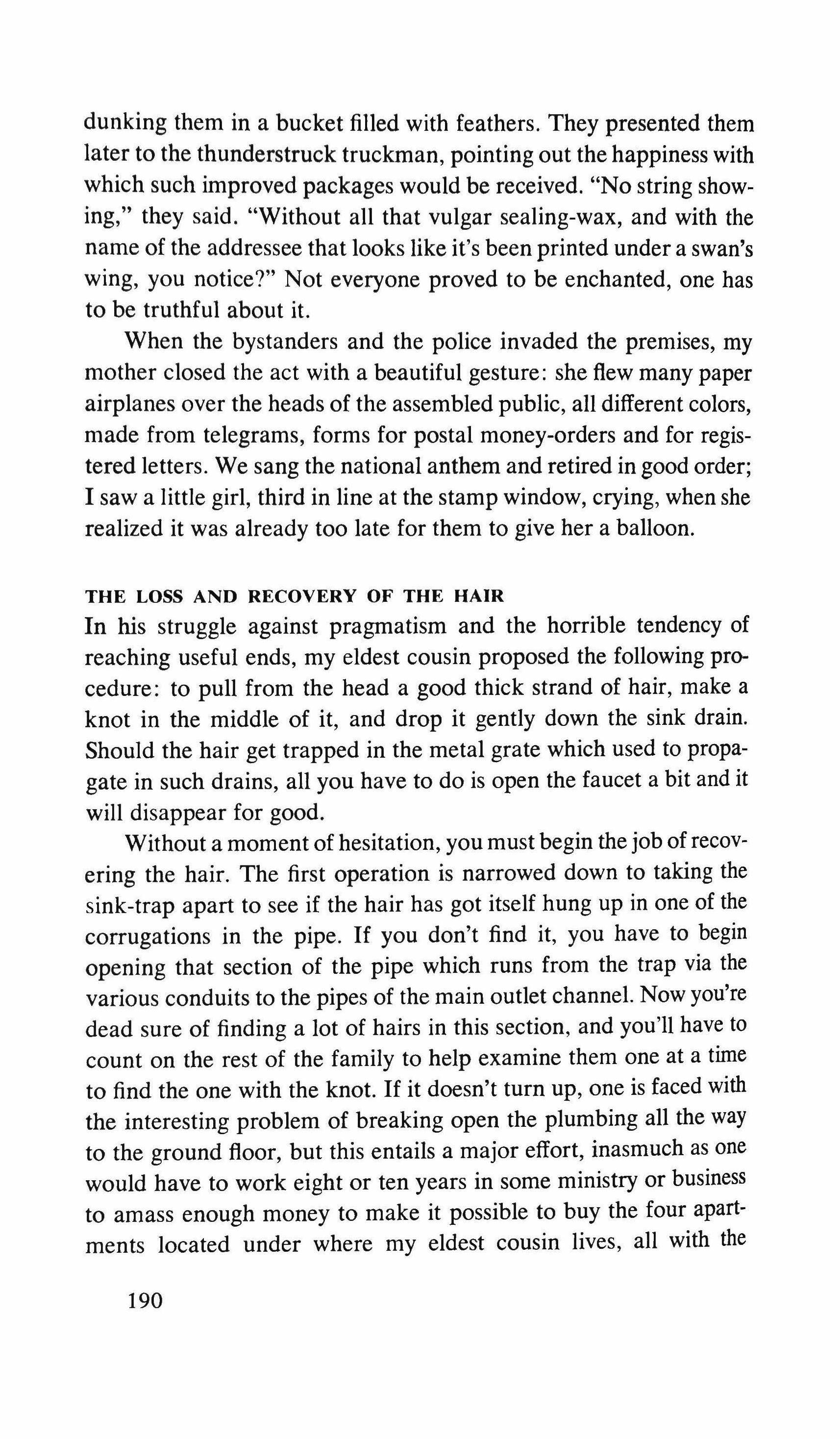
dunking them in a bucket filled with feathers. They presented them later to the thunderstruck truckman, pointing out the happiness with which such improved packages would be received. "No string showing," they said. "Without all that vulgar sealing-wax, and with the name of the addressee that looks like it's been printed under a swan's wing, you notice?" Not everyone proved to be enchanted, one has to be truthful about it.
When the bystanders and the police invaded the premises, my mother closed the act with a beautiful gesture: she flew many paper airplanes over the heads of the assembled public, all different colors, made from telegrams, forms for postal money-orders and for registered letters. We sang the national anthem and retired in good order; I saw a little girl, third in line at the stamp window, crying, when she realized it was already too late for them to give her a balloon.
In his struggle against pragmatism and the horrible tendency of reaching useful ends, my eldest cousin proposed the following procedure: to pull from the head a good thick strand of hair, make a knot in the middle of it, and drop it gently down the sink drain. Should the hair get trapped in the metal grate which used to propagate in such drains, all you have to do is open the faucet a bit and it will disappear for good.
Without a moment of hesitation, you must begin the job of recovering the hair. The first operation is narrowed down to taking the sink-trap apart to see if the hair has got itself hung up in one of the corrugations in the pipe. If you don't find it, you have to begin opening that section of the pipe which runs from the trap via the various conduits to the pipes of the main outlet channel. Now you're dead sure of finding a lot of hairs in this section, and you'll have to count on the rest of the family to help examine them one at a time to find the one with the knot. If it doesn't turn up, one is faced with the interesting problem of breaking open the plumbing all the way to the ground floor, but this entails a major effort, inasmuch as one would have to work eight or ten years in some ministry or business to amass enough money to make it possible to buy the four apartments located under where my eldest cousin lives, all with the
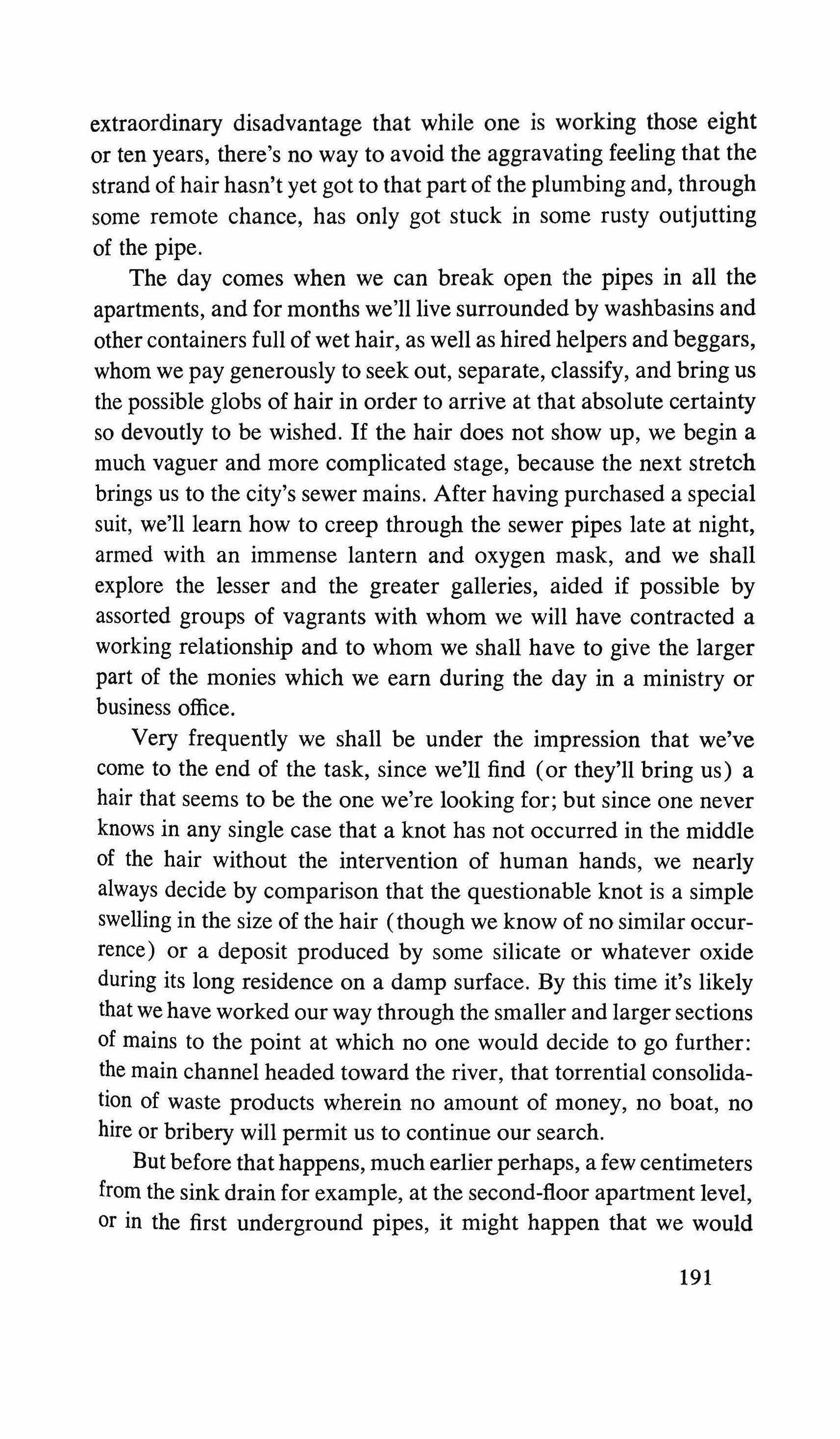
extraordinary disadvantage that while one is working those eight or ten years, there's no way to avoid the aggravating feeling that the strand of hair hasn't yet got to that part of the plumbing and, through some remote chance, has only got stuck in some rusty outjutting of the pipe.
The day comes when we can break open the pipes in all the apartments, and for months we'll live surrounded by washbasins and other containers full of wet hair, as well as hired helpers and beggars, whom we pay generously to seek out, separate, classify, and bring us the possible globs of hair in order to arrive at that absolute certainty so devoutly to be wished. If the hair does not show up, we begin a much vaguer and more complicated stage, because the next stretch brings us to the city's sewer mains. After having purchased a special suit, we'll learn how to creep through the sewer pipes late at night, armed with an immense lantern and oxygen mask, and we shall explore the lesser and the greater galleries, aided if possible by assorted groups of vagrants with whom we will have contracted a working relationship and to whom we shall have to give the larger part of the monies which we earn during the day in a ministry or business office.
Very frequently we shall be under the impression that we've come to the end of the task, since we'll find (or they'll bring us) a hair that seems to be the one we're looking for; but since one never knows in any single case that a knot has not occurred in the middle of the hair without the intervention of human hands, we nearly always decide by comparison that the questionable knot is a simple swelling in the size of the hair (though we know of no similar occurrence) or a deposit produced by some silicate or whatever oxide during its long residence on a damp surface. By this time it's likely that we have worked our way through the smaller and larger sections of mains to the point at which no one would decide to go further: the main channel headed toward the river, that torrential consolidation of waste products wherein no amount of money, no boat, no hire or bribery will permit us to continue our search.
But before that happens, much earlier perhaps, a few centimeters from the sink drain for example, at the second-floor apartment level, or in the first underground pipes, it might happen that we would
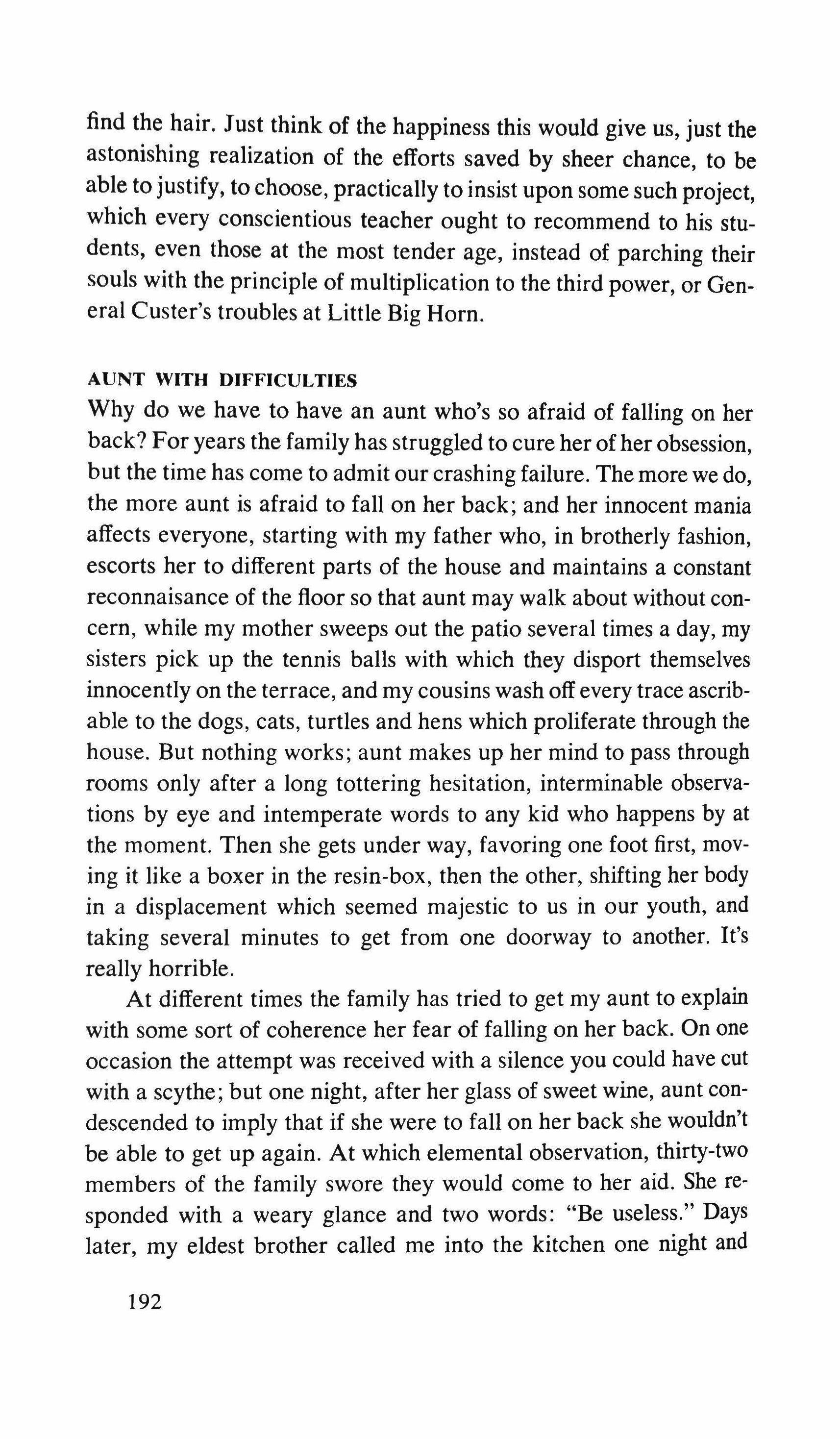
find the hair. Just think of the happiness this would give us, just the astonishing realization of the efforts saved by sheer chance, to be able to justify, to choose, practically to insist upon some such project, which every conscientious teacher ought to recommend to his students, even those at the most tender age, instead of parching their souls with the principle of multiplication to the third power, or General Custer's troubles at Little Big Horn.
Why do we have to have an aunt who's so afraid of falling on her back? For years the family has struggled to cure her ofher obsession, but the time has come to admit our crashing failure. The more we do, the more aunt is afraid to fall on her back; and her innocent mania affects everyone, starting with my father who, in brotherly fashion, escorts her to different parts of the house and maintains a constant reconnaisance of the floor so that aunt may walk about without concern, while my mother sweeps out the patio several times a day, my sisters pick up the tennis balls with which they disport themselves innocently on the terrace, and my cousins wash off every trace ascribable to the dogs, cats, turtles and hens which proliferate through the house. But nothing works; aunt makes up her mind to pass through rooms only after a long tottering hesitation, interminable observations by eye and intemperate words to any kid who happens by at the moment. Then she gets under way, favoring one foot first, moving it like a boxer in the resin-box, then the other, shifting her body in a displacement which seemed majestic to us in our youth, and taking several minutes to get from one doorway to another. It's really horrible.
At different times the family has tried to get my aunt to explain with some sort of coherence her fear of falling on her back. On one occasion the attempt was received with a silence you could have cut with a scythe; but one night, after her glass of sweet wine, aunt condescended to imply that if she were to fall on her back she wouldn't be able to get up again. At which elemental observation, thirty-two members of the family swore they would come to her aid. She responded with a weary glance and two words: "Be useless." Days later, my eldest brother called me into the kitchen one night and
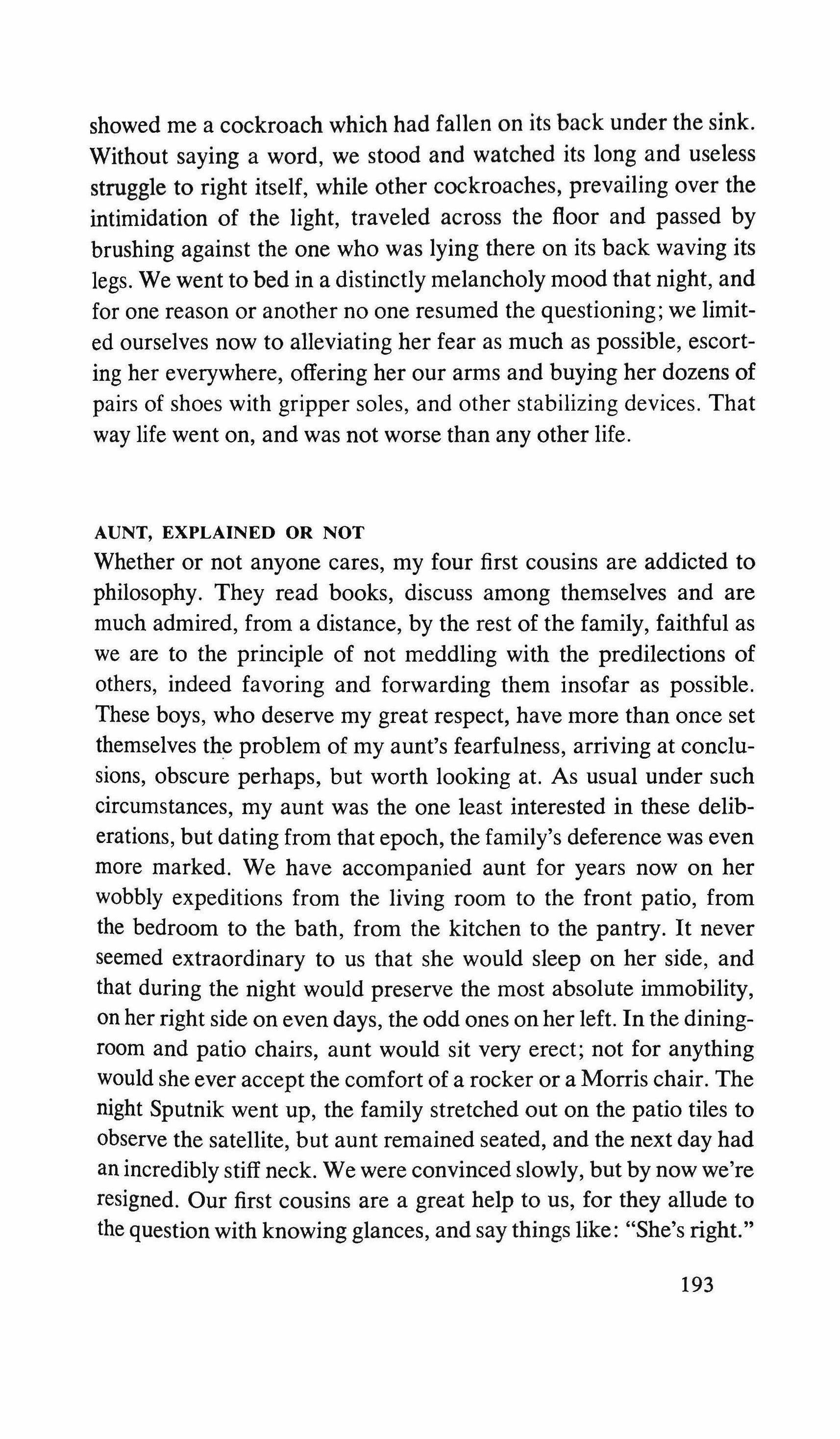
showed me a cockroach which had fallen on its back under the sink. Without saying a word, we stood and watched its long and useless struggle to right itself, while other cockroaches, prevailing over the intimidation of the light, traveled across the floor and passed by brushing against the one who was lying there on its back waving its legs. We went to bed in a distinctly melancholy mood that night, and for one reason or another no one resumed the questioning; we limited ourselves now to alleviating her fear as much as possible, escorting her everywhere, offering her our arms and buying her dozens of pairs of shoes with gripper soles, and other stabilizing devices. That way life went on, and was not worse than any other life.
Whether or not anyone cares, my four first cousins are addicted to philosophy. They read books, discuss among themselves and are much admired, from a distance, by the rest of the family, faithful as we are to the principle of not meddling with the predilections of others, indeed favoring and forwarding them insofar as possible. These boys, who deserve my great respect, have more than once set themselves the problem of my aunt's fearfulness, arriving at conclusions, obscure perhaps, but worth looking at. As usual under such circumstances, my aunt was the one least interested in these deliberations, but dating from that epoch, the family's deference was even more marked. We have accompanied aunt for years now on her wobbly expeditions from the living room to the front patio, from the bedroom to the bath, from the kitchen to the pantry. It never seemed extraordinary to us that she would sleep on her side, and that during the night would preserve the most absolute immobility, on her right side on even days, the odd ones on her left. In the diningroom and patio chairs, aunt would sit very erect; not for anything would she ever accept the comfort of a rocker or a Morris chair. The night Sputnik went up, the family stretched out on the patio tiles to observe the satellite, but aunt remained seated, and the next day had an incredibly stiff neck. We were convinced slowly, but by now we're resigned. Our first cousins are a great help to us, for they allude to the question with knowing glances, and say things like: "She's right."
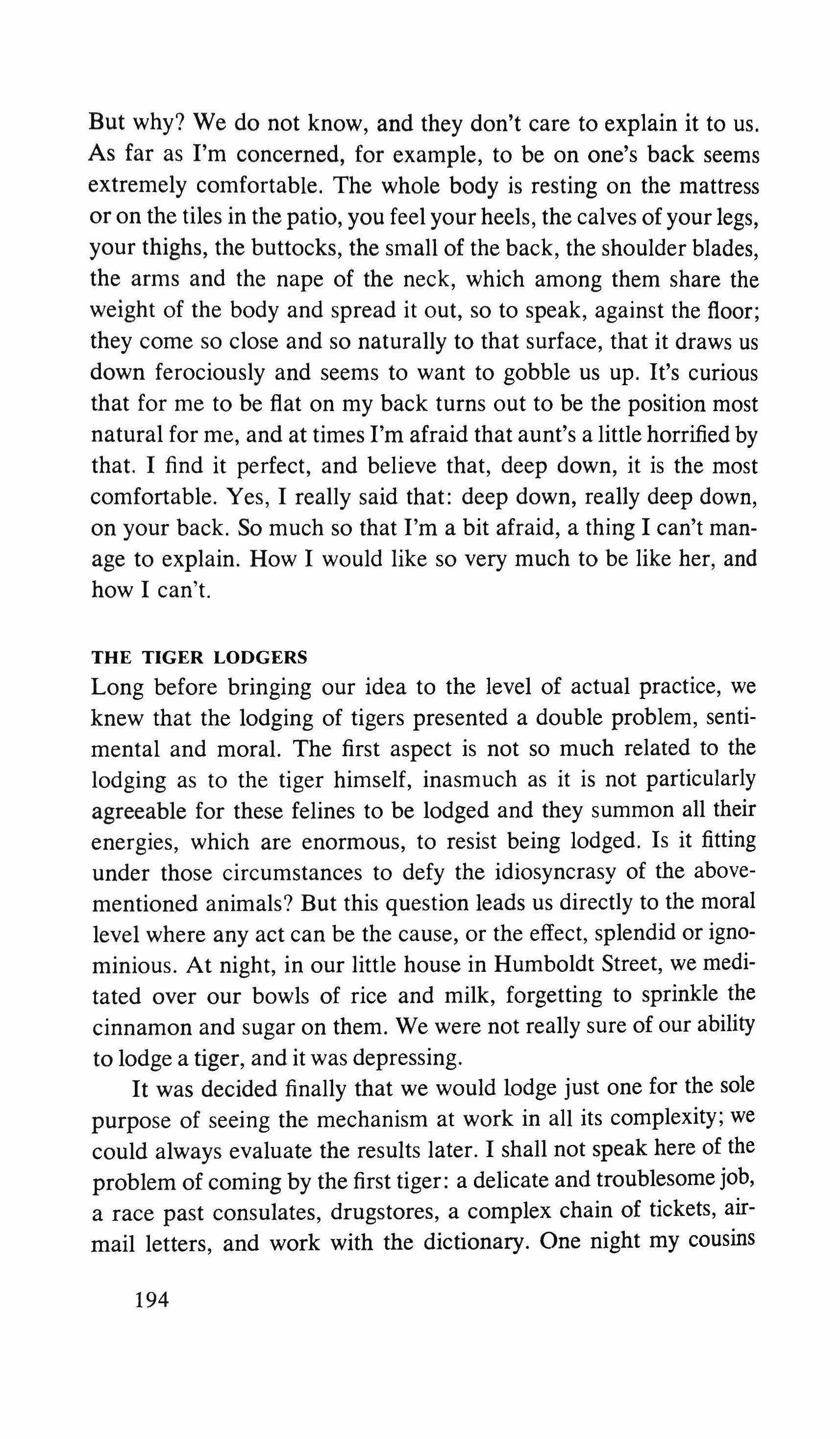
But why? We do not know, and they don't care to explain it to us. As far as I'm concerned, for example, to be on one's back seems extremely comfortable. The whole body is resting on the mattress or on the tiles in the patio, you feel your heels, the calves of your legs, your thighs, the buttocks, the small of the back, the shoulder blades, the arms and the nape of the neck, which among them share the weight of the body and spread it out, so to speak, against the floor; they come so close and so naturally to that surface, that it draws us down ferociously and seems to want to gobble us up. It's curious that for me to be flat on my back turns out to be the position most natural for me, and at times I'm afraid that aunt's a little horrified by that. I find it perfect, and believe that, deep down, it is the most comfortable. Yes, I really said that: deep down, really deep down, on your back. So much so that I'm a bit afraid, a thing I can't manage to explain. How I would like so very much to be like her, and how I can't.
Long before bringing our idea to the level of actual practice, we knew that the lodging of tigers presented a double problem, sentimental and moral. The first aspect is not so much related to the lodging as to the tiger himself, inasmuch as it is not particularly agreeable for these felines to be lodged and they summon all their energies, which are enormous, to resist being lodged. Is it fitting under those circumstances to defy the idiosyncrasy of the abovementioned animals? But this question leads us directly to the moral level where any act can be the cause, or the effect, splendid or ignominious. At night, in our little house in Humboldt Street, we meditated over our bowls of rice and milk, forgetting to sprinkle the cinnamon and sugar on them. We were not really sure of our ability to lodge a tiger, and it was depressing. It was decided finally that we would lodge just one for the sole purpose of seeing the mechanism at work in all its complexity; we could always evaluate the results later. I shall not speak here of the problem of coming by the first tiger: a delicate and troublesome job, a race past consulates, drugstores, a complex chain of tickets, airmail letters, and work with the dictionary. One night my cousins
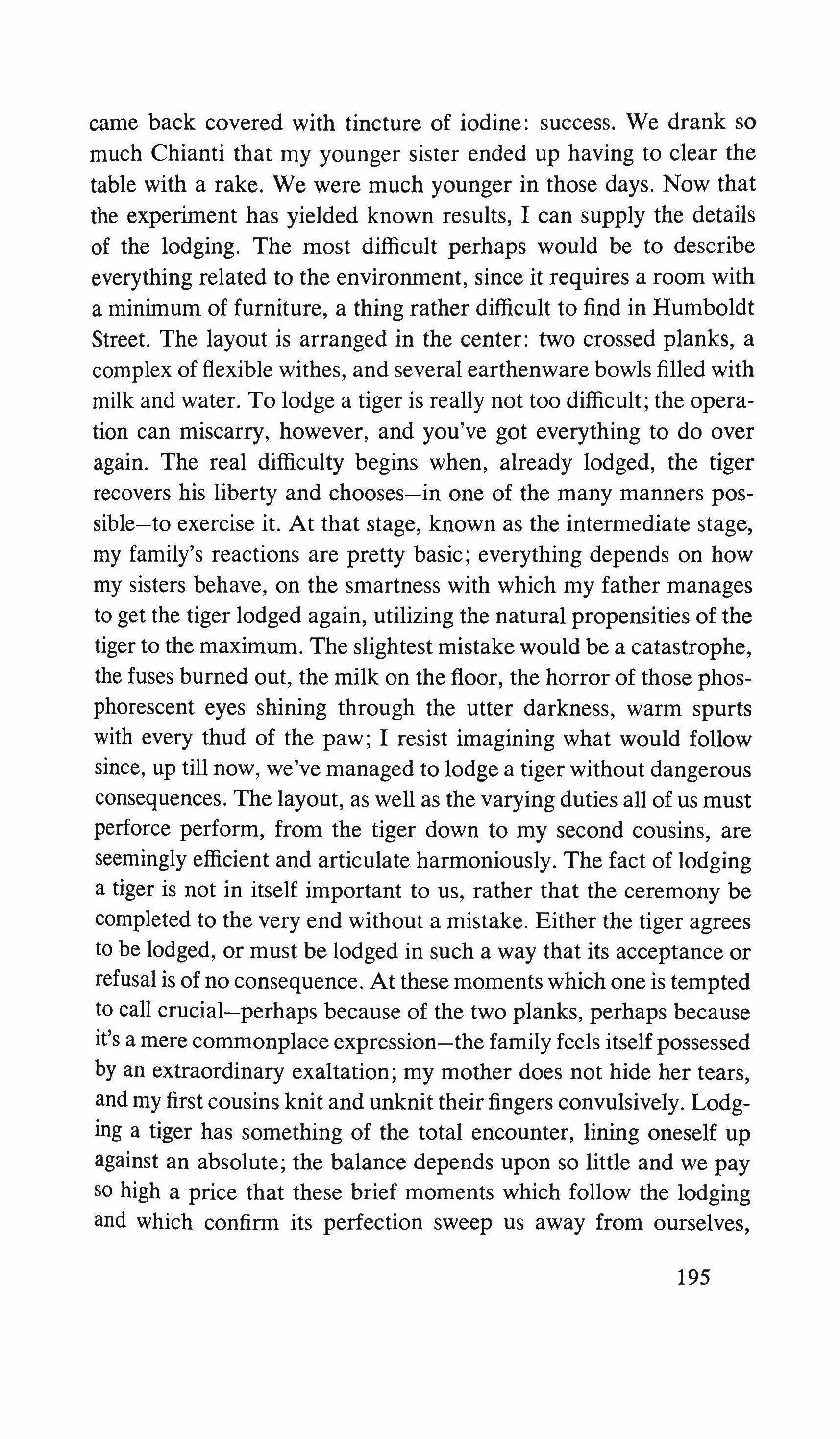
came back covered with tincture of iodine: success. We drank so much Chianti that my younger sister ended up having to clear the table with a rake. We were much younger in those days. Now that the experiment has yielded known results, I can supply the details of the lodging. The most difficult perhaps would be to describe everything related to the environment, since it requires a room with a minimum of furniture, a thing rather difficult to find in Humboldt Street. The layout is arranged in the center: two crossed planks, a complex of flexible withes, and several earthenware bowls filled with milk and water. To lodge a tiger is really not too difficult; the operation can miscarry, however, and you've got everything to do over again. The real difficulty begins when, already lodged, the tiger recovers his liberty and chooses-in one of the many manners possible-to exercise it. At that stage, known as the intermediate stage, my family's reactions are pretty basic; everything depends on how my sisters behave, on the smartness with which my father manages to get the tiger lodged again, utilizing the natural propensities of the tiger to the maximum. The slightest mistake would be a catastrophe, the fuses burned out, the milk on the floor, the horror of those phosphorescent eyes shining through the utter darkness, warm spurts with every thud of the paw; I resist imagining what would follow since, up till now, we've managed to lodge a tiger without dangerous consequences. The layout, as well as the varying duties all of us must perforce perform, from the tiger down to my second cousins, are seemingly efficient and articulate harmoniously. The fact of lodging a tiger is not in itself important to us, rather that the ceremony be completed to the very end without a mistake. Either the tiger agrees to be lodged, or must be lodged in such a way that its acceptance or refusal is of no consequence. At these moments which one is tempted to call crucial-perhaps because of the two planks, perhaps because it's a mere commonplace expression-the family feels itself possessed by an extraordinary exaltation; my mother does not hide her tears, and my first cousins knit and unknit their fingers convulsively. Lodging a tiger has something of the total encounter, lining oneself up against an absolute; the balance depends upon so little and we pay so high a price that these brief moments which follow the lodging and which confirm its perfection sweep us away from ourselves,
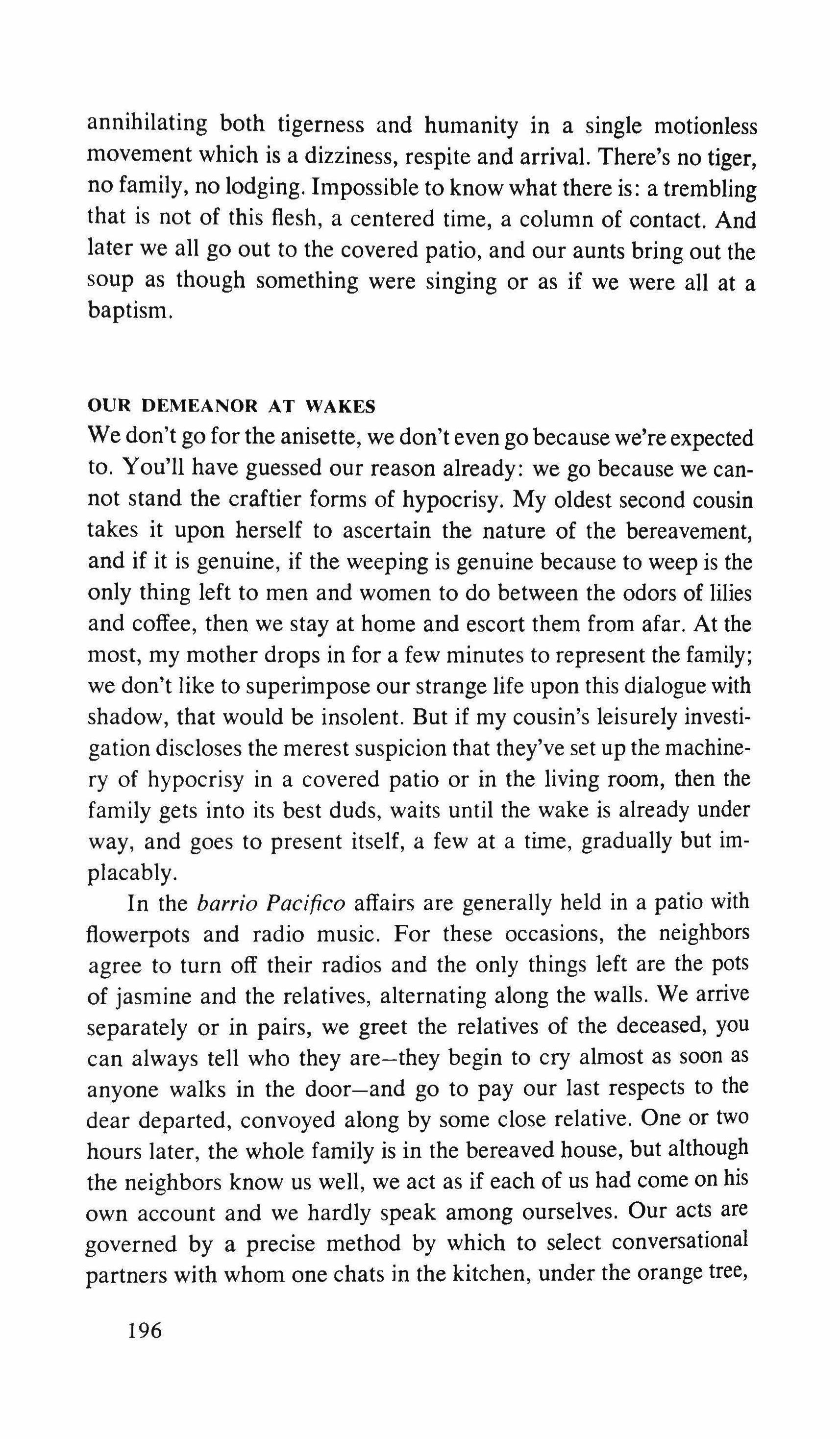
annihilating both tigerness and humanity in a single motionless movement which is a dizziness, respite and arrival. There's no tiger, no family, no lodging. Impossible to know what there is: a trembling that is not of this flesh, a centered time, a column of contact. And later we all go out to the covered patio, and our aunts bring out the soup as though something were singing or as if we were all at a baptism.
We don't go for the anisette, we don't even go because we're expected to. You'll have guessed our reason already: we go because we cannot stand the craftier forms of hypocrisy. My oldest second cousin takes it upon herself to ascertain the nature of the bereavement, and if it is genuine, if the weeping is genuine because to weep is the only thing left to men and women to do between the odors of lilies and coffee, then we stay at home and escort them from afar. At the most, my mother drops in for a few minutes to represent the family; we don't like to superimpose our strange life upon this dialogue with shadow, that would be insolent. But if my cousin's leisurely investigation discloses the merest suspicion that they've set up the machinery of hypocrisy in a covered patio or in the living room, then the family gets into its best duds, waits until the wake is already under way, and goes to present itself, a few at a time, gradually but implacably.
In the barrio Pacifico affairs are generally held in a patio with flowerpots and radio music. For these occasions, the neighbors agree to turn off their radios and the only things left are the pots of jasmine and the relatives, alternating along the walls. We arrive separately or in pairs, we greet the relatives of the deceased, you can always tell who they are-they begin to cry almost as soon as anyone walks in the door-and go to pay our last respects to the dear departed, convoyed along by some close relative. One or two hours later, the whole family is in the bereaved house, but although the neighbors know us well, we act as if each of us had come on his own account and we hardly speak among ourselves. Our acts are governed by a precise method by which to select conversational partners with whom one chats in the kitchen, under the orange tree,
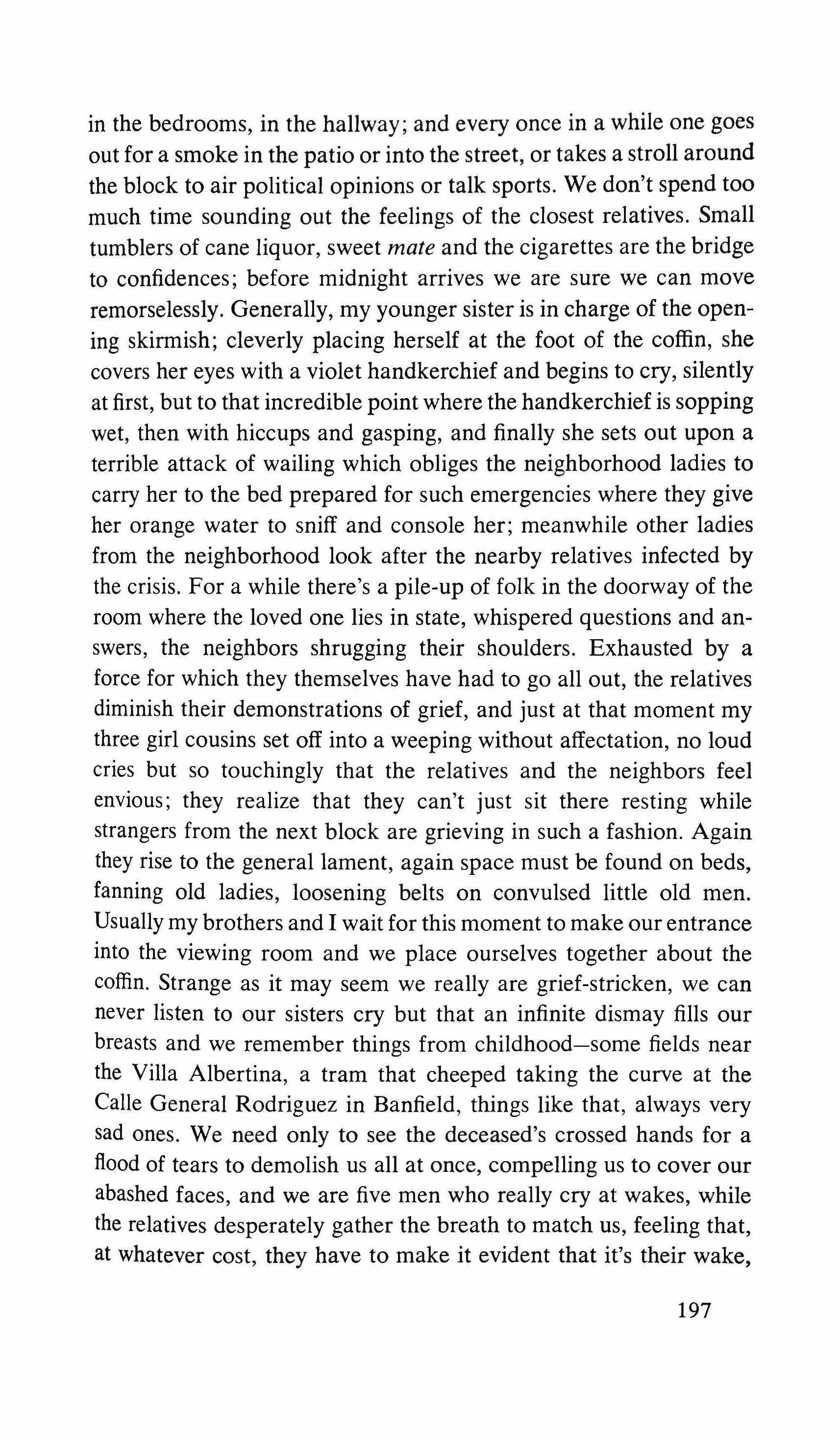
in the bedrooms, in the hallway; and every once in a while one goes out for a smoke in the patio or into the street, or takes a stroll around the block to air political opinions or talk sports. We don't spend too much time sounding out the feelings of the closest relatives. Small tumblers of cane liquor, sweet mate and the cigarettes are the bridge to confidences; before midnight arrives we are sure we can move remorselessly. Generally, my younger sister is in charge of the opening skirmish; cleverly placing herself at the foot of the coffin, she covers her eyes with a violet handkerchief and begins to cry, silently at first, but to that incredible point where the handkerchief is sopping wet, then with hiccups and gasping, and finally she sets out upon a terrible attack of wailing which obliges the neighborhood ladies to carry her to the bed prepared for such emergencies where they give her orange water to sniff and console her; meanwhile other ladies from the neighborhood look after the nearby relatives infected by the crisis. For a while there's a pile-up of folk in the doorway of the room where the loved one lies in state, whispered questions and answers, the neighbors shrugging their shoulders. Exhausted by a force for which they themselves have had to go all out, the relatives diminish their demonstrations of grief, and just at that moment my three girl cousins set off into a weeping without affectation, no loud cries but so touchingly that the relatives and the neighbors feel envious; they realize that they can't just sit there resting while strangers from the next block are grieving in such a fashion. Again they rise to the general lament, again space must be found on beds, fanning old ladies, loosening belts on convulsed little old men. Usually my brothers and I wait for this moment to make our entrance into the viewing room and we place ourselves together about the coffin. Strange as it may seem we really are grief-stricken, we can never listen to our sisters cry but that an infinite dismay fills our breasts and we remember things from childhood-some fields near the Villa Albertina, a tram that cheeped taking the curve at the Calle General Rodriguez in Banfield, things like that, always very sad ones. We need only to see the deceased's crossed hands for a flood of tears to demolish us all at once, compelling us to cover our abashed faces, and we are five men who really cry at wakes, while the relatives desperately gather the breath to match us, feeling that, at whatever cost, they have to make it evident that it's their wake,
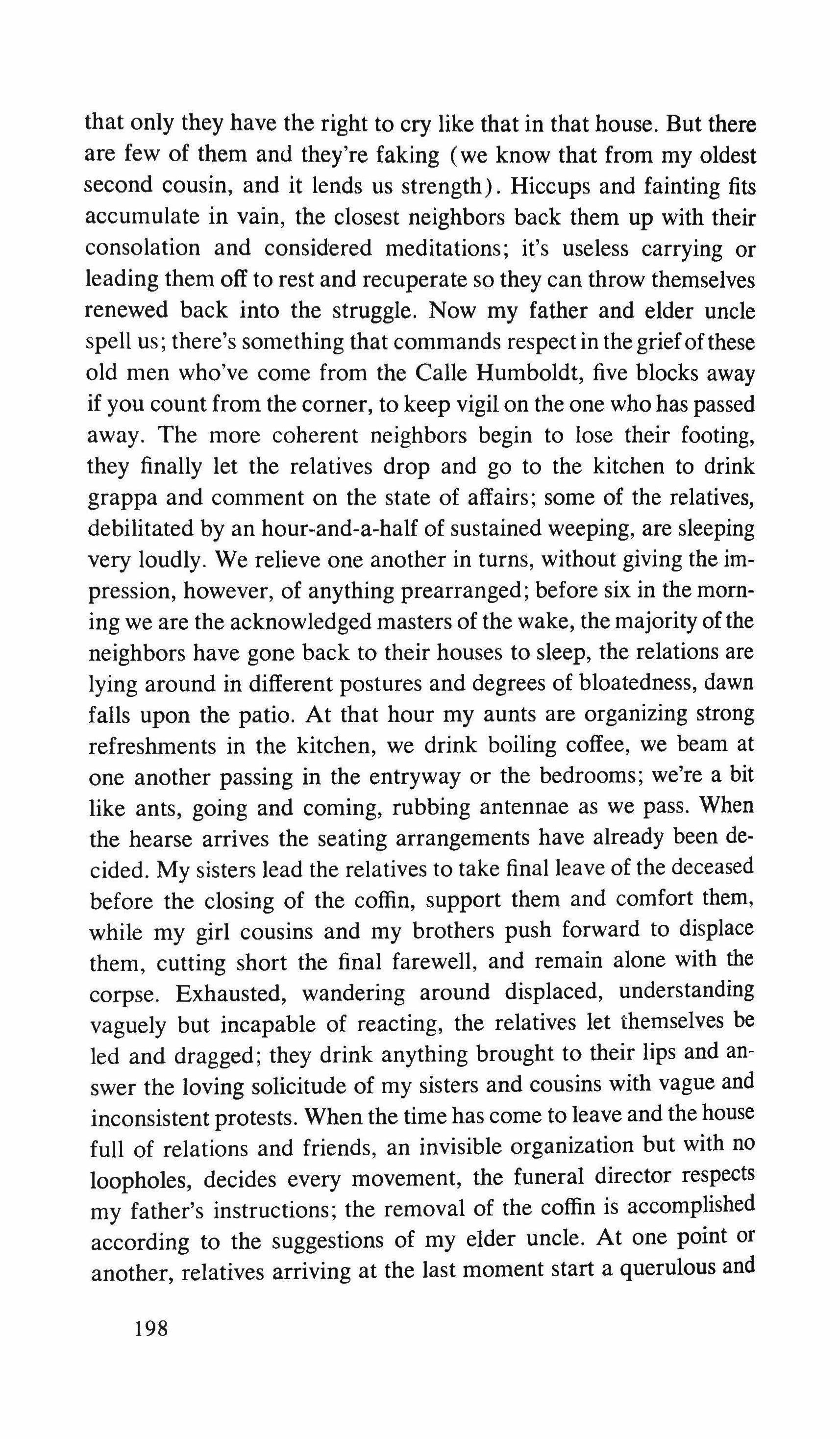
that only they have the right to cry like that in that house. But there are few of them and they're faking (we know that from my oldest second cousin, and it lends us strength). Hiccups and fainting fits accumulate in vain, the closest neighbors back them up with their consolation and considered meditations; it's useless carrying or leading them off to rest and recuperate so they can throw themselves renewed back into the struggle. Now my father and elder uncle spell us; there's something that commands respect in the griefofthese old men who've come from the Calle Humboldt, five blocks away if you count from the corner, to keep vigil on the one who has passed away. The more coherent neighbors begin to lose their footing, they finally let the relatives drop and go to the kitchen to drink grappa and comment on the state of affairs; some of the relatives, debilitated by an hour-and-a-half of sustained weeping, are sleeping very loudly. We relieve one another in turns, without giving the impression, however, of anything prearranged; before six in the morning we are the acknowledged masters of the wake, the majority of the neighbors have gone back to their houses to sleep, the relations are lying around in different postures and degrees of bloatedness, dawn falls upon the patio. At that hour my aunts are organizing strong refreshments in the kitchen, we drink boiling coffee, we beam at one another passing in the entryway or the bedrooms; we're a bit like ants, going and coming, rubbing antennae as we pass. When the hearse arrives the seating arrangements have already been decided. My sisters lead the relatives to take final leave of the deceased before the closing of the coffin, support them and comfort them, while my girl cousins and my brothers push forward to displace them, cutting short the final farewell, and remain alone with the corpse. Exhausted, wandering around displaced, understanding vaguely but incapable of reacting, the relatives let themselves be led and dragged; they drink anything brought to their lips and answer the loving solicitude of my sisters and cousins with vague and inconsistent protests. When the time has come to leave and the house full of relations and friends, an invisible organization but with no loopholes, decides every movement, the funeral director respects my father's instructions; the removal of the coffin is accomplished according to the suggestions of my elder uncle. At one point or another, relatives arriving at the last moment start a querulous and
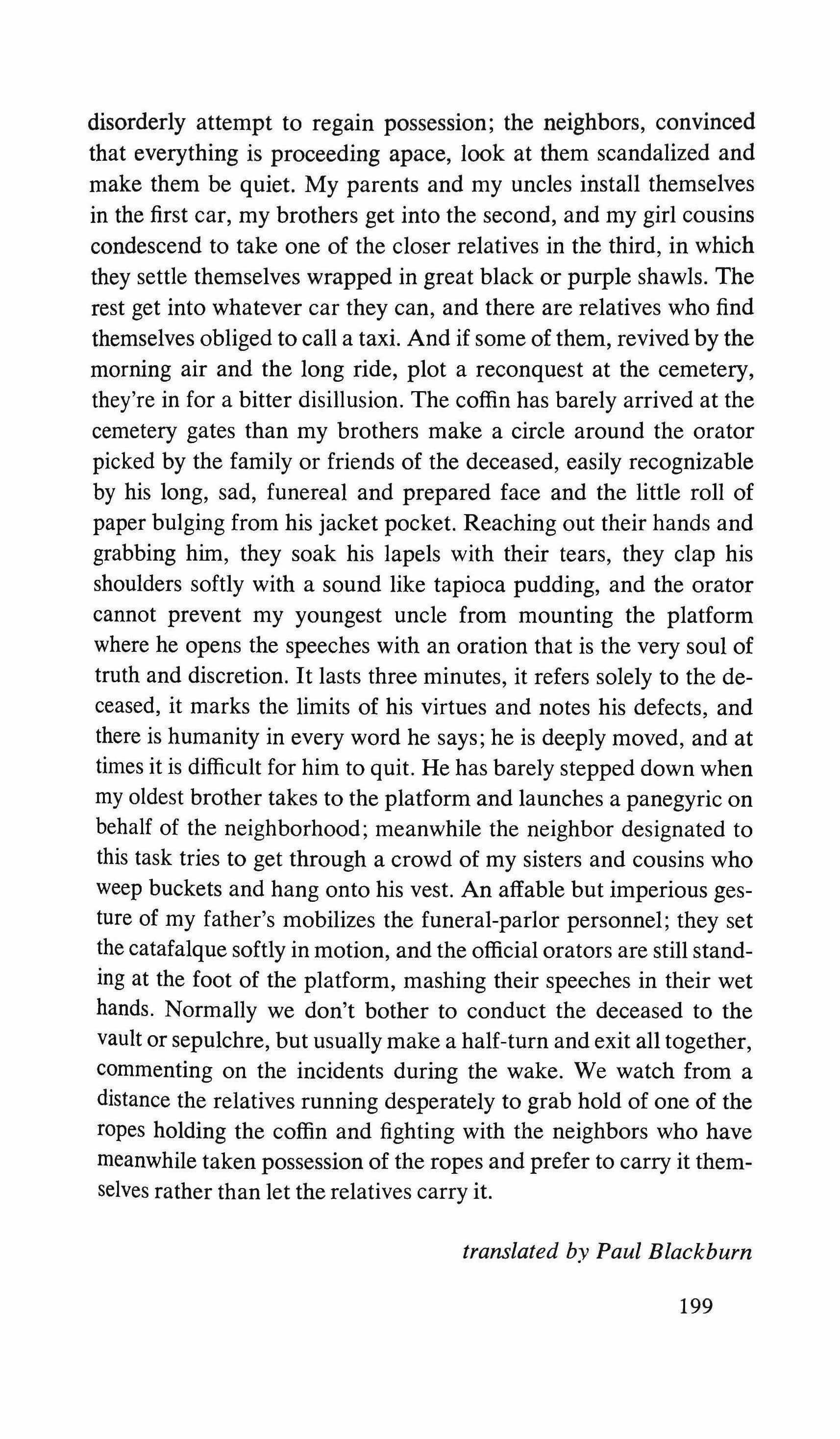
disorderly attempt to regain possession; the neighbors, convinced that everything is proceeding apace, look at them scandalized and make them be quiet. My parents and my uncles install themselves in the first car, my brothers get into the second, and my girl cousins condescend to take one of the closer relatives in the third, in which they settle themselves wrapped in great black or purple shawls. The rest get into whatever car they can, and there are relatives who find themselves obliged to call a taxi. And if some of them, revived by the morning air and the long ride, plot a reconquest at the cemetery, they're in for a bitter disillusion. The coffin has barely arrived at the cemetery gates than my brothers make a circle around the orator picked by the family or friends of the deceased, easily recognizable by his long, sad, funereal and prepared face and the little roll of paper bulging from his jacket pocket. Reaching out their hands and grabbing him, they soak his lapels with their tears, they clap his shoulders softly with a sound like tapioca pudding, and the orator cannot prevent my youngest uncle from mounting the platform where he opens the speeches with an oration that is the very soul of truth and discretion. It lasts three minutes, it refers solely to the deceased, it marks the limits of his virtues and notes his defects, and there is humanity in every word he says; he is deeply moved, and at times it is difficult for him to quit. He has barely stepped down when my oldest brother takes to the platform and launches a panegyric on behalf of the neighborhood; meanwhile the neighbor designated to this task tries to get through a crowd of my sisters and cousins who weep buckets and hang onto his vest. An affable but imperious gesture of my father's mobilizes the funeral-parlor personnel; they set the catafalque softly in motion, and the official orators are still standing at the foot of the platform, mashing their speeches in their wet hands. Normally we don't bother to conduct the deceased to the vault or sepulchre, but usually make a half-turn and exit all together, commenting on the incidents during the wake. We watch from a distance the relatives running desperately to grab hold of one of the ropes holding the coffin and fighting with the neighbors who have meanwhile taken possession of the ropes and prefer to carry it themselves rather than let the relatives carry it.
translated by Paul Blackburn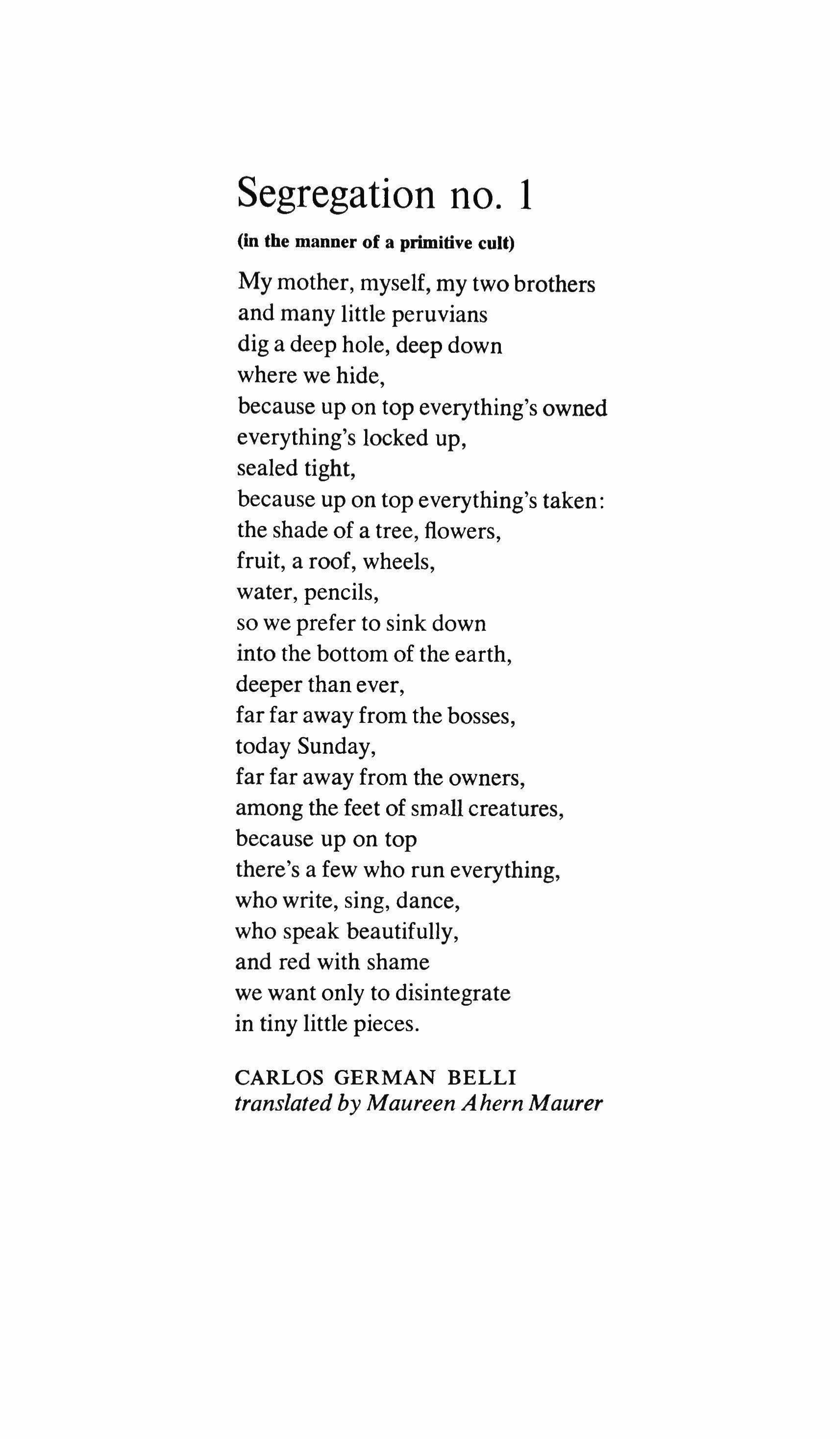
(in the manner of a primitive cult)
My mother, myself, my two brothers and many little peruvians dig a deep hole, deep down where we hide, because up on top everything's owned everything's locked up, sealed tight, because up on top everything's taken: the shade of a tree, flowers, fruit, a roof, wheels, water, pencils, so we prefer to sink down into the bottom of the earth, deeper than ever, far far away from the bosses, today Sunday, far far away from the owners, among the feet of small creatures, because up on top there's a few who run everything, who write, sing, dance, who speak beautifully, and red with shame we want only to disintegrate in tiny little pieces.
CARLOS GERMAN BELLI translated by Maureen Ahern Maurer"Why have they moved me ?"
Why have they moved me from womb to earth instead of spawning me in water air or fire?
CARLOS GERMAN BELLI
translated by Maureen Ahern Maurer and David Tipton
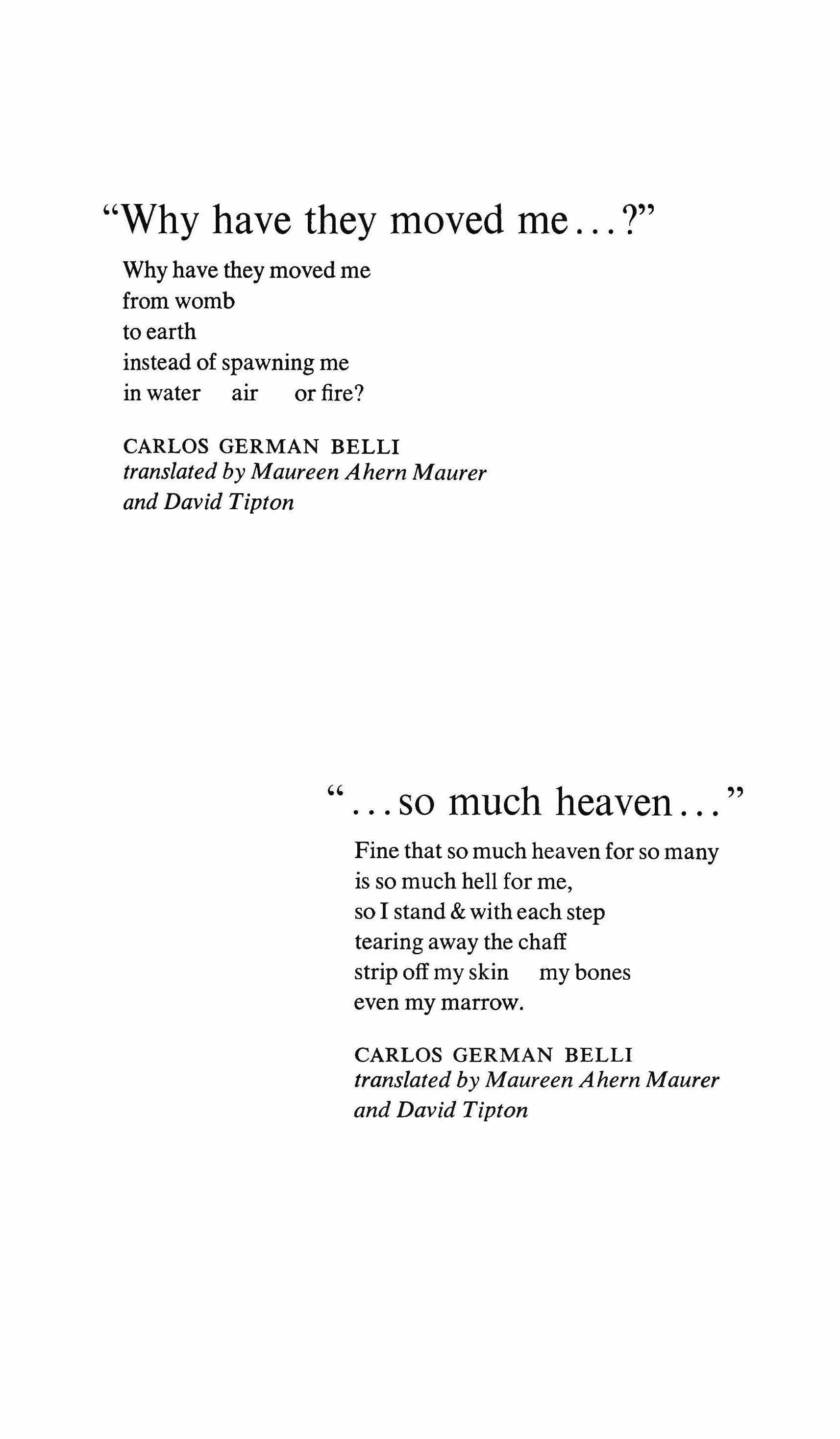
SO mue eaven
hh "
Fine that so much heaven for so many is so much hell for me, so I stand & with each step tearing away the chaff strip off my skin my bones even my marrow.
CARLOS GERMAN BELLI
translated by Maureen Ahern Maurer and David Tipton
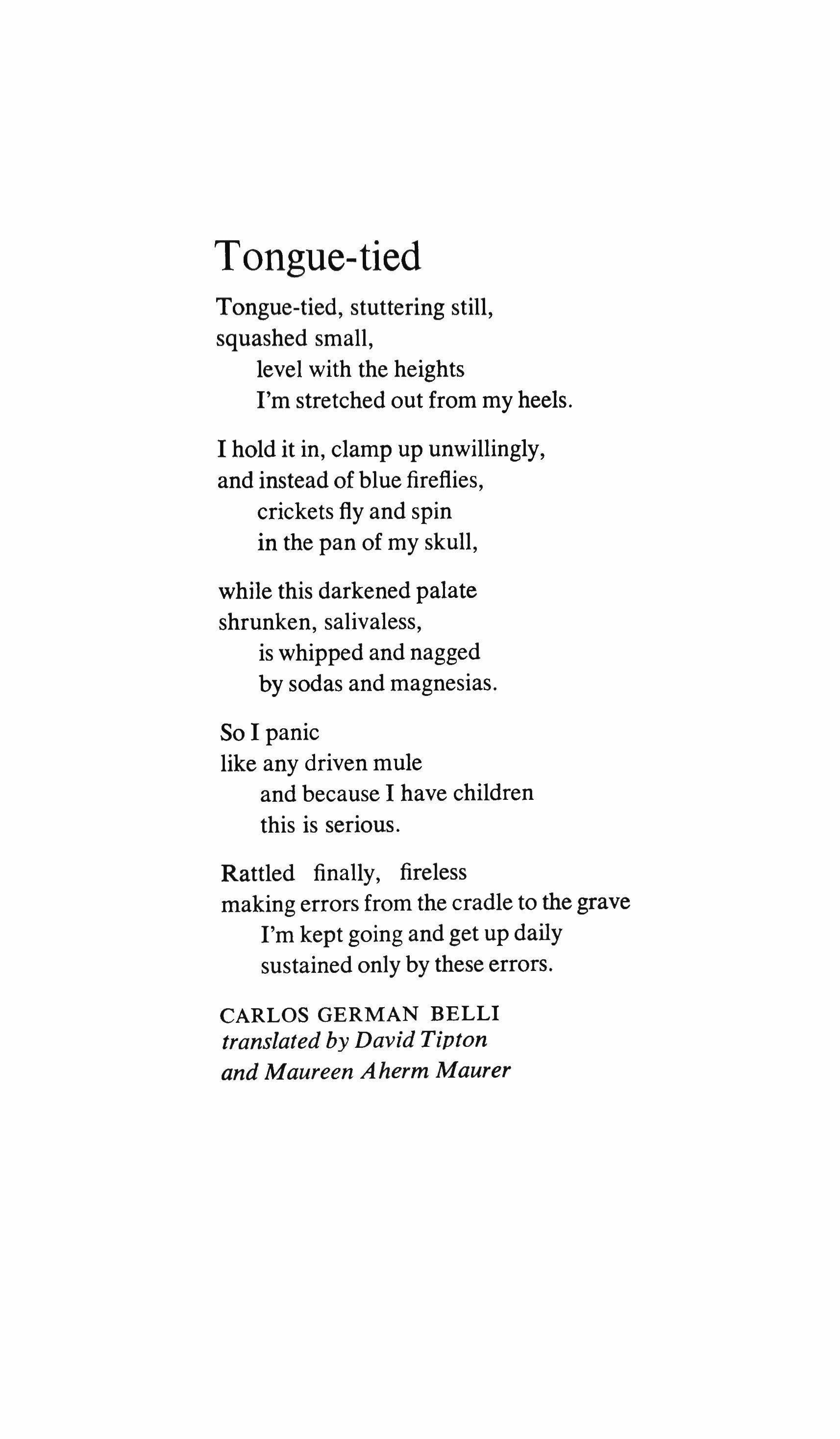
Tongue-tied, stuttering still, squashed small, level with the heights I'm stretched out from my heels.
I hold it in, clamp up unwillingly, and instead of blue fireflies, crickets fly and spin in the pan of my skull, while this darkened palate shrunken, salivaless, is whipped and nagged by sodas and magnesias.
So I panic like any driven mule and because I have children this is serious.
Rattled finally, fireless making errors from the cradle to the grave I'm kept going and get up daily sustained only by these errors.
CARLOSGERMAN BELLI translated by David Tipton and Maureen Aherm Maurer
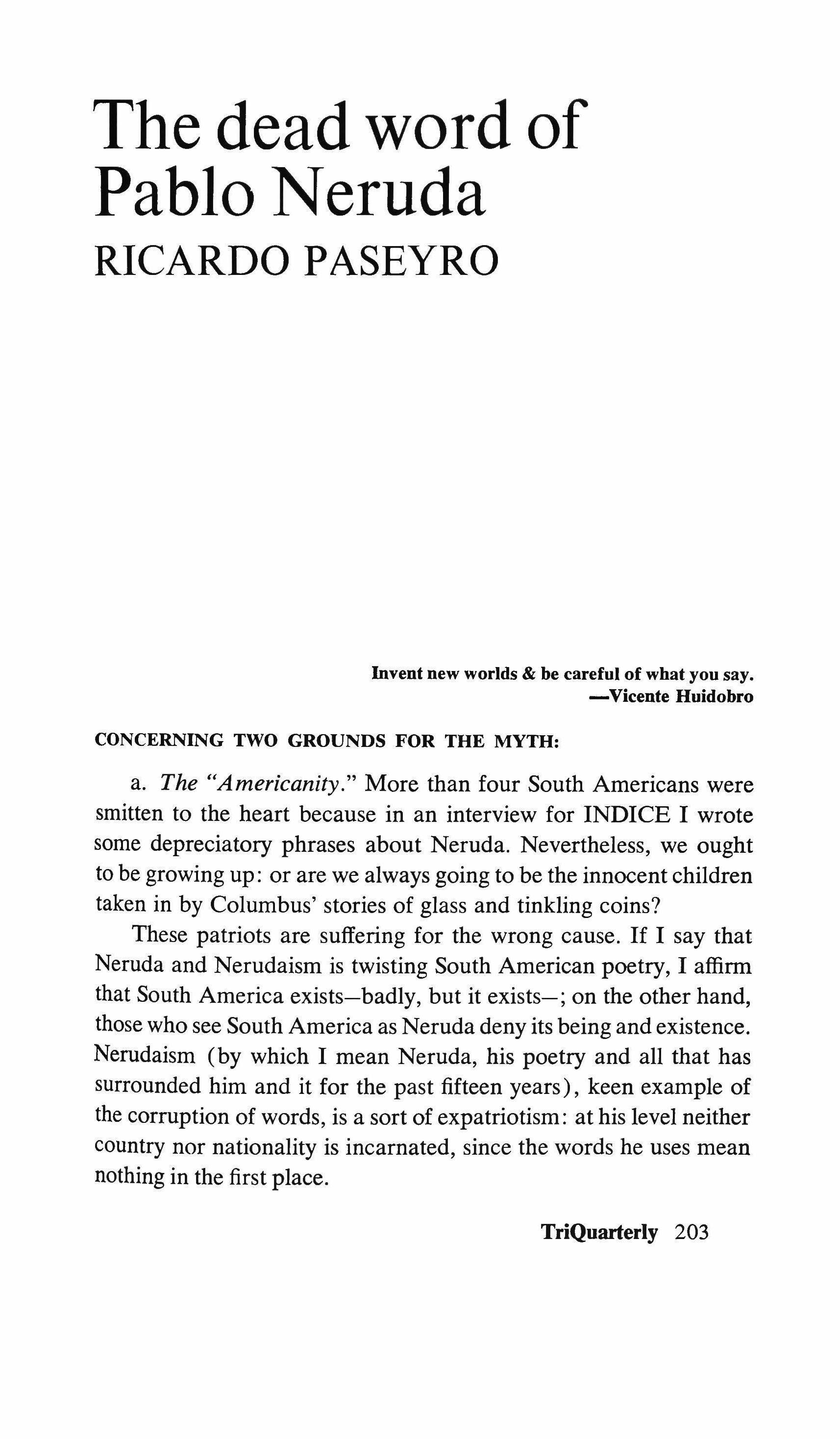
Invent new worlds & be careful of what you say. -Vicente Huidobro
a. The "Americanity," More than four South Americans were smitten to the heart because in an interview for INDICE I wrote some depreciatory phrases about Neruda. Nevertheless, we ought to be growing up: or are we always going to be the innocent children taken in by Columbus' stories of glass and tinkling coins? These patriots are suffering for the wrong cause. If I say that Neruda and Nerudaism is twisting South American poetry, I affirm that South America exists-badly, but it exists-; on the other hand, those who see South America as Neruda deny its being and existence. Nerudaism (by which I mean Neruda, his poetry and all that has surrounded him and it for the past fifteen years), keen example of the corruption of words, is a sort of expatriotism: at his level neither country nor nationality is incarnated, since the words he uses mean nothing in the first place.
TriQuarterJy 203
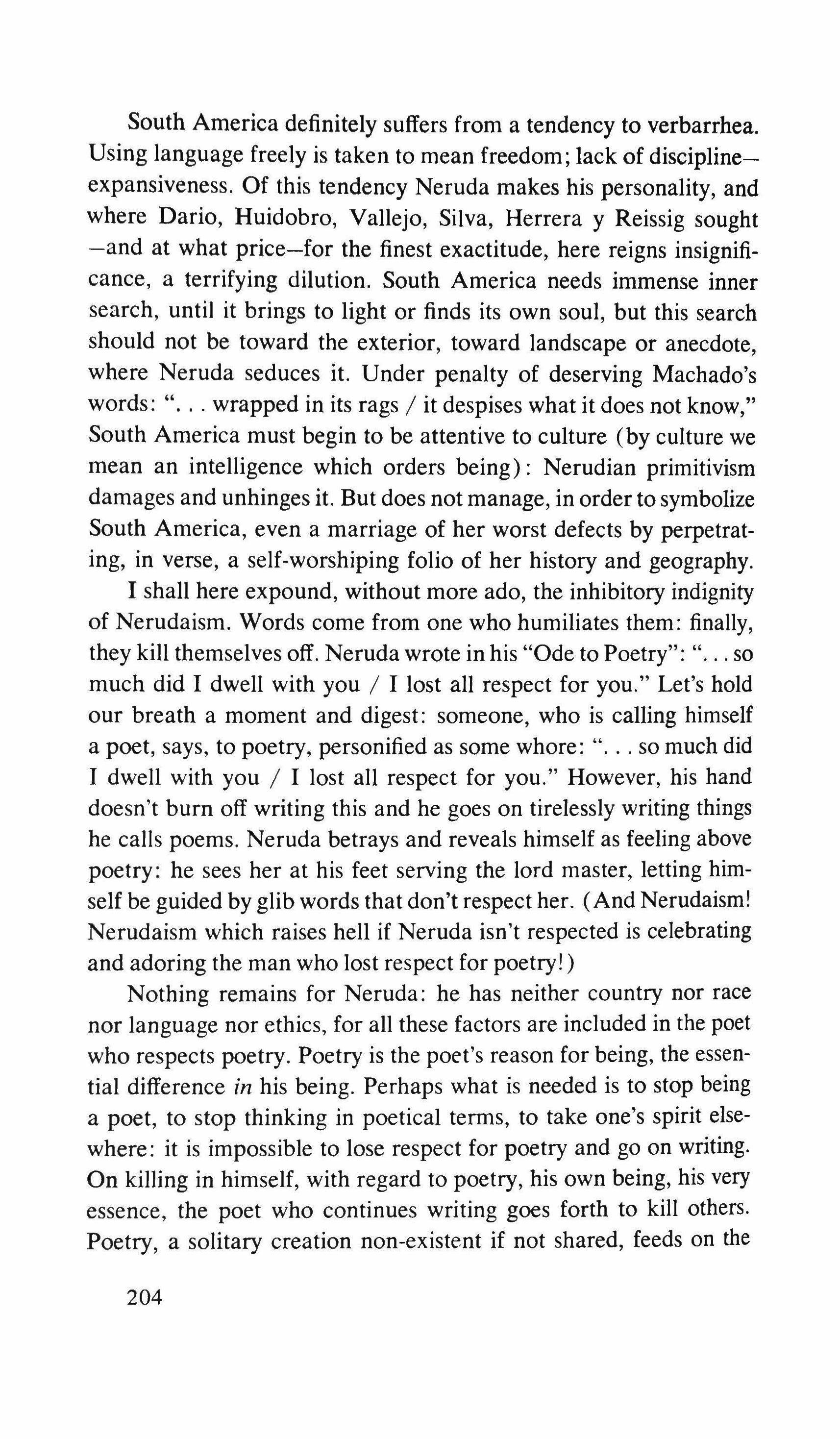
South America definitely suffers from a tendency to verbarrhea. Using language freely is taken to mean freedom; lack of disciplineexpansiveness. Of this tendency Neruda makes his personality, and where Dario, Huidobro, Vallejo, Silva, Herrera y Reissig sought -and at what price-for the finest exactitude, here reigns insignificance, a terrifying dilution. South America needs immense inner search, until it brings to light or finds its own soul, but this search should not be toward the exterior, toward landscape or anecdote, where Neruda seduces it. Under penalty of deserving Machado's words: " wrapped in its rags / it despises what it does not know," South America must begin to be attentive to culture (by culture we mean an intelligence which orders being): Nerudian primitivism damages and unhinges it. But does not manage, in order to symbolize South America, even a marriage of her worst defects by perpetrating, in verse, a self-worshiping folio of her history and geography. I shall here expound, without more ado, the inhibitory indignity of Nerudaism. Words come from one who humiliates them: finally, they kill themselves off. Neruda wrote in his "Ode to Poetry": so much did I dwell with you / I lost all respect for you." Let's hold our breath a moment and digest: someone, who is calling himself a poet, says, to poetry, personified as some whore: so much did I dwell with you / I lost all respect for you." However, his hand doesn't burn off writing this and he goes on tirelessly writing things he calls poems. Neruda betrays and reveals himself as feeling above poetry: he sees her at his feet serving the lord master, letting himself be guided by glib words that don't respect her. (And Nerudaism! Nerudaism which raises hell if Neruda isn't respected is celebrating and adoring the man who lost respect for poetry!)
Nothing remains for Neruda: he has neither country nor race nor language nor ethics, for all these factors are included in the poet who respects poetry. Poetry is the poet's reason for being, the essential difference in his being. Perhaps what is needed is to stop being a poet, to stop thinking in poetical terms, to take one's spirit elsewhere: it is impossible to lose respect for poetry and go on writing. On killing in himself, with regard to poetry, his own being, his very essence, the poet who continues writing goes forth to kill others. Poetry, a solitary creation non-existent if not shared, feeds on the
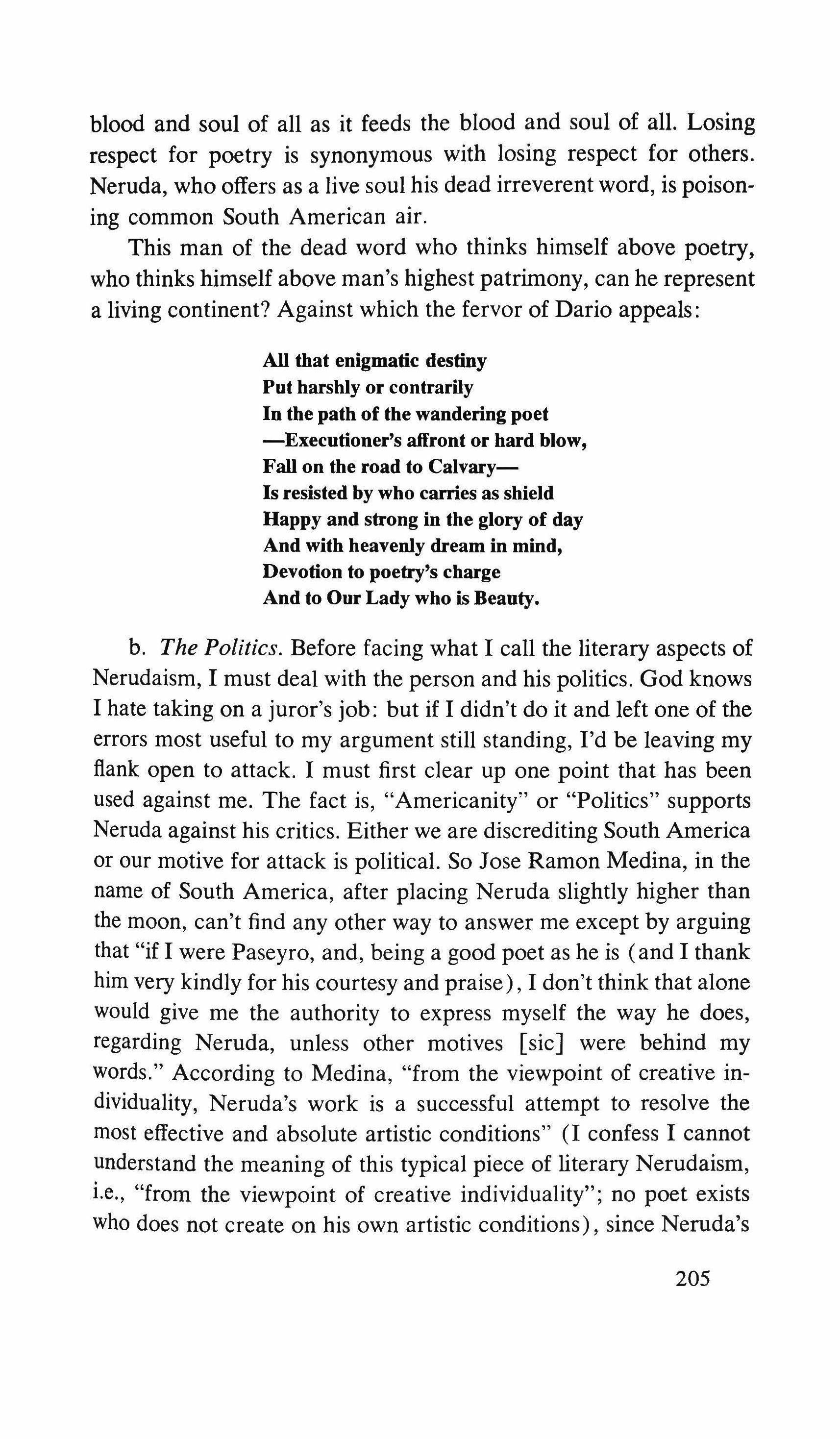
blood and soul of all as it feeds the blood and soul of all. Losing respect for poetry is synonymous with losing respect for others. Neruda, who offers as a live soul his dead irreverent word, is poisoning common South American air.
This man of the dead word who thinks himself above poetry, who thinks himself above man's highest patrimony, can he represent a living continent? Against which the fervor of Dario appeals:
All that enigmatic destiny Put harshly or contrarily
In the path of the wandering poet -Executioner's affront or hard blow, Fall on the road to CalvaryIs resisted by who carries as shield
Happy and strong in the glory of day And with heavenly dream in mind, Devotion to poetry's charge And to Our Lady who is Beauty.
b. The Politics. Before facing what I call the literary aspects of Nerudaism, I must deal with the person and his politics. God knows I hate taking on a juror's job: but if I didn't do it and left one of the errors most useful to my argument still standing, I'd be leaving my flank open to attack. I must first clear up one point that has been used against me. The fact is, "Americanity" or "Politics" supports Neruda against his critics. Either we are discrediting South America or our motive for attack is political. So Jose Ramon Medina, in the name of South America, after placing Neruda slightly higher than the moon, can't find any other way to answer me except by arguing that "if I were Paseyro, and, being a good poet as he is (and I thank him very kindly for his courtesy and praise), I don't think that alone would give me the authority to express myself the way he does, regarding Neruda, unless other motives [sic] were behind my words." According to Medina, "from the viewpoint of creative individuality, Neruda's work is a successful attempt to resolve the most effective and absolute artistic conditions" (I confess I cannot understand the meaning of this typical piece of literary Nerudaism, i.e., "from the viewpoint of creative individuality"; no poet exists who does not create on his own artistic conditions), since Neruda's
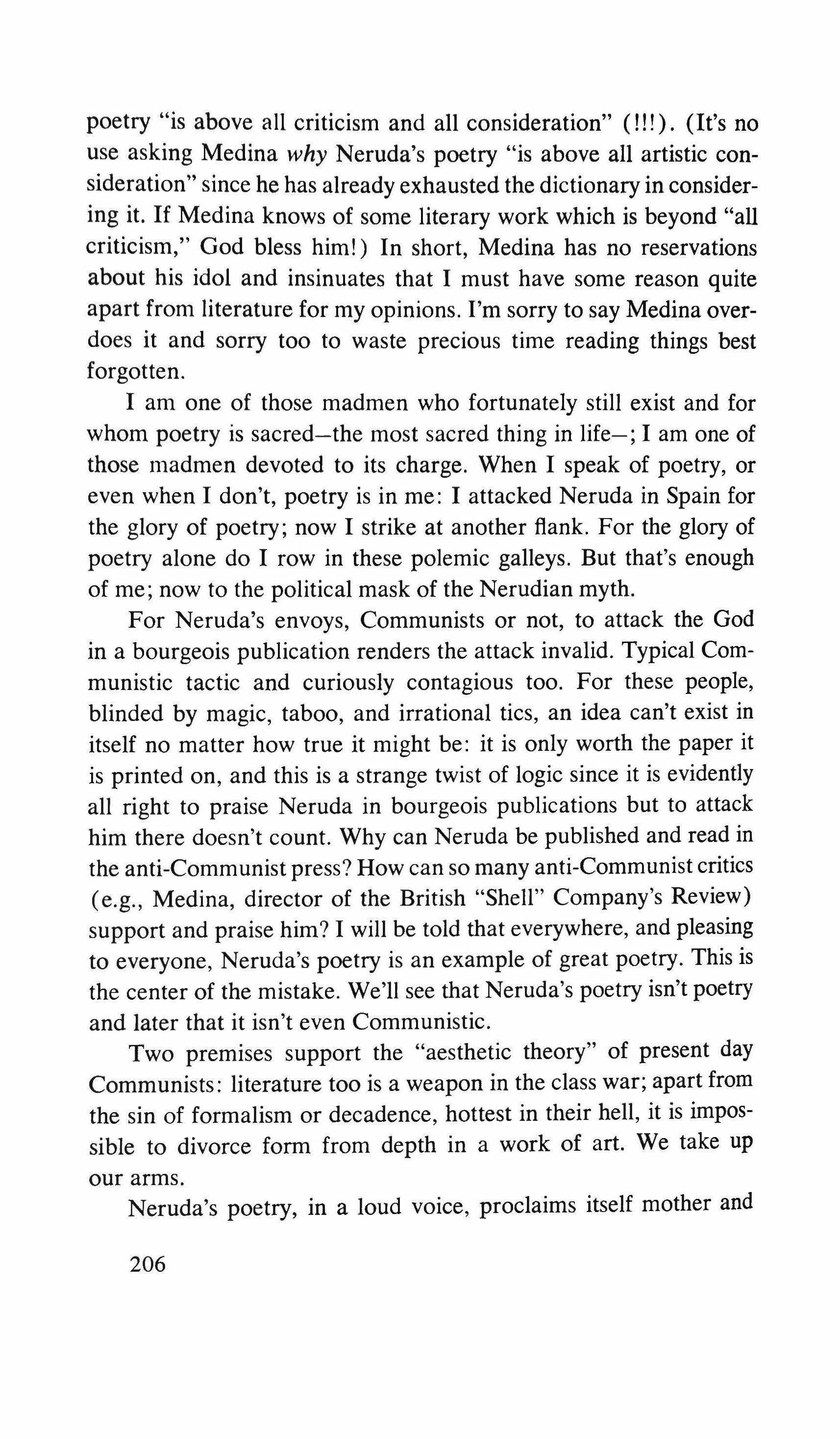
poetry "is above all criticism and all consideration" (!!!). (It's no use asking Medina why Neruda's poetry "is above all artistic consideration" since he has already exhausted the dictionary in considering it. If Medina knows of some literary work which is beyond "all criticism," God bless him! ) In short, Medina has no reservations about his idol and insinuates that I must have some reason quite apart from literature for my opinions. I'm sorry to say Medina overdoes it and sorry too to waste precious time reading things best forgotten.
I am one of those madmen who fortunately still exist and for whom poetry is sacred-the most sacred thing in life-; I am one of those madmen devoted to its charge. When I speak of poetry, or even when I don't, poetry is in me: I attacked Neruda in Spain for the glory of poetry; now I strike at another flank. For the glory of poetry alone do I row in these polemic galleys. But that's enough of me; now to the political mask of the Nerudian myth.
For Neruda's envoys, Communists or not, to attack the God in a bourgeois publication renders the attack invalid. Typical Communistic tactic and curiously contagious too. For these people, blinded by magic, taboo, and irrational tics, an idea can't exist in itself no matter how true it might be: it is only worth the paper it is printed on, and this is a strange twist of logic since it is evidently all right to praise Neruda in bourgeois publications but to attack him there doesn't count. Why can Neruda be published and read in the anti-Communist press? How can so many anti-Communist critics (e.g., Medina, director of the British "Shell" Company's Review) support and praise him? I will be told that everywhere, and pleasing to everyone, Neruda's poetry is an example of great poetry. This is the center of the mistake. We'll see that Neruda's poetry isn't poetry and later that it isn't even Communistic.
Two premises support the "aesthetic theory" of present day Communists: literature too is a weapon in the class war; apart from the sin of formalism or decadence, hottest in their hell, it is impossible to divorce form from depth in a work of art. We take up our arms.
Neruda's poetry, in a loud voice, proclaims itself mother and 206
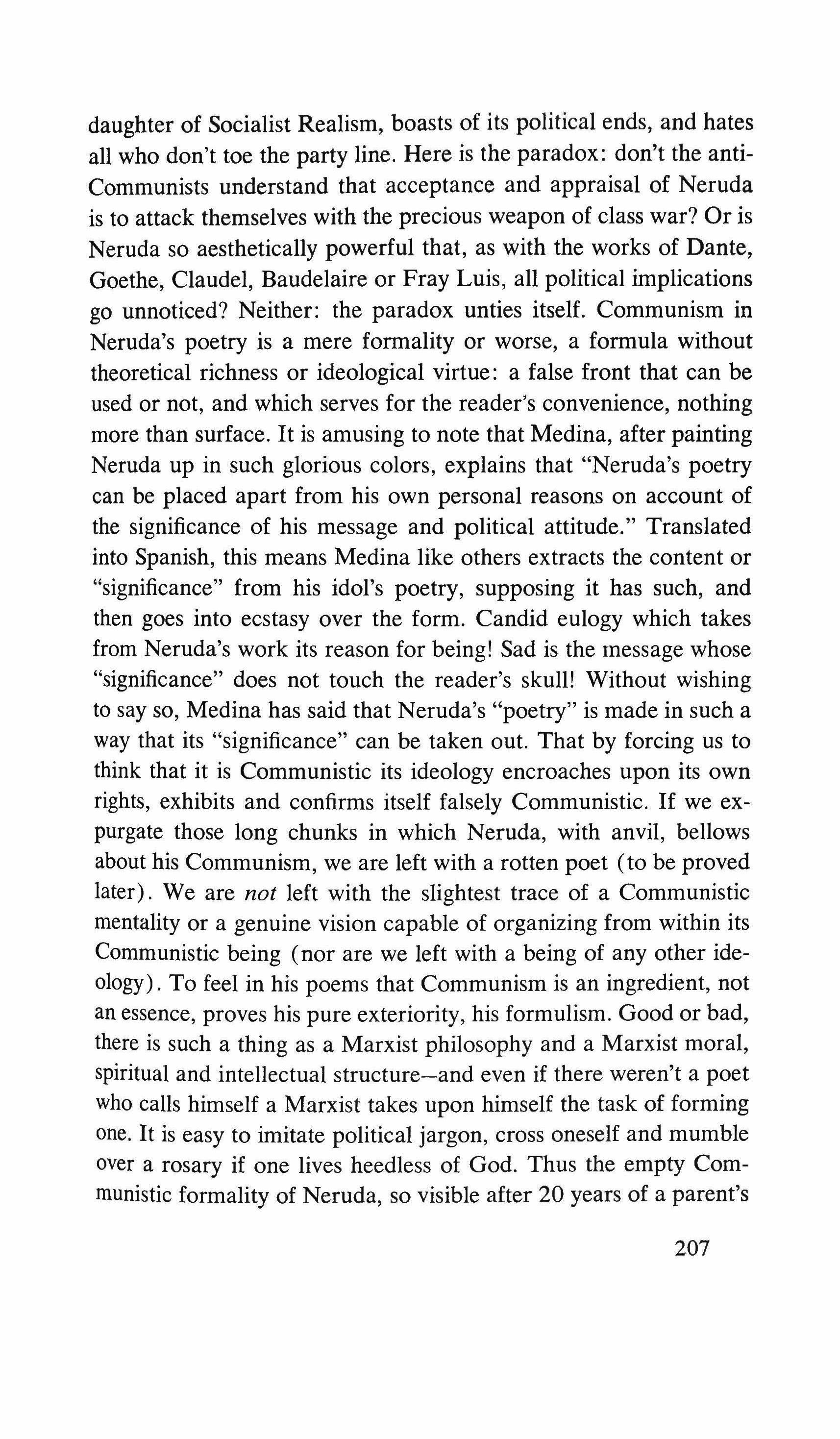
daughter of Socialist Realism, boasts of its political ends, and hates all who don't toe the party line. Here is the paradox: don't the antiCommunists understand that acceptance and appraisal of Neruda is to attack themselves with the precious weapon of class war? Or is Neruda so aesthetically powerful that, as with the works of Dante, Goethe, Claudel, Baudelaire or Fray Luis, all political implications go unnoticed? Neither: the paradox unties itself. Communism in Neruda's poetry is a mere formality or worse, a formula without theoretical richness or ideological virtue: a false front that can be used or not, and which serves for the reader's convenience, nothing more than surface. It is amusing to note that Medina, after painting Neruda up in such glorious colors, explains that "Neruda's poetry can be placed apart from his own personal reasons on account of the significance of his message and political attitude." Translated into Spanish, this means Medina like others extracts the content or "significance" from his idol's poetry, supposing it has such, and then goes into ecstasy over the form. Candid eulogy which takes from Neruda's work its reason for being! Sad is the message whose "significance" does not touch the reader's skull! Without wishing to say so, Medina has said that Neruda's "poetry" is made in such a way that its "significance" can be taken out. That by forcing us to think that it is Communistic its ideology encroaches upon its own rights, exhibits and confirms itself falsely Communistic. If we expurgate those long chunks in which Neruda, with anvil, bellows about his Communism, we are left with a rotten poet (to be proved later). We are not left with the slightest trace of a Communistic mentality or a genuine vision capable of organizing from within its Communistic being (nor are we left with a being of any other ideology). To feel in his poems that Communism is an ingredient, not an essence, proves his pure exteriority, his formulism. Good or bad, there is such a thing as a Marxist philosophy and a Marxist moral, spiritual and intellectual structure-and even if there weren't a poet who calls himself a Marxist takes upon himself the task of forming one. It is easy to imitate political jargon, cross oneself and mumble over a rosary if one lives heedless of God. Thus the empty Communistic formality of Neruda, so visible after 20 years of a parent's
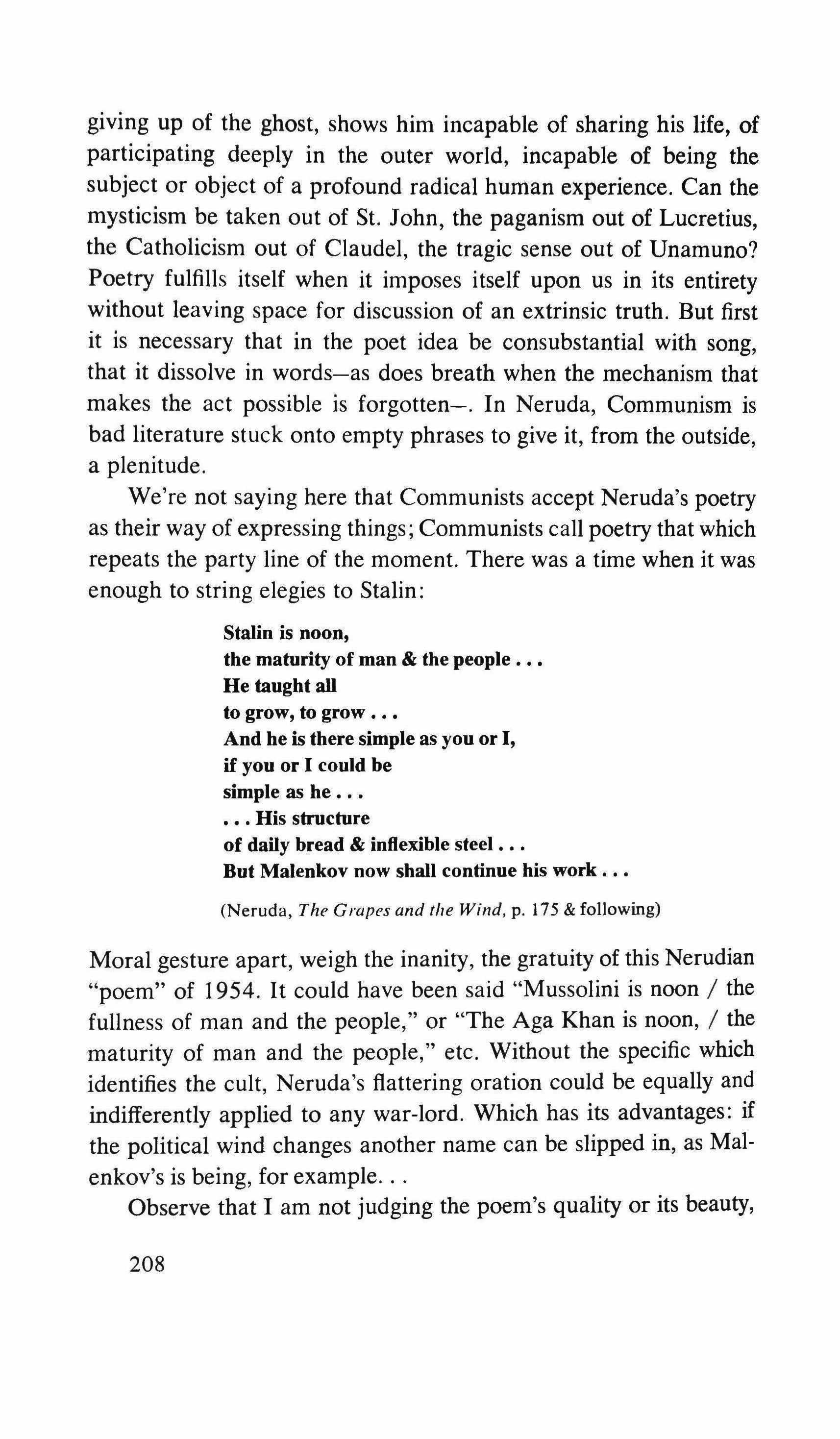
giving up of the ghost, shows him incapable of sharing his life, of participating deeply in the outer world, incapable of being the subject or object of a profound radical human experience. Can the mysticism be taken out of St. John, the paganism out of Lucretius, the Catholicism out of Claudel, the tragic sense out of Unamuno? Poetry fulfills itself when it imposes itself upon us in its entirety without leaving space for discussion of an extrinsic truth. But first it is necessary that in the poet idea be consubstantial with song, that it dissolve in words-as does breath when the mechanism that makes the act possible is forgotten-. In Neruda, Communism is bad literature stuck onto empty phrases to give it, from the outside, a plenitude.
We're not saying here that Communists accept Neruda's poetry as their way of expressing things; Communists call poetry that which repeats the party line of the moment. There was a time when it was enough to string elegies to Stalin:
Stalin is noon, the maturity of man & the people He taught all to grow, to grow And he is there simple as you or I, if you or I could be simple as he His structure of daily bread & inflexible steel
But Malenkov now shall continue his work
(Neruda, The Grapes and the Wind, p. 175 & following)
Moral gesture apart, weigh the inanity, the gratuity of this Nerudian "poem" of 1954. It could have been said "Mussolini is noon / the fullness of man and the people," or "The Aga Khan is noon, / the maturity of man and the people," etc. Without the specific which identifies the cult, Neruda's flattering oration could be equally and indifferently applied to any war-lord. Which has its advantages: if the political wind changes another name can be slipped in, as Malenkov's is being, for example
Observe that I am not judging the poem's quality or its beauty,
208
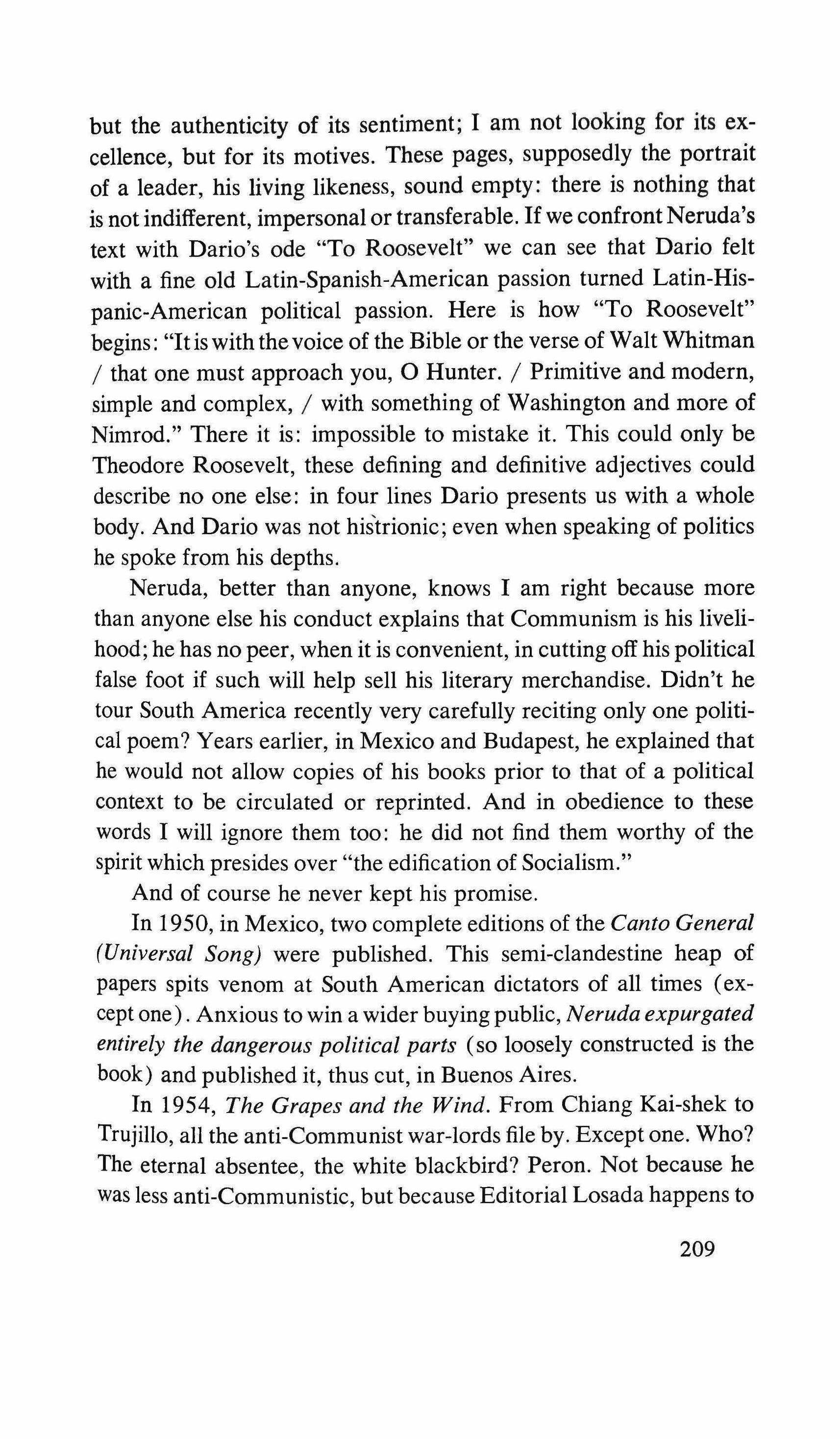
but the authenticity of its sentiment; I am not looking for its excellence, but for its motives. These pages, supposedly the portrait of a leader, his living likeness, sound empty: there is nothing that is not indifferent, impersonal or transferable. If we confront Neruda's text with Dario's ode "To Roosevelt" we can see that Dario felt with a fine old Latin-Spanish-American passion turned Latin-Hispanic-American political passion. Here is how "To Roosevelt" begins: "It is with thevoice of the Bible or the verse of Walt Whitman / that one must approach you, 0 Hunter. / Primitive and modern, simple and complex, / with something of Washington and more of Nimrod." There it is: impossible to mistake it. This could only be Theodore Roosevelt, these defining and definitive adjectives could describe no one else: in four lines Dario presents us with a whole body. And Dario was not histrionic; even when speaking of politics he spoke from his depths.
Neruda, better than anyone, knows I am right because more than anyone else his conduct explains that Communism is his livelihood; he has no peer, when it is convenient, in cutting off his political false foot if such will help sell his literary merchandise. Didn't he tour South America recently very carefully reciting only one political poem? Years earlier, in Mexico and Budapest, he explained that he would not allow copies of his books prior to that of a political context to be circulated or reprinted. And in obedience to these words I will ignore them too: he did not find them worthy of the spirit which presides over "the edification of Socialism."
And of course he never kept his promise.
In 1950, in Mexico, two complete editions of the Canto General (Universal Song) were published. This semi-clandestine heap of papers spits venom at South American dictators of all times (except one). Anxious to win a wider buying public, Neruda expurgated entirely the dangerous political parts (so loosely constructed is the book) and published it, thus cut, in Buenos Aires.
In 1954, The Grapes and the Wind. From Chiang Kai-shek to Trujillo, all the anti-Communist war-lords file by. Except one. Who? The eternal absentee, the white blackbird? Peron. Not because he was less anti-Communistic, but because Editorial Losada happens to 209
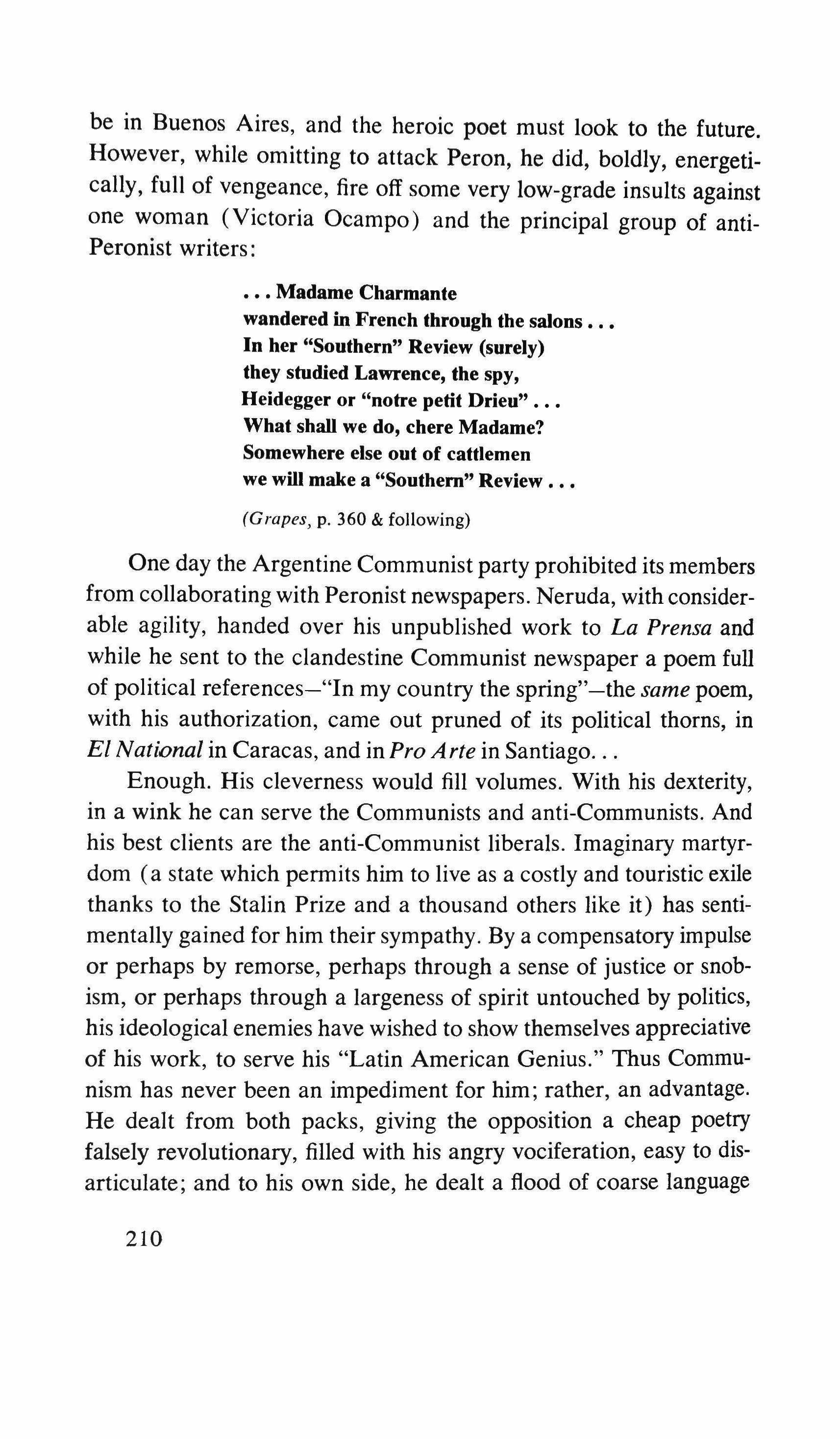
be in Buenos Aires, and the heroic poet must look to the future. However, while omitting to attack Peron, he did, boldly, energetically, full of vengeance, fire off some very low-grade insults against one woman (Victoria Ocampo) and the principal group of antiPeronist writers:
Madame Charmante
wandered in French through the salons In her "Southern" Review (surely) they studied Lawrence, the spy, Heidegger or "notre petit Drieu" What shall we do, chere Madame? Somewhere else out of cattlemen we will make a "Southern" Review
(Grapes, p. 360 & following)
One day the Argentine Communist party prohibited its members from collaborating with Peronist newspapers. Neruda, with considerable agility, handed over his unpublished work to La Prensa and while he sent to the clandestine Communist newspaper a poem full of political references-"In my country the spring"-the same poem, with his authorization, came out pruned of its political thorns, in El National in Caracas, and in Pro Arte in Santiago Enough. His cleverness would fill volumes. With his dexterity, in a wink he can serve the Communists and anti-Communists. And his best clients are the anti-Communist liberals. Imaginary martyrdom (a state which permits him to live as a costly and touristic exile thanks to the Stalin Prize and a thousand others like it) has sentimentally gained for him their sympathy. Bya compensatory impulse or perhaps by remorse, perhaps through a sense of justice or snobism, or perhaps through a largeness of spirit untouched by politics, his ideological enemies have wished to show themselves appreciative of his work, to serve his "Latin American Genius." Thus Communism has never been an impediment for him; rather, an advantage. He dealt from both packs, giving the opposition a cheap poetry falsely revolutionary, filled with his angry vociferation, easy to disarticulate; and to his own side, he dealt a flood of coarse language
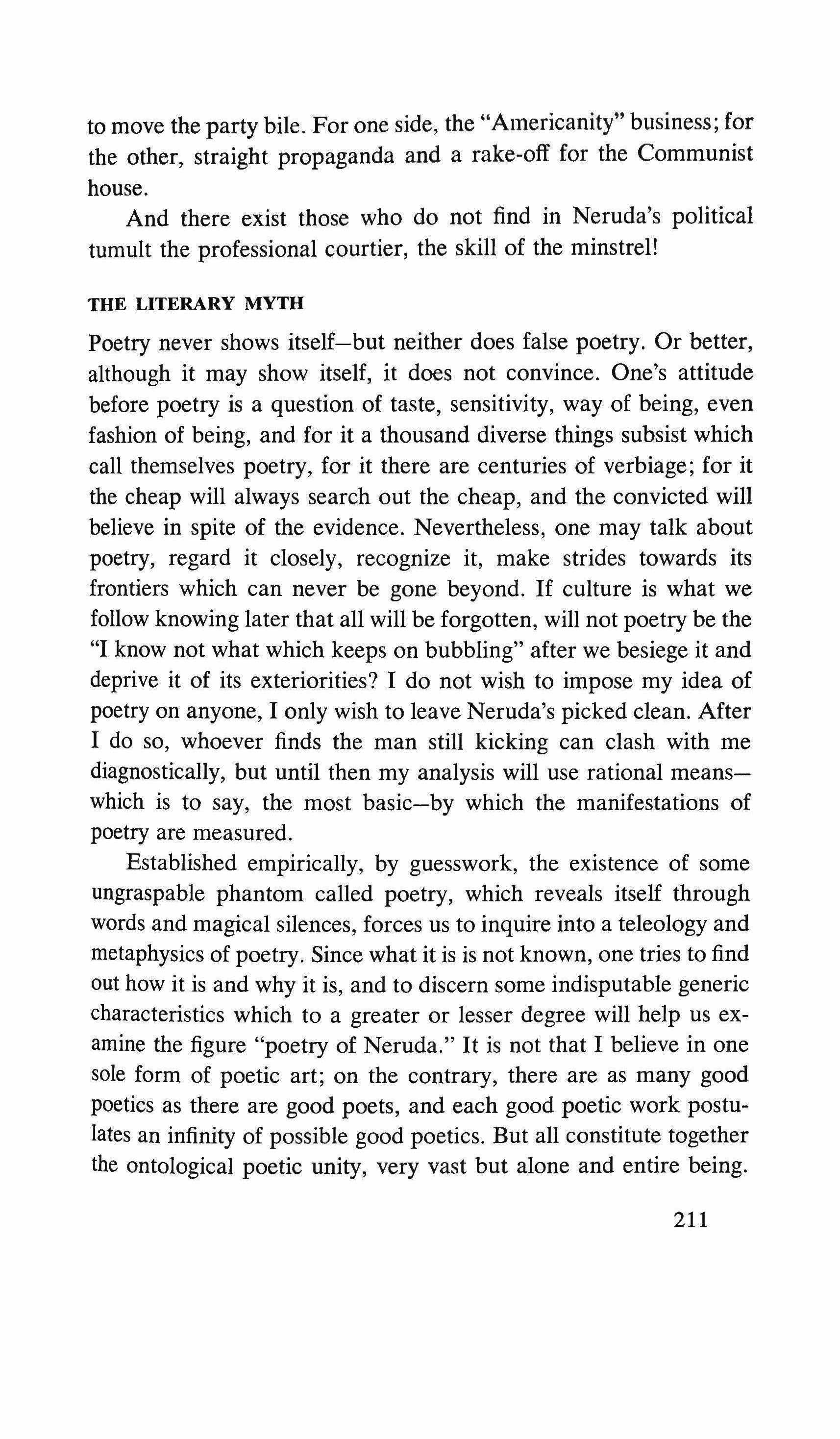
to move the party bile. For one side, the "Americanity" business; for the other, straight propaganda and a rake-off for the Communist house.
And there exist those who do not find in Neruda's political tumult the professional courtier, the skill of the minstrel!
Poetry never shows itself-but neither does false poetry. Or better, although it may show itself, it does not convince. One's attitude before poetry is a question of taste, sensitivity, way of being, even fashion of being, and for it a thousand diverse things subsist which call themselves poetry, for it there are centuries of verbiage; for it the cheap will always search out the cheap, and the convicted will believe in spite of the evidence. Nevertheless, one may talk about poetry, regard it closely, recognize it, make strides towards its frontiers which can never be gone beyond. If culture is what we follow knowing later that all will be forgotten, will not poetry be the "I know not what which keeps on bubbling" after we besiege it and deprive it of its exteriorities? 1 do not wish to impose my idea of poetry on anyone, 1 only wish to leave Neruda's picked clean. After 1 do so, whoever finds the man still kicking can clash with me diagnostically, but until then my analysis will use rational meanswhich is to say, the most basic-by which the manifestations of poetry are measured.
Established empirically, by guesswork, the existence of some ungraspable phantom called poetry, which reveals itself through words and magical silences, forces us to inquire into a teleology and metaphysics of poetry. Since what it is is not known, one tries to find out how it is and why it is, and to discern some indisputable generic characteristics which to a greater or lesser degree will help us examine the figure "poetry of Neruda." It is not that 1 believe in one sale form of poetic art; on the contrary, there are as many good poetics as there are good poets, and each good poetic work postulates an infinity of possible good poetics. But all constitute together the ontological poetic unity, very vast but alone and entire being.
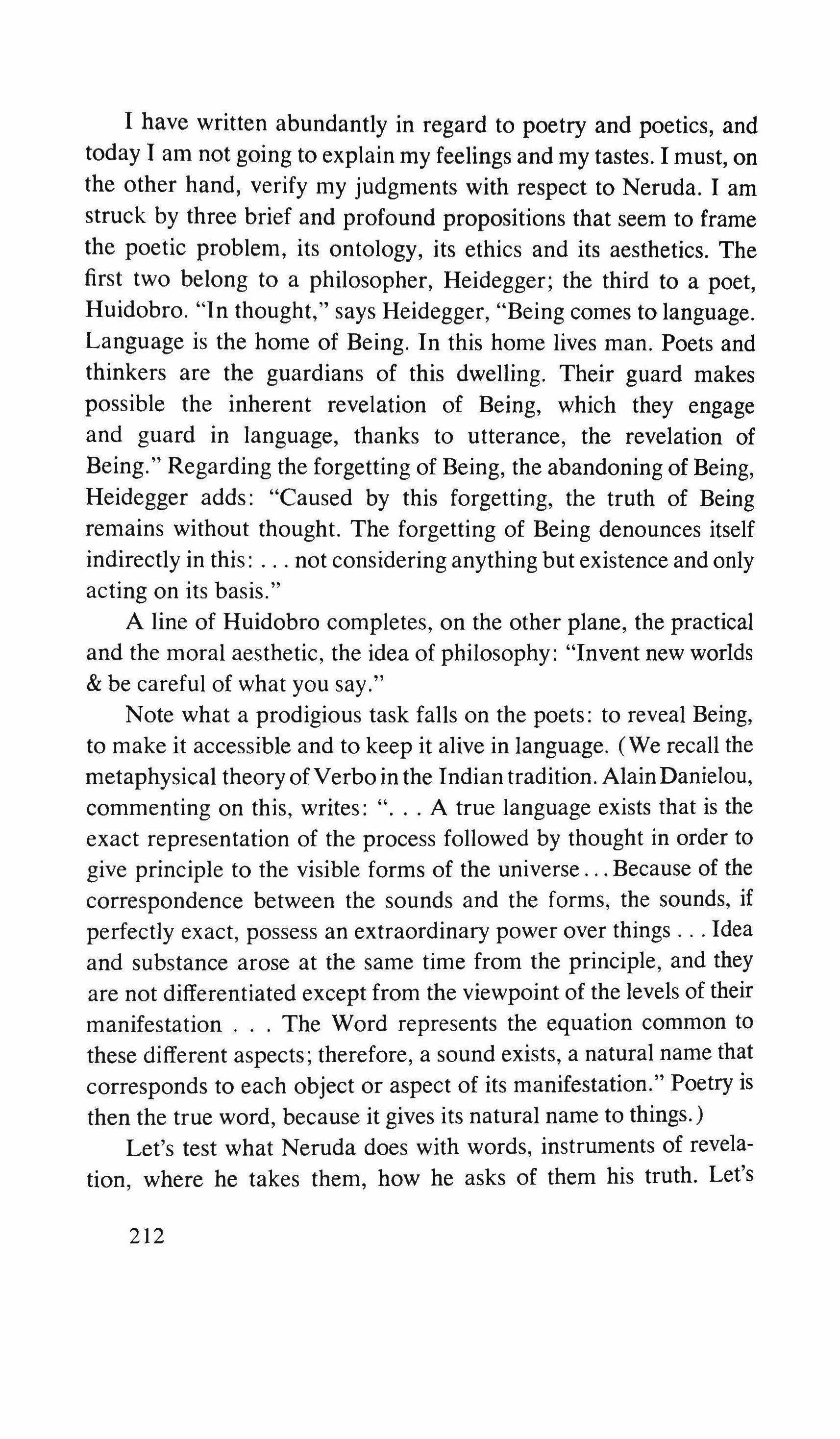
I have written abundantly in regard to poetry and poetics, and today I am not going to explain my feelings and my tastes. I must, on the other hand, verify my judgments with respect to Neruda. I am struck by three brief and profound propositions that seem to frame the poetic problem, its ontology, its ethics and its aesthetics. The first two belong to a philosopher, Heidegger; the third to a poet, Huidobro. "In thought," says Heidegger, "Being comes to language. Language is the home of Being. In this home lives man. Poets and thinkers are the guardians of this dwelling. Their guard makes possible the inherent revelation of Being, which they engage and guard in language, thanks to utterance, the revelation of Being." Regarding the forgetting of Being, the abandoning of Being, Heidegger adds: "Caused by this forgetting, the truth of Being remains without thought. The forgetting of Being denounces itself indirectly in this: not considering anything but existence and only acting on its basis."
A line of Huidobro completes, on the other plane, the practical and the moral aesthetic, the idea of philosophy: "Invent new worlds & be careful of what you say."
Note what a prodigious task falls on the poets: to reveal Being, to make it accessible and to keep it alive in language. (We recall the metaphysical theory ofVerbo in the Indian tradition. AlainDanielou, commenting on this, writes: A true language exists that is the exact representation of the process followed by thought in order to give principle to the visible forms of the universe Because of the correspondence between the sounds and the forms, the sounds, if perfectly exact, possess an extraordinary power over things Idea and substance arose at the same time from the principle, and they are not differentiated except from the viewpoint of the levels of their manifestation The Word represents the equation common to these different aspects; therefore, a sound exists, a natural name that corresponds to each object or aspect of its manifestation." Poetry is then the true word, because it gives its natural name to things.)
Let's test what Neruda does with words, instruments of revelation, where he takes them, how he asks of them his truth. Let's
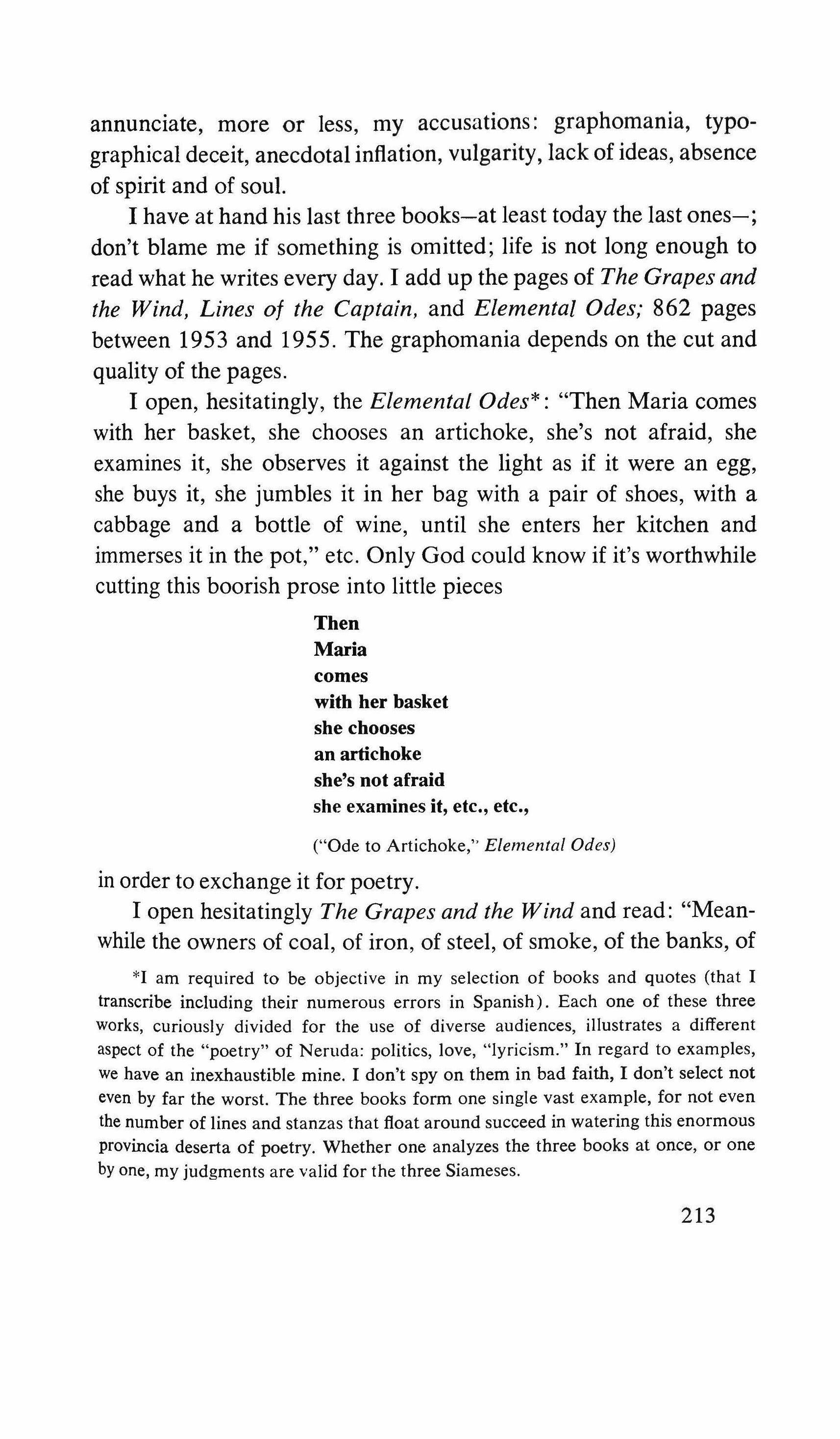
annunciate, more or less, my accusations: graphomania, typographical deceit, anecdotal inflation, vulgarity, lack of ideas, absence of spirit and of soul.
I have at hand his last three books-at least today the last ones-; don't blame me if something is omitted; life is not long enough to read what he writes every day. I add up the pages of The Grapes and the Wind, Lines of the Captain, and Elemental Odes; 862 pages between 1953 and 1955. The graphomania depends on the cut and quality of the pages.
I open, hesitatingly, the Elemental Odes*: "Then Maria comes with her basket, she chooses an artichoke, she's not afraid, she examines it, she observes it against the light as if it were an egg, she buys it, she jumbles it in her bag with a pair of shoes, with a cabbage and a bottle of wine, until she enters her kitchen and immerses it in the pot," etc. Only God could know if it's worthwhile cutting this boorish prose into little pieces
Then Maria comes with her basket she chooses an articboke she's not afraid she examines it, etc., etc.,
("Ode to Artichoke," Elemental Odes) in order to exchange it for poetry.
I open hesitatingly The Grapes and the Wind and read: "Meanwhile the owners of coal, of iron, of steel, of smoke, of the banks, of
*1 am required to be objective in my selection of books and quotes (that 1 transcribe including their numerous errors in Spanish). Each one of these three works, curiously divided for the use of diverse audiences, illustrates a different aspect of the "poetry" of Neruda: politics, love, "lyricism." In regard to examples, we have an inexhaustible mine. I don't spy on them in bad faith, I don't select not even by far the worst. The three books form one single vast example, for not even the number of lines and stanzas that float around succeed in watering this enormous provincia deserta of poetry. Whether one analyzes the three books at once, or one by one, my judgments are valid for the three Siameses.
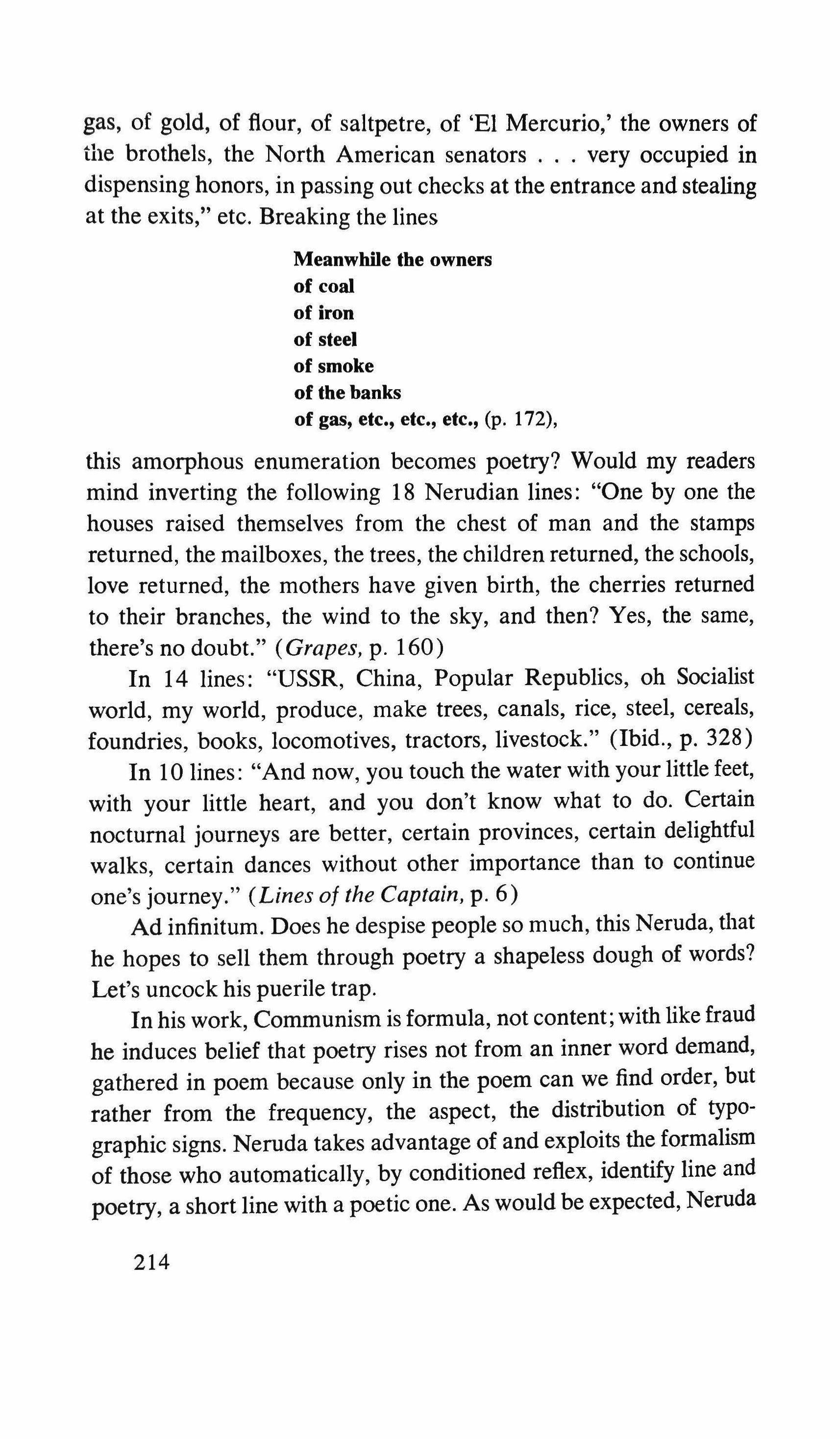
gas, of gold, of flour, of saltpetre, of 'EI Mercurio,' the owners of the brothels, the North American senators very occupied in dispensing honors, in passing out checks at the entrance and stealing at the exits," etc. Breaking the lines
Meanwhile the owners of coal of iron of steel of smoke of the banks of gas, etc., etc., etc., (p. 172), this amorphous enumeration becomes poetry? Would my readers mind inverting the following 18 Nerudian lines: "One by one the houses raised themselves from the chest of man and the stamps returned, the mailboxes, the trees, the children returned, the schools, love returned, the mothers have given birth, the cherries returned to their branches, the wind to the sky, and then? Yes, the same, there's no doubt." (Grapes, p. 160)
In 14 lines: "USSR, China, Popular Republics, oh Socialist world, my world, produce, make trees, canals, rice, steel, cereals, foundries, books, locomotives, tractors, livestock." (Ibid., p. 328)
In 10 lines: "And now, you touch the water with your little feet, with your little heart, and you don't know what to do. Certain nocturnal journeys are better, certain provinces, certain delightful walks, certain dances without other importance than to continue one's journey." (Lines of the Captain, p. 6)
Ad infinitum. Does he despise people so much, this Neruda, that he hopes to sell them through poetry a shapeless dough of words? Let's uncock his puerile trap.
In his work, Communism is formula, not content; with like fraud he induces belief that poetry rises not from an inner word demand, gathered in poem because only in the poem can we find order, but rather from the frequency, the aspect, the distribution of typographic signs. Neruda takes advantage of and exploits the formalism of those who automatically, by conditioned reflex, identify line and poetry, a short line with a poetic one. As would be expected, Neruda
moves from without within; thanks to an industrious technique forced on like a vest, he tries to mask a poetic content with poetry. Technique? I exaggerate. Neruda has lost all notion of metrics, of prosody, of aesthetics, of the line, of musicality; I reproach him for something worse than simply being prosaic; no longer does he know how to make a line even prose-like; he fails to add anything even vaguely theoretical or inventive to literary art. The system of short lines in which his most recent books are articulated (old trick the Futurists were practicing before 1914) is a feat of ill-sounding penmanship; his texts are illegible as poetry as well as prose. If the typographical break does not mark a cesura or does not act in the service of a fixed form, it is simply crude artifice. How are we to read:
Here come the farmers they bring for the poet a hen, only a poor hen. What are you going to give them, you, what are you going to give them? Now,now, the thread, the thread, etc., etc.
("Ode to Thread")
Or:
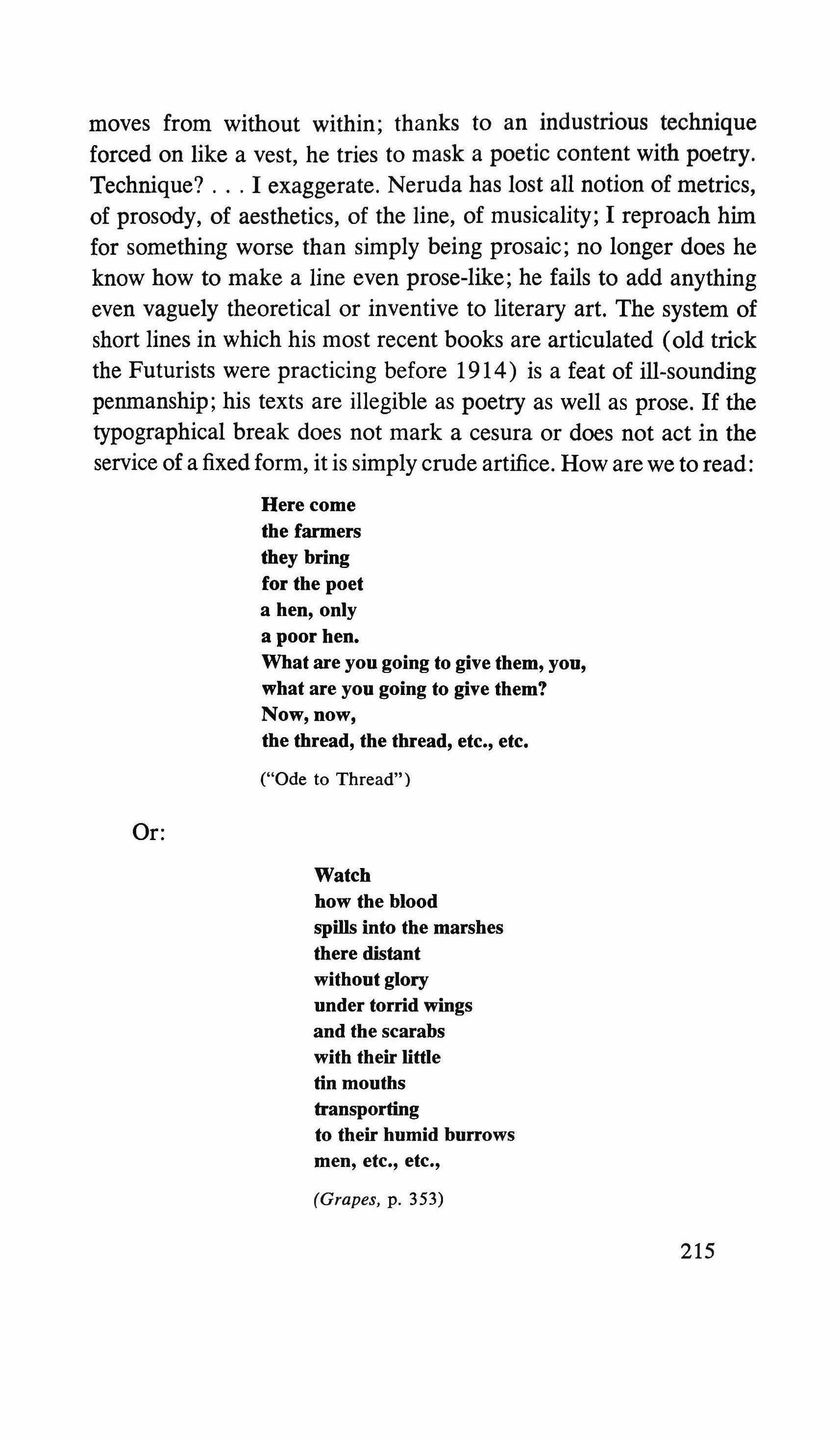
Watch how the blood spills into the marshes there distant without glory under torrid wings and the scarabs with their little tin mouths transporting to their humid burrows men, etc., etc.,
(Grapes, p. 353)
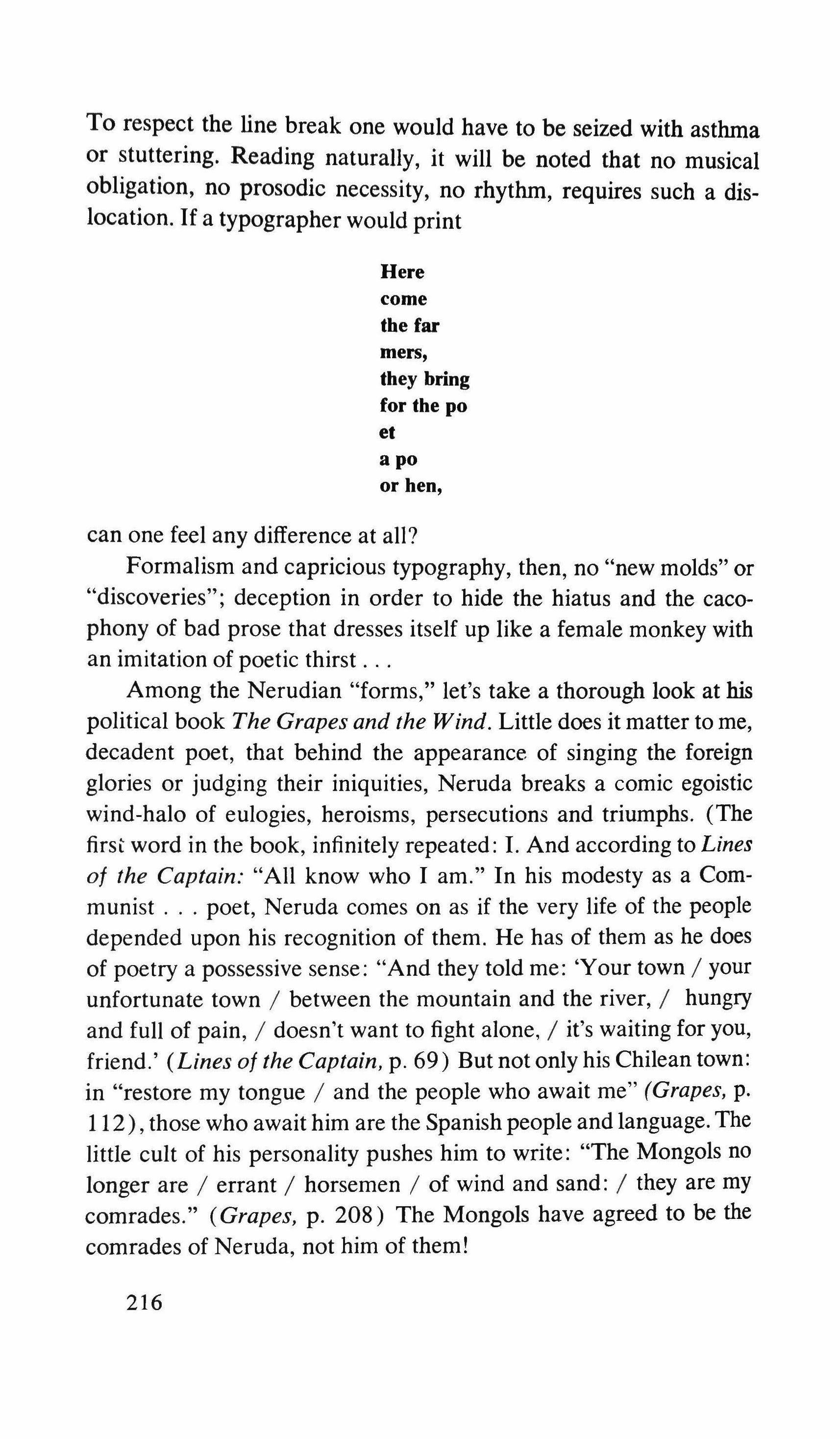
To respect the line break one would have to be seized with asthma or stuttering. Reading naturally, it will be noted that no musical obligation, no prosodic necessity, no rhythm, requires such a dislocation. If a typographer would print
Here come the far mers, they bring for the po et apo or hen, can one feel any difference at all?
Formalism and capricious typography, then, no "new molds" or "discoveries"; deception in order to hide the hiatus and the cacophony of bad prose that dresses itself up like a female monkey with an imitation of poetic thirst
Among the Nerudian "forms," let's take a thorough look at his political book The Grapes and the Wind. Little does it matter to me, decadent poet, that behind the appearance of singing the foreign glories or judging their iniquities, Neruda breaks a comic egoistic wind-halo of eulogies, heroisms, persecutions and triumphs. (The first word in the book, infinitely repeated: I. And according to Lines of the Captain: "All know who I am." In his modesty as a Communist poet, Neruda comes on as if the very life of the people depended upon his recognition of them. He has of them as he does of poetry a possessive sense: "And they told me: 'Your town / your unfortunate town / between the mountain and the river, / hungry and full of pain, / doesn't want to fight alone, / it's waiting for you, friend.' (Lines of the Captain, p. 69) But not only his Chilean town: in "restore my tongue / and the people who await me" (Grapes, p. 112), those who await him are the Spanishpeople and language. The little cult of his personality pushes him to write: "The Mongols no longer are / errant / horsemen I of wind and sand: / they are my comrades." (Grapes, p. 208) The Mongols have agreed to be the comrades of Neruda, not him of them!
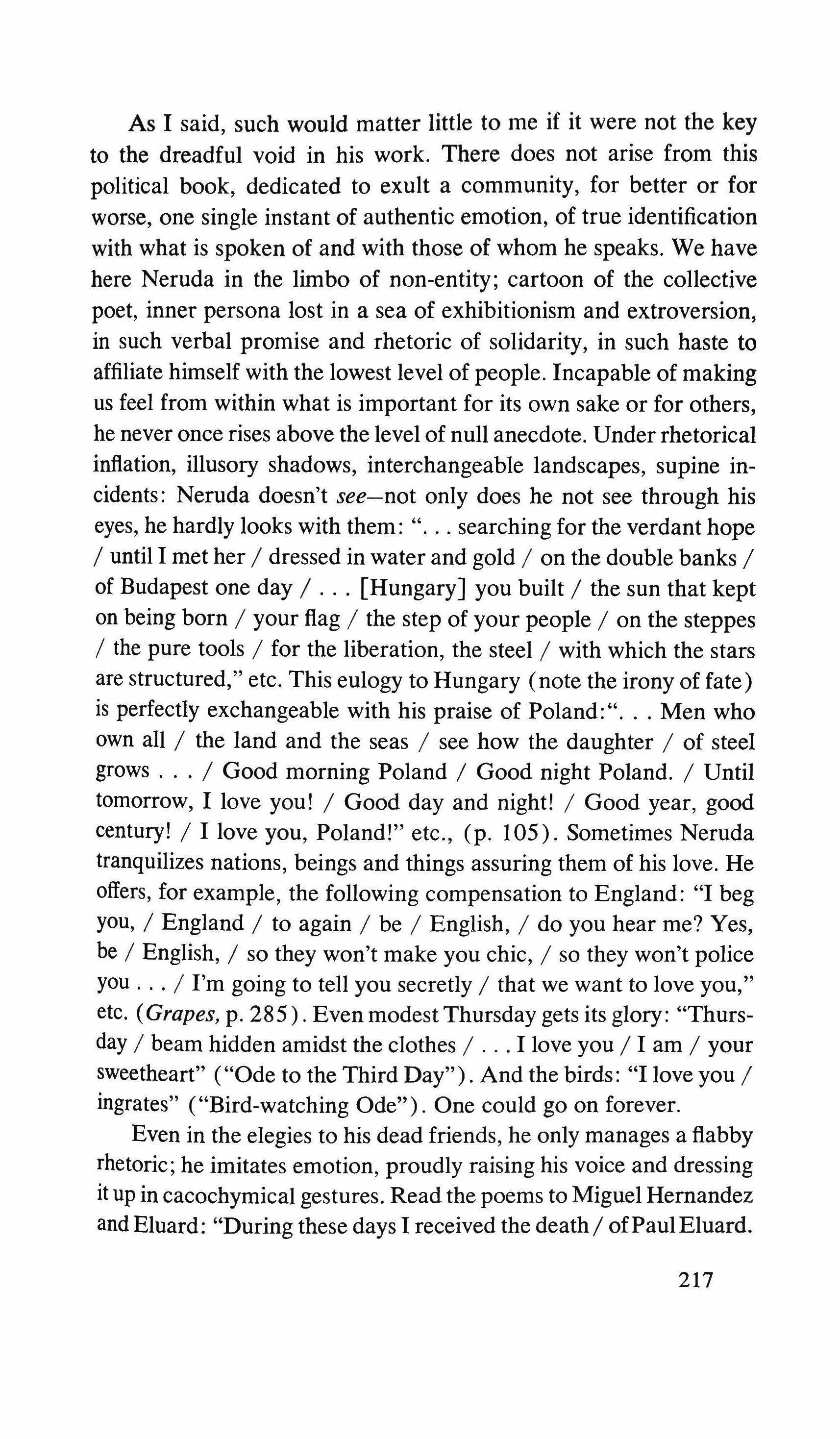
As I said, such would matter little to me if it were not the key to the dreadful void in his work. There does not arise from this political book, dedicated to exult a community, for better or for worse, one single instant of authentic emotion, of true identification with what is spoken of and with those of whom he speaks. We have here Neruda in the limbo of non-entity; cartoon of the collective poet, inner persona lost in a sea of exhibitionism and extroversion, in such verbal promise and rhetoric of solidarity, in such haste to affiliate himself with the lowest level of people. Incapable of making us feel from within what is important for its own sake or for others, he never once rises above the level of null anecdote. Under rhetorical inflation, illusory shadows, interchangeable landscapes, supine incidents: Neruda doesn't see-not only does he not see through his eyes, he hardly looks with them: searching for the verdant hope / until I met her / dressed in water and gold / on the double banks / of Budapest one day / [Hungary] you built / the sun that kept on being born / your flag / the step of your people / on the steppes / the pure tools / for the liberation, the steel/with which the stars are structured," etc. This eulogy to Hungary (note the irony of fate) is perfectly exchangeable with his praise of Poland:" Men who own all / the land and the seas / see how the daughter / of steel grows / Good morning Poland / Good night Poland. ; Until tomorrow, I love you! / Good day and night! ; Good year, good century! / I love you, Poland!" etc., (p. 105). Sometimes Neruda tranquilizes nations, beings and things assuring them of his love. He offers, for example, the following compensation to England: "I beg you, / England / to again / be ; English, / do you hear me? Yes, be ; English, / so they won't make you chic, / so they won't police you ; I'm going to tell you secretly / that we want to love you," etc. (Grapes, p. 285). Even modest Thursday gets its glory: "Thursday ; beam hidden amidst the clothes / I love you; I am / your sweetheart" ("Ode to the Third Day") And the birds: "I love you / ingrates" ("Bird-watching Ode"). One could go on forever.
Even in the elegies to his dead friends, he only manages a flabby rhetoric; he imitates emotion, proudly raising his voice and dressing it up in cacochymical gestures. Read the poems to Miguel Hernandez and Eluard: "During these days I received the death; ofPaul Eluard.
217
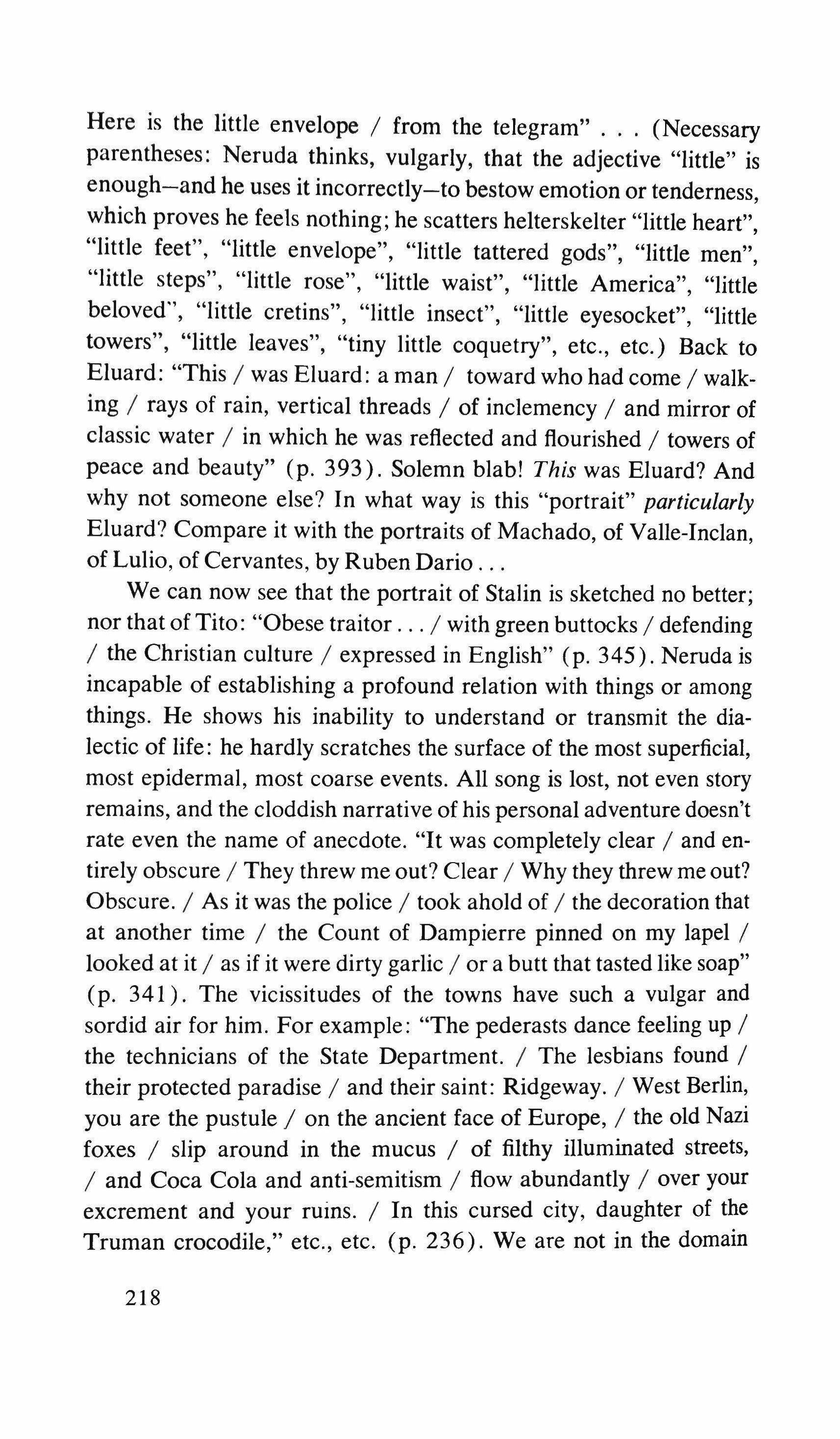
Here is the little envelope I from the telegram" (Necessary parentheses: Neruda thinks, vulgarly, that the adjective "little" is enough-and he uses it incorrectly-to bestow emotion or tenderness, which proves he feels nothing; he scatters helterskelter "little heart", "little feet", "little envelope", "little tattered gods", "little men", "little steps", "little rose", "little waist", "little America", "little beloved", "little cretins", "little insect", "little eyesocket" "little towers", "little leaves", "tiny little coquetry", etc., etc.) Back to Eluard: "This / was Eluard: a man I toward who had come I walking / rays of rain, vertical threads / of inclemency I and mirror of classic water I in which he was reflected and flourished I towers of peace and beauty" (p. 393). Solemn blab! This was Eluard? And why not someone else? In what way is this "portrait" particularly Eluard? Compare it with the portraits of Machado, of Valle-Inclan, of Lulio, of Cervantes, by Ruben
DarioWe can now see that the portrait of Stalin is sketched no better; nor that of Tito: "Obese traitor I with green buttocks / defending I the Christian culture I expressed in English" (p. 345). Neruda is incapable of establishing a profound relation with things or among things. He shows his inability to understand or transmit the dialectic of life: he hardly scratches the surface of the most superficial, most epidermal, most coarse events. All song is lost, not even story remains, and the cloddish narrative of his personal adventure doesn't rate even the name of anecdote. "It was completely clear I and entirely obscure I They threw me out? Clear I Why they threw me out? Obscure. I As it was the police / took ahold of I the decoration that at another time I the Count of Dampierre pinned on my lapel I looked at it / as if it were dirty garlic I or a butt that tasted like soap" (p. 341). The vicissitudes of the towns have such a vulgar and sordid air for him. For example: "The pederasts dance feeling up / the technicians of the State Department. / The lesbians found / their protected paradise / and their saint: Ridgeway. I West Berlin, you are the pustule I on the ancient face of Europe, / the old Nazi foxes / slip around in the mucus / of filthy illuminated streets, / and Coca Cola and anti-semitism / flow abundantly / over your excrement and your ruins. I In this cursed city, daughter of the Truman crocodile," etc., etc. (p. 236). We are not in the domain
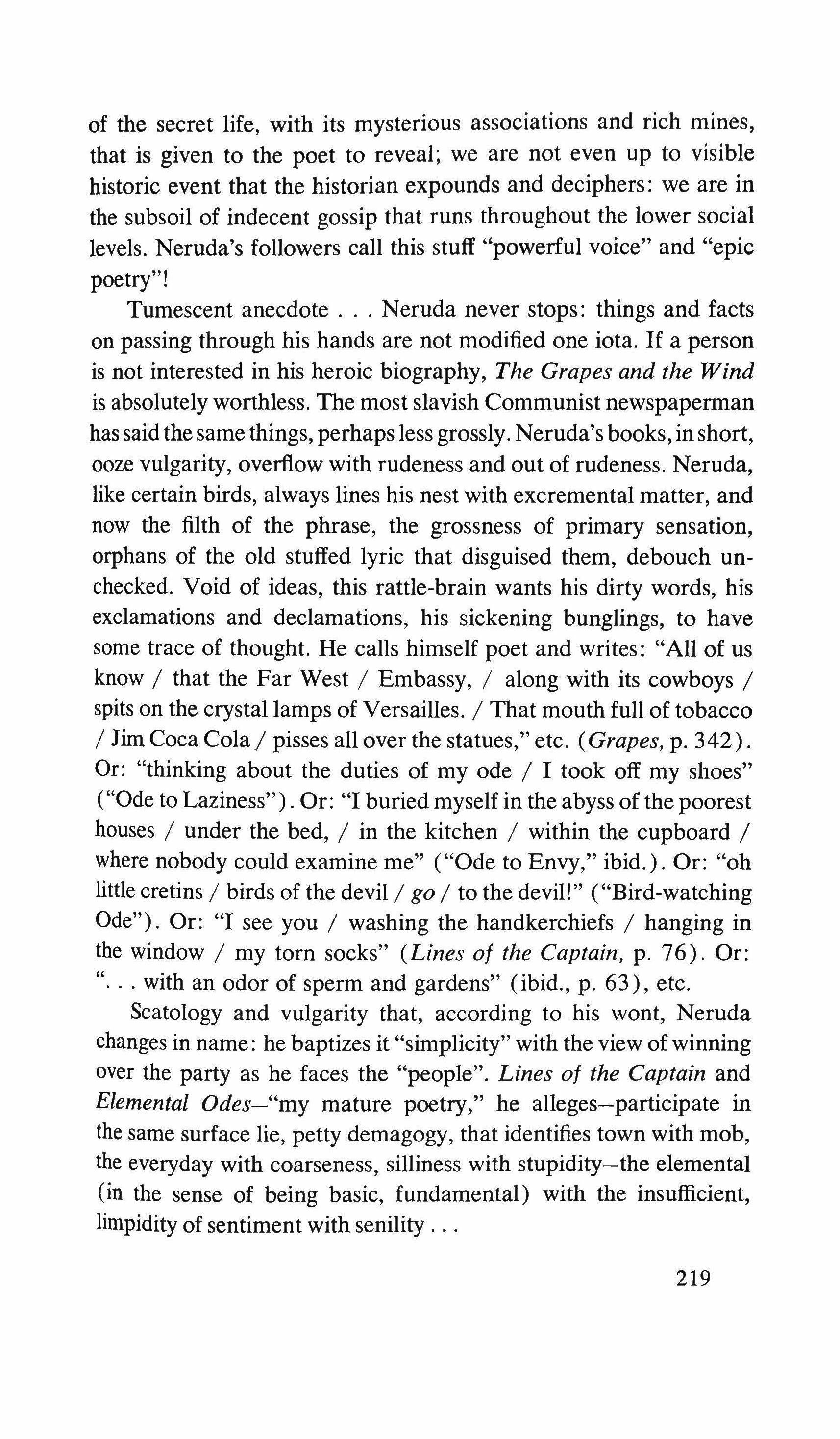
of the secret life, with its mysterious associations and rich mines, that is given to the poet to reveal; we are not even up to visible historic event that the historian expounds and deciphers: we are in the subsoil of indecent gossip that runs throughout the lower social levels. Neruda's followers call this stuff "powerful voice" and "epic poetry"!
Tumescent anecdote Neruda never stops: things and facts on passing through his hands are not modified one iota. If a person is not interested in his heroic biography, The Grapes and the Wind is absolutely worthless. The most slavish Communist newspaperman has said the same things,perhaps less grossly. Neruda's books, in short, ooze vulgarity, overflow with rudeness and out of rudeness. Neruda, like certain birds, always lines his nest with excremental matter, and now the filth of the phrase, the grossness of primary sensation, orphans of the old stuffed lyric that disguised them, debouch unchecked. Void of ideas, this rattle-brain wants his dirty words, his exclamations and declamations, his sickening bunglings, to have some trace of thought. He calls himself poet and writes: "All of us know / that the Far West / Embassy, / along with its cowboys / spits on the crystal lamps of Versailles. / That mouth full of tobacco / Jim Coca Cola,' pisses all over the statues," etc. (Grapes, p. 342). Or: "thinking about the duties of my ode / I took off my shoes" ("Ode to Laziness"). Or: "I buried myself in the abyss of the poorest houses / under the bed, / in the kitchen / within the cupboard / where nobody could examine me" ("Ode to Envy," ibid.). Or: "oh little cretins / birds of the devil / go / to the devil!" ("Bird-watching Ode"). Or: "I see you / washing the handkerchiefs / hanging in the window / my torn socks" (Lines of the Captain, p. 76). Or: with an odor of sperm and gardens" (ibid., p. 63), etc.
Scatology and vulgarity that, according to his wont, Neruda changes in name: he baptizes it "simplicity" with the view of winning over the party as he faces the "people". Lines of the Captain and Elemental Odes-"my mature poetry," he alleges-participate in the same surface lie, petty demagogy, that identifies town with mob, the everyday with coarseness, silliness with stupidity-the elemental (in the sense of being basic, fundamental) with the insufficient, limpidity of sentiment with senility
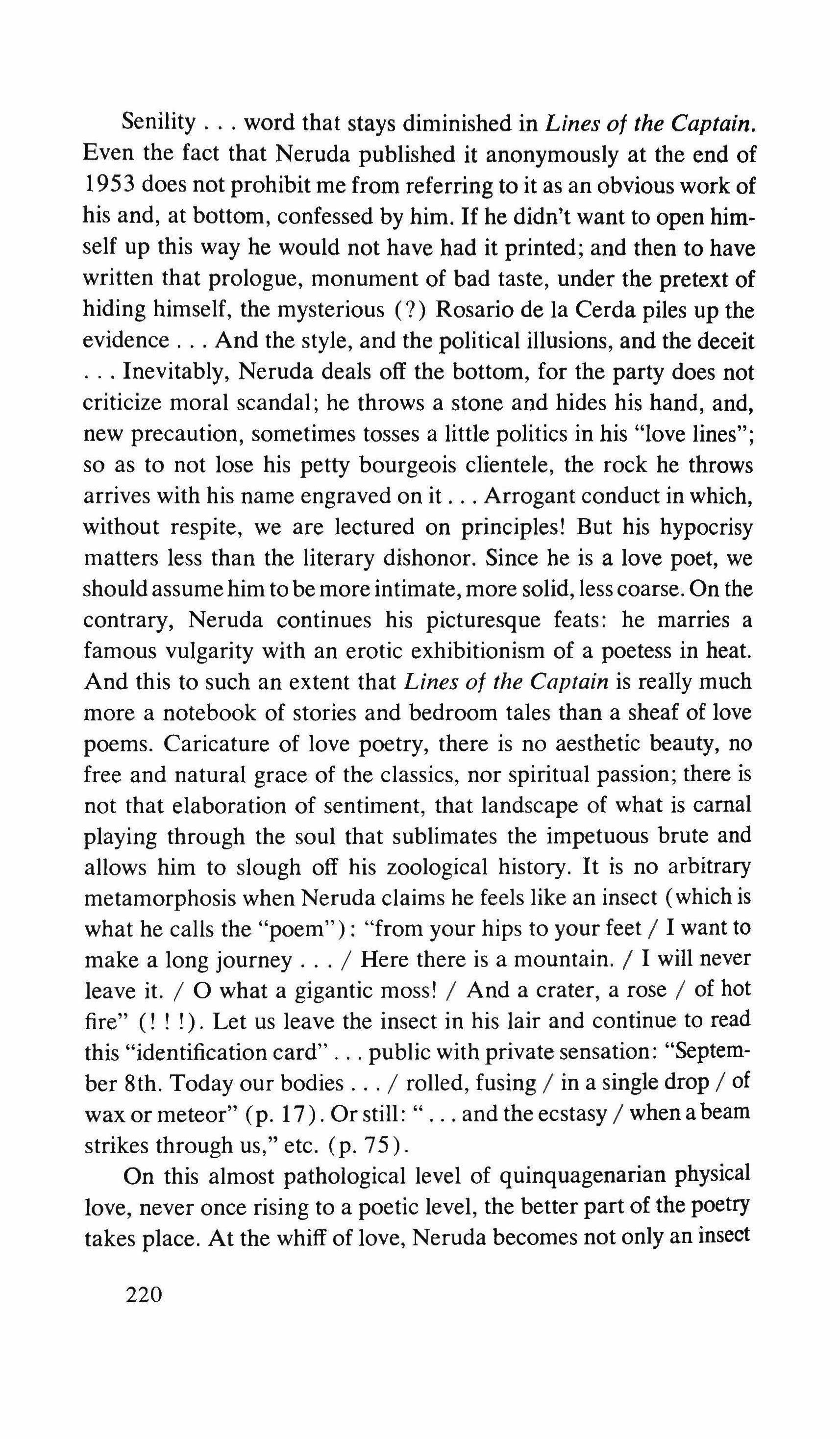
Senility word that stays diminished in Lines of the Captain. Even the fact that Neruda published it anonymously at the end of 1953 does not prohibit me from referring to it as an obvious work of his and, at bottom, confessed by him. If he didn't want to open himself up this way he would not have had it printed; and then to have written that prologue, monument of bad taste, under the pretext of hiding himself, the mysterious (?) Rosario de la Cerda piles up the evidence And the style, and the political illusions, and the deceit Inevitably, Neruda deals off the bottom, for the party does not criticize moral scandal; he throws a stone and hides his hand, and, new precaution, sometimes tosses a little politics in his "love lines"; so as to not lose his petty bourgeois clientele, the rock he throws arrives with his name engraved on it Arrogant conduct in which, without respite, we are lectured on principles! But his hypocrisy matters less than the literary dishonor. Since he is a love poet, we should assume him to be more intimate, more solid, less coarse. On the contrary, Neruda continues his picturesque feats: he marries a famous vulgarity with an erotic exhibitionism of a poetess in heat. And this to such an extent that Lines of the Captain is really much more a notebook of stories and bedroom tales than a sheaf of love poems. Caricature of love poetry, there is no aesthetic beauty, no free and natural grace of the classics, nor spiritual passion; there is not that elaboration of sentiment, that landscape of what is carnal playing through the soul that sublimates the impetuous brute and allows him to slough off his zoological history. It is no arbitrary metamorphosis when Neruda claims he feels like an insect (which is what he calls the "poem"): "from your hips to your feet / I want to make a long journey / Here there is a mountain. / I will never leave it. / 0 what a gigantic moss! / And a crater, a rose I of hot fire" (! ! !). Let us leave the insect in his lair and continue to read this "identification card" public with private sensation: "September 8th. Today our bodies / rolled, fusing / in a single drop / of wax or meteor" (p. 17). Or still: and the ecstasy / when a beam strikes through us," etc. (p. 75).
On this almost pathological level of quinquagenarian physical love, never once rising to a poetic level, the better part of the poetry takes place. At the whiff of love, Neruda becomes not only an insect
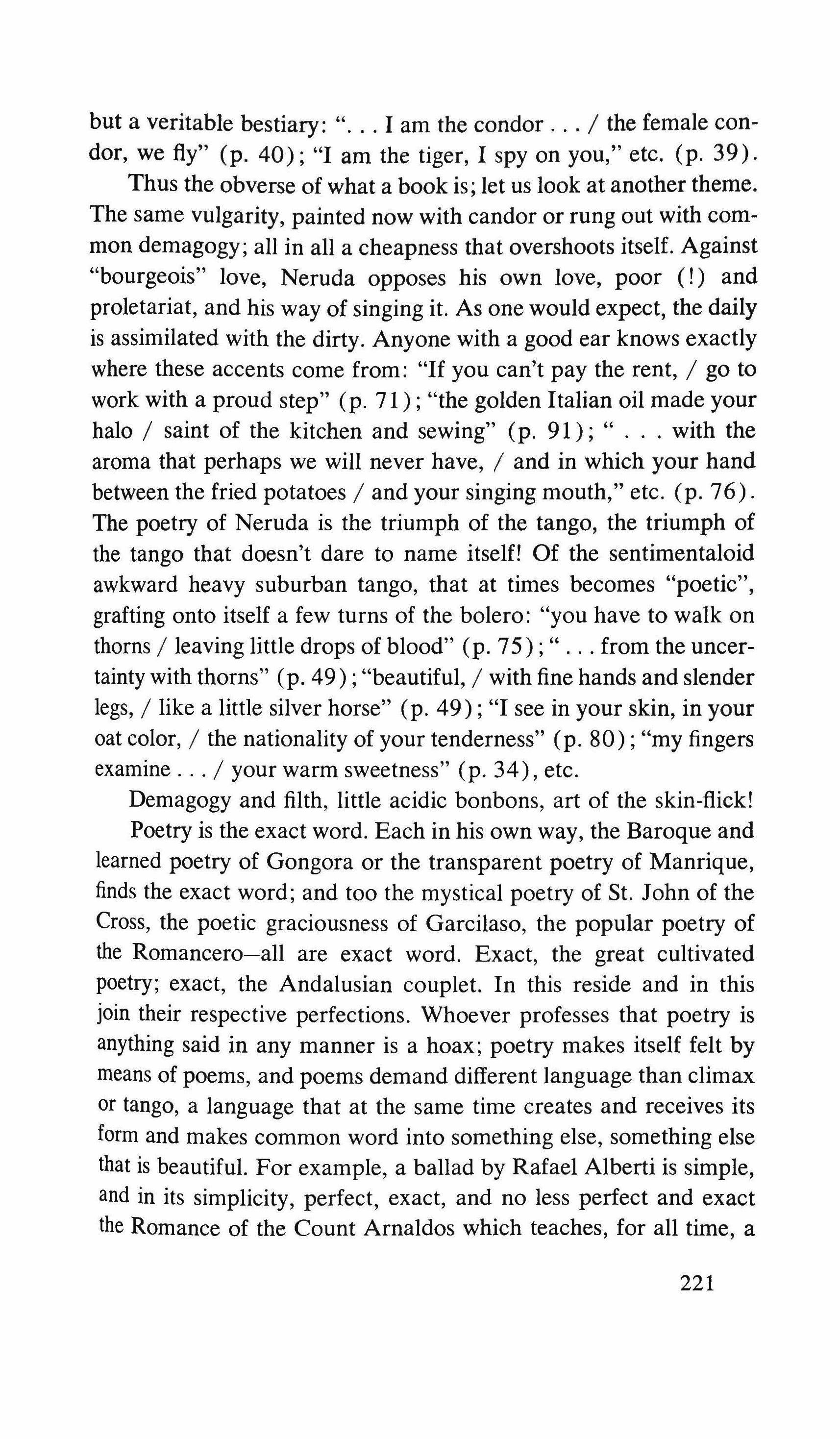
but a veritable bestiary: I am the condor / the female condor, we fly" (p. 40); "I am the tiger, I spy on you," etc. (p. 39).
Thus the obverse of what a book is; let us look at another theme. The same vulgarity, painted now with candor or rung out with common demagogy; all in all a cheapness that overshoots itself. Against "bourgeois" love, Neruda opposes his own love, poor (!) and proletariat, and his way of singing it. As one would expect, the daily is assimilated with the dirty. Anyone with a good ear knows exactly where these accents come from: "If you can't pay the rent, / go to work with a proud step" (p. 71); "the golden Italian oil made your halo / saint of the kitchen and sewing" (p. 91); with the aroma that perhaps we will never have, / and in which your hand between the fried potatoes / and your singing mouth," etc. (p. 76).
The poetry of Neruda is the triumph of the tango, the triumph of the tango that doesn't dare to name itself! Of the sentimentaloid awkward heavy suburban tango, that at times becomes "poetic", grafting onto itself a few turns of the bolero: "you have to walk on thorns / leaving little drops of blood" (p. 75); from the uncertainty with thorns" (p. 49) ; "beautiful, / with fine hands and slender legs, / like a little silver horse" (p. 49); "I see in your skin, in your oat color, / the nationality of your tenderness" (p. 80) ; "my fingers examine / your warm sweetness" (p. 34), etc.
Demagogy and filth, little acidic bonbons, art of the skin-flick!
Poetry is the exact word. Each in his own way, the Baroque and learned poetry of Gongora or the transparent poetry of Manrique, finds the exact word; and too the mystical poetry of St. John of the Cross, the poetic graciousness of Garcilaso, the popular poetry of the Romancero-all are exact word. Exact, the great cultivated poetry; exact, the Andalusian couplet. In this reside and in this join their respective perfections. Whoever professes that poetry is anything said in any manner is a hoax; poetry makes itself felt by means of poems, and poems demand different language than climax or tango, a language that at the same time creates and receives its form and makes common word into something else, something else that is beautiful. For example, a ballad by Rafael Alberti is simple, and in its simplicity, perfect, exact, and no less perfect and exact the Romance of the Count Arnaldos which teaches, for all time, a
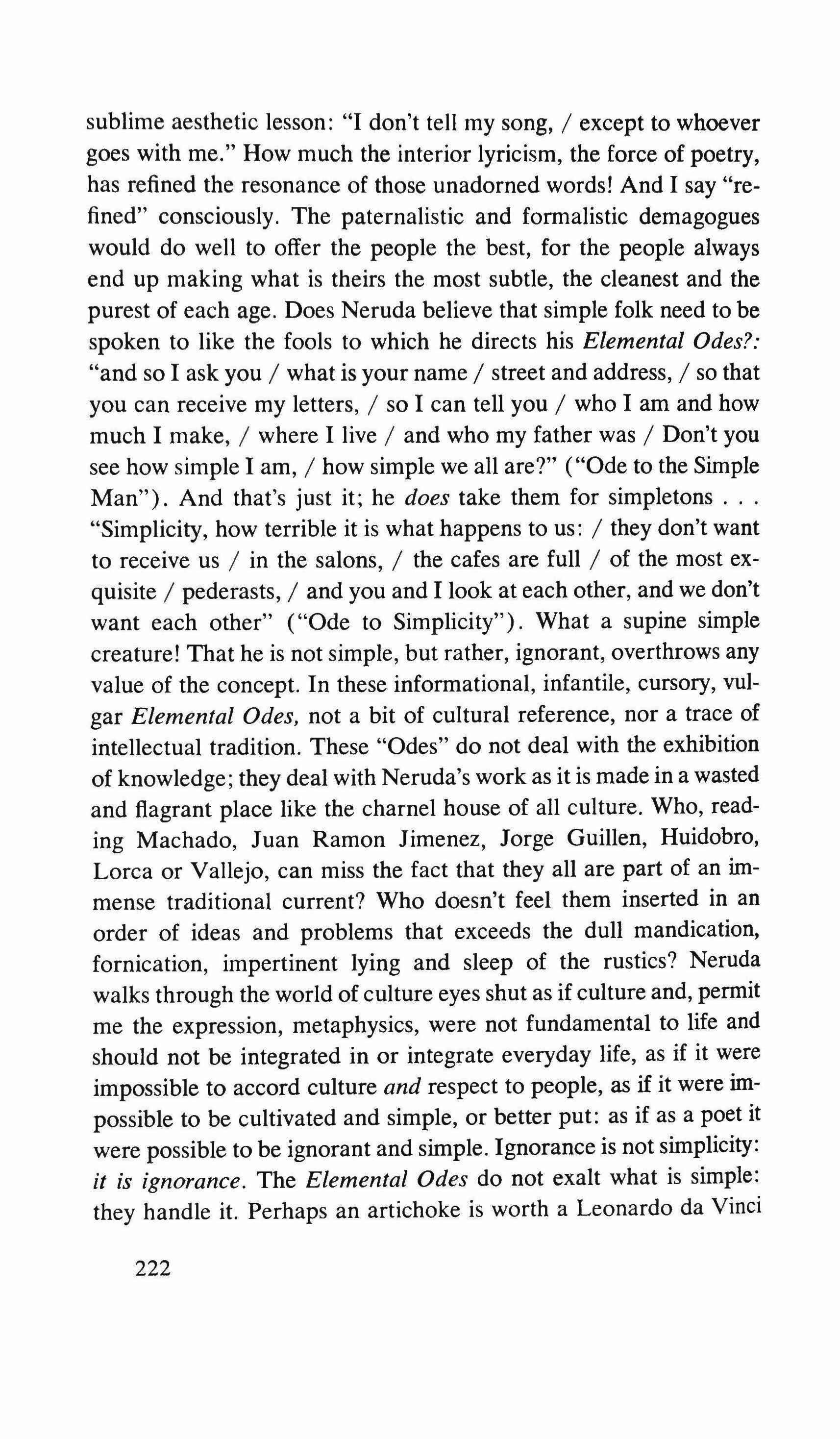
sublime aesthetic lesson: "I don't tell my song, / except to whoever goes with me." How much the interior lyricism, the force of poetry, has refined the resonance of those unadorned words! And I say "refined" consciously. The paternalistic and formalistic demagogues would do well to offer the people the best, for the people always end up making what is theirs the most subtle, the cleanest and the purest of each age. Does Neruda believe that simple folk need to be spoken to like the fools to which he directs his Elemental Odes?: "and so I ask you / what is your name / street and address, / so that you can receive my letters, / so I can tell you / who I am and how much I make, / where I live / and who my father was / Don't you see how simple I am, / how simple we all are?" ("Ode to the Simple Man"). And that's just it; he does take them for simpletons "Simplicity, how terrible it is what happens to us: / they don't want to receive us / in the salons, / the cafes are full / of the most exquisite / pederasts, / and you and I look at each other, and we don't want each other" ("Ode to Simplicity"). What a supine simple creature! That he is not simple, but rather, ignorant, overthrows any value of the concept. In these informational, infantile, cursory, vulgar Elemental Odes, not a bit of cultural reference, nor a trace of intellectual tradition. These "Odes" do not deal with the exhibition of knowledge; they deal with Neruda's work as it is made in a wasted and flagrant place like the charnel house of all culture. Who, reading Machado, Juan Ramon Jimenez, Jorge Guillen, Huidobro, Lorca or Vallejo, can miss the fact that they all are part of an immense traditional current? Who doesn't feel them inserted in an order of ideas and problems that exceeds the dull mandication, fornication, impertinent lying and sleep of the rustics? Neruda walks through the world of culture eyes shut as if culture and, permit me the expression, metaphysics, were not fundamental to life and should not be integrated in or integrate everyday life, as if it were impossible to accord culture and respect to people, as if it were impossible to be cultivated and simple, or better put: as if as a poet it were possible to be ignorant and simple. Ignorance is not simplicity: it is ignorance. The Elemental Odes do not exalt what is simple: they handle it. Perhaps an artichoke is worth a Leonardo da Vinci
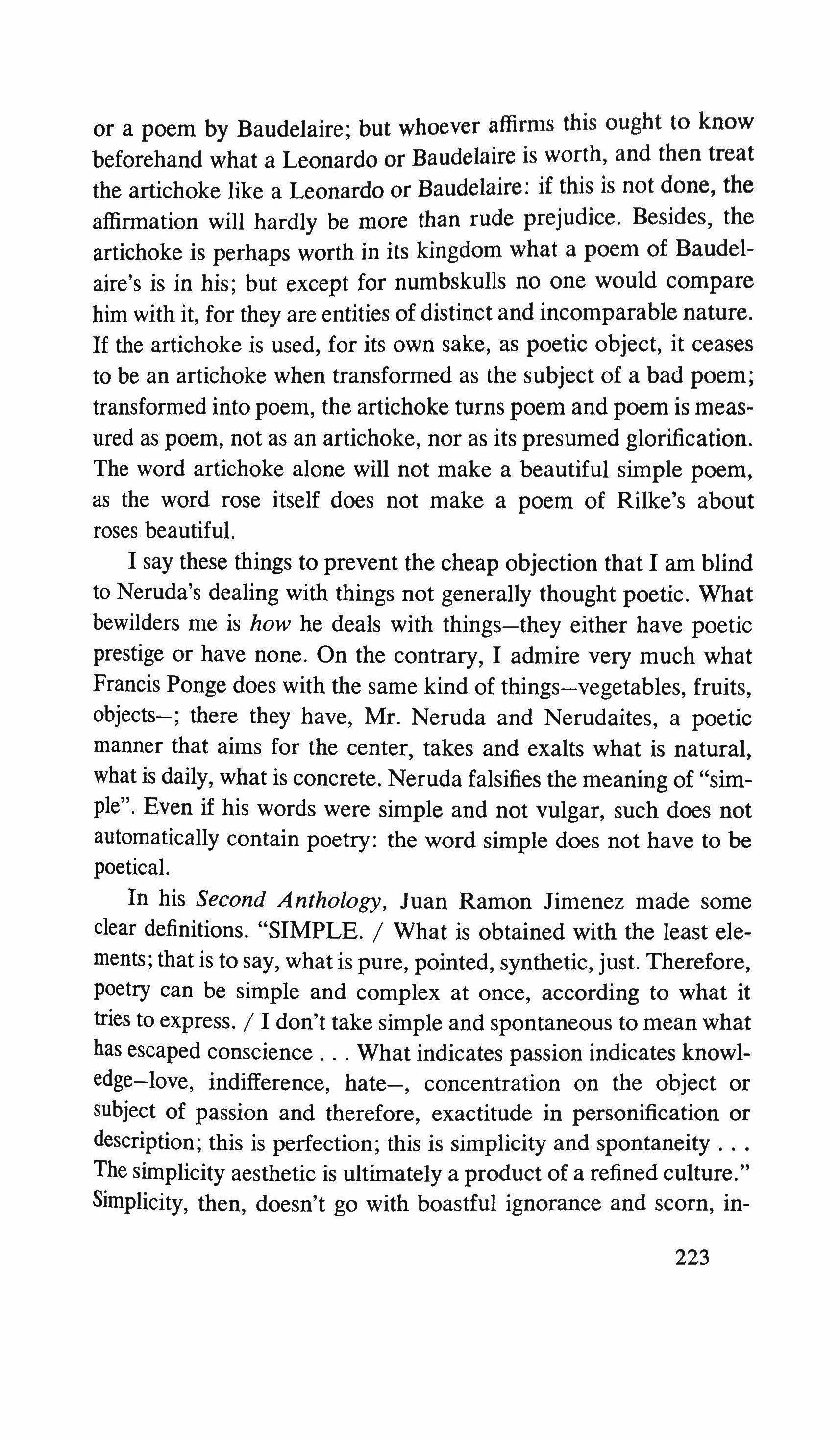
or a poem by Baudelaire; but whoever affirms this ought to know beforehand what a Leonardo or Baudelaire is worth, and then treat the artichoke like a Leonardo or Baudelaire: if this is not done, the affirmation will hardly be more than rude prejudice. Besides, the artichoke is perhaps worth in its kingdom what a poem of Baudelaire's is in his; but except for numbskulls no one would compare him with it, for they are entities of distinct and incomparable nature. If the artichoke is used, for its own sake, as poetic object, it ceases to be an artichoke when transformed as the subject of a bad poem; transformed into poem, the artichoke turns poem and poem is measured as poem, not as an artichoke, nor as its presumed glorification. The word artichoke alone will not make a beautiful simple poem, as the word rose itself does not make a poem of Rilke's about roses beautiful.
I say these things to prevent the cheap objection that I am blind to Neruda's dealing with things not generally thought poetic. What bewilders me is how he deals with things-they either have poetic prestige or have none. On the contrary, I admire very much what Francis Ponge does with the same kind of things-vegetables, fruits, objects-; there they have, Mr. Neruda and Nerudaites, a poetic manner that aims for the center, takes and exalts what is natural, what is daily, what is concrete. Neruda falsifies the meaning of "simple". Even if his words were simple and not vulgar, such does not automatically contain poetry: the word simple does not have to be poetical.
In his Second Anthology, Juan Ramon Jimenez made some clear definitions. "SIMPLE. / What is obtained with the least elements; that is to say, what is pure, pointed, synthetic, just. Therefore, poetry can be simple and complex at once, according to what it tries to express. / I don't take simple and spontaneous to mean what has escaped conscience What indicates passion indicates knowledge-love, indifference, hate-, concentration on the object or subject of passion and therefore, exactitude in personification or description; this is perfection; this is simplicity and spontaneity The simplicity aesthetic is ultimately a product of a refined culture." Simplicity, then, doesn't go with boastful ignorance and scorn, in-
223
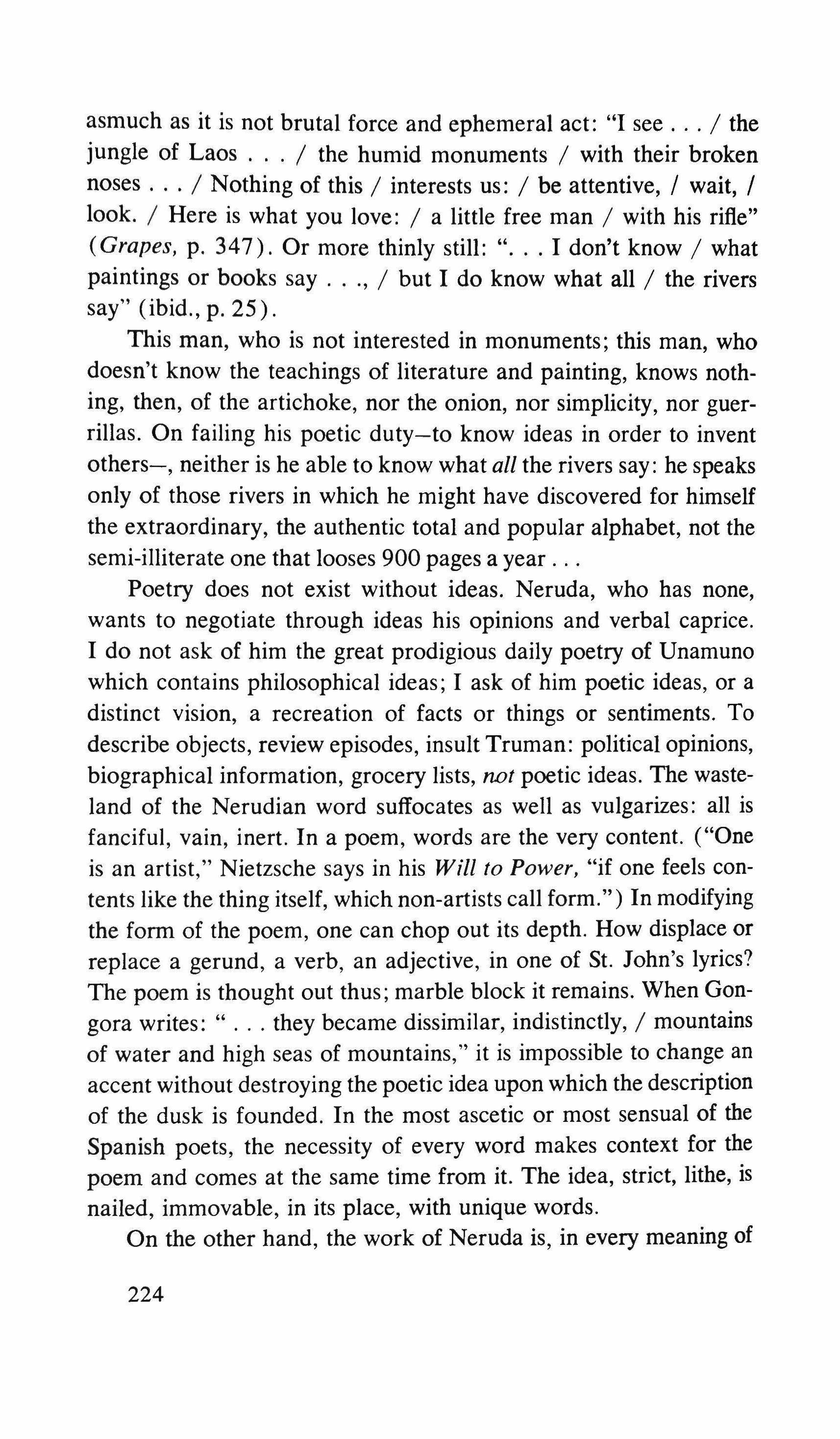
asmuch as it is not brutal force and ephemeral act: "I see / the jungle of Laos / the humid monuments / with their broken noses / Nothing of this / interests us: / be attentive, / wait, / look. / Here is what you love: / a little free man / with his rifle" (Grapes, p. 347). Or more thinly still: I don't know / what paintings or books say / but I do know what all / the rivers say" (ibid., p. 25)
This man, who is not interested in monuments; this man, who doesn't know the teachings of literature and painting, knows nothing, then, of the artichoke, nor the onion, nor simplicity, nor guerrillas. On failing his poetic duty-to know ideas in order to invent others-, neither is he able to know what all the rivers say: he speaks only of those rivers in which he might have discovered for himself the extraordinary, the authentic total and popular alphabet, not the semi-illiterate one that looses 900 pages a year
Poetry does not exist without ideas. Neruda, who has none, wants to negotiate through ideas his opinions and verbal caprice. I do not ask of him the great prodigious daily poetry of Unamuno which contains philosophical ideas; I ask of him poetic ideas, or a distinct vision, a recreation of facts or things or sentiments. To describe objects, review episodes, insult Truman: political opinions, biographical information, grocery lists, not poetic ideas. The wasteland of the Nerudian word suffocates as well as vulgarizes: all is fanciful, vain, inert. In a poem, words are the very content. ("One is an artist," Nietzsche says in his Will to Power, "if one feels contents like the thing itself, which non-artists call form.") In modifying the form of the poem, one can chop out its depth. How displace or replace a gerund, a verb, an adjective, in one of St. John's lyrics? The poem is thought out thus; marble block it remains. When Gongora writes: they became dissimilar, indistinctly, / mountains of water and high seas of mountains," it is impossible to change an accent without destroying the poetic idea upon which the description of the dusk is founded. In the most ascetic or most sensual of the Spanish poets, the necessity of every word makes context for the poem and comes at the same time from it. The idea, strict, lithe, is nailed, immovable, in its place, with unique words.
On the other hand, the work of Neruda is, in every meaning of
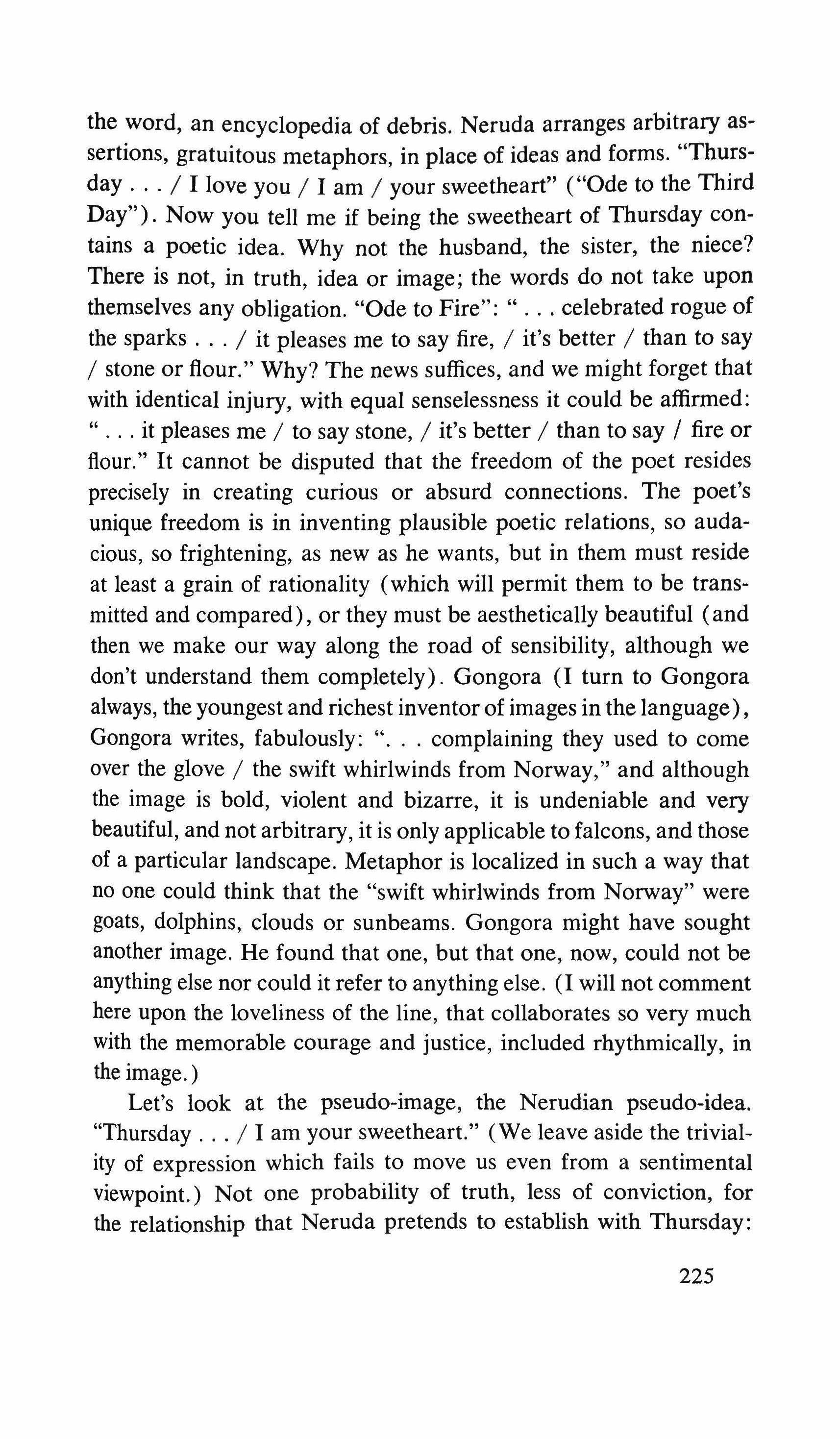
the word, an encyclopedia of debris. Neruda arranges arbitrary assertions, gratuitous metaphors, in place of ideas and forms. "Thursday / I love you / I am / your sweetheart" ("Ode to the Third Day"). Now you tell me if being the sweetheart of Thursday contains a poetic idea. Why not the husband, the sister, the niece? There is not, in truth, idea or image; the words do not take upon themselves any obligation. "Ode to Fire": celebrated rogue of the sparks / it pleases me to say fire, / it's better / than to say I stone or flour." Why? The news suffices, and we might forget that with identical injury, with equal senselessness it could be affirmed: it pleases me / to say stone, / it's better / than to say / fire or flour." It cannot be disputed that the freedom of the poet resides precisely in creating curious or absurd connections. The poet's unique freedom is in inventing plausible poetic relations, so audacious, so frightening, as new as he wants, but in them must reside at least a grain of rationality (which will permit them to be transmitted and compared), or they must be aesthetically beautiful (and then we make our way along the road of sensibility, although we don't understand them completely). Gongora (I turn to Gongora always, the youngest and richest inventor of images in the language) Gongora writes, fabulously: complaining they used to come over the glove / the swift whirlwinds from Norway," and although the image is bold, violent and bizarre, it is undeniable and very beautiful, and not arbitrary, it is only applicable to falcons, and those of a particular landscape. Metaphor is localized in such a way that no one could think that the "swift whirlwinds from Norway" were goats, dolphins, clouds or sunbeams. Gongora might have sought another image. He found that one, but that one, now, could not be anything else nor could it refer to anything else. (I will not comment here upon the loveliness of the line, that collaborates so very much with the memorable courage and justice, included rhythmically, in the image.)
Let's look at the pseudo-image, the Nerudian pseudo-idea. "Thursday / I am your sweetheart." (We leave aside the triviality of expression which fails to move us even from a sentimental viewpoint.) Not one probability of truth, less of conviction, for the relationship that Neruda pretends to establish with Thursday: 225
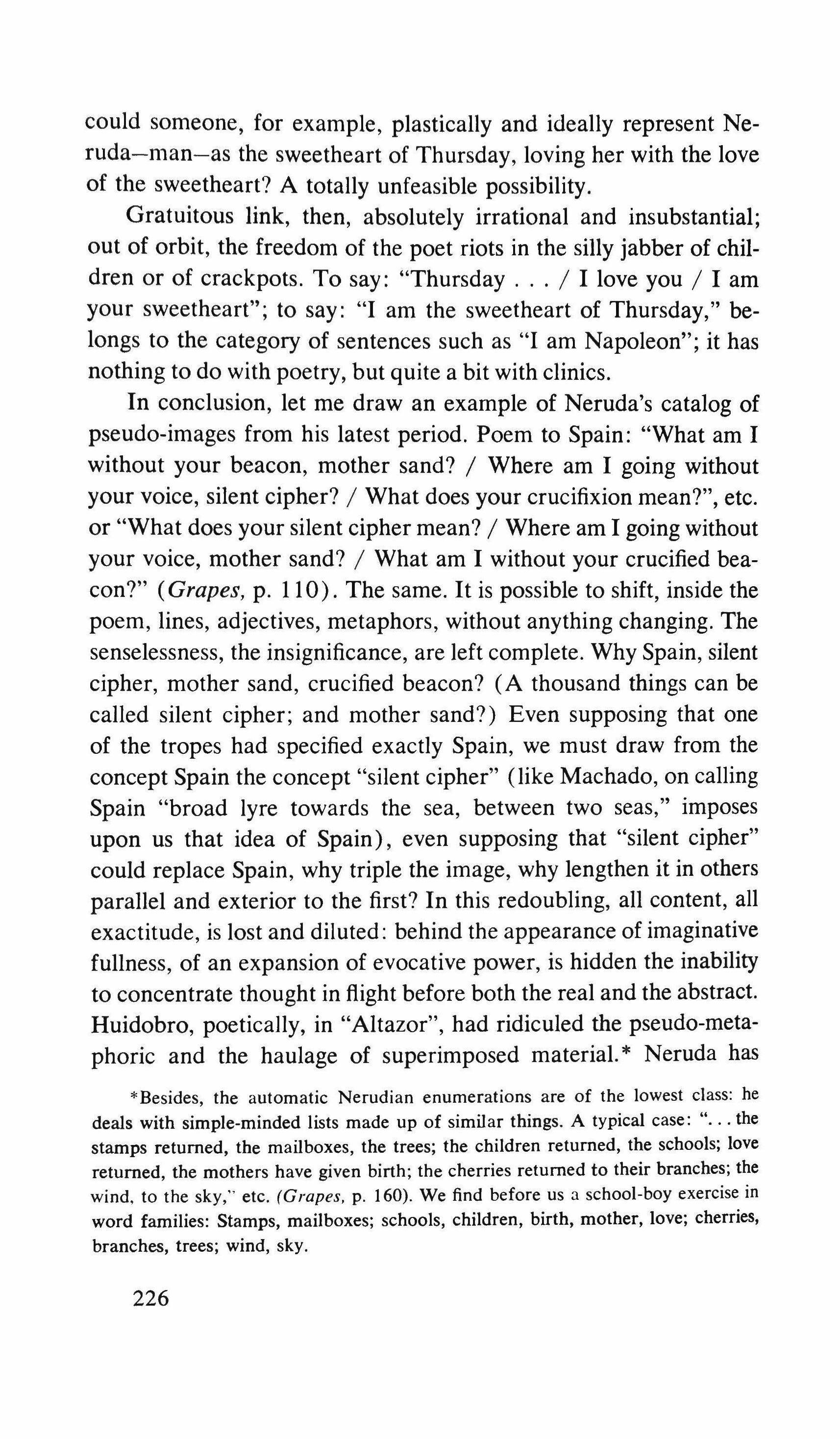
could someone, for example, plastically and ideally represent Neruda-man-as the sweetheart of Thursday, loving her with the love of the sweetheart? A totally unfeasible possibility.
Gratuitous link, then, absolutely irrational and insubstantial; out of orbit, the freedom of the poet riots in the silly jabber of children or of crackpots. To say: "Thursday / I love you / I am your sweetheart"; to say: "I am the sweetheart of Thursday," belongs to the category of sentences such as "I am Napoleon"; it has nothing to do with poetry, but quite a bit with clinics.
In conclusion, let me draw an example of Neruda's catalog of pseudo-images from his latest period. Poem to Spain: "What am I without your beacon, mother sand? / Where am I going without your voice, silent cipher? / What does your crucifixion mean?", etc. or "What does your silent cipher mean? / Where am I going without your voice, mother sand? / What am I without your crucified beacon?" (Grapes, p. 110). The same. It is possible to shift, inside the poem, lines, adjectives, metaphors, without anything changing. The senselessness, the insignificance, are left complete. Why Spain, silent cipher, mother sand, crucified beacon? (A thousand things can be called silent cipher; and mother sand?) Even supposing that one of the tropes had specified exactly Spain, we must draw from the concept Spain the concept "silent cipher" (like Machado, on calling Spain "broad lyre towards the sea, between two seas," imposes upon us that idea of Spain), even supposing that "silent cipher" could replace Spain, why triple the image, why lengthen it in others parallel and exterior to the first? In this redoubling, all content, all exactitude, is lost and diluted: behind the appearance of imaginative fullness, of an expansion of evocative power, is hidden the inability to concentrate thought in flight before both the real and the abstract. Huidobro, poetically, in "Altazor", had ridiculed the pseudo-metaphoric and the haulage of superimposed material. * Neruda has
Besides, the automatic Nerudian enumerations are of the lowest class: he deals with simple-minded lists made up of similar things. A typical case: the stamps returned, the mailboxes, the trees; the children returned, the schools; love returned, the mothers have given birth; the cherries returned to their branches; the wind, to the sky," etc. (Grapes, p. 160). We find before us a school-boy exercise in word families: Stamps, mailboxes; schools, children, birth, mother, love; cherries, branches, trees; wind, sky.
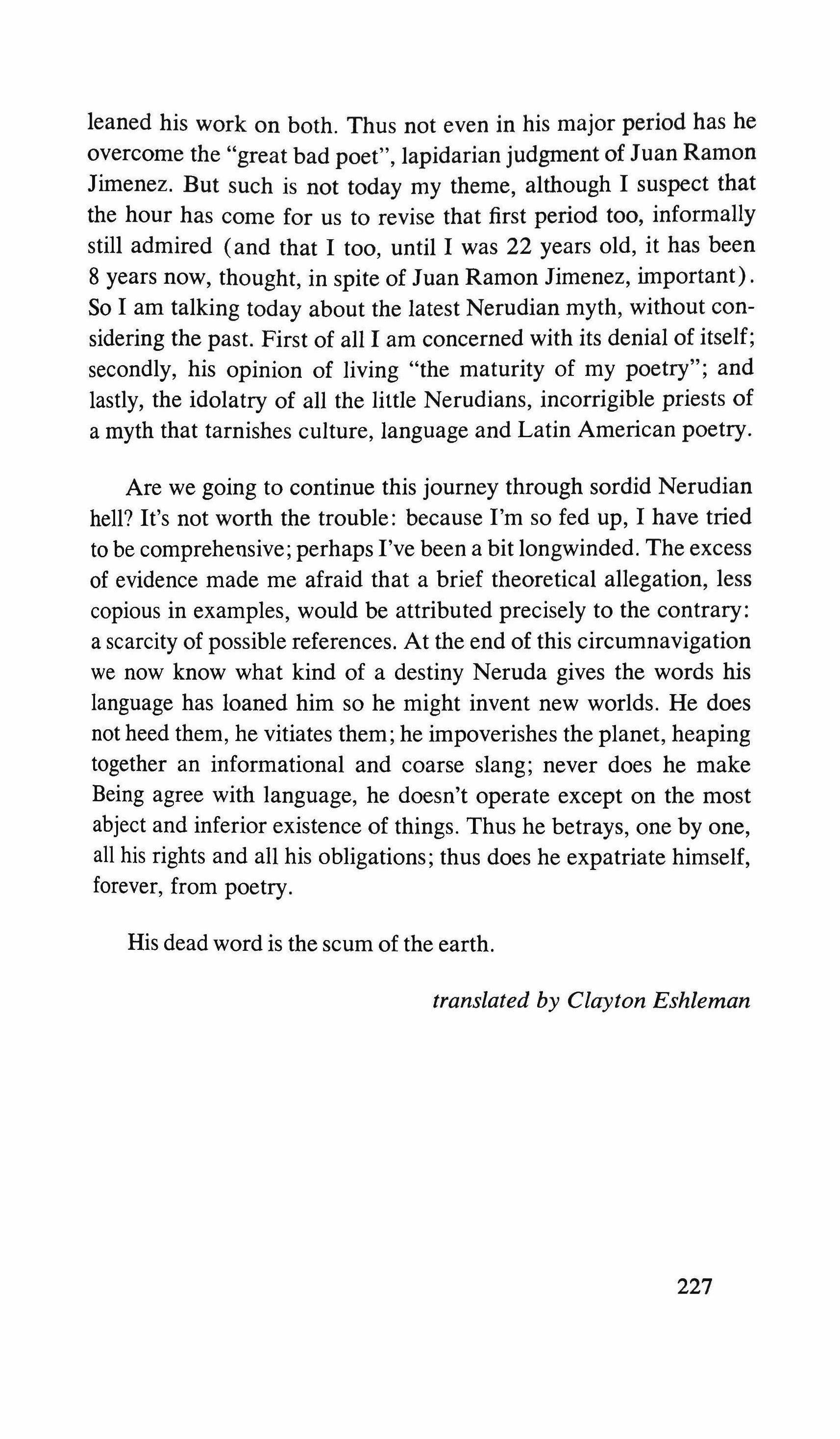
leaned his work on both. Thus not even in his major period has he overcome the "great bad poet", lapidarian judgment of Juan Ramon Jimenez. But such is not today my theme, although I suspect that the hour has come for us to revise that first period too, informally still admired (and that I too, until I was 22 years old, it has been 8 years now, thought, in spite of Juan Ramon Jimenez, important). So I am talking today about the latest Nerudian myth, without considering the past. First of all I am concerned with its denial of itself; secondly, his opinion of living "the maturity of my poetry"; and lastly, the idolatry of all the little Nerudians, incorrigible priests of a myth that tarnishes culture, language and Latin American poetry.
Are we going to continue this journey through sordid Nerudian hell? It's not worth the trouble: because I'm so fed up, I have tried to be comprehensive; perhaps I've been a bit longwinded. The excess of evidence made me afraid that a brief theoretical allegation, less copious in examples, would be attributed precisely to the contrary: a scarcity of possible references. At the end of this circumnavigation we now know what kind of a destiny Neruda gives the words his language has loaned him so he might invent new worlds. He does not heed them, he vitiates them; he impoverishes the planet, heaping together an informational and coarse slang; never does he make Being agree with language, he doesn't operate except on the most abject and inferior existence of things. Thus he betrays, one by one, all his rights and all his obligations; thus does he expatriate himself, forever, from poetry.
His dead word is the scum of the earth.
translated by Clayton Eshleman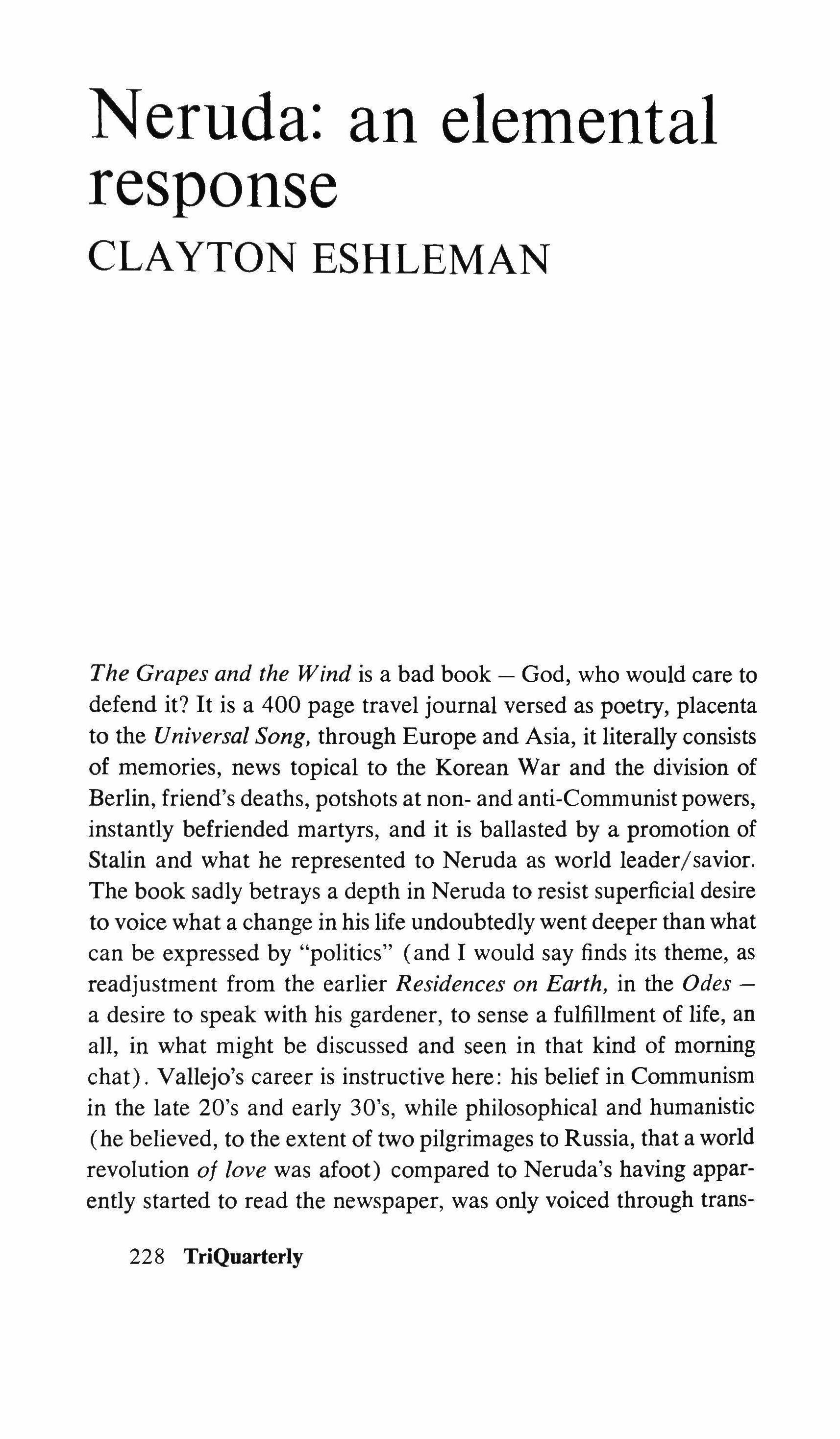
The Grapes and the Wind is a bad book - God, who would care to defend it? It is a 400 page travel journal versed as poetry, placenta to the Universal Song, through Europe and Asia, it literally consists of memories, news topical to the Korean War and the division of Berlin, friend's deaths, potshots at non- and anti-Communist powers, instantly befriended martyrs, and it is ballasted by a promotion of Stalin and what he represented to Neruda as world leader/savior. The book sadly betrays a depth in Neruda to resist superficial desire to voice what a change in his life undoubtedly went deeper than what can be expressed by "politics" (and I would say finds its theme, as readjustment from the earlier Residences on Earth, in the Odesa desire to speak with his gardener, to sense a fulfillment of life, an all, in what might be discussed and seen in that kind of morning chat). Vallejo's career is instructive here: his belief in Communism in the late 20's and early 30's, while philosophical and humanistic (he believed, to the extent of two pilgrimages to Russia, that a world revolution of love was afoot) compared to Neruda's having apparently started to read the newspaper, was only voiced through trans-
228 TriQuarterly
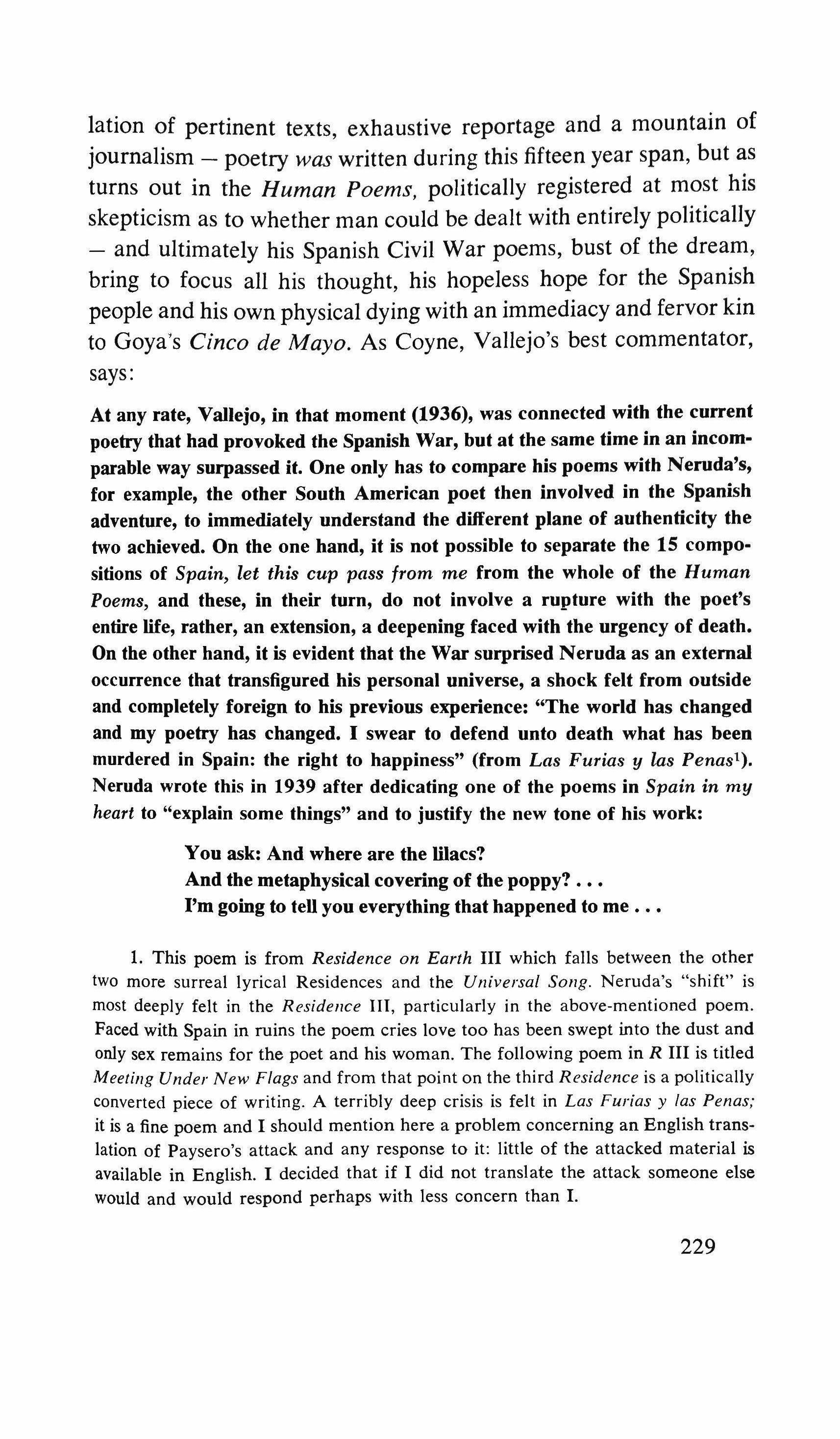
lation of pertinent texts, exhaustive reportage and a mountain of journalism - poetry was written during this fifteen year span, but as turns out in the Human Poems, politically registered at most his skepticism as to whether man could be dealt with entirely politically - and ultimately his Spanish Civil War poems, bust of the dream, bring to focus all his thought, his hopeless hope for the Spanish people and his own physical dying with an immediacy and fervor kin to Goya's Cinco de Mayo. As Coyne, Vallejo's best commentator, says:
At any rate, Vallejo, in that moment (1936), was connected with the current poetry that had provoked the Spanish War, but at the same time in an incomparable way surpassed it. One only has to compare his poems with Neruda's, for example, the other South American poet then involved in the Spanish adventure, to immediately understand the different plane of authenticity the two achieved. On the one hand, it is not possible to separate the 15 compositions of Spain, let this cup pass from me from the whole of the Human Poems, and these, in their turn, do not involve a rupture with the poet's entire life, rather, an extension, a deepening faced with the urgency of death. On the other hand, it is evident that the War surprised Neruda as an external occurrence that transfigured his personal universe, a shock felt from outside and completely foreign to his previous experience: "The world has changed and my poetry has chauged. I swear to defend unto death what has been murdered in Spain: the right to happiness" (from Las Furias y las Penass}, Neruda wrote this in 1939 after dedicating one of the poems in Spain in my heart to "explain some things" and to justify the new tone of his work:
You ask: And where are the Wacs?
And the metaphysical covering of the poppy? I'm going to teU you everything that happened to me
1. This poem is from Residence on Earth III which falls between the other two more surreal lyrical Residences and the Universal Song. Neruda's "shift" is most deeply felt in the Residence III, particularly in the above-mentioned poem. Faced with Spain in ruins the poem cries love too has been swept into the dust and only sex remains for the poet and his woman. The following poem in R III is titled Meeting Under New Flags and from that point on the third Residence is a politically converted piece of writing. A terribly deep crisis is felt in Las Furias y las Penas; it is a fine poem and I should mention here a problem concerning an English translation of Paysero's attack and any response to it: little of the attacked material is available in English. I decided that if I did not translate the attack someone else would and would respond perhaps with less concern than I.
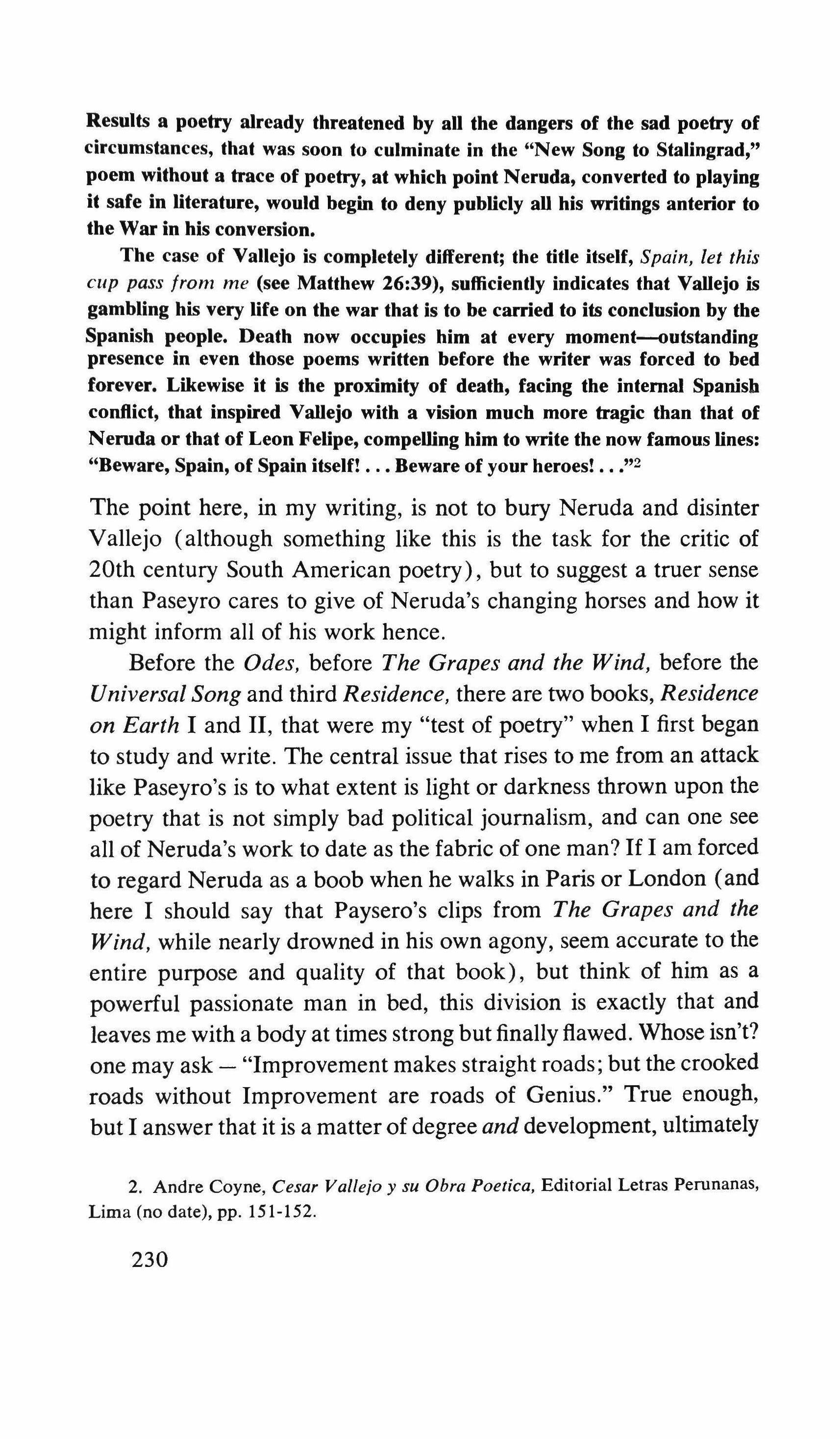
Results a poetry already threatened by aU the dangers of the sad poetry of circumstances, that was soon to culminate in the "New Song to Stallngrad," poem without a trace of poetry, at which point Neruda, converted to playing it safe in literature, would begin to deny publicly aU his writings anterior to the War in his conversion.
The case of Vallejo is completely different; the title itself, Spain, let this cup pass from me (see Matthew 26:39), sufficiently indicates that Vallejo is gambling his very life on the war that is to be carried to its conclusion by the Spanish people. Death now occupies him at every moment-outstanding presence in even those poems written before the writer was forced to bed forever. Likewise it is the proximity of death, facing the internal Spanish conflict, that inspired Vallejo with a vision much more tragic than that of Neruda or that of Leon Felipe, compelling him to write the now famous lines: "Beware, Spain, of Spain itself! Beware of your heroes! "2
The point here, in my writing, is not to bury Neruda and disinter Vallejo (although something like this is the task for the critic of 20th century South American poetry), but to suggest a truer sense than Paseyro cares to give of Neruda's changing horses and how it might inform all of his work hence.
Before the Odes, before The Grapes and the Wind, before the Universal Song and third Residence, there are two books, Residence on Earth I and II, that were my "test of poetry" when I first began to study and write. The central issue that rises to me from an attack like Paseyro's is to what extent is light or darkness thrown upon the poetry that is not simply bad political journalism, and can one see all of Neruda's work to date as the fabric of one man? If I am forced to regard Neruda as a boob when he walks in Paris or London (and here I should say that Paysero's clips from The Grapes and the Wind, while nearly drowned in his own agony, seem accurate to the entire purpose and quality of that book), but think of him as a powerful passionate man in bed, this division is exactly that and leaves me with a body at times strong but finally flawed. Whose isn't? one may ask - "Improvement makes straight roads; but the crooked roads without Improvement are roads of Genius." True enough, but I answer that it is a matter of degree and development, ultimately
2. Andre Coyne, Cesar Vallejo y su Obra Poetica, Editorial Letras Perunanas, Lima (no date), pp. 151-152.
230
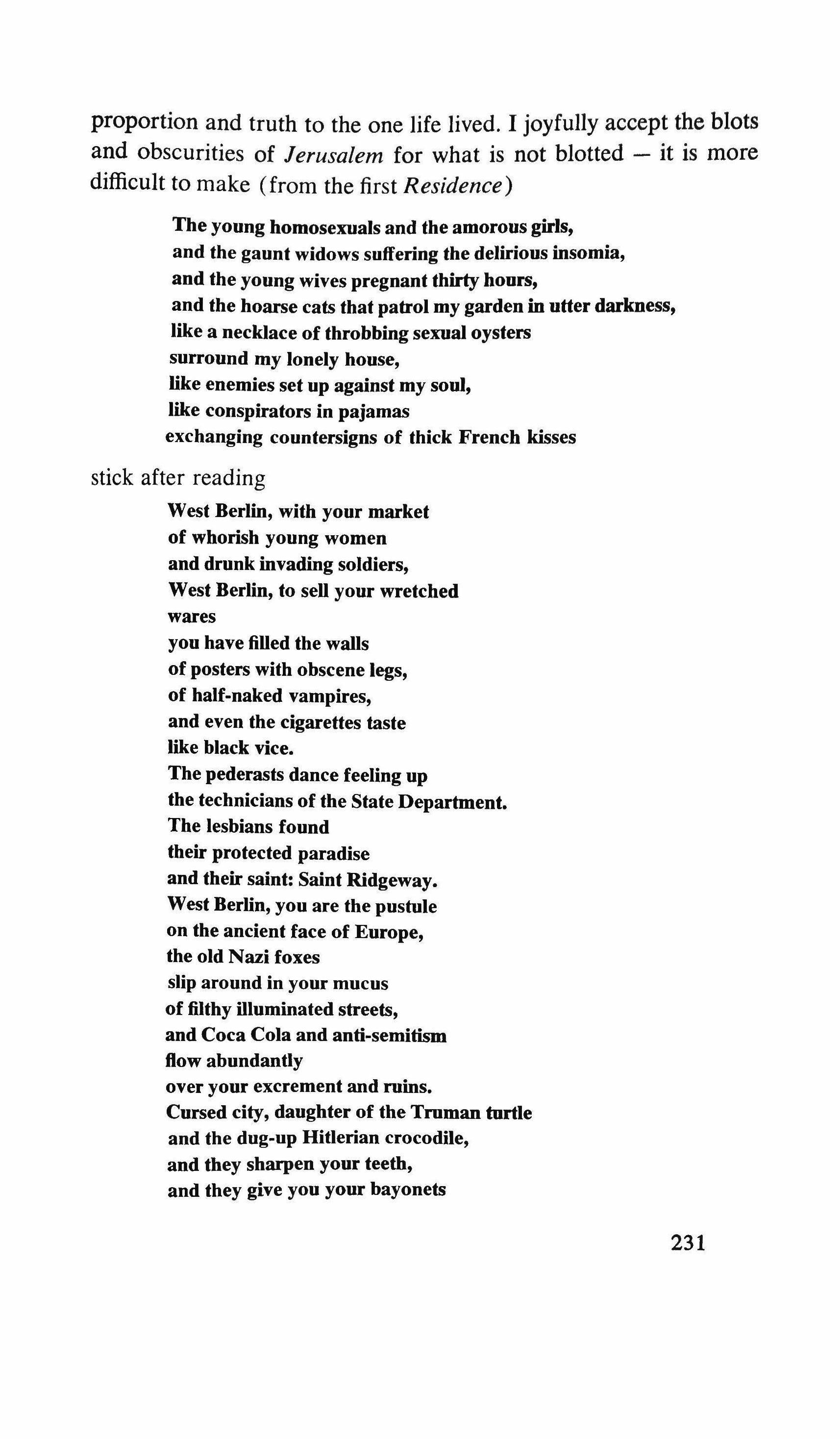
proportion and truth to the one life lived. I joyfully accept the blots and obscurities of Jerusalem for what is not blotted - it is more difficult to make (from the first Residence)
The young homosexuals and the amorous girls, and the gaunt widows suffering the delirious Insomia, and the young wives pregnant thirty hours, and the hoarse cats that patrol my garden in utter darkness, like a necklace of throbbing sexual oysters surround my lonely house, like enemies set up against my soul, like conspirators in pajamas exchanging countersigns of thick French kisses
stick after reading
West Berlin, with your market of whorish young women and drunk invading soldiers, West Berlin, to sell your wretched wares you have filled the walls of posters with obscene legs, of half-naked vampires, and even the cigarettes taste like black vice.
The pederasts dance feeling up the technicians of the State Department. The lesbians found their protected paradise and their saint: Saint Ridgeway. West Berlin, you are the pustule on the ancient face of Europe, the old Nazi foxes slip around in your mucus of filthy illuminated streets, and Coca Cola and anti-semitism flow abundantly over your excrement and mins. Cursed city, daughter of the Truman turtle and the dug-up Hitlerian crocodile, and they sharpen your teeth, and they give you your bayonets
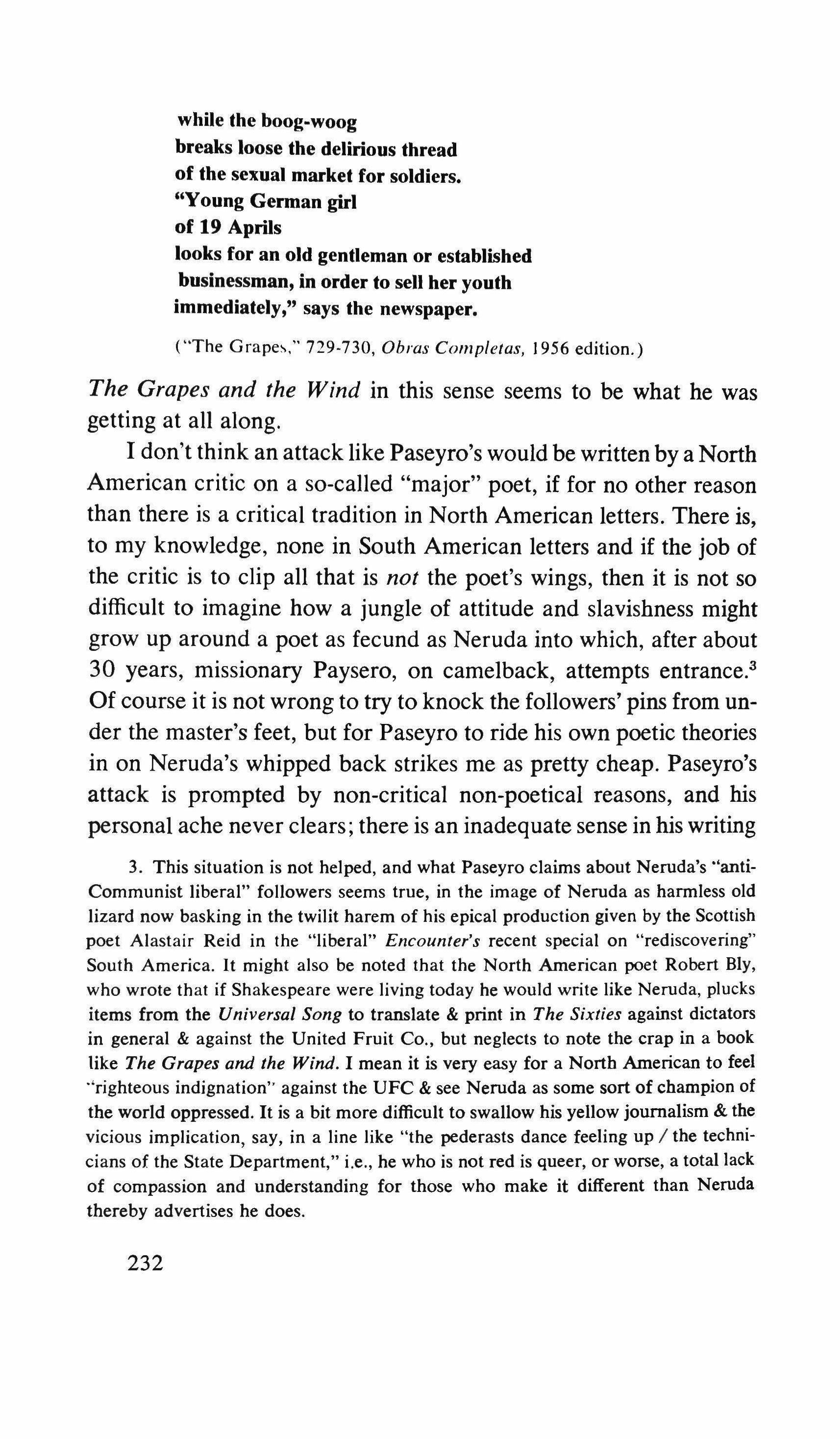
while the boog-woog breaks loose the delirious thread of the sexual market for soldiers. "Young German girl of 19 Aprils looks for an old gentleman or established businessman, in order to sell her youth immediately," says the newspaper.
("The Grapes." 729-730, Obras Completas, 1956 edition.)
The Grapes and the Wind in this sense seems to be what he was getting at all along.
I don't think an attack like Paseyro's would be written by a North American critic on a so-called "major" poet, if for no other reason than there is a critical tradition in North American letters. There is, to my knowledge, none in South American letters and if the job of the critic is to clip all that is not the poet's wings, then it is not so difficult to imagine how a jungle of attitude and slavishness might grow up around a poet as fecund as Neruda into which, after about 30 years, missionary Paysero, on camelback, attempts entrance," Of course it is not wrong to try to knock the followers' pins from under the master's feet, but for Paseyro to ride his own poetic theories in on Neruda's whipped back strikes me as pretty cheap. Paseyro's attack is prompted by non-critical non-poetical reasons, and his personal ache never clears; there is an inadequate sense in his writing
3. This situation is not helped, and what Paseyro claims about Neruda's "antiCommunist liberal" followers seems true, in the image of Neruda as harmless old lizard now basking in the twilit harem of his epical production given by the Scottish poet Alastair Reid in the "liberal" Encounter's recent special on "rediscovering" South America. It might also be noted that the North American poet Robert BIy, who wrote that if Shakespeare were living today he would write like Neruda, plucks items from the Universal Song to translate & print in The Sixties against dictators in general & against the United Fruit Co., but neglects to note the crap in a book like The Grapes and the Wind. I mean it is very easy for a North American to feel "righteous indignation" against the UFC & see Neruda as some sort of champion of the world oppressed. It is a bit more difficult to swallow his yellow journalism & the vicious implication, say, in a line like "the pederasts dance feeling up / the technicians of the State Department," i.e., he who is not red is queer, or worse, a total lack of compassion and understanding for those who make it different than Neruda thereby advertises he does. 232
of what materials poetry may use (all) that I feel most menacingly in having a kind of Victorian purist prudishness thrown up against the erotic and confessional. (I'm reminded here of the Buddhist tale in which some blindmen were trying to say what was an elephant, i.e., Buddha, one taking a leg and claiming the elephant was like a tree, etc. Paseyro appears to have gotten hold of Neruda's penis and cried "Rat!") I can't find in Lima a copy of Lines of the Captain but am rather for it from the snippets Paseyro quotes - it seems as if 50 year old Neruda is having a love affair and is attempting in the flattened style of the Odes to evoke it. Paseyro feigning stumbling in on an orgy is simply ridiculous (and besides, so what if he did?) and blocks any critical comment the poems might well deserve. I am disgusted to find Paseyro low enough to pull out Neruda's claws (commas) when quoting and ridiculing his prosody. Here are two passages Paseyro cites, but as they appear in the Obras Completas of 1956:
Here come the farmers, they bring for the poet a hen, only a poor hen. What are you going to give them, what are you going to give them?
Now, now, the thread, the thread
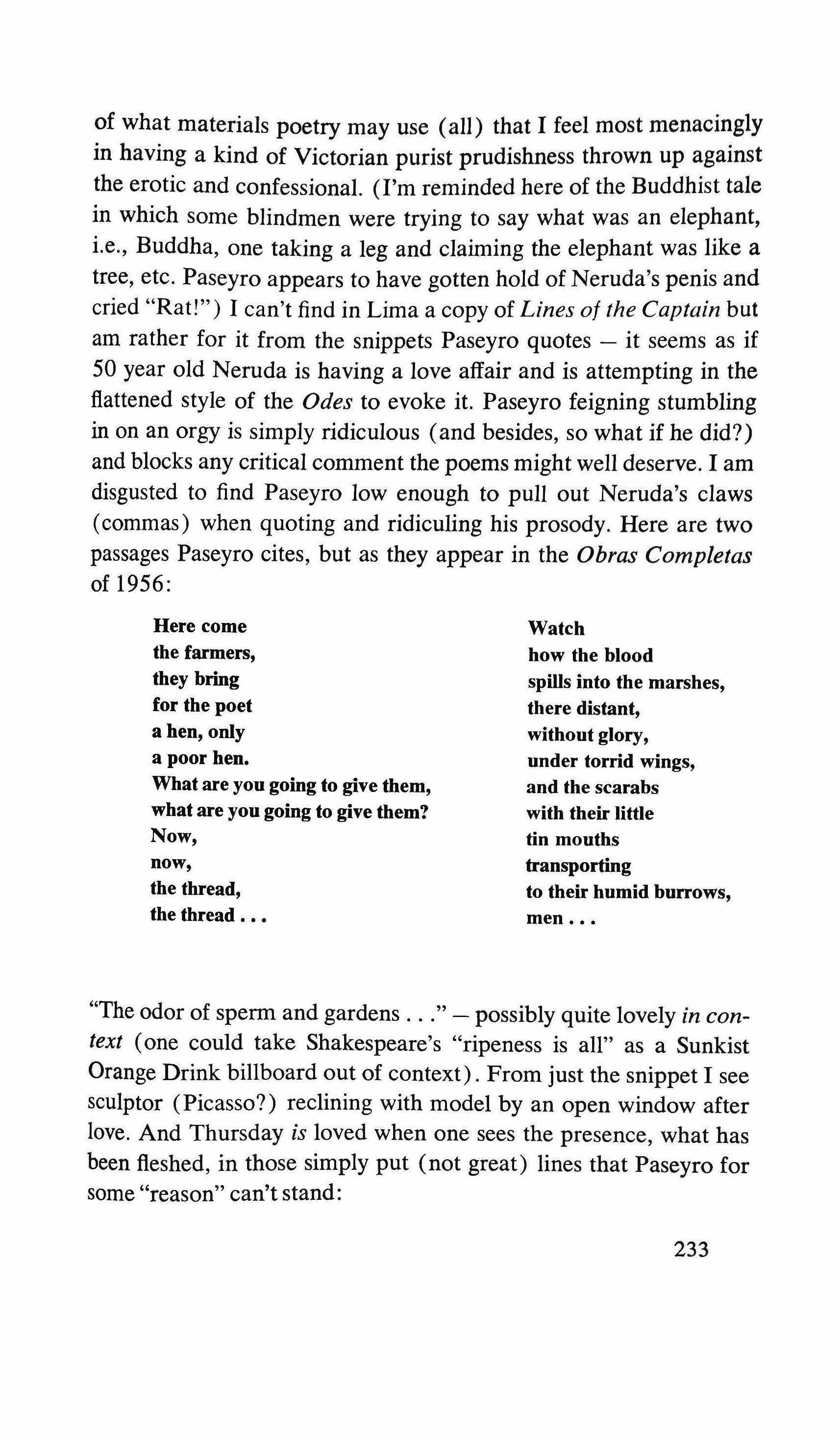
Watch how the blood spills into the marshes, there distant, without glory, under torrid wings, and the scarabs with their little tin mouths transporting to their humid burrows, men
"The odor of sperm and gardens - possibly quite lovely in context (one could take Shakespeare's "ripeness is all" as a Sunkist Orange Drink billboard out of context). From just the snippet I see sculptor (Picasso?) reclining with model by an open window after love. And Thursday is loved when one sees the presence, what has been fleshed, in those simply put (not great) lines that Paseyro for some "reason" can't stand:
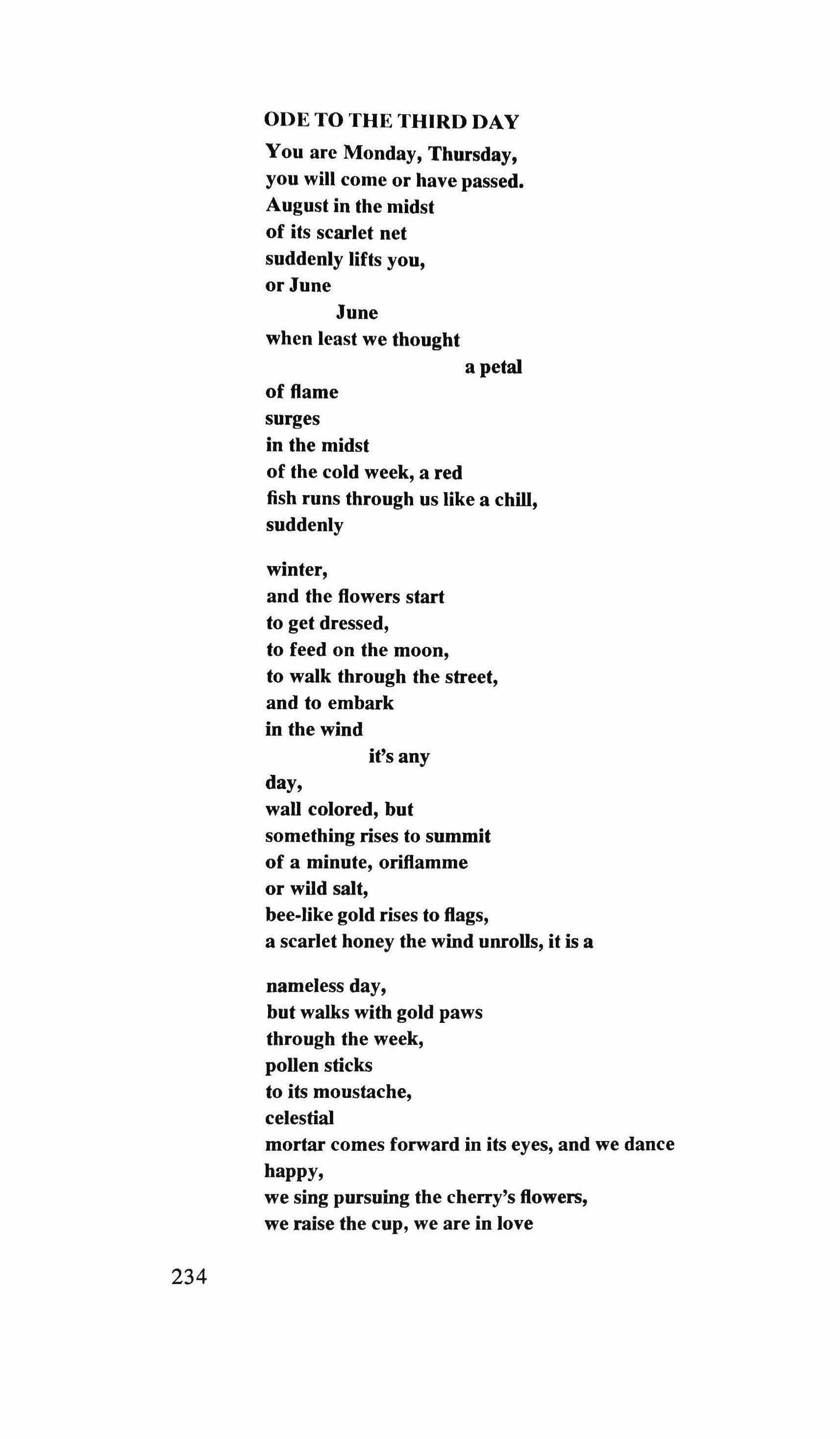
You are Monday, Thursday, you will come or have passed. August in the midst of its scarlet net suddenly lifts you, or June
June
when least we thought a petal of flame surges in the midst of the cold week, a red fish runs through us like a chill, suddenly winter, and the flowers start to get dressed, to feed on the moon, to walk through the street, and to embark in the wind
it's any day, wall colored, but something rises to summit of a minute, oriflamme or wild salt, bee-like gold rises to flags, a scarlet honey the wind unrolls, it is a nameless day, but walks with gold paws through the week, pollen sticks to its moustache, celestial mortar comes forward in its eyes, and we dance happy, we sing pursuing the cherry's flowers, we raise the cup, we are in love
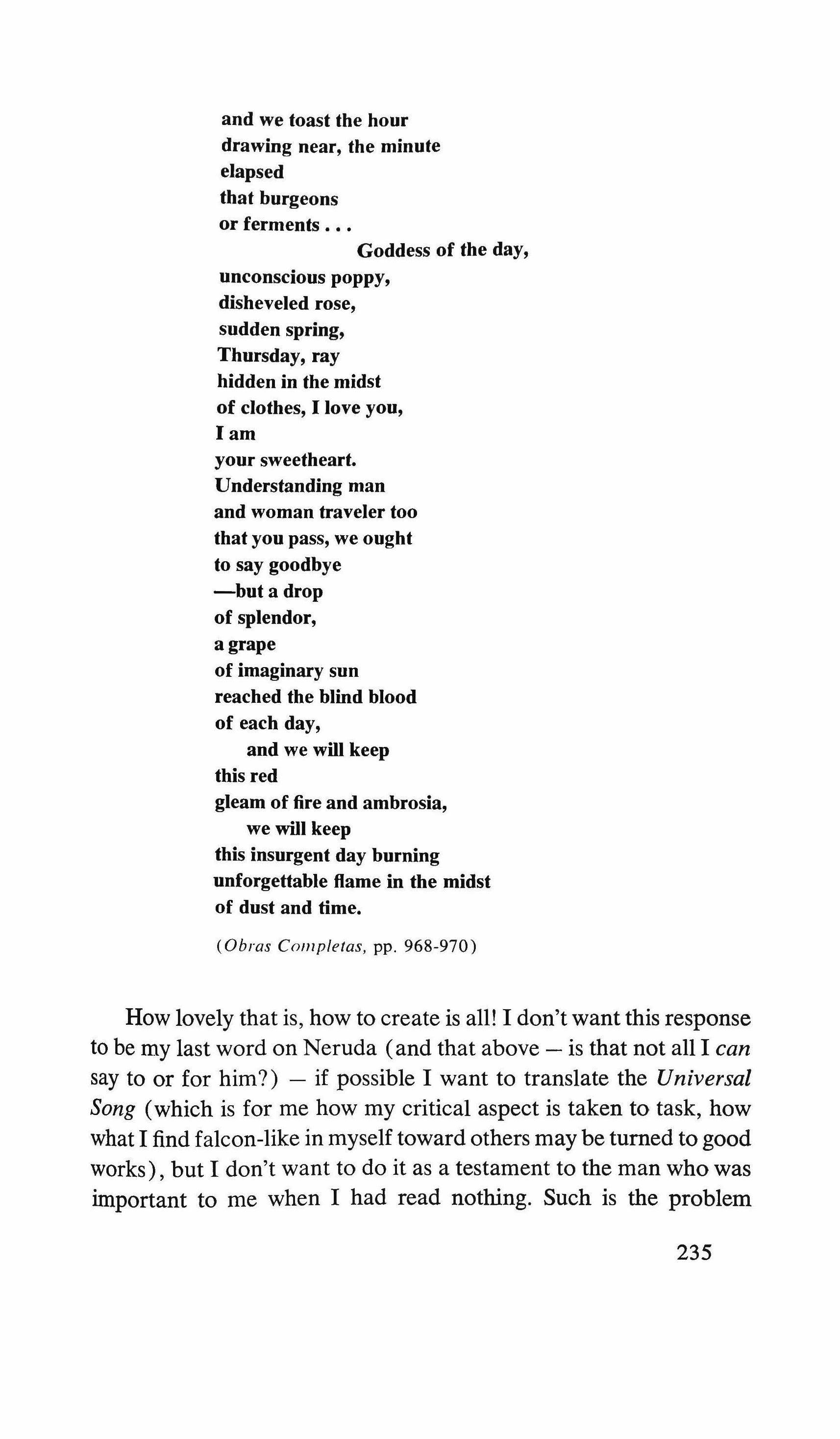
and we toast the hour drawing near, the minute elapsed that burgeons or ferments
Goddess of the day, unconscious poppy, disheveled rose, sudden spring, Thursday, ray hidden in the midst of clothes, I love you, lam your sweetheart. Understanding man and woman traveler too that you pass, we ought to say goodbye -but a drop of splendor, a grape of imaginary sun reached the blind blood of each day, and we will keep this red gleam of fire and ambrosia, we will keep this insurgent day burning unforgettable flame in the midst of dust and time.
tObras Completas, pp, 968-970)
How lovely that is, how to create is all! I don't want this response to be my last word on Neruda (and that above - is that not all I can say to or for him?) - if possible I want to translate the Universal Song (which is for me how my critical aspect is taken to task, how what I find falcon-like in myself toward others may be turned to good works), but I don't want to do it as a testament to the man who was important to me when I had read nothing. Such is the problem
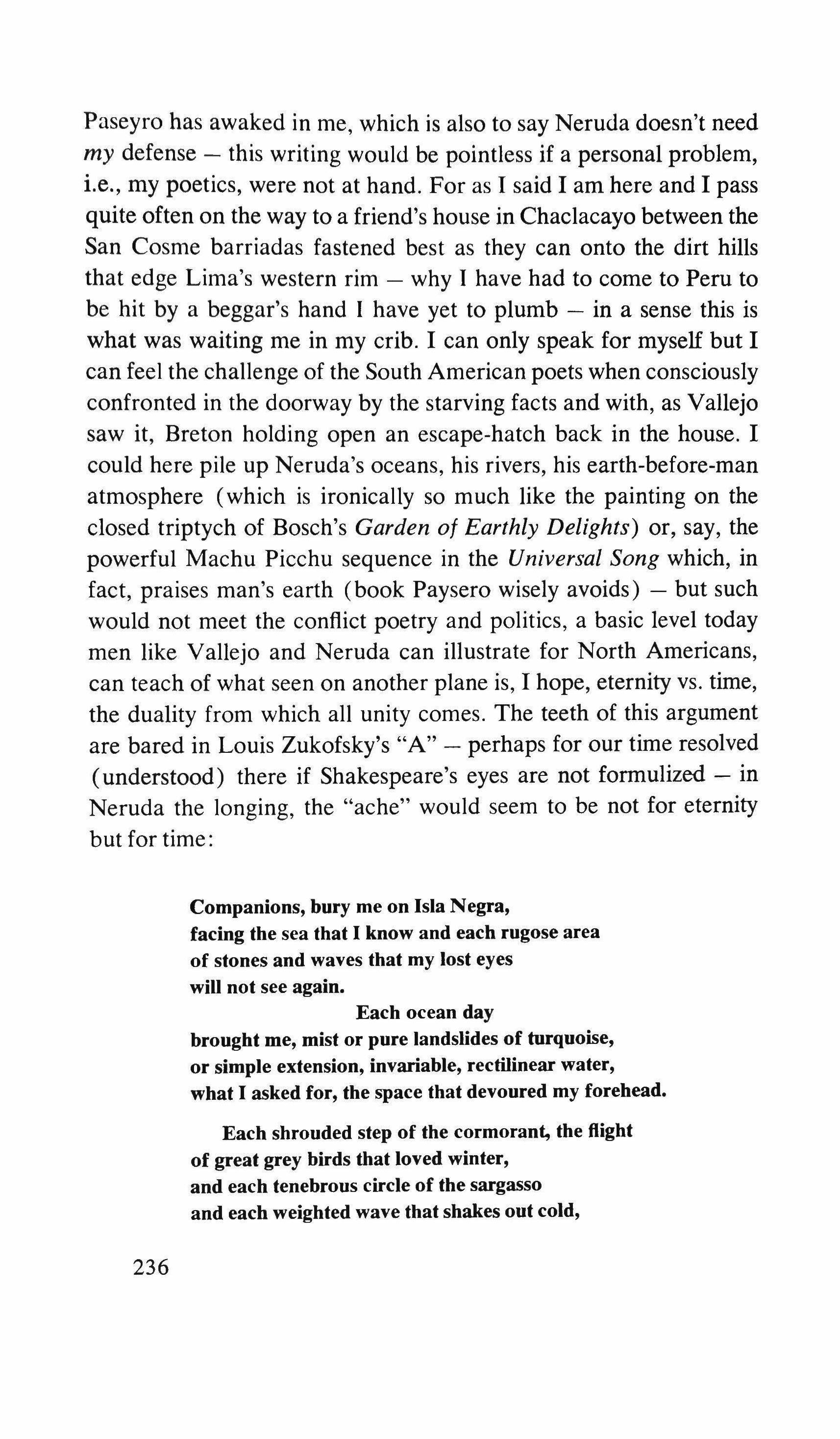
Paseyro has awaked in me, which is also to say Neruda doesn't need my defense - this writing would be pointless if a personal problem, i.e., my poetics, were not at hand. For as I said I am here and I pass quite often on the way to a friend's house in Chac1acayo between the San Cosme barriadas fastened best as they can onto the dirt hills that edge Lima's western rim - why I have had to come to Peru to be hit by a beggar's hand I have yet to plumb - in a sense this is what was waiting me in my crib. I can only speak for myself but I can feel the challenge of the South American poets when consciously confronted in the doorway by the starving facts and with, as Vallejo saw it, Breton holding open an escape-hatch back in the house. I could here pile up Neruda's oceans, his rivers, his earth-before-man atmosphere (which is ironically so much like the painting on the closed triptych of Bosch's Garden of Earthly Delights) or, say, the powerful Machu Picchu sequence in the Universal Song which, in fact, praises man's earth (book Paysero wisely avoids) - but such would not meet the conflict poetry and politics, a basic level today men like Vallejo and Neruda can illustrate for North Americans, can teach of what seen on another plane is, I hope, eternity vs. time, the duality from which all unity comes. The teeth of this argument are bared in Louis Zukofsky's "A" - perhaps for our time resolved (understood) there if Shakespeare's eyes are not formulized - in Neruda the longing, the "ache" would seem to be not for eternity but for time:
Companions, bury me on Isla Negra, facing the sea that I know and each rugose area of stones and waves that my lost eyes will not see again.
Each ocean day brought me, mist or pure landslides of turquoise, or simple extension, invariable, rectilinear water, what I asked for, the space that devoured my forehead.
Each shrouded step of the cormorant, the flight of great grey birds that loved winter, and each tenebrous circle of the sargasso and each weighted wave that shakes out cold,
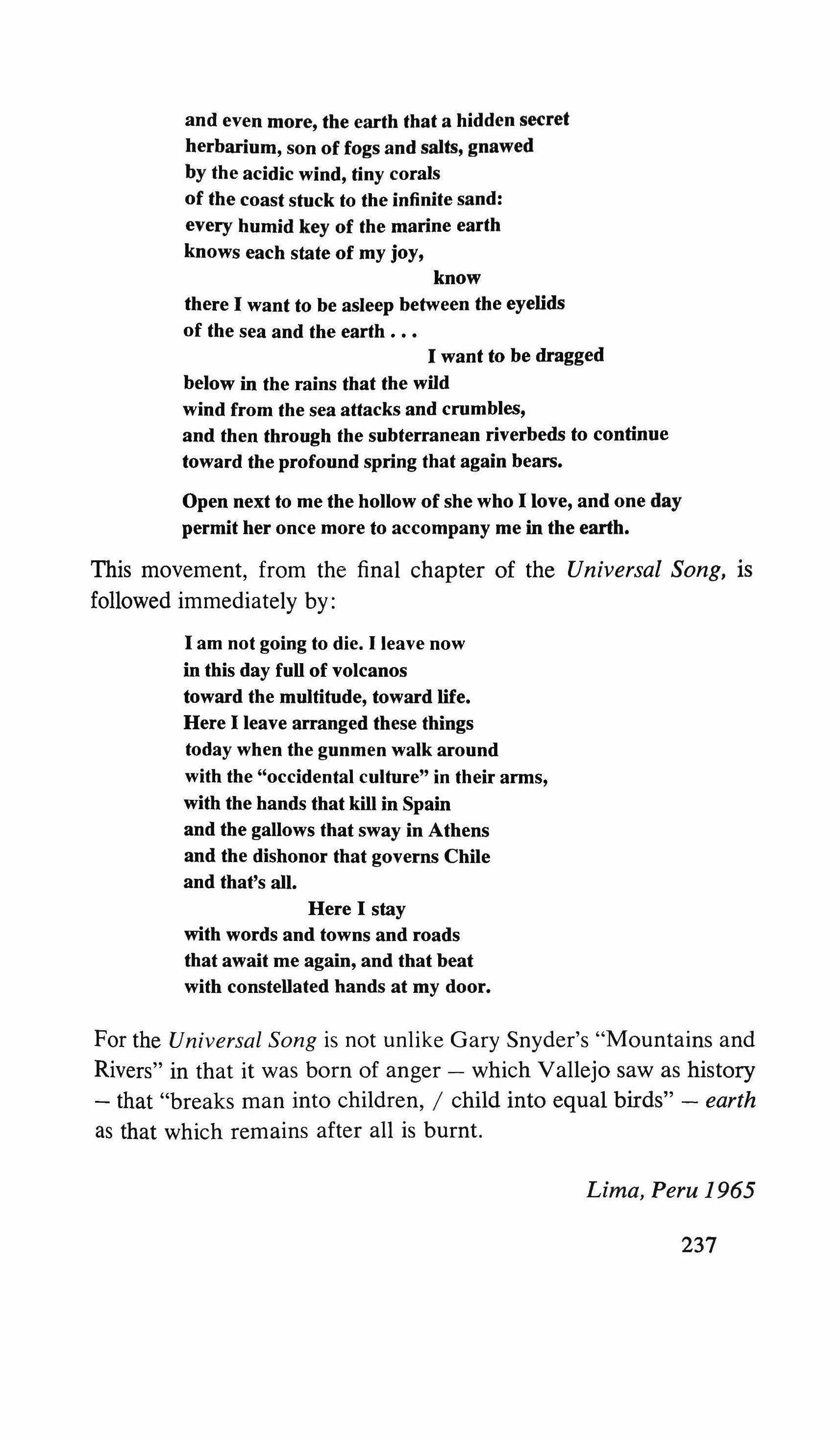
and even more, the earth that a hidden secret herbarium, son of fogs and salts, gnawed by the acidic wind, tiny corals of the coast stuck to the infinite sand: every humid key of the marine earth knows each state of my joy, know
there I want to be asleep between the eyelids of the sea and the earth
I want to be dragged below in the rains that the wild wind from the sea attacks and crumbles, and then through the subterranean riverbeds to continue toward the profound spring that again bears.
Open next to me the hollow of she who I love, and one day permit her once more to accompany me in the earth.
This movement, from the final chapter of the Universal Song, is followed immediately by:
I am not going to die. I leave now in this day full of volcanos toward the multitude, toward life. Here I leave arranged these things today when the gunmen walk around with the "occidental culture" in their arms, with the hands that kill in Spain and the gallows that sway in Athens and the dishonor that governs Chile and that's all.
Here I stay with words and towns and roads that await me again, and that beat with constellated hands at my door.
For the Universal Song is not unlike Gary Snyder's "Mountains and Rivers" in that it was born of anger - which Vallejo saw as history - that "breaks man into children, / child into equal birds" - earth as that which remains after all is burnt.
Lima, Peru 1965 237
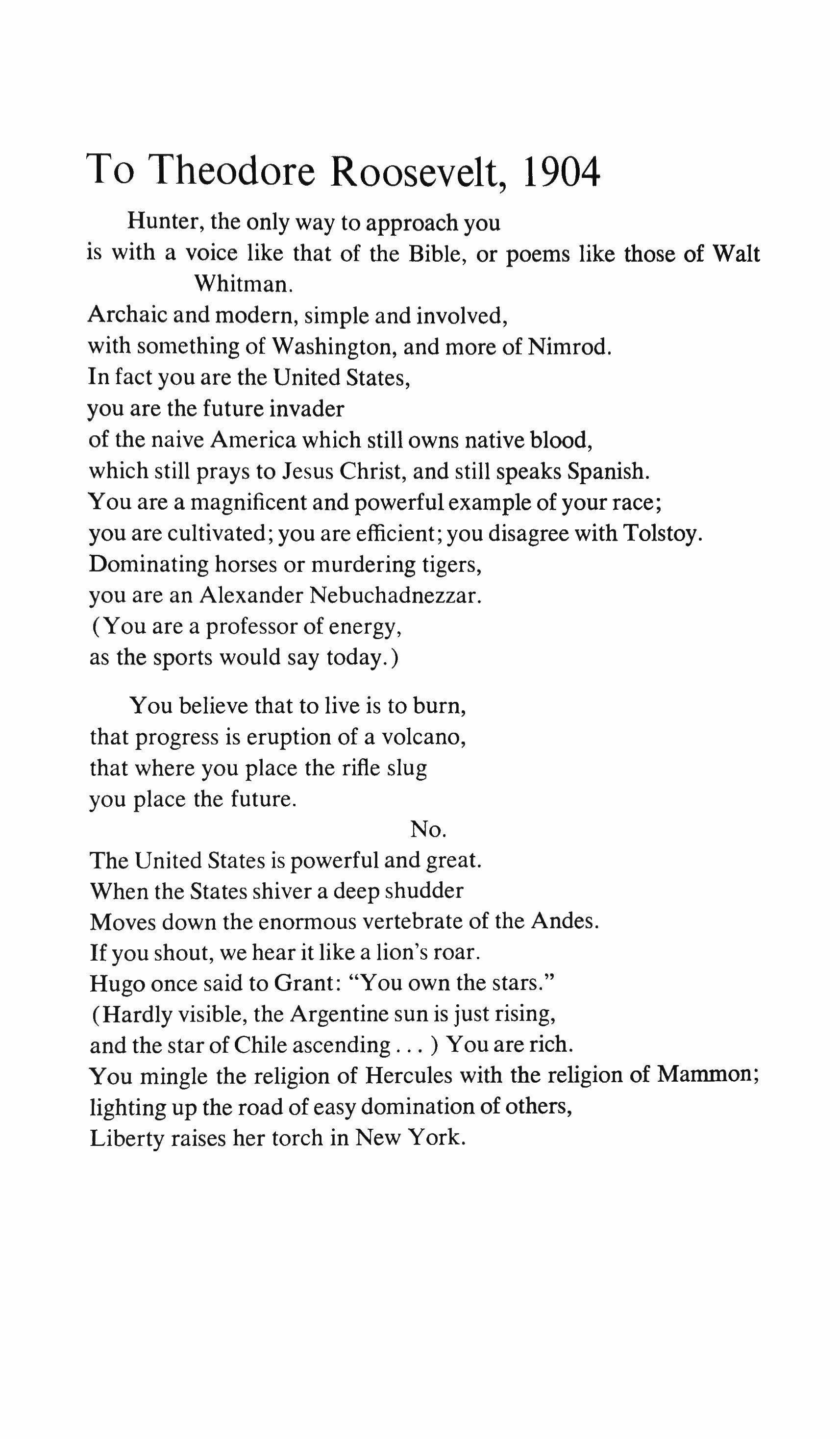
Hunter, the only way to approach you is with a voice like that of the Bible, or poems like those of Walt Whitman.
Archaic and modern, simple and involved, with something of Washington, and more of Nimrod. In fact you are the United States, you are the future invader of the naive America which still owns native blood, which still prays to Jesus Christ, and still speaks Spanish. You are a magnificent and powerful example of your race; you are cultivated; you are efficient; you disagree with Tolstoy. Dominating horses or murdering tigers, you are an Alexander Nebuchadnezzar.
(You are a professor of energy, as the sports would say today.)
You believe that to live is to burn, that progress is eruption of a volcano, that where you place the rifle slug you place the future. No.
The United States is powerful and great. When the States shiver a deep shudder Moves down the enormous vertebrate of the Andes. If you shout, we hear it like a lion's roar.
Hugo once said to Grant: "You own the stars." (Hardly visible, the Argentine sun is just rising, and the star of Chile ascending ) You are rich. You mingle the religion of Hercules with the religion of Mammon; lighting up the road of easy domination of others, Liberty raises her torch in New York.
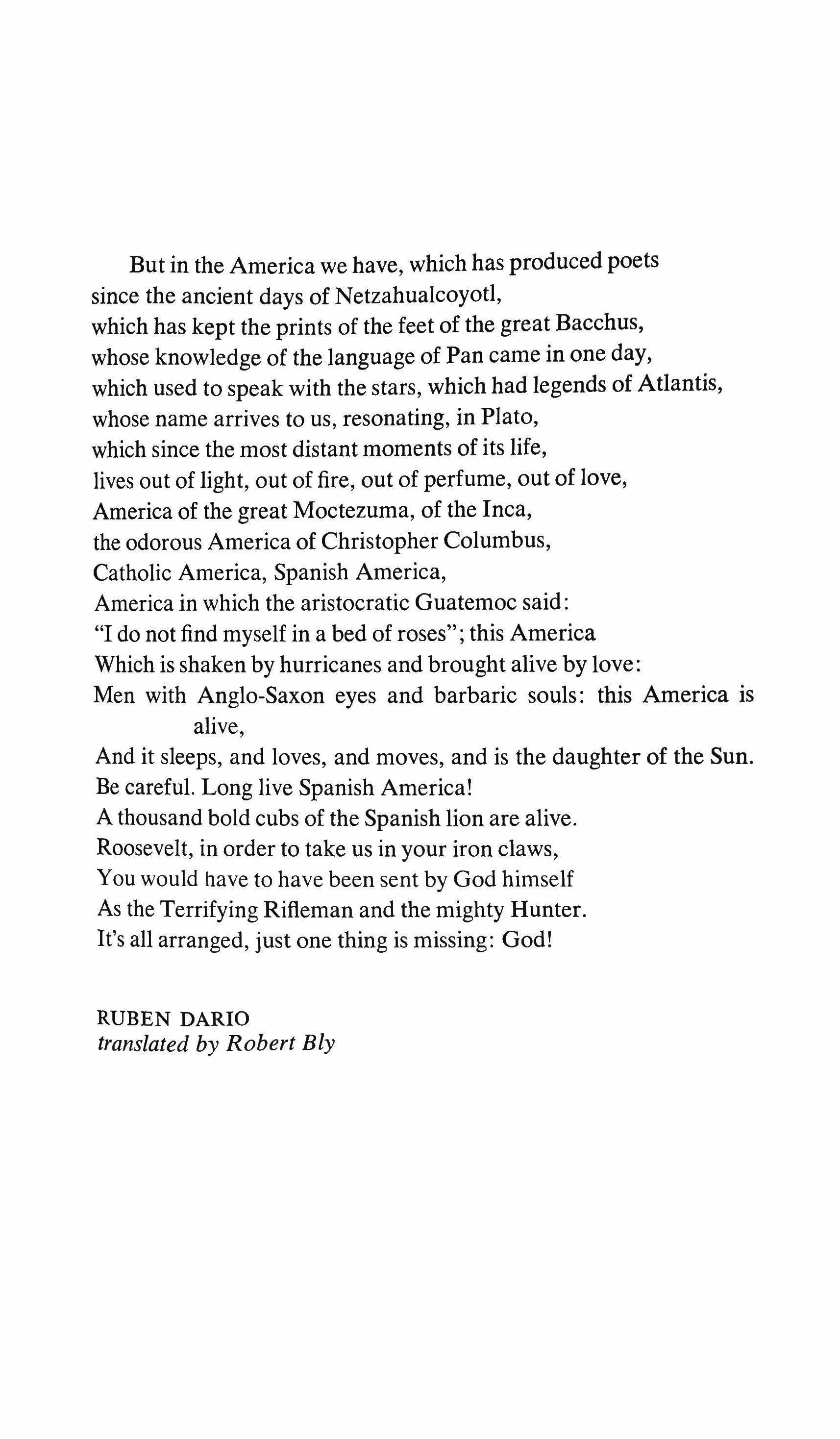
But in the America we have, which has produced poets since the ancient days of Netzahualcoyotl, which has kept the prints of the feet of the great Bacchus, whose knowledge of the language of Pan came in one day, which used to speak with the stars, which had legends of Atlantis, whose name arrives to us, resonating, in Plato, which since the most distant moments of its life, lives out of light, out of fire, out of perfume, out of love, America of the great Moctezuma, of the Inca, the odorous America of Christopher Columbus, Catholic America, Spanish America, America in which the aristocratic Guatemoc said: "I do not find myself in a bed of roses"; this America Which is shaken by hurricanes and brought alive by love: Men with Anglo-Saxon eyes and barbaric souls: this America is alive,
And it sleeps, and loves, and moves, and is the daughter of the Sun. Be careful. Long live Spanish America! A thousand bold cubs of the Spanish lion are alive. Roosevelt, in order to take us in your iron claws, You would have to have been sent by God himself As the Terrifying Rifleman and the mighty Hunter. It's all arranged, just one thing is missing: God!
RUBEN DARIO
translated by Robert Bly
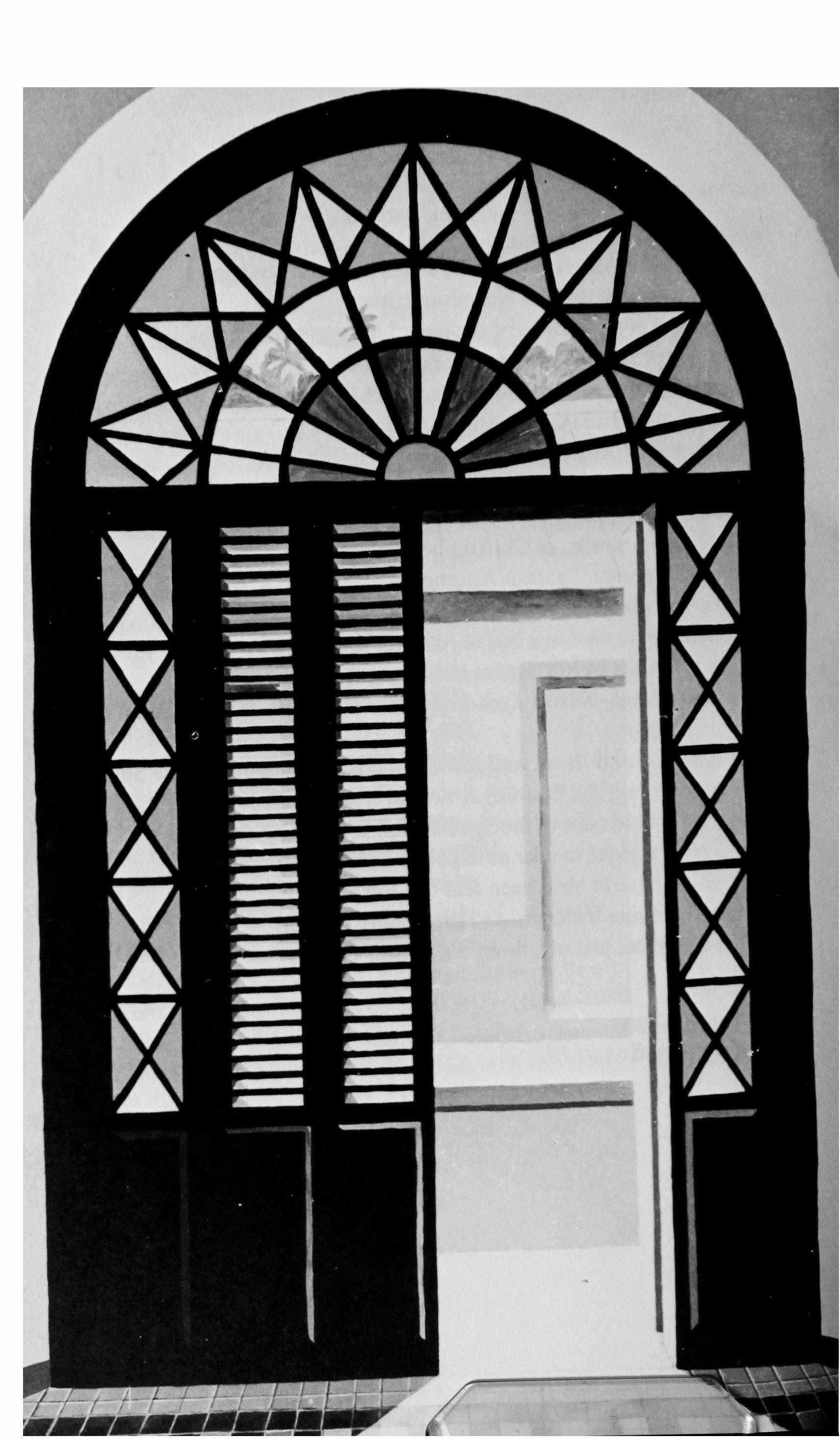
Now and forever in my face
I bear the matchless word, the only word that will open the untiring doors of life, the inexhaustible doors of death. The only word in my face I bear eternally, my face which is nigh to noontime, which is susceptible facing the eternal sun, which is the musical score of weeping in the presence of death. The word alone untiringly holds back my face. The matchless word that is capable of opening the doors of life, that can open the doors of death.
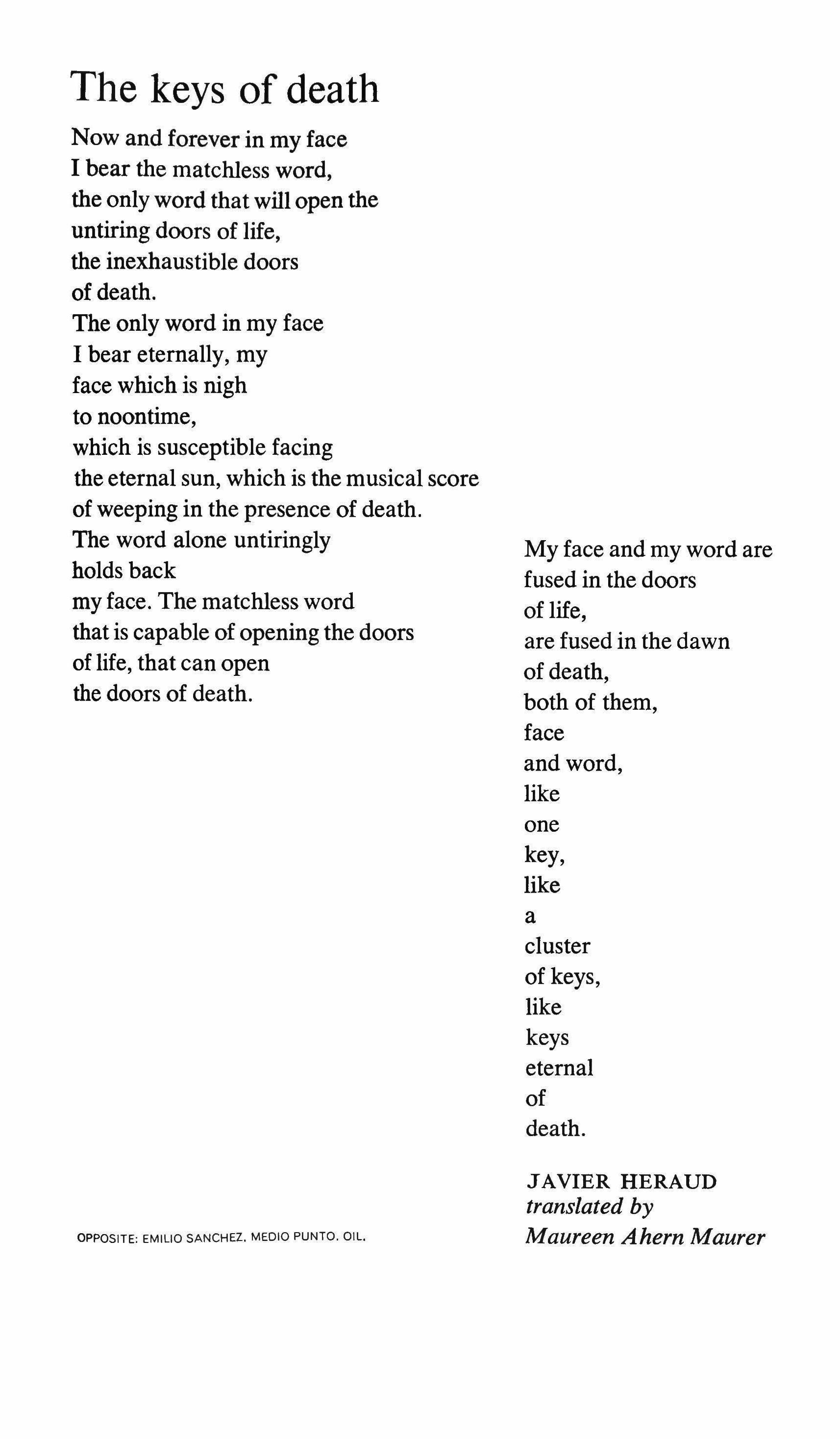
OPPOSITE: EMILIO SANCHEZ. MEOla PUNTa. OIL.
My face and my word are fused in the doors of life, are fused in the dawn of death, both of them, face and word, like one key, like a cluster of keys, like keys eternal of death.
JAVIER HERAUD translated by Maureen Ahern Maurer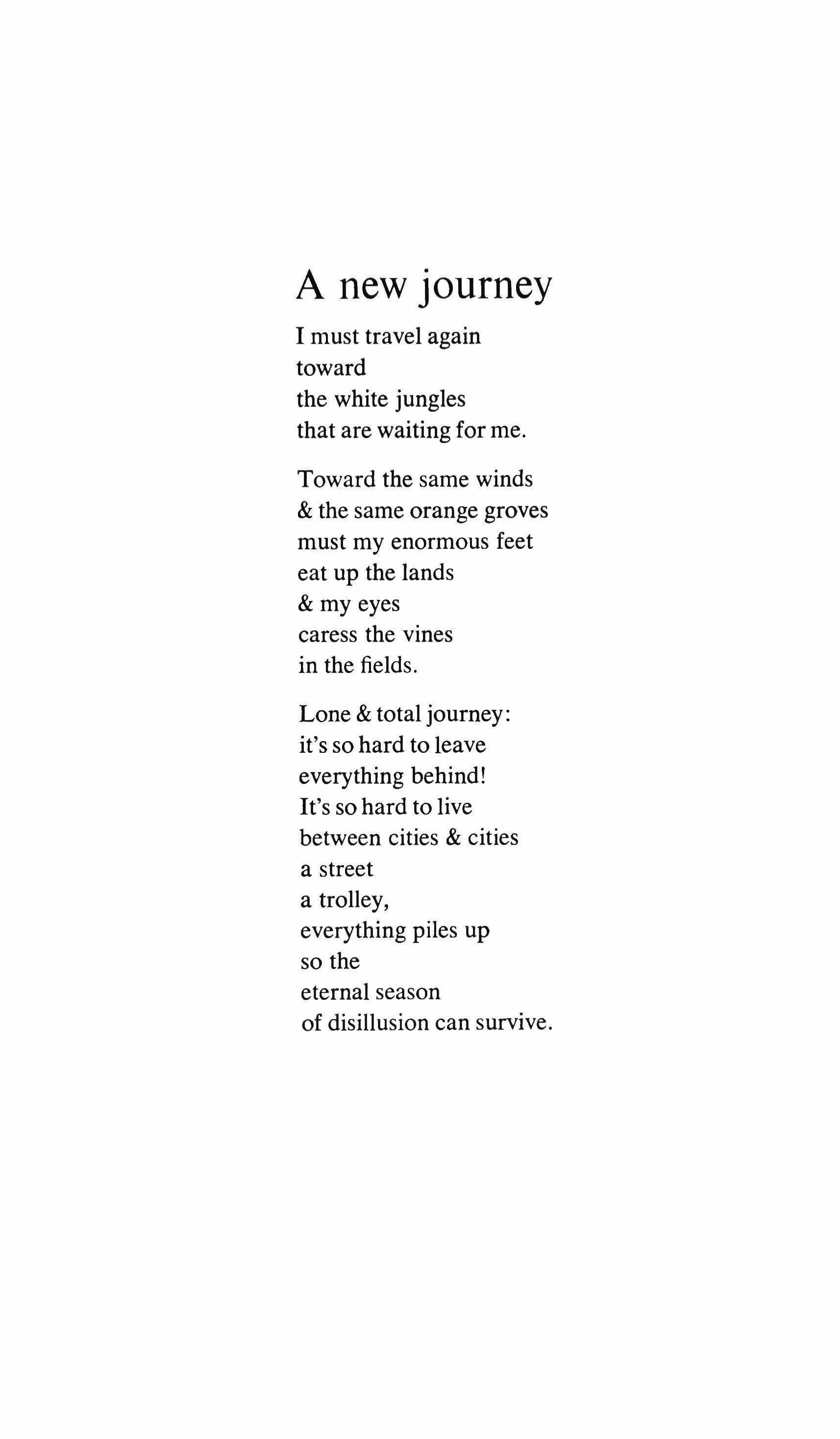
A new journey
I must travel again toward the white jungles that are waiting for me.
Toward the same winds & the same orange groves must my enormous feet eat up the lands & my eyes caress the vines in the fields.
Lone & total journey: it's so hard to leave everything behind! It's so hard to live between cities & cities a street a trolley, everything piles up so the eternal season of disillusion can survive.
2
You can't stroll through the sands if there are oppressor snails & submarine spiders.
And yet, walking a little, turning to the left, you get to the jungles & the rivers.
It's not that I want to get away from life, it's just that I have to get closer to death.
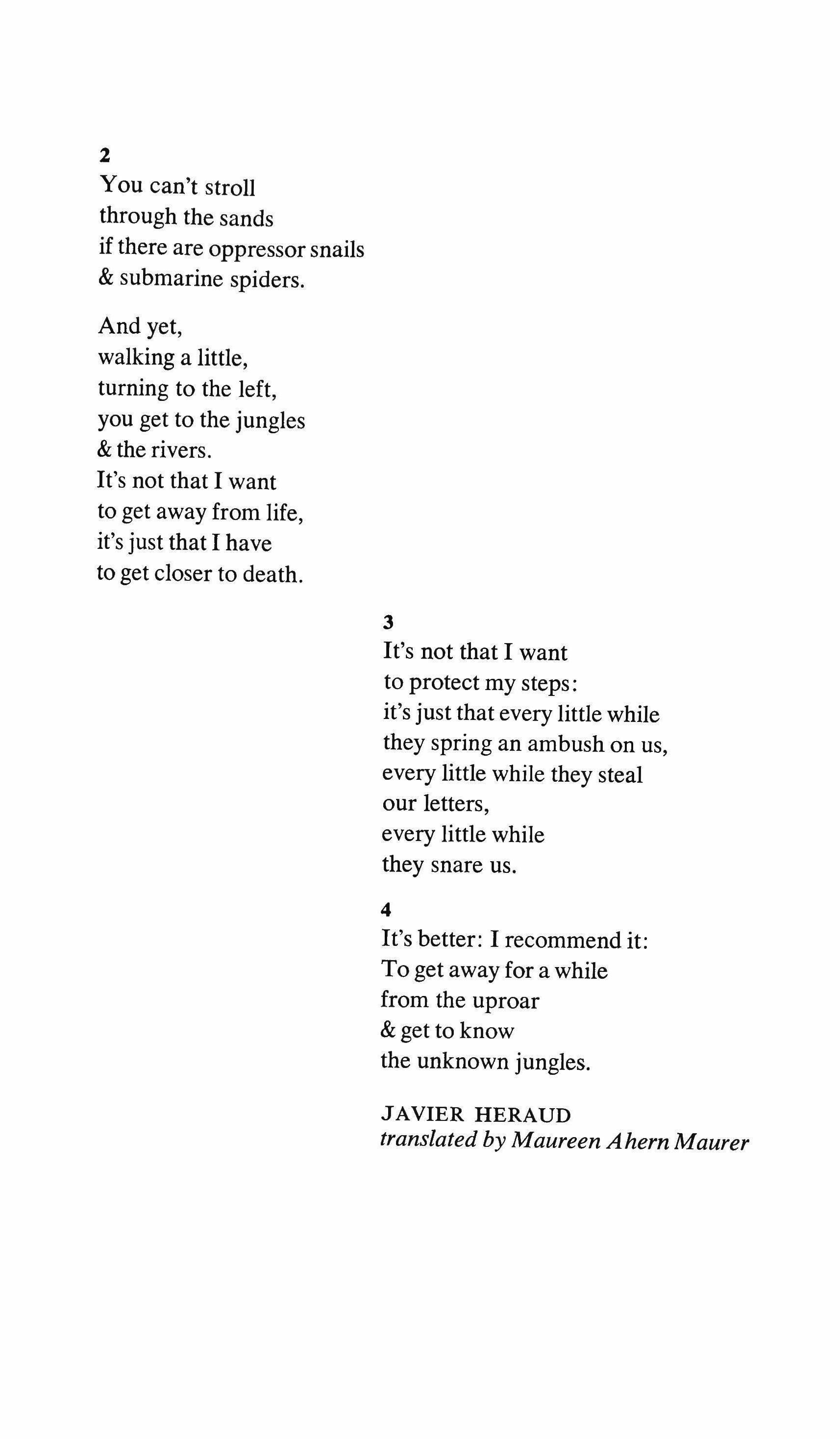
3
It's not that I want to protect my steps: it's just that every little while they spring an ambush on us, every little while they steal our letters, every little while they snare us.
4
It's better: I recommend it: To get away for a while from the uproar & get to know the unknown jungles.
JAVIER HERAUD translated by Maureen Ahern MaurerDrumrolled gusts of love shake my heart and eyes. (It's the light of life and days. It's the penalty of death and night.)
I reap and sow the seeds of love: a way between nights darkened by wme, I question the earth and the hills,
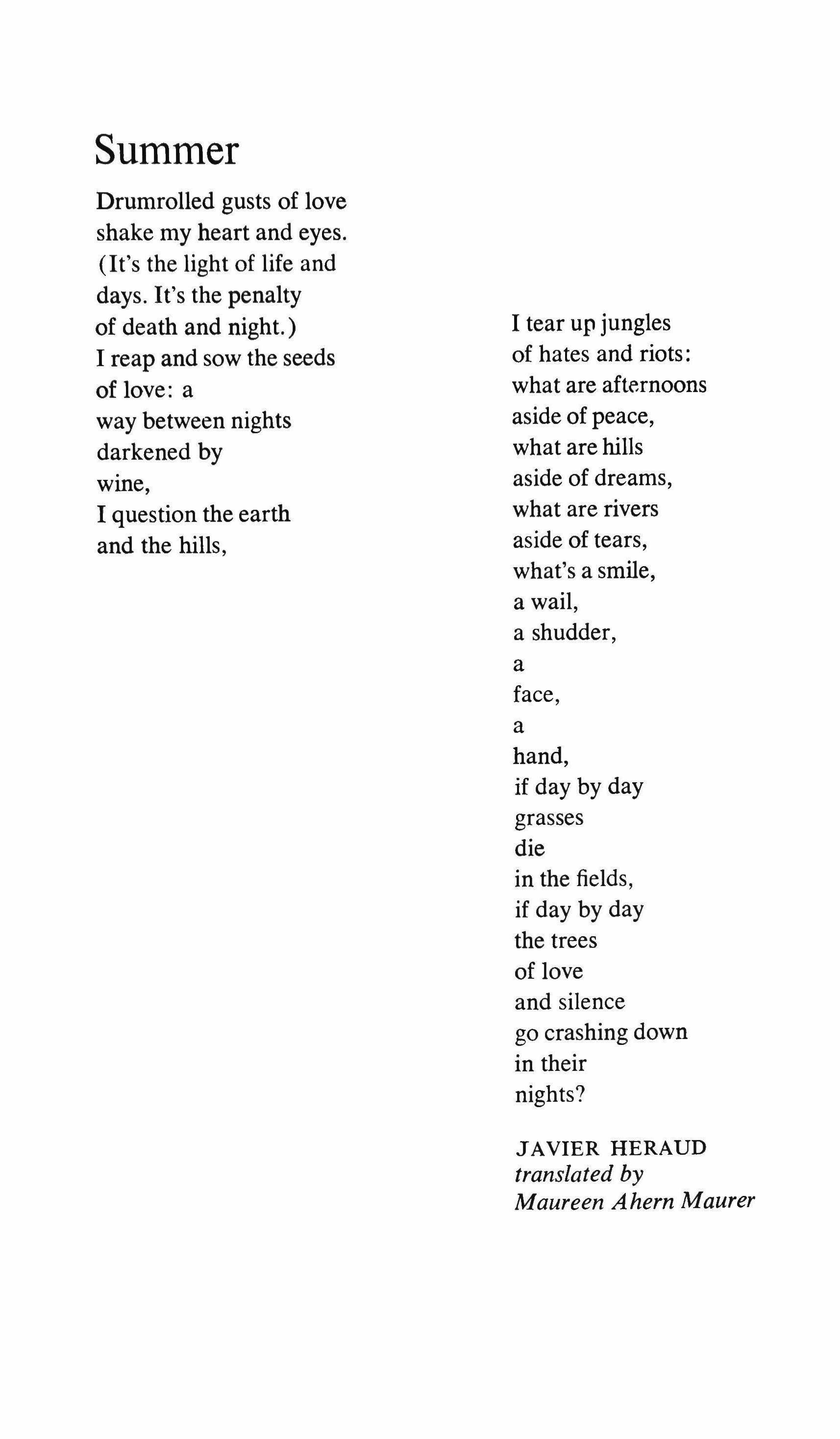
I tear up jungles of hates and riots: what are afternoons aside of peace, what are hills aside of dreams, what are rivers aside of tears, what's a smile, a wail, a shudder, a face, a hand, if day by day grasses die in the fields, if day by day the trees of love and silence go crashing down in their nights?
JAVIER HERAUD translated by Maureen Ahern Maurer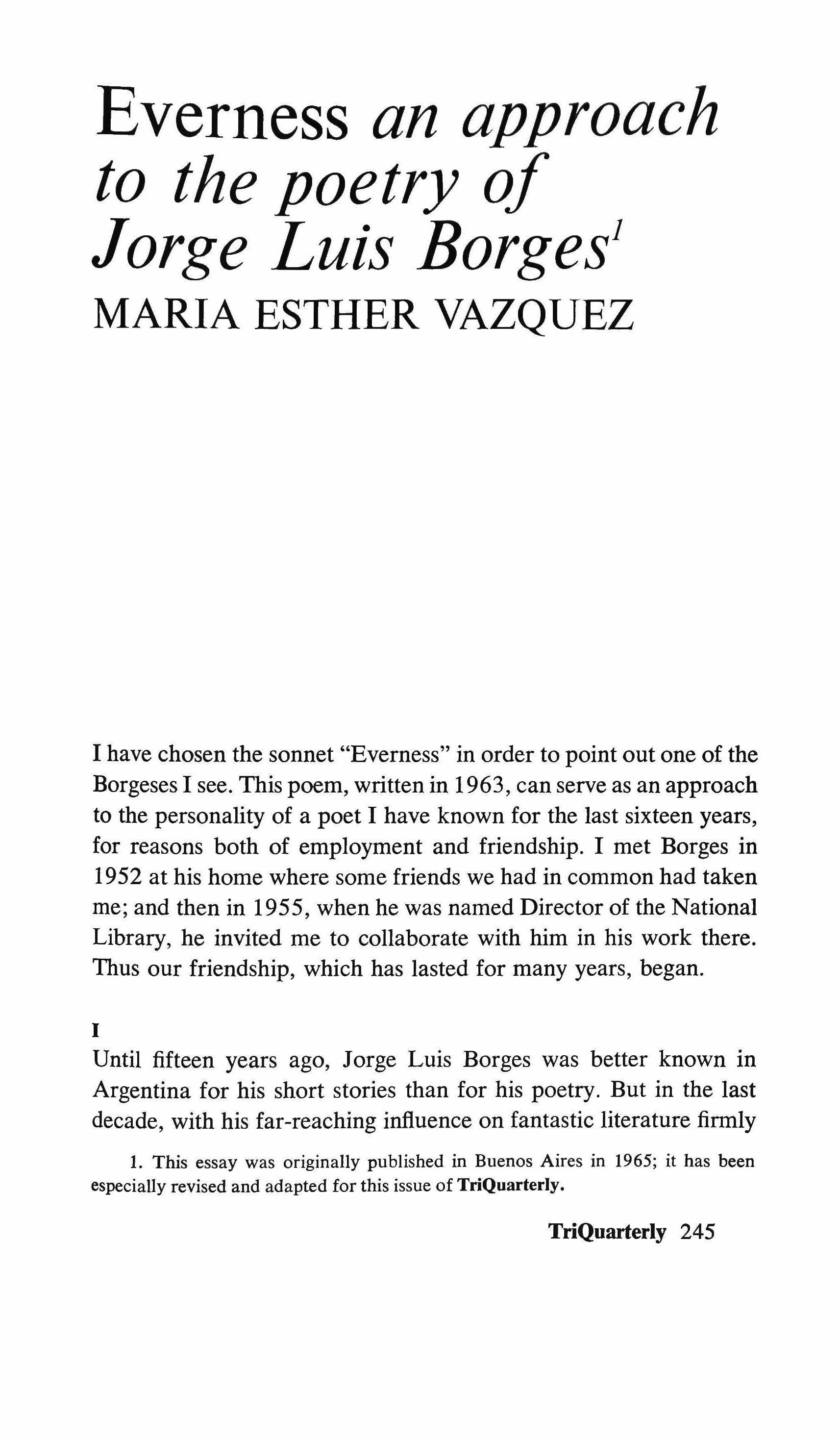
I have chosen the sonnet "Everness" in order to point out one of the Borgeses I see. This poem, written in 1963, can serve as an approach to the personality of a poet I have known for the last sixteen years, for reasons both of employment and friendship. I met Borges in 1952 at his home where some friends we had in common had taken me; and then in 1955, when he was named Director of the National Library, he invited me to collaborate with him in his work there. Thus our friendship, which has lasted for many years, began.
I
Until fifteen years ago, Jorge Luis Borges was better known in Argentina for his short stories than for his poetry. But in the last decade, with his far-reaching influence on fantastic literature firmly
1. This essay was originally published in Buenos Aires in 1965; it has been especially revised and adapted for this issue of TriQuarterly.
TriQuarterly 245
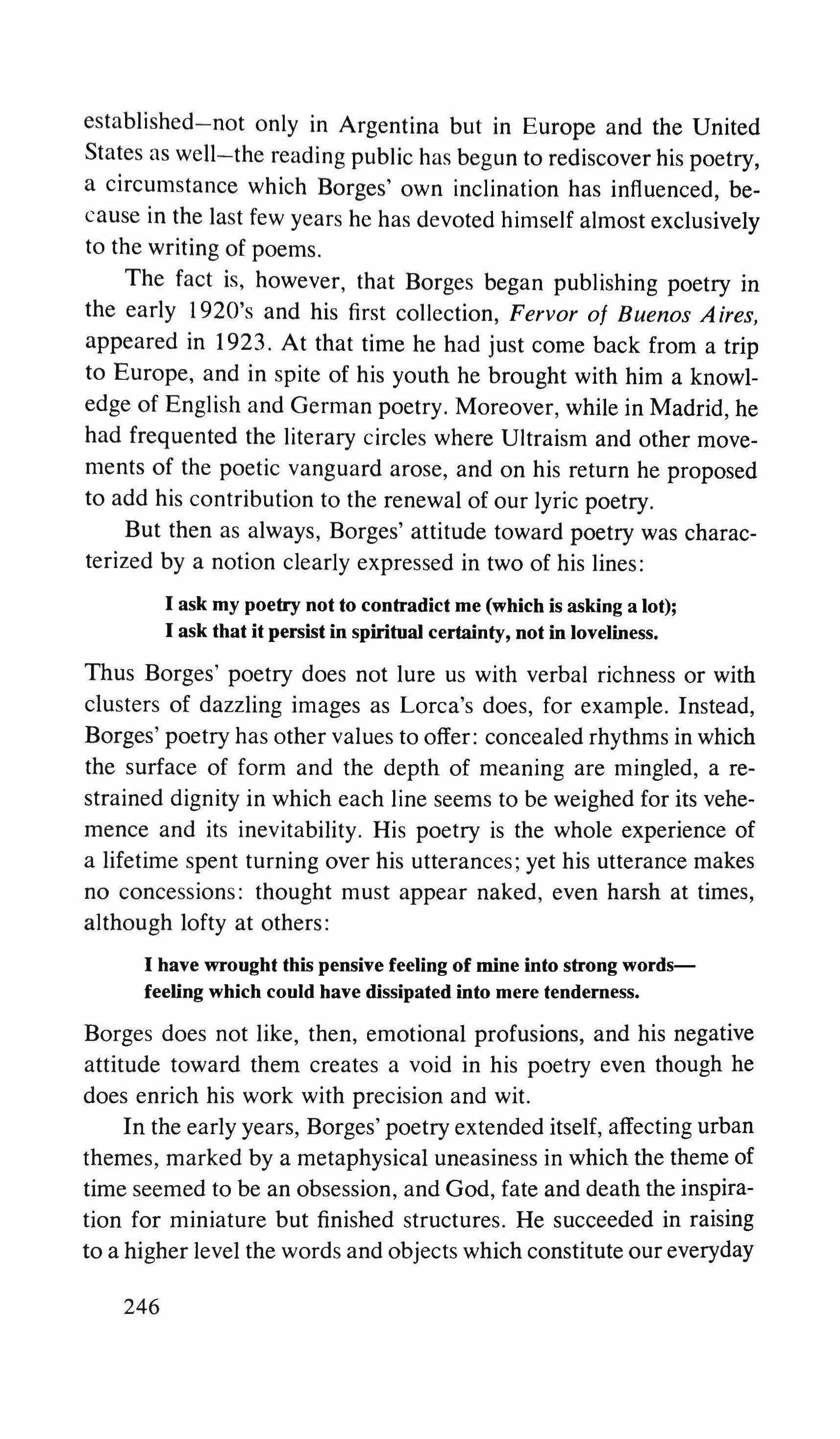
established-not only in Argentina but in Europe and the United States as well-the reading public has begun to rediscover his poetry, a circumstance which Borges' own inclination has influenced, because in the last few years he has devoted himself almost exclusively to the writing of poems.
The fact is, however, that Borges began publishing poetry in the early 1920's and his first collection, Fervor of Buenos Aires, appeared in 1923. At that time he had just come back from a trip to Europe, and in spite of his youth he brought with him a knowledge of English and German poetry. Moreover, while in Madrid, he had frequented the literary circles where Ultraism and other movements of the poetic vanguard arose, and on his return he proposed to add his contribution to the renewal of our lyric poetry.
But then as always, Borges' attitude toward poetry was characterized by a notion clearly expressed in two of his lines:
I ask my poetry not to contradict me (which is asking a lot); I ask that it persist in spiritual certainty, not in loveliness.
Thus Borges' poetry does not lure us with verbal richness or with clusters of dazzling images as Lorca's does, for example. Instead, Borges' poetry has other values to offer: concealed rhythms in which the surface of form and the depth of meaning are mingled, a restrained dignity in which each line seems to be weighed for its vehemence and its inevitability. His poetry is the whole experience of a lifetime spent turning over his utterances; yet his utterance makes no concessions: thought must appear naked, even harsh at times, although lofty at others:
I have wrought this pensive feeling of mine into strong wordsfeeling which could have dissipated into mere tenderness.
Borges does not like, then, emotional profusions, and his negative attitude toward them creates a void in his poetry even though he does enrich his work with precision and wit.
In the early years, Borges' poetry extended itself, affecting urban themes, marked by a metaphysical uneasiness in which the theme of time seemed to be an obsession, and God, fate and death the inspiration for miniature but finished structures. He succeeded in raising to a higher level the words and objects which constitute our everyday
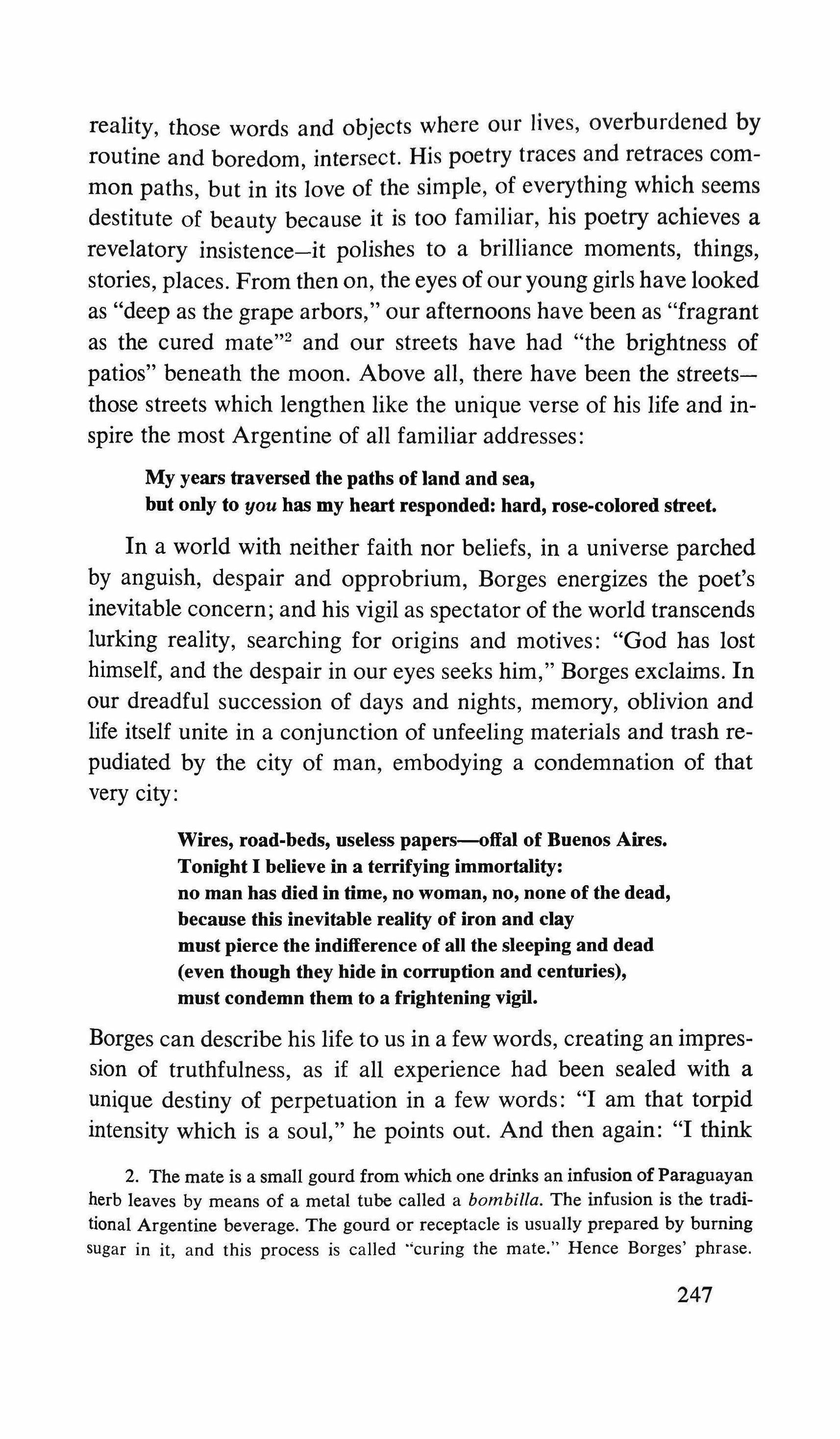
reality, those words and objects where our lives, overburdened by routine and boredom, intersect. His poetry traces and retraces common paths, but in its love of the simple, of everything which seems destitute of beauty because it is too familiar, his poetry achieves a revelatory insistence-it polishes to a brilliance moments, things, stories, places. From then on, the eyes of our young girls have looked as "deep as the grape arbors," our afternoons have been as "fragrant as the cured mate'? and our streets have had "the brightness of patios" beneath the moon. Above all, there have been the streetsthose streets which lengthen like the unique verse of his life and inspire the most Argentine of all familiar addresses:
My years traversed the paths of land and sea, but ouly to you has my heart responded: hard, rose-colored street.
In a world with neither faith nor beliefs, in a universe parched by anguish, despair and opprobrium, Borges energizes the poet's inevitable concern; and his vigil as spectator of the world transcends lurking reality, searching for origins and motives: "God has lost himself, and the despair in our eyes seeks him," Borges exclaims. In our dreadful succession of days and nights, memory, oblivion and life itself unite in a conjunction of unfeeling materials and trash repudiated by the city of man, embodying a condemnation of that very city:
Wires, road-beds, useless papers-offal of Buenos Aires.
Tonight I believe in a terrifying immortality: no man has died in time, no woman, no, none of the dead, because this inevitable reality of iron and clay must pierce the indifference of all the sleeping and dead (even though they hide in corruption aud centuries), must condemn them to a frightening vigil.
Borges can describe his life to us in a few words, creating an impression of truthfulness, as if all experience had been sealed with a unique destiny of perpetuation in a few words: "I am that torpid intensity which is a soul," he points out. And then again: "I think
2. The mate is a small gourd from which one drinks an infusion of Paraguayan herb leaves by means of a metal tube called a bombilla. The infusion is the traditional Argentine beverage. The gourd or receptacle is usually prepared by burning sugar in it, and this process is called "curing the mate." Hence Borges' phrase.
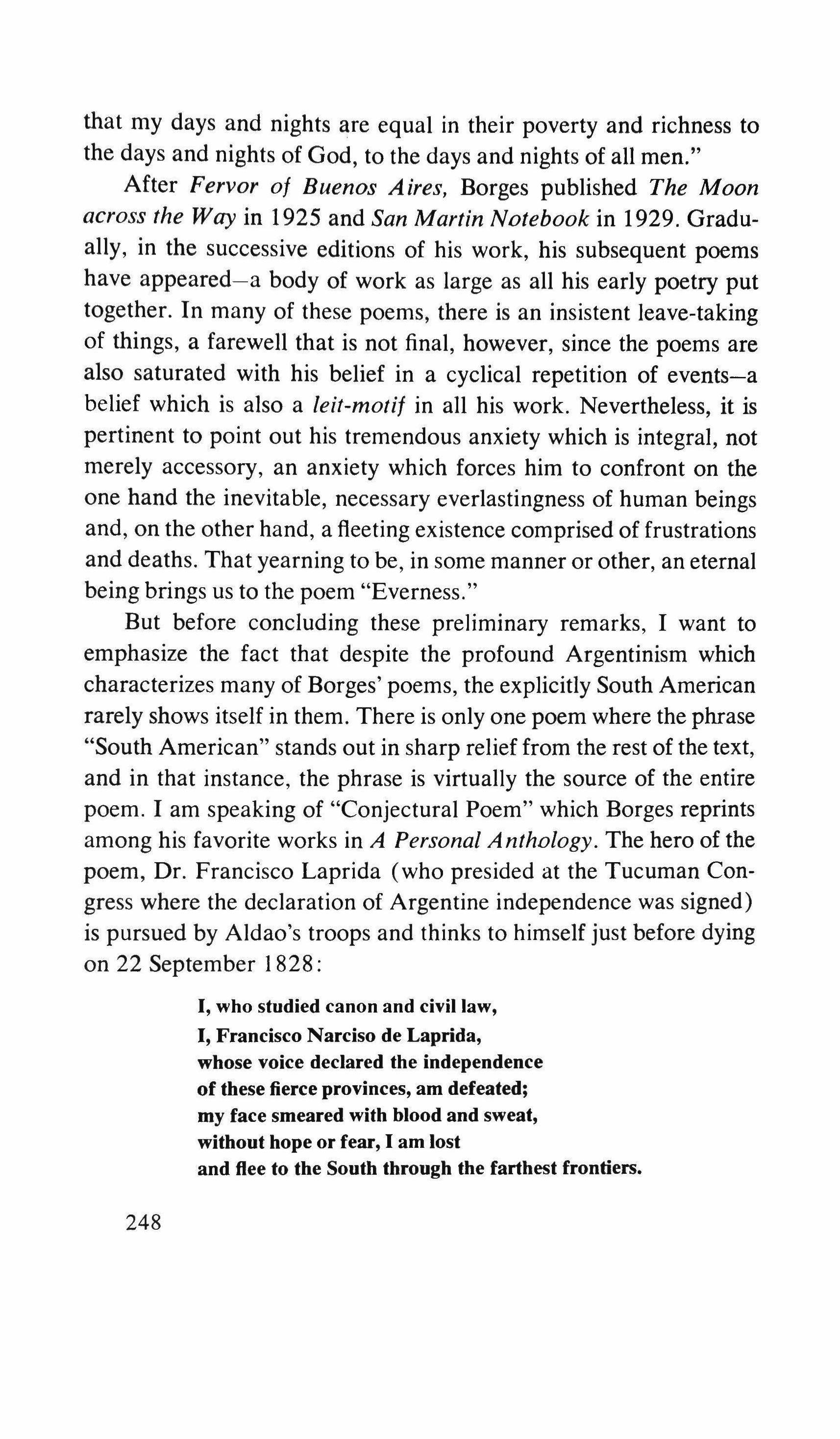
that my days and nights are equal in their poverty and richness to the days and nights of God, to the days and nights of all men."
After Fervor of Buenos Aires, Borges published The Moon across the Way in 1925 and San Martin Notebook in 1929. Gradually, in the successive editions of his work, his subsequent poems have appeared-a body of work as large as all his early poetry put together. In many of these poems, there is an insistent leave-taking of things, a farewell that is not final, however, since the poems are also saturated with his belief in a cyclical repetition of events-a belief which is also a leit-motif in all his work. Nevertheless, it is pertinent to point out his tremendous anxiety which is integral, not merely accessory, an anxiety which forces him to confront on the one hand the inevitable, necessary everlastingness of human beings and, on the other hand, a fleeting existence comprised of frustrations and deaths. That yearning to be, in some manner or other, an eternal being brings us to the poem "Everness."
But before concluding these preliminary remarks, I want to emphasize the fact that despite the profound Argentinism which characterizes many of Borges' poems, the explicitly South American rarely shows itself in them. There is only one poem where the phrase "South American" stands out in sharp relief from the rest of the text, and in that instance, the phrase is virtually the source of the entire poem. I am speaking of "Conjectural Poem" which Borges reprints among his favorite works in A Personal Anthology. The hero of the poem, Dr. Francisco Laprida (who presided at the Tucuman Congress where the declaration of Argentine independence was signed) is pursued by Aldao's troops and thinks to himself just before dying on 22 September 1828:
I, who studied canon and civil law, I, Francisco Narciso de Laprida, whose voice declared the independence of these fierce provinces, am defeated; my face smeared with blood and sweat, without hope or fear, I am lost and flee to the South through the farthest frontiers.
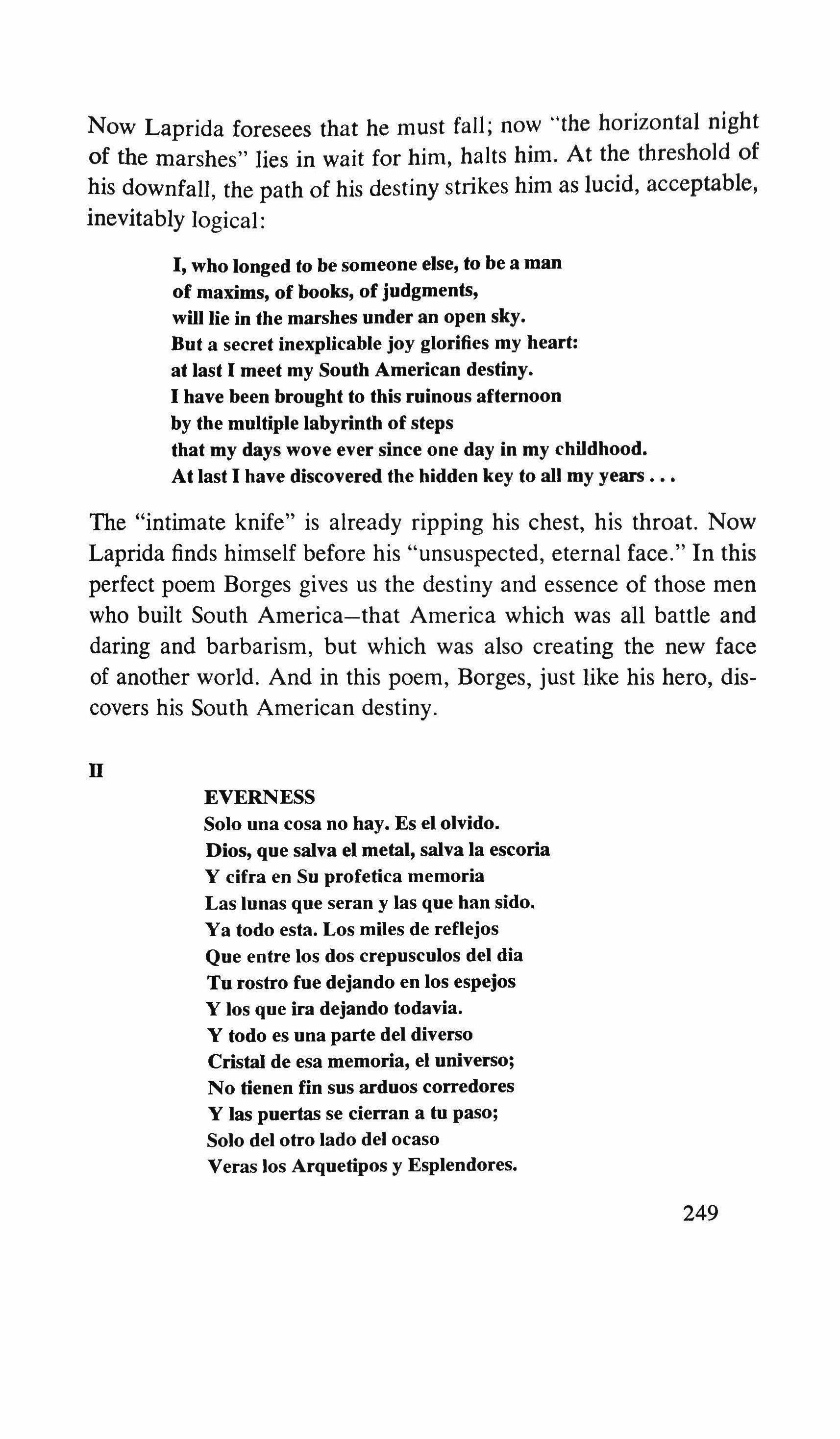
Now Laprida foresees that he must fall; now "the horizontal night of the marshes" lies in wait for him, halts him. At the threshold of his downfall, the path of his destiny strikes him as lucid, acceptable, inevitably logical:
I, who longed to be someone else, to be a man of maxims, of books, of judgments, will lie in the marshes under an open sky. But a secret inexplicable joy glorifies my heart: at last I meet my South American destiny. I have been brought to this ruinous afternoon by the multiple labyrinth of steps that my days wove ever since one day in my childhood. At last I have discovered the hidden key to all my years
The "intimate knife" is already ripping his chest, his throat. Now Laprida finds himself before his "unsuspected, eternal face." In this perfect poem Borges gives us the destiny and essence of those men who built South America-that America which was all battle and daring and barbarism, but which was also creating the new face of another world. And in this poem, Borges, just like his hero, discovers his South American destiny.
Solo una cosa no hay. Es el olvido.
Dios, que salva el metal, salva la escoria
Y dfra en Su profetica memoria
Las lunas que seran y las que han sido. Ya todo esta. Los miles de reflejos
Que entre los dos crepusculos del dia
To rostro fue dejando en los espejos
Y los que ira dejando todavia.
Y todo es una parte del diverso
Cristal de esa memoria, el universo; No tienen fin sus arduos corredores
Y las puertas se clerran a tu paso; Solo del otro lado del ocaso
Veras los Arquetipos y Esplendores.
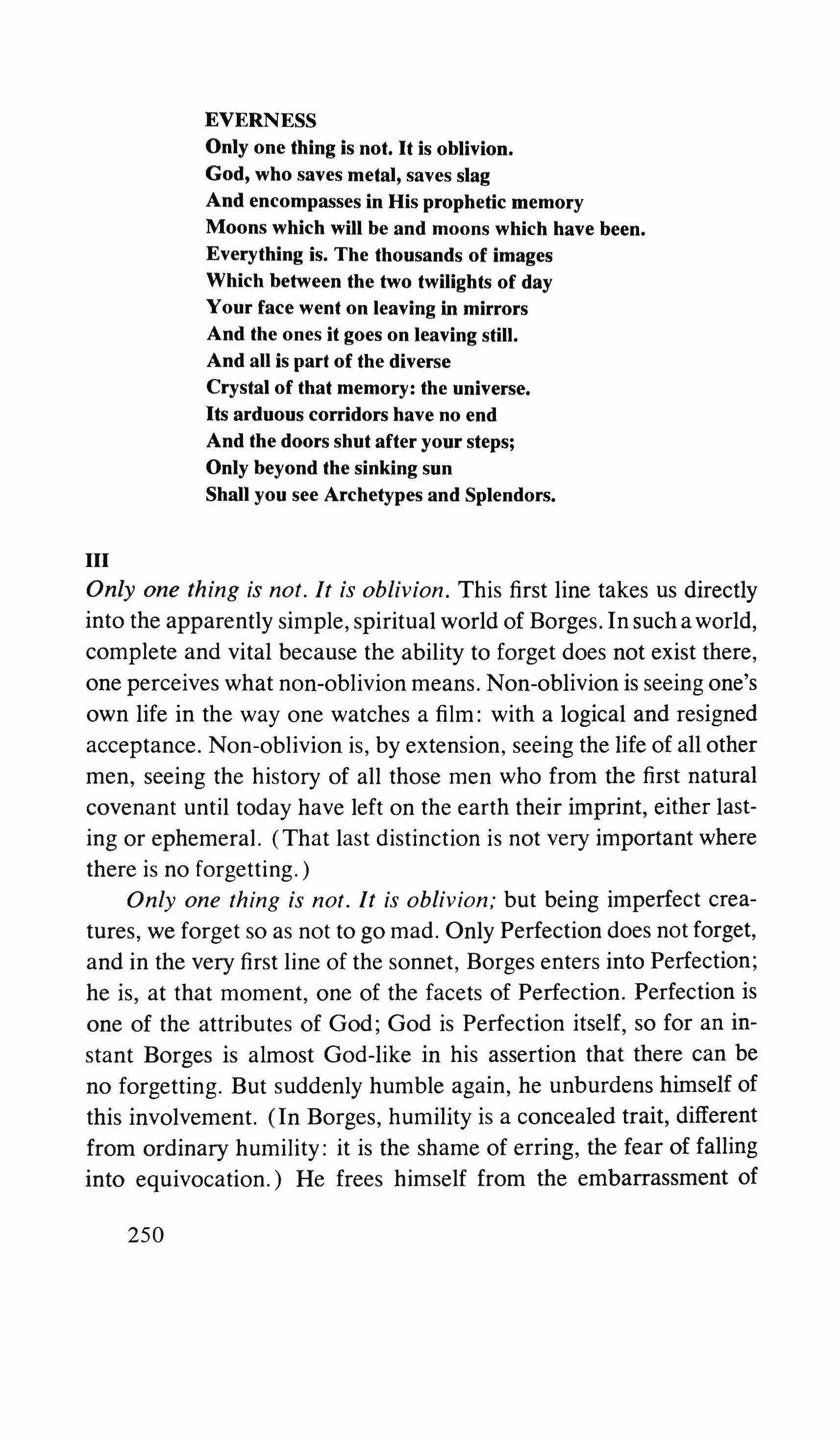
Only one thing is not. It is oblivion. God, who saves metal, saves slag And encompasses in His prophetic memory Moons which will be and moons which have been. Everything is. The thousands of images Which between the two twilights of day Your face went on leaving in mirrors And the ones it goes on leaving still. And all is part of the diverse Crystal of that memory: the universe. Its arduous corridors have no end And the doors shut after your steps; Only beyond the sinking sun Shall you see Archetypes and Splendors.
Only one thing is not. It is oblivion. This first line takes us directly into the apparently simple, spiritual world of Borges. In such a world, complete and vital because the ability to forget does not exist there, one perceives what non-oblivion means. Non-oblivion is seeing one's own life in the way one watches a film: with a logical and resigned acceptance. Non-oblivion is, by extension, seeing the life of all other men, seeing the history of all those men who from the first natural covenant until today have left on the earth their imprint, either lasting or ephemeral. (That last distinction is not very important where there is no forgetting.)
Only one thing is not. It is oblivion; but being imperfect creatures, we forget so as not to go mad. Only Perfection does not forget, and in the very first line of the sonnet, Borges enters into Perfection; he is, at that moment, one of the facets of Perfection. Perfection is one of the attributes of God; God is Perfection itself, so for an instant Borges is almost God-like in his assertion that there can be no forgetting. But suddenly humble again, he unburdens himself of this involvement. (In Borges, humility is a concealed trait, different from ordinary humility: it is the shame of erring, the fear of falling into equivocation.) He frees himself from the embarrassment of
250
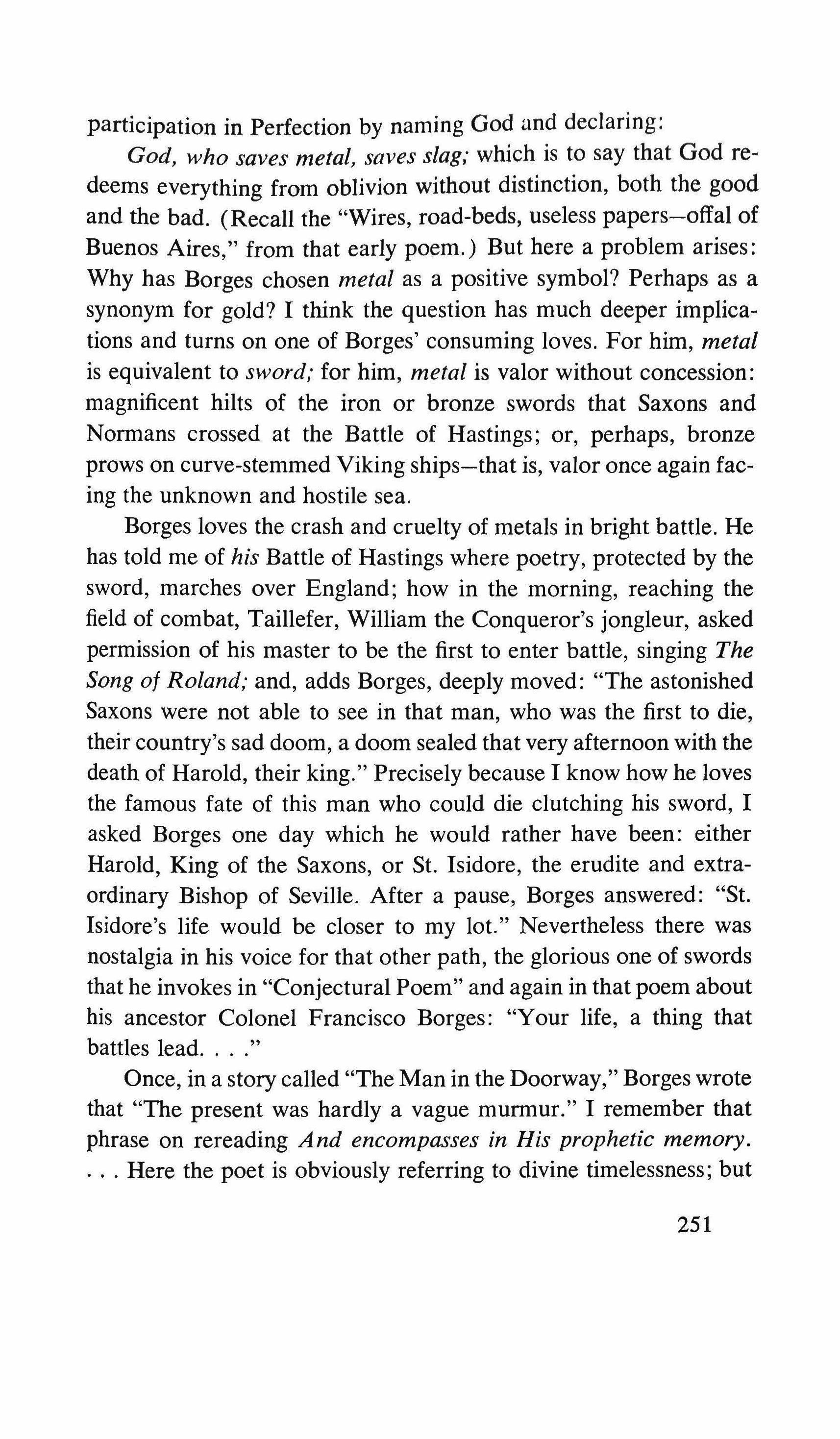
participation in Perfection by naming God and declaring: God, who saves metal, saves slag; which is to say that God redeems everything from oblivion without distinction, both the good and the bad. (Recall the "Wires, road-beds, useless papers-offal of Buenos Aires," from that early poem.) But here a problem arises: Why has Borges chosen metal as a positive symbol? Perhaps as a synonym for gold? I think the question has much deeper implications and turns on one of Borges' consuming loves. For him, metal is equivalent to sword; for him, metal is valor without concession: magnificent hilts of the iron or bronze swords that Saxons and Normans crossed at the Battle of Hastings; or, perhaps, bronze prows on curve-stemmed Viking ships-that is, valor once again facing the unknown and hostile sea.
Borges loves the crash and cruelty of metals in bright battle. He has told me of his Battle of Hastings where poetry, protected by the sword, marches over England; how in the morning, reaching the field of combat, Taillefer, William the Conqueror's jongleur, asked permission of his master to be the first to enter battle, singing The Song of Roland; and, adds Borges, deeply moved: "The astonished Saxons were not able to see in that man, who was the first to die, their country's sad doom, a doom sealed that very afternoon with the death of Harold, their king." Precisely because I know how he loves the famous fate of this man who could die clutching his sword, I asked Borges one day which he would rather have been: either Harold, King of the Saxons, or St. Isidore, the erudite and extraordinary Bishop of Seville. After a pause, Borges answered: "St. Isidore's life would be closer to my lot." Nevertheless there was nostalgia in his voice for that other path, the glorious one of swords that he invokes in "Conjectural Poem" and again in that poem about his ancestor Colonel Francisco Borges: "Your life, a thing that battles lead
Once, in a story called "The Man in the Doorway," Borges wrote that "The present was hardly a vague murmur." I remember that phrase on rereading And encompasses in His prophetic memory Here the poet is obviously referring to divine timelessness; but
251
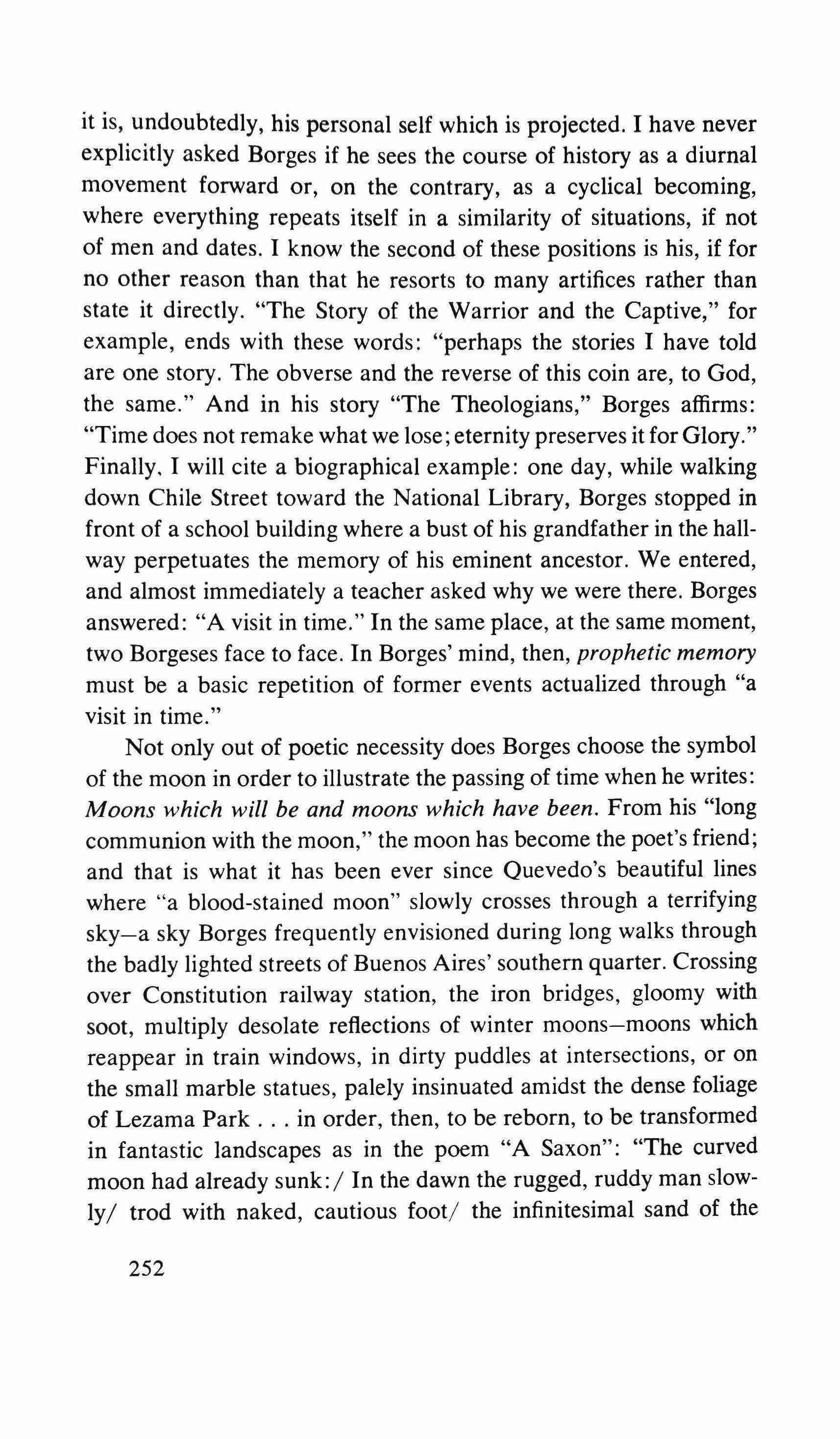
it is, undoubtedly, his personal self which is projected. I have never explicitly asked Borges if he sees the course of history as a diurnal movement forward or, on the contrary, as a cyclical becoming, where everything repeats itself in a similarity of situations, if not of men and dates. I know the second of these positions is his, if for no other reason than that he resorts to many artifices rather than state it directly. "The Story of the Warrior and the Captive," for example, ends with these words: "perhaps the stories I have told are one story. The obverse and the reverse of this coin are, to God, the same." And in his story "The Theologians," Borges affirms: "Time does not remake what we lose; eternity preserves it for Glory." Finally, I will cite a biographical example: one day, while walking down Chile Street toward the National Library, Borges stopped in front of a school building where a bust of his grandfather in the hallway perpetuates the memory of his eminent ancestor. We entered, and almost immediately a teacher asked why we were there. Borges answered: "A visit in time." In the same place, at the same moment, two Borgeses face to face. In Borges' mind, then, prophetic memory must be a basic repetition of former events actualized through "a visit in time."
Not only out of poetic necessity does Borges choose the symbol of the moon in order to illustrate the passing of time when he writes: Moons which will be and moons which have been. From his "long communion with the moon," the moon has become the poet's friend; and that is what it has been ever since Quevedo's beautiful lines where "a blood-stained moon" slowly crosses through a terrifying sky-a sky Borges frequently envisioned during long walks through the badly lighted streets of Buenos Aires' southern quarter. Crossing over Constitution railway station, the iron bridges, gloomy with soot, multiply desolate reflections of winter moons-moons which reappear in train windows, in dirty puddles at intersections, or on the small marble statues, palely insinuated amidst the dense foliage of Lezama Park in order, then, to be reborn, to be transformed in fantastic landscapes as in the poem "A Saxon": "The curved moon had already sunk: I In the dawn the rugged, ruddy man slowlyI trod with naked, cautious foot/ the infinitesimal sand of the 252
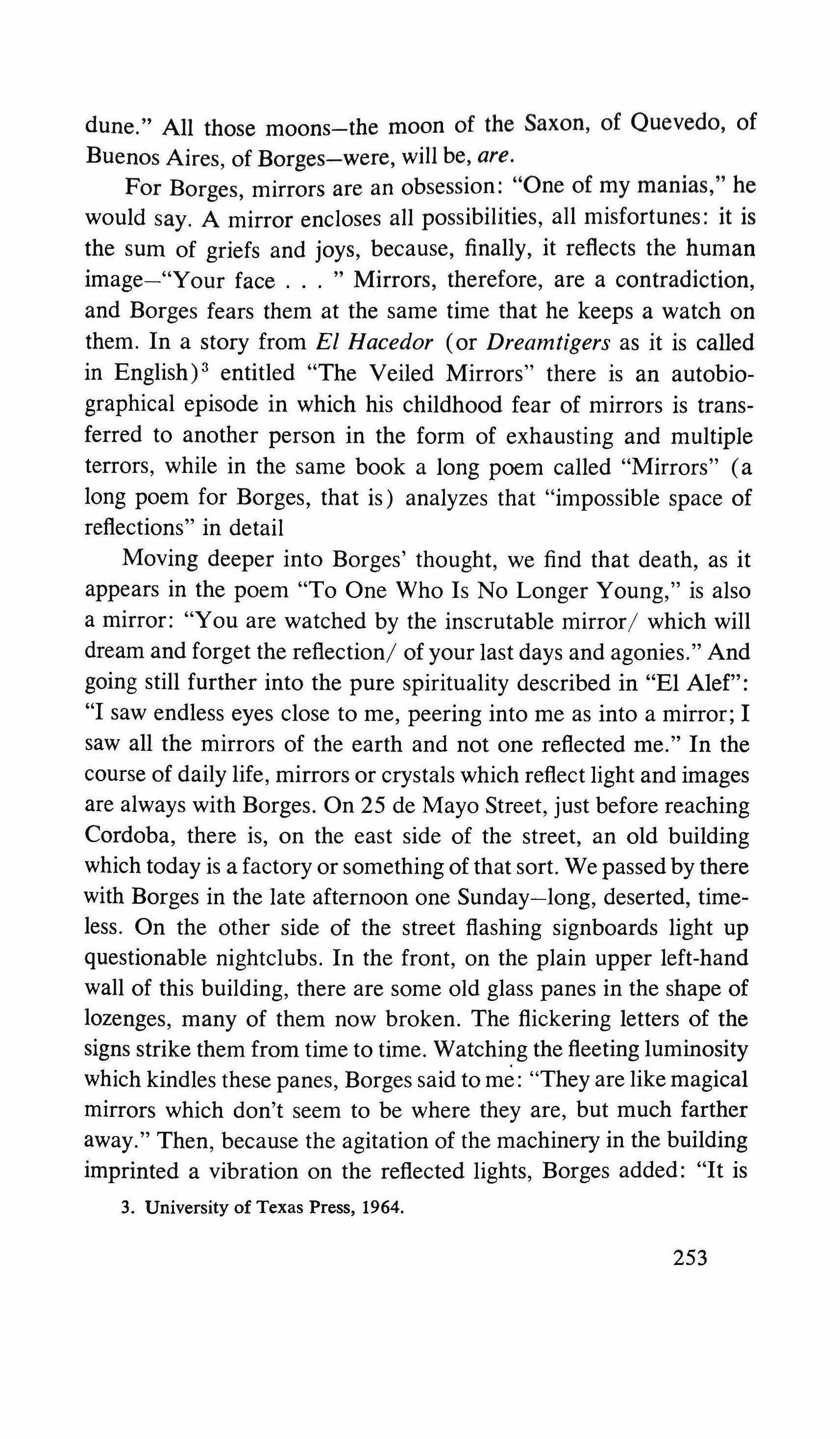
dune." All those moons-the moon of the Saxon, of Quevedo, of Buenos Aires, of Borges-were, will be, are.
For Borges, mirrors are an obsession: "One of my manias," he would say. A mirror encloses all possibilities, all misfortunes: it is the sum of griefs and joys, because, finally, it reflects the human image-"Your face Mirrors, therefore, are a contradiction, and Borges fears them at the same time that he keeps a watch on them. In a story from El Hacedor (or Dreamtigers as it is called in English)" entitled "The Veiled Mirrors" there is an autobiographical episode in which his childhood fear of mirrors is transferred to another person in the form of exhausting and multiple terrors, while in the same book a long poem called "Mirrors" (a long poem for Borges, that is) analyzes that "impossible space of reflections" in detail
Moving deeper into Borges' thought, we find that death, as it appears in the poem "To One Who Is No Longer Young," is also a mirror: "You are watched by the inscrutable mirror/ which will dream and forget the reflection/ of your last days and agonies." And going still further into the pure spirituality described in "EI Alef": "I saw endless eyes close to me, peering into me as into a mirror; I sawall the mirrors of the earth and not one reflected me." In the course of daily life, mirrors or crystals which reflect light and images are always with Borges. On 25 de Mayo Street, just before reaching Cordoba, there is, on the east side of the street, an old building which today is a factory or something of that sort. We passedby there with Borges in the late afternoon one Sunday-long, deserted, timeless. On the other side of the street flashing signboards light up questionable nightclubs. In the front, on the plain upper left-hand wall of this building, there are some old glass panes in the shape of lozenges, many of them now broken. The flickering letters of the signs strike them from time to time. Watching the fleeting luminosity which kindles these panes, Borges said to me: "They are like magical mirrors which don't seem to be where they are, but much farther away." Then, because the agitation of the machinery in the building imprinted a vibration on the reflected lights, Borges added: "It is 3. University of Texas Press, 1964.
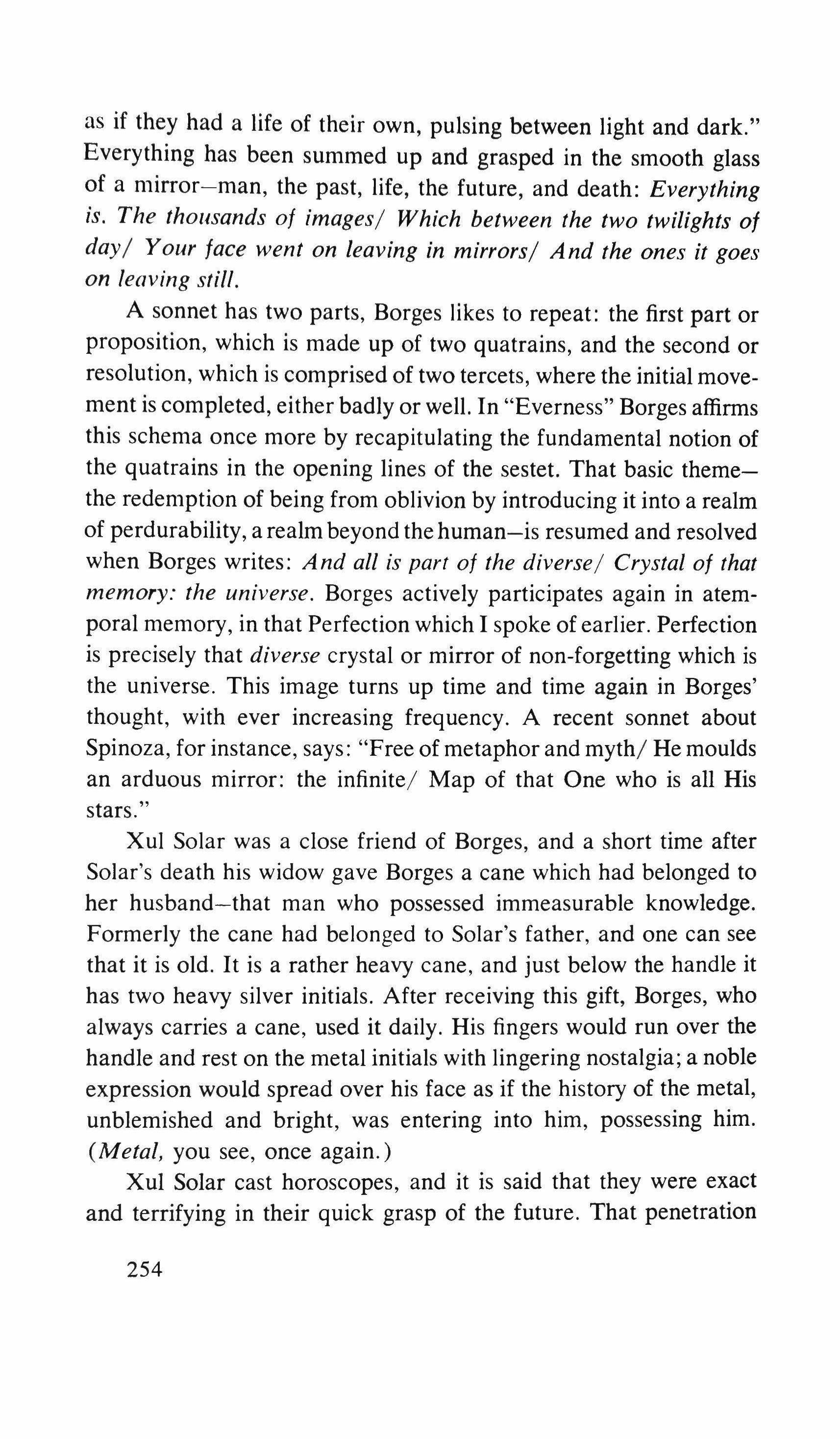
as if they had a life of their own, pulsing between light and dark." Everything has been summed up and grasped in the smooth glass of a mirror-man, the past, life, the future, and death: Everything is. The thousands of images/ Which between the two twilights of day/ Your face went on leaving in mirrors/ And the ones it goes on leaving still.
A sonnet has two parts, Borges likes to repeat: the first part or proposition, which is made up of two quatrains, and the second or resolution, which is comprised of two tercets, where the initial movement is completed, either badly or well. In "Everness'' Borges affirms this schema once more by recapitulating the fundamental notion of the quatrains in the opening lines of the sestet. That basic themethe redemption of being from oblivion by introducing it into a realm of perdurability, a realm beyond the human-is resumed and resolved when Borges writes: And all is part of the diverse/ Crystal of that memory: the universe. Borges actively participates again in aternporal memory, in that Perfection which I spoke of earlier. Perfection is precisely that diverse crystal or mirror of non-forgetting which is the universe. This image turns up time and time again in Borges' thought, with ever increasing frequency. A recent sonnet about Spinoza, for instance, says: "Free of metaphor and myth/ He moulds an arduous mirror: the infinite/ Map of that One who is all His stars.
Xul Solar was a close friend of Borges, and a short time after Solar's death his widow gave Borges a cane which had belonged to her husband-that man who possessed immeasurable knowledge. Formerly the cane had belonged to Solar's father, and one can see that it is old. It is a rather heavy cane, and just below the handle it has two heavy silver initials. After receiving this gift, Borges, who always carries a cane, used it daily. His fingers would run over the handle and rest on the metal initials with lingering nostalgia; a noble expression would spread over his face as if the history of the metal, unblemished and bright, was entering into him, possessing him. (Metal, you see, once again.)
Xul Solar cast horoscopes, and it is said that they were exact and terrifying in their quick grasp of the future. That penetration
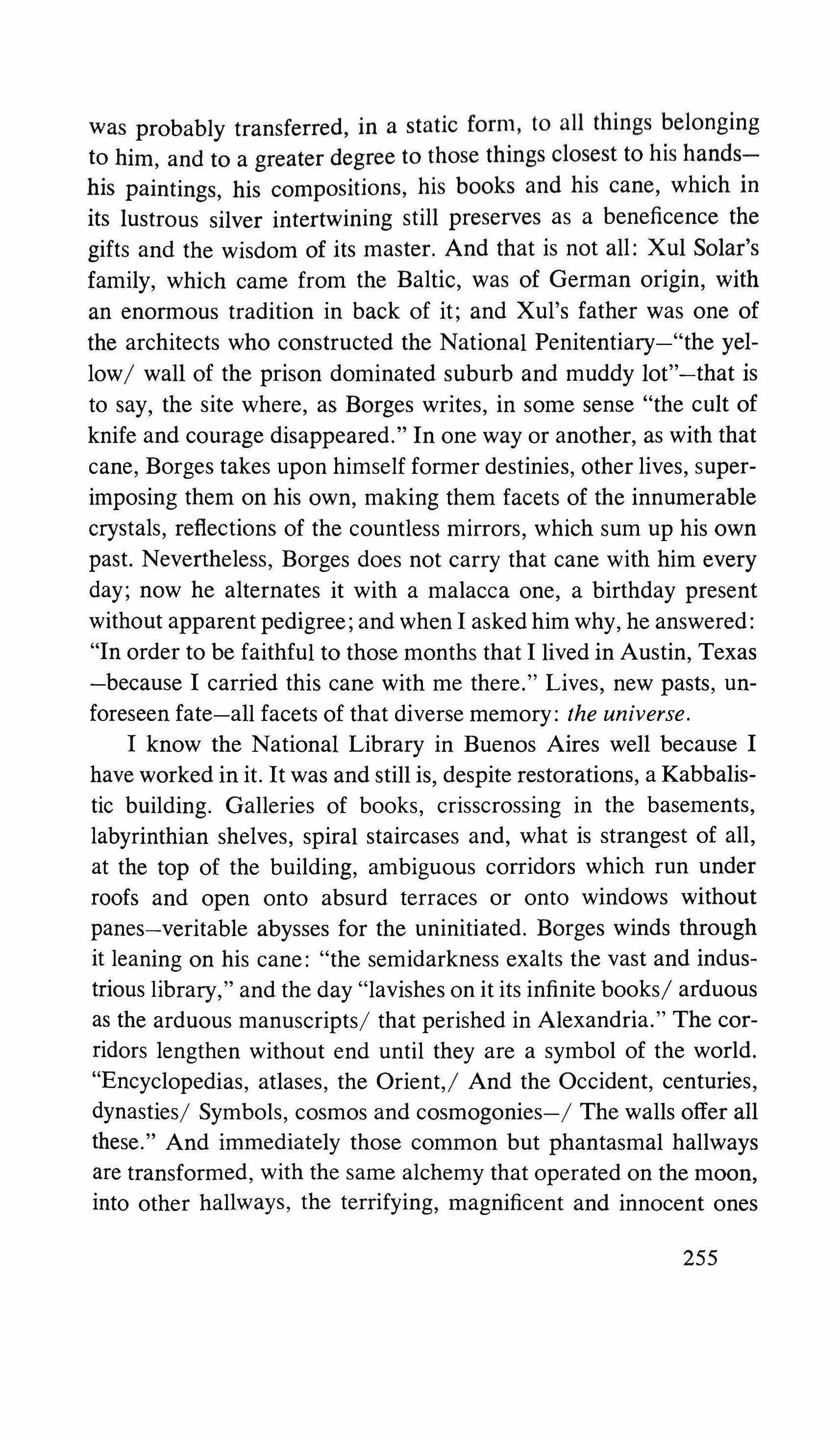
was probably transferred, in a static form, to all things belonging to him, and to a greater degree to those things closest to his handshis paintings, his compositions, his books and his cane, which in its lustrous silver intertwining still preserves as a beneficence the gifts and the wisdom of its master. And that is not all: Xul Solar's family, which came from the Baltic, was of German origin, with an enormous tradition in back of it; and Xul's father was one of the architects who constructed the National Penitentiary-"the yellow/ wall of the prison dominated suburb and muddy lot"-that is to say, the site where, as Borges writes, in some sense "the cult of knife and courage disappeared." In one way or another, as with that cane, Borges takes upon himself former destinies, other lives, superimposing them on his own, making them facets of the innumerable crystals, reflections of the countless mirrors, which sum up his own past. Nevertheless, Borges does not carry that cane with him every day; now he alternates it with a malacca one, a birthday present without apparent pedigree; and when I asked him why, he answered: "In order to be faithful to those months that I lived in Austin, Texas -because I carried this cane with me there." Lives, new pasts, unforeseen fate-all facets of that diverse memory: the universe. I know the National Library in Buenos Aires well because I have worked in it. It was and stilI is, despite restorations, a Kabbalistic building. Galleries of books, crisscrossing in the basements, labyrinthian shelves, spiral staircases and, what is strangest of all, at the top of the building, ambiguous corridors which run under roofs and open onto absurd terraces or onto windows without panes-veritable abysses for the uninitiated. Borges winds through it leaning on his cane: "the semidarkness exalts the vast and industrious library," and the day "lavishes on it its infinite books/ arduous as the arduous manuscripts/ that perished in Alexandria." The corridors lengthen without end until they are a symbol of the world. "Encyclopedias, atlases, the Orient,/ And the Occident, centuries, dynasties/ Symbols, cosmos and cosmogonies-/ The walls offer all these." And immediately those common but phantasmal hallways are transformed, with the same alchemy that operated on the moon, into other hallways, the terrifying, magnificent and innocent ones
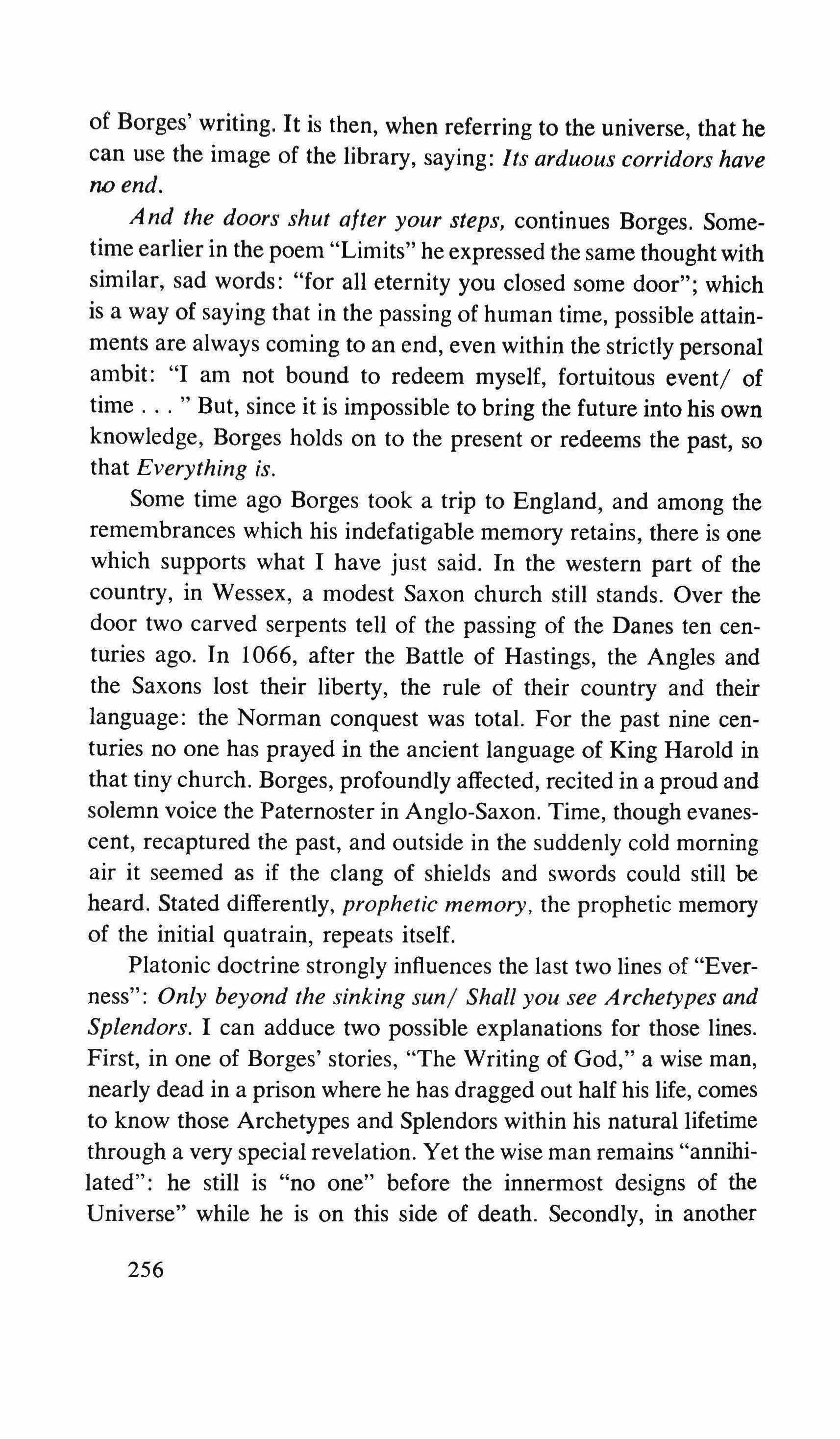
of Borges' writing. It is then, when referring to the universe, that he can use the image of the library, saying: Its arduous corridors have no end.
And the doors shut after your steps, continues Borges. Sometime earlier in the poem "Limits" he expressed the same thought with similar, sad words: "for all eternity you closed some door"; which is a way of saying that in the passing of human time, possible attainments are always coming to an end, even within the strictly personal ambit: "I am not bound to redeem myself, fortuitous event/ of time But, since it is impossible to bring the future into his own knowledge, Borges holds on to the present or redeems the past, so that Everything is.
Some time ago Borges took a trip to England, and among the remembrances which his indefatigable memory retains, there is one which supports what I have just said. In the western part of the country, in Wessex, a modest Saxon church still stands. Over the door two carved serpents tell of the passing of the Danes ten centuries ago. In 1066, after the Battle of Hastings, the Angles and the Saxons lost their liberty, the rule of their country and their language: the Norman conquest was total. For the past nine centuries no one has prayed in the ancient language of King Harold in that tiny church. Borges, profoundly affected, recited in a proud and solemn voice the Paternoster in Anglo-Saxon. Time, though evanescent, recaptured the past, and outside in the suddenly cold morning air it seemed as if the clang of shields and swords could still be heard. Stated differently, prophetic memory, the prophetic memory of the initial quatrain, repeats itself.
Platonic doctrine strongly influences the last two lines of "Everness": Only beyond the sinking sun/ Shall you see Archetypes and Splendors. I can adduce two possible explanations for those lines. First, in one of Borges' stories, "The Writing of God," a wise man, nearly dead in a prison where he has dragged out half his life, comes to know those Archetypes and Splendors within his natural lifetime through a very special revelation. Yet the wise man remains "annihilated": he still is "no one" before the innermost designs of the Universe" while he is on this side of death. Secondly, in another
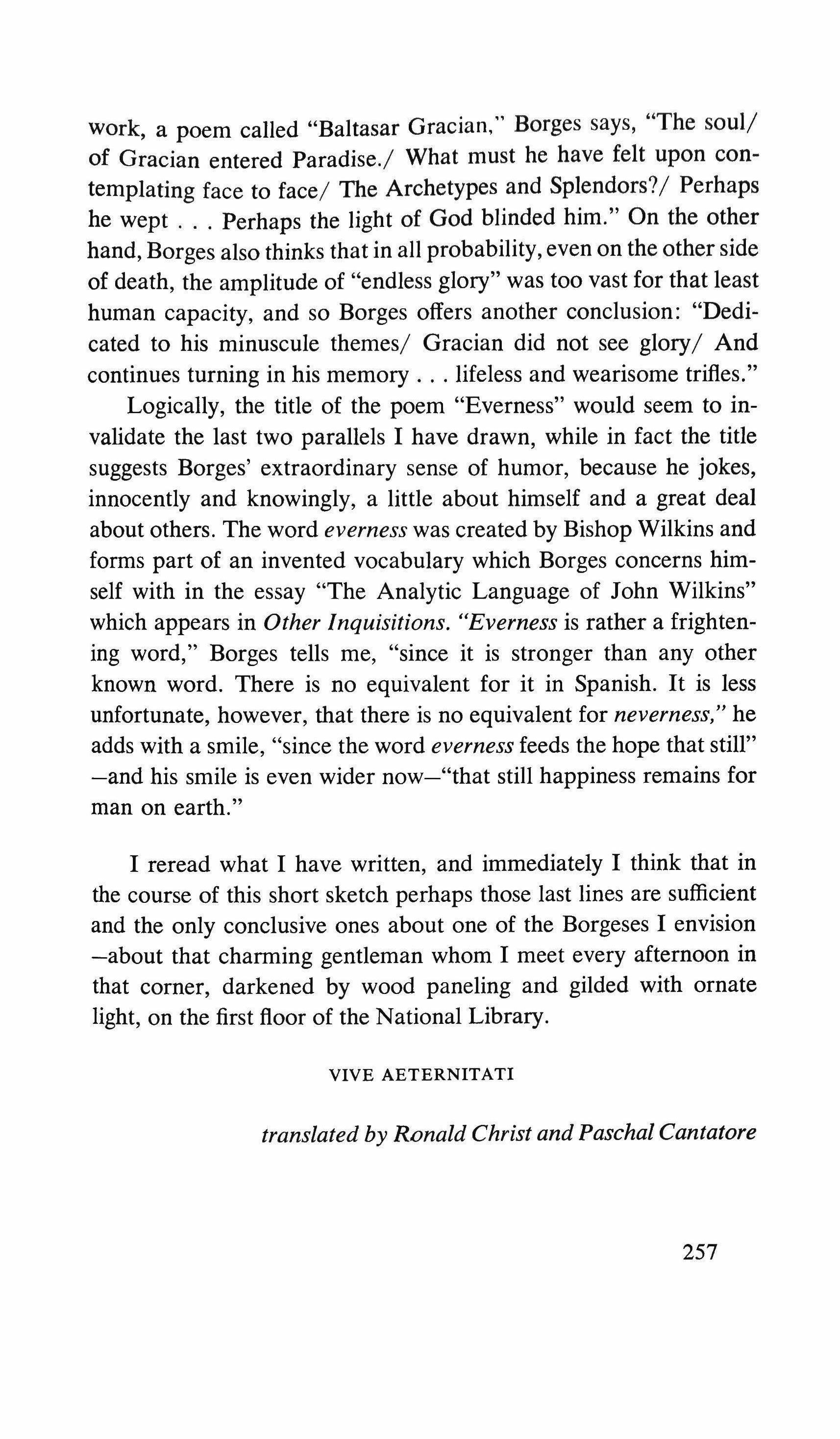
work, a poem called "Baltasar Gracian," Borges says, "The soul! of Gracian entered Paradise./ What must he have felt upon contemplating face to face/ The Archetypes and Splendors?/ Perhaps he wept Perhaps the light of God blinded him." On the other hand, Borges also thinks that in all probability, even on the other side of death, the amplitude of "endless glory" was too vast for that least human capacity, and so Borges offers another conclusion: "Dedicated to his minuscule themes/ Gracian did not see glory/And continues turning in his memory lifeless and wearisome trifles."
Logically, the title of the poem "Everness" would seem to invalidate the last two parallels I have drawn, while in fact the title suggests Borges' extraordinary sense of humor, because he jokes, innocently and knowingly, a little about himself and a great deal about others. The word everness was created by Bishop Wilkins and forms part of an invented vocabulary which Borges concerns himself with in the essay "The Analytic Language of John Wilkins" which appears in Other Inquisitions. "Everness is rather a frightening word," Borges tells me, "since it is stronger than any other known word. There is no equivalent for it in Spanish. It is less unfortunate, however, that there is no equivalent for neverness," he adds with a smile, "since the word everness feeds the hope that still" -and his smile is even wider now-"that still happiness remains for man on earth."
I reread what I have written, and immediately I think that in the course of this short sketch perhaps those last lines are sufficient and the only conclusive ones about one of the Borgeses I envision -about that charming gentleman whom I meet every afternoon in that corner, darkened by wood paneling and gilded with ornate light, on the first floor of the National Library.
VIVE AETERNITATItranslated by Ronald Christ and Paschal Cantatore 257
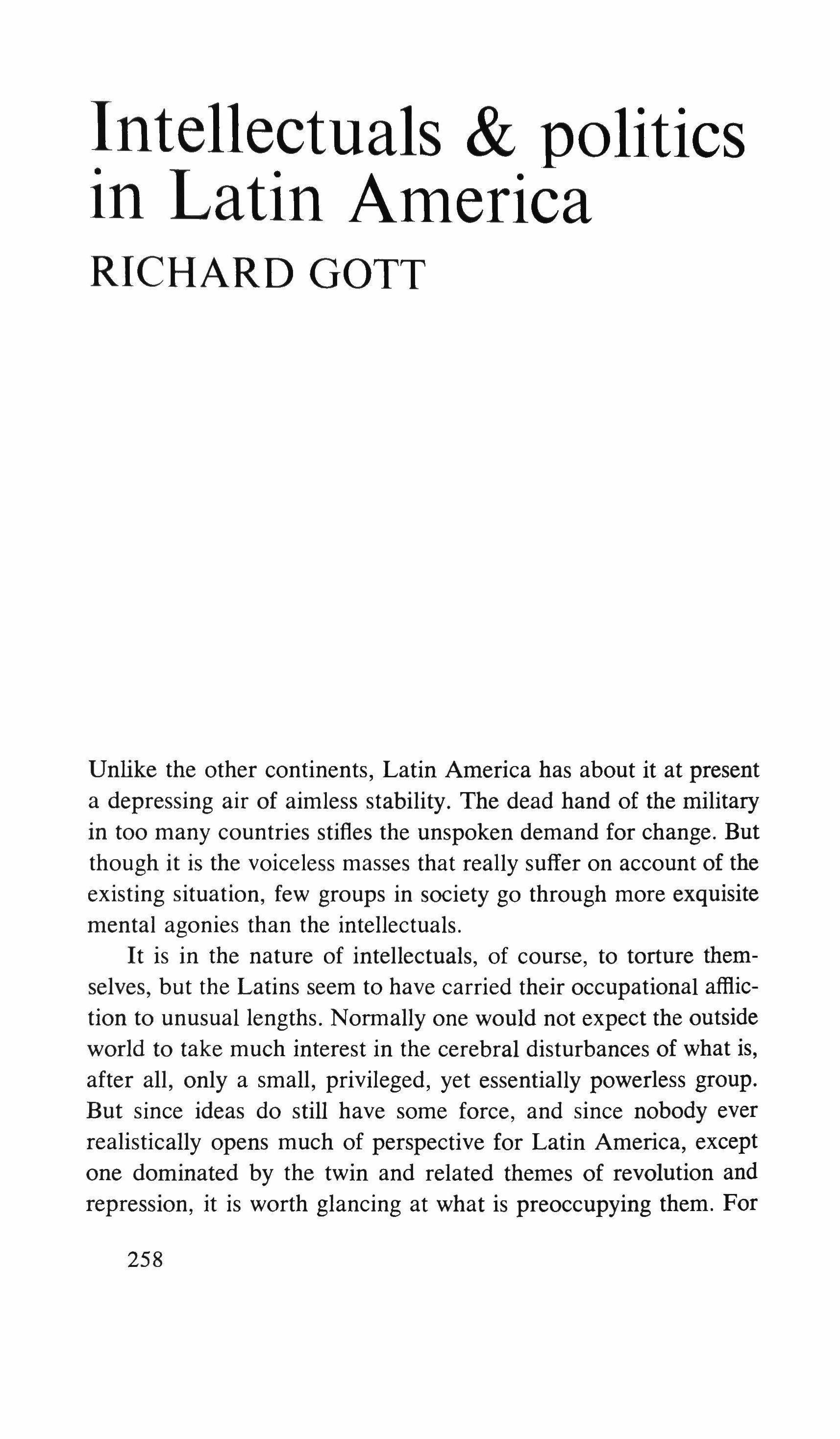
Unlike the other continents, Latin America has about it at present a depressing air of aimless stability. The dead hand of the military in too many countries stifles the unspoken demand for change. But though it is the voiceless masses that really suffer on account of the existing situation, few groups in society go through more exquisite mental agonies than the intellectuals.
It is in the nature of intellectuals, of course, to torture themselves, but the Latins seem to have carried their occupational affliction to unusual lengths. Normally one would not expect the outside world to take much interest in the cerebral disturbances of what is, after all, only a small, privileged, yet essentially powerless group. But since ideas do still have some force, and since nobody ever realistically opens much of perspective for Latin America, except one dominated by the twin and related themes of revolution and repression, it is worth glancing at what is preoccupying them. For
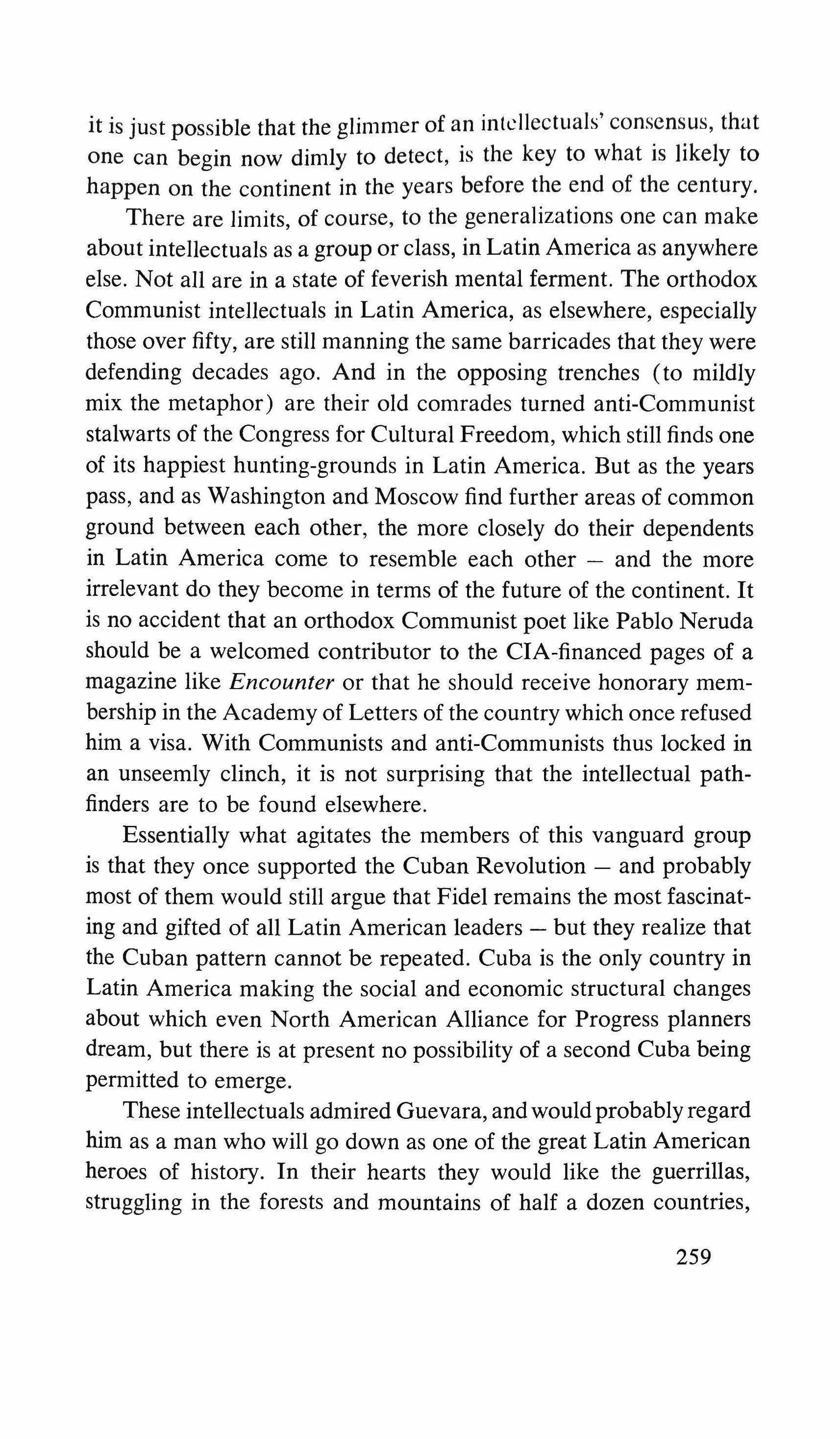
it is just possible that the glimmer of an intellectuals' consensus, that one can begin now dimly to detect, is the key to what is likely to happen on the continent in the years before the end of the century.
There are limits, of course, to the generalizations one can make about intellectuals as a group or class, in Latin America as anywhere else. Not all are in a state of feverish mental ferment. The orthodox Communist intellectuals in Latin America, as elsewhere, especially those over fifty, are still manning the same barricades that they were defending decades ago. And in the opposing trenches (to mildly mix the metaphor) are their old comrades turned anti-Communist stalwarts of the Congress for Cultural Freedom, which still finds one of its happiest hunting-grounds in Latin America. But as the years pass, and as Washington and Moscow find further areas of common ground between each other, the more closely do their dependents in Latin America come to resemble each other - and the more irrelevant do they become in terms of the future of the continent. It is no accident that an orthodox Communist poet like Pablo Neruda should be a welcomed contributor to the CIA-financed pages of a magazine like Encounter or that he should receive honorary membership in the Academy of Letters of the country which once refused him a visa. With Communists and anti-Communists thus locked in an unseemly clinch, it is not surprising that the intellectual pathfinders are to be found elsewhere.
Essentially what agitates the members of this vanguard group is that they once supported the Cuban Revolution - and probably most of them would still argue that Fidel remains the most fascinating and gifted of all Latin American leaders - but they realize that the Cuban pattern cannot be repeated. Cuba is the only country in Latin America making the social and economic structural changes about which even North American Alliance for Progress planners dream, but there is at present no possibility of a second Cuba being permitted to emerge.
These intellectuals admired Guevara, andwouldprobablyregard him as a man who will go down as one of the great Latin American heroes of history. In their hearts they would like the guerrillas, struggling in the forests and mountains of half a dozen countries, 259
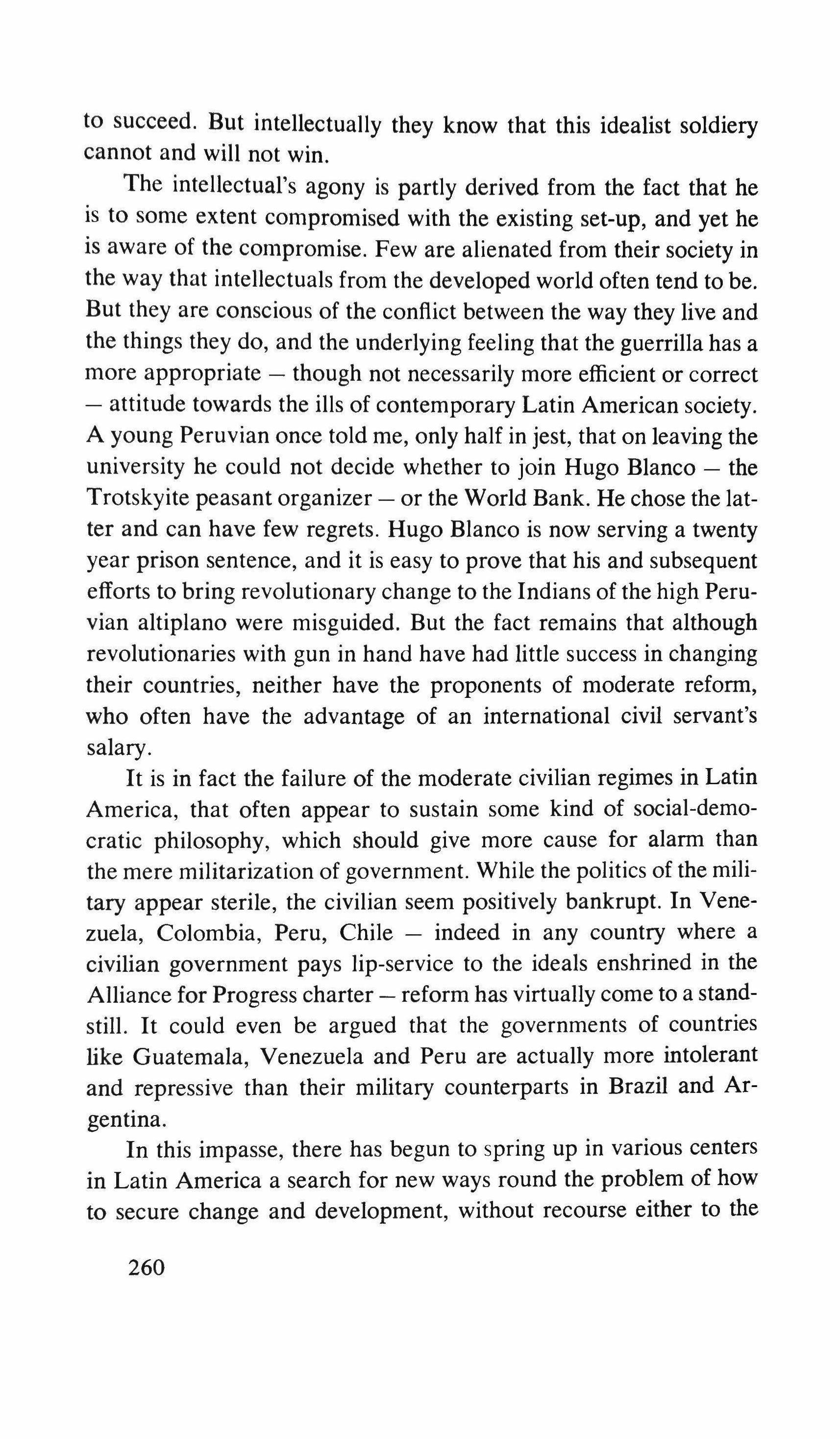
to succeed. But intellectually they know that this idealist soldiery cannot and will not win.
The intellectual's agony is partly derived from the fact that he is to some extent compromised with the existing set-up, and yet he is aware of the compromise. Few are alienated from their society in the way that intellectuals from the developed world often tend to be. But they are conscious of the conflict between the way they live and the things they do, and the underlying feeling that the guerrilla has a more appropriate - though not necessarily more efficient or correct - attitude towards the ills of contemporary Latin American society. A young Peruvian once told me, only half in jest, that on leaving the university he could not decide whether to join Hugo Blanco - the Trotskyite peasant organizer - or the World Bank. He chose the latter and can have few regrets. Hugo Blanco is now serving a twenty year prison sentence, and it is easy to prove that his and subsequent efforts to bring revolutionary change to the Indians of the high Peruvian altiplano were misguided. But the fact remains that although revolutionaries with gun in hand have had little success in changing their countries, neither have the proponents of moderate reform, who often have the advantage of an international civil servant's salary.
It is in fact the failure of the moderate civilian regimes in Latin America, that often appear to sustain some kind of social-democratic philosophy, which should give more cause for alarm than the mere militarization of government. While the politics of the military appear sterile, the civilian seem positively bankrupt. In Venezuela, Colombia, Peru, Chile - indeed in any country where a civilian government pays lip-service to the ideals enshrined in the Alliance for Progress charter - reform has virtually come to a standstill. It could even be argued that the governments of countries like Guatemala, Venezuela and Peru are actually more intolerant and repressive than their military counterparts in Brazil and Argentina.
In this impasse, there has begun to spring up in various centers in Latin America a search for new ways round the problem of how to secure change and development, without recourse either to the 260
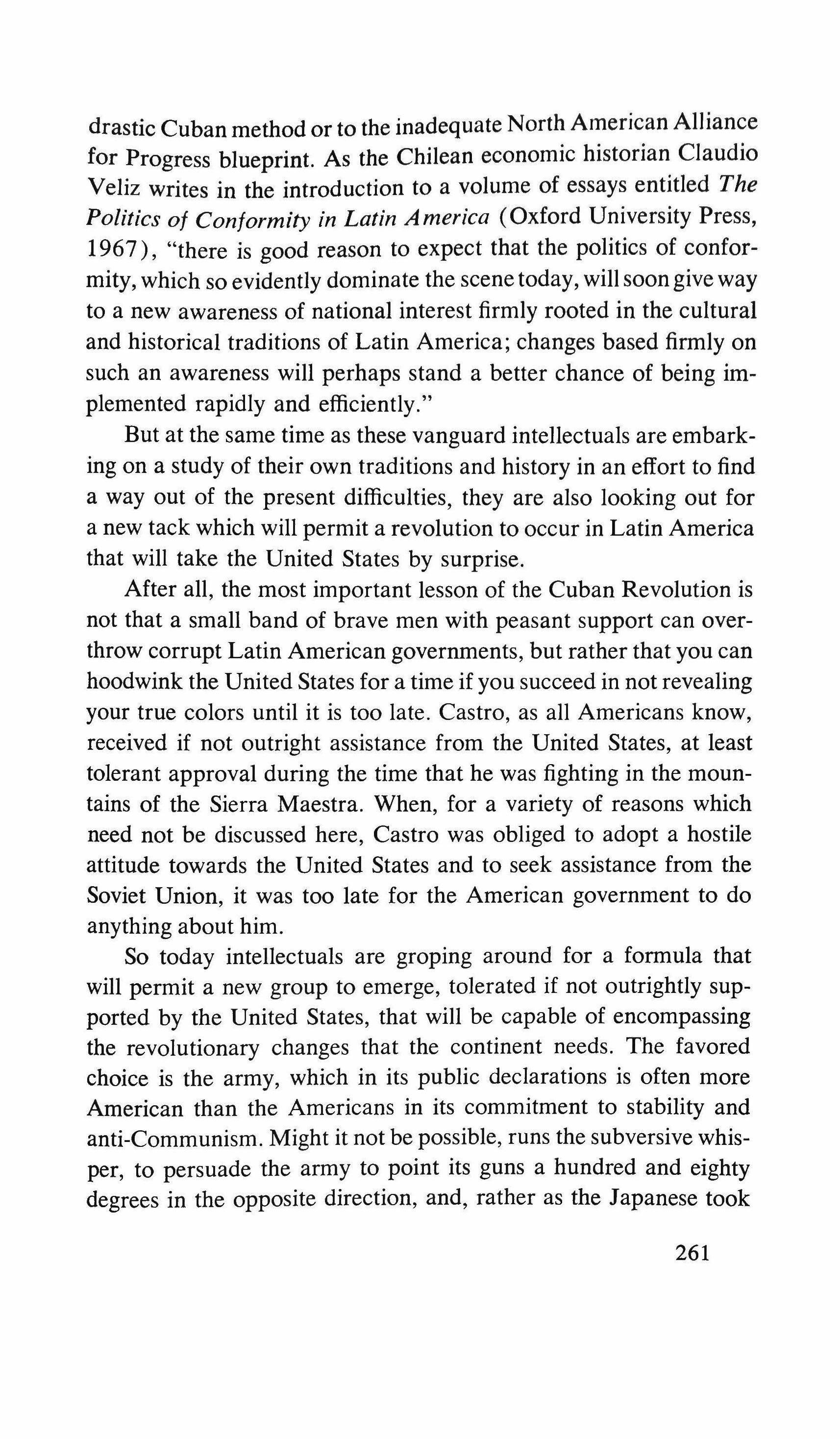
drastic Cuban method or to the inadequate North American Alliance for Progress blueprint. As the Chilean economic historian Claudio Veliz writes in the introduction to a volume of essays entitled The Politics of Conformity in Latin America (Oxford University Press, 1967), "there is good reason to expect that the politics of conformity, which so evidently dominate the scene today, will soon give way to a new awareness of national interest firmly rooted in the cultural and historical traditions of Latin America; changes based firmly on such an awareness will perhaps stand a better chance of being implemented rapidly and efficiently."
But at the same time as these vanguard intellectuals are embarking on a study of their own traditions and history in an effort to find a way out of the present difficulties, they are also looking out for a new tack which will permit a revolution to occur in Latin America that will take the United States by surprise.
After all, the most important lesson of the Cuban Revolution is not that a small band of brave men with peasant support can overthrow corrupt Latin American governments, but rather that you can hoodwink the United States for a time if you succeed in not revealing your true colors until it is too late. Castro, as all Americans know, received if not outright assistance from the United States, at least tolerant approval during the time that he was fighting in the mountains of the Sierra Maestra. When, for a variety of reasons which need not be discussed here, Castro was obliged to adopt a hostile attitude towards the United States and to seek assistance from the Soviet Union, it was too late for the American government to do anything about him.
So today intellectuals are groping around for a formula that will permit a new group to emerge, tolerated if not outrightly supported by the United States, that will be capable of encompassing the revolutionary changes that the continent needs. The favored choice is the army, which in its public declarations is often more American than the Americans in its commitment to stability and anti-Communism. Might it not be possible, runs the subversive whisper, to persuade the army to point its guns a hundred and eighty degrees in the opposite direction, and, rather as the Japanese took 261
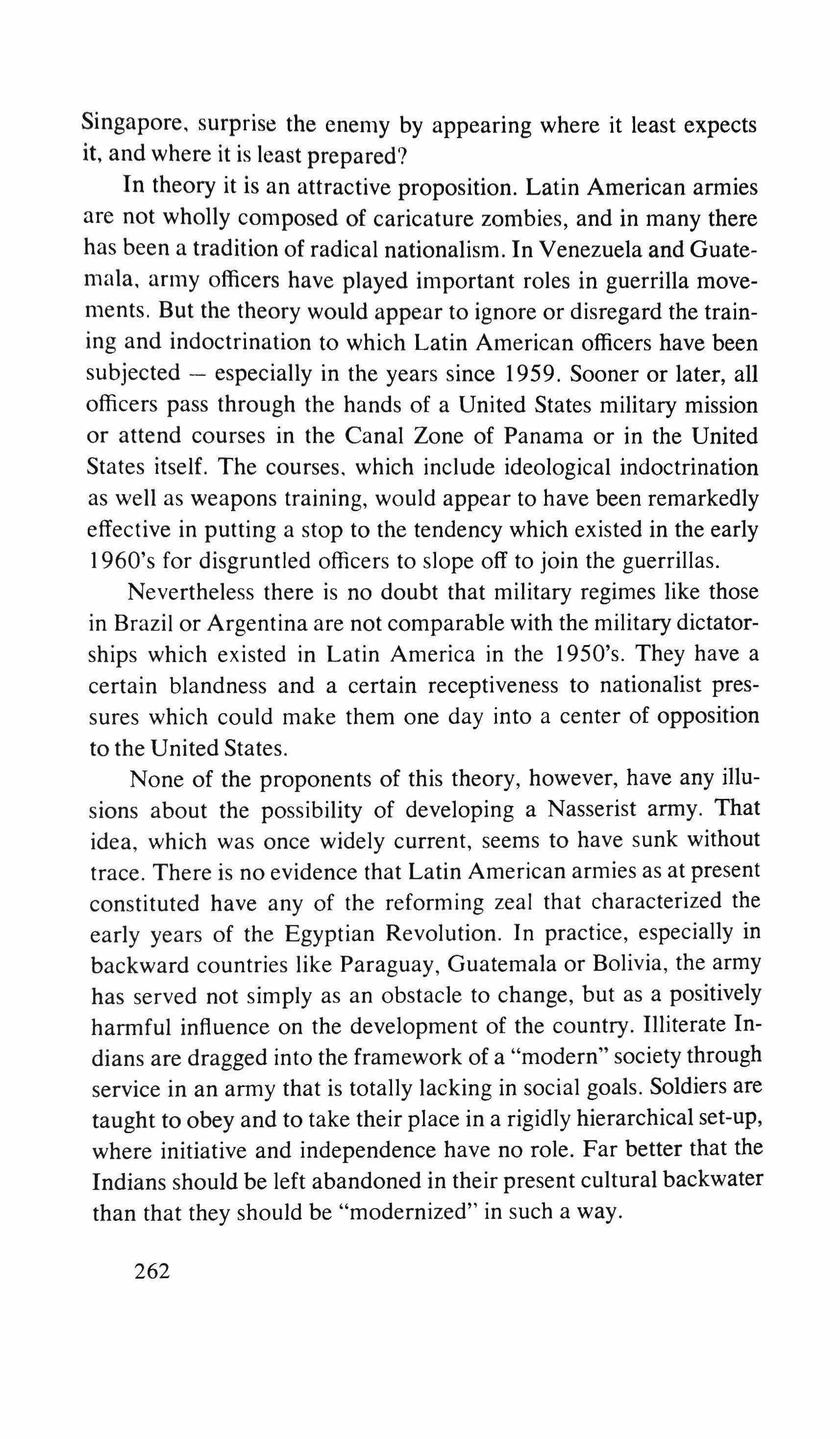
Singapore, surprise the enemy by appearing where it least expects it. and where it is least prepared?
In theory it is an attractive proposition. Latin American armies are not wholly composed of caricature zombies, and in many there has been a tradition of radical nationalism. In Venezuela and Guatemala. army officers have played important roles in guerrilla movements. But the theory would appear to ignore or disregard the training and indoctrination to which Latin American officers have been subjected - especially in the years since 1959. Sooner or later, all officers pass through the hands of a United States military mission or attend courses in the Canal Zone of Panama or in the United States itself. The courses, which include ideological indoctrination as well as weapons training. would appear to have been remarkedly effective in putting a stop to the tendency which existed in the early I 960's for disgruntled officers to slope off to join the guerrillas.
Nevertheless there is no doubt that military regimes like those in Brazil or Argentina are not comparable with the military dictatorships which existed in Latin America in the 1950's. They have a certain blandness and a certain receptiveness to nationalist pressures which could make them one day into a center of opposition to the United States.
None of the proponents of this theory, however, have any illusions about the possibility of developing a Nasserist army. That idea, which was once widely current, seems to have sunk without trace. There is no evidence that Latin American armies as at present constituted have any of the reforming zeal that characterized the early years of the Egyptian Revolution. In practice, especially in backward countries like Paraguay. Guatemala or Bolivia, the army has served not simply as an obstacle to change, but as a positively harmful influence on the development of the country. Illiterate Indians are dragged into the framework of a "modern" society through service in an army that is totally lacking in social goals. Soldiers are taught to obey and to take their place in a rigidly hierarchical set-up, where initiative and independence have no role. Far better that the Indians should be left abandoned in their present cultural backwater than that they should be "modernized" in such a way.
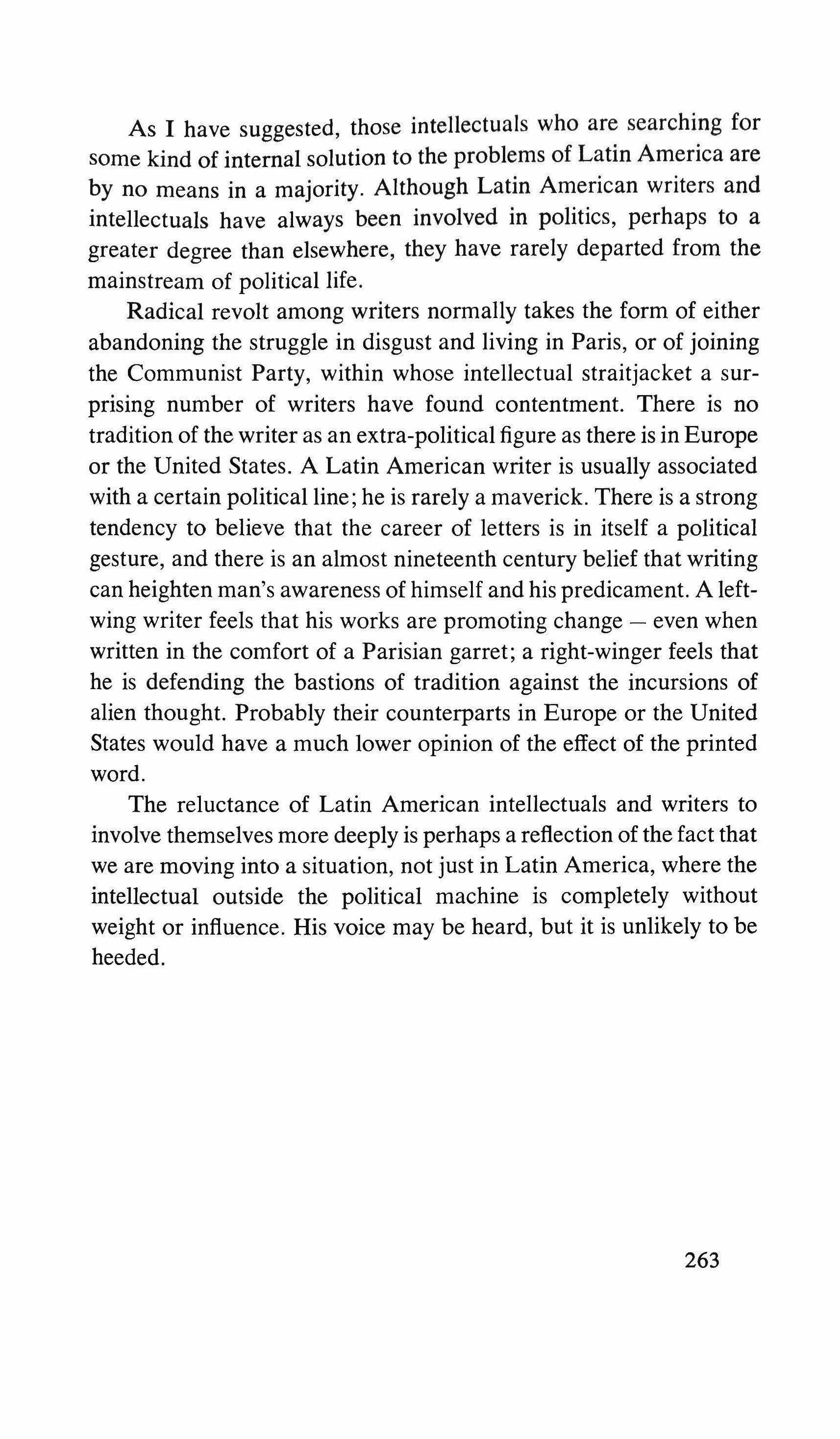
As I have suggested, those intellectuals who are searching for some kind of internal solution to the problems of Latin America are by no means in a majority. Although Latin American writers and intellectuals have always been involved in politics, perhaps to a greater degree than elsewhere, they have rarely departed from the mainstream of political life.
Radical revolt among writers normally takes the form of either abandoning the struggle in disgust and living in Paris, or of joining the Communist Party, within whose intellectual straitjacket a surprising number of writers have found contentment. There is no tradition of the writer as an extra-politicalfigure as there is in Europe or the United States. A Latin American writer is usually associated with a certain political line; he is rarely a maverick. There is a strong tendency to believe that the career of letters is in itself a political gesture, and there is an almost nineteenth century belief that writing can heighten man's awareness of himself and his predicament. A leftwing writer feels that his works are promoting change - even when written in the comfort of a Parisian garret; a right-winger feels that he is defending the bastions of tradition against the incursions of alien thought. Probably their counterparts in Europe or the United States would have a much lower opinion of the effect of the printed word.
The reluctance of Latin American intellectuals and writers to involve themselves more deeply is perhaps a reflection of the fact that we are moving into a situation, not just in Latin America, where the intellectual outside the political machine is completely without weight or influence. His voice may be heard, but it is unlikely to be heeded.
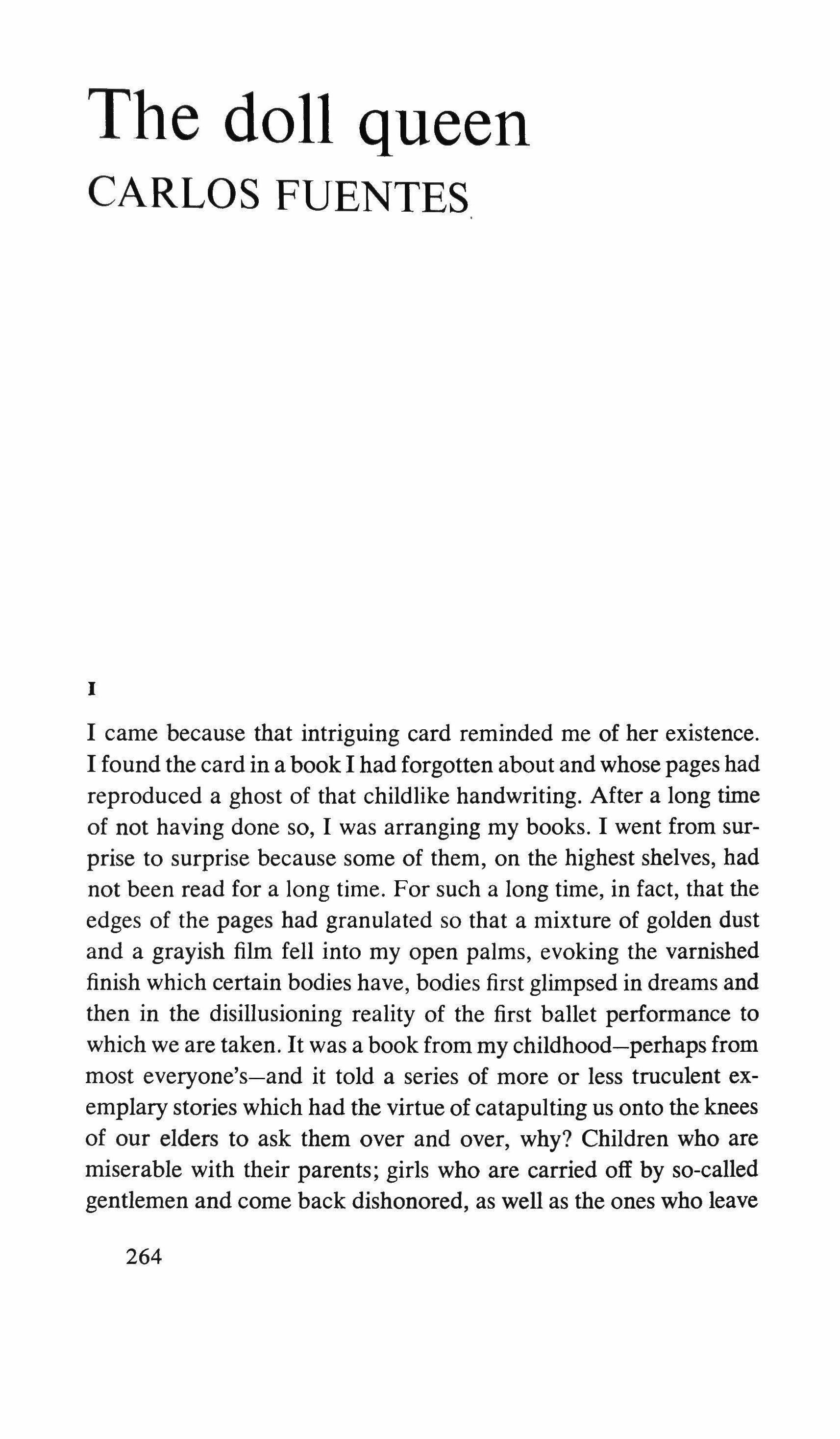
I
I came because that intriguing card reminded me of her existence. I found the card in a book I had forgotten about and whose pages had reproduced a ghost of that childlike handwriting. After a long time of not having done so, I was arranging my books. I went from surprise to surprise because some of them, on the highest shelves, had not been read for a long time. For such a long time, in fact, that the edges of the pages had granulated so that a mixture of golden dust and a grayish film fell into my open palms, evoking the varnished finish which certain bodies have, bodies first glimpsed in dreams and then in the disillusioning reality of the first ballet performance to which we are taken. It was a book from my childhood-perhaps from most everyone's-and it told a series of more or less truculent exemplary stories which had the virtue of catapulting us onto the knees of our elders to ask them over and over, why? Children who are miserable with their parents; girls who are carried off by so-called gentlemen and come back dishonored, as well as the ones who leave
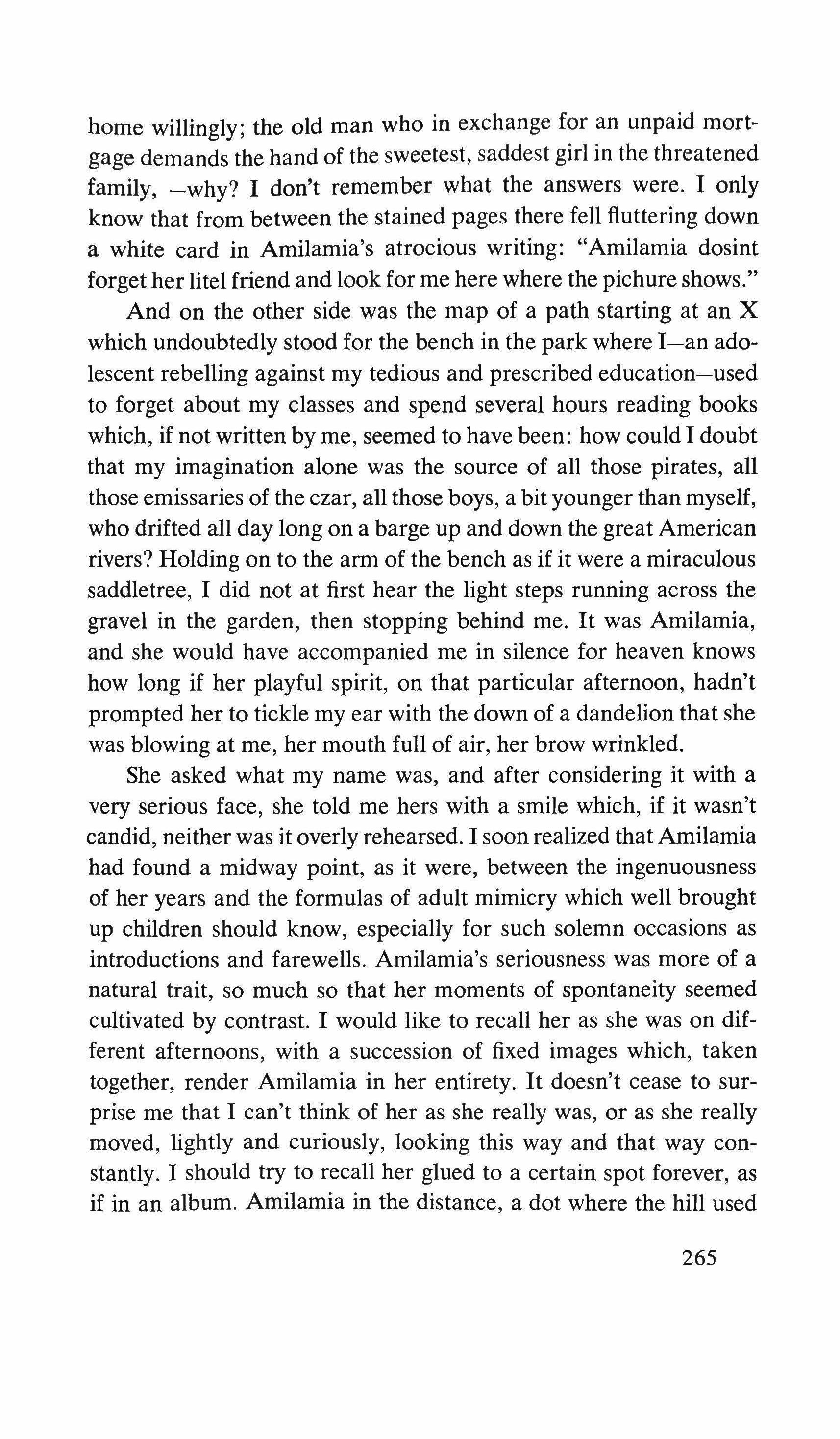
home willingly; the old man who in exchange for an unpaid mortgage demands the hand of the sweetest, saddest girl in the threatened family, -why? I don't remember what the answers were. I only know that from between the stained pages there fell fluttering down a white card in Amilamia's atrocious writing: "Amilamia dosint forget her litel friend and look for me here where the pichure shows."
And on the other side was the map of a path starting at an X which undoubtedly stood for the bench in the park where I-an adolescent rebelling against my tedious and prescribed education-used to forget about my classes and spend several hours reading books which, if not written by me, seemed to have been: how could I doubt that my imagination alone was the source of all those pirates, all those emissaries of the czar, all those boys, a bit younger than myself, who drifted all day long on a barge up and down the great American rivers? Holding on to the arm of the bench as if it were a miraculous saddletree, I did not at first hear the light steps running across the gravel in the garden, then stopping behind me. It was Amilamia, and she would have accompanied me in silence for heaven knows how long if her playful spirit, on that particular afternoon, hadn't prompted her to tickle my ear with the down of a dandelion that she was blowing at me, her mouth full of air, her brow wrinkled.
She asked what my name was, and after considering it with a very serious face, she told me hers with a smile which, if it wasn't candid, neither was it overly rehearsed. I soon realized that Amilamia had found a midway point, as it were, between the ingenuousness of her years and the formulas of adult mimicry which well brought up children should know, especially for such solemn occasions as introductions and farewells. Amilamia's seriousness was more of a natural trait, so much so that her moments of spontaneity seemed cultivated by contrast. I would like to recall her as she was on different afternoons, with a succession of fixed images which, taken together, render Amilamia in her entirety. It doesn't cease to surprise me that I can't think of her as she really was, or as she really moved, lightly and curiously, looking this way and that way constantly. I should try to recall her glued to a certain spot forever, as if in an album. Amilamia in the distance, a dot where the hill used
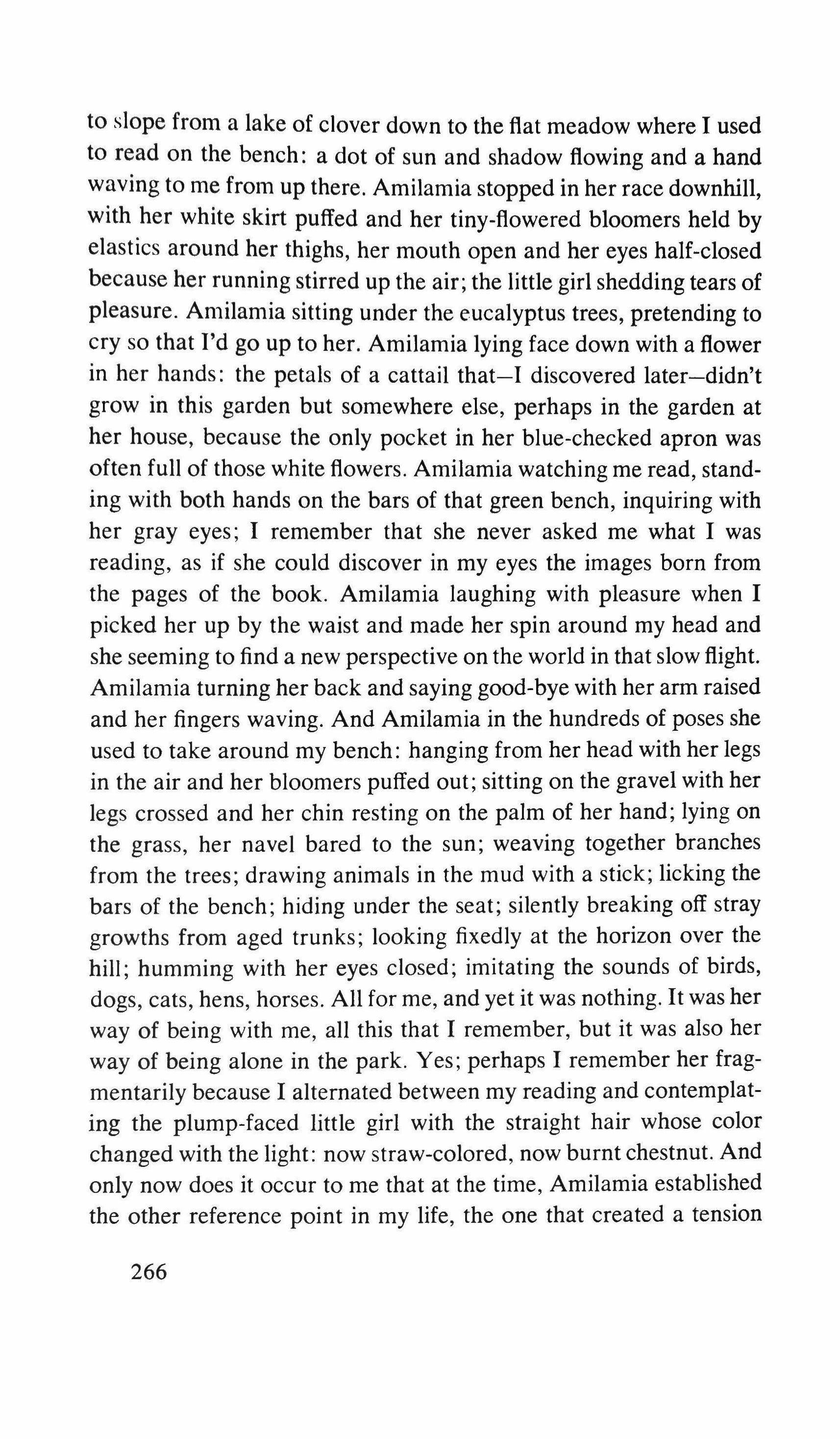
to slope from a lake of clover down to the flat meadow where I used to read on the bench: a dot of sun and shadow flowing and a hand waving to me from up there. Amilamia stopped in her race downhill, with her white skirt puffed and her tiny-flowered bloomers held by elastics around her thighs, her mouth open and her eyes half-closed because her running stirred up the air; the little girl shedding tears of pleasure. Amilamia sitting under the eucalyptus trees, pretending to cry so that I'd go up to her. Amilamia lying face down with a flower in her hands: the petals of a cattail that-I discovered later-didn't grow in this garden but somewhere else, perhaps in the garden at her house, because the only pocket in her blue-checked apron was often full of those white flowers. Amilamia watching me read, standing with both hands on the bars of that green bench, inquiring with her gray eyes; I remember that she never asked me what I was reading, as if she could discover in my eyes the images born from the pages of the book. Amilamia laughing with pleasure when I picked her up by the waist and made her spin around my head and she seeming to find a new perspective on the world in that slow flight. Amilamia turning her back and saying good-bye with her arm raised and her fingers waving. And Amilamia in the hundreds of poses she used to take around my bench: hanging from her head with her legs in the air and her bloomers puffed out; sitting on the gravel with her legs crossed and her chin resting on the palm of her hand; lying on the grass, her navel bared to the sun; weaving together branches from the trees; drawing animals in the mud with a stick; licking the bars of the bench; hiding under the seat; silently breaking off stray growths from aged trunks; looking fixedly at the horizon over the hill; humming with her eyes closed; imitating the sounds of birds, dogs, cats, hens, horses. All for me, and yet it was nothing. It was her way of being with me, all this that I remember, but it was also her way of being alone in the park. Yes; perhaps I remember her fragmentarily because I alternated between my reading and contemplating the plump-faced little girl with the straight hair whose color changed with the light: now straw-colored, now burnt chestnut. And only now does it occur to me that at the time, Amilamia established the other reference point in my life, the one that created a tension
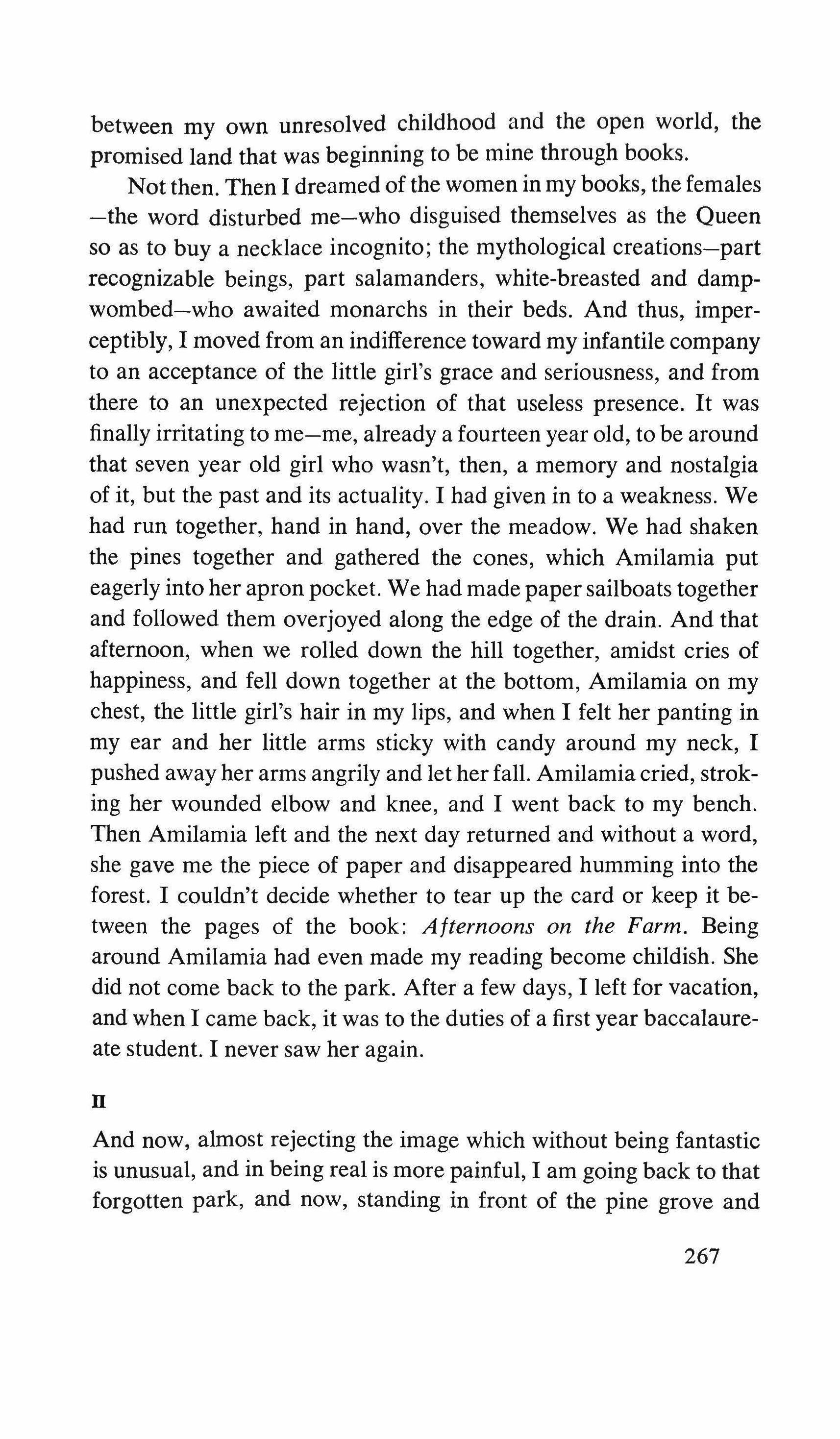
between my own unresolved childhood and the open world, the promised land that was beginning to be mine through books. Not then. Then I dreamed of the women in my books, the females -the word disturbed me-who disguised themselves as the Queen so as to buy a necklace incognito; the mythological creations-part recognizable beings, part salamanders, white-breasted and dampwombed-who awaited monarchs in their beds. And thus, imperceptibly, I moved from an indifference toward my infantile company to an acceptance of the little girl's grace and seriousness, and from there to an unexpected rejection of that useless presence. It was finally irritating to me-me, already a fourteen year old, to be around that seven year old girl who wasn't, then, a memory and nostalgia of it, but the past and its actuality. I had given in to a weakness. We had run together, hand in hand, over the meadow. We had shaken the pines together and gathered the cones, which Amilamia put eagerly into her apron pocket. We had made paper sailboats together and followed them overjoyed along the edge of the drain. And that afternoon, when we rolled down the hill together, amidst cries of happiness, and fell down together at the bottom, Amilamia on my chest, the little girl's hair in my lips, and when I felt her panting in my ear and her little arms sticky with candy around my neck, I pushed away her arms angrily and let her fall. Amilamia cried, stroking her wounded elbow and knee, and I went back to my bench. Then Amilamia left and the next day returned and without a word, she gave me the piece of paper and disappeared humming into the forest. I couldn't decide whether to tear up the card or keep it between the pages of the book: Afternoons on the Farm. Being around Amilamia had even made my reading become childish. She did not come back to the park. After a few days, I left for vacation, and when I came back, it was to the duties of a first year baccalaureate student. I never saw her again.
And now, almost rejecting the image which without being fantastic is unusual, and in being real is more painful, I am going back to that forgotten park, and now, standing in front of the pine grove and 267
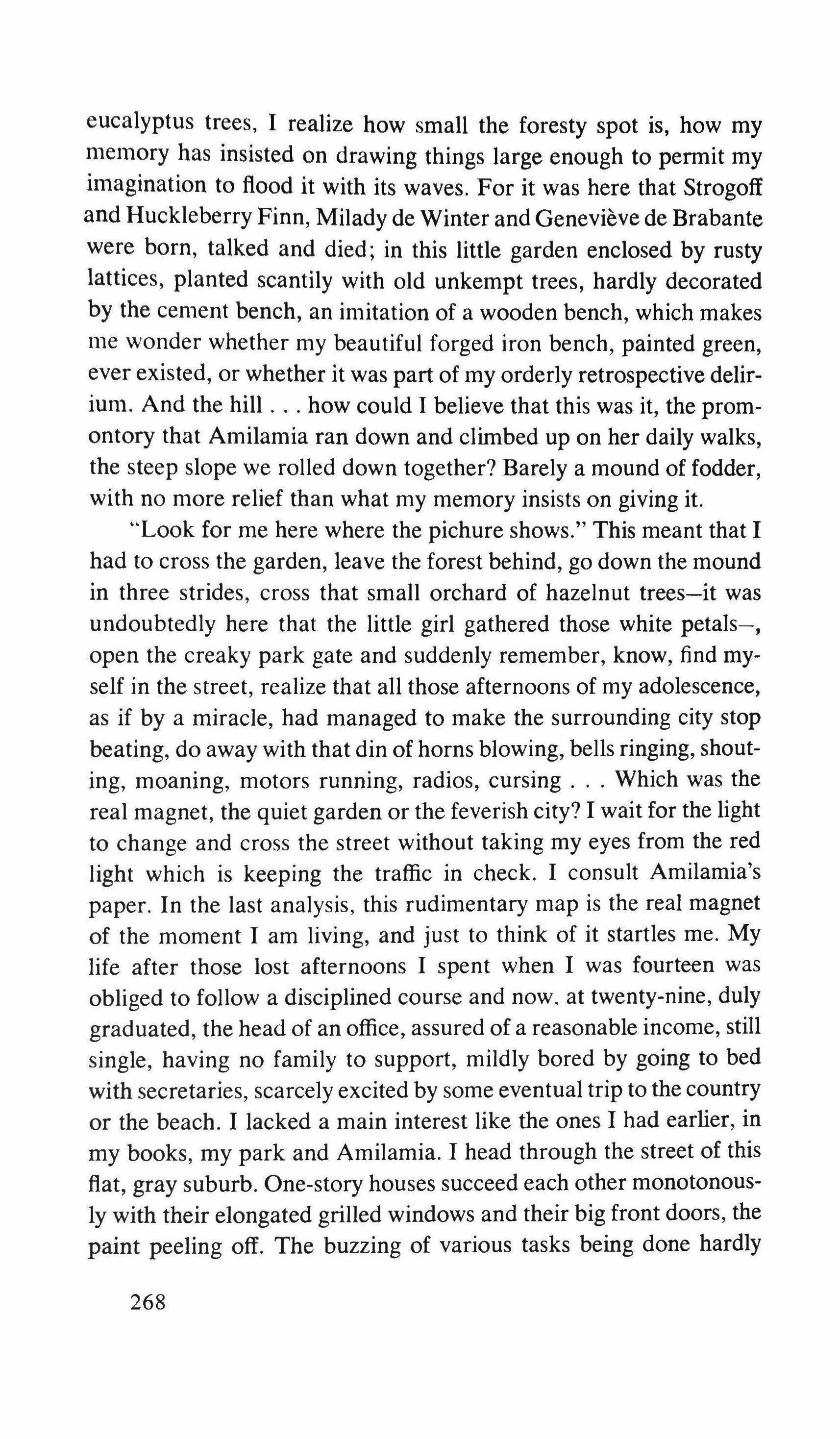
eucalyptus trees, I realize how small the foresty spot is, how my memory has insisted on drawing things large enough to permit my imagination to flood it with its waves. For it was here that Strogoff and Huckleberry Finn, Milady de Winter and Genevieve de Brabante were born, talked and died; in this little garden enclosed by rusty lattices, planted scantily with old unkempt trees, hardly decorated by the cement bench, an imitation of a wooden bench, which makes me wonder whether my beautiful forged iron bench, painted green, ever existed, or whether it was part of my orderly retrospective delirium. And the hill how could I believe that this was it, the promontory that Amilamia ran down and climbed up on her daily walks, the steep slope we rolled down together? Barely a mound of fodder, with no more relief than what my memory insists on giving it.
"Look for me here where the pichure shows." This meant that I had to cross the garden, leave the forest behind, go down the mound in three strides, cross that small orchard of hazelnut trees-it was undoubtedly here that the little girl gathered those white petals-, open the creaky park gate and suddenly remember, know, find myself in the street, realize that all those afternoons of my adolescence, as if by a miracle, had managed to make the surrounding city stop beating, do away with that din of horns blowing, bells ringing, shouting, moaning, motors running, radios, cursing Which was the real magnet, the quiet garden or the feverish city? I wait for the light to change and cross the street without taking my eyes from the red light which is keeping the traffic in check. I consult Amilamia's paper. In the last analysis, this rudimentary map is the real magnet of the moment I am living, and just to think of it startles me. My life after those lost afternoons I spent when I was fourteen was obliged to follow a disciplined course and now. at twenty-nine, duly graduated, the head of an office, assured of a reasonable income, still single, having no family to support, mildly bored by going to bed with secretaries, scarcely excited by some eventual trip to the country or the beach. I lacked a main interest like the ones I had earlier, in my books, my park and Amilamia. I head through the street of this flat, gray suburb. One-story houses succeed each other monotonously with their elongated grilled windows and their big front doors, the paint peeling off. The buzzing of various tasks being done hardly
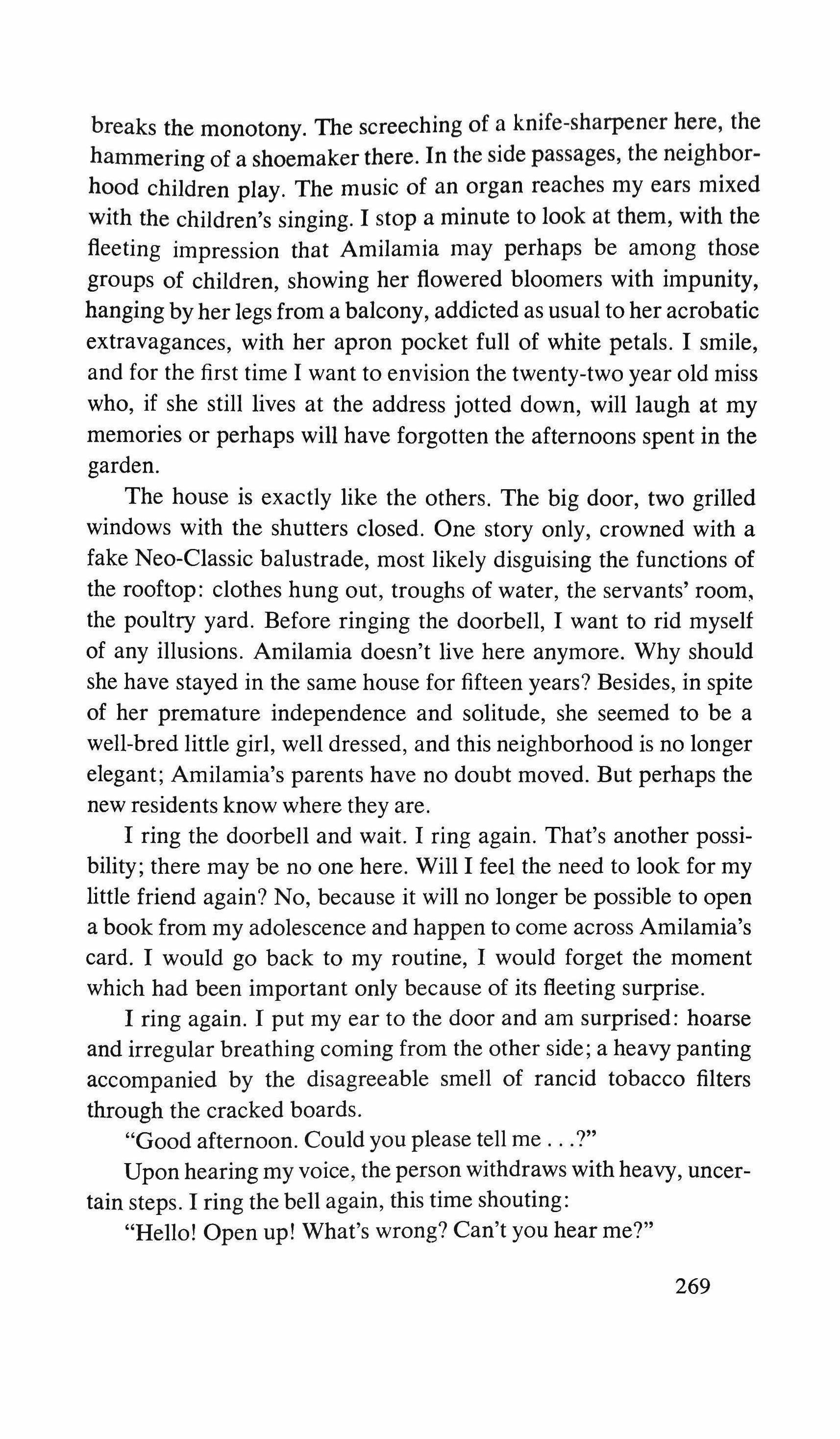
breaks the monotony. The screeching of a knife-sharpener here, the hammering of a shoemaker there. In the side passages, the neighborhood children play. The music of an organ reaches my ears mixed with the children's singing. I stop a minute to look at them, with the fleeting impression that Amilamia may perhaps be among those groups of children, showing her flowered bloomers with impunity, hanging by her legs from a balcony, addicted as usual to her acrobatic extravagances, with her apron pocket full of white petals. I smile, and for the first time I want to envision the twenty-two year old miss who, if she still lives at the address jotted down, will laugh at my memories or perhaps will have forgotten the afternoons spent in the garden.
The house is exactly like the others. The big door, two grilled windows with the shutters closed. One story only, crowned with a fake Neo-Classic balustrade, most likely disguising the functions of the rooftop: clothes hung out, troughs of water, the servants' room, the poultry yard. Before ringing the doorbell, I want to rid myself of any illusions. Amilamia doesn't live here anymore. Why should she have stayed in the same house for fifteen years? Besides, in spite of her premature independence and solitude, she seemed to be a well-bred little girl, well dressed, and this neighborhood is no longer elegant; Amilamia's parents have no doubt moved. But perhaps the new residents know where they are.
I ring the doorbell and wait. I ring again. That's another possibility; there may be no one here. Will I feel the need to look for my little friend again? No, because it will no longer be possible to open a book from my adolescence and happen to come across Amilamia's card. I would go back to my routine, I would forget the moment which had been important only because of its fleeting surprise.
I ring again. I put my ear to the door and am surprised: hoarse and irregular breathing coming from the other side; a heavy panting accompanied by the disagreeable smell of rancid tobacco filters through the cracked boards.
"Good afternoon. Could you please tell me ?"
Upon hearing my voice, the person withdraws with heavy, uncertain steps. I ring the bell again, this time shouting: "Hello! Open up! What's wrong? Can't you hear me?"
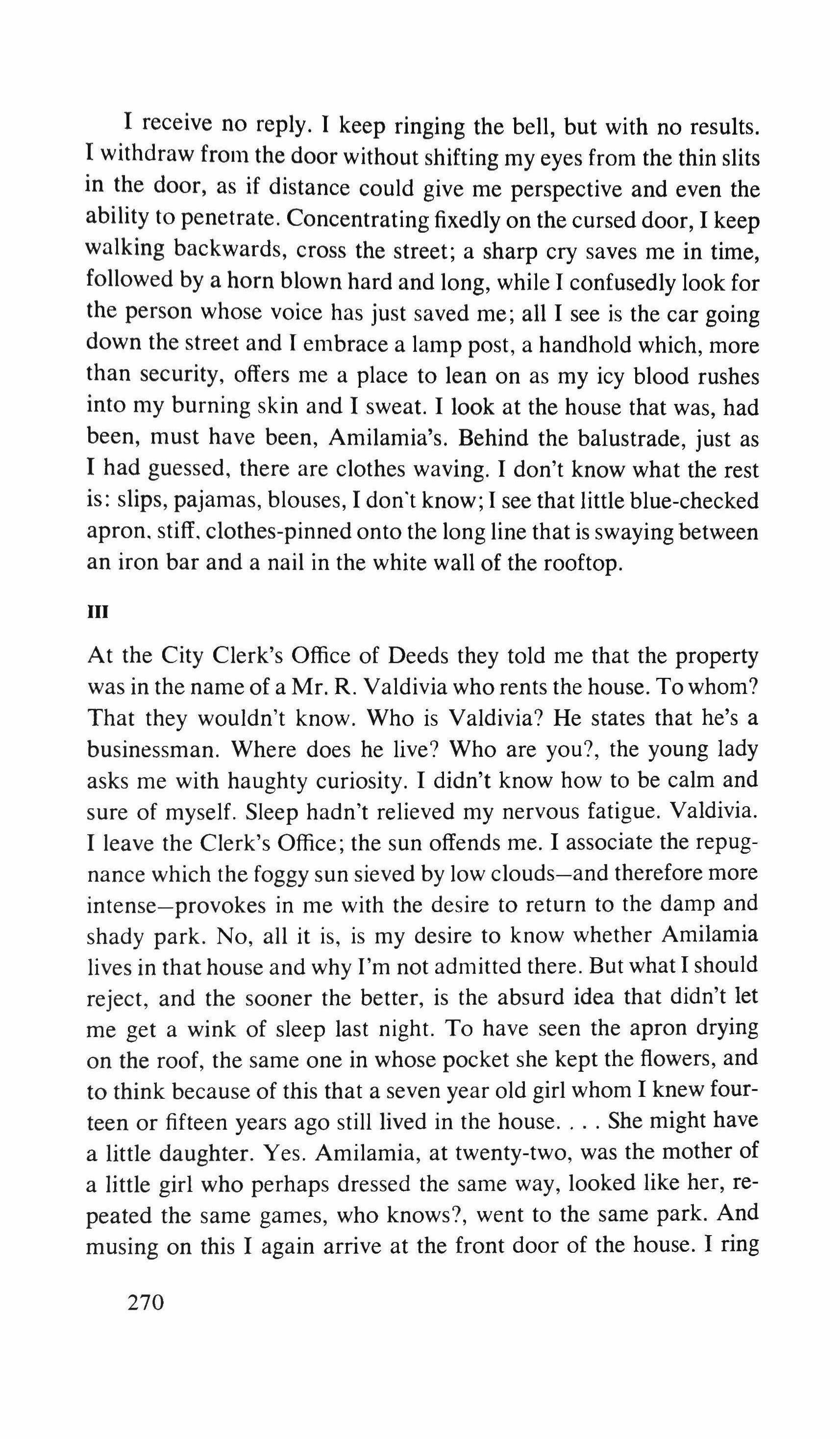
I receive no reply. I keep ringing the bell, but with no results. I withdraw from the door without shifting my eyes from the thin slits in the door, as if distance could give me perspective and even the ability to penetrate. Concentrating fixedly on the cursed door, I keep walking backwards, cross the street; a sharp cry saves me in time, followed by a horn blown hard and long, while I confusedly look for the person whose voice has just saved me; all I see is the car going down the street and r embrace a lamp post, a handhold which, more than security, offers me a place to lean on as my icy blood rushes into my burning skin and I sweat. I look at the house that was, had been, must have been, Amilamia's. Behind the balustrade, just as I had guessed, there are clothes waving. I don't know what the rest is: slips, pajamas, blouses, I don't know; I see that little blue-checked apron, stiff, clothes-pinned onto the long line that is swaying between an iron bar and a nail in the white wall of the rooftop.
At the City Clerk's Office of Deeds they told me that the property was in the name of a Mr. R. Valdivia who rents the house. To whom? That they wouldn't know. Who is Valdivia? He states that he's a businessman. Where does he live? Who are you?, the young lady asks me with haughty curiosity. I didn't know how to be calm and sure of myself. Sleep hadn't relieved my nervous fatigue. Valdivia. I leave the Clerk's Office; the sun offends me. I associate the repugnance which the foggy sun sieved by low clouds-and therefore more intense-provokes in me with the desire to return to the damp and shady park. No, all it is, is my desire to know whether Amilamia lives in that house and why I'm not admitted there. But what I should reject, and the sooner the better, is the absurd idea that didn't let me get a wink of sleep last night. To have seen the apron drying on the roof, the same one in whose pocket she kept the flowers, and to think because of this that a seven year old girl whom I knew fourteen or fifteen years ago still lived in the house She might have a little daughter. Yes. Amilamia, at twenty-two, was the mother of a little girl who perhaps dressed the same way, looked like her, repeated the same games, who knows?, went to the same park. And musing on this I again arrive at the front door of the house. I ring
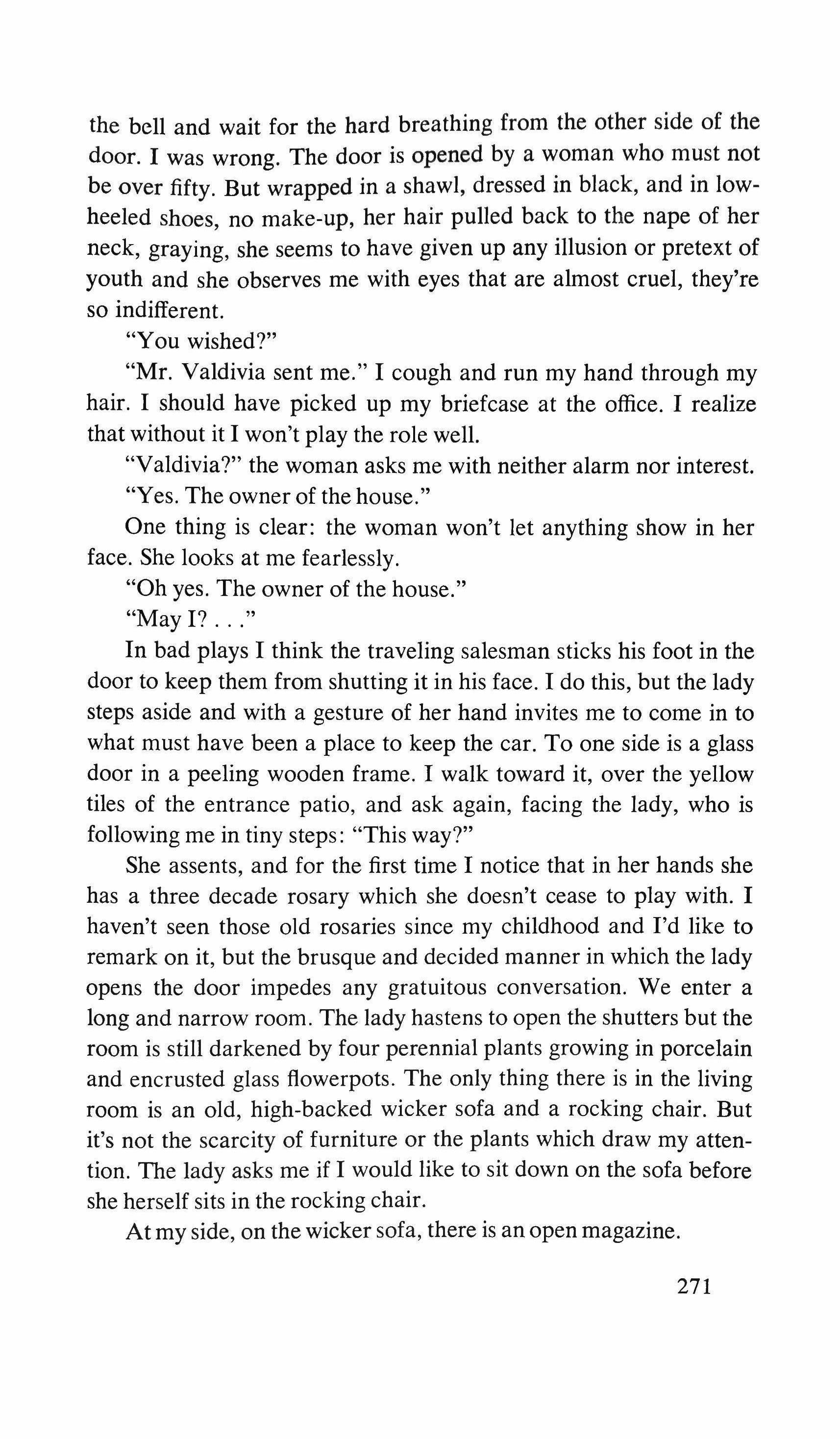
the bell and wait for the hard breathing from the other side of the door. I was wrong. The door is opened by a woman who must not be over fifty. But wrapped in a shawl, dressed in black, and in lowheeled shoes, no make-up, her hair pulled back to the nape of her neck, graying, she seems to have given up any illusion or pretext of youth and she observes me with eyes that are almost cruel, they're so indifferent.
"You wished?"
"Mr. Valdivia sent me." I cough and run my hand through my hair. I should have picked up my briefcase at the office. I realize that without it I won't play the role well.
"Valdivia?" the woman asks me with neither alarm nor interest.
"Yes. The owner of the house."
One thing is clear: the woman won't let anything show in her face. She looks at me fearlessly.
"Oh yes. The owner of the house."
In bad plays I think the traveling salesman sticks his foot in the door to keep them from shutting it in his face. I do this, but the lady steps aside and with a gesture of her hand invites me to come in to what must have been a place to keep the car. To one side is a glass door in a peeling wooden frame. I walk toward it, over the yellow tiles of the entrance patio, and ask again, facing the lady, who is following me in tiny steps: "This way?"
She assents, and for the first time I notice that in her hands she has a three decade rosary which she doesn't cease to play with. I haven't seen those old rosaries since my childhood and I'd like to remark on it, but the brusque and decided manner in which the lady opens the door impedes any gratuitous conversation. We enter a long and narrow room. The lady hastens to open the shutters but the room is still darkened by four perennial plants growing in porcelain and encrusted glass flowerpots. The only thing there is in the living room is an old, high-backed wicker sofa and a rocking chair. But it's not the scarcity of furniture or the plants which draw my attention. The lady asks me if I would like to sit down on the sofa before she herself sits in the rocking chair.
At my side, on the wicker sofa, there is an open magazine.
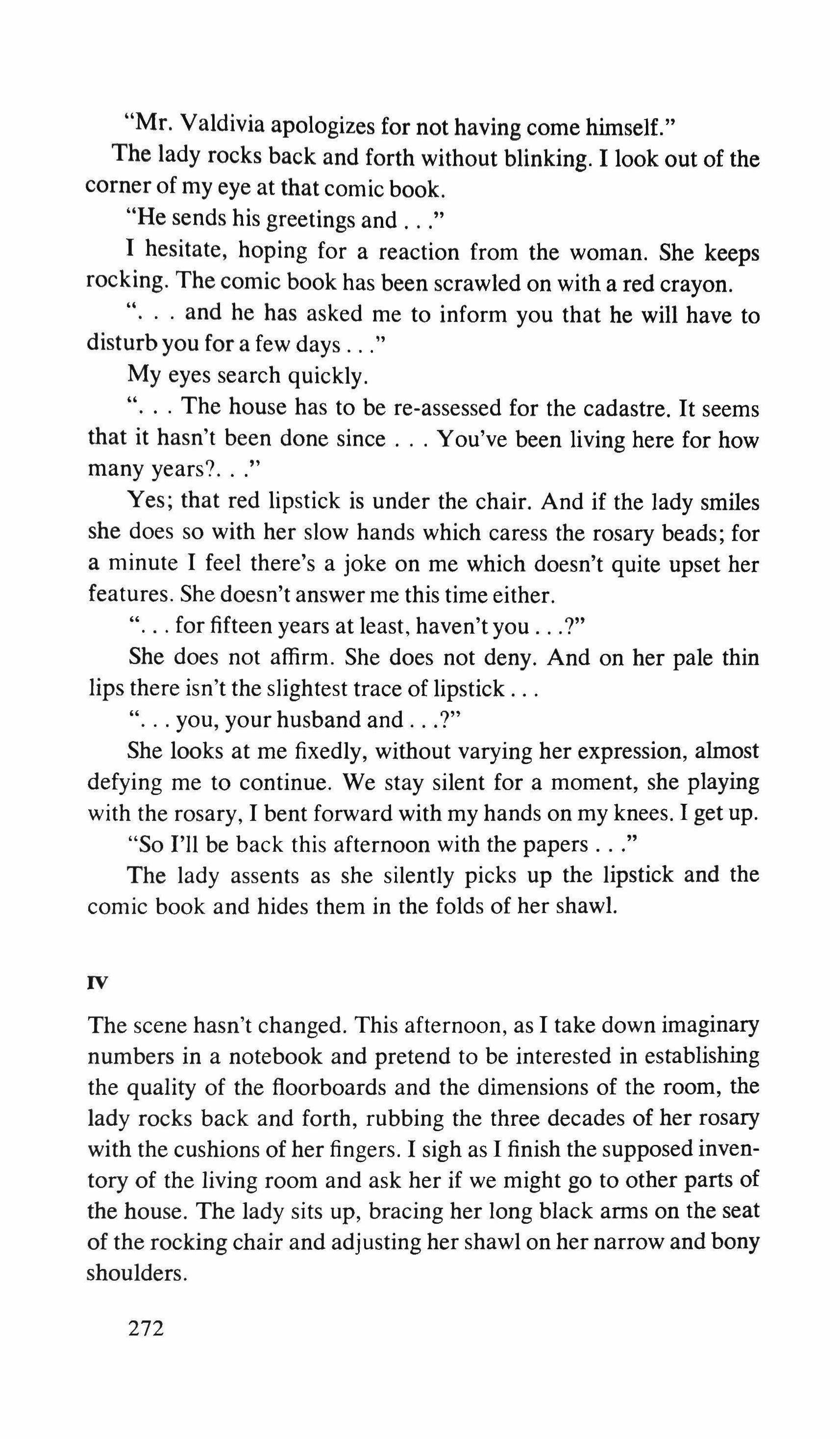
"Mr. Valdivia apologizes for not having come himself." The lady rocks back and forth without blinking. I look out of the corner of my eye at that comic book.
"He sends his greetings and I hesitate, hoping for a reaction from the woman. She keeps rocking. The comic book has been scrawled on with a red crayon. ", and he has asked me to inform you that he will have to disturb you for a few days
My eyes search quickly.
" The house has to be re-assessed for the cadastre. It seems that it hasn't been done since You've been living here for how many years?
Yes; that red lipstick is under the chair. And if the lady smiles she does so with her slow hands which caress the rosary beads; for a minute I feel there's a joke on me which doesn't quite upset her features. She doesn't answer me this time either. for fifteen years at least, haven't you ?"
She does not affirm. She does not deny. And on her pale thin lips there isn't the slightest trace of lipstick h b d d ?" you, your us an an
She looks at me fixedly, without varying her expression, almost defying me to continue. We stay silent for a moment, she playing with the rosary, I bent forward with my hands on my knees. I get up.
"So I'll be back this afternoon with the papers "
The lady assents as she silently picks up the lipstick and the comic book and hides them in the folds of her shawl.
The scene hasn't changed. This afternoon, as I take down imaginary numbers in a notebook and pretend to be interested in establishing the quality of the floorboards and the dimensions of the room, the lady rocks back and forth, rubbing the three decades of her rosary with the cushions of her fingers. I sigh as I finish the supposed inventory of the living room and ask her if we might go to other parts of the house. The lady sits up, bracing her long black arms on the seat of the rocking chair and adjusting her shawl on her narrow and bony shoulders.
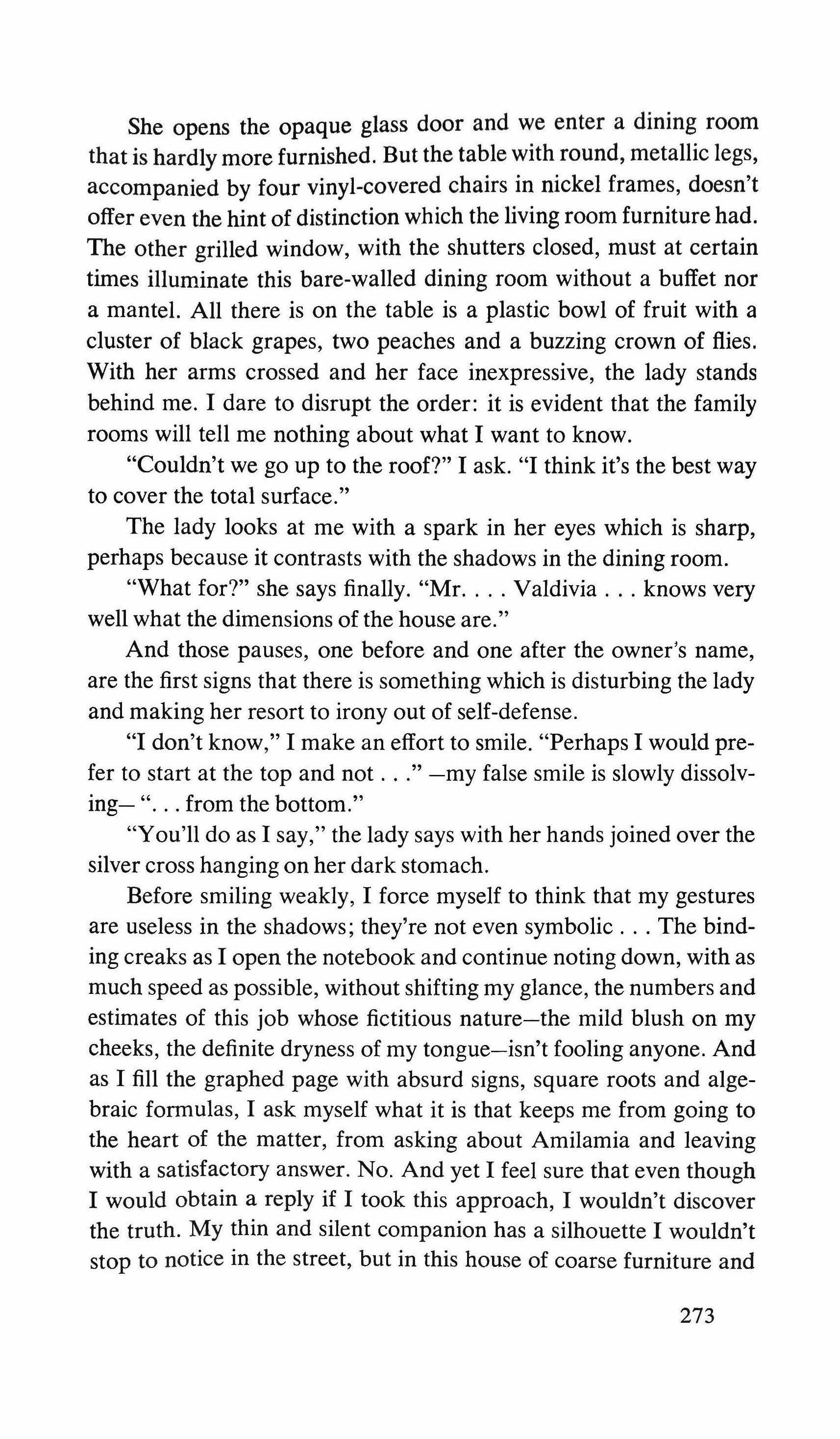
She opens the opaque glass door and we enter a dining room that is hardly more furnished. But the table with round, metallic legs, accompanied by four vinyl-covered chairs in nickel frames, doesn't offer even the hint of distinction which the living room furniture had. The other grilled window, with the shutters closed, must at certain times illuminate this bare-walled dining room without a buffet nor a mantel. All there is on the table is a plastic bowl of fruit with a cluster of black grapes, two peaches and a buzzing crown of flies. With her arms crossed and her face inexpressive, the lady stands behind me. I dare to disrupt the order: it is evident that the family rooms will tell me nothing about what I want to know.
"Couldn't we go up to the roof?" I ask. "I think it's the best way to cover the total surface."
The lady looks at me with a spark in her eyes which is sharp, perhaps because it contrasts with the shadows in the dining room.
"What for?" she says finally. "Mr Valdivia knows very well what the dimensions of the house are."
And those pauses, one before and one after the owner's name, are the first signs that there is something which is disturbing the lady and making her resort to irony out of self-defense.
"I don't know," I make an effort to smile. "Perhaps I would prefer to start at the top and not " -my false smile is slowly dissolving- from the bottom."
"You'll do as I say," the lady says with her hands joined over the silver cross hanging on her dark stomach.
Before smiling weakly, I force myself to think that my gestures are useless in the shadows; they're not even symbolic The binding creaks as I open the notebook and continue noting down, with as much speed as possible, without shifting my glance, the numbers and estimates of this job whose fictitious nature-the mild blush on my cheeks, the definite dryness of my tongue-isn't fooling anyone. And as I fill the graphed page with absurd signs, square roots and algebraic formulas, I ask myself what it is that keeps me from going to the heart of the matter, from asking about Amilamia and leaving with a satisfactory answer. No. And yet I feel sure that even though I would obtain a reply if I took this approach, I wouldn't discover the truth. My thin and silent companion has a silhouette I wouldn't stop to notice in the street, but in this house of coarse furniture and
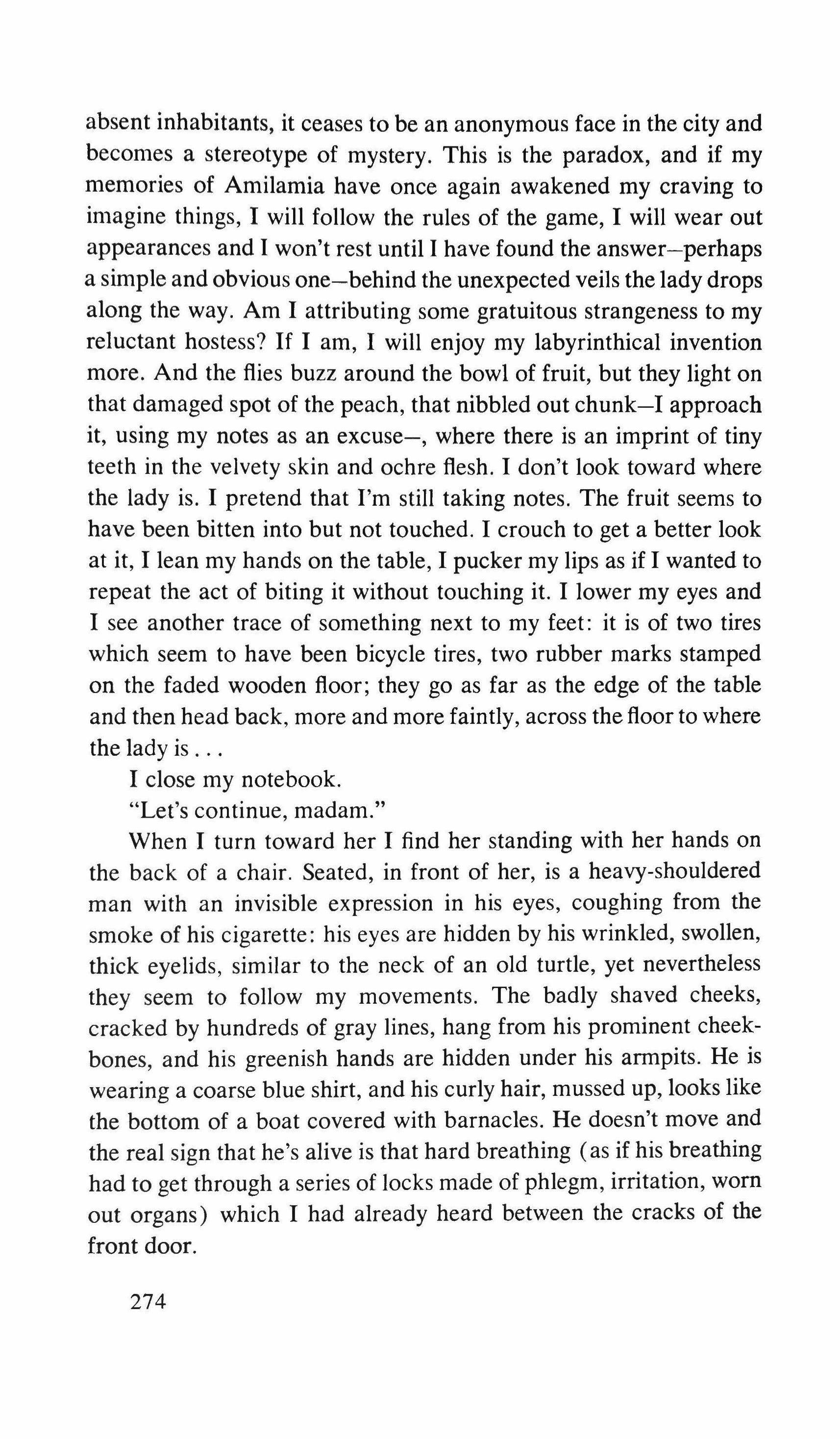
absent inhabitants, it ceases to be an anonymous face in the city and becomes a stereotype of mystery. This is the paradox, and if my memories of Amilamia have once again awakened my craving to imagine things, I will follow the rules of the game, I will wear out appearances and I won't rest until I have found the answer-perhaps a simple and obvious one-behind the unexpected veils the lady drops along the way. Am I attributing some gratuitous strangeness to my reluctant hostess? If I am, I will enjoy my labyrinthical invention more. And the flies buzz around the bowl of fruit, but they light on that damaged spot of the peach, that nibbled out chunk-I approach it, using my notes as an excuse-, where there is an imprint of tiny teeth in the velvety skin and ochre flesh. I don't look toward where the lady is. I pretend that I'm still taking notes. The fruit seems to have been bitten into but not touched. I crouch to get a better look at it, I lean my hands on the table, I pucker my lips as if I wanted to repeat the act of biting it without touching it. I lower my eyes and I see another trace of something next to my feet: it is of two tires which seem to have been bicycle tires, two rubber marks stamped on the faded wooden floor; they go as far as the edge of the table and then head back, more and more faintly, across the floor to where the lady is
I close my notebook.
"Let's continue, madam."
When I turn toward her I find her standing with her hands on the back of a chair. Seated, in front of her, is a heavy-shouldered man with an invisible expression in his eyes, coughing from the smoke of his cigarette: his eyes are hidden by his wrinkled, swollen, thick eyelids, similar to the neck of an old turtle, yet nevertheless they seem to follow my movements. The badly shaved cheeks, cracked by hundreds of gray lines, hang from his prominent cheekbones, and his greenish hands are hidden under his armpits. He is wearing a coarse blue shirt, and his curly hair, mussed up, looks like the bottom of a boat covered with barnacles. He doesn't move and the real sign that he's alive is that hard breathing (as if his breathing had to get through a series of locks made of phlegm, irritation, worn out organs) which I had already heard between the cracks of the front door.
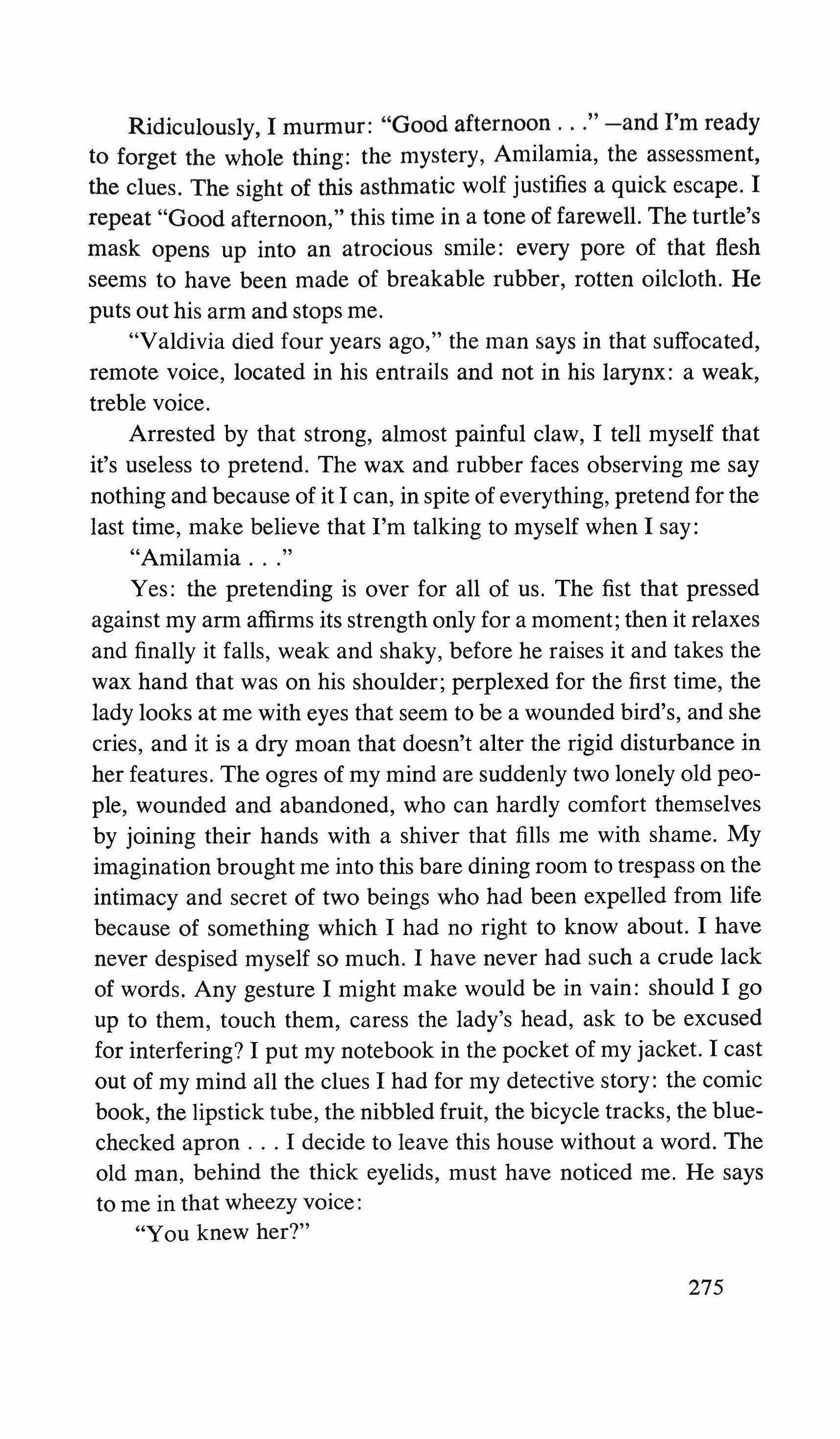
Ridiculously, I murmur: "Good afternoon -and I'm ready to forget the whole thing: the mystery, Amilamia, the assessment, the clues. The sight of this asthmatic wolf justifies a quick escape. I repeat "Good afternoon," this time in a tone of farewell. The turtle's mask opens up into an atrocious smile: every pore of that flesh seems to have been made of breakable rubber, rotten oilcloth. He puts out his arm and stops me.
"Valdivia died four years ago," the man says in that suffocated, remote voice, located in his entrails and not in his larynx: a weak, treble voice.
Arrested by that strong, almost painful claw, I tell myself that it's useless to pretend. The wax and rubber faces observing me say nothing and because of it I can, in spite of everything, pretend for the last time, make believe that I'm talking to myself when I say: "Amilamia
Yes: the pretending is over for all of us. The fist that pressed against my arm affirms its strength only for a moment; then it relaxes and finally it falls, weak and shaky, before he raises it and takes the wax hand that was on his shoulder; perplexed for the first time, the lady looks at me with eyes that seem to be a wounded bird's, and she cries, and it is a dry moan that doesn't alter the rigid disturbance in her features. The ogres of my mind are suddenly two lonely old people, wounded and abandoned, who can hardly comfort themselves by joining their hands with a shiver that fills me with shame. My imagination brought me into this bare dining room to trespass on the intimacy and secret of two beings who had been expelled from life because of something which I had no right to know about. I have never despised myself so much. I have never had such a crude lack of words. Any gesture I might make would be in vain: should I go up to them, touch them, caress the lady's head, ask to be excused for interfering? I put my notebook in the pocket of my jacket. I cast out of my mind all the clues I had for my detective story: the comic book, the lipstick tube, the nibbled fruit, the bicycle tracks, the bluechecked apron I decide to leave this house without a word. The old man, behind the thick eyelids, must have noticed me. He says to me in that wheezy voice:
"You knew her?"
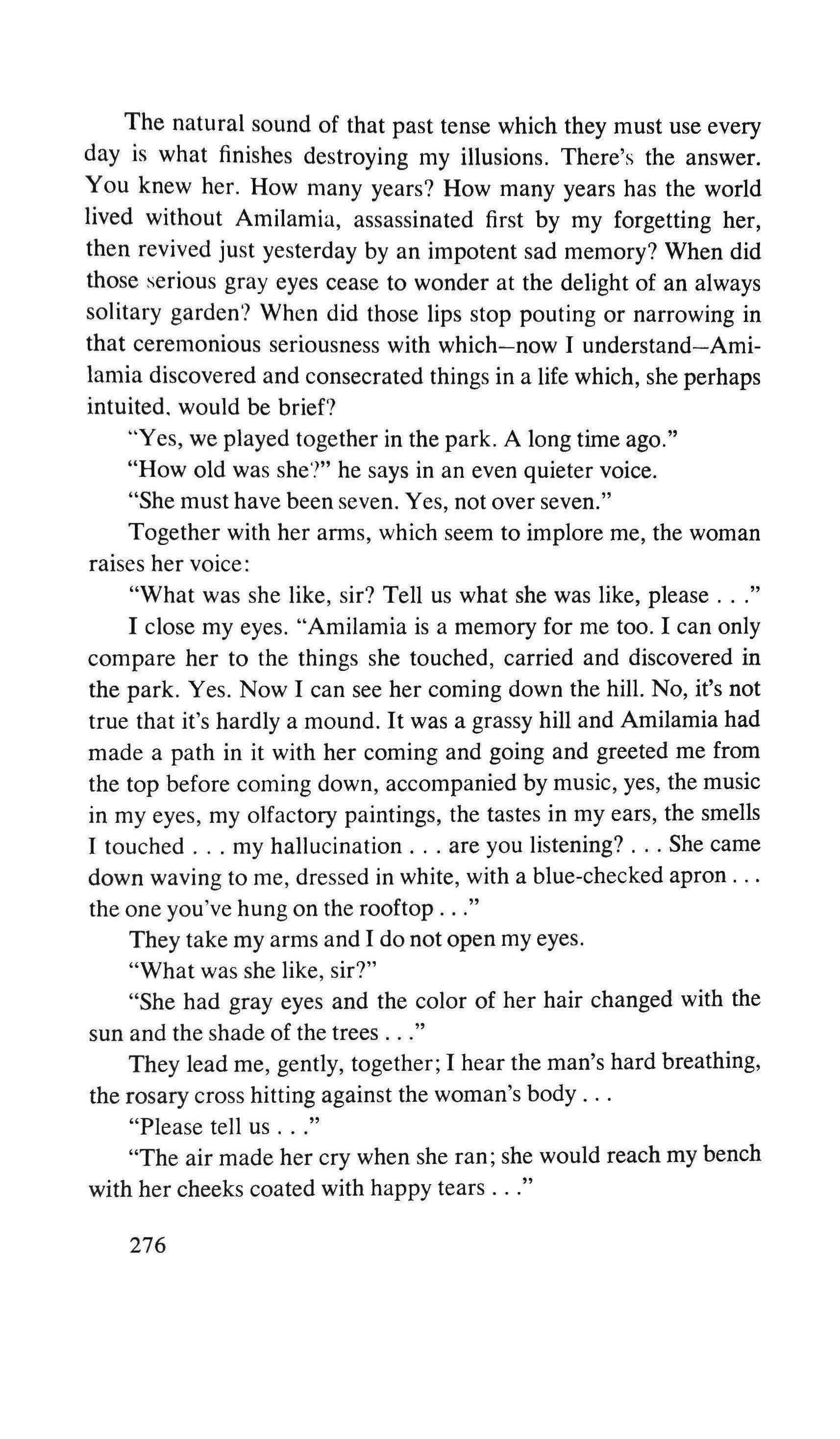
The natural sound of that past tense which they must use every day is what finishes destroying my illusions. There's the answer. You knew her. How many years? How many years has the world lived without Amilamia, assassinated first by my forgetting her, then revived just yesterday by an impotent sad memory? When did those serious gray eyes cease to wonder at the delight of an always solitary garden? When did those lips stop pouting or narrowing in that ceremonious seriousness with which-now I understand-Amilamia discovered and consecrated things in a life which, she perhaps intuited. would be brief?
"Yes, we played together in the park. A long time ago."
"How old was she'?" he says in an even quieter voice.
"She must have been seven. Yes, not over seven."
Together with her arms, which seem to implore me, the woman raises her voice:
"What was she like, sir? Tell us what she was like, please "
I close my eyes. "Amilamia is a memory for me too. I can only compare her to the things she touched, carried and discovered in the park. Yes. Now I can see her coming down the hill. No, it's not true that it's hardly a mound. It was a grassy hill and Amilamia had made a path in it with her coming and going and greeted me from the top before coming down, accompanied by music, yes, the music in my eyes, my olfactory paintings, the tastes in my ears, the smells I touched my hallucination are you listening? She came down waving to me, dressed in white, with a blue-checked apron the one you've hung on the rooftop
They take my arms and I do not open my eyes.
"What was she like, sir?"
"She had gray eyes and the color of her hair changed with the sun and the shade of the trees
They lead me, gently, together; I hear the man's hard breathing, the rosary cross hitting against the woman's body
"Please tell us
"The air made her cry when she ran; she would reach my bench with her cheeks coated with happy tears
276
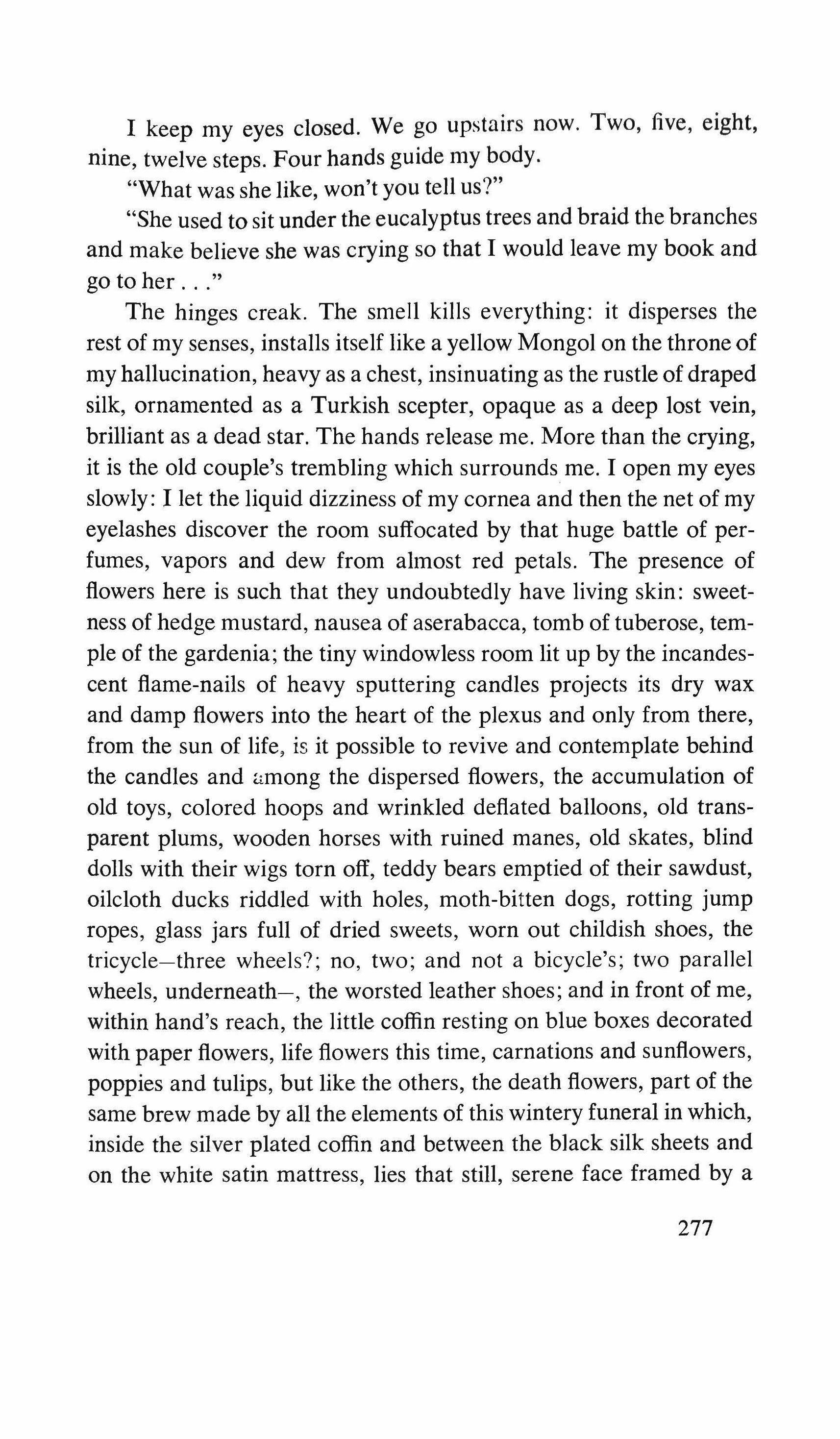
I keep my eyes closed. We go upstairs now. Two, five, eight, nine, twelve steps. Four hands guide my body.
"What was she like, won't you tell us?"
"She used to sit under the eucalyptus trees and braid the branches and make believe she was crying so that I would leave my book and go to her "
The hinges creak. The smell kills everything: it disperses the rest of my senses, installs itself like a yellow Mongol on the throne of my hallucination, heavy as a chest, insinuating as the rustle of draped silk, ornamented as a Turkish scepter, opaque as a deep lost vein, brilliant as a dead star. The hands release me. More than the crying, it is the old couple's trembling which surrounds me. I open my eyes slowly: I let the liquid dizziness of my cornea and then the net of my eyelashes discover the room suffocated by that huge battle of perfumes, vapors and dew from almost red petals. The presence of flowers here is such that they undoubtedly have living skin: sweetness of hedge mustard, nausea of aserabacca, tomb of tuberose, temple of the gardenia; the tiny windowless room lit up by the incandescent flame-nails of heavy sputtering candles projects its dry wax and damp flowers into the heart of the plexus and only from there, from the sun of life, is it possible to revive and contemplate behind the candles and among the dispersed flowers, the accumulation of old toys, colored hoops and wrinkled deflated balloons, old transparent plums, wooden horses with ruined manes, old skates, blind dolls with their wigs torn off, teddy bears emptied of their sawdust, oilcloth ducks riddled with holes, moth-bitten dogs, rotting jump ropes, glass jars full of dried sweets, worn out childish shoes, the tricycle-three wheels?; no, two; and not a bicycle's; two parallel wheels, underneath-, the worsted leather shoes; and in front of me, within hand's reach, the little coffin resting on blue boxes decorated with paper flowers, life flowers this time, carnations and sunflowers, poppies and tulips, but like the others, the death flowers, part of the same brew made by all the elements of this wintery funeral in which, inside the silver plated coffin and between the black silk sheets and on the white satin mattress, lies that still, serene face framed by a
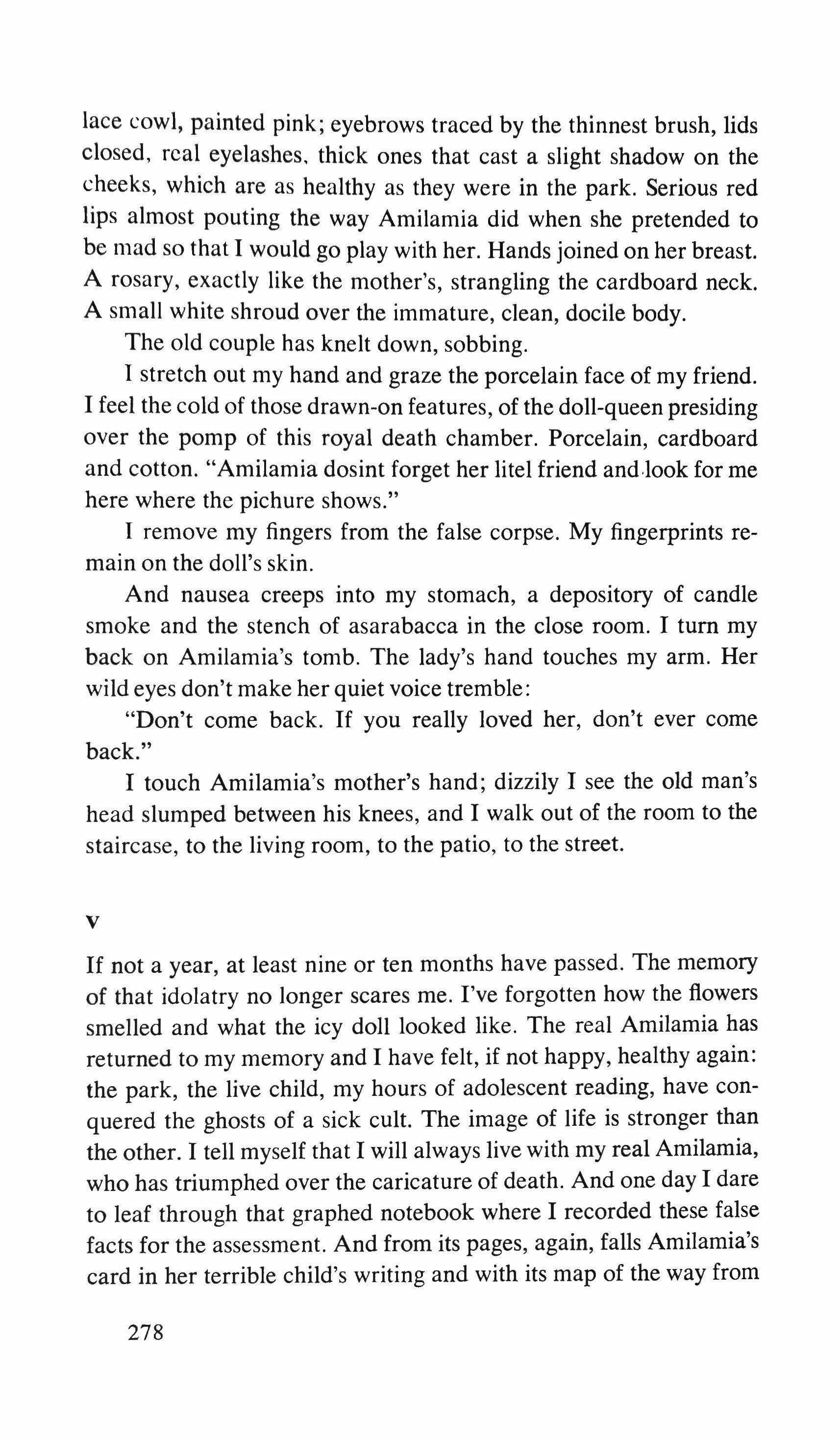
lace cowl, painted pink; eyebrows traced by the thinnest brush, lids closed, real eyelashes, thick ones that cast a slight shadow on the cheeks, which are as healthy as they were in the park. Serious red lips almost pouting the way Amilamia did when she pretended to be mad so that I would go play with her. Hands joined on her breast. A rosary, exactly like the mother's, strangling the cardboard neck. A small white shroud over the immature, clean, docile body. The old couple has knelt down, sobbing.
I stretch out my hand and graze the porcelain face of my friend. I feel the cold of those drawn-on features, of the doll-queen presiding over the pomp of this royal death chamber. Porcelain, cardboard and cotton. "Amilamia dosint forget her litel friend andlook for me here where the pichure shows."
I remove my fingers from the false corpse. My fingerprints remain on the doll's skin.
And nausea creeps into my stomach, a depository of candle smoke and the stench of asarabacca in the close room. I tum my back on Amilamia's tomb. The lady's hand touches my arm. Her wild eyes don't make her quiet voice tremble: "Don't come back. If you really loved her, don't ever come back."
I touch Amilamia's mother's hand; dizzily I see the old man's head slumped between his knees, and I walk out of the room to the staircase, to the living room, to the patio, to the street.
v
If not a year, at least nine or ten months have passed. The memory of that idolatry no longer scares me. I've forgotten how the flowers smelled and what the icy doll looked like. The real Amilamia has returned to my memory and I have felt, if not happy, healthy again: the park, the live child, my hours of adolescent reading, have conquered the ghosts of a sick cult. The image of life is stronger than the other. I tell myself that I will always live with my real Amilamia, who has triumphed over the caricature of death. And one day I dare to leaf through that graphed notebook where I recorded these false facts for the assessment. And from its pages, again, falls Amilamia's card in her terrible child's writing and with its map of the way from
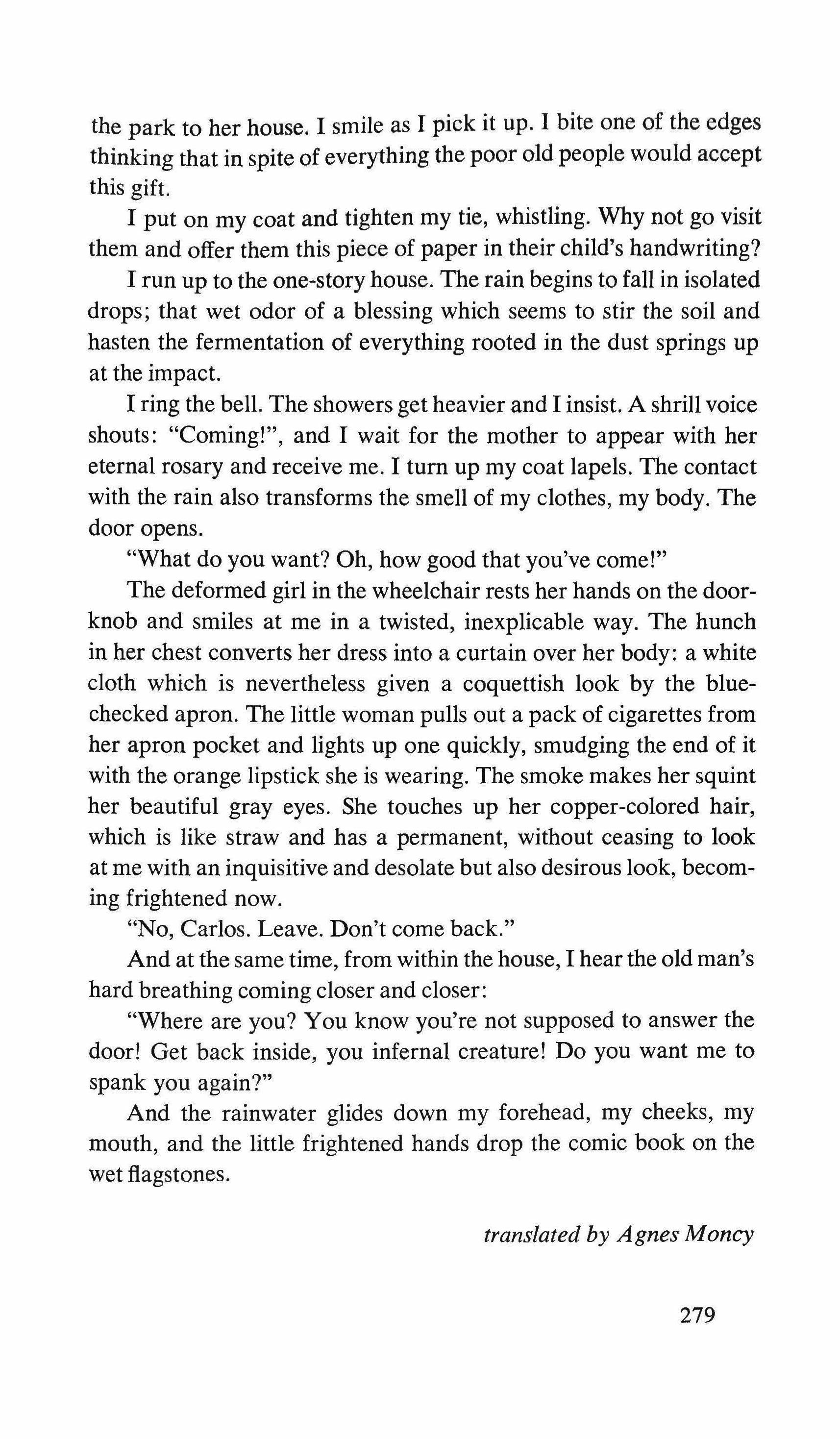
the park to her house. I smile as I pick it up. I bite one of the edges thinking that in spite of everything the poor old people would accept this gift.
I put on my coat and tighten my tie, whistling. Why not go visit them and offer them this piece of paper in their child's handwriting?
I run up to the one-story house. The rain begins to fall in isolated drops; that wet odor of a blessing which seems to stir the soil and hasten the fermentation of everything rooted in the dust springs up at the impact.
I ring the bell. The showers get heavier and I insist. A shrill voice shouts: "Coming!", and I wait for the mother to appear with her eternal rosary and receive me. I tum up my coat lapels. The contact with the rain also transforms the smell of my clothes, my body. The door opens.
"What do you want? Oh, how good that you've come!"
The deformed girl in the wheelchair rests her hands on the doorknob and smiles at me in a twisted, inexplicable way. The hunch in her chest converts her dress into a curtain over her body: a white cloth which is nevertheless given a coquettish look by the bluechecked apron. The little woman pulls out a pack of cigarettes from her apron pocket and lights up one quickly, smudging the end of it with the orange lipstick she is wearing. The smoke makes her squint her beautiful gray eyes. She touches up her copper-colored hair, which is like straw and has a permanent, without ceasing to look at me with an inquisitive and desolate but also desirous look, becoming frightened now.
"No, Carlos. Leave. Don't come back."
And at the same time, from within the house, I hear the old man's hard breathing coming closer and closer:
"Where are you? You know you're not supposed to answer the door! Get back inside, you infernal creature! Do you want me to spank you again?"
And the rainwater glides down my forehead, my cheeks, my mouth, and the little frightened hands drop the comic book on the wet flagstones.
translated by Agnes Money
